






First published in part in The Kenyon Review
"A high-tension wire plugged into the sensibilities the narrator has sought and identified authentic love. It surpasses sex. It rises from time." - WEBSTER SCHOTT, N. Y. Times Book Review
"A perceptive, unique novel Carter has brought it off with compassion and power." - CHARLES NEWMAN, Chicago Tribune
The oldest publisher-sponsored award of its kind has introduced many of America's most distinguished authors, among them Dorothy Baker, Robert Penn Warren, Elizabeth Bishop, Eugene Burdick, Philip Roth.
The awards are designed to help authors complete literary projects in fiction and non-fiction, but finished manuscripts are also eligible. The awards are $5,000, $3,000 of which is to be considered an advance against royalties. For complete information and application forms, write to:
PETER VIERECK 7 The Mob Within the Heart: Russia's Rebel Writers
ANDREW FIELD 57 Marina Tsvetaeva's Poems to Blok
LT. KIJE 65 Creativity and Control in the Soviet Union
DEMING BROWN 75 Vasili Aksenov at 33
DAVID JORAVSKY 119 The Silences of Academician Prianishnikov
NORRIS HOUGHTON 139 Creativity and Control in the Soviet Theatre
Two Commentaries
PETER YAKOVLEVICH
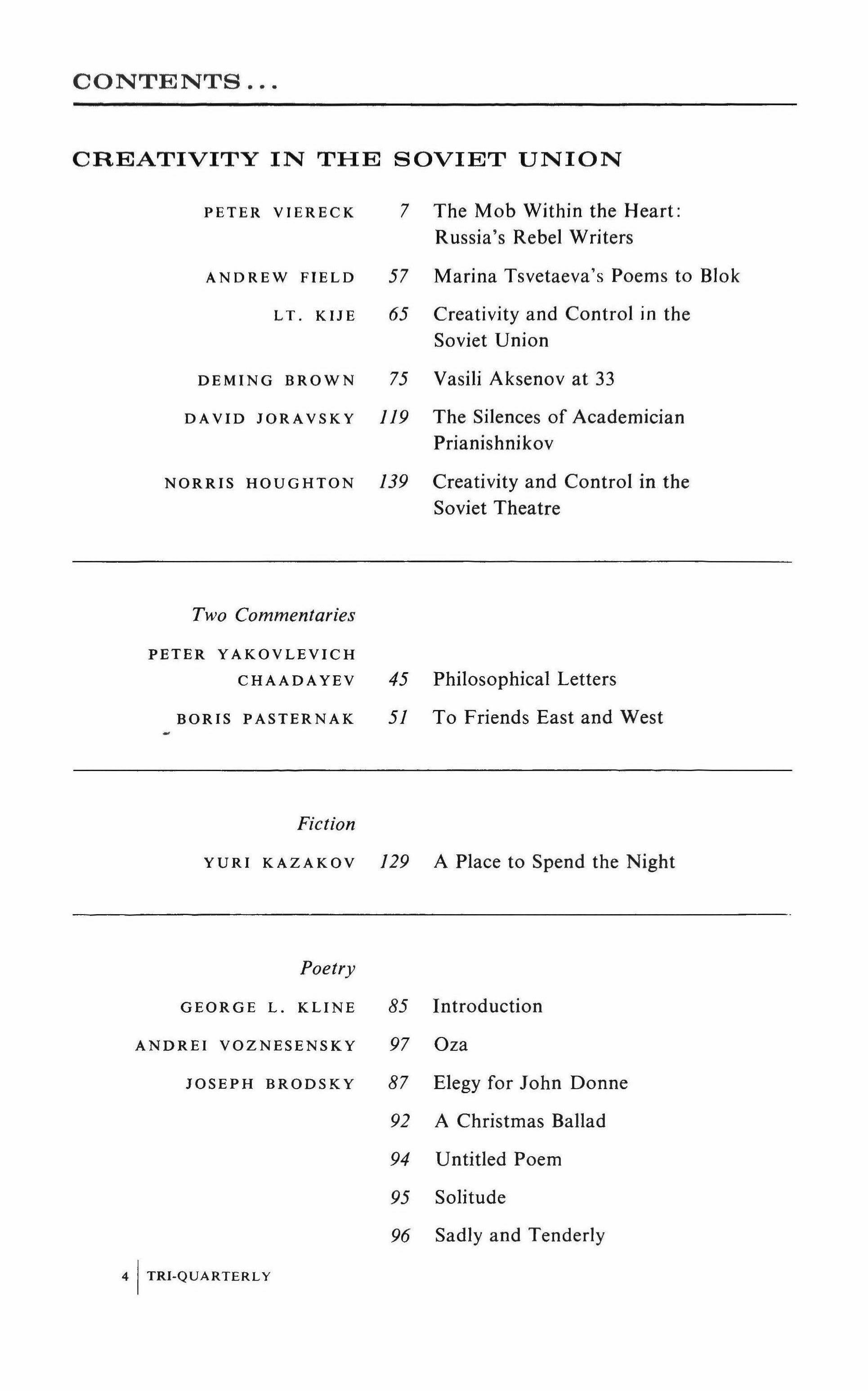
YURI KAZAKOV 129 A Place to Spend the Night
GEORGE L. KLINE
ANDREI VOZNESENSKY
JOSEPH BRODSKY
LESLIE

The Unhappiness of Arthur MillerAfter The Fall, Incident at Vichy, and the Lincoln Center
EDITOR: Charles Newman. ART DIRECTOR: Lawrence Levy. ASSOCIATES: John Almquist, Colton Johnson, William A. Henkin, Jr. PRODUCTION: Lauretta Akkeron. CIRCULATION: Valerie Nelson. BUSINESS: Suzanne Berger, Judith Jay, Suzanne Kurman. ADVERTISING: Adele Wolfberg. STAFF: Arthur F. Gould, Richard Thieme, Joel Pondelik, Anne Campbell, Dan Conrad.
The Ttl-Quarterly is a national journal of arts, letters and opinion, published in the fall, winter and spring quarters at Northwestern University, Evanston, Illinois. Subscription rates: $3.00 yearly within the United States; $3.25 Canada and Mexico; $3.75 Foreign. Single copies will be sold for $1.50. Contributions, correspondence and subscriptions should be addressed to Tri-Quarterly, University Hall 101, Northwestern University, Evanston, Illinois. Unsolicited manuscripts are welcome, but will not be returned unless accompanied by a self-addressed stamped envelope. Copyright © 1965 by Northwestern University Press. All rights reserved. The views expressed in the magazine, except for editorials. are to be attributed to the writers, not the editors or sponsors.
NATIONAL DISTRIBUTOR TO RETAIL TRADE: B. DEBOER, 188 HIGH STREET, NUTLEY, NEW JERSEY.
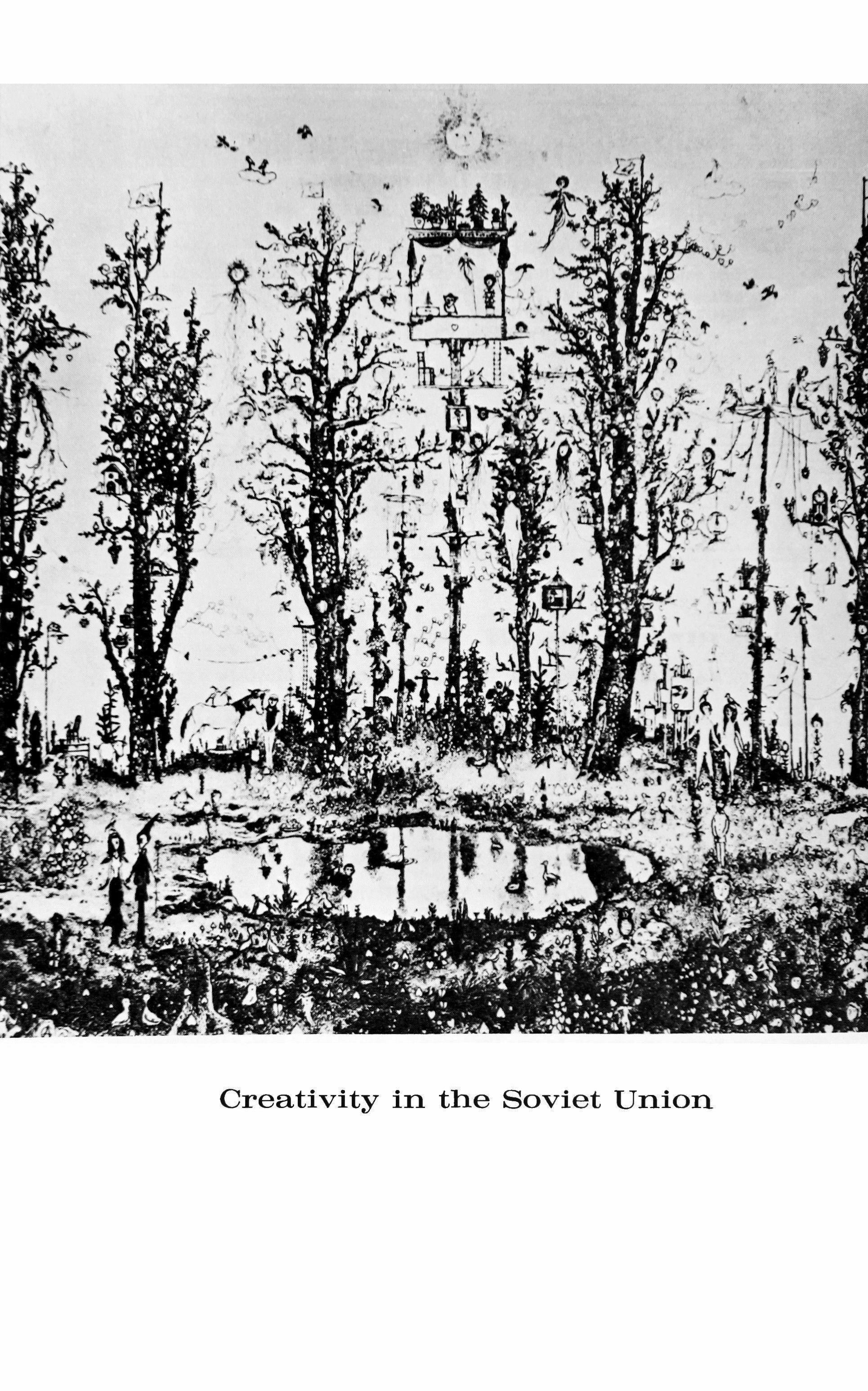
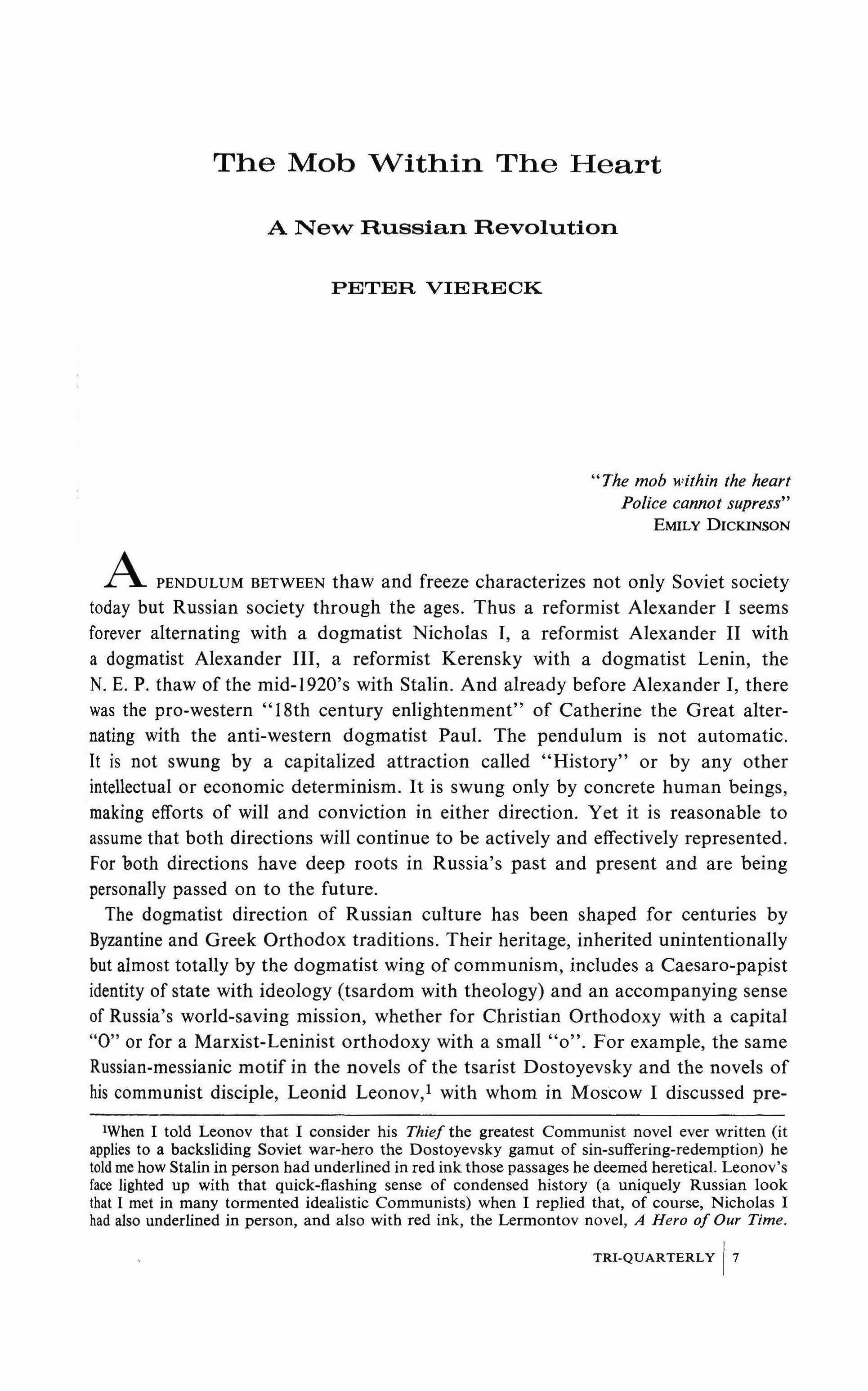
"The mob within the heart Police cannot supress"
EMILY DICKINSONAPENDULUM BETWEEN thaw and freeze characterizes not only Soviet society today but Russian society through the ages. Thus a reformist Alexander I seems forever alternating with a dogmatist Nicholas I, a reformist Alexander II with a dogmatist Alexander III, a reformist Kerensky with a dogmatist Lenin, the N. E. P. thaw of the mid-1920's with Stalin. And already before Alexander I, there was the pro-western "18th century enlightenment" of Catherine the Great alternating with the anti-western dogmatist Paul. The pendulum is not automatic. It is not swung by a capitalized attraction called "History" or by any other intellectual or economic determinism. It is swung only by concrete human beings, making efforts of will and conviction in either direction. Yet it is reasonable to assume that both directions will continue to be actively and effectively represented. For both directions have deep roots in Russia's past and present and are being personally passed on to the future.
The dogmatist direction of Russian culture has been shaped for centuries by Byzantine and Greek Orthodox traditions. Their heritage, inherited unintentionally but almost totally by the dogmatist wing of communism, includes a Caesaro-papist identity of state with ideology (tsardom with theology) and an accompanying sense of Russia's world-saving mission, whether for Christian Orthodoxy with a capital "0" or for a Marxist-Leninist orthodoxy with a small "0". For example, the same Russian-messianic motif in the novels of the tsarist Dostoyevsky and the novels of his communist disciple, Leonid Leonov.! with whom in Moscow I discussed pre-
lWhen I told Leonov that I consider his Thief the greatest Communist novel ever written (it applies to a backsliding Soviet war-hero the Dostoyevsky gamut of sin-suffering-redemption) he told me how Stalin in person had underlined in red ink those passages he deemed heretical. Leonov's face lighted up with that quick-flashing sense of condensed history (a uniquely Russian look that I met in many tormented idealistic Communists) when I replied that, of course, Nicholas I had also underlined in person, and also with red ink, the Lermontov novel, A Hero of Our Time.
TRI-QUARTERLY
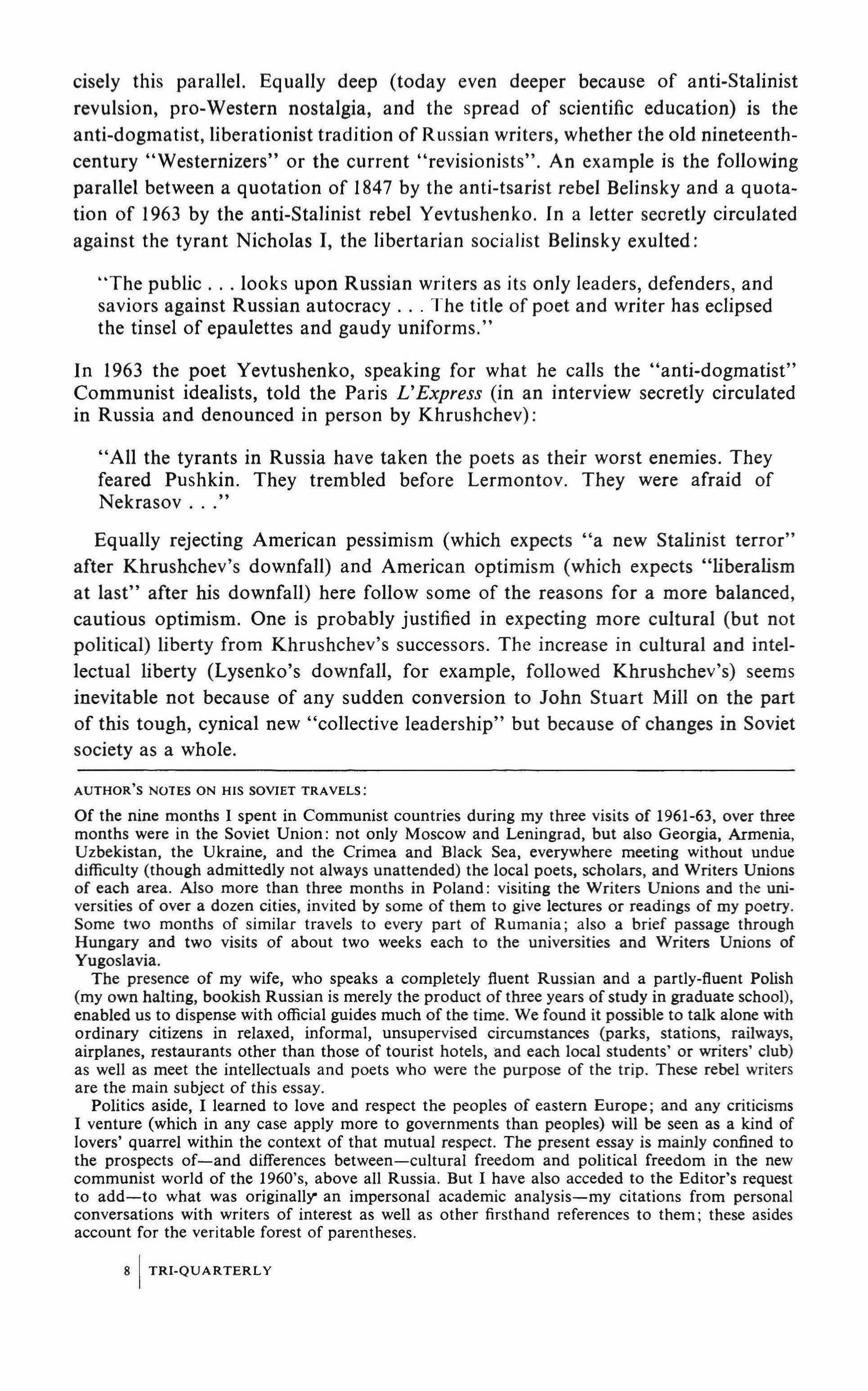
cisely this parallel. Equally deep (today even deeper because of anti-Stalinist revulsion, pro-Western nostalgia, and the spread of scientific education) is the anti-dogmatist, liberationist tradition of Russian writers, whether the old nineteenthcentury "Westernizers" or the current "revisionists". An example is the following parallel between a quotation of 1847 by the anti-tsarist rebel Belinsky and a quotation of 1963 by the anti-Stalinist rebel Yevtushenko. In a letter secretly circulated against the tyrant Nicholas I, the libertarian socialist Belinsky exulted:
"The public looks upon Russian writers as its only leaders, defenders, and saviors against Russian autocracy The title of poet and writer has eclipsed the tinsel of epaulettes and gaudy uniforms."
In 1963 the poet Yevtushenko, speaking for what he calls the "anti-dogmatist" Communist idealists, told the Paris L'Express (in an interview secretly circulated in Russia and denounced in person by Khrushchev):
"All the tyrants in Russia have taken the poets as their worst enemies. They feared Pushkin. They trembled before Lermontov. They were afraid of Nekrasov
Equally rejecting American pessimism (which expects "a new Stalinist terror" after Khrushchev's downfall) and American optimism (which expects "liberalism at last" after his downfall) here follow some of the reasons for a more balanced, cautious optimism. One is probably justified in expecting more cultural (but not political) liberty from Khrushchev's successors. The increase in cultural and intellectual liberty (Lysenko'S downfall, for example, followed Khrushchev's) seems inevitable not because of any sudden conversion to John Stuart Mill on the part of this tough, cynical new "collective leadership" but because of changes in Soviet society as a whole.
AUTHOR'S NOTES ON HIS SOVIET TRAVELS:
Of the nine months I spent in Communist countries during my three visits of 1961-63, over three months were in the Soviet Union: not only Moscow and Leningrad, but also Georgia, Armenia, Uzbekistan, the Ukraine, and the Crimea and Black Sea, everywhere meeting without undue difficulty (though admittedly not always unattended) the local poets, scholars, and Writers Unions of each area. Also more than three months in Poland: visiting the Writers Unions and the universities of over a dozen cities, invited by some of them to give lectures or readings of my poetry. Some two months of similar travels to every part of Rumania; also a brief passage through Hungary and two visits of about two weeks each to the universities and Writers Unions of Yugoslavia.
The presence of my wife, who speaks a completely fluent Russian and a partly-fluent Polish (my own halting, bookish Russian is merely the product of three years of study in graduate school), enabled us to dispense with official guides much of the time. We found it possible to talk alone with ordinary citizens in relaxed, informal, unsupervised circumstances (parks, stations, railways, airplanes, restaurants other than those of tourist hotels, and each local students' or writers' club) as well as meet the intellectuals and poets who were the purpose of the trip. These rebel writers are the main subject of this essay.
Politics aside, I learned to love and respect the peoples of eastern Europe; and any criticisms I venture (which in any case apply more to governments than peoples) will be seen as a kind of lovers' quarrel within the context of that mutual respect. The present essay is mainly confined to the prospects of-and differences between-cultural freedom and political freedom in the new communist world of the 1960's, above all Russia. But I have also acceded to the Editor's request to add-to what was originally an impersonal academic analysis-my citations from personal conversations with writers of interest as well as other firsthand references to them; these asides account for the veritable forest of parentheses.
TRI-QUARTERLY
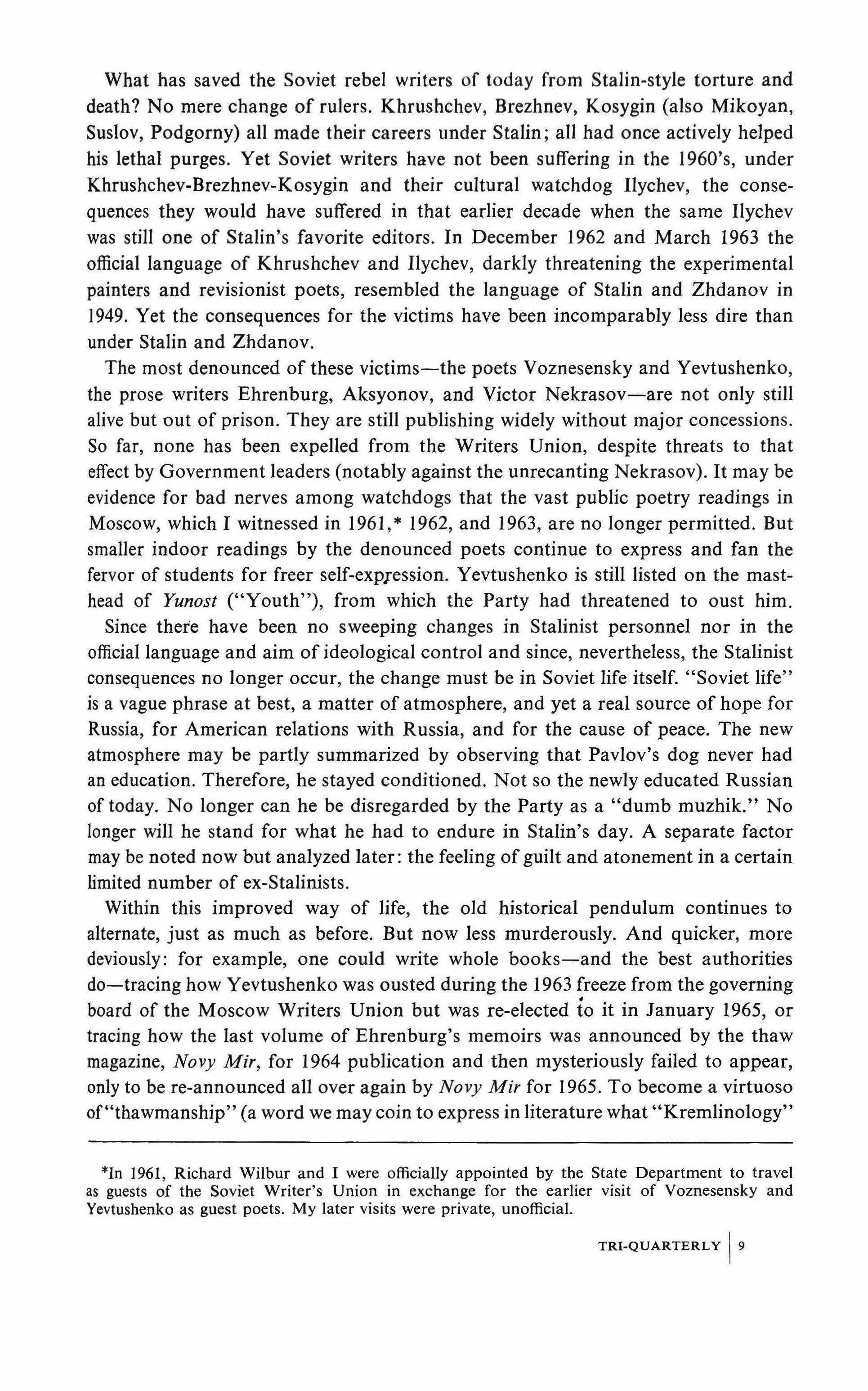
What has saved the Soviet rebel writers of today from Stalin-style torture and death? No mere change of rulers. Khrushchev, Brezhnev, Kosygin (also Mikoyan, Suslov, Podgorny) all made their careers under Stalin; all had once actively helped his lethal purges. Yet Soviet writers have not been suffering in the 1960's, under Khrushchev-Brezhnev-Kosygin and their cultural watchdog Ilychev, the consequences they would have suffered in that earlier decade when the same Ilychev was still one of Stalin's favorite editors. In December 1962 and March 1963 the official language of Khrushchev and Ilychev, darkly threatening the experimental painters and revisionist poets, resembled the language of Stalin and Zhdanov in 1949. Yet the consequences for the victims have been incomparably less dire than under Stalin and Zhdanov.
The most denounced of these victims-the poets Voznesensky and Yevtushenko, the prose writers Ehrenburg, Aksyonov, and Victor Nekrasov-are not only still alive but out of prison. They are still publishing widely without major concessions. So far, none has been expelled from the Writers Union, despite threats to that effect by Government leaders (notably against the unrecanting Nekrasov). It may be evidence for bad nerves among watchdogs that the vast public poetry readings in Moscow, which I witnessed in 1961, * 1962, and 1963, are no longer permitted. But smaller indoor readings by the denounced poets continue to express and fan the fervor of students for freer self-expression. Yevtushenko is still listed on the masthead of Yunost ("Youth"), from which the Party had threatened to oust him.
Since there have been no sweeping changes in Stalinist personnel nor in the official language and aim of ideological control and since, nevertheless, the Stalinist consequences no longer occur, the change must be in Soviet life itself. "Soviet life" is a vague phrase at best, a matter of atmosphere, and yet a real source of hope for Russia, for American relations with Russia, and for the cause of peace. The new atmosphere may be partly summarized by observing that Pavlov's dog never had an education. Therefore, he stayed conditioned. Not so the newly educated Russian of today. No longer can he be disregarded by the Party as a "dumb muzhik." No longer will he stand for what he had to endure in Stalin's day. A separate factor may be noted now but analyzed later: the feeling of guilt and atonement in a certain limited number of ex-Stalinists.
Within this improved way of life, the old historical pendulum continues to alternate, just as much as before. But now less murderously. And quicker, more deviously: for example, one could write whole books-and the best authorities do-tracing how Yevtushenko was ousted during the 1963 freeze from the governing board of the Moscow Writers Union but was re-elected to it in January 1965, or tracing how the last volume of Ehrenburg's memoirs was announced by the thaw magazine, Navy Mir, for 1964 publication and then mysteriously failed to appear, only to be re-announced all over again by Navy Mir for 1965. To become a virtuoso of"thawmanship" (a word we may coin to express in literature what "Kremlinology"
*In 1961, Richard Wilbur and I were officially appointed by the State Department to travel as guests of the Soviet Writer's Union in exchange for the earlier visit of Voznesensky and Yevtushenko as guest poets. My later visits were private, unofficial.
TRI-QUARTERLY
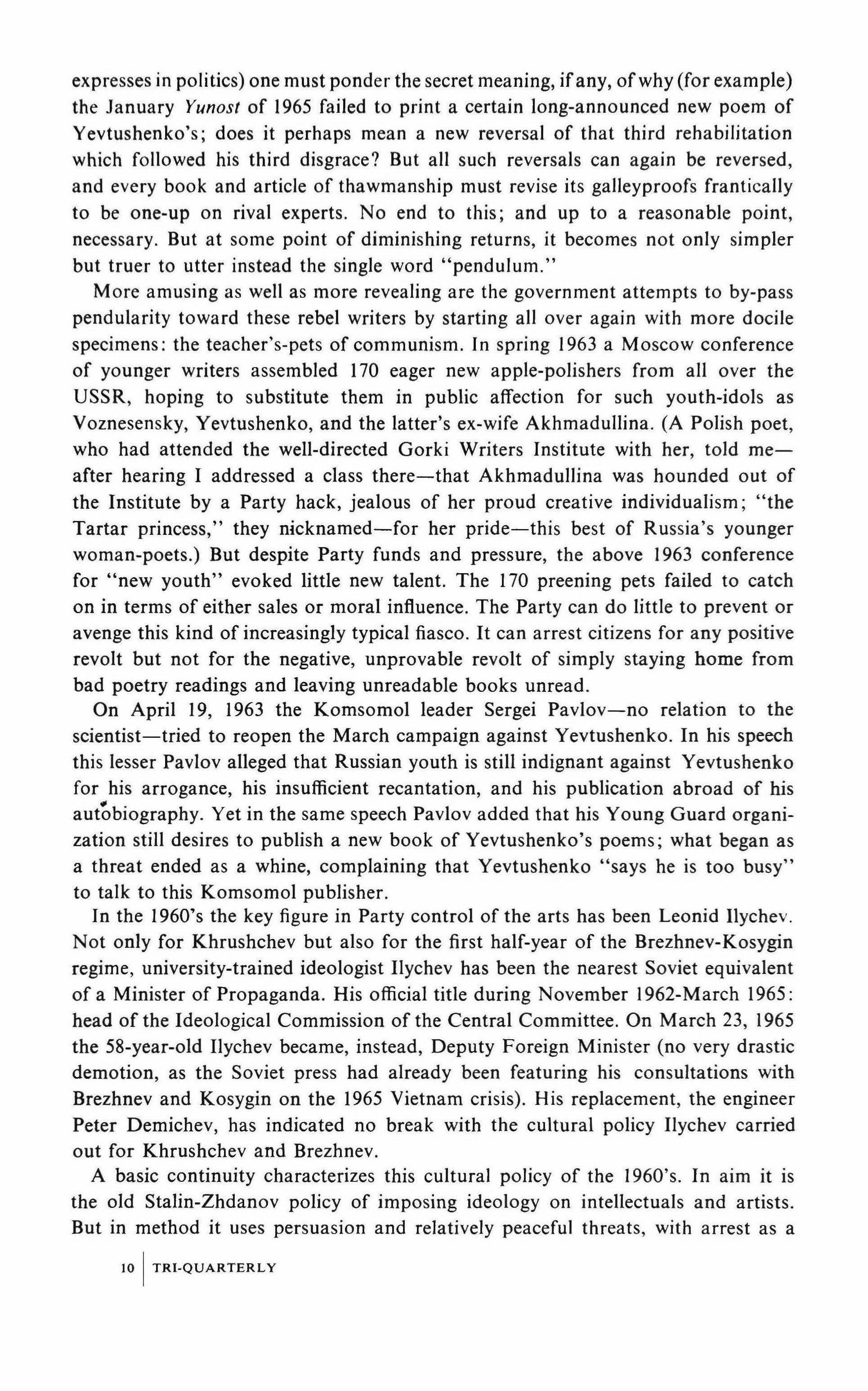
expresses in politics) one must ponder the secret meaning, ifany, ofwhy (for example) the January Yunost of 1965 failed to print a certain long-announced new poem of Yevtushenko's; does it perhaps mean a new reversal of that third rehabilitation which followed his third disgrace? But all such reversals can again be reversed, and every book and article of thawmanship must revise its galleyproofs frantically to be one-up on rival experts. No end to this; and up to a reasonable point, necessary. But at some point of diminishing returns, it becomes not only simpler but truer to utter instead the single word "pendulum."
More amusing as well as more revealing are the government attempts to by-pass pendularity toward these rebel writers by starting all over again with more docile specimens: the teacher's-pets of communism. In spring 1963 a Moscow conference of younger writers assembled 170 eager new apple-polishers from all over the USSR, hoping to substitute them in public affection for such youth-idols as Voznesensky, Yevtushenko, and the latter's ex-wife Akhmadullina. (A Polish poet, who had attended the well-directed Gorki Writers Institute with her, told meafter hearing I addressed a class there-that Akhmadullina was hounded out of the Institute by a Party hack, jealous of her proud creative individualism; "the Tartar princess," they nicknamed-for her pride-this best of Russia's younger woman-poets.) But despite Party funds and pressure, the above 1963 conference for "new youth" evoked little new talent. The 170 preening pets failed to catch on in terms of either sales or moral influence. The Party can do little to prevent or avenge this kind of increasingly typical fiasco. It can arrest citizens for any positive revolt but not for the negative, unprovable revolt of simply staying home from bad poetry readings and leaving unreadable books unread.
On April 19, 1963 the Komsomol leader Sergei Pavlov-no relation to the scientist-tried to reopen the March campaign against Yevtushenko. In his speech this lesser Pavlov alleged that Russian youth is still indignant against Yevtushenko for his arrogance, his insufficient recantation, and his publication abroad of his autobiography. Yet in the same speech Pavlov added that his Young Guard organization still desires to publish a new book of Yevtushenko's poems; what began as a threat ended as a whine, complaining that Yevtushenko "says he is too busy" to talk to this Komsomol publisher.
In the 1960's the key figure in Party control of the arts has been Leonid llychev. Not only for Khrushchev but also for the first half-year of the Brezhnev-Kosygin regime, university-trained ideologist Ilychev has been the nearest Soviet equivalent of a Minister of Propaganda. His official title during November 1962-March 1965: head of the Ideological Commission of the Central Committee. On March 23, 1965 the 58-year-old Ilychev became, instead, Deputy Foreign Minister (no very drastic demotion, as the Soviet press had already been featuring his consultations with Brezhnev and Kosygin on the 1965 Vietnam crisis). His replacement, the engineer Peter Demichev, has indicated no break with the cultural policy Ilychev carried out for Khrushchev and Brezhnev.
A basic continuity characterizes this cultural policy of the 1960's. In aim it is the old Stalin-Zhdanov policy of imposing ideology on intellectuals and artists. But in method it uses persuasion and relatively peaceful threats, with arrest as a
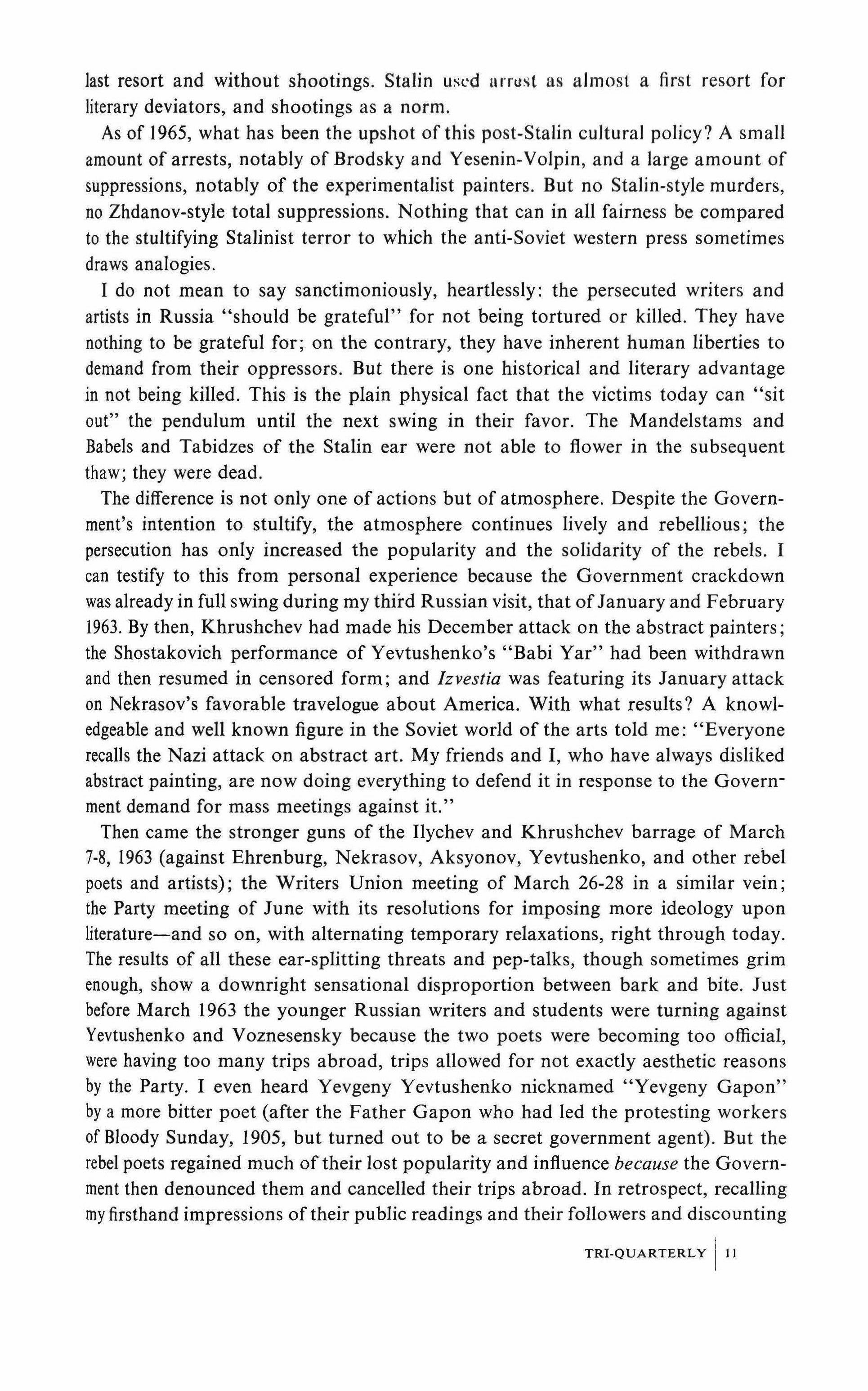
last resort and without shootings. Stalin used arrest as almost a first resort for literary deviators, and shootings as a norm.
As of 1965, what has been the upshot of this post-Stalin cultural policy? A small amount of arrests, notably of Brodsky and Yesenin-Volpin, and a large amount of suppressions, notably of the experimentalist painters. But no Stalin-style murders, no Zhdanov-style total suppressions. Nothing that can in all fairness be compared to the stultifying Stalinist terror to which the anti-Soviet western press sometimes draws analogies.
I do not mean to say sanctimoniously, heartlessly: the persecuted writers and artists in Russia "should be grateful" for not being tortured or killed. They have nothing to be grateful for; on the contrary, they have inherent human liberties to demand from their oppressors. But there is one historical and literary advantage in not being killed. This is the plain physical fact that the victims today can "sit out" the pendulum until the next swing in their favor. The Mandelstams and Babels and Tabidzes of the Stalin ear were not able to flower in the subsequent thaw; they were dead.
The difference is not only one of actions but of atmosphere. Despite the Government's intention to stultify, the atmosphere continues lively and rebellious; the persecution has only increased the popularity and the solidarity of the rebels. I can testify to this from personal experience because the Government crackdown was already in full swing during my third Russian visit, that ofJanuary and February 1963. By then, Khrushchev had made his December attack on the abstract painters; the Shostakovich performance of Yevtushenko's "Babi Yar" had been withdrawn and then resumed in censored form; and Izvestia was featuring its January attack on Nekrasov's favorable travelogue about America. With what results? A knowledgeable and well known figure in the Soviet world of the arts told me: "Everyone recalls the Nazi attack on abstract art. My friends and I, who have always disliked abstract painting, are now doing everything to defend it in response to the Government demand for mass meetings against it."
Then came the stronger guns of the IIychev and Khrushchev barrage of March 7-8, 1963 (against Ehrenburg, Nekrasov, Aksyonov, Yevtushenko, and other rebel poets and artists); the Writers Union meeting of March 26-28 in a similar vein; the Party meeting of June with its resolutions for imposing more ideology upon literature-and so on, with alternating temporary relaxations, right through today. The results of all these ear-splitting threats and pep-talks, though sometimes grim enough, show a downright sensational disproportion between bark and bite. Just before March 1963 the younger Russian writers and students were turning against Yevtushenko and Voznesensky because the two poets were becoming too official, were having too many trips abroad, trips allowed for not exactly aesthetic reasons by the Party. I even heard Yevgeny Yevtushenko nicknamed "Yevgeny Gapon" by a more bitter poet (after the Father Gapon who had led the protesting workers of Bloody Sunday, 1905, but turned out to be a secret government agent). But the rebel poets regained much of their lost popularity and influence because the Government then denounced them and cancelled their trips abroad. In retrospect, recalling my firsthand impressions oftheir public readings and their followers and discounting
TRI-QUARTERLY I"
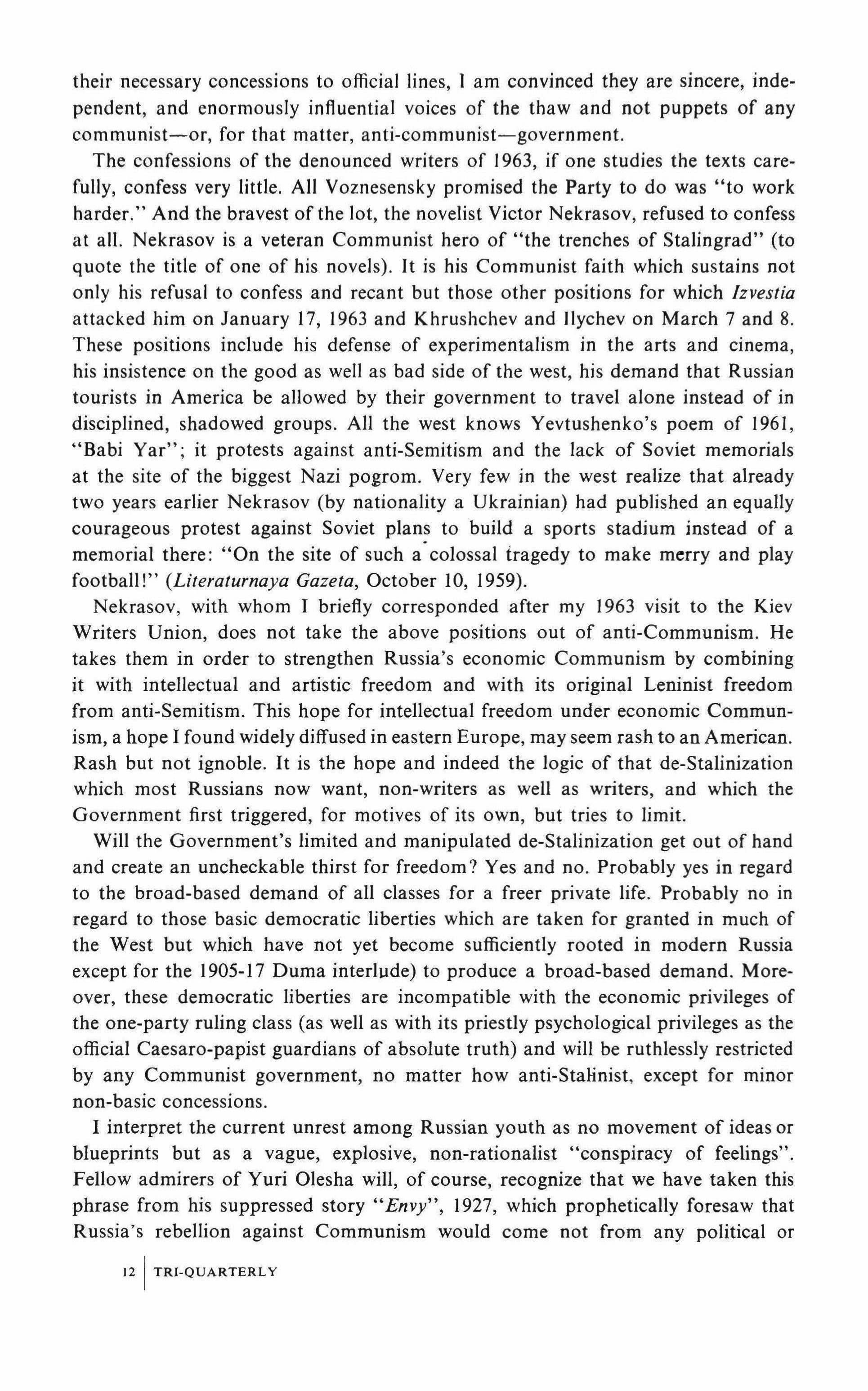
their necessary concessions to official lines, I am convinced they are sincere, independent, and enormously influential voices of the thaw and not puppets of any communist-or, for that matter, anti-communist-government.
The confessions of the denounced writers of 1963, if one studies the texts carefully, confess very little. All Voznesensky promised the Party to do was "to work harder." And the bravest of the lot, the novelist Victor Nekrasov, refused to confess at all. Nekrasov is a veteran Communist hero of "the trenches of Stalingrad" (to quote the title of one of his novels). It is his Communist faith which sustains not only his refusal to confess and recant but those other positions for which Izvestia attacked him on January 17, 1963 and Khrushchev and Ilychev on March 7 and 8. These positions include his defense of experimentalism in the arts and cinema, his insistence on the good as well as bad side of the west, his demand that Russian tourists in America be allowed by their government to travel alone instead of in disciplined, shadowed groups. All the west knows Yevtushenko's poem of 1961, "Babi Yar"; it protests against anti-Semitism and the lack of Soviet memorials at the site of the biggest Nazi pogrom. Very few in the west realize that already two years earlier Nekrasov (by nationality a Ukrainian) had published an equally courageous protest against Soviet plans to build a sports stadium instead of a memorial there: "On the site of such a colossal tragedy to make merry and play football!" (Literaturnaya Gazeta, October 10, 1959).
Nekrasov, with whom I briefly corresponded after my 1963 visit to the Kiev Writers Union, does not take the above positions out of anti-Communism. He takes them in order to strengthen Russia's economic Communism by combining it with intellectual and artistic freedom and with its original Leninist freedom from anti-Semitism. This hope for intellectual freedom under economic Communism, a hope I found widely diffused in eastern Europe, may seem rash to an American. Rash but not ignoble. It is the hope and indeed the logic of that de-Stalinization which most Russians now want, non-writers as well as writers, and which the Government first triggered, for motives of its own, but tries to limit.
Will the Government's limited and manipulated de-Stalinization get out of hand and create an uncheckable thirst for freedom? Yes and no. Probably yes in regard to the broad-based demand of all classes for a freer private life. Probably no in regard to those basic democratic liberties which are taken for granted in much of the West but which have not yet become sufficiently rooted in modern Russia except for the 1905-17 Duma interlude) to produce a broad-based demand. Moreover, these democratic liberties are incompatible with the economic privileges of the one-party ruling class (as well as with its priestly psychological privileges as the official Caesaro-papist guardians of absolute truth) and will be ruthlessly restricted by any Communist government, no matter how anti-Stalinist, except for minor non-basic concessions.
I interpret the current unrest among Russian youth as no movement of ideas or blueprints but as a vague, explosive, non-rationalist "conspiracy of feelings". Fellow admirers of Yuri Olesha will, of course, recognize that we have taken this phrase from his suppressed story "Envy", 1927, which prophetically foresaw that Russia's rebellion against Communism would come not from any political or
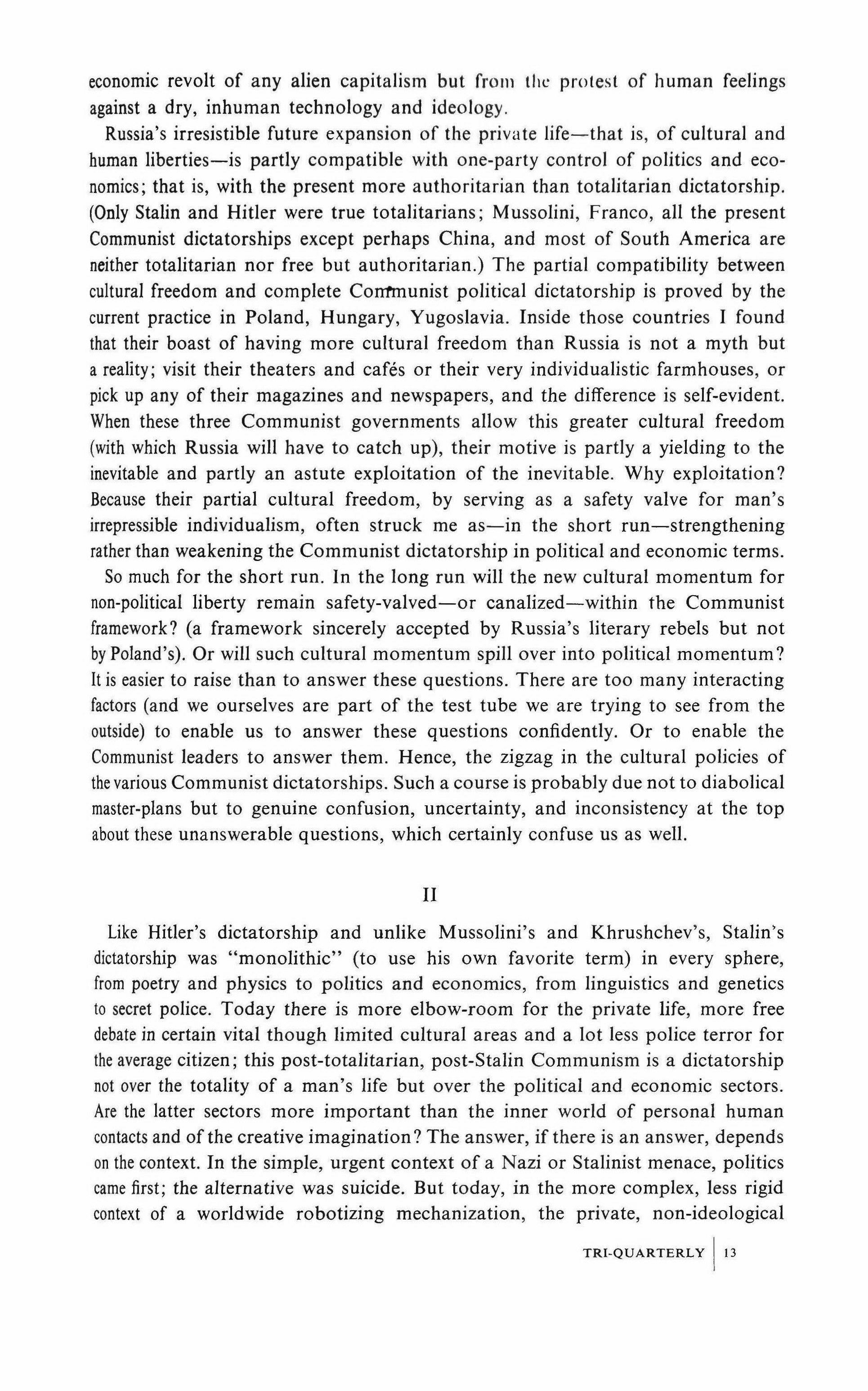
economic revolt of any alien capitalism but from the protest of human feelings against a dry, inhuman technology and ideology. Russia's irresistible future expansion of the private life-that is, of cultural and human liberties-is partly compatible with one-party control of politics and economics; that is, with the present more authoritarian than totalitarian dictatorship. (Only Stalin and Hitler were true totalitarians; Mussolini, Franco, all the present Communist dictatorships except perhaps China, and most of South America are neither totalitarian nor free but authoritarian.) The partial compatibility between cultural freedom and complete Corrrmunist political dictatorship is proved by the current practice in Poland, Hungary, Yugoslavia. Inside those countries I found that their boast of having more cultural freedom than Russia is not a myth but a reality; visit their theaters and cafes or their very individualistic farmhouses, or pick up any of their magazines and newspapers, and the difference is self-evident. When these three Communist governments allow this greater cultural freedom (with which Russia will have to catch up), their motive is partly a yielding to the inevitable and partly an astute exploitation of the inevitable. Why exploitation? Because their partial cultural freedom, by serving as a safety valve for man's irrepressible individualism, often struck me as-in the short run-strengthening rather than weakening the Communist dictatorship in political and economic terms. So much for the short run. In the long run will the new cultural momentum for non-political liberty remain safety-valved-or canalized-within the Communist framework? (a framework sincerely accepted by Russia's literary rebels but not by Poland's). Or will such cultural momentum spill over into political momentum? It is easier to raise than to answer these questions. There are too many interacting factors (and we ourselves are part of the test tube we are trying to see from the outside) to enable us to answer these questions confidently. Or to enable the Communist leaders to answer them. Hence, the zigzag in the cultural policies of the various Communist dictatorships. Such a course is probably due not to diabolical master-plans but to genuine confusion, uncertainty, and inconsistency at the top about these unanswerable questions, which certainly confuse us as well.
Like Hitler's dictatorship and unlike Mussolini's and Khrushchev's, Stalin's dictatorship was "monolithic" (to use his own favorite term) in every sphere, from poetry and physics to politics and economics, from linguistics and genetics to secret police. Today there is more elbow-room for the private life, more free debate in certain vital though limited cultural areas and a lot less police terror for the average citizen; this post-totalitarian, post-Stalin Communism is a dictatorship not over the totality of a man's life but over the political and economic sectors. Are the latter sectors more important than the inner world of personal human contacts and of the creative imagination? The answer, if there is an answer, depends on the context. In the simple, urgent context of a Nazi or Stalinist menace, politics came first; the alternative was suicide. But today, in the more complex, less rigid context of a worldwide robotizing mechanization, the private, non-ideological
TRI-QUARTERLy 113
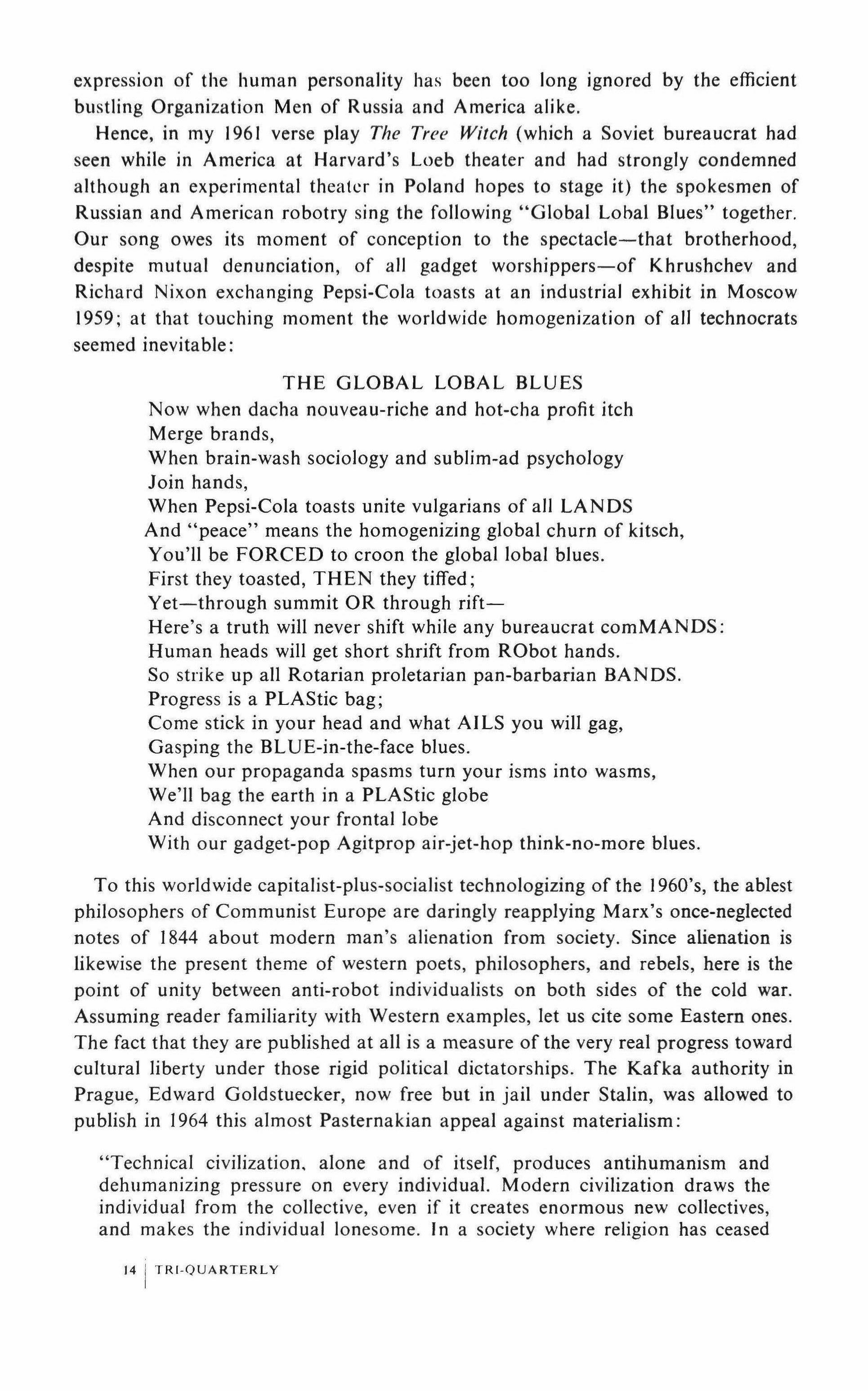
expression of the human personality has been too long ignored by the efficient bustling Organization Men of Russia and America alike.
Hence, in my 1961 verse play The Tree Witch (which a Soviet bureaucrat had seen while in America at Harvard's Loeb theater and had strongly condemned although an experimental theater in Poland hopes to stage it) the spokesmen of Russian and American robotry sing the following "Global Lobal Blues" together. Our song owes its moment of conception to the spectacle-that brotherhood, despite mutual denunciation, of all gadget worshippers-of Khrushchev and Richard Nixon exchanging Pepsi-Cola toasts at an industrial exhibit in Moscow 1959; at that touching moment the worldwide homogenization of all technocrats seemed inevitable:
Now when dacha nouveau-riche and hot-cha profit itch Merge brands, When brain-wash sociology and sublim-ad psychology Join hands,
When Pepsi-Cola toasts unite vulgarians of all LANDS And "peace" means the homogenizing global churn of kitsch, You'll be FORCED to croon the globallobal blues. First they toasted, THEN they tiffed; Yet-through summit OR through rift-
Here's a truth will never shift while any bureaucrat comMANDS: Human heads will get short shrift from RObot hands. So strike up all Rotarian proletarian pan-barbarian BANDS. Progress is a PLAStic bag; Come stick in your head and what AILS you will gag, Gasping the BLUE-in-the-face blues.
When our propaganda spasms turn your isms into wasms, We'll bag the earth in a PLAStic globe And disconnect your frontal lobe
With our gadget-pop Agitprop air-jet-hop think-no-more blues.
To this worldwide capitalist-plus-socialist technologizing of the 1960's, the ablest philosophers of Communist Europe are daringly reapplying Marx's once-neglected notes of 1844 about modern man's alienation from society. Since alienation is likewise the present theme of western poets, philosophers, and rebels, here is the point of unity between anti-robot individualists on both sides of the cold war. Assuming reader familiarity with Western examples, let us cite some Eastern ones. The fact that they are published at all is a measure of the very real progress toward cultural liberty under those rigid political dictatorships. The Kafka authority in Prague, Edward Goldstuecker, now free but in jail under Stalin, was allowed to publish in 1964 this almost Pasternakian appeal against materialism:
"Technical civilization, alone and of itself, produces antihumanism and dehumanizing pressure on every individual. Modern civilization draws the individual from the collective, even if it creates enormous new collectives, and makes the individual lonesome. I n a society where religion has ceased
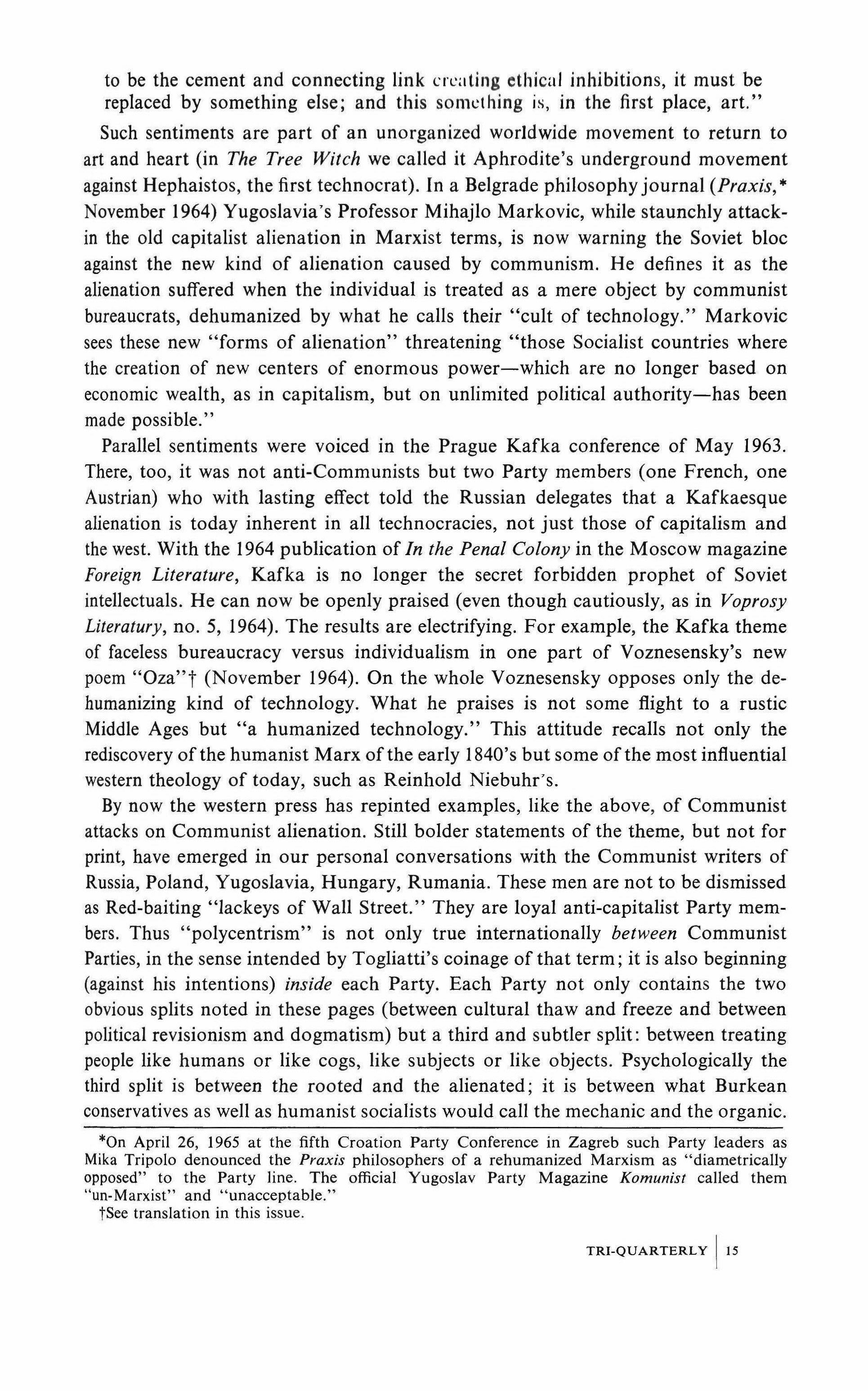
to be the cement and connecting link creating ethical inhibitions, it must be replaced by something else; and this sornct hing is, in the first place, art."
Such sentiments are part of an unorganized worldwide movement to return to art and heart (in The Tree Witch we called it Aphrodite's underground movement against Hephaistos, the first technocrat). In a Belgrade philosophyjournal (Praxis, November 1964) Yugoslavia's Professor Mihajlo Markovic, while staunchly attackin the old capitalist alienation in Marxist terms, is now warning the Soviet bloc against the new kind of alienation caused by communism. He defines it as the alienation suffered when the individual is treated as a mere object by communist bureaucrats, dehumanized by what he calls their "cult of technology." Markovic sees these new "forms of alienation" threatening "those Socialist countries where the creation of new centers of enormous power-which are no longer based on economic wealth, as in capitalism, but on unlimited political authority-has been made possible."
Parallel sentiments were voiced in the Prague Kafka conference of May 1963. There, too, it was not anti-Communists but two Party members (one French, one Austrian) who with lasting effect told the Russian delegates that a Kafkaesque alienation is today inherent in all technocracies, not just those of capitalism and the west. With the 1964 publication of In the Penal Colony in the Moscow magazine Foreign Literature, Kafka is no longer the secret forbidden prophet of Soviet intellectuals. He can now be openly praised (even though cautiously, as in Voprosy Literatury, no. 5, 1964). The results are electrifying. For example, the Kafka theme of faceless bureaucracy versus individualism in one part of Voznesensky's new poem "Oza"t (November 1964). On the whole Voznesensky opposes only the dehumanizing kind of technology. What he praises is not some flight to a rustic Middle Ages but "a humanized technology." This attitude recalls not only the rediscovery of the humanist Marx of the early 1840's but some of the most influential western theology of today, such as Reinhold Niebuhr's.
By now the western press has repinted examples, like the above, of Communist attacks on Communist alienation. Still bolder statements of the theme, but not for print, have emerged in our personal conversations with the Communist writers of Russia, Poland, Yugoslavia, Hungary, Rumania. These men are not to be dismissed as Red-baiting "lackeys of Wall Street." They are loyal anti-capitalist Party members. Thus "polycentrism" is not only true internationally between Communist Parties, in the sense intended by Togliatti's coinage of that term; it is also beginning (against his intentions) inside each Party. Each Party not only contains the two obvious splits noted in these pages (between cultural thaw and freeze and between political revisionism and dogmatism) but a third and subtler split: between treating people like humans or like cogs, like subjects or like objects. Psychologically the third split is between the rooted and the alienated; it is between what Burkean conservatives as well as humanist socialists would call the mechanic and the organic.
*On April 26, 1965 at the fifth Croation Party Conference in Zagreb such Party leaders as Mika Tripolo denounced the Praxis philosophers of a rehumanized Marxism as "diametrically opposed" to the Party line. The official Yugoslav Party Magazine Komunist called them "uri-Marxist" and "unacceptable."
+See translation in this issue.
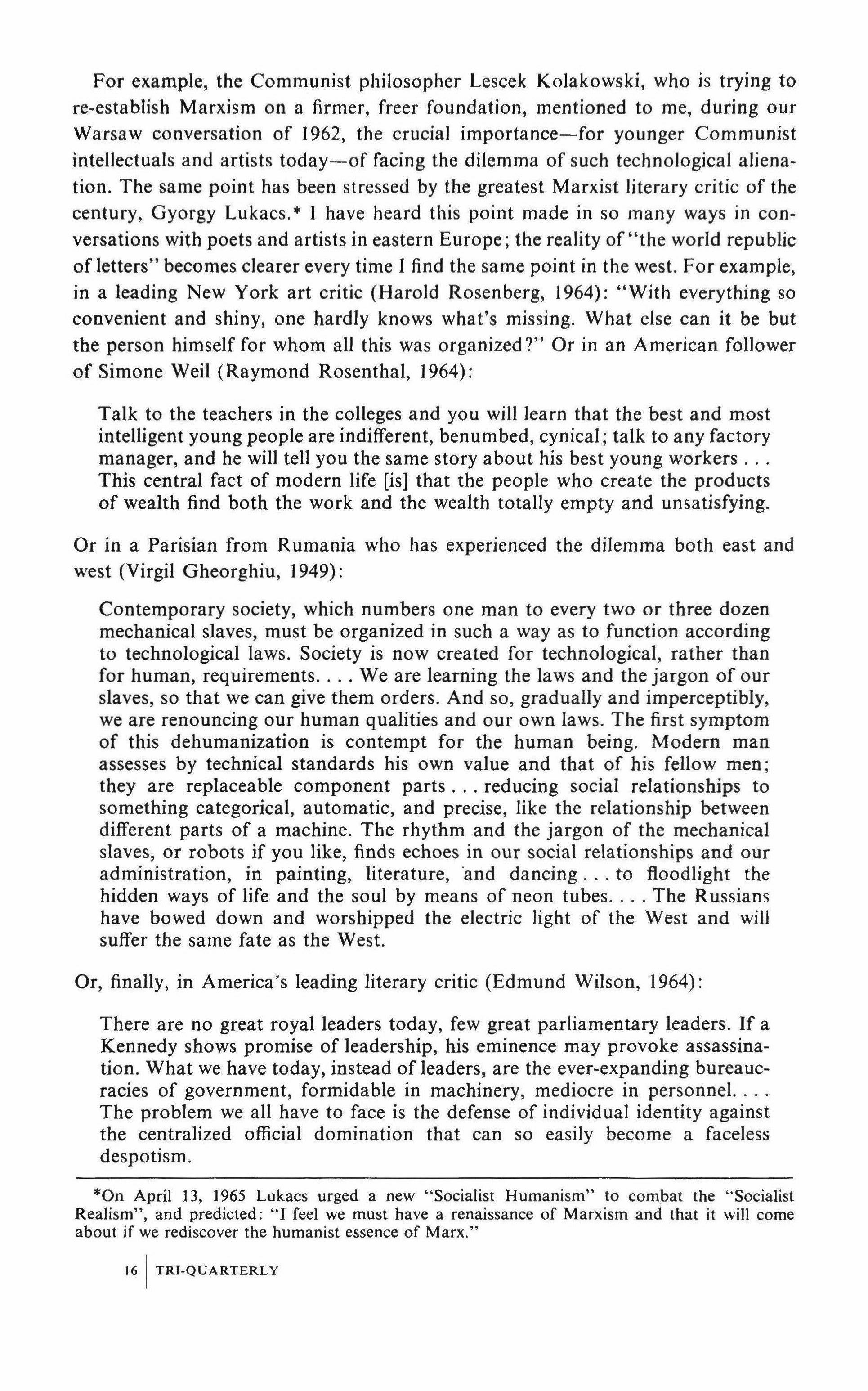
For example, the Communist philosopher Lescek Kolakowski, who is trying to re-establish Marxism on a firmer, freer foundation, mentioned to me, during our Warsaw conversation of 1962, the crucial importance-for younger Communist intellectuals and artists today-of facing the dilemma of such technological alienation. The same point has been stressed by the greatest Marxist literary critic of the century, Gyorgy Lukacs." I have heard this point made in so many ways in conversations with poets and artists in eastern Europe; the reality of "the world republic of letters" becomes clearer every time I find the same point in the west. For example, in a leading New York art critic (Harold Rosenberg, 1964): "With everything so convenient and shiny, one hardly knows what's missing. What else can it be but the person himself for whom all this was organized?" Or in an American follower of Simone Weil (Raymond Rosenthal, 1964):
Talk to the teachers in the colleges and you will learn that the best and most intelligent young people are indifferent, benumbed, cynical; talk to any factory manager, and he will tell you the same story about his best young workers This central fact of modern life [is] that the people who create the products of wealth find both the work and the wealth totally empty and unsatisfying. Or in a Parisian from Rumania who has experienced the dilemma both east and west (Virgil Gheorghiu, 1949):
Contemporary society, which numbers one man to every two or three dozen mechanical slaves, must be organized in such a way as to function according to technological laws. Society is now created for technological, rather than for human, requirements We are learning the laws and the jargon of our slaves, so that we can give them orders. And so, gradually and imperceptibly, we are renouncing our human qualities and our own laws. The first symptom of this dehumanization is contempt for the human being. Modem man assesses by technical standards his own value and that of his fellow men; they are replaceable component parts reducing social relationships to something categorical, automatic, and precise, like the relationship between different parts of a machine. The rhythm and the jargon of the mechanical slaves, or robots if you like, finds echoes in our social relationships and our administration, in painting, literature, and dancing to floodlight the hidden ways of life and the soul by means of neon tubes The Russians have bowed down and worshipped the electric light of the West and will suffer the same fate as the West.
Or, finally, in America's leading literary critic (Edmund Wilson, 1964):
There are no great royal leaders today, few great parliamentary leaders. If a Kennedy shows promise of leadership, his eminence may provoke assassination. What we have today, instead of leaders, are the ever-expanding bureaucracies of government, formidable in machinery, mediocre in personnel. The problem we all have to face is the defense of individual identity against the centralized official domination that can so easily become a faceless despotism.
*On April 13, 1965 Lukacs urged a new "Socialist Humanism" to combat the "Socialist Realism", and predicted: "I feel we must have a renaissance of Marxism and that it will come about if we rediscover the humanist essence of Marx." 161 TRI-QUARTERLY
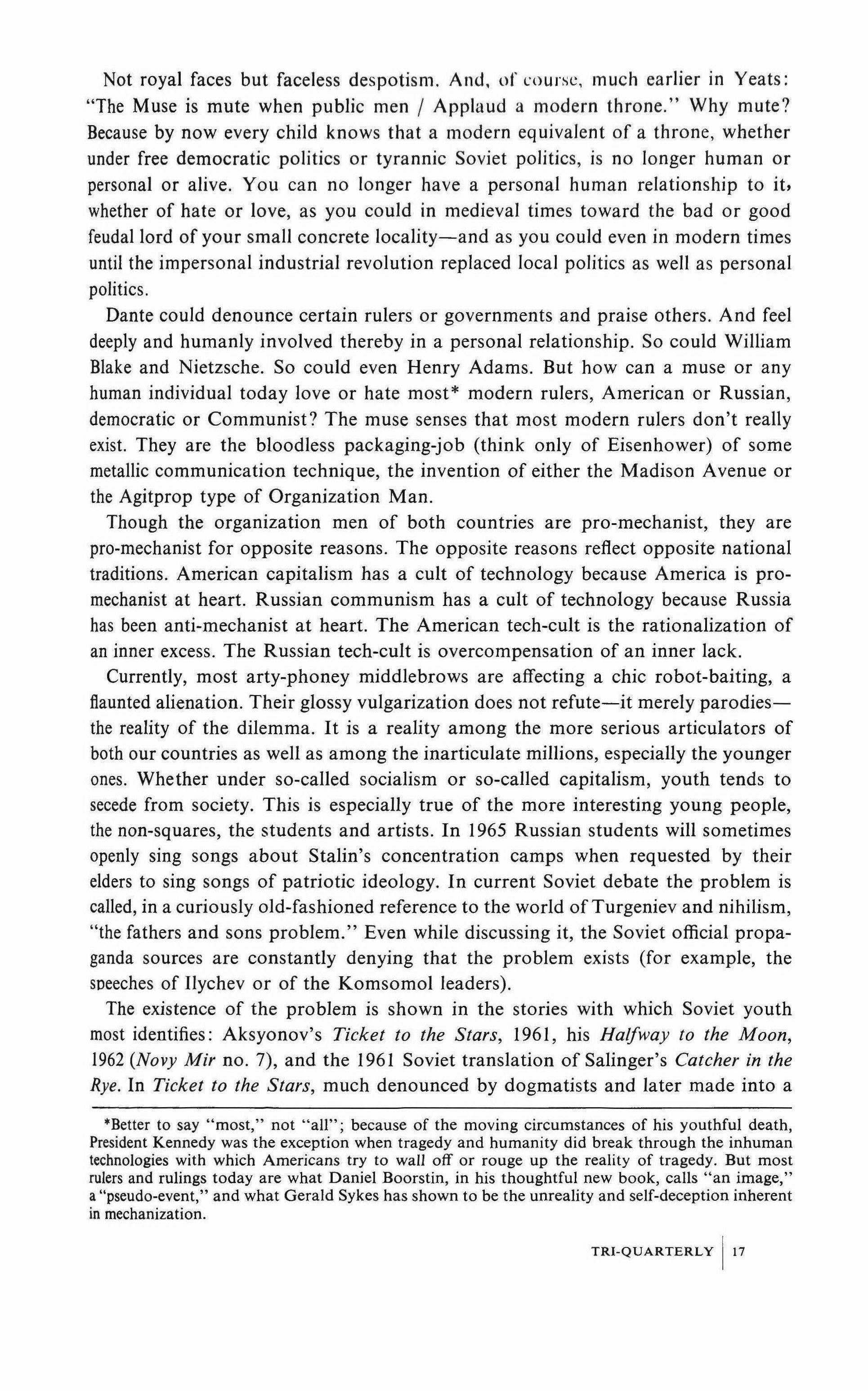
Not royal faces but faceless despotism. And. of course, much earlier in Yeats: "The Muse is mute when public men / Applaud a modern throne." Why mute? Because by now every child knows that a modern equivalent of a throne, whether under free democratic politics or tyrannic Soviet politics, is no longer human or personal or alive. You can no longer have a personal human relationship to it, whether of hate or love, as you could in medieval times toward the bad or good feudal lord of your small concrete locality-and as you could even in modern times until the impersonal industrial revolution replaced local politics as well as personal politics.
Dante could denounce certain rulers or governments and praise others. And feel deeply and humanly involved thereby in a personal relationship. So could William Blake and Nietzsche. So could even Henry Adams. But how can a muse or any human individual today love or hate most* modern rulers, American or Russian, democratic or Communist? The muse senses that most modern rulers don't really exist. They are the bloodless packaging-job (think only of Eisenhower) of some metallic communication technique, the invention of either the Madison Avenue or the Agitprop type of Organization Man.
Though the organization men of both countries are pro-mechanist, they are pro-mechanist for opposite reasons. The opposite reasons reflect opposite national traditions. American capitalism has a cult of technology because America is promechanist at heart. Russian communism has a cult of technology because Russia has been anti-mechanist at heart. The American tech-cult is the rationalization of an inner excess. The Russian tech-cult is overcompensation of an inner lack.
Currently, most arty-phoney middlebrows are affecting a chic robot-baiting, a flaunted alienation. Their glossy vulgarization does not refute-it merely parodiesthe reality of the dilemma. It is a reality among the more serious articulators of both our countries as well as among the inarticulate millions, especially the younger ones. Whether under so-called socialism or so-called capitalism, youth tends to secede from society. This is especially true of the more interesting young people, the non-squares, the students and artists. In 1965 Russian students will sometimes openly sing songs about Stalin's concentration camps when requested by their elders to sing songs of patriotic ideology. In current Soviet debate the problem is called, in a curiously old-fashioned reference to the world of Turgeniev and nihilism, "the fathers and sons problem." Even while discussing it, the Soviet official propaganda sources are constantly denying that the problem exists (for example, the soeeches of Ilychev or of the Komsomol leaders).
The existence of the problem is shown in the stories with which Soviet youth most identifies: Aksyonov's Ticket to the Stars, 1961, his Halfway to the Moon, 1962 (Navy Mir no. 7), and the 1961 Soviet translation of Salinger's Catcher in the Rye. In Ticket to the Stars, much denounced by dogmatists and later made into a
"Better to say "most," not "all"; because of the moving circumstances of his youthful death, President Kennedy was the exception when tragedy and humanity did break through the inhuman technologies with which Americans try to wall off or rouge up the reality of tragedy. But most rulers and rulings today are what Daniel Boorstin, in his thoughtful new book, calls "an image," a "pseudo-event," and what Gerald Sykes has shown to be the unreality and self-deception inherent in mechanization.
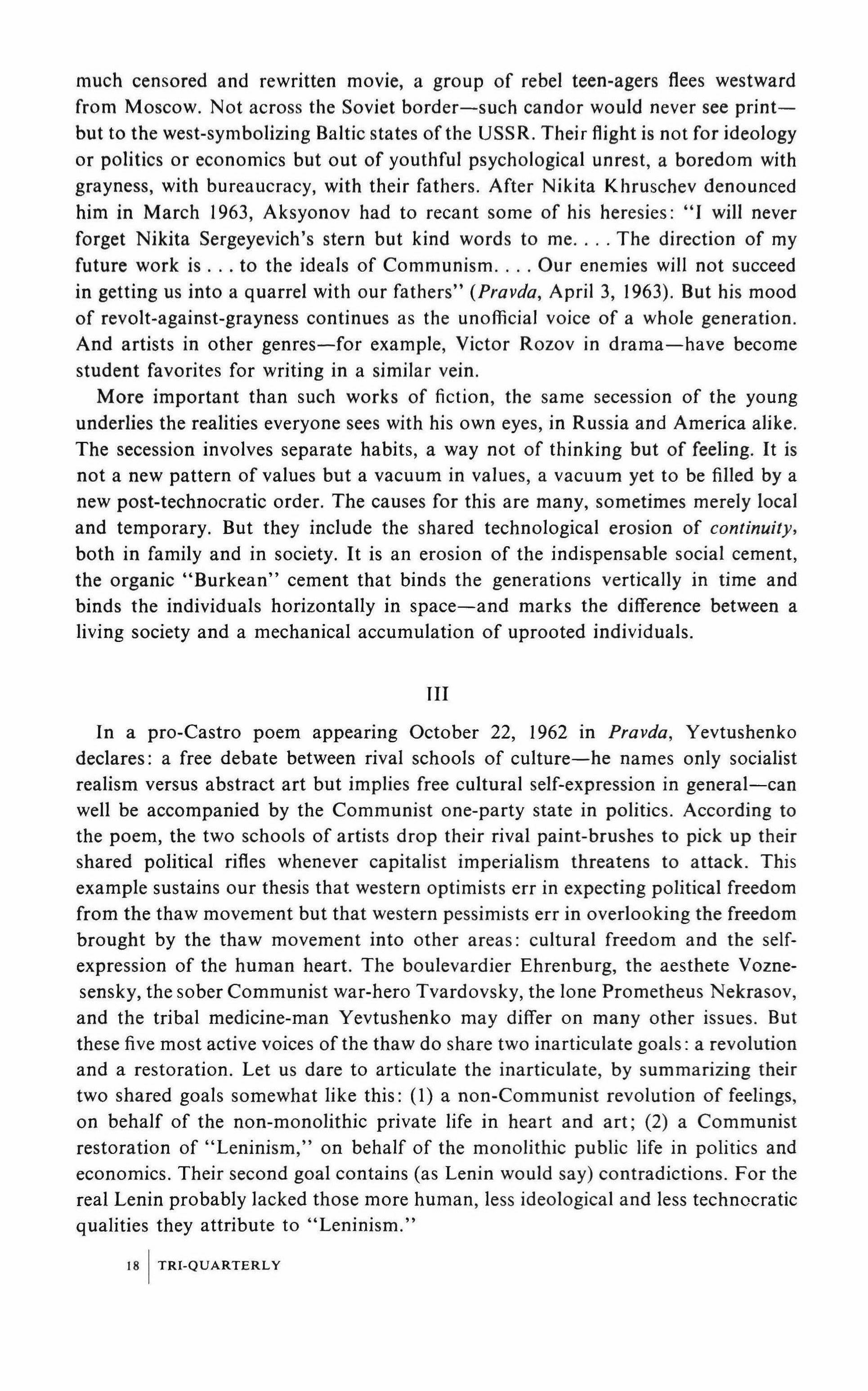
much censored and rewritten movie, a group of rebel teen-agers flees westward from Moscow. Not across the Soviet border-such candor would never see printbut to the west-symbolizing Baltic states of the USSR. Their flight is not for ideology or politics or economics but out of youthful psychological unrest, a boredom with grayness, with bureaucracy, with their fathers. After Nikita Khruschev denounced him in March 1963, Aksyonov had to recant some of his heresies: "I will never forget Nikita Sergeyevich's stern but kind words to me The direction of my future work is to the ideals of Communism Our enemies will not succeed in getting us into a quarrel with our fathers" (Pravda, April 3, 1963). But his mood of revolt-against-grayness continues as the unofficial voice of a whole generation. And artists in other genres-for example, Victor Rozov in drama-have become student favorites for writing in a similar vein.
More important than such works of fiction, the same secession of the young underlies the realities everyone sees with his own eyes, in Russia and America alike. The secession involves separate habits, a way not of thinking but of feeling. It is not a new pattern of values but a vacuum in values, a vacuum yet to be filled by a new post-technocratic order. The causes for this are many, sometimes merely local and temporary. But they include the shared technological erosion of continuity, both in family and in society. It is an erosion of the indispensable social cement, the organic "Burkean" cement that binds the generations vertically in time and binds the individuals horizontally in space-and marks the difference between a living society and a mechanical accumulation of uprooted individuals.
In a pro-Castro poem appearing October 22, 1962 in Pravda, Yevtushenko declares: a free debate between rival schools of culture-he names only socialist realism versus abstract art but implies free cultural self-expression in general-can well be accompanied by the Communist one-party state in politics. According to the poem, the two schools of artists drop their rival paint-brushes to pick up their shared political rifles whenever capitalist imperialism threatens to attack. This example sustains our thesis that western optimists err in expecting political freedom from the thaw movement but that western pessimists err in overlooking the freedom brought by the thaw movement into other areas: cultural freedom and the selfexpression of the human heart. The boulevardier Ehrenburg, the aesthete Voznesensky, the sober Communist war-hero Tvardovsky, the lone Prometheus Nekrasov, and the tribal medicine-man Yevtushenko may differ on many other issues. But these five most active voices of the thaw do share two inarticulate goals: a revolution and a restoration. Let us dare to articulate the inarticulate, by summarizing their two shared goals somewhat like this: (I) a non-Communist revolution of feelings, on behalf of the non-monolithic private life in heart and art; (2) a Communist restoration of "Leninism," on behalf of the monolithic public life in politics and economics. Their second goal contains (as Lenin would say) contradictions. For the real Lenin probably lacked those more human, less ideological and less technocratic qualities they attribute to "Leninism."
TRI-QUARTERLY
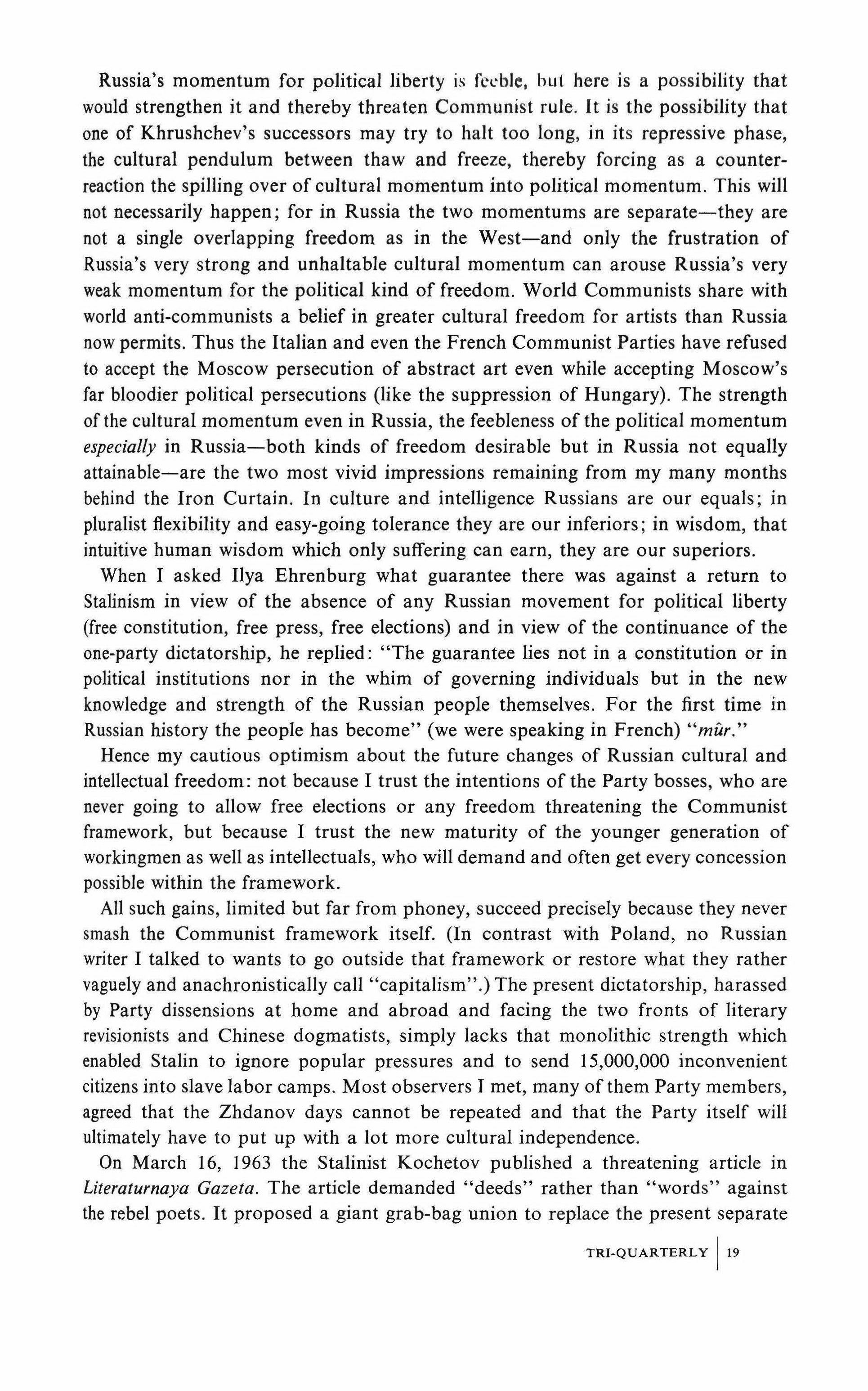
Russia's momentum for political liberty is feeble. but here is a possibility that would strengthen it and thereby threaten Communist rule. It is the possibility that one of Khrushchev's successors may try to halt too long, in its repressive phase, the cultural pendulum between thaw and freeze, thereby forcing as a counterreaction the spilling over of cultural momentum into political momentum. This will not necessarily happen; for in Russia the two momentums are separate-they are not a single overlapping freedom as in the West-and only the frustration of Russia's very strong and unhaltable cultural momentum can arouse Russia's very weak momentum for the political kind of freedom. World Communists share with world anti-communists a belief in greater cultural freedom for artists than Russia now permits. Thus the Italian and even the French Communist Parties have refused to accept the Moscow persecution of abstract art even while accepting Moscow's far bloodier political persecutions (like the suppression of Hungary). The strength of the cultural momentum even in Russia, the feebleness of the political momentum especially in Russia-both kinds of freedom desirable but in Russia not equally attainable-are the two most vivid impressions remaining from my many months behind the Iron Curtain. In culture and intelligence Russians are our equals; in pluralist flexibility and easy-going tolerance they are our inferiors; in wisdom, that intuitive human wisdom which only suffering can earn, they are our superiors.
When I asked lIya Ehrenburg what guarantee there was against a return to Stalinism in view of the absence of any Russian movement for political liberty (free constitution, free press, free elections) and in view of the continuance of the one-party dictatorship, he replied: "The guarantee lies not in a constitution or in political institutions nor in the whim of governing individuals but in the new knowledge and strength of the Russian people themselves. For the first time in Russian history the people has become" (we were speaking in French) "mur,"
Hence my cautious optimism about the future changes of Russian cultural and intellectual freedom: not because I trust the intentions of the Party bosses, who are never going to allow free elections or any freedom threatening the Communist framework, but because I trust the new maturity of the younger generation of workingmen as well as intellectuals, who will demand and often get every concession possible within the framework.
All such gains, limited but far from phoney, succeed precisely because they never smash the Communist framework itself. (In contrast with Poland, no Russian writer I talked to wants to go outside that framework or restore what they rather vaguely and anachronistically call "capitalism".) The present dictatorship, harassed by Party dissensions at home and abroad and facing the two fronts of literary revisionists and Chinese dogmatists, simply lacks that monolithic strength which enabled Stalin to ignore popular pressures and to send 15,000,000 inconvenient citizens into slave labor camps. Most observers J met, many of them Party members, agreed that the Zhdanov days cannot be repeated and that the Party itself will ultimately have to put up with a lot more cultural independence.
On March 16, 1963 the Stalinist Kochetov published a threatening article in Literaturnaya Gazeta. The article demanded "deeds" rather than "words" against the rebel poets. It proposed a giant grab-bag union to replace the present separate
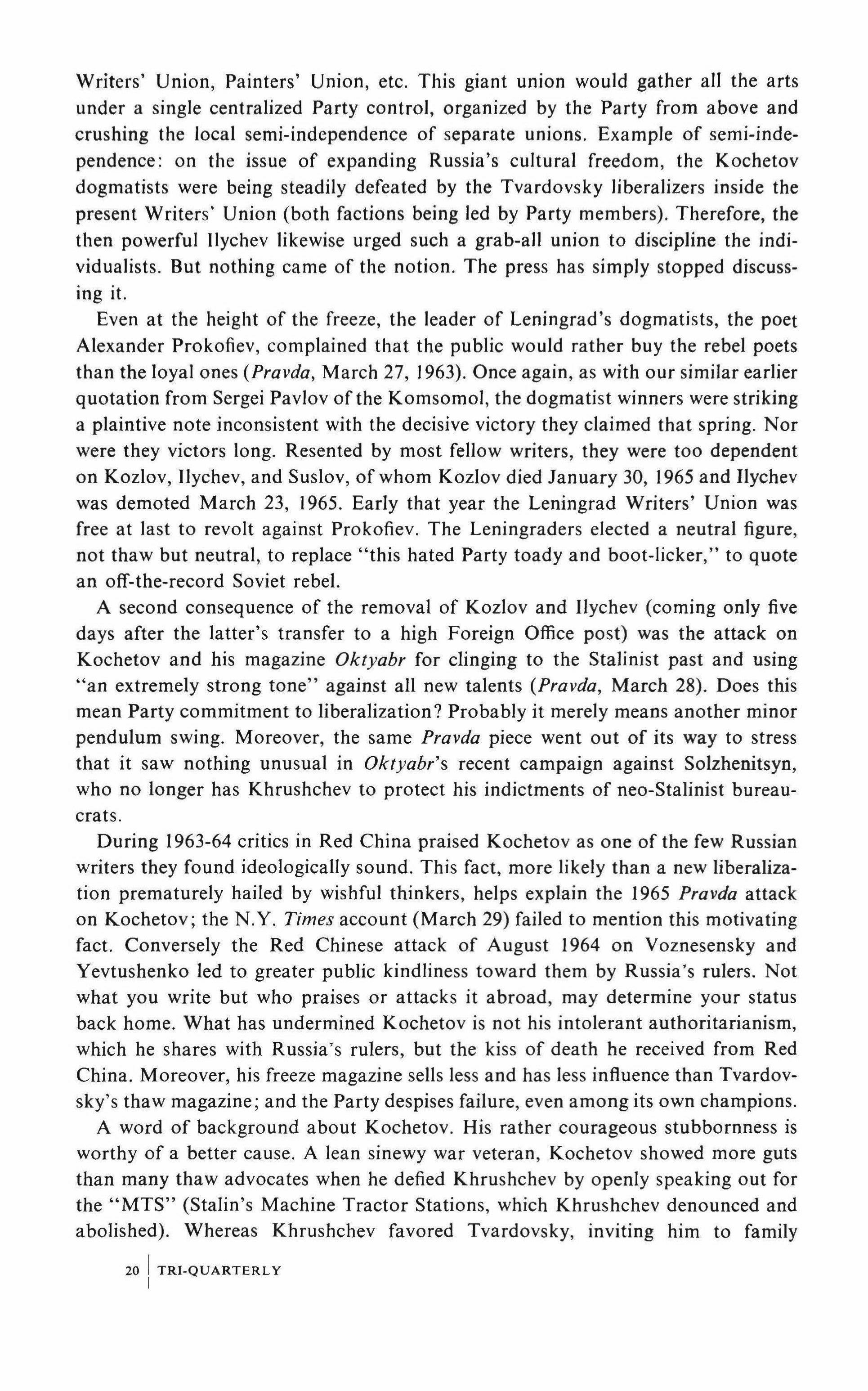
Writers' Union, Painters' Union, etc. This giant union would gather all the arts under a single centralized Party control, organized by the Party from above and crushing the local semi-independence of separate unions. Example of semi-independence: on the issue of expanding Russia's cultural freedom, the Kochetov dogmatists were being steadily defeated by the Tvardovsky Iiberalizers inside the present Writers' Union (both factions being led by Party members). Therefore, the then powerful I1ychev likewise urged such a grab-all union to discipline the individualists. But nothing came of the notion. The press has simply stopped discussing it.
Even at the height of the freeze, the leader of Leningrad's dogmatists, the poet Alexander Prokofiev, complained that the public would rather buy the rebel poets than the loyal ones (Pravda, March 27,1963). Once again, as with our similar earlier quotation from Sergei Pavlov of the Komsomol, the dogmatist winners were striking a plaintive note inconsistent with the decisive victory they claimed that spring. Nor were they victors long. Resented by most fellow writers, they were too dependent on Kozlov, Ilychev, and Suslov, of whom Kozlov died January 30, 1965 and I1ychev was demoted March 23, 1965. Early that year the Leningrad Writers' Union was free at last to revolt against Prokofiev. The Leningraders elected a neutral figure, not thaw but neutral, to replace "this hated Party toady and boot-licker," to quote an off-the-record Soviet rebel.
A second consequence of the removal of Kozlov and Ilychev (coming only five days after the latter's transfer to a high Foreign Office post) was the attack on Kochetov and his magazine Oktyabr for clinging to the Stalinist past and using "an extremely strong tone" against all new talents (Pravda, March 28). Does this mean Party commitment to liberalization? Probably it merely means another minor pendulum swing. Moreover, the same Pravda piece went out of its way to stress that it saw nothing unusual in Oktyabr's recent campaign against Solzhenitsyn, who no longer has Khrushchev to protect his indictments of neo-Stalinist bureaucrats.
During 1963-64 critics in Red China praised Kochetov as one of the few Russian writers they found ideologically sound. This fact, more likely than a new liberalization prematurely hailed by wishful thinkers, helps explain the 1965 Pravda attack on Kochetov; the N.Y. Times account (March 29) failed to mention this motivating fact. Conversely the Red Chinese attack of August 1964 on Voznesensky and Yevtushenko led to greater public kindliness toward them by Russia's rulers. Not what you write but who praises or attacks it abroad, may determine your status back home. What has undermined Kochetov is not his intolerant authoritarianism, which he shares with Russia's rulers, but the kiss of death he received from Red China. Moreover, his freeze magazine sells less and has less influence than Tvardovsky's thaw magazine; and the Party despises failure, even among its own champions.
A word of background about Kochetov. His rather courageous stubbornness is worthy of a better cause. A lean sinewy war veteran, Kochetov showed more guts than many thaw advocates when he defied Khrushchev by openly speaking out for the "MTS" (Stalin's Machine Tractor Stations, which Khrushchev denounced and abolished). Whereas Khrushchev favored Tvardovsky, inviting him to family 20 TRI-QVARTERL Y
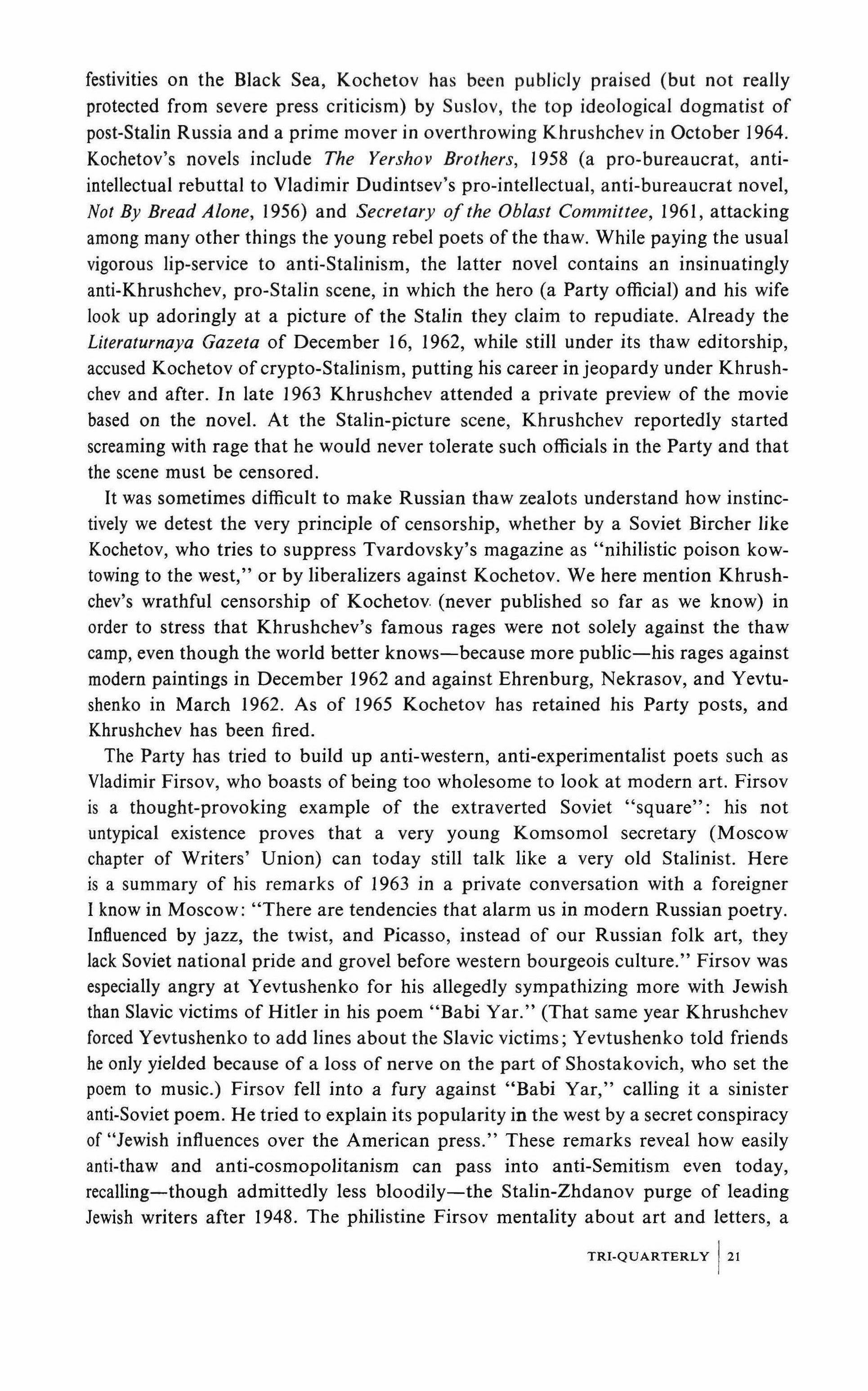
festivities on the Black Sea, Kochetov has been publicly praised (but not really protected from severe press criticism) by Suslov, the top ideological dogmatist of post-Stalin Russia and a prime mover in overthrowing Khrushchev in October 1964. Kochetov's novels include The Yershov Brothers, 1958 (a pro-bureaucrat, antiintellectual rebuttal to Vladimir Dudintsev's pro-intellectual, anti-bureaucrat novel, Not By Bread Alone, 1956) and Secretary of the Oblast Committee, 1961, attacking among many other things the young rebel poets of the thaw. While paying the usual vigorous lip-service to anti-Stalinism, the latter novel contains an insinuatingly anti-Khrushchev, pro-Stalin scene, in which the hero (a Party official) and his wife look up adoringly at a picture of the Stalin they claim to repudiate. Already the Literaturnaya Gazeta of December 16, 1962, while still under its thaw editorship, accused Kochetov of crypto-Stalinism, putting his career in jeopardy under Khrushchev and after. In late 1963 Khrushchev attended a private preview of the movie based on the novel. At the Stalin-picture scene, Khrushchev reportedly started screaming with rage that he would never tolerate such officials in the Party and that the scene must be censored.
It was sometimes difficult to make Russian thaw zealots understand how instinctively we detest the very principle of censorship, whether by a Soviet Bircher like Kochetov, who tries to suppress Tvardovsky's magazine as "nihilistic poison kowtowing to the west," or by liberalizers against Kochetov. We here mention Khrushchev's wrathful censorship of Kochetov. (never published so far as we know) in order to stress that Khrushchev's famous rages were not solely against the thaw camp, even though the world better knows-because more public-his rages against modern paintings in December 1962 and against Ehrenburg, Nekrasov, and Yevtushenko in March 1962. As of 1965 Kochetov has retained his Party posts, and Khrushchev has been fired.
The Party has tried to build up anti-western, anti-experimentalist poets such as Vladimir Firsov, who boasts of being too wholesome to look at modern art. Firsov is a thought-provoking example of the extraverted Soviet "square": his not untypical existence proves that a very young Komsomol secretary (Moscow chapter of Writers' Union) can today still talk like a very old Stalinist. Here is a summary of his remarks of 1963 in a private conversation with a foreigner I know in Moscow: "There are tendencies that alarm us in modern Russian poetry. Influenced by jazz, the twist, and Picasso, instead of our Russian folk art, they lack Soviet national pride and grovel before western bourgeois culture." Firsov was especially angry at Yevtushenko for his allegedly sympathizing more with Jewish than Slavic victims of Hitler in his poem "Babi Yar." (That same year Khrushchev forced Yevtushenko to add lines about the Slavic victims; Yevtushenko told friends he only yielded because of a loss of nerve on the part of Shostakovich, who set the poem to music.) Firsov fell into a fury against "Babi Yar," calling it a sinister anti-Soviet poem. He tried to explain its popularity in the west by a secret conspiracy of "Jewish influences over the American press." These remarks reveal how easily anti-thaw and anti-cosmopolitanism can pass into anti-Semitism even today, recalling-though admittedly less bloodily-the Stalin-Zhdanov purge of leading Jewish writers after 1948. The philistine Firsov mentality about art and letters, a
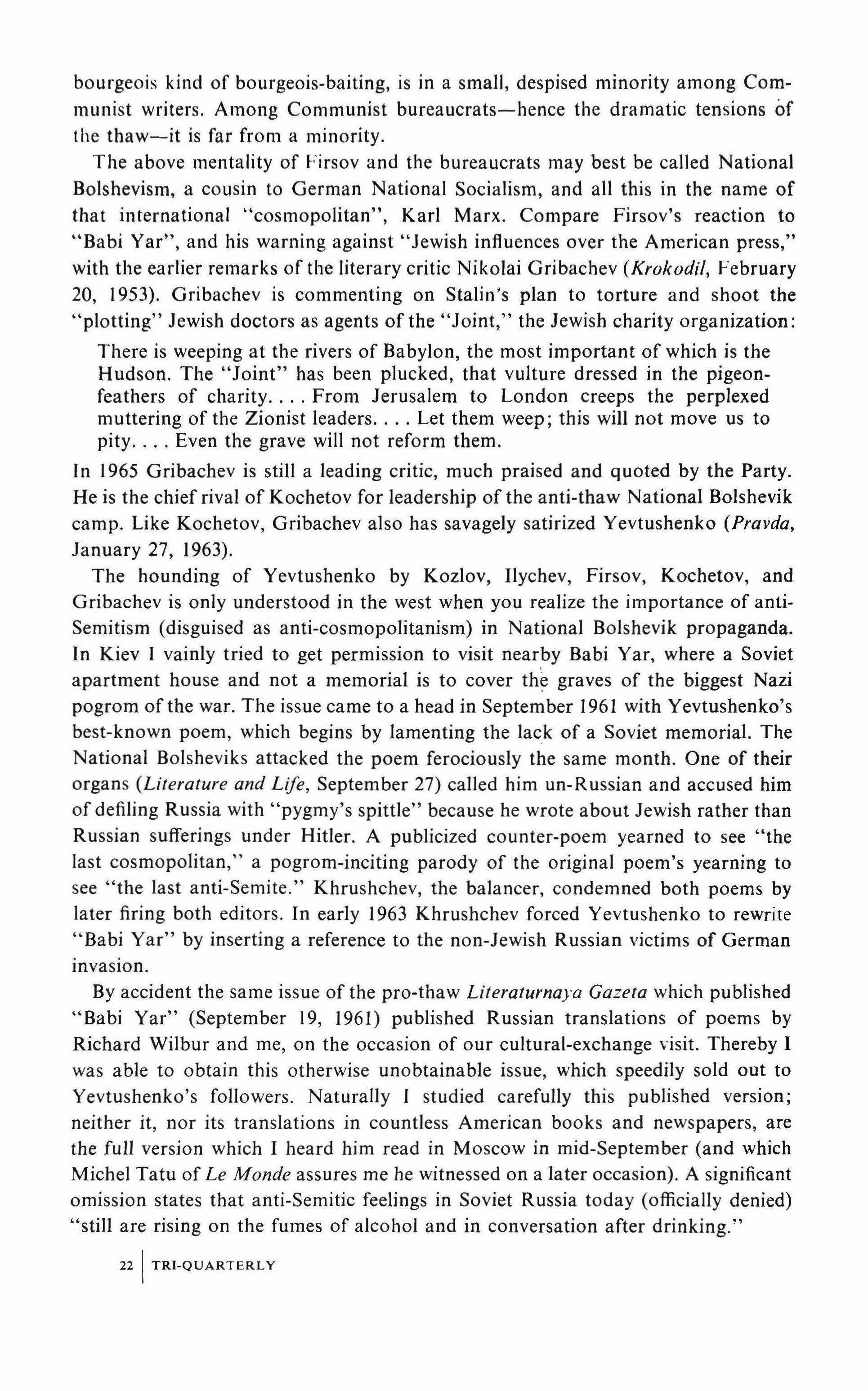
bourgeois kind of bourgeois-baiting, is in a small, despised minority among Communist writers. Among Communist bureaucrats-hence the dramatic tensions of the thaw-it is far from a minority.
The above mentality of Firsov and the bureaucrats may best be called National Bolshevism, a cousin to German National Socialism, and all this in the name of that international "cosmopolitan", Karl Marx. Compare Firsov's reaction to "Babi Yar", and his warning against "Jewish influences over the American press," with the earlier remarks of the literary critic Nikolai Gribachev (Krokodil, February 20, 1953). Gribachev is commenting on Stalin's plan to torture and shoot the "plotting" Jewish doctors as agents of the "Joint," the Jewish charity organization:
There is weeping at the rivers of Babylon, the most important of which is the Hudson. The "Joint" has been plucked, that vulture dressed in the pigeonfeathers of charity From Jerusalem to London creeps the perplexed muttering of the Zionist leaders Let them weep; this will not move us to pity Even the grave will not reform them.
In 1965 Gribachev is still a leading critic, much praised and quoted by the Party. He is the chief rival of Kochetov for leadership of the anti-thaw National Bolshevik camp. Like Kochetov, Gribachev also has savagely satirized Yevtushenko (Pravda, January 27, 1963).
The hounding of Yevtushenko by Kozlov, Ilychev, Firsov, Kochetov, and Gribachev is only understood in the west when you realize the importance of antiSemitism (disguised as anti-cosmopolitanism) in National Bolshevik propaganda. In Kiev I vainly tried to get permission to visit nearby Babi Yar, where a Soviet apartment house and not a memorial is to cover th� graves of the biggest Nazi pogrom of the war. The issue came to a head in September 1961 with Yevtushenko's best-known poem, which begins by lamenting the lack of a Soviet memorial. The National Bolsheviks attacked the poem ferociously the same month. One of their organs (Literature and Life, September 27) called him un-Russian and accused him of defiling Russia with "pygmy's spittle" because he wrote about Jewish rather than Russian sufferings under Hitler. A publicized counter-poem yearned to see "the last cosmopolitan," a pogrom-inciting parody of the original poem's yearning to see "the last anti-Semite." Khrushchev, the balancer, condemned both poems by later firing both editors. In early I 963 Khrushchev forced Yevtushenko to rewrite "Babi Yar" by inserting a reference to the non-Jewish Russian victims of German invasion.
By accident the same issue of the pro-thaw Literaturnaya Gazeta which published "Babi Yar" (September 19, 1961) published Russian translations of poems by Richard Wilbur and me, on the occasion of our cultural-exchange visit. Thereby I was able to obtain this otherwise unobtainable issue, which speedily sold out to Yevtushenko's followers. Naturally I studied carefully this published version; neither it, nor its translations in countless American books and newspapers, are the full version which I heard him read in Moscow in mid-September (and which Michel Tatu of Le Monde assures me he witnessed on a later occasion). A significant omission states that anti-Semitic feelings in Soviet Russia today (officially denied) "still are rising on the fumes of alcohol and in conversation after drinking." 221 TRI-QUARTERLY
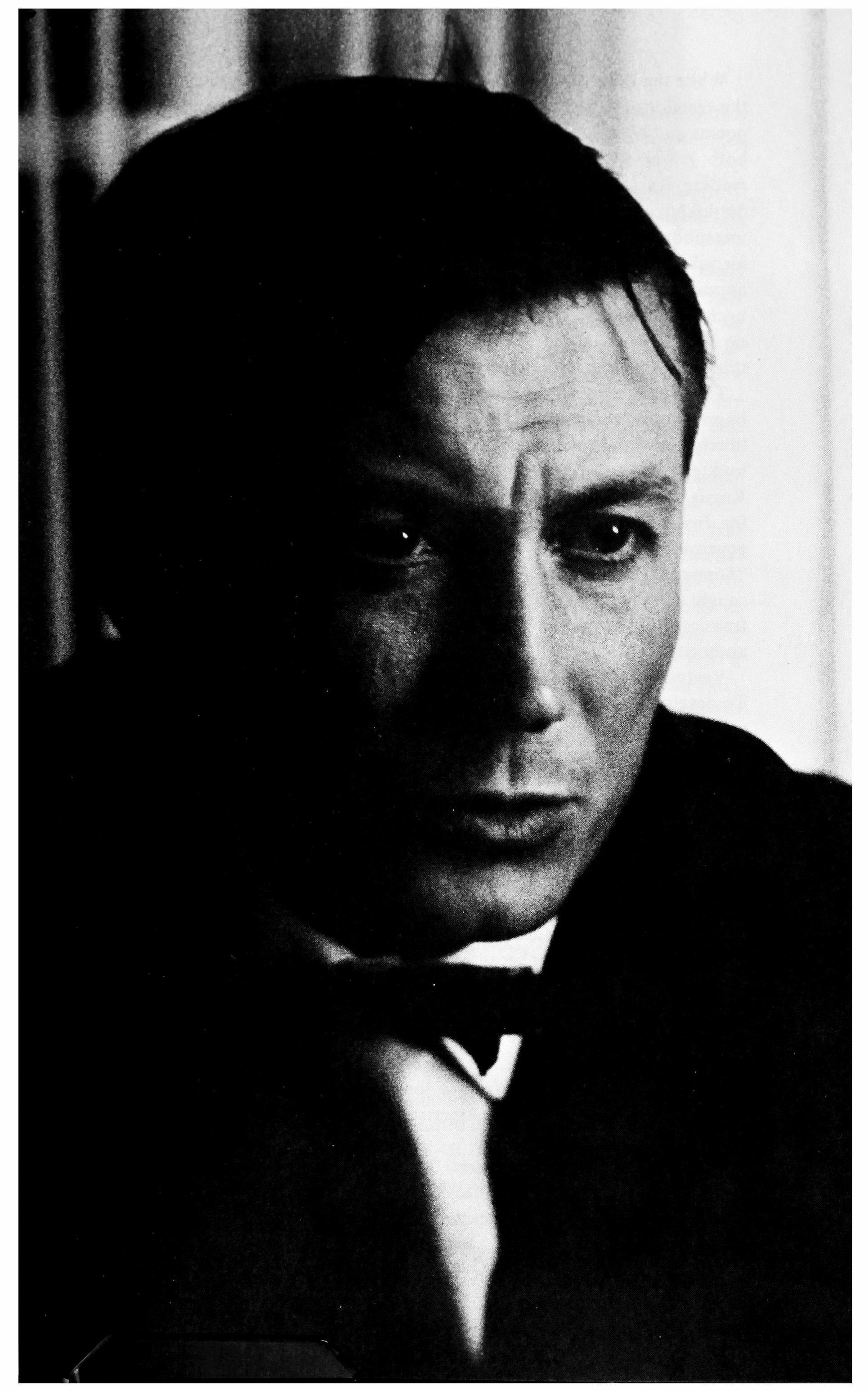
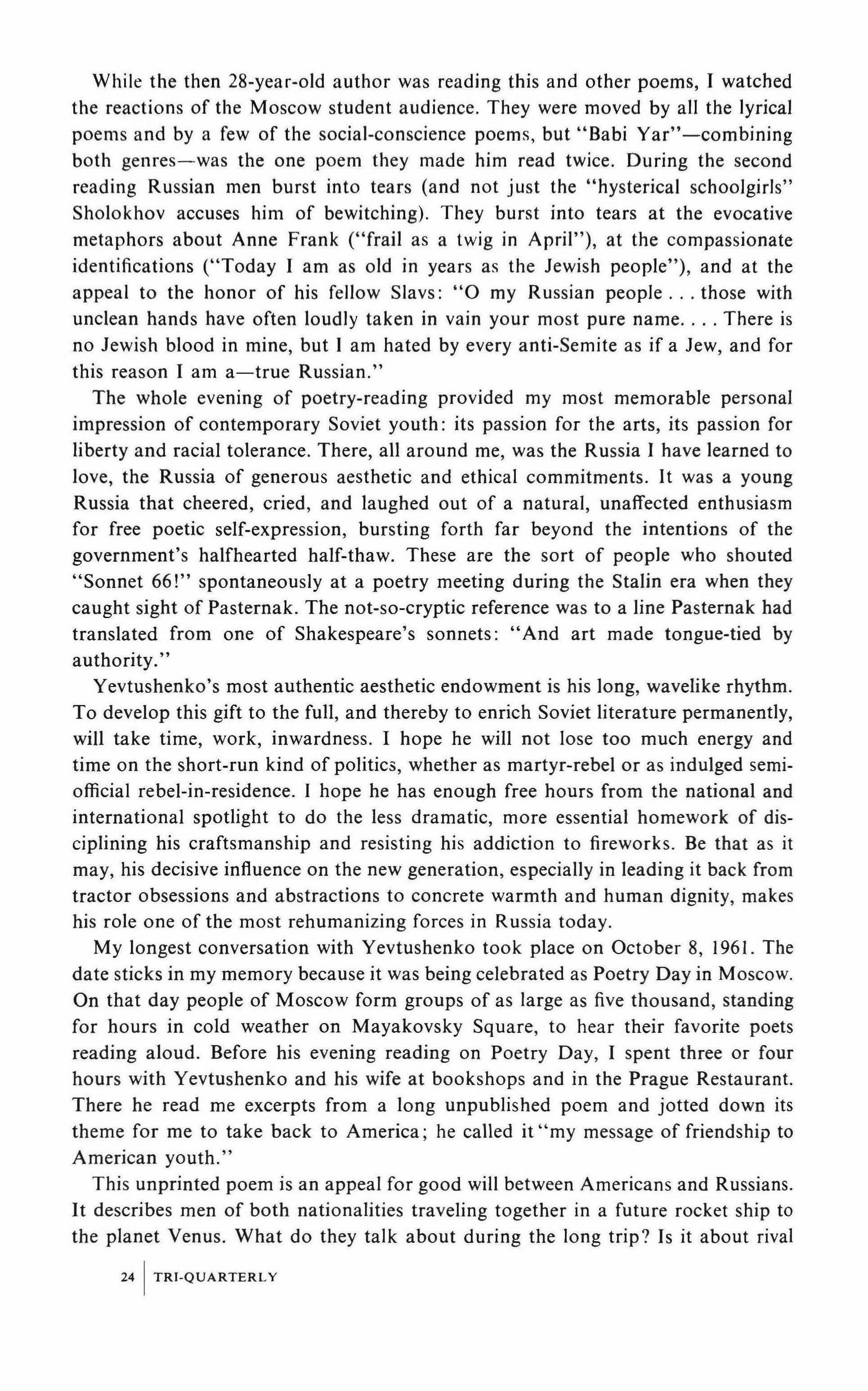
While the then 28-year-old author was reading this and other poems, I watched the reactions of the Moscow student audience. They were moved by all the lyrical poems and by a few of the social-conscience poems, but "Babi Yar"-combining both genres-was the one poem they made him read twice. During the second reading Russian men burst into tears (and not just the "hysterical schoolgirls" Sholokhov accuses him of bewitching). They burst into tears at the evocative metaphors about Anne Frank ("frail as a twig in April"), at the compassionate identifications ("Today I am as old in years as the Jewish people"), and at the appeal to the honor of his fellow Slavs: "0 my Russian people those with unclean hands have often loudly taken in vain your most pure name There is no Jewish blood in mine, but I am hated by every anti-Semite as if a Jew, and for this reason I am a-true Russian."
The whole evening of poetry-reading provided my most memorable personal impression of contemporary Soviet youth: its passion for the arts, its passion for liberty and racial tolerance. There, all around me, was the Russia I have learned to love, the Russia of generous aesthetic and ethical commitments. It was a young Russia that cheered, cried, and laughed out of a natural, unaffected enthusiasm for free poetic self-expression, bursting forth far beyond the intentions of the government's halfhearted half-thaw. These are the sort of people who shouted "Sonnet 66!" spontaneously at a poetry meeting during the Stalin era when they caught sight of Pasternak. The not-so-cryptic reference was to a line Pasternak had translated from one of Shakespeare's sonnets: "And art made tongue-tied by authority.'
Yevtushenko's most authentic aesthetic endowment is his long, wavelike rhythm. To develop this gift to the full, and thereby to enrich Soviet literature permanently, will take time, work, inwardness. I hope he will not lose too much energy and time on the short-run kind of politics, whether as martyr-rebel or as indulged semiofficial rebel-in-residence. I hope he has enough free hours from the national and international spotlight to do the less dramatic, more essential homework of disciplining his craftsmanship and resisting his addiction to fireworks. Be that as it may, his decisive influence on the new generation, especially in leading it back from tractor obsessions and abstractions to concrete warmth and human dignity, makes his role one of the most rehumanizing forces in Russia today.
My longest conversation with Yevtushenko took place on October 8, 1961. The date sticks in my memory because it was being celebrated as Poetry Day in Moscow. On that day people of Moscow form groups of as large as five thousand, standing for hours in cold weather on Mayakovsky Square, to hear their favorite poets reading aloud. Before his evening reading on Poetry Day, I spent three or four hours with Yevtushenko and his wife at bookshops and in the Prague Restaurant. There he read me excerpts from a long unpublished poem and jotted down its theme for me to take back to America; he called it "my message of friendship to American youth."
This unprinted poem is an appeal for good will between Americans and Russians. It describes men of both nationalities traveling together in a future rocket ship to the planet Venus. What do they talk about during the long trip? Is it about rival
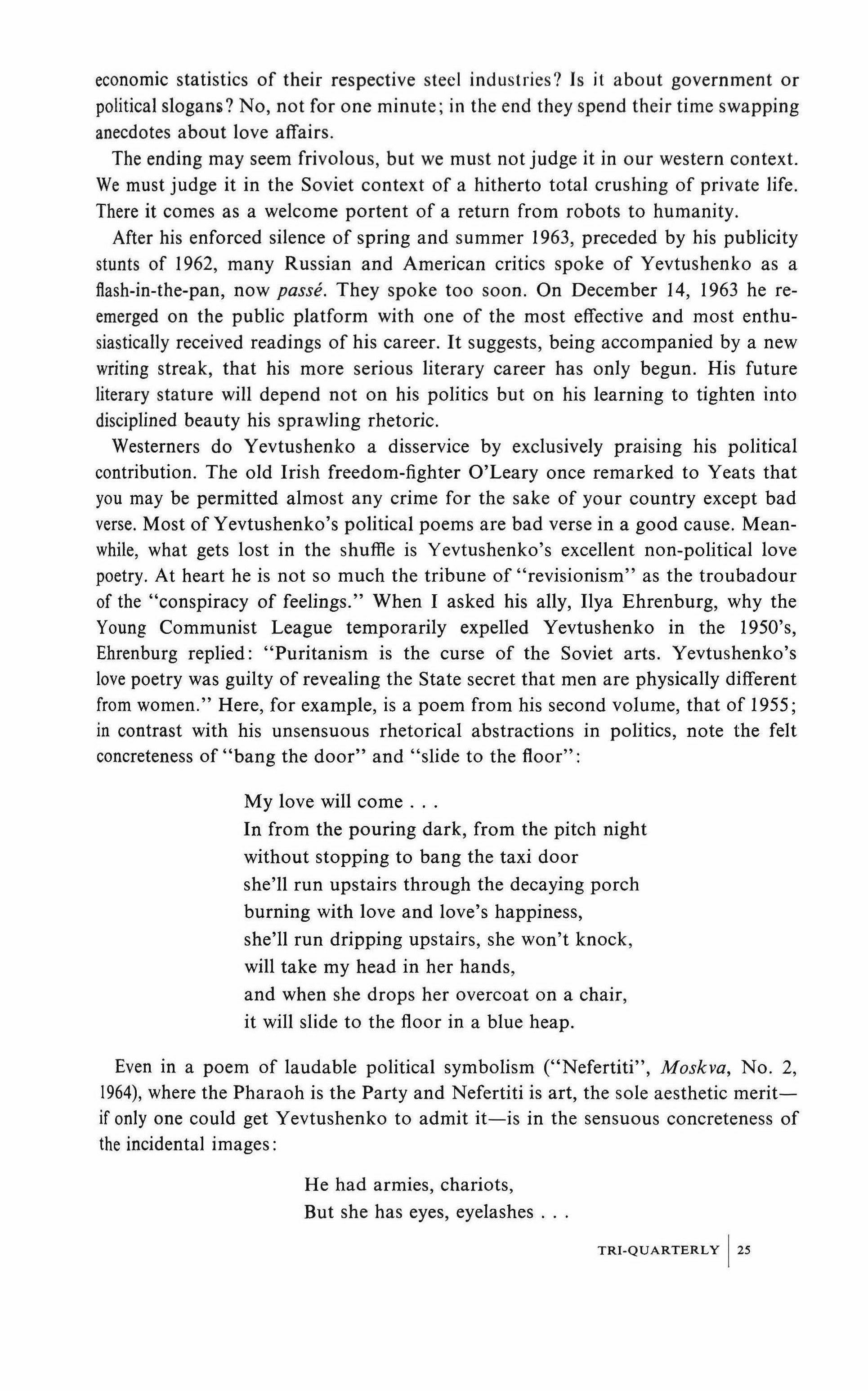
economic statistics of their respective steel industries? Is it about government or political slogans? No, not for one minute; in the end they spend their time swapping anecdotes about love affairs.
The ending may seem frivolous, but we must not judge it in our western context. We must judge it in the Soviet context of a hitherto total crushing of private life. There it comes as a welcome portent of a return from robots to humanity.
After his enforced silence of spring and summer 1963, preceded by his publicity stunts of 1962, many Russian and American critics spoke of Yevtushenko as a fiash-in-the-pan, now passe. They spoke too soon. On December 14, 1963 he reemerged on the public platform with one of the most effective and most enthusiastically received readings of his career. It suggests, being accompanied by a new writing streak, that his more serious literary career has only begun. His future literary stature will depend not on his politics but on his learning to tighten into disciplined beauty his sprawling rhetoric.
Westerners do Yevtushenko a disservice by exclusively praising his political contribution. The old Irish freedom-fighter O'Leary once remarked to Yeats that you may be permitted almost any crime for the sake of your country except bad verse. Most of Yevtushenko's political poems are bad verse in a good cause. Meanwhile, what gets lost in the shuffle is Yevtushenko's excellent non-political love poetry. At heart he is not so much the tribune of "revisionism" as the troubadour of the "conspiracy of feelings." When I asked his ally, Ilya Ehrenburg, why the Young Communist League temporarily expelled Yevtushenko in the 1950's, Ehrenburg replied: "Puritanism is the curse of the Soviet arts. Yevtushenko's love poetry was guilty of revealing the State secret that men are physically different from women." Here, for example, is a poem from his second volume, that of 1955; in contrast with his unsensuous rhetorical abstractions in politics, note the felt concreteness of "bang the door" and "slide to the floor":
My love will come
In from the pouring dark, from the pitch night without stopping to bang the taxi door she'll run upstairs through the decaying porch burning with love and love's happiness, she'll run dripping upstairs, she won't knock, will take my head in her hands, and when she drops her overcoat on a chair, it will slide to the floor in a blue heap.
Even in a poem of laudable political symbolism ("Nefertiti", Moskva, No.2, 1964), where the Pharaoh is the Party and Nefertiti is art, the sole aesthetic meritif only one could get Yevtushenko to admit it-is in the sensuous concreteness of the incidental images:
He had armies, chariots, But she has eyes, eyelashes
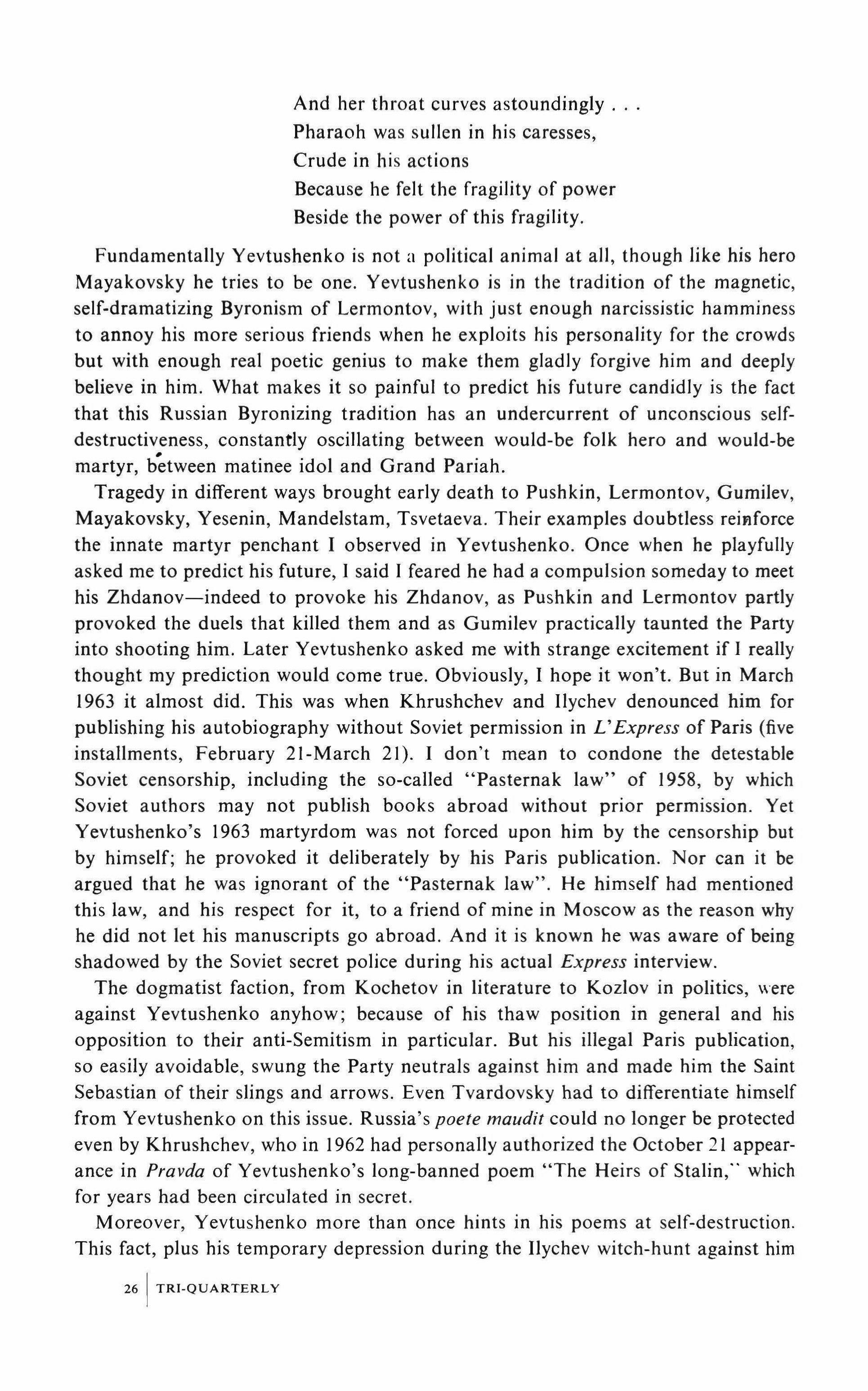
And her throat curves astoundingly Pharaoh was sullen in his caresses, Crude in his actions
Because he felt the fragility of power
Beside the power of this fragility.
Fundamentally Yevtushenko is not a political animal at all, though like his hero Mayakovsky he tries to be one. Yevtushenko is in the tradition of the magnetic, self-dramatizing Byronism of Lermontov, with just enough narcissistic hamminess to annoy his more serious friends when he exploits his personality for the crowds but with enough real poetic genius to make them gladly forgive him and deeply believe in him. What makes it so painful to predict his future candidly is the fact that this Russian Byronizing tradition has an undercurrent of unconscious selfdestructiveness, constantly oscillating between would-be folk hero and would-be martyr, b�tween matinee idol and Grand Pariah.
Tragedy in different ways brought early death to Pushkin, Lermontov, Gumilev, Mayakovsky, Yesenin, Mandelstam, Tsvetaeva. Their examples doubtless reinforce the innate martyr penchant I observed in Yevtushenko. Once when he playfully asked me to predict his future, I said I feared he had a compulsion someday to meet his Zhdanov-indeed to provoke his Zhdanov, as Pushkin and Lermontov partly provoked the duels that killed them and as Gumilev practically taunted the Party into shooting him. Later Yevtushenko asked me with strange excitement if I really thought my prediction would come true. Obviously, I hope it won't. But in March 1963 it almost did. This was when Khrushchev and Ilychev denounced him for publishing his autobiography without Soviet permission in L'Express of Paris (five installments, February 21-March 21). I don't mean to condone the detestable Soviet censorship, including the so-called "Pasternak law" of 1958, by which Soviet authors may not publish books abroad without prior permission. Yet Yevtushenko's 1963 martyrdom was not forced upon him by the censorship but by himself; he provoked it deliberately by his Paris publication. Nor can it be argued that he was ignorant of the "Pasternak law". He himself had mentioned this law, and his respect for it, to a friend of mine in Moscow as the reason why he did not let his manuscripts go abroad. And it is known he was aware of being shadowed by the Soviet secret police during his actual Express interview.
The dogmatist faction, from Kochetov in literature to Kozlov in politics, were against Yevtushenko anyhow; because of his thaw position in general and his opposition to their anti-Semitism in particular. But his illegal Paris publication, so easily avoidable, swung the Party neutrals against him and made him the Saint Sebastian of their slings and arrows. Even Tvardovsky had to differentiate himself from Yevtushenko on this issue. Russia's poete maudit could no longer be protected even by Khrushchev, who in 1962 had personally authorized the October 21 appearance in Pravda of Yevtushenko's long-banned poem "The Heirs of Stalin," which for years had been circulated in secret.
Moreover, Yevtushenko more than once hints in his poems at self-destruction. This fact, plus his temporary depression during the Ilychev witch-hunt against him
TRI-QUARTERLY
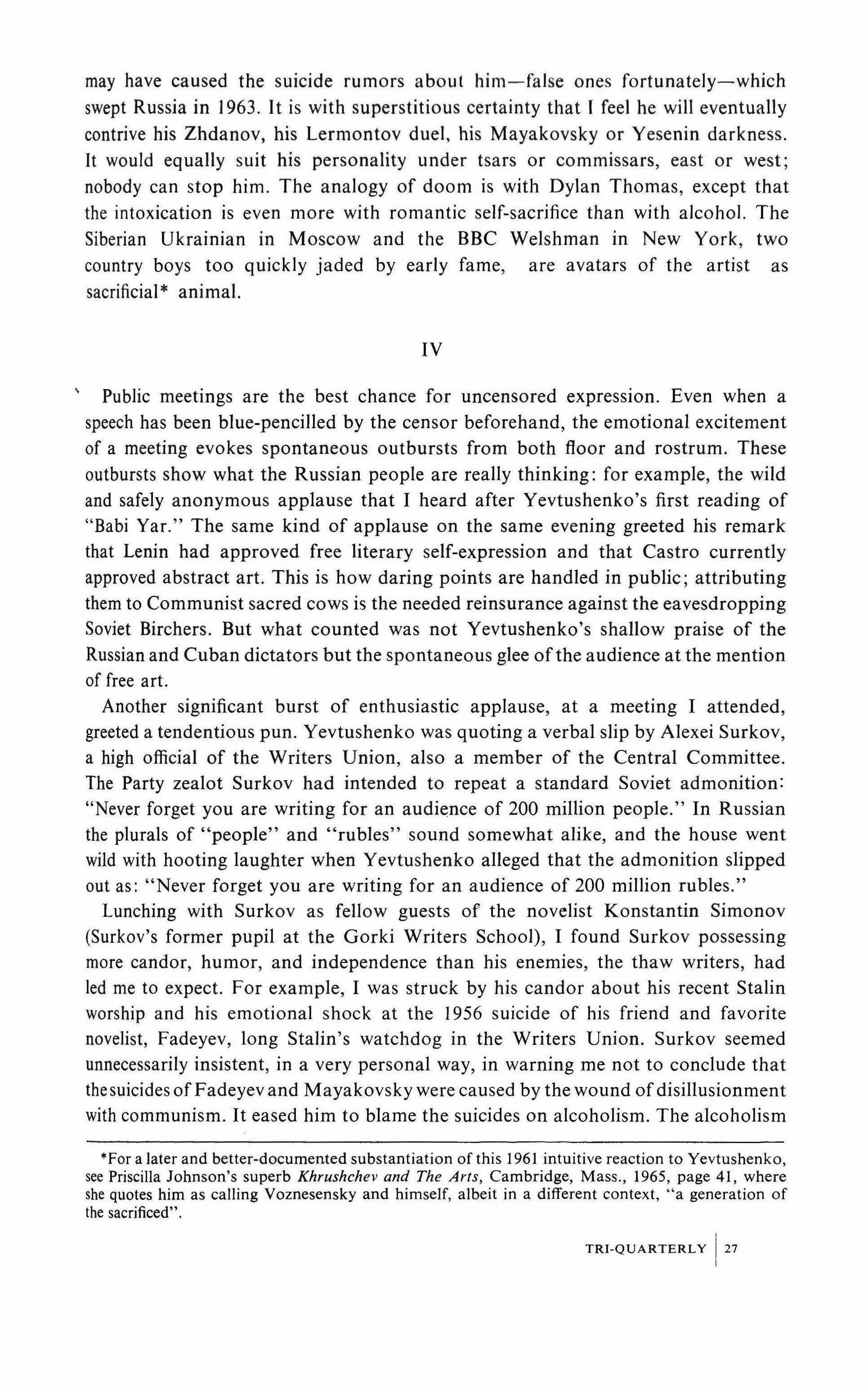
may have caused the suicide rumors about him-false ones fortunately-which swept Russia in 1963. It is with superstitious certainty that I feel he will eventually contrive his Zhdanov, his Lermontov duel, his Mayakovsky or Yesenin darkness. It would equally suit his personality under tsars or commissars, east or west; nobody can stop him. The analogy of doom is with Dylan Thomas, except that the intoxication is even more with romantic self-sacrifice than with alcohol. The Siberian Ukrainian in Moscow and the BBC Welshman in New York, two country boys too quickly jaded by early fame, are avatars of the artist as sacrificial * animal.
Public meetings are the best chance for uncensored expression. Even when a speech has been blue-pencilled by the censor beforehand, the emotional excitement of a meeting evokes spontaneous outbursts from both floor and rostrum. These outbursts show what the Russian people are really thinking: for example, the wild and safely anonymous applause that I heard after Yevtushenko's first reading of "Babi Yar." The same kind of applause on the same evening greeted his remark that Lenin had approved free literary self-expression and that Castro currently approved abstract art. This is how daring points are handled in public; attributing them to Communist sacred cows is the needed reinsurance against the eavesdropping Soviet Birchers. But what counted was not Yevtushenko's shallow praise of the Russian and Cuban dictators but the spontaneous glee of the audience at the mention of free art.
Another significant burst of enthusiastic applause, at a meeting I attended, greeted a tendentious pun. Yevtushenko was quoting a verbal slip by Alexei Surkov, a high official of the Writers Union, also a member of the Central Committee. The Party zealot Surkov had intended to repeat a standard Soviet admonition: "Never forget you are writing for an audience of 200 million people." In Russian the plurals of "people" and "rubles" sound somewhat alike, and the house went wild with hooting laughter when Yevtushenko alleged that the admonition slipped out as: "Never forget you are writing for an audience of 200 million rubles."
Lunching with Surkov as fellow guests of the novelist Konstantin Simonov (Surkov's former pupil at the Gorki Writers School), I found Surkov possessing more candor, humor, and independence than his enemies, the thaw writers, had led me to expect. For example, I was struck by his candor about his recent Stalin worship and his emotional shock at the 1956 suicide of his friend and favorite novelist, Fadeyev, long Stalin's watchdog in the Writers Union. Surkov seemed unnecessarily insistent, in a very personal way, in warning me not to conclude that thesuicides ofFadeyev and Mayakovsky were caused by the wound ofdisillusionment with communism. It eased him to blame the suicides on alcoholism. The alcoholism
"For a later and better-documented substantiation of this 1961 intuitive reaction to Yevtushenko, see Priscilla Johnson's superb Khrushchev and The Arts, Cambridge, Mass., 1965, page 41, where she quotes him as calling Voznesensky and himself, albeit in a different context, "a generation of the sacrificed".
TRI-QUARTERLY 127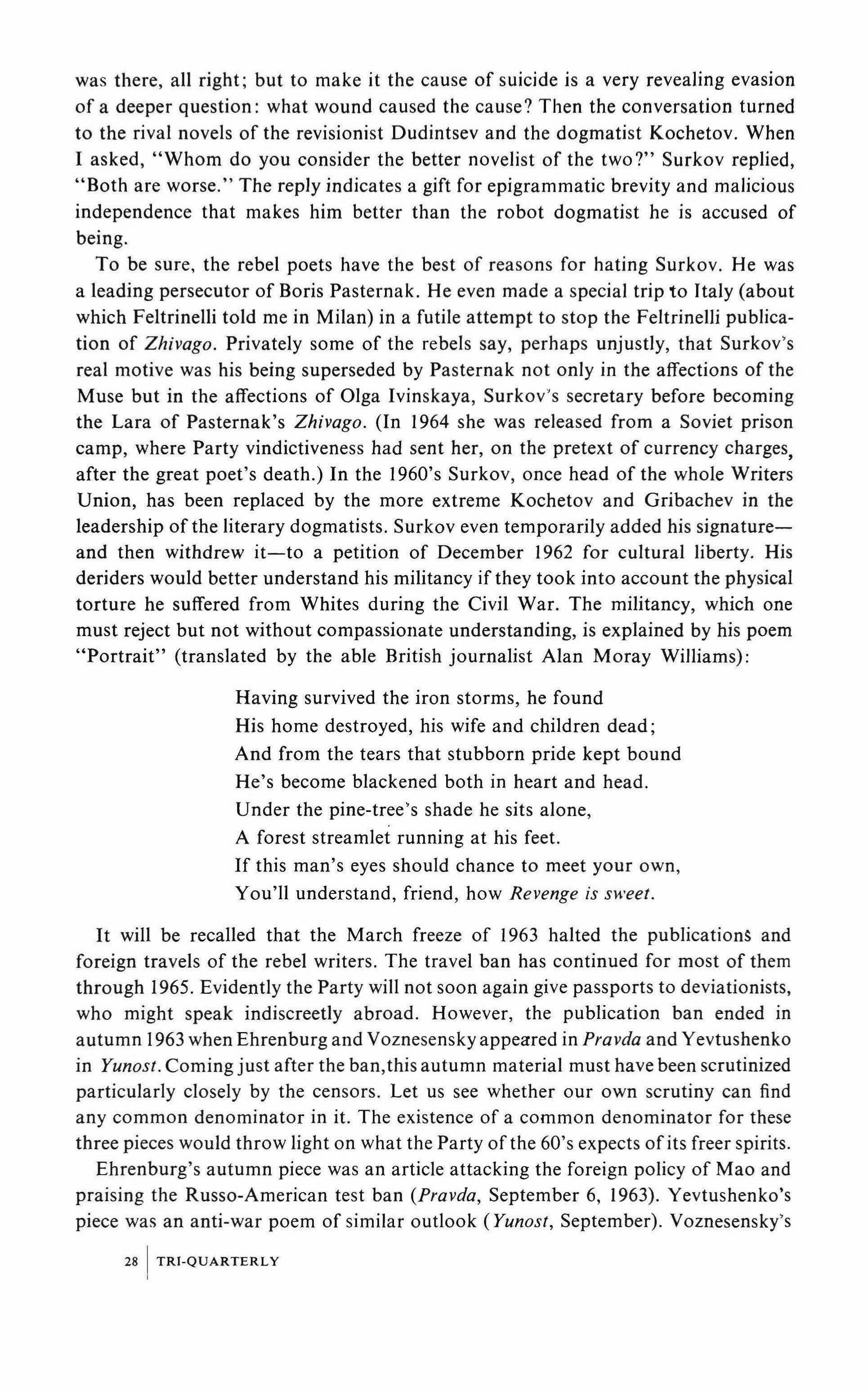
was there, all right; but to make it the cause of suicide is a very revealing evasion of a deeper question: what wound caused the cause? Then the conversation turned to the rival novels of the revisionist Dudintsev and the dogmatist Kochetov. When I asked, "Whom do you consider the better novelist of the two?" Surkov replied, "Both are worse." The reply indicates a gift for epigrammatic brevity and malicious independence that makes him better than the robot dogmatist he is accused of being.
To be sure, the rebel poets have the best of reasons for hating Surkov. He was a leading persecutor of Boris Pasternak. He even made a special trip to Italy (about which Feltrinelli told me in Milan) in a futile attempt to stop the Feltrinelli publication of Zhivago. Privately some of the rebels say, perhaps unjustly, that Surkov's real motive was his being superseded by Pasternak not only in the affections of the Muse but in the affections of Olga Ivinskaya, Surkov's secretary before becoming the Lara of Pasternak's Zhivago, (In 1964 she was released from a Soviet prison camp, where Party vindictiveness had sent her, on the pretext of currency charges, after the great poet's death.) In the 1960's Surkov, once head of the whole Writers Union, has been replaced by the more extreme Kochetov and Gribachev in the leadership of the literary dogmatists. Surkov even temporarily added his signatureand then withdrew it-to a petition of December 1962 for cultural liberty. His deriders would better understand his militancy if they took into account the physical torture he suffered from Whites during the Civil War. The militancy, which one must reject but not without compassionate understanding, is explained by his poem "Portrait" (translated by the able British journalist Alan Moray Williams):
Having survived the iron storms, he found His home destroyed, his wife and children dead; And from the tears that stubborn pride kept bound He's become blackened both in heart and head.
Under the pine-tree's shade he sits alone, A forest streamlet running at his feet.
If this man's eyes should chance to meet your own, You'll understand, friend, how Revenge is sweet.
It will be recalled that the March freeze of 1963 halted the publications and foreign travels of the rebel writers. The travel ban has continued for most of them through 1965. Evidently the Party will not soon again give passports to deviationists, who might speak indiscreetly abroad. However, the publication ban ended in autumn 1963 when Ehrenburg and Voznesenskyappeared in Pravda and Yevtushenko in Yunost. Coming just after the ban,this autumn material must have been scrutinized particularly closely by the censors. Let us see whether our own scrutiny can find any common denominator in it. The existence of a common denominator for these three pieces would throw light on what the Party of the 60's expects of its freer spirits.
Ehrenburg's autumn piece was an article attacking the foreign policy of Mao and praising the Russo-American test ban (Pravda, September 6, 1963). Yevtushenko's piece was an anti-war poem of similar outlook (Yunost, September). Voznesensky's
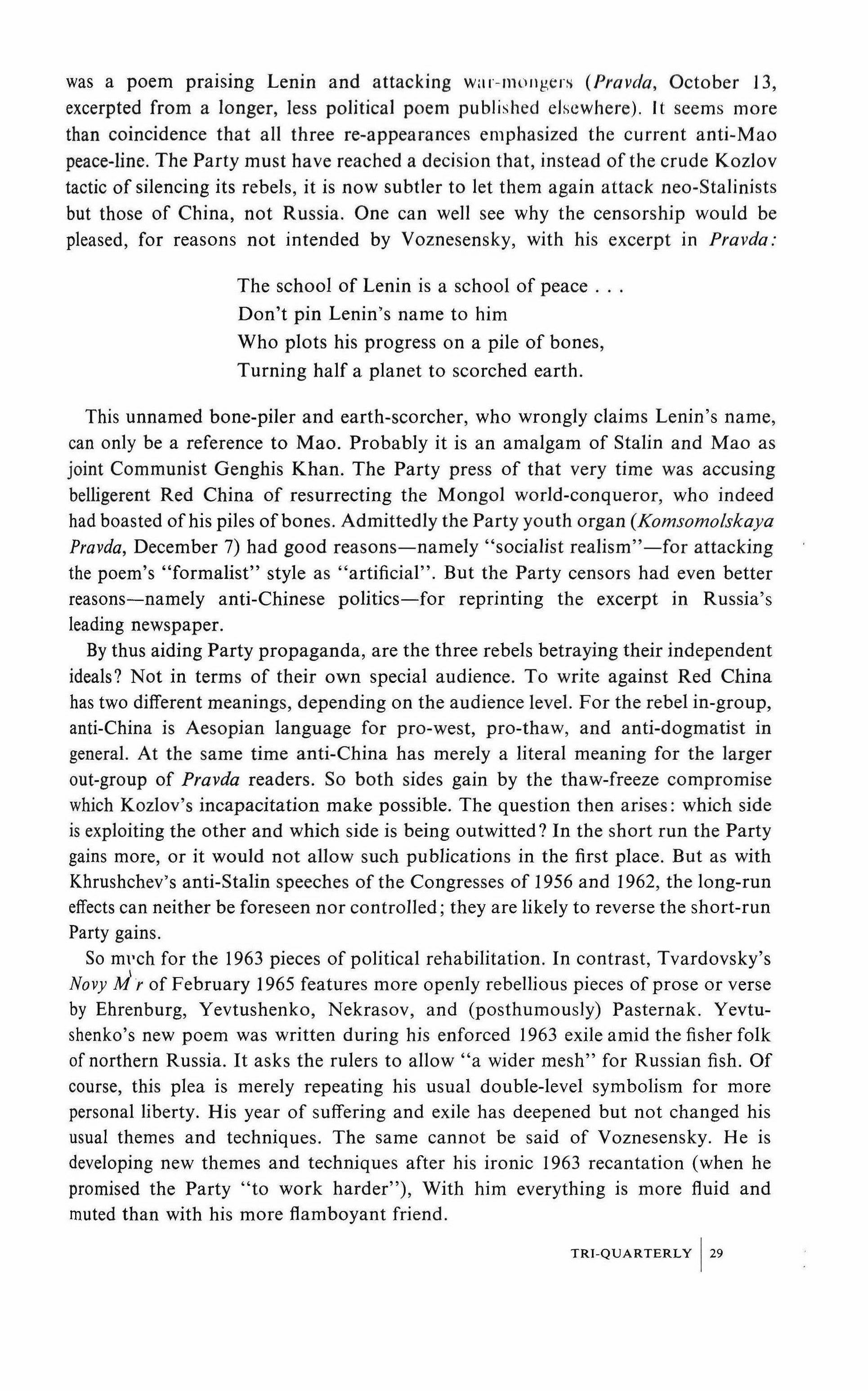
was a poem praismg Lenin and attacking war-mongers (Pravda, October 13, excerpted from a longer, less political poem published elsewhere). It seems more than coincidence that all three re-appearances emphasized the current anti-Mao peace-line. The Party must have reached a decision that, instead of the crude Kozlov tactic of silencing its rebels, it is now subtler to let them again attack neo-Stalinists but those of China, not Russia. One can well see why the censorship would be pleased, for reasons not intended by Voznesensky, with his excerpt in Pravda,'
The school of Lenin is a school of peace
Don't pin Lenin's name to him
Who plots his progress on a pile of bones, Turning half a planet to scorched earth.
This unnamed bone-piler and earth-scorcher, who wrongly claims Lenin's name, can only be a reference to Mao. Probably it is an amalgam of Stalin and Mao as joint Communist Genghis Khan. The Party press of that very time was accusing belligerent Red China of resurrecting the Mongol world-conqueror, who indeed had boasted ofhis piles ofbones. Admittedly the Party youth organ (Komsomolskaya Pravda, December 7) had good reasons-namely "socialist realism"-for attacking the poem's "formalist" style as "artificial". But the Party censors had even better reasons-namely anti-Chinese politics-for reprinting the excerpt in Russia's leading newspaper.
By thus aiding Party propaganda, are the three rebels betraying their independent ideals? Not in terms of their own special audience. To write against Red China has two different meanings, depending on the audience level. For the rebel in-group, anti-China is Aesopian language for pro-west, pro-thaw, and anti-dogmatist in general. At the same time anti-China has merely a literal meaning for the larger out-group of Pravda readers. So both sides gain by the thaw-freeze compromise which Kozlov's incapacitation make possible. The question then arises: which side is exploiting the other and which side is being outwitted? In the short run the Party gains more, or it would not allow such publications in the first place. But as with Khrushchev's anti-Stalin speeches of the Congresses of 1956 and 1962, the long-run effects can neither be foreseen nor controlled; they are likely to reverse the short-run Party gains.
So rm-ch for the 1963 pieces of political rehabilitation. In contrast, Tvardovsky's Navy M\ r of February 1965 features more openly rebellious pieces of prose or verse by Ehrenburg, Yevtushenko, Nekrasov, and (posthumously) Pasternak. Yevtushenko's new poem was written during his enforced 1963 exile amid the fisher folk of northern Russia. It asks the rulers to allow "a wider mesh" for Russian fish. Of course, this plea is merely repeating his usual double-level symbolism for more personal liberty. His year of suffering and exile has deepened but not changed his usual themes and techniques. The same cannot be said of Voznesensky. He is developing new themes and techniques after his ironic 1963 recantation (when he promised the Party "to work harder"), With him everything is more fluid and muted than with his more flamboyant friend.
TRI-QUARTERLY 129
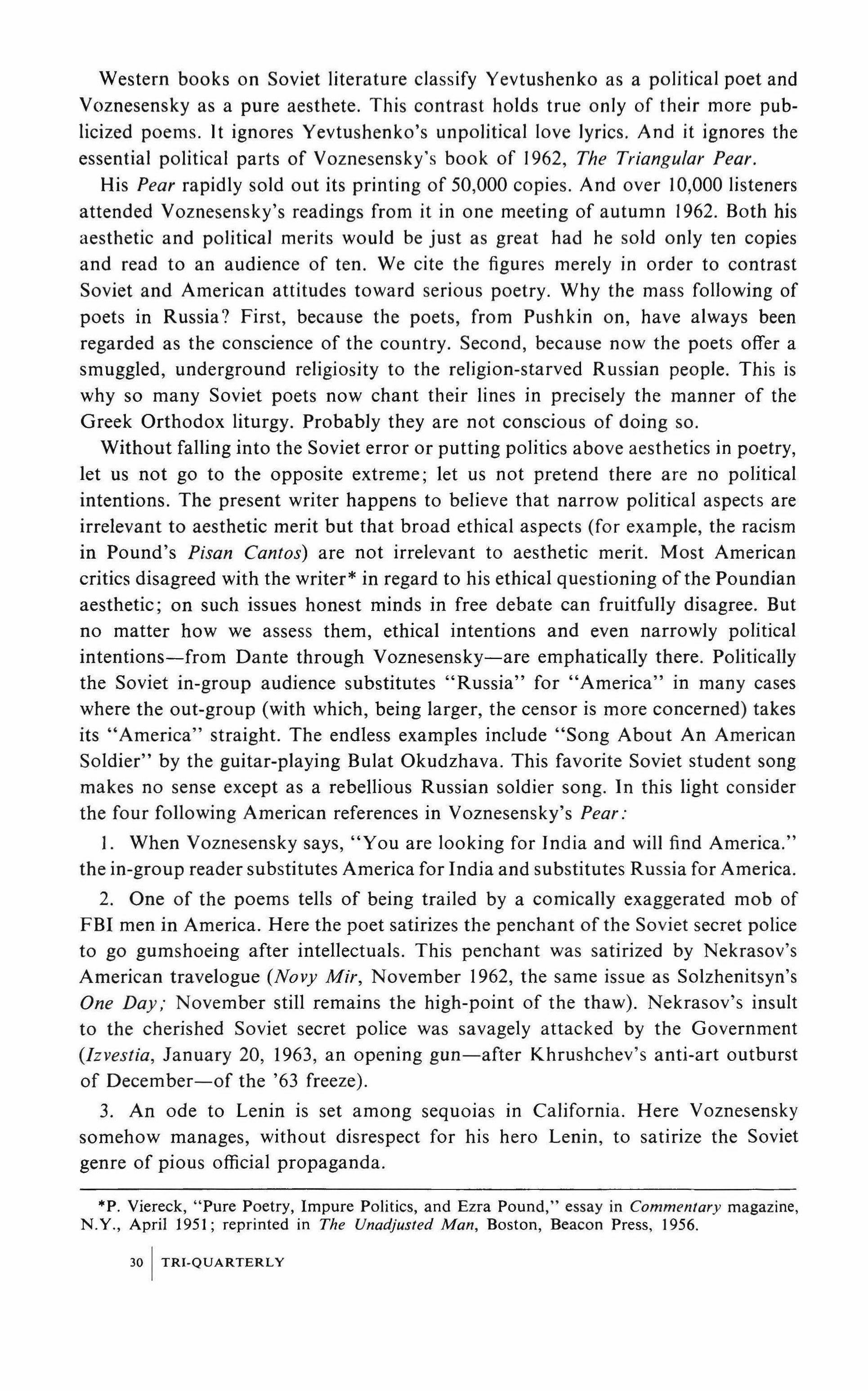
Western books on Soviet literature classify Yevtushenko as a political poet and Voznesensky as a pure aesthete. This contrast holds true only of their more publicized poems. It ignores Yevtushenko's unpolitical love lyrics. And it ignores the essential political parts of Voznesensky's book of 1962, The Triangular Pear. His Pear rapidly sold out its printing of 50,000 copies. And over 10,000 listeners attended Voznesensky's readings from it in one meeting of autumn 1962. Both his aesthetic and political merits would be just as great had he sold only ten copies and read to an audience of ten. We cite the figures merely in order to contrast Soviet and American attitudes toward serious poetry. Why the mass following of poets in Russia? First, because the poets, from Pushkin on, have always been regarded as the conscience of the country. Second, because now the poets offer a smuggled, underground religiosity to the religion-starved Russian people. This is why so many Soviet poets now chant their lines in precisely the manner of the Greek Orthodox liturgy. Probably they are not conscious of doing so. Without falling into the Soviet error or putting politics above aesthetics in poetry, let us not go to the opposite extreme; let us not pretend there are no political intentions. The present writer happens to believe that narrow political aspects are irrelevant to aesthetic merit but that broad ethical aspects (for example, the racism in Pound's Pisan Cantos) are not irrelevant to aesthetic merit. Most American critics disagreed with the writer* in regard to his ethical questioning of the Poundian aesthetic; on such issues honest minds in free debate can fruitfully disagree. But no matter how we assess them, ethical intentions and even narrowly political intentions-from Dante through Voznesensky-are emphatically there. Politically the Soviet in-group audience substitutes "Russia" for "America" in many cases where the out-group (with which, being larger, the censor is more concerned) takes its "America" straight. The endless examples include "Song About An American Soldier" by the guitar-playing Bulat Okudzhava. This favorite Soviet student song makes no sense except as a rebellious Russian soldier song. In this light consider the four following American references in Voznesensky's Pear,'
J. When Voznesensky says, "You are looking for India and will find America." the in-group reader substitutes America for India and substitutes Russia for America.
2. One of the poems tells of being trailed by a comically exaggerated mob of FBI men in America. Here the poet satirizes the penchant of the Soviet secret police to go gumshoeing after intellectuals. This penchant was satirized by Nekrasov's American travelogue (Novy Mir, November 1962, the same issue as Solzhenitsyn's One Day; November still remains the high-point of the thaw). Nekrasov's insult to the cherished Soviet secret police was savagely attacked by the Government (Izvestia, January 20, 1963, an opening gun-after Khrushchev's anti-art outburst of December-of the '63 freeze).
3. An ode to Lenin is set among sequoias in California. Here Voznesensky somehow manages, without disrespect for his hero Lenin, to satirize the Soviet genre of pious official propaganda.
*P. Viereck, "Pure Poetry, Impure Politics, and Ezra Pound," essay in Commentary magazine, N.Y., April 1951; reprinted in The Unadjusted Man, Boston, Beacon Press, 1956.
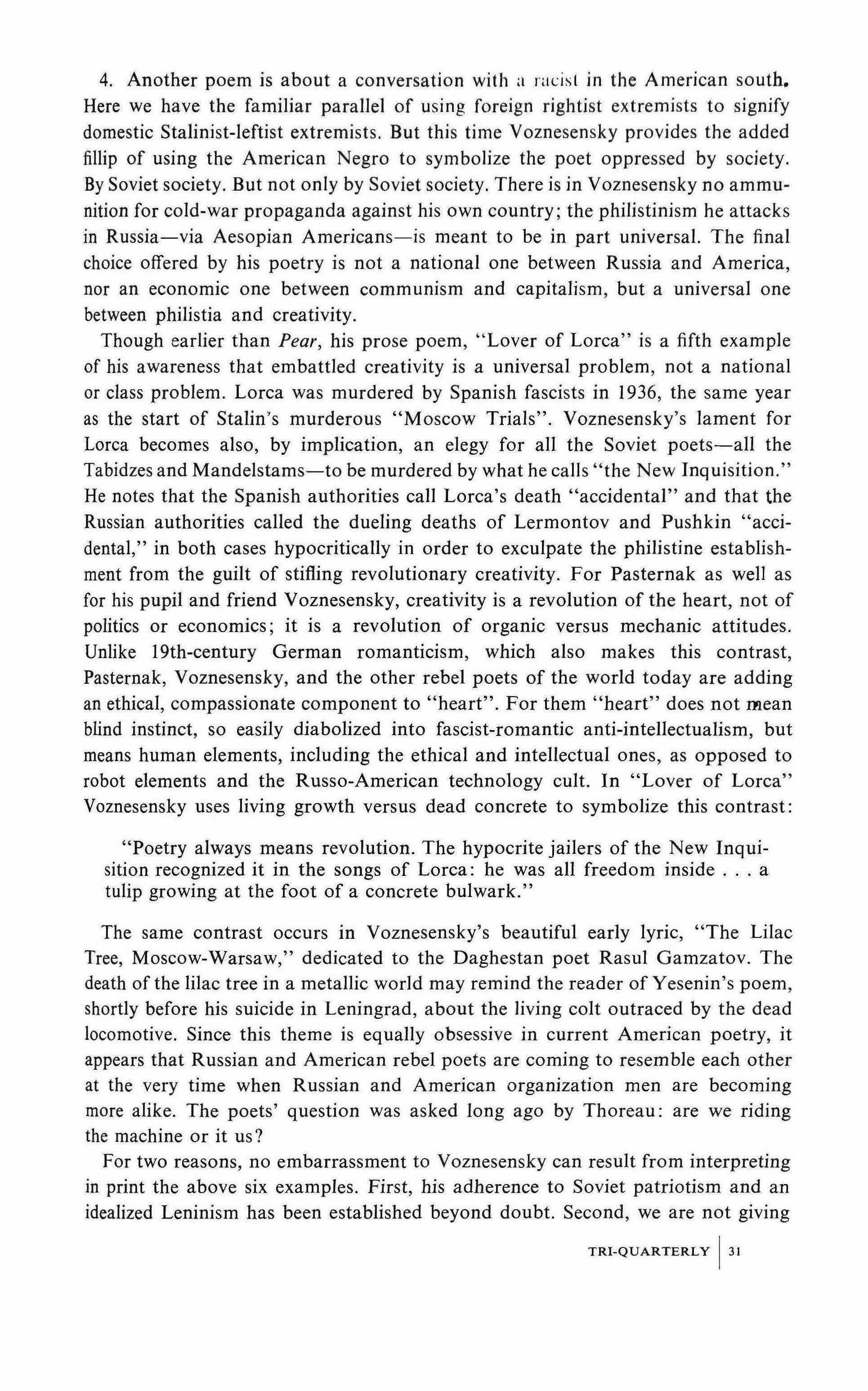
4. Another poem is about a conversation with it racist in the American south. Here we have the familiar parallel of using foreign rightist extremists to signify domestic Stalinist-leftist extremists. But this time Voznesensky provides the added fillip of using the American Negro to symbolize the poet oppressed by society. By Soviet society. But not only by Soviet society. There is in Voznesensky no ammunition for cold-war propaganda against his own country; the philistinism he attacks in Russia-via Aesopian Americans-is meant to be in part universal. The final choice offered by his poetry is not a national one between Russia and America, nor an economic one between comm unism and capitalism, but a universal one between philistia and creativity.
Though earlier than Pear, his prose poem, "Lover of Lorca" is a fifth example of his awareness that embattled creativity is a universal problem, not a national or class problem. Lorca was murdered by Spanish fascists in 1936, the same year as the start of Stalin's murderous "Moscow Trials". Voznesensky's lament for Lorca becomes also, by implication, an elegy for all the Soviet poets-all the Tabidzes and Mandelstams-to be murdered by what he calls "the New Inquisition." He notes that the Spanish authorities call Lorca's death "accidental" and that the Russian authorities called the dueling deaths of Lermontov and Pushkin "accidental," in both cases hypocritically in order to exculpate the philistine establishment from the guilt of stifling revolutionary creativity. For Pasternak as well as for his pupil and friend Voznesensky, creativity is a revolution of the heart, not of politics or economics; it is a revolution of organic versus mechanic attitudes. Unlike 19th-century German romanticism, which also makes this contrast, Pasternak, Voznesensky, and the other rebel poets of the world today are adding an ethical, compassionate component to "heart". For them "heart" does not mean blind instinct, so easily diabolized into fascist-romantic anti-intellectualism, but means human elements, including the ethical and intellectual ones, as opposed to robot elements and the Russo-American technology cult. In "Lover of Lorca" Voznesensky uses living growth versus dead concrete to symbolize this contrast:
"Poetry always means revolution. The hypocrite jailers of the New Inquisition recognized it in the songs of Lorca: he was all freedom inside a tulip growing at the foot of a concrete bulwark."
The same contrast occurs in Voznesensky's beautiful early lyric, "The Lilac Tree, Moscow-Warsaw," dedicated to the Daghestan poet Rasul Gamzatov. The death of the lilac tree in a metallic world may remind the reader of Yesenin's poem, shortly before his suicide in Leningrad, about the living colt outraced by the dead locomotive. Since this theme is equally obsessive in current American poetry, it appears that Russian and American rebel poets are coming to resemble each other at the very time when Russian and American organization men are becoming more alike. The poets' question was asked long ago by Thoreau: are we riding the machine or it us?
For two reasons, no embarrassment to Voznesensky can result from interpreting in print the above six examples. First, his adherence to Soviet patriotism and an idealized Leninism has been established beyond doubt. Second, we are not giving
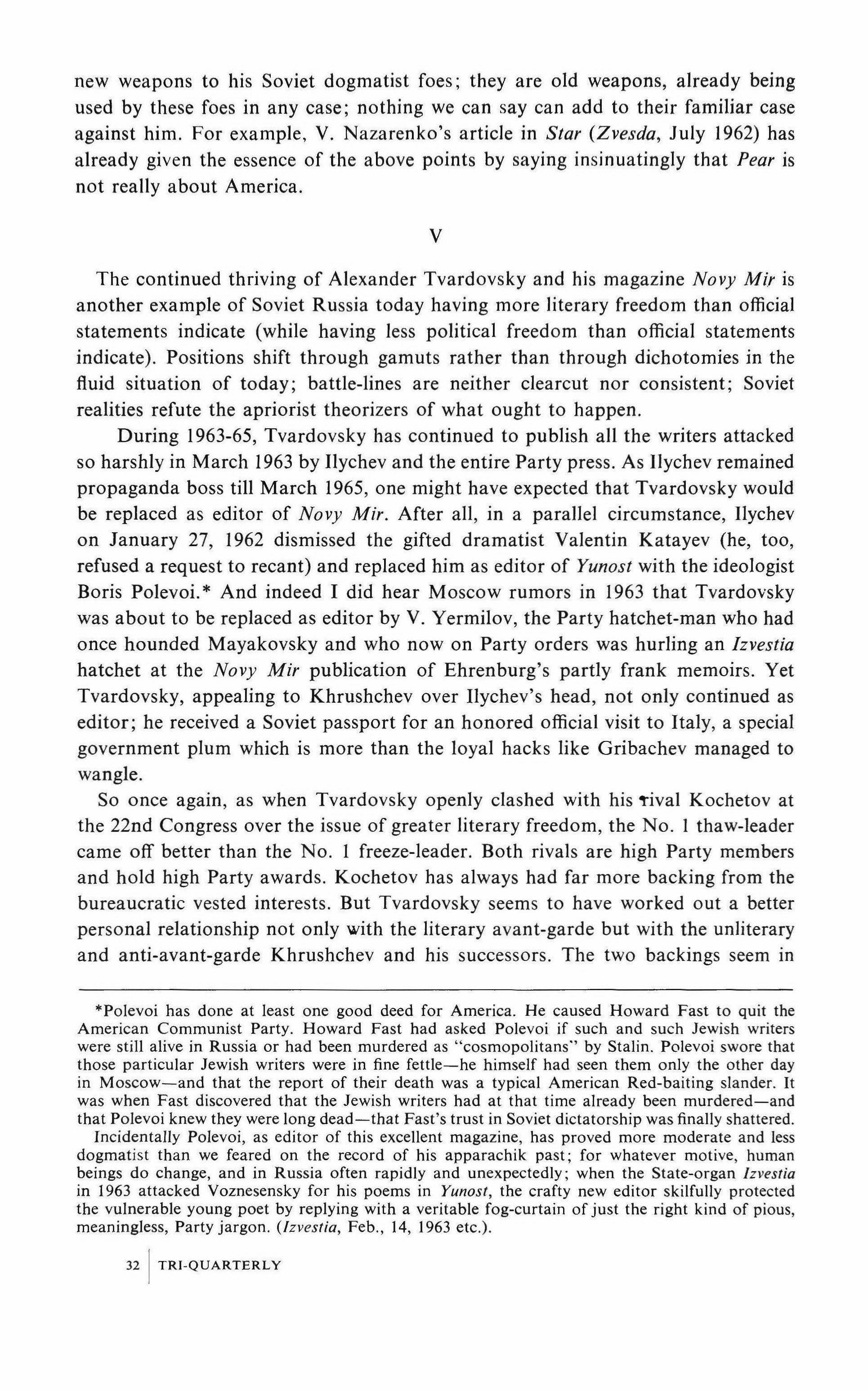
new weapons to his Soviet dogmatist foes; they are old weapons, already being used by these foes in any case; nothing we can say can add to their familiar case against him. For example, V. Nazarenko's article in Star (Zvesda, July 1962) has already given the essence of the above points by saying insinuatingly that Pear is not really about America.
VThe continued thriving of Alexander Tvardovsky and his magazine Navy Mir is another example of Soviet Russia today having more literary freedom than official statements indicate (while having less political freedom than official statements indicate). Positions shift through gamuts rather than through dichotomies in the fluid situation of today; battle-lines are neither clearcut nor consistent; Soviet realities refute the apriorist theorizers of what ought to happen.
During 1963-65, Tvardovsky has continued to publish all the writers attacked so harshly in March 1963 by Ilychev and the entire Party press. As llychev remained propaganda boss till March 1965, one might have expected that Tvardovsky would be replaced as editor of Navy Mir. After all, in a parallel circumstance, Ilychev on January 27, 1962 dismissed the gifted dramatist Valentin Katayev (he, too, refused a request to recant) and replaced him as editor of Yunost with the ideologist Boris Polevoi. * And indeed I did hear Moscow rumors in 1963 that Tvardovsky was about to be replaced as editor by V. Yermilov, the Party hatchet-man who had once hounded Mayakovsky and who now on Party orders was hurling an Izvestia hatchet at the Navy Mir publication of Ehrenburg's partly frank memoirs. Yet Tvardovsky, appealing to Khrushchev over Ilychev's head, not only continued as editor; he received a Soviet passport for an honored official visit to Italy, a special government plum which is more than the loyal hacks like Gribachev managed to wangle.
So once again, as when Tvardovsky openly clashed with his 'rival Kochetov at the 22nd Congress over the issue of greater literary freedom, the No.1 thaw-leader came off better than the No. 1 freeze-leader. Both rivals are high Party members and hold high Party awards. Kochetov has always had far more backing from the bureaucratic vested interests. But Tvardovsky seems to have worked out a better personal relationship not only with the literary avant-garde but with the unliterary and anti-avant-garde Khrushchev and his successors. The two backings seem in
"Polevoi has done at least one good deed for America. He caused Howard Fast to quit the American Communist Party. Howard Fast had asked Polevoi if such and such Jewish writers were stilI alive in Russia or had been murdered as "cosmopolitans" by Stalin. Polevoi swore that those particular Jewish writers were in fine fettle-he himself had seen them only the other day in Moscow-and that the report of their death was a typical American Red-baiting slander. It was when Fast discovered that the Jewish writers had at that time already been murdered-and that Polevoi knew they were long dead-that Fast's trust in Soviet dictatorship was finally shattered. Incidentally Polevoi, as editor of this excellent magazine, has proved more moderate and less dogmatist than we feared on the record of his apparachik past; for whatever motive, human beings do change, and in Russia often rapidly and unexpectedly; when the State-organ Izvestia in 1963 attacked Voznesensky for his poems in Yunost, the crafty new editor skilfully protected the vulnerable young poet by replying with a veritable fog-curtain of just the right kind of pious, meaningless, Party jargon. (Izvestia, Feb., 14, 1963 etc.).
TRI-QUARTERLY
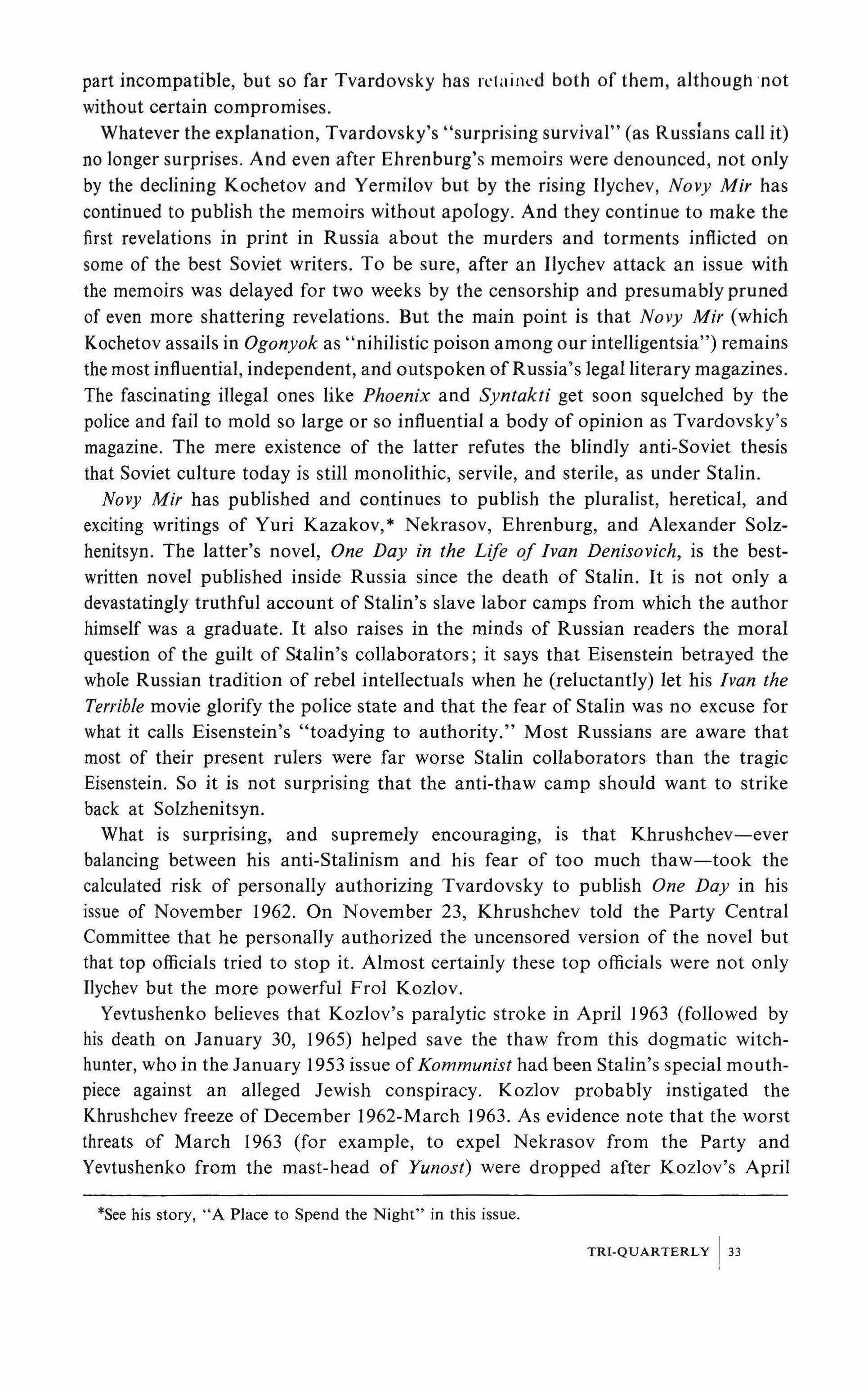
part incompatible, but so far Tvardovsky has retained both of them, although not without certain compromises.
Whatever the explanation, Tvardovsky's "surprising survival" (as Russians call it) no longer surprises. And even after Ehrenburg's memoirs were denounced, not only by the declining Kochetov and Yermilov but by the rising llychev, Novy Mir has continued to publish the memoirs without apology. And they continue to make the first revelations in print in Russia about the murders and torments inflicted on some of the best Soviet writers. To be sure, after an Ilychev attack an issue with the memoirs was delayed for two weeks by the censorship and presumably pruned of even more shattering revelations. But the main point is that Novy Mir (which Kochetov assails in Ogonyok as "nihilistic poison among our intelligentsia") remains the most influential, independent, and outspoken of Russia's legal literary magazines. The fascinating illegal ones like Phoenix and Syntakti get soon squelched by the police and fail to mold so large or so influential a body of opinion as Tvardovsky's magazine. The mere existence of the latter refutes the blindly anti-Soviet thesis that Soviet culture today is still monolithic, servile, and sterile, as under Stalin.
Novy Mir has published and continues to publish the pluralist, heretical, and exciting writings of Yuri Kazakov, * Nekrasov, Ehrenburg, and Alexander Solzhenitsyn. The latter's novel, One Day in the Life of Ivan Denisovich, is the bestwritten novel published inside Russia since the death of Stalin. It is not only a devastatingly truthful account of Stalin's slave labor camps from which the author himself was a graduate. It also raises in the minds of Russian readers the moral question of the guilt of Stalin's collaborators; it says that Eisenstein betrayed the whole Russian tradition of rebel intellectuals when he (reluctantly) let his Ivan the Terrible movie glorify the police state and that the fear of Stalin was no excuse for what it calls Eisenstein's "toadying to authority." Most Russians are aware that most of their present rulers were far worse Stalin collaborators than the tragic Eisenstein. So it is not surprising that the anti-thaw camp should want to strike back at Solzhenitsyn.
What is surprising, and supremely encouraging, is that Khrushchev-ever balancing between his anti-Stalinism and his fear of too much thaw-took the calculated risk of personally authorizing Tvardovsky to publish One Day in his issue of November 1962. On November 23, Khrushchev told the Party Central Committee that he personally authorized the uncensored version of the novel but that top officials tried to stop it. Almost certainly these top officials were not only Ilychev but the more powerful Frol Kozlov.
Yevtushenko believes that Kozlov's paralytic stroke in April 1963 (followed by his death on January 30, 1965) helped save the thaw from this dogmatic witchhunter, who in the January 1953 issue of Kommunist had been Stalin's special mouthpiece against an alleged Jewish conspiracy. Kozlov probably instigated the Khrushchev freeze of December 1962-March 1963. As evidence note that the worst threats of March 1963 (for example, to expel Nekrasov from the Party and Yevtushenko from the mast-head of Yunost) were dropped after Kozlov's April
*See his story, "A Place to Spend the Night" in this issue.
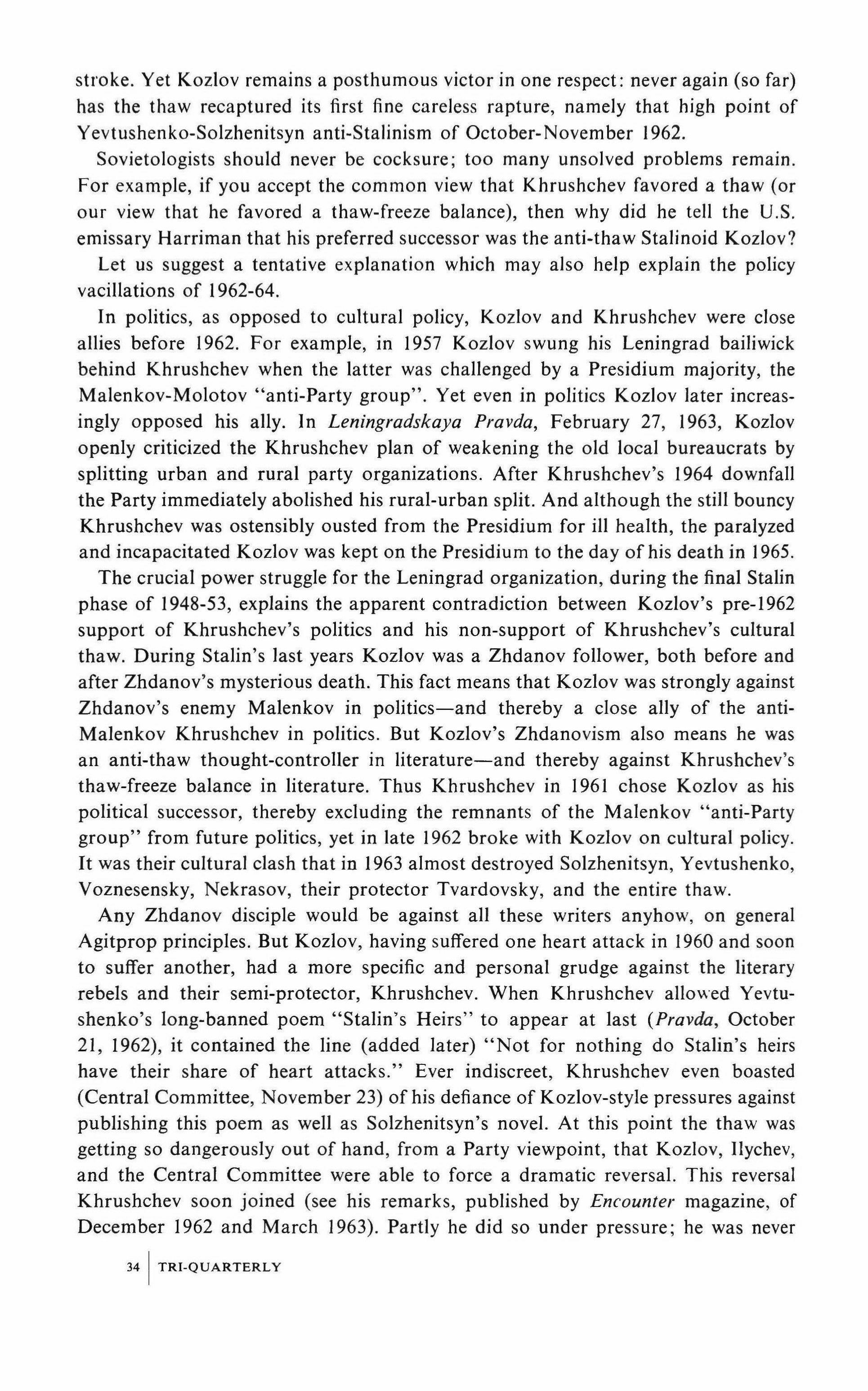
stroke. Yet Kozlov remains a posthumous victor in one respect: never again (so far) has the thaw recaptured its first fine careless rapture, namely that high point of Yevtushenko-Solzhenitsyn anti-Stalinism of October-November 1962.
Sovietologists should never be cocksure; too many unsolved problems remain. For example, if you accept the common view that Khrushchev favored a thaw (or our view that he favored a thaw-freeze balance), then why did he tell the U.S. emissary Harriman that his preferred successor was the anti-thaw Stalinoid Kozlov?
Let us suggest a tentative explanation which may also help explain the policy vacillations of 1962-64.
In politics, as opposed to cultural policy, Kozlov and Khrushchev were close allies before 1962. For example, in 1957 Kozlov swung his Leningrad bailiwick behind Khrushchev when the latter was challenged by a Presidium majority, the Malenkov-Molotov "anti-Party group". Yet even in politics Kozlov later increasingly opposed his ally. In Leningradskaya Pravda, February 27, 1963, Kozlov openly criticized the Khrushchev plan of weakening the old local bureaucrats by splitting urban and rural party organizations. After Khrushchev's 1964 downfall the Party immediately abolished his rural-urban split. And although the still bouncy Khrushchev was ostensibly ousted from the Presidium for ill health, the paralyzed and incapacitated Kozlov was kept on the Presidium to the day of his death in 1965.
The crucial power struggle for the Leningrad organization, during the final Stalin phase of 1948-53, explains the apparent contradiction between Kozlov's pre-1962 support of Khrushchev's politics and his non-support of Khrushchev's cultural thaw. During Stalin's last years Kozlov was a Zhdanov follower, both before and after Zhdanov's mysterious death. This fact means that Kozlov was strongly against Zhdanov's enemy Malenkov in politics-and thereby a close ally of the antiMalenkov Khrushchev in politics. But Kozlov's Zhdanovism also means he was an anti-thaw thought-controller in literature-and thereby against Khrushchev's thaw-freeze balance in literature. Thus Khrushchev in 1961 chose Kozlov as his political successor, thereby excluding the remnants of the Malenkov "anti-Party group" from future politics, yet in late 1962 broke with Kozlov on cultural policy. It was their cultural clash that in 1963 almost destroyed Solzhenitsyn, Yevtushenko, Voznesensky, Nekrasov, their protector Tvardovsky, and the entire thaw.
Any Zhdanov disciple would be against all these writers anyhow, on general Agitprop principles. But Kozlov, having suffered one heart attack in 1960 and soon to suffer another, had a more specific and personal grudge against the literary rebels and their semi-protector, Khrushchev. When Khrushchev allowed Yevtushenko's long-banned poem "Stalin's Heirs" to appear at last (Pravda, October 21, 1962), it contained the line (added later) "Not for nothing do Stalin's heirs have their share of heart attacks." Ever indiscreet, Khrushchev even boasted (Central Committee, November 23) of his defiance of Kozlov-style pressures against publishing this poem as well as Solzhenitsyn's novel. At this point the thaw was getting so dangerously out of hand, from a Party viewpoint, that Kozlov, Ilychev, and the Central Committee were able to force a dramatic reversal. This reversal Khrushchev soon joined (see his remarks, published by Encounter magazine, of December 1962 and March 1963). Partly he did so under pressure; he was never
TRI-QUARTERLY
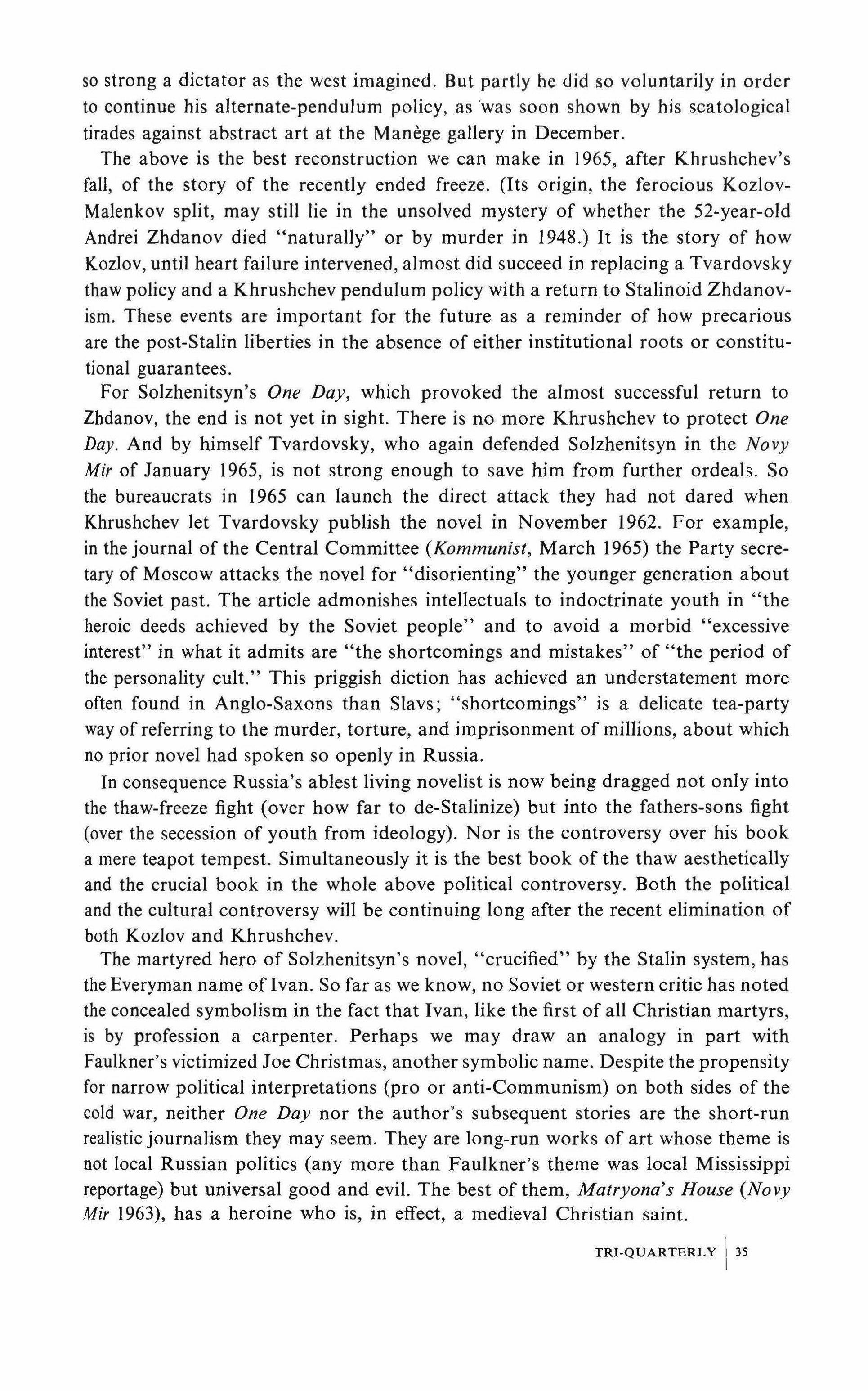
so strong a dictator as the west imagined. But partly he did so voluntarily in order to continue his alternate-pendulum policy, as was soon shown by his scatological tirades against abstract art at the Manege gallery in December.
The above is the best reconstruction we can make in 1965, after Khrushchev's fall, of the story of the recently ended freeze. (Its origin, the ferocious KozlovMalenkov split, may still lie in the unsolved mystery of whether the 52-year-old Andrei Zhdanov died "naturally" or by murder in 1948.) It is the story of how Kozlov, until heart failure intervened, almost did succeed in replacing a Tvardovsky thaw policy and a Khrushchev pendulum policy with a return to Stalinoid Zhdanovism. These events are important for the future as a reminder of how precarious are the post-Stalin liberties in the absence of either institutional roots or constitutional guarantees.
For Solzhenitsyn's One Day, which provoked the almost successful return to Zhdanov, the end is not yet in sight. There is no more Khrushchev to protect One Day. And by himself Tvardovsky, who again defended Solzhenitsyn in the Novy Mir of January 1965, is not strong enough to save him from further ordeals. So the bureaucrats in 1965 can launch the direct attack they had not dared when Khrushchev let Tvardovsky publish the novel in November 1962. For example, in the journal of the Central Committee (Kommunist, March 1965) the Party secretary of Moscow attacks the novel for "disorienting" the younger generation about the Soviet past. The article admonishes intellectuals to indoctrinate youth in "the heroic deeds achieved by the Soviet people" and to avoid a morbid "excessive interest" in what it admits are "the shortcomings and mistakes" of "the period of the personality cult." This priggish diction has achieved an understatement more often found in Anglo-Saxons than Slavs; "shortcomings" is a delicate tea-party way of referring to the murder, torture, and imprisonment of millions, about which no prior novel had spoken so openly in Russia.
In consequence Russia's ablest living novelist is now being dragged not only into the thaw-freeze fight (over how far to de-Stalinize) but into the fathers-sons fight (over the secession of youth from ideology). Nor is the controversy over his book a mere teapot tempest. Simultaneously it is the best book of the thaw aesthetically and the crucial book in the whole above political controversy. Both the political and the cultural controversy will be continuing long after the recent elimination of both Kozlov and Khrushchev.
The martyred hero of Solzhenitsyn's novel, "crucified" by the Stalin system, has the Everyman name ofIvan. So far as we know, no Soviet or western critic has noted the concealed symbolism in the fact that Ivan, like the first of all Christian martyrs, is by profession a carpenter. Perhaps we may draw an analogy in part with Faulkner's victimized Joe Christmas, another symbolic name. Despite the propensity for narrow political interpretations (pro or anti-Communism) on both sides of the cold war, neither One Day nor the author's subsequent stories are the short-run realistic journalism they may seem. They are long-run works of art whose theme is not local Russian politics (any more than Faulkner's theme was local Mississippi reportage) but universal good and evil. The best of them, Matryona's House (Novy Mir 1963), has a heroine who is, in effect, a medieval Christian saint.
TRI-QUARTERLY

Solzhenitsyn's avowed masters are not the Zola-style realists, despite his use of labor-camp documentation, but the symbolist poets Pasternak and Akhmatova. Solzhenitsyn himself is the author of some beautiful prose poems. Some day he may be forced to pay dearly for the fact that they are appearing in the West (The New Leader, January 18 and Encounter, March 1965) without prior publication in his own country. To resume his carpenter theme: like his novel, these poems contain implicit, never-articulated hints of religious symbolism, not to mention an ironic reference to Soviet Moscow as the Greek Orthodox "Third Rome." The Soviet censorship being what it is, the western reader must be alert for such hints. But not over-alert: often the westerner reads into Soviet texts a rebellious double meaning that is not there. Leonov and Solzhenitsyn are the two authors who most lend themselves to this, for both are completely sincere Communists who yet use or seem to use a Christian symbolism of redemption through suffering, and it may be that in both cases our above interpretations are misinterpretations. To throw light on Soviet literary polemics and to examine how to hit back indirectly at a protected book (in this case Solzhenitsyn's), let us briefly return to the thaw-freeze crisis of 1963. Suppose you were then an enrage dogmatist, eager to attack Solzhenitsyn for exposing the complicity of your faction in Stalin's crimes. Suppose at the same time that you dared not attack what you wanted to attack, namely his novel One Day, because you knew it had the imprimatur of Khrushchev, then still in power. What to do? The solution would be to wait for Tvardovsky to publish something else of Solzhenitsyn, something on which the dictator had taken no official stand, and then to attack the "something else" in such a violent as well as insinuating manner that fellow dogmatists would know you were really attacking One Day. I remember predicting in 1962 that this was bound to happen. Prediction, for once, proved correct. Further short stories by Solzhenitsyn appeared in subsequent issues of Navy Mir. Aesthetically (what matters most to us) the stories were magnificent. Politically (what matters most to the Party) the stories were less daring, less nakedly anti-authoritarian than One Day and hence less offensive from a Party viewpoint. Nevertheless, it is upon the new stories that the anti-thaw camp launched its coordinated onslaught, just as Russia once used to attack Albania when it meant Red China.
Such is the overlapping of literary and political debate that western sympathizers are tempted to give freedom's defenders in Russia a higher literary rank than they deserve, and vice versa for freedom's persecuters. So doing, western anti-Communists fall into the Communist error of subordinating literary to political judgments and blurring the distinction between them. For example, Sholokhov, who has been engaging in appalling drunken tirades against the Tvardovsky camp and against the public poetry readings, is often being denied by friends of liberty the literary greatness that his Quiet Don novels obviously merit. Contrariwise, though Yevtushenko is Russia's most effective rebel poet of the 1960's, he is far from being Russia's best younger poet in literary merit; not only Voznesensky, Vinokurov, and Akhmadullina but the less published Joseph Brodsky, * whom I also met in
*In 1964 came the arrest and the philistine "trial" of Brodsky, found guilty of "social parasitism" for being a pure lyricist rather than propagandist; clearly the thaw is still extremely precarious.
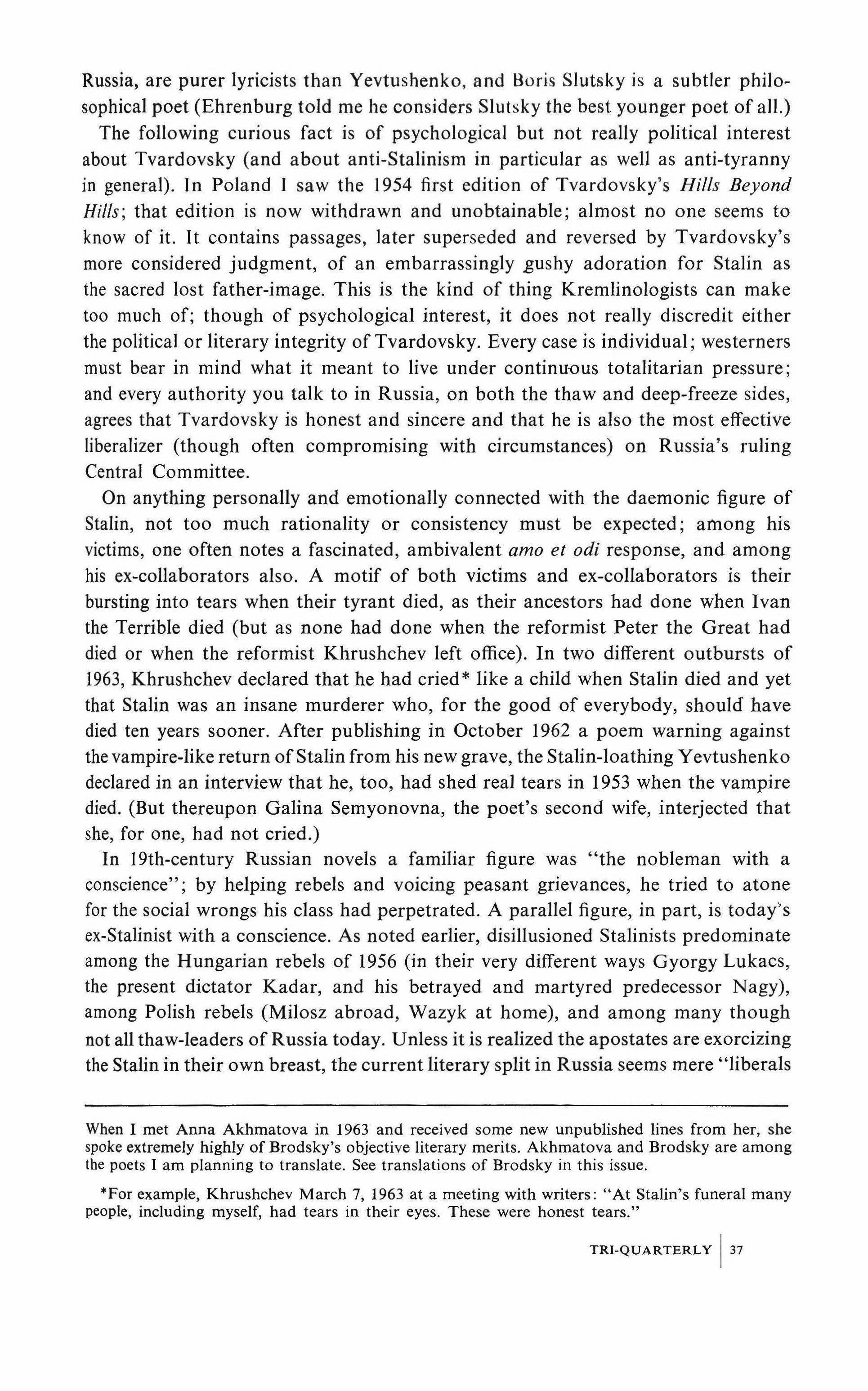
Russia, are purer lyricists than Yevtushenko, and Boris Slutsky is a subtler philosophical poet (Ehrenburg told me he considers Slutsky the best younger poet of all.)
The following curious fact is of psychological but not really political interest about Tvardovsky (and about anti-Stalinism in particular as well as anti-tyranny in general). In Poland I saw the 1954 first edition of Tvardovsky's Hills Beyond Hills; that edition is now withdrawn and unobtainable; almost no one seems to know of it. It contains passages, later superseded and reversed by Tvardovsky's more considered judgment, of an embarrassingly gushy adoration for Stalin as the sacred lost father-image. This is the kind of thing Kremlinologists can make too much of; though of psychological interest, it does not really discredit either the political or literary integrity of Tvardovsky. Every case is individual; westerners must bear in mind what it meant to live under continuous totalitarian pressure; and every authority you talk to in Russia, on both the thaw and deep-freeze sides, agrees that Tvardovsky is honest and sincere and that he is also the most effective liberalizer (though often compromising with circumstances) on Russia's ruling Central Committee.
On anything personally and emotionally connected with the daemonic figure of Stalin, not too much rationality or consistency must be expected; among his victims, one often notes a fascinated, ambivalent amo et odi response, and among his ex-collaborators also. A motif of both victims and ex-collaborators is their bursting into tears when their tyrant died, as their ancestors had done when Ivan the Terrible died (but as none had done when the reformist Peter the Great had died or when the reformist Khrushchev left office). In two different outbursts of 1963, Khrushchev declared that he had cried * like a child when Stalin died and yet that Stalin was an insane murderer who, for the good of everybody, should have died ten years sooner. After publishing in October 1962 a poem warning against the vampire-like return ofStalin from his new grave, the Stalin-loathing Yevtushenko declared in an interview that he, too, had shed real tears in 1953 when the vampire died. (But thereupon Galina Semyonovna, the poet's second wife, interjected that she, for one, had not cried.)
In 19th-century Russian novels a familiar figure was "the nobleman with a conscience"; by helping rebels and voicing peasant grievances, he tried to atone for the social wrongs his class had perpetrated. A parallel figure, in part, is today's ex-Stalinist with a conscience. As noted earlier, disillusioned Stalinists predominate among the Hungarian rebels of 1956 (in their very different ways Gyorgy Lukacs, the present dictator Kadar, and his betrayed and martyred predecessor Nagy), among Polish rebels (Milosz abroad, Wazyk at home), and among many though not all thaw-leaders of Russia today. Unless it is realized the apostates are exorcizing the Stalin in their own breast, the current literary split in Russia seems mere "liberals
When I met Anna Akhmatova in 1963 and received some new unpublished lines from her, she spoke extremely highly of Brodsky's objective literary merits. Akhmatova and Brodsky are among the poets I am planning to translate. See translations of Brodsky in this issue.
"For example, Khrushchev March 7,1963 at a meeting with writers: "At Stalin's funeral many people, including myself, had tears in their eyes. These were honest tears."
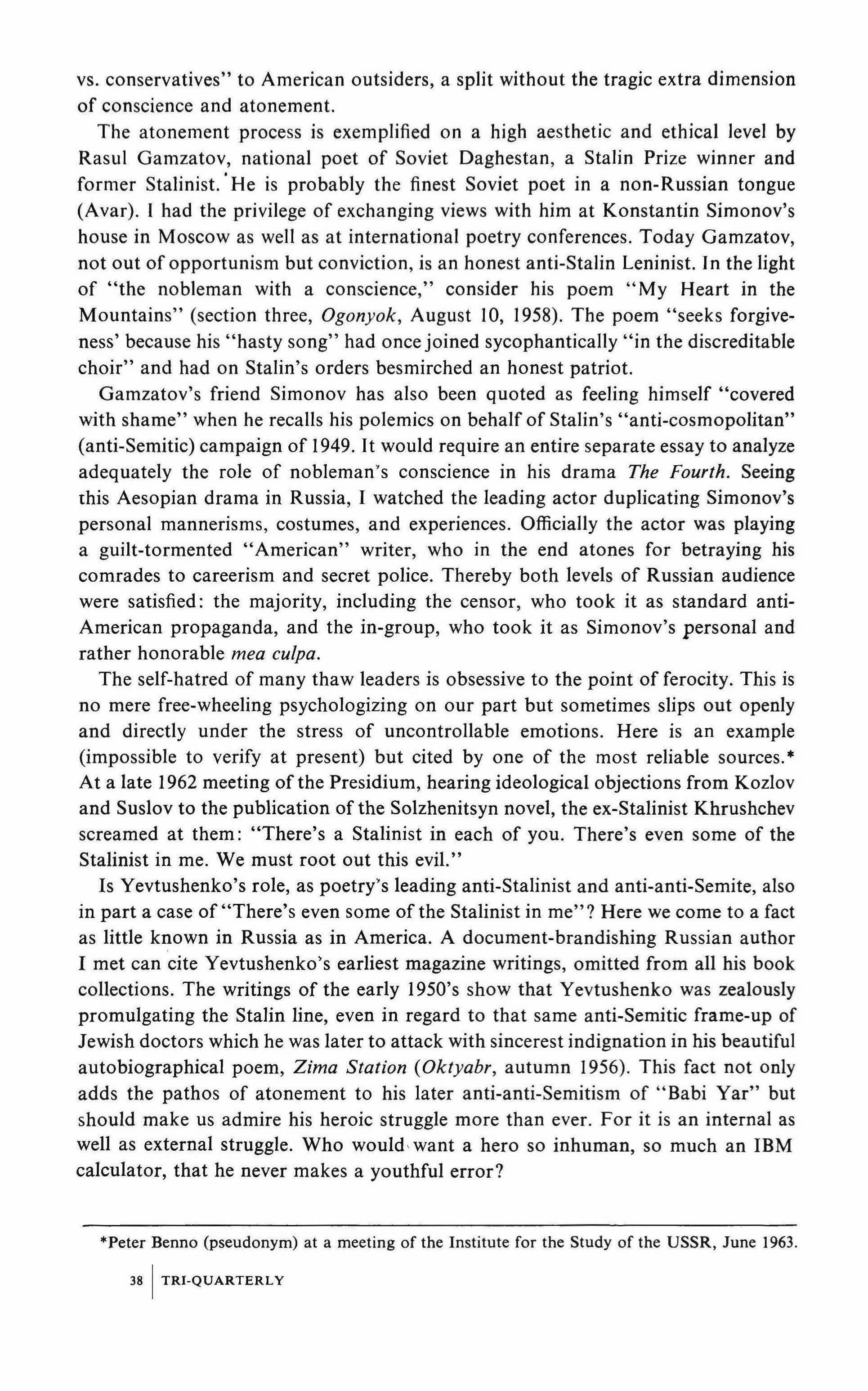
vs. conservatives" to American outsiders, a split without the tragic extra dimension of conscience and atonement.
The atonement process is exemplified on a high aesthetic and ethical level by Rasul Gamzatov, national poet of Soviet Daghestan, a Stalin Prize winner and former Stalinist.' He is probably the finest Soviet poet in a non-Russian tongue (Avar). I had the privilege of exchanging views with him at Konstantin Simonov's house in Moscow as well as at international poetry conferences. Today Gamzatov, not out of opportunism but conviction, is an honest anti-Stalin Leninist. In the light of "the nobleman with a conscience," consider his poem "My Heart in the Mountains" (section three, Ogonyok, August 10, 1958). The poem "seeks forgiveness' because his "hasty song" had once joined sycophantically "in the discreditable choir" and had on Stalin's orders besmirched an honest patriot.
Gamzatov's friend Simonov has also been quoted as feeling himself "covered with shame" when he recalls his polemics on behalf of Stalin's "anti-cosmopolitan" (anti-Semitic) campaign of 1949. It would require an entire separate essay to analyze adequately the role of nobleman's conscience in his drama The Fourth. Seeing this Aesopian drama in Russia, I watched the leading actor duplicating Simonov's personal mannerisms, costumes, and experiences. Officially the actor was playing a guilt-tormented "American" writer, who in the end atones for betraying his comrades to careerism and secret police. Thereby both levels of Russian audience were satisfied: the majority, including the censor, who took it as standard antiAmerican propaganda, and the in-group, who took it as Simonov's personal and rather honorable mea culpa.
The self-hatred of many thaw leaders is obsessive to the point of ferocity. This is no mere free-wheeling psychologizing on our part but sometimes slips out openly and directly under the stress of uncontrollable emotions. Here is an example (impossible to verify at present) but cited by one of the most reliable sources." At a late 1962 meeting of the Presidium, hearing ideological objections from Kozlov and Suslov to the publication of the Solzhenitsyn novel, the ex-Stalinist Khrushchev screamed at them: "There's a Stalinist in each of you. There's even some of the Stalinist in me. We must root out this evil."
Is Yevtushenko's role, as poetry's leading anti-Stalinist and anti-anti-Semite, also in part a case of "There's even some of the Stalinist in me"? Here we come to a fact as little known in Russia as in America. A document-brandishing Russian author I met can cite Yevtushenko's earliest magazine writings, omitted from all his book collections. The writings of the early 1950's show that Yevtushenko was zealously promulgating the Stalin line, even in regard to that same anti-Semitic frame-up of Jewish doctors which he was later to attack with sincerest indignation in his beautiful autobiographical poem, Zima Station (Oktyabr, autumn 1956). This fact not only adds the pathos of atonement to his later anti-anti-Semitism of "Babi Yar" but should make us admire his heroic struggle more than ever. For it is an internal as well as external struggle. Who would, want a hero so inhuman, so much an IBM calculator, that he never makes a youthful error?
*Peter Benne (pseudonym) at a meeting of the Institute for the Study of the USSR, June 1963.
3s1 TRI-QUARTERLY
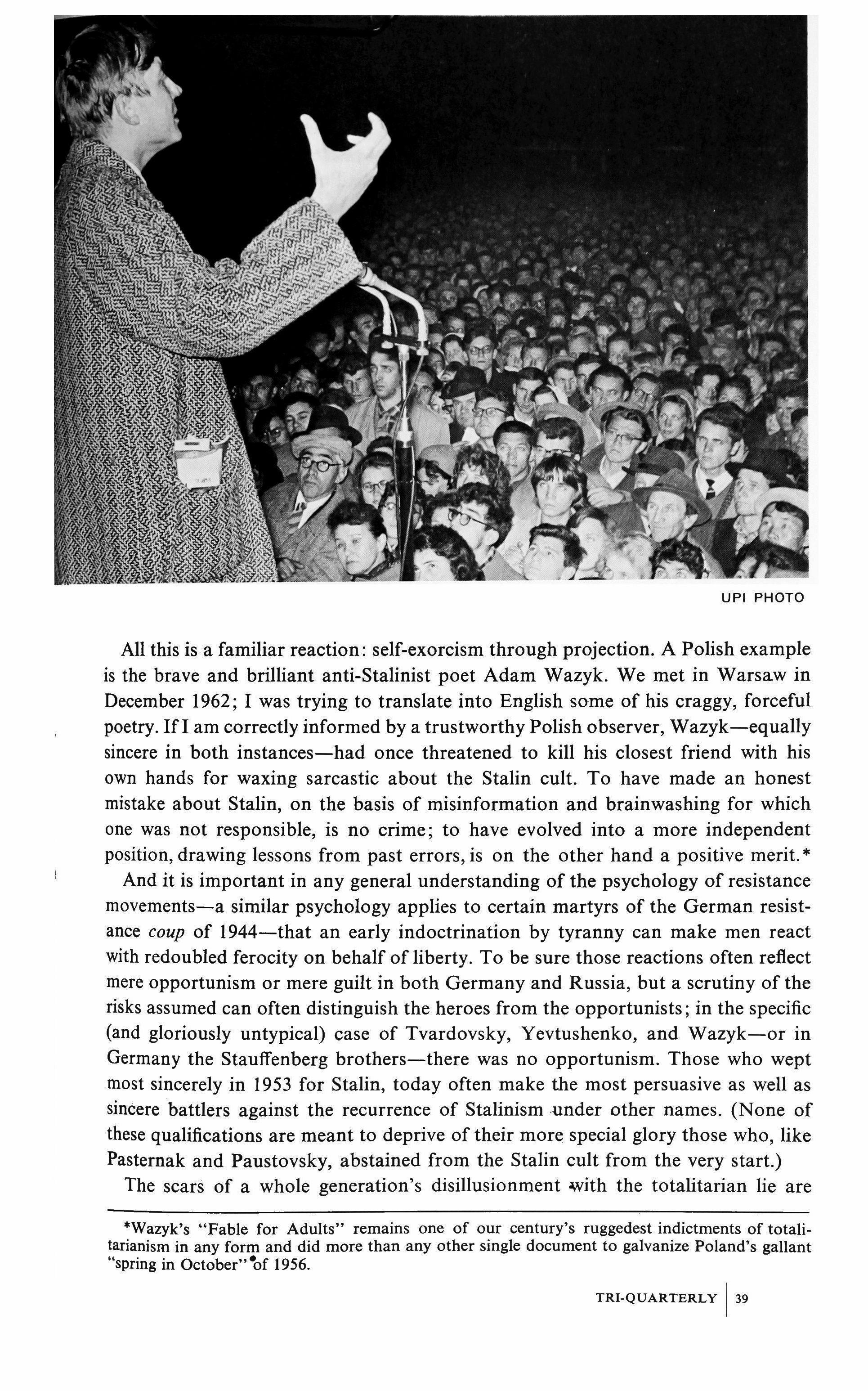
All this is a familiar reaction: self-exorcism through projection. A Polish example is the brave and brilliant anti-Stalinist poet Adam Wazyk. We met in Warsaw in December 1962; I was trying to translate into English some of his craggy, forceful poetry. If! am correctly informed by a trustworthy Polish observer, Wazyk-equally sincere in both instances-had once threatened to kill his closest friend with his own hands for waxing sarcastic about the Stalin cult. To have made an honest mistake about Stalin, on the basis of misinformation and brainwashing for which one was not responsible, is no crime; to have evolved into a more independent position, drawing lessons from past errors, is on the other hand a positive merit. *
And it is important in any general understanding of the psychology of resistance movements-a similar psychology applies to certain martyrs of the German resistance coup of 1944-that an early indoctrination by tyranny can make men react with redoubled ferocity on behalf of liberty. To be sure those reactions often reflect mere opportunism or mere guilt in both Germany and Russia, but a scrutiny of the risks assumed can often distinguish the heroes from the opportunists; in the specific (and gloriously untypical) case of Tvardovsky, Yevtushenko, and Wazyk-or in Germany the Stauffenberg brothers-there was no opportunism. Those who wept most sincerely in 1953 for Stalin, today often make the most persuasive as well as sincere battlers against the recurrence of Stalinism under other names. (None of these qualifications are meant to deprive of their more special glory those who, like Pasternak and Paustovsky, abstained from the Stalin cult from the very start.)
The scars of a whole generation's disillusionment with the totalitarian lie are
*Wazyk's "Fable for Adults" remains one of our century's ruggedest indictments of totalitarianism in any form and did more than any other single document to galvanize Poland's gallant "spring in Octoberv bf 1956.
UPI PHOTOre-opened in Wazyk's new poetry cycle of the 1960's. The following excerpt from it, entitled "Ignorance" (in Polish, "Niewiedza"), has never before appeared in print, whether east or west in any language, so we give the Polish original alongside our own English translation:
Nobody knows when we'll meet again Nobody knows who'll die when.
Nobody knows how cancer may come Or where to get the money from.
No one knows what the "line" is on high No one knows Why.
Nobody knows more than is showing We're getting accustomed to not knowing.
How just will be the Judgment Day
What we'll return to who can say?
Nothing is knownReturn to song.
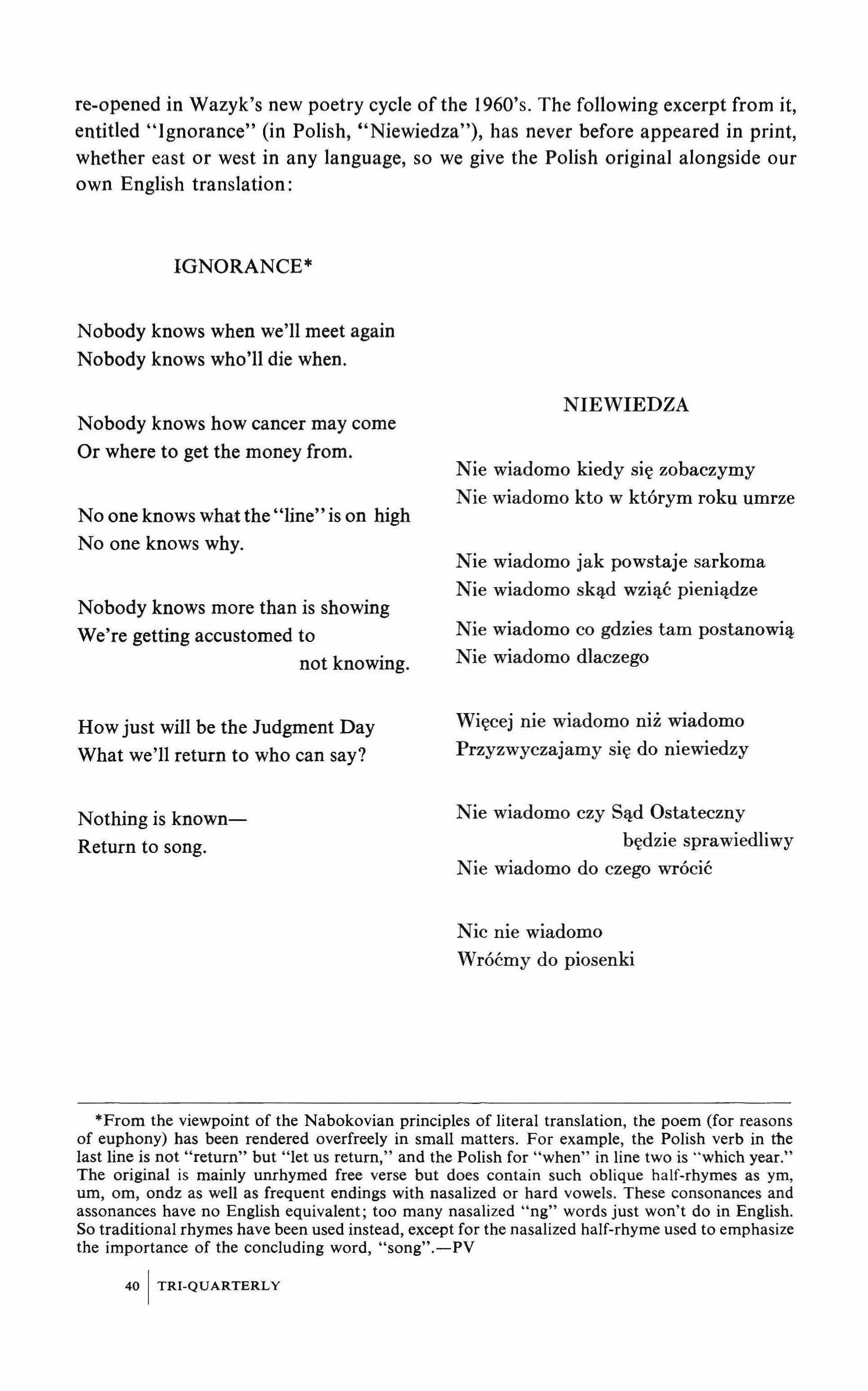
Nie wiadomo kiedy sie zobaczymy
Nie wiadomo kto w kt6rym roku umrze
Nie wiadomo jak powstaje sarkoma
Nie wiadomo skad wzil!c pieniadze
Nie wiadomo co gdzies tam postanowia
Nie wiadomo dlaczego
Wivcej nie wiadomo niz wiadomo Przyzwyczajamy sie do niewiedzy
Nie wiadomo czy Sad Ostateczny bedzie sprawiedliwy
Nie wiadomo do czego wrocic
Nic nie wiadomo Wr6cmy do piosenki
*From the viewpoint of the Nabokovian principles of literal translation, the poem (for reasons of euphony) has been rendered overfreely in small matters. For example, the Polish verb in the last line is not "return" but "let us return," and the Polish for "when" in line two is "which year." The original is mainly unrhymed free verse but does contain such oblique half-rhymes as ym, urn, om, ondz as well as frequent endings with nasalized or hard vowels. These consonances and assonances have no English equivalent; too many nasalized "ng" words just won't do in English. So traditional rhymes have been used instead, except for the nasalized half-rhyme used to emphasize the importance of the concluding word, "song".-PV
TRI-QUARTERLY
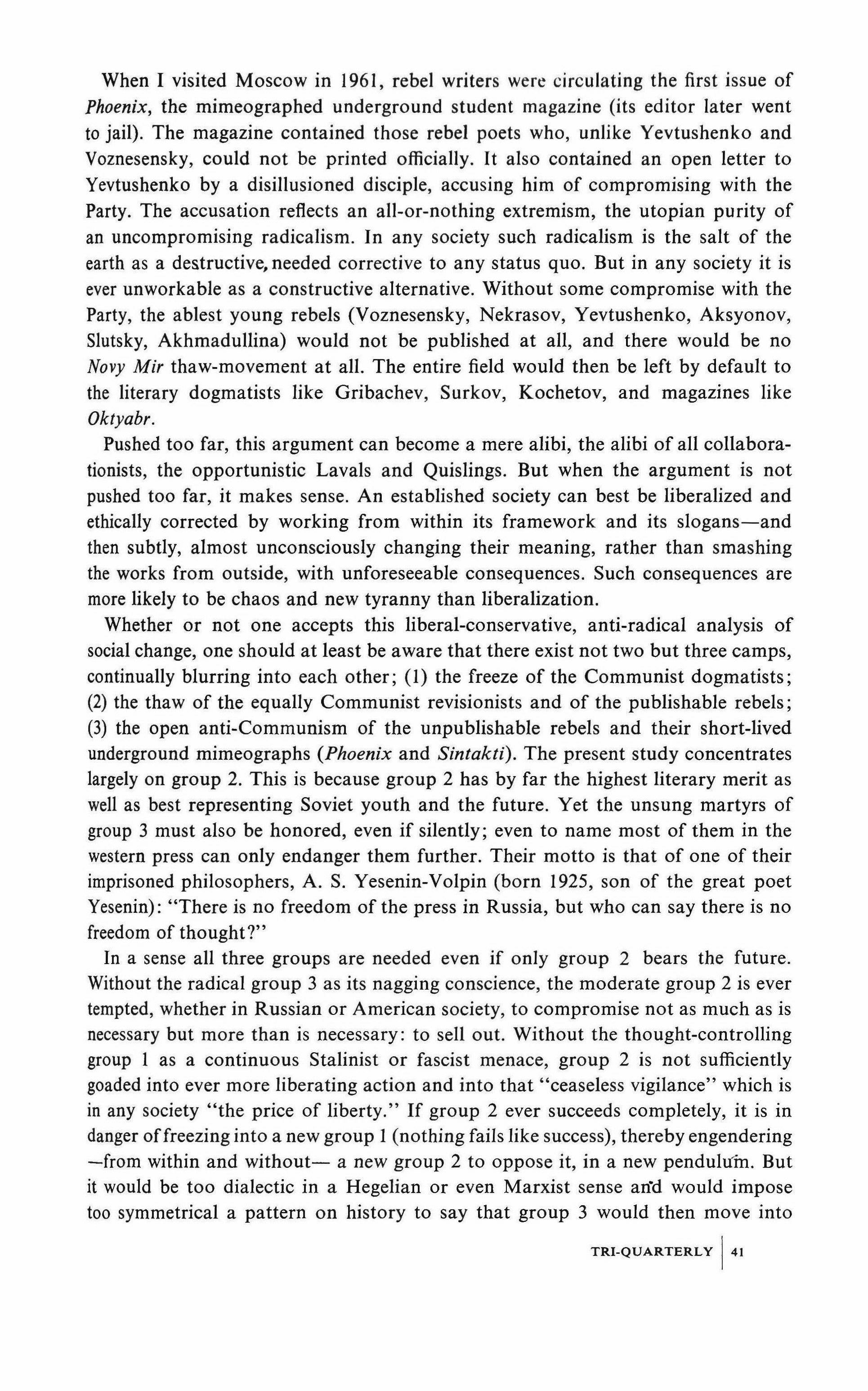
When I visited Moscow in 1961, rebel writers were circulating the first issue of Phoenix, the mimeographed underground student magazine (its editor later went to jail). The magazine contained those rebel poets who, unlike Yevtushenko and Voznesensky, could not be printed officially. It also contained an open letter to Yevtushenko by a disillusioned disciple, accusing him of compromising with the Party. The accusation reflects an all-or-nothing extremism, the utopian purity of an uncompromising radicalism. In any society such radicalism is the salt of the earth as a destructive, needed corrective to any status quo. But in any society it is ever unworkable as a constructive alternative. Without some compromise with the Party, the ablest young rebels (Voznesensky, Nekrasov, Yevtushenko, Aksyonov, Slutsky, Akhmadullina) would not be published at all, and there would be no Novy Mir thaw-movement at all. The entire field would then be left by default to the literary dogmatists like Gribachev, Surkov, Kochetov, and magazines like Oktyabr.
Pushed too far, this argument can become a mere alibi, the alibi of all collaborationists, the opportunistic Lavals and Quislings. But when the argument is not pushed too far, it makes sense. An established society can best be liberalized and ethically corrected by working from within its framework and its slogans-and then subtly, almost unconsciously changing their meaning, rather than smashing the works from outside, with unforeseeable consequences. Such consequences are more likely to be chaos and new tyranny than liberalization.
Whether or not one accepts this liberal-conservative, anti-radical analysis of social change, one should at least be aware that there exist not two but three camps, continually blurring into each other; (l) the freeze of the Communist dogmatists; (2) the thaw of the equally Communist revisionists and of the publishable rebels; (3) the open anti-Communism of the unpublishable rebels and their short-lived underground mimeographs (Phoenix and Sintakti). The present study concentrates largely on group 2. This is because group 2 has by far the highest literary merit as well as best representing Soviet youth and the future. Yet the unsung martyrs of group 3 must also be honored, even if silently; even to name most of them in the western press can only endanger them further. Their motto is that of one of their imprisoned philosophers, A. S. Yesenin-Volpin (born 1925, son of the great poet Yesenin): "There is no freedom of the press in Russia, but who can say there is no freedom of thought?"
In a sense all three groups are needed even if only group 2 bears the future. Without the radical group 3 as its nagging conscience, the moderate group 2 is ever tempted, whether in Russian or American society, to compromise not as much as is necessary but more than is necessary: to sell out. Without the thought-controlling group 1 as a continuous Stalinist or fascist menace, group 2 is not sufficiently goaded into ever more liberating action and into that "ceaseless vigilance" which is in any society "the price of liberty." If group 2 ever succeeds completely, it is in danger offreezing into a new group 1 (nothing fails like success), thereby engendering -from within and without- a new group 2 to oppose it, in a new pendulum. But it would be too dialectic in a Hegelian or even Marxist sense and would impose too symmetrical a pattern on history to say that group 3 would then move into
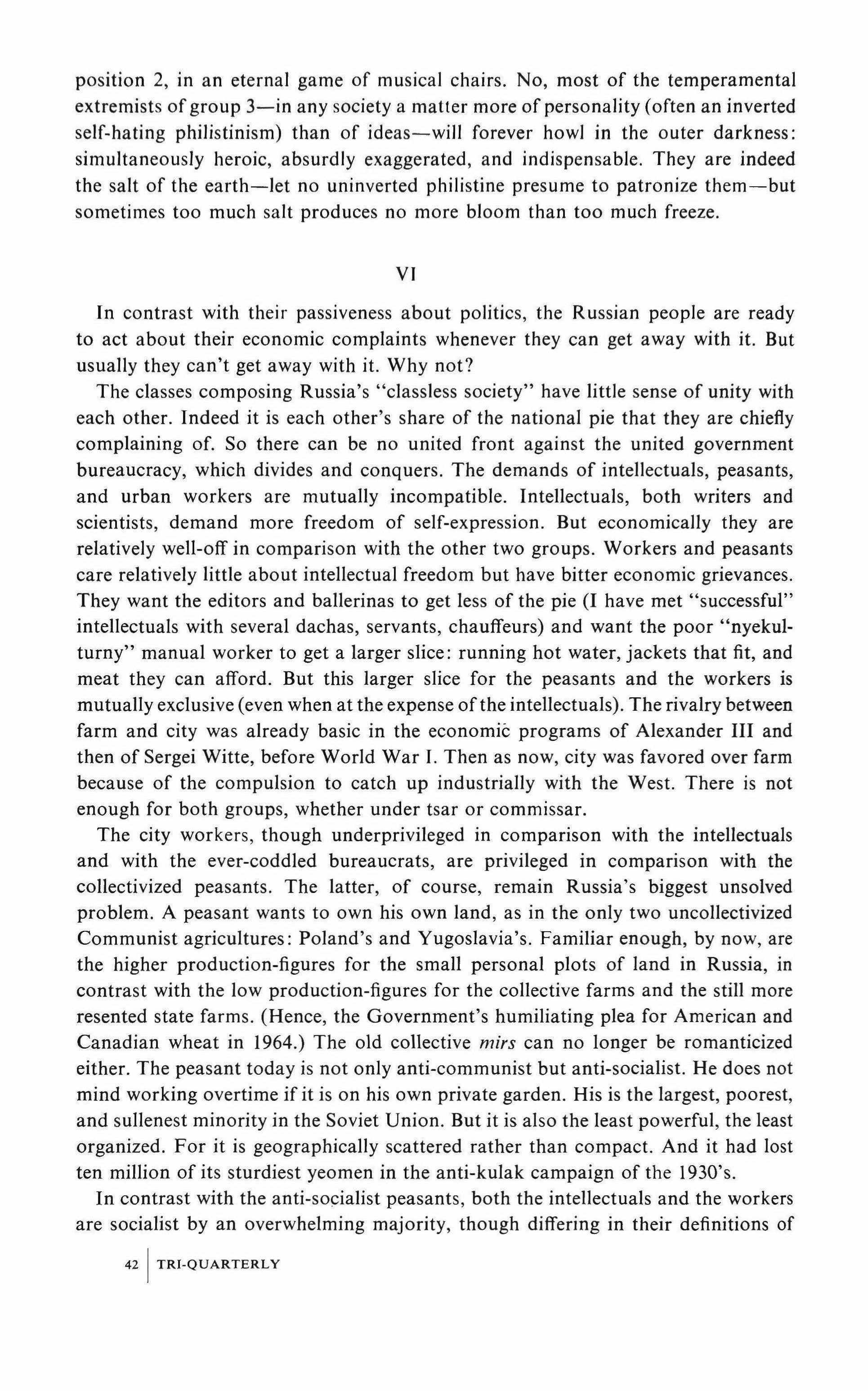
position 2, in an eternal game of musical chairs. No, most of the temperamental extremists of group 3-in any society a matter more of personality (often an inverted self-hating philistinism) than of ideas-will forever howl in the outer darkness: simultaneously heroic, absurdly exaggerated, and indispensable. They are indeed the salt of the earth-let no uninverted philistine presume to patronize them-but sometimes too much salt produces no more bloom than too much freeze.
In contrast with their passiveness about politics, the Russian people are ready to act about their economic complaints whenever they can get away with it. But usually they can't get away with it. Why not?
The classes composing Russia's "classless society" have little sense of unity with each other. Indeed it is each other's share of the national pie that they are chiefly complaining of. So there can be no united front against the united government bureaucracy, which divides and conquers. The demands of intellectuals, peasants, and urban workers are mutually incompatible. Intellectuals, both writers and scientists, demand more freedom of self-expression. But economically they are relatively well-off in comparison with the other two groups. Workers and peasants care relatively little about intellectual freedom but have bitter economic grievances. They want the editors and ballerinas to get less of the pie (I have met "successful" intellectuals with several dachas, servants, chauffeurs) and want the poor "nyekulturny" manual worker to get a larger slice: running hot water, jackets that fit, and meat they can afford. But this larger slice for the peasants and the workers is mutually exclusive (even when at the expense ofthe intellectuals). The rivalry between farm and city was already basic in the economic programs of Alexander III and then of Sergei Witte, before World War J. Then as now, city was favored over farm because of the compulsion to catch up industrially with the West. There is not enough for both groups, whether under tsar or commissar.
The city workers, though underprivileged in comparison with the intellectuals and with the ever-coddled bureaucrats, are privileged in comparison with the collectivized peasants. The latter, of course, remain Russia's biggest unsolved problem. A peasant wants to own his own land, as in the only two uncollectivized Communist agricultures: Poland's and Yugoslavia's. Familiar enough, by now, are the higher production-figures for the small personal plots of land in Russia, in contrast with the low production-figures for the collective farms and the still more resented state farms. (Hence, the Government's humiliating plea for American and Canadian wheat in 1964.) The old collective mirs can no longer be romanticized either. The peasant today is not only anti-communist but anti-socialist. He does not mind working overtime if it is on his own private garden. His is the largest, poorest, and sullenest minority in the Soviet Union. But it is also the least powerful, the least organized. For it is geographically scattered rather than compact. And it had lost ten million of its sturdiest yeomen in the anti-kulak campaign of the 1930's.
In contrast with the anti-socialist peasants, both the intellectuals and the workers are socialist by an overwhelming majority, though differing in their definitions of
TRI-QUARTERLY
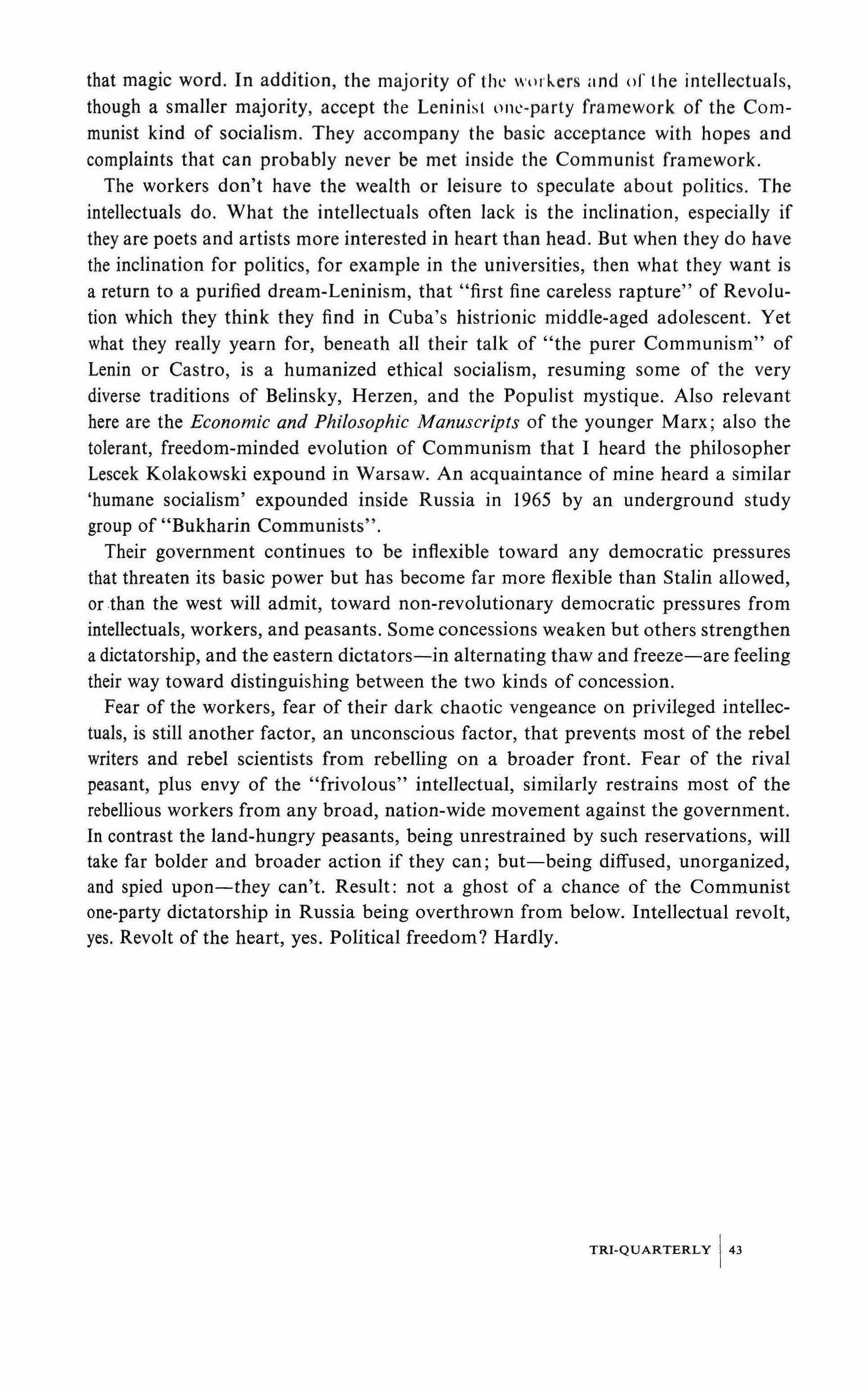
that magic word. In addition, the majority of the workers and or the intellectuals, though a smaller majority, accept the Leninist one-party framework of the Communist kind of socialism. They accompany the basic acceptance with hopes and complaints that can probably never be met inside the Communist framework.
The workers don't have the wealth or leisure to speculate about politics. The intellectuals do. What the intellectuals often lack is the inclination, especially if they are poets and artists more interested in heart than head. But when they do have the inclination for politics, for example in the universities, then what they want is a return to a purified dream-Leninism, that "first fine careless rapture" of Revolution which they think they find in Cuba's histrionic middle-aged adolescent. Yet what they really yearn for, beneath all their talk of "the purer Communism" of Lenin or Castro, is a humanized ethical socialism, resuming some of the very diverse traditions of Belinsky, Herzen, and the Populist mystique. Also relevant here are the Economic and Philosophic Manuscripts of the younger Marx; also the tolerant, freedom-minded evolution of Communism that I heard the philosopher Lescek Kolakowski expound in Warsaw. An acquaintance of mine heard a similar 'humane socialism' expounded inside Russia in 1965 by an underground study group of "Bukharin Communists".
Their government continues to be inflexible toward any democratic pressures that threaten its basic power but has become far more flexible than Stalin allowed, or than the west will admit, toward non-revolutionary democratic pressures from intellectuals, workers, and peasants. Some concessions weaken but others strengthen a dictatorship, and the eastern dictators-in alternating thaw and freeze-are feeling their way toward distinguishing between the two kinds of concession.
Fear of the workers, fear of their dark chaotic vengeance on privileged intellectuals, is still another factor, an unconscious factor, that prevents most of the rebel writers and rebel scientists from rebelling on a broader front. Fear of the rival peasant, plus envy of the "frivolous" intellectual, similarly restrains most of the rebellious workers from any broad, nation-wide movement against the government. In contrast the land-hungry peasants, being unrestrained by such reservations, will take far bolder and broader action if they can; but-being diffused, unorganized, and spied upon-they can't. Result: not a ghost of a chance of the Communist one-party dictatorship in Russia being overthrown from below. Intellectual revolt, yes. Revolt of the heart, yes. Political freedom? Hardly.
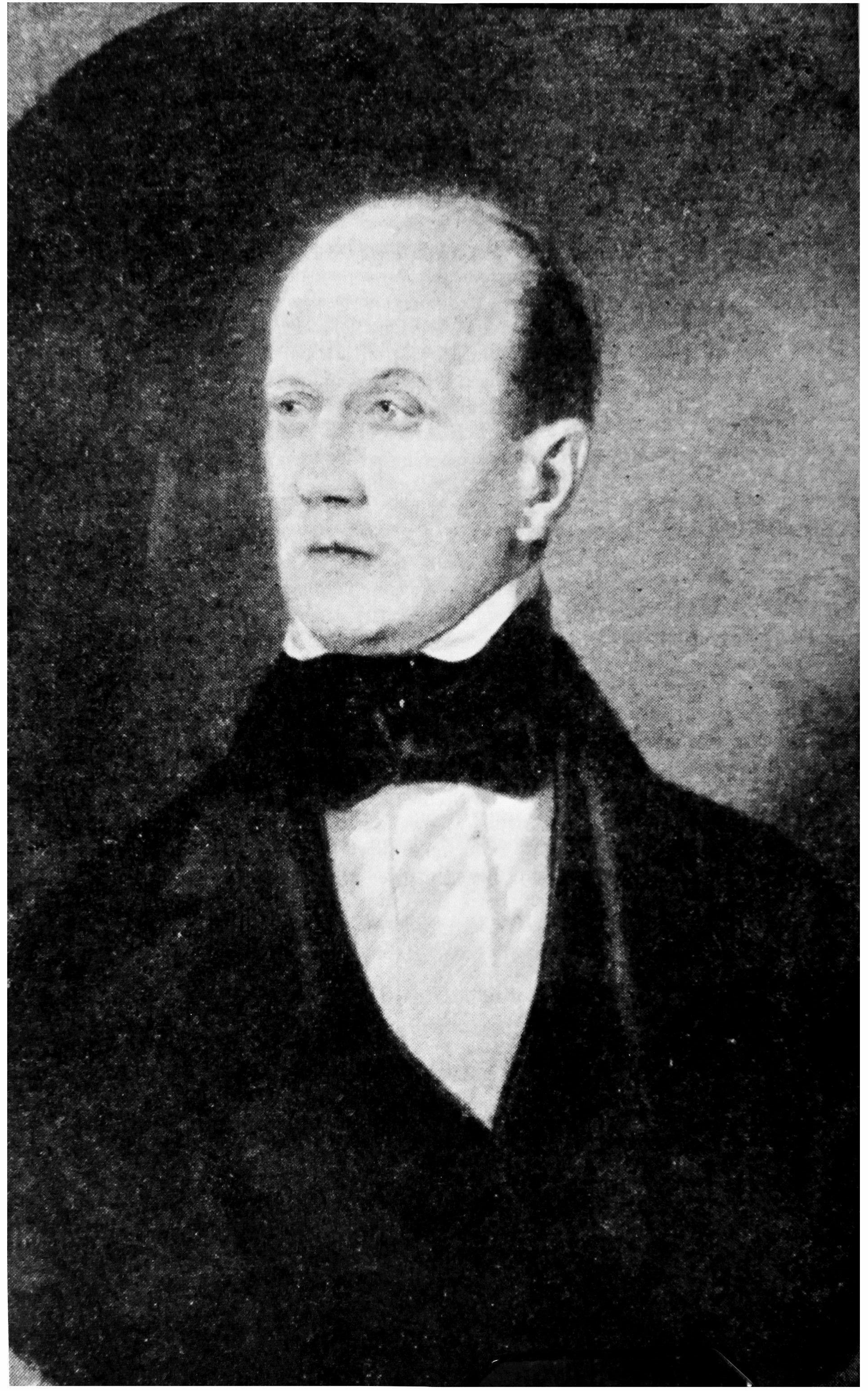

Adveniat regnum tuum
THERE IS A MODE of behavior imposed on the soul just as there is on the body: man must learn tc submit to it. This is an old truth, I know; but it seems to me that in our country it still has the value of novelty. One of the worst features of our peculiar civilization is that we have not yet discovered truths that have elsewhere become truisms, even among nations that in many respects are far less advanced than we are. It is the result of our never having walked hand in hand with other nations; we belong to none of the great families of mankind; we are neither of the West nor of the East, and we possess the traditions of neither. Somehow divorced from time and space, the univer�al education of mankind has not touched upon us
Every nation has its period of stormy agitation, of passionate unease, of hasty activities. In such a period men become wanderers over the world, both in body and spirit. This is an epoch of strong emotions, great undertakings, great national passions. At such times nations toss about violently, without any apparent object, but not without benefit for future generations. All communities have gone through such a phase. Such a period provides them with their most vivid memories, their legends, their poetry, their greatest and most productive ideas; such a period represents the necessary basis of every society. Otherwise, they would have nothing valuable or cherished in memories; they would cherish only the dust of the earth they inhabit. This fascinating phase of the history of nations represents their adolescence, the age when their faculties develop most vigorously, and whose remembrance brings both joy and wisdom to their maturity. But we Russians, we are devoid of all this. At first brutal barbarism, then crude superstition, then cruel and humiliating foreign domination, the spirit of which was later inherited by our national rulers-such is the sad history of our youth. We had none of that period of exuberant activity, of the fervent turmoil of the moral forces of nations. OUf period of social life which corresponds to this age was filled with a dull and gloomy existence, lacking in force and energy, with nothing to brighten it but crime, nothing to mitigate it but servitude. There are no charming remembrances,
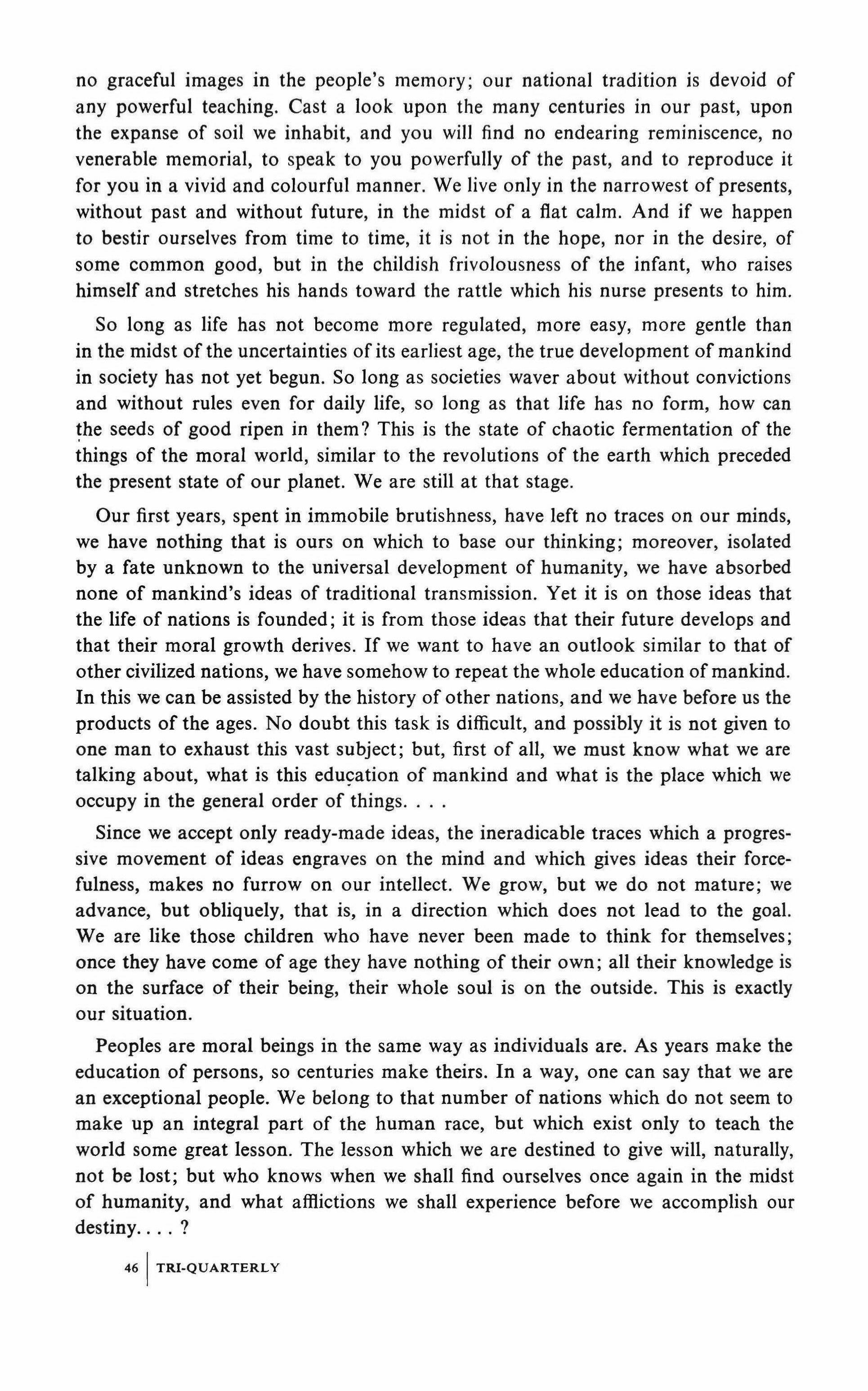
no graceful images in the people's memory; our national tradition is devoid of any powerful teaching. Cast a look upon the many centuries in our past, upon the expanse of soil we inhabit, and you will find no endearing reminiscence, no venerable memorial, to speak to you powerfully of the past, and to reproduce it for you in a vivid and colourful manner. We live only in the narrowest of presents, without past and without future, in the midst of a flat calm. And if we happen to bestir ourselves from time to time, it is not in the hope, nor in the desire, of some common good, but in the childish frivolousness of the infant, who raises himself and stretches his hands toward the rattle which his nurse presents to him.
So long as life has not become more regulated, more easy, more gentle than in the midst of the uncertainties of its earliest age, the true development of mankind in society has not yet begun. So long as societies waver about without convictions and without rules even for daily life, so long as that life has no form, how can the seeds of good ripen in them? This is the state of chaotic fermentation of the things of the moral world, similar to the revolutions of the earth which preceded the present state of our planet. We are still at that stage.
Our first years, spent in immobile brutishness, have left no traces on our minds, we have nothing that is ours on which to base our thinking; moreover, isolated by a fate unknown to the universal development of humanity, we have absorbed none of mankind's ideas of traditional transmission. Yet it is on those ideas that the life of nations is founded; it is from those ideas that their future develops and that their moral growth derives. If we want to have an outlook similar to that of other civilized nations, we have somehow to repeat the whole education of mankind. In this we can be assisted by the history of other nations, and we have before us the products of the ages. No doubt this task is difficult, and possibly it is not given to one man to exhaust this vast subject; but, first of all, we must know what we are talking about, what is this education of mankind and what is the place which we occupy in the general order of things
Since we accept only ready-made ideas, the ineradicable traces which a progressive movement of ideas engraves on the mind and which gives ideas their forcefulness, makes no furrow on our intellect. We grow, but we do not mature; we advance, but obliquely, that is, in a direction which does not lead to the goal. We are like those children who have never been made to think for themselves; once they have come of age they have nothing of their own; all their knowledge is on the surface of their being, their whole soul is on the outside. This is exactly our situation.
Peoples are moral beings in the same way as individuals are. As years make the education of persons, so centuries make theirs. In a way, one can say that we are an exceptional people. We belong to that number of nations which do not seem to make up an integral part of the human race, but which exist only to teach the world some great lesson. The lesson which we are destined to give will, naturally, not be lost; but who knows when we shall find ourselves once again in the midst of humanity, and what afflictions we shall experience before we accomplish our destiny ?
TRI-QUARTERLY
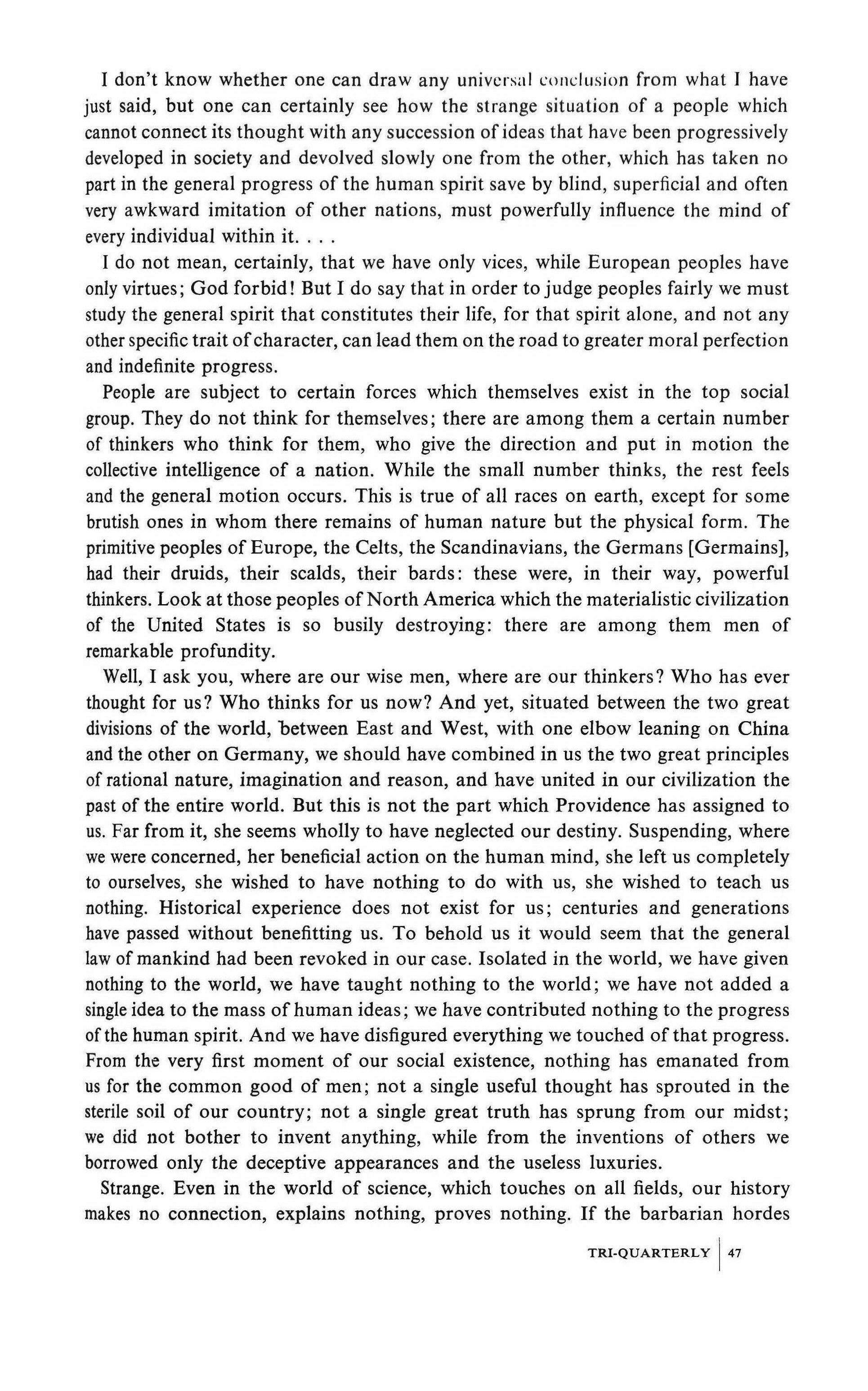
I don't know whether one can draw any universal conclusion from what I have just said, but one can certainly see how the strange situation of a people which cannot connect its thought with any succession of ideas that have been progressively developed in society and devolved slowly one from the other, which has taken no part in the general progress of the human spirit save by blind, superficial and often very awkward imitation of other nations, must powerfully influence the mind of every individual within it
I do not mean, certainly, that we have only vices, while European peoples have only virtues; God forbid! But I do say that in order to judge peoples fairly we must study the general spirit that constitutes their life, for that spirit alone, and not any other specific trait ofcharacter, can lead them on the road to greater moral perfection and indefinite progress.
People are subject to certain forces which themselves exist in the top social group. They do not think for themselves; there are among them a certain number of thinkers who think for them, who give the direction and put in motion the collective intelligence of a nation. While the small number thinks, the rest feels and the general motion occurs. This is true of all races on earth, except for some brutish ones in whom there remains of human nature but the physical form. The primitive peoples of Europe, the Celts, the Scandinavians, the Germans [Germains], had their druids, their scalds, their bards: these were, in their way, powerful thinkers. Look at those peoples of North America which the materialistic civilization of the United States is so busily destroying: there are among them men of remarkable profundity.
Well, I ask you, where are our wise men, where are our thinkers? Who has ever thought for us? Who thinks for us now? And yet, situated between the two great divisions of the world, between East and West, with one elbow leaning on China and the other on Germany, we should have combined in us the two great principles of rational nature, imagination and reason, and have united in our civilization the past of the entire world. But this is not the part which Providence has assigned to us. Far from it, she seems wholly to have neglected our destiny. Suspending, where we were concerned, her beneficial action on the human mind, she left us completely to ourselves, she wished to have nothing to do with us, she wished to teach us nothing. Historical experience does not exist for us; centuries and generations have passed without benefitting us. To behold us it would seem that the general law of mankind had been revoked in our case. Isolated in the world, we have given nothing to the world, we have taught nothing to the world; we have not added a single idea to the mass of human ideas; we have contributed nothing to the progress of the human spirit. And we have disfigured everything we touched of that progress. From the very first moment of our social existence, nothing has emanated from us for the common good of men; not a single useful thought has sprouted in the sterile soil of our country; not a single great truth has sprung from our midst; we did not bother to invent anything, while from the inventions of others we borrowed only the deceptive appearances and the useless luxuries.
Strange. Even in the world of science, which touches on all fields, our history makes no connection, explains nothing, proves nothing. If the barbarian hordes TRI-QUARTERLy

which threw the world into confusion had not crossed the land we inhabit before swooping down on the West, we would hardly have provided a chapter to world history. For people to notice us we have had to stretch from the Bering Straits to the Oder. Once a great man wanted to educate us; in order to make us eager for enlightenment, he threw us the mantle of education; we picked up the mantle, but did not touch education. Another time, another great prince, associating us to his glorious mission, led us victorious from one end of Europe to the other; returning home from this triumphal march across the most civilized countries in the world, we brought back ideas and aspirations which resulted in an immense calamity that set us back by half a century. We have something in our blood which drives off all true progress. In a word, we have lived and we live but to be a great lesson to such distant posterity as will be capable of it; today, whatever anyone says, we mark a void in the intellectual sphere. I cannot tire of marvelling at this void and this strange solitude of our social existence. It is due, certainly, in part to some inconceivable destiny, but doubtless in part, too, to man, as is true in all moral events. Let us question history still further: it is history which explains a people.
What were we doing at the time when, from the midst of the struggle between the energetic barbarism of the northern peoples and the high idea of Christianity, the edifice of modern civilization was being built up? Obedient to our doom, we turned to miserable, despised Byzantium for a moral code, which was to become the basis of our education. Only a moment earlier an ambitious! mind had removed this household from the universal brotherhood: what we got was thus the idea as it had been disfigured by human passion. At the time, in Europe everything was animated by the vivifying principle of unity. All emanated from it and all converged into it. The whole intellectual movement of those times tended to build up the unity of human thought, and all incentive had its source in this powerful need to arrive at a universal idea which is the genius of modern times. Strangers to this marvellous principle, we became the prey of conquerors, and when, freed from foreign yoke, we could, had we not been separated from the common family, have profited from the ideas which had blossomed during this time among our Western brothers, we fell instead into an even harsher servitude, sanctified as it was by the fact of our deliverance.
Many glowing rays were already then illuminating Europe, flashing out from the apparent darkness with which it was covered. The greater part of the knowledge in which man prides himself today was already anticipated by individual minds; society already had assumed a definite character; and, by turning back to pagan antiquity, the Christian world found the forms of beauty which it lacked up to then. But we locked ourselves up in our religious separatism, and nothing reached us of what was happening in Europe. We had, indeed, no need to unravel any ties with the great project of the world. The great qualities with which religion had endowed modern peoples and which, in the opinion of a healthy mind, raises them as much above the ancients as they were above the Hottentots and the Lapps; these new forces with which it had enriched human intelligence; these customs which sub-
IPhotius
mission to a disarmed authority rendered as sweet as they had at first been brutal, none of this had taken place among us. While the Christian world marched on majestically along the road marked out for it by its divine Creator, carrying along generations, we, although called Christians, stuck to our place. The entire world was being rebuilt, while we built nothing; as before, we hibernated in our hovels, built of logs and straw. In a word, the promised destiny of mankind was not being fulfilled in our country. We were Christians, but the fruits of Christianity were not ripening for us.
I ask you, is it not absurd to suppose, as is generally done in our country, that we can appropriate in one stroke this progress of the peoples of Europe, made so slowly through the direct action of a unique moral force, and to suppose that we can do this without even trying to find out how it developed?
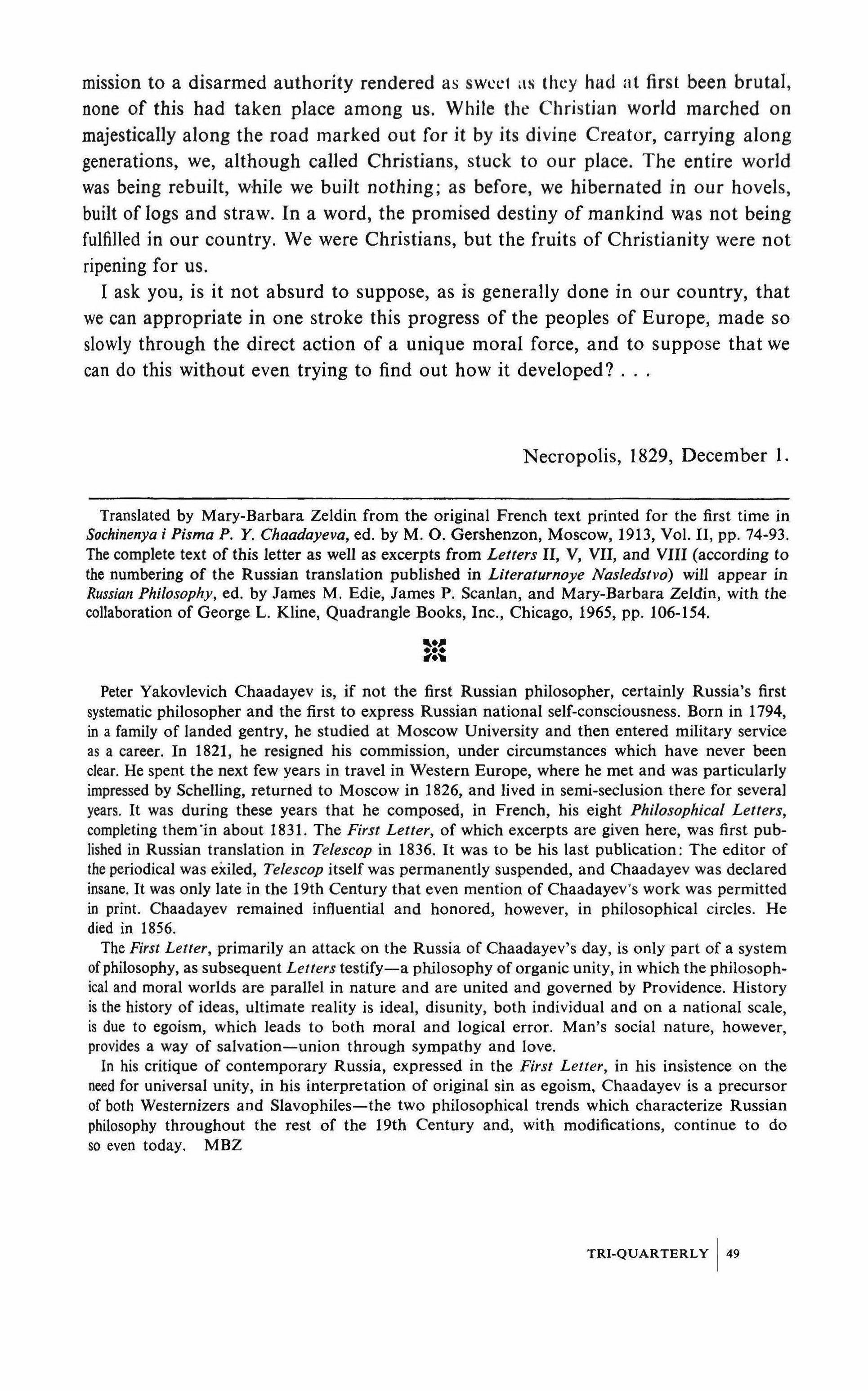
Necropolis, 1829, December 1.
Translated by Mary-Barbara Zeldin from the original French text printed for the first time in Sochinenya i Pisma P. Y. Chaadayeva, ed. by M. O. Gershenzon, Moscow, 1913, Vol. II, pp. 74-93. The complete text of this letter as well as excerpts from Leiters II, V, VII, and VIII (according to the numbering of the Russian translation published in Literaturnoye Nasledstvo) will appear in Russian Philosophy, ed. by James M. Edie, James P. Scanlan, and Mary-Barbara Zeldin, with the collaboration of George L. Kline, Quadrangle Books, Inc., Chicago, 1965, pp. 106-154.
Peter Yakovlevich Chaadayev is, if not the first Russian philosopher, certainly Russia's first systematic philosopher and the first to express Russian national self-consciousness. Born in 1794, in a family of landed gentry, he studied at Moscow University and then entered military service as a career. In 1821, he resigned his commission, under circumstances which have never been clear. He spent the next few years in travel in Western Europe, where he met and was particularly impressed by Schelling, returned to Moscow in 1826, and lived in semi-seclusion there for several years. It was during these years that he composed, in French, his eight Philosophical Letters, completing them 'in about 1831. The First Letter, of which excerpts are given here, was first published in Russian translation in Telescop in 1836. It was to be his last publication: The editor of the periodical was exiled, Telescop itself was permanently suspended, and Chaadayev was declared insane. It was only late in the 19th Century that even mention of Chaadayev's work was permitted in print. Chaadayev remained influential and honored, however, in philosophical circles. He died in 1856.
The First Letter, primarily an attack on the Russia of Chaadayev's day, is only part of a system ofphilosophy, as subsequent Letters testify-a philosophy of organic unity, in which the philosophical and moral worlds are parallel in nature and are united and governed by Providence. History is the history of ideas, ultimate reality is ideal, disunity, both individual and on a national scale, is due to egoism, which leads to both moral and logical error. Man's social nature, however, provides a way of salvation-union through sympathy and love.
In his critique of contemporary Russia, expressed in the First Letter, in his insistence on the need for universal unity, in his interpretation of original sin as egoism, Chaadayev is a precursor of both Westernizers and Slavophiles=-the two philosophical trends which characterize Russian philosophy throughout the rest of the 19th Century and, with modifications, continue to do so even today. MBZ
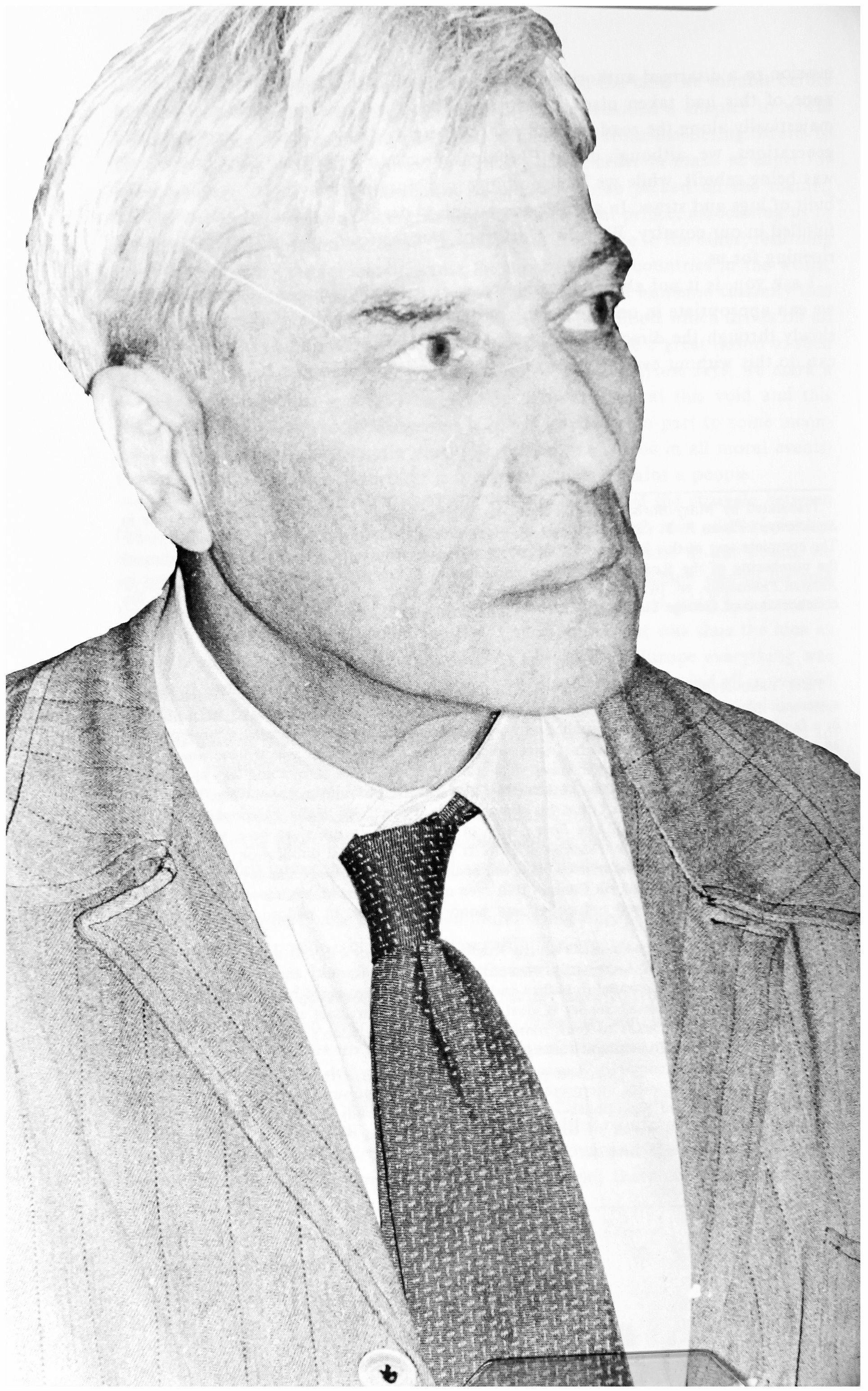
"A New Year's Greeting"BORIS PASTERNAK
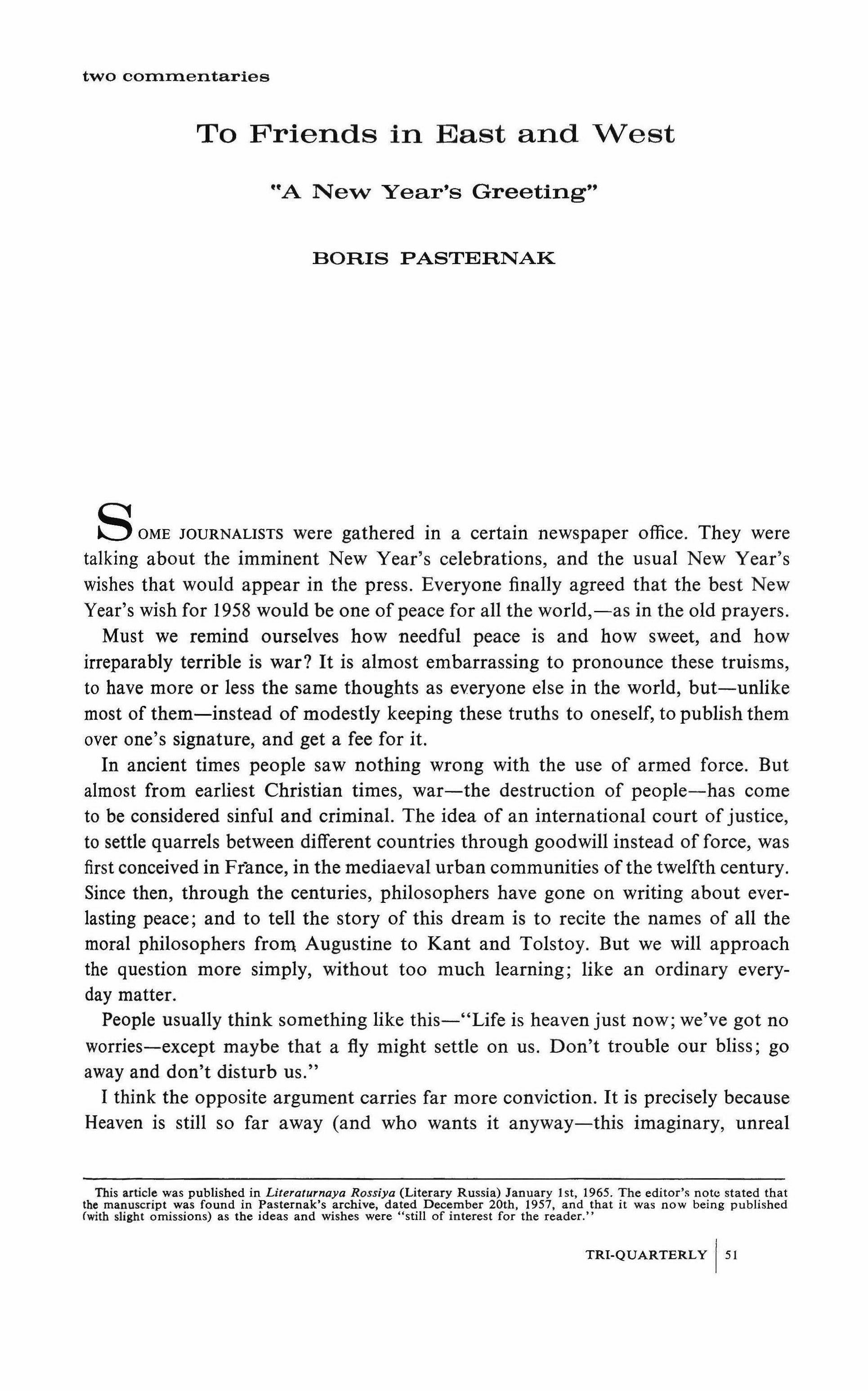
JOURNALISTS were gathered in a certain newspaper office. They were talking about the imminent New Year's celebrations, and the usual New Year's wishes that would appear in the press. Everyone finally agreed that the best New Year's wish for 1958 would be one of peace for all the world,-as in the old prayers. Must we remind ourselves how needful peace is and how sweet, and how irreparably terrible is war? It is almost embarrassing to pronounce these truisms, to have more or less the same thoughts as everyone else in the world, but-unlike most of them-instead of modestly keeping these truths to oneself, to publish them over one's signature, and get a fee for it.
In ancient times people saw nothing wrong with the use of armed force. But almost from earliest Christian times, war-the destruction of people-has come to be considered sinful and criminal. The idea of an international court of justice, to settle quarrels between different countries through goodwill instead of force, was first conceived in France, in the mediaeval urban communities ofthe twelfth century. Since then, through the centuries, philosophers have gone on writing about everlasting peace; and to tell the story of this dream is to recite the names of all the moral philosophers from Augustine to Kant and Tolstoy. But we will approach the question more simply, without too much learning; like an ordinary everyday matter.
People usually think something like this-"Life is heaven just now; we've got no worries-except maybe that a fly might settle on us. Don't trouble our bliss; go away and don't disturb us."
I think the opposite argument carries far more conviction. It is precisely because Heaven is still so far away (and who wants it anyway-this imaginary, unreal
Heaven, boring as everything that does not exist)-it is precisely because you are displeased with us, annoyed with us about something-and because we are none too pleased with ourselves-that you should leave us alone.
*Let Life itself patiently and naturally round off and smooth out what was begun in storm and violence. Don't meddle with its transformations. Don't hinder it. Because not a single war has ever taken away the evil it was supposedly started against; the evil has always been strengthened and perpetuated. * * -Or do you expect no changes from us, do you think we have begun to stagnate? That all we can do is re-name our cities and streets, that we are incapable of any further change or improvement? But perhaps we were so impoverished and so overwhelmed by the labour of destruction and transformation-which your prophets of enlightenment had been preaching for the last hundred years, and which we alone undertook for the whole world-that we do not want any more upheavals yet, we haven't yet come to our senses, we haven't got our breath back.
To think back on it, it really might have seemed for a long time that these mirages and prophecies, this flower of nineteenth-century thought, this socialist dream would always remain an adornment of political journalism, would never come out of the books, would never actually come true.
But here was a country where people, pure in heart as children, did not trifle with their words. They took everything seriously, and words were laws for them; they considered that if something was said, it had to be done. And they plunged recklessly, without thinking twice, into the maelstrom of their (and-mainly-your) theories. They achieved the new political maturity you had proclaimed, and they alone in all the world have passed through it. What had been so long planned, prepared and postponed, came to pass. Thank us that this is done; that it is behind us.
And thank us for this too. Our revolution set the tone for yours, however great the difference between them; it filled this century with sense and meaning. Not only we, and our younger generation-even your banker's son is not the same as his father and grandfather were before him. He may be more cynical and less welleducated than they were, but he is simpler and less long-winded, his spirit is wiser and closer to the truth. He no longer believes in the divine origin of property, nor thinks that with his savings he can conquer death. He enters life unencumbered, as a man should: he comes as a guest to the feast of existence, and knows that what matters is not how much he inherits but how he behaves at the feast, and what people remember and love him for.
Thank us then for this new man, even in your old society; thank us that he is livelier, finer-witted and more gifted than his heavy and pompous predecessors; for this child of the century was delivered in the maternity home called Russia.
So should we not rather peacefully exchange good wishes for the coming New Year, and hope that no echoes of warlike thunder mingle with the popping of corks as it comes in, nor are heard later in the course of it, or in succeeding years
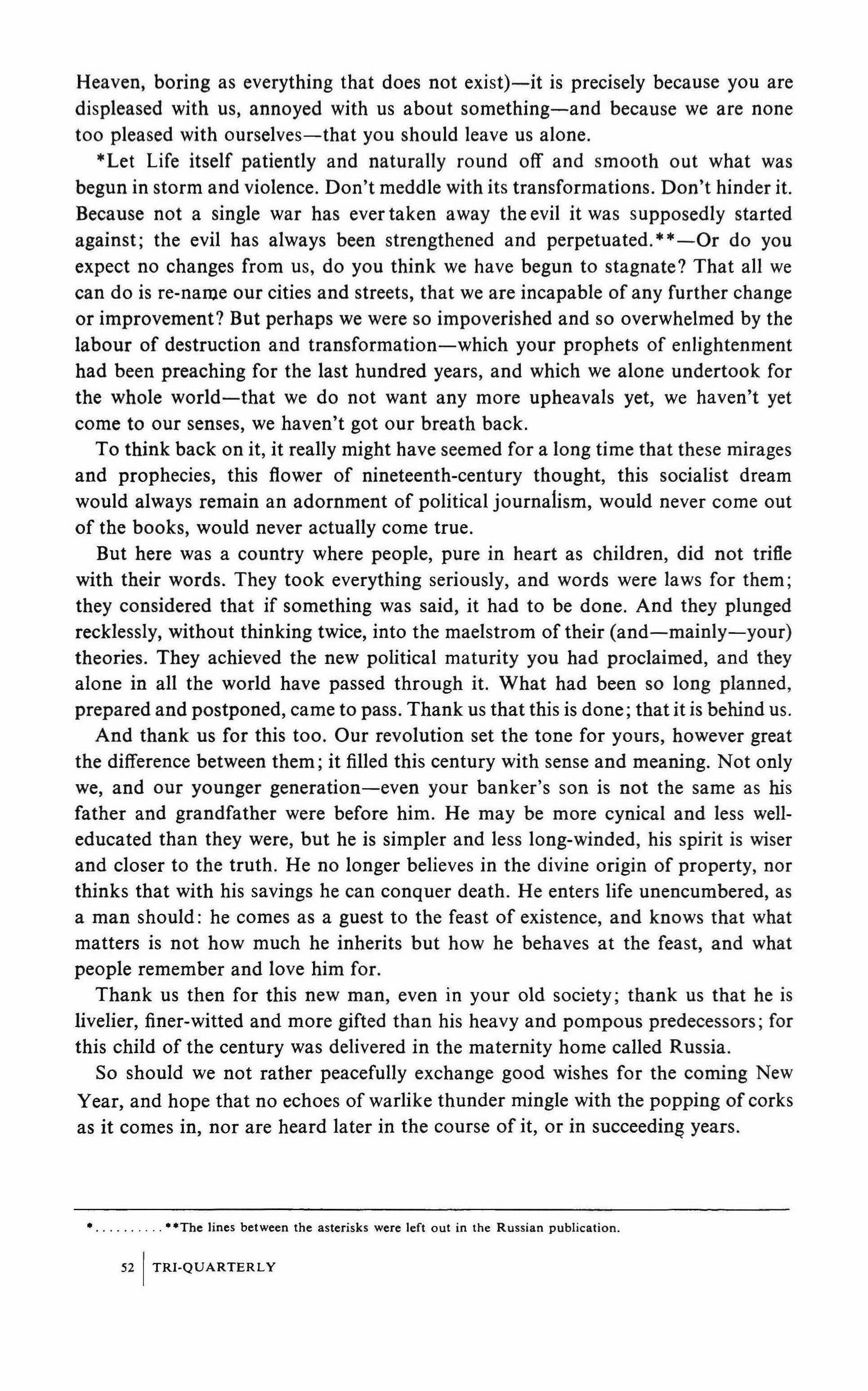
··The lines between the asterisks were left out in the Russian publication. 521 TRI-QUARTERLY
But if fate has decreed a disaster, then remember the events that formed us, and what a severe and hardening school they were. There is no-one more desperate than we, no-one more prepared to do the impossible and unbelievable; and any challenge to war will turn us all into so many heroes, as our recent ordeal has shown.
Translated by NICHOLAS SLATER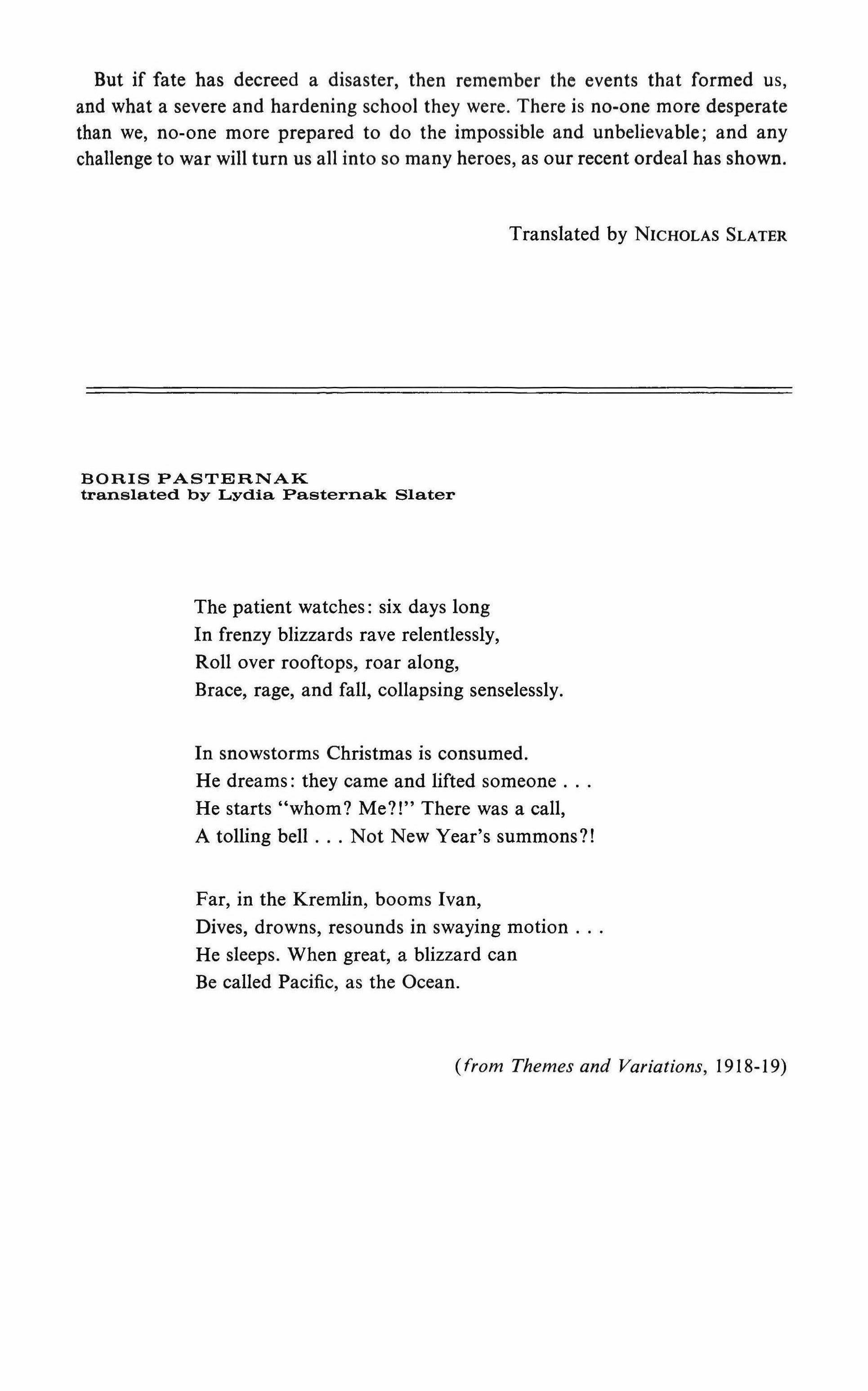
translated by Lydia Pasternak
SlaterThe patient watches: six days long In frenzy blizzards rave relentlessly, Roll over rooftops, roar along, Brace, rage, and fall, collapsing senselessly.
In snowstorms Christmas is consumed. He dreams: they came and lifted someone He starts "whom? Me?!" There was a call, A tolling bell Not New Year's summons?!
Far, in the Kremlin, booms Ivan, Dives, drowns, resounds in swaying motion He sleeps. When great, a blizzard can Be called Pacific, as the Ocean.
(from Themes and Variations, 1918-19)
translated by Lydia Pasternak Slater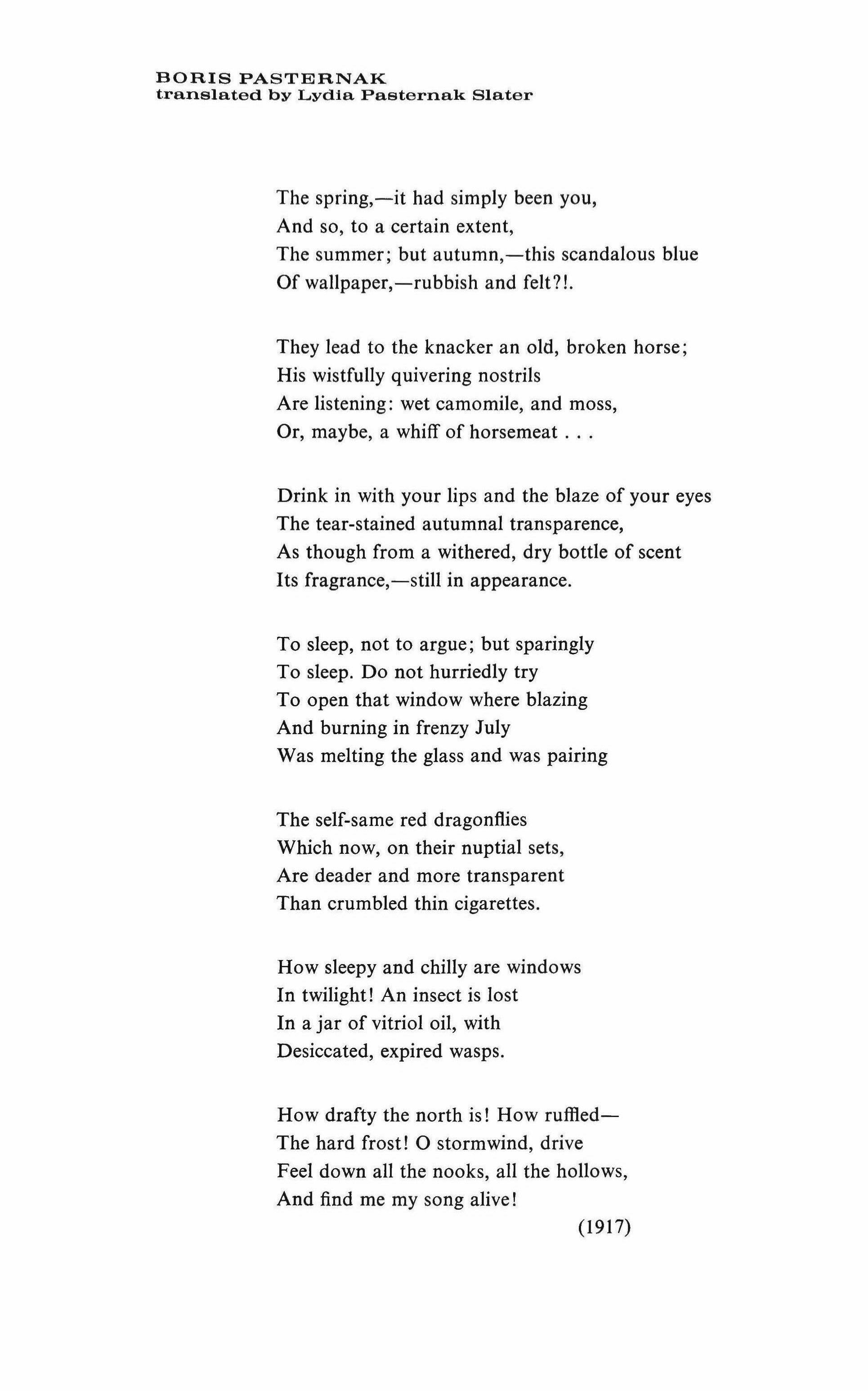
The spring,-it had simply been you, And so, to a certain extent, The summer; but autumn,-this scandalous blue Of wallpaper,-rubbish and felt?!.
They lead to the knacker an old, broken horse; His wistfully quivering nostrils Are listening: wet camomile, and moss, Or, maybe, a whiff of horsemeat
Drink in with your lips and the blaze of your eyes The tear-stained autumnal transparence, As though from a withered, dry bottle of scent Its fragrance,-still in appearance.
To sleep, not to argue; but sparingly To sleep. Do not hurriedly try To open that window where blazing And burning in frenzy July Was melting the glass and was pairing
The self-same red dragonflies Which now, on their nuptial sets, Are deader and more transparent Than crumbled thin cigarettes.
How sleepy and chilly are windows In twilight! An insect is lost In a jar of vitriol oil, with Desiccated, expired wasps.
How drafty the north is! How rufHedThe hard frost! 0 stormwind, drive Feel down all the nooks, all the hollows, And find me my song alive! (1917)
"You are courageous," I am often told. It is untrue. I never was courageous.
To share the cowardice of my colleagues I simply found unworthy and degrading. J ridiculed what seemed inflated, false, But never shook proverbial foundations. I tried to say the very things I thought. I wrote. I did not write denunciations. Yes, I defended decent men all round, And branded mediocrity and bleating.
To do so one is surely duty-bound, Yet "courage" is the word they are repeating. 0, with a sense of bitter, burning shame
Will our descendants-with the vileness dealing
Think of the time-so strange-when men were feeling That simple honesty and courage were-the same.

How can it go on lasting? This careless, Bland and bewildering sort of unfairness. Where and when did it come into fashion: "To the living-indifference; to the dead-attention"?
People are stooping, drinking and grieving, One after another, people are leaving, And tender speeches are, after cremation, Delivered to history, for information. What, with his looks, his voice and his vigour
Made Mayakovsky press on the trigger?
Had he but once-in all his tremendousnessWitnessed, alive, some token of tenderness
The living-they bother, they are disregarded. Tenderness-only for death is awarded.

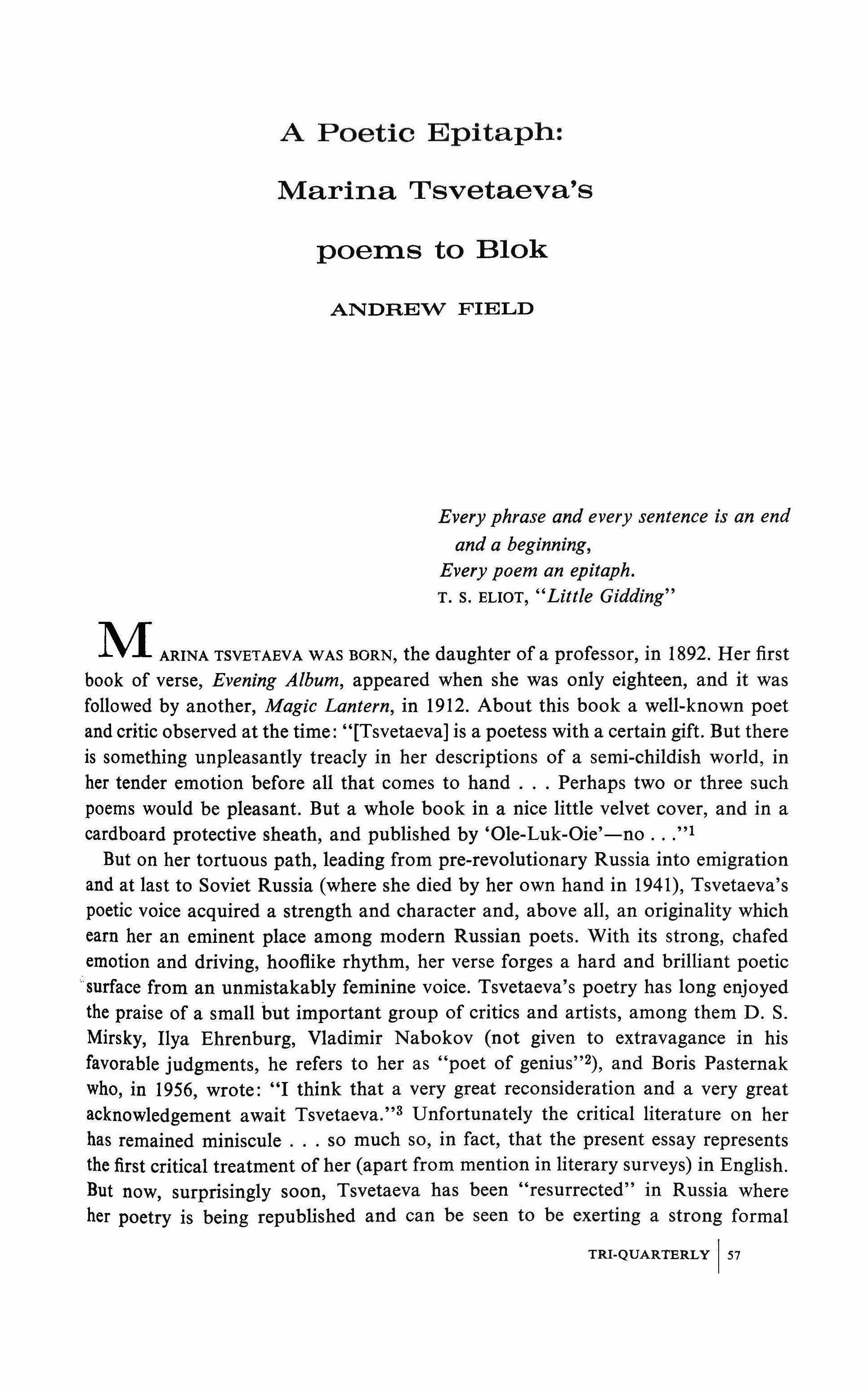
Every phrase and every sentence is an end and a beginning, Every poem an epitaph.
T. S. ELIOT,"Little Gidding"
TSVETAEVA WAS BORN, the daughter of a professor, in 1892. Her first book of verse, Evening Album, appeared when she was only eighteen, and it was followed by another, Magic Lantern, in 1912. About this book a well-known poet and critic observed at the time: "[Tsvetaeva] is a poetess with a certain gift. But there is something unpleasantly treacly in her descriptions of a semi-childish world, in her tender emotion before all that comes to hand Perhaps two or three such poems would be pleasant. But a whole book in a nice little velvet cover, and in a cardboard protective sheath, and published by 'Ole-Luk-Oie'-no "1
But on her tortuous path, leading from pre-revolutionary Russia into emigration and at last to Soviet Russia (where she died by her own hand in 1941), Tsvetaeva's poetic voice acquired a strength and character and, above all, an originality which earn her an eminent place among modern Russian poets. With its strong, chafed emotion and driving, hooftike rhythm, her verse forges a hard and brilliant poetic surface from an unmistakably feminine voice. Tsvetaeva's poetry has long enjoyed the praise of a small but important group of critics and artists, among them D. S. Mirsky, Ilya Ehrenburg, Vladimir Nabokov (not given to extravagance in his favorable judgments, he refers to her as "poet of genius"), and Boris Pasternak who, in 1956, wrote: "I think that a very great reconsideration and a very great acknowledgement await Tsvetaeva."" Unfortunately the critical literature on her has remained miniscule so much so, in fact, that the present essay represents the first critical treatment of her (apart from mention in literary surveys) in English. But now, surprisingly soon, Tsvetaeva has been "resurrected" in Russia where her poetry is being republished and can be seen to be exerting a strong formal

influence on such important younger poets as Andrei Voznesensky. The word "resurrected" is, 1 think, a fitting one because Tsvetaeva is in essence a religious poet, an appellation which should be taken as a necessary but by no means a limiting or sufficient description. The religious current in her poetry is particularly evident in her cycle (and sixth book) of poems, Poems to Bloks, one of Tsvetaeva's major achievements and an outstanding monument of modern Russian poetry.
First, a brief description of the structure of the work. The natural analogy and the probable model for the cycle was, of course, Aleksandr Blok's own famous early volume of Symbolist poetry, Poems on the Beautiful Lady (1901-1902). The cycle consists of three parts, the first of which is almost as long as the other two combined. It is also divided in time-the first part was written in 1916 (except for its conclusion, written in 1920), while the two shorter sections were written in 1921, presumably on the occasion of Blok's death. As then might be expected, there is a marked difference in tone between the parts. In the first portion the "high and lofty" language which has been frequently noted in Tsvetaeva-it is worth noting that one of her favorite Russian poets was the 18th century poet Derzhavin-sounds most clearly. The second part is a threnody to Blok in the folk manner: the theme "in which cradle do you lie?" recurs continually, and such motifs as "a prince without a country" and "a friend without friends" bear a distinct folk imprint. The third part is an apostrophe to Russia symbolized as the grieving Virgin; it combines the disparate styles of the first two sections in an intense and stirring counterpoint of imagery and language. There is a valid question, it should be said, as to whether or not Poems to Blok ought to be read as a unified work rather than merely a book of poems, but the thematic order and progression of the poems lend great weight to the former reading-it might be best to say that Tsvetaeva, like Eliot, took individual poems on a single theme and "at some point" decided to use them as the basis for a larger whole work.
The central fact about Tsvetaeva's poetry is that its currency is the word itself rather than intricate grammatical structures enveloping an idea. Often she juxtaposes related words which have drifted far apart in meaning and re-establishes the bond between them, as, for instance, the adjective prazdny (idle) and the verb prazdnovat' (to celebrate):
Idle hands cross
- Dead lies the singer And celebrates resurrection.
Krestyatsya ruki prazdnye
-Myortvy lezhit pevets I voskresen' e prazdnuet. (20)
And, conversely, she links together words which are in fact not etymologically related:
To the wanderer-the road
To the dead-a hearse
Stranniku-doroga Myortvomu-drogi (16)

Concern for the value and poetic potentiality or each word is also reflected in Tsvetaeva's fragmented lines:
In a mist-dove-colored
You stand, in a chasuble
Of snow adorned.
Vo mgle=sizoy
Stoish', rizoy
Snegovoy odet. (12)
The position of "chasuble" (riza) does not permit the reader to pass over it as a mere substantive in a sentence; a pause is obligatory. Syntax serves the same purpose-it is an attempt, strangely reminiscent of l Sth century poetics, to impart new expressive power to the poet's words.
Because Tsvetaeva views art as a sacred function ("In its relation to the spiritual world art is a certain physical world of the spiritual."5) her concern for even the outward form of the written word is scarcely less than-and indeed quite analogous to-that of the Russian Old Believers for crossing themselves with two fingers instead of three. The initial stanza of Poems to Blok is an incantation of Blok's name:
Your name-a bird in hand, Your name-a bit of ice on the tongue, One lone movement of the lips, Your name-five letters.
A ball, caught in flight, A little silver bell in the mouth.
IIMH TBoenraua B PYKe, IIMH TBoe - Jlh)1.HHKa ua H3h1Ke, O)1.HO e)1.HHCTBeHHoe )1.BHJKeHHe ry6, IIMH TBoe - llHTh 6YKB.
MH'IHK, lloHMaHHhIH na JleTY, Cepe6pHHhIH 6y6eHeQ BO pry. (11)
The first line invests the name (which is not to say the man) with life, a bird in the hand. Tsvetaeva's stress upon the phonetics and orthography of Blok's namethe five letters where new practice would count but four (after the 1917 Revolution, in a major revision of Russian spelling, the "hard sign" which stood at the end of most nouns and proper names and was not pronounced was dropped)-makes of it a verbal connection with the past. Tsvetaeva was to the end of her life a passionate advocate of the old orthography. Finally, the silver bell in her mouth (poetess as priestess) imitates the muted sound of Blok's name. The importance of this beginning cannot be too heavily emphasized. It is the mainspring of the entire cycle, defining eloquently the spiritual framework of the poems as well as the role of the artist, the language, and the protagonist.
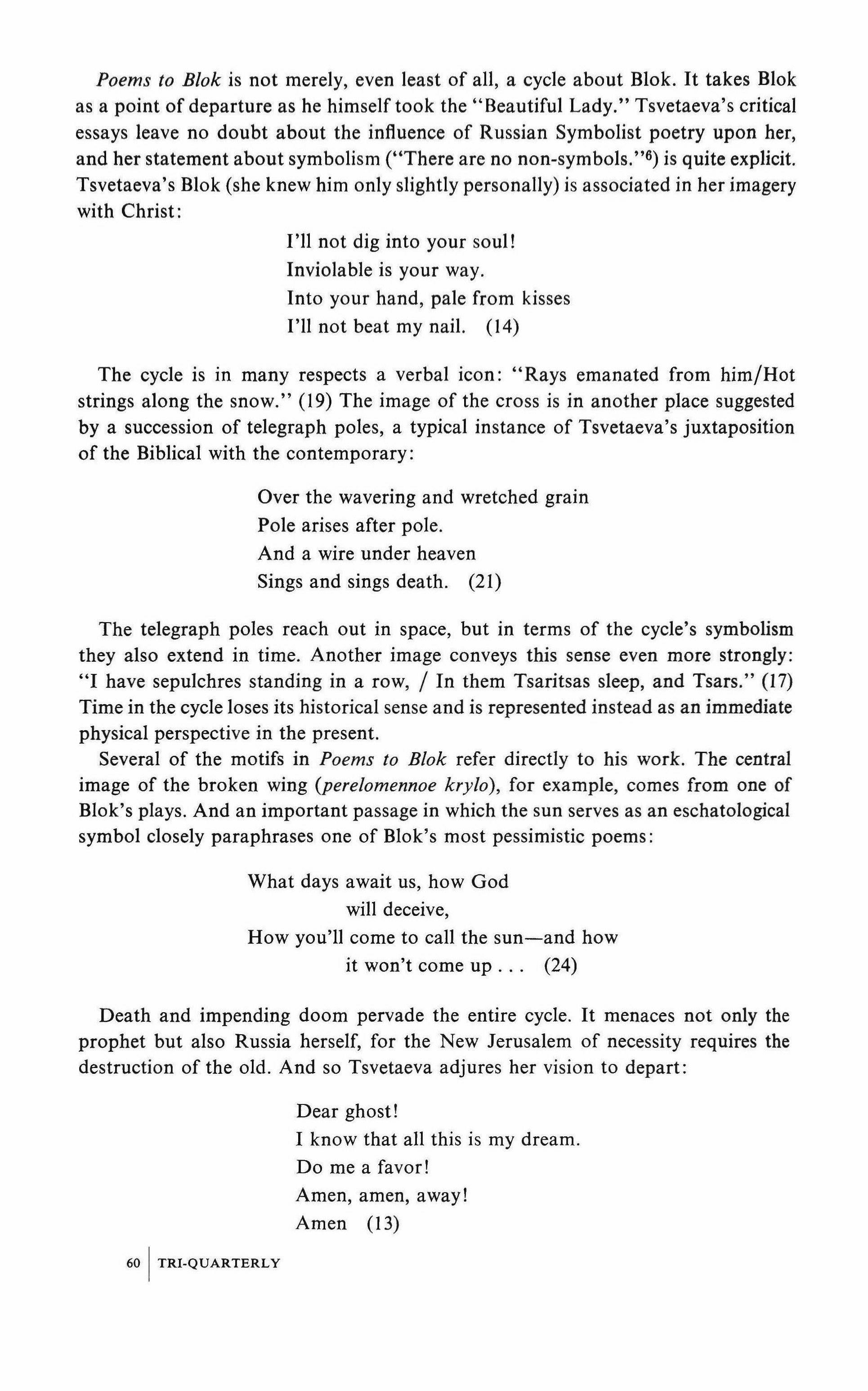
Poems to B/ok is not merely, even least of all, a cycle about Blok. It takes Blok as a point of departure as he himself took the "Beautiful Lady." Tsvetaeva's critical essays leave no doubt about the influence of Russian Symbolist poetry upon her, and her statement about symbolism ("There are no non-symbols.t") is quite explicit. Tsvetaeva's Blok (she knew him only slightly personally) is associated in her imagery with Christ:
I'll not dig into your soul!
Inviolable is your way.
Into your hand, pale from kisses I'll not beat my nail. (14)
The cycle is in many respects a verbal icon: "Rays emanated from him/Hot strings along the snow." (19) The image of the cross is in another place suggested by a succession of telegraph poles, a typical instance of Tsvetaeva's juxtaposition of the Biblical with the contemporary:
Over the wavering and wretched grain Pole arises after pole.
And a wire under heaven
Sings and sings death. (21)
The telegraph poles reach out in space, but in terms of the cycle's symbolism they also extend in time. Another image conveys this sense even more strongly: "I have sepulchres standing in a row, / In them Tsaritsas sleep, and Tsars." (17) Time in the cycle loses its historical sense and is represented instead as an immediate physical perspective in the present.
Several of the motifs in Poems to Blok refer directly to his work. The central image of the broken wing (perelomennoe kry/o), for example, comes from one of Blok's plays. And an important passage in which the sun serves as an eschatological symbol closely paraphrases one of Blok's most pessimistic poems:
What days await us, how God will deceive,
How you'll come to call the sun-and how it won't come up (24)
Death and impending doom pervade the entire cycle. It menaces not only the prophet but also Russia herself, for the New Jerusalem of necessity requires the destruction of the old. And so Tsvetaeva adjures her vision to depart:
Dear ghost!
I know that all this is my dream. Do me a favor!
Amen, amen, away!
Amen (13)
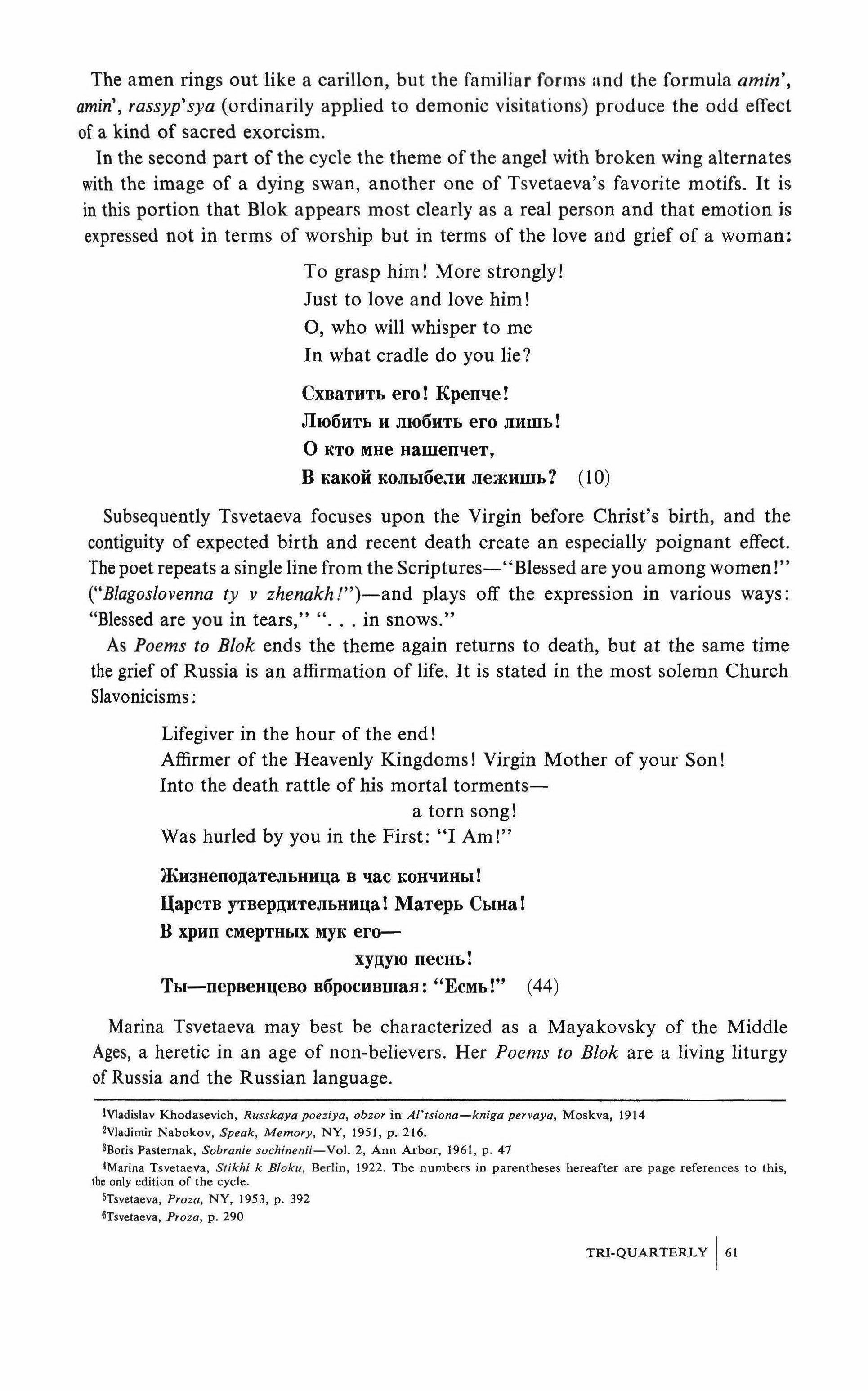
The amen rings out like a carillon, but the familiar forms and the formula amin', amin, rassyp'sya (ordinarily applied to demonic visitations) produce the odd effect of a kind of sacred exorcism.
In the second part of the cycle the theme of the angel with broken wing alternates with the image of a dying swan, another one of Tsvetaeva's favorite motifs. It is in this portion that Blok appears most clearly as a real person and that emotion is expressed not in terms of worship but in terms of the love and grief of a woman:
To grasp him! More strongly!
Just to love and love him!
0, who will whisper to me
In what cradle do you lie?
CXBaTHTh ero! Kpenxe!
JII06HTh H JII06HTh ero JIHllIh!
o KTO MHe uatuerrser, B KaKOH KOJIhl6eJIH JIe:IKHllIh? (10)
Subsequently Tsvetaeva focuses upon the Virgin before Christ's birth, and the contiguity of expected birth and recent death create an especially poignant effect. The poet repeats a single line from the Scriptures-"Blessed are you among women!" ("Blagoslovenna ty v zhenakh !"}-and plays off the expression in various ways: "Blessed are you in tears," in snows."
As Poems to Blok ends the theme again returns to death, but at the same time the grief of Russia is an affirmation of life. It is stated in the most solemn Church Slavonicisms:
Lifegiver in the hour of the end!
Affirmer of the Heavenly Kingdoms! Virgin Mother of your Son! Into the death rattle of his mortal tormentsa torn song! Was hurled by you in the First: "I Am!"
JKH3HenO�aTeJIhHHl\a B 'lac KOH'IHHhI!
II.apcTB YTBep�HTeJIhHHl\a! Mareps Csraa!
B xpan cMepTHbIX MYK eroXY�YIO necas!
Tbl-nepBeHl\eBo B6poCHBllIaJl: "ECMh!" (44)
Marina Tsvetaeva may best be characterized as a Mayakovsky of the Middle Ages, a heretic in an age of non-believers. Her Poems to Blok are a living liturgy of Russia and the Russian language.
IVladislav Khodasevich, Russkaya poeziya, obzor in Al'tsiona-kniga pervaya, Moskva, 1914
2Vladimir Nabokov, Speak, Memory, NY, 1951, p. 216.
3Boris Pasternak, Sobranie sochinenii-Vol. 2, Ann Arbor, 1961, p. 47
4Marina Tsvetaeva, Stikhi k Bloku, Berlin, 1922. The numbers in parentheses hereafter are page references to this, the only edition of the cycle.
5Tsvetaeva, Proza, NY, 1953, p. 392
6Tsvetaeva, Proza, p. 290
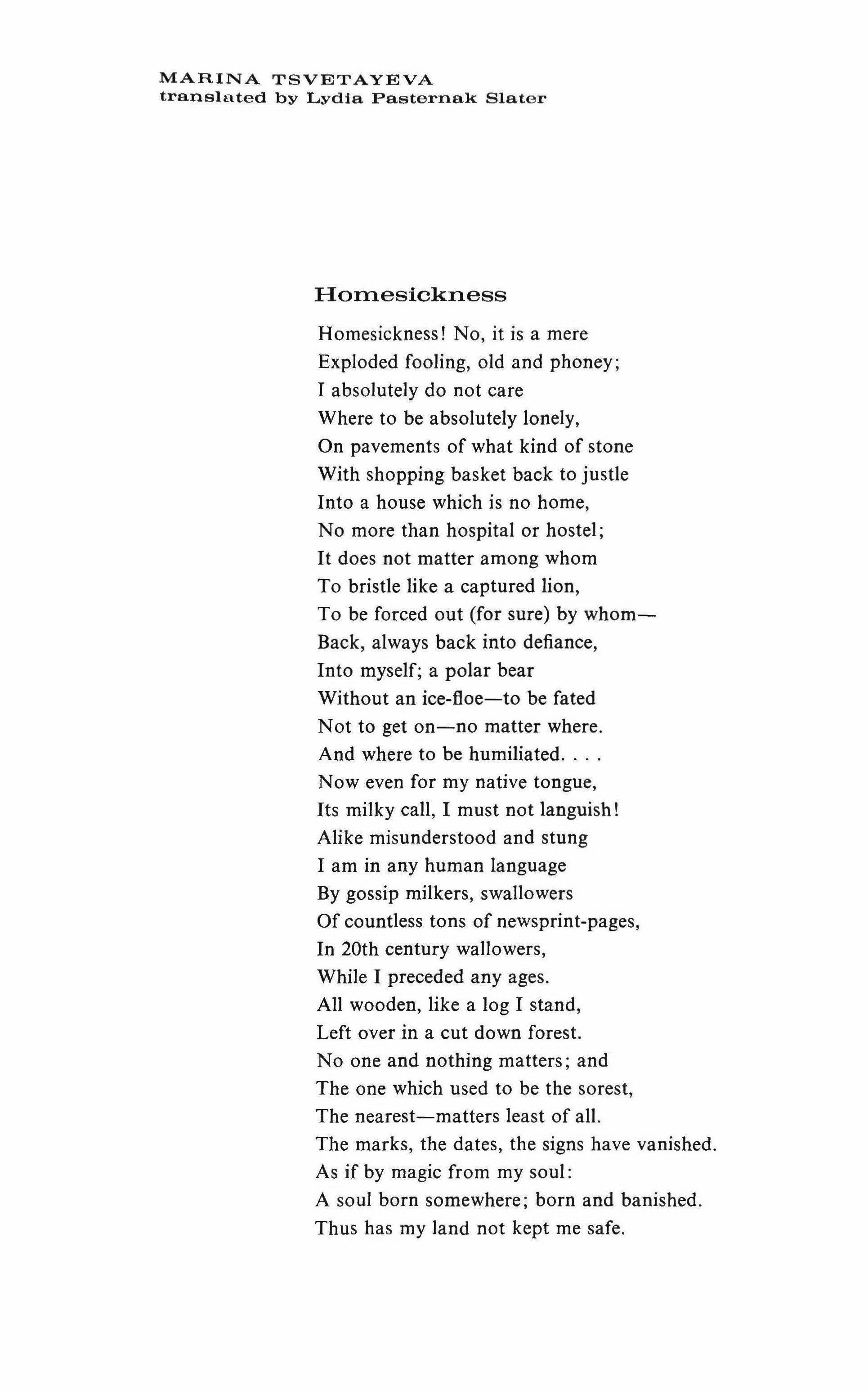
Homesickness! No, it is a mere Exploded fooling, old and phoney; I absolutely do not care Where to be absolutely lonely, On pavements of what kind of stone With shopping basket back to justle Into a house which is no home, No more than hospital or hostel; It does not matter among whom To bristle like a captured lion, To be forced out (for sure) by whomBack, always back into defiance, Into myself; a polar bear Without an ice-floe-to be fated Not to get on-no matter where. And where to be humiliated Now even for my native tongue, Its milky call, I must not languish! Alike misunderstood and stung I am in any human language By gossip milkers, swallowers Of countless tons of newsprint-pages, In 20th century wallowers, While I preceded any ages. All wooden, like a log I stand, Left over in a cut down forest. No one and nothing matters; and The one which used to be the sorest, The nearest-matters least of all. The marks, the dates, the signs have vanished. As if by magic from my soul: A soul born somewhere; born and banished. Thus has my land not kept me safe.
That should the sharpest of detectives
For just one birthmark search the waif
My soul-he could no more detect it.
Each house feels strange; each shrine to me
The same, and empty; nothing varies-
But if along the road I see
A bush, and if-with rowanberries
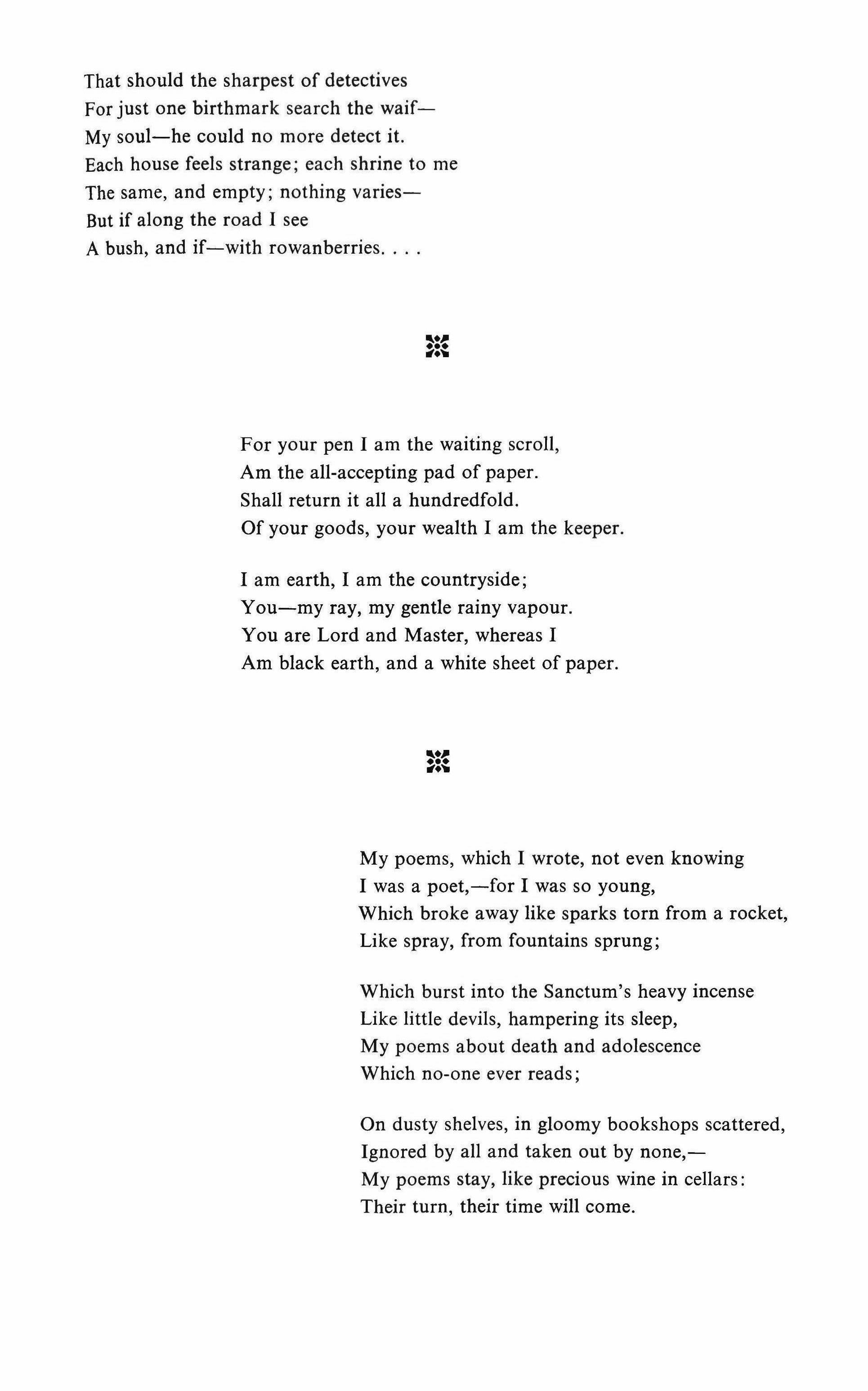
For your pen I am the waiting scroll, Am the all-accepting pad of paper. Shall return it all a hundredfold. Of your goods, your wealth I am the keeper.
I am earth, I am the countryside; You-my ray, my gentle rainy vapour. You are Lord and Master, whereas I Am black earth, and a white sheet of paper.
My poems, which I wrote, not even knowing I was a poet,-for I was so young, Which broke away like sparks torn from a rocket, Like spray, from fountains sprung;
Which burst into the Sanctum's heavy incense Like little devils, hampering its sleep, My poems about death and adolescence Which no-one ever reads;
On dusty shelves, in gloomy bookshops scattered, Ignored by all and taken out by none,My poems stay, like precious wine in cellars: Their turn, their time will come.
MARINA TSVETAEVA translated by Denise LevertovSo they don't expect letters. So they wait forletters. A ragged scrap circled by sticky tape. InsideA scribble, and happiness. And that's all.
So they don't expect happiness. So they expectthe end.
A soldierly salute, and three slugs of lead in the breast.
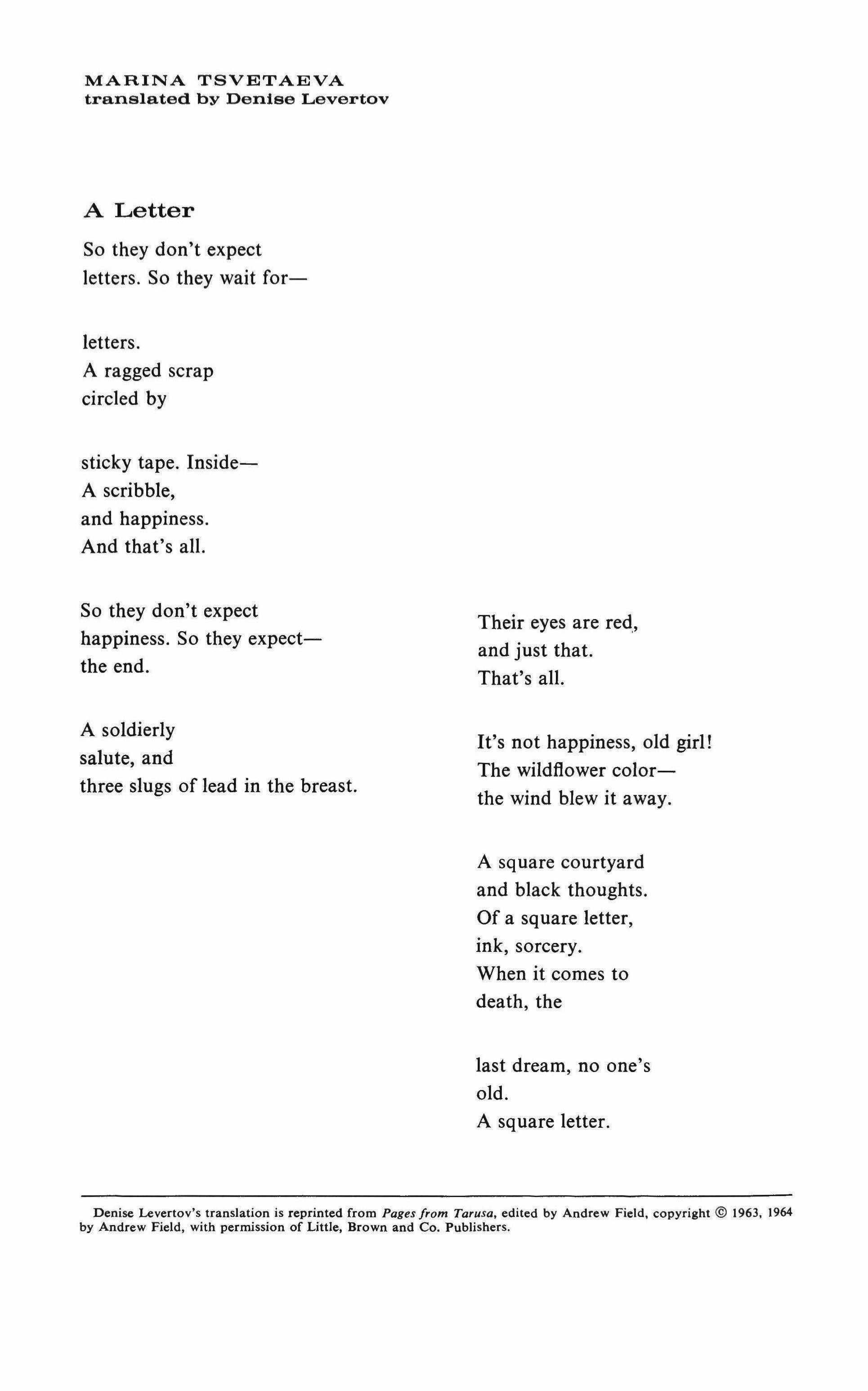
Their eyes are red" and just that. That's all.
It's not happiness, old girl! The wildflower colorthe wind blew it away.
A square courtyard and black thoughts. Of a square letter, ink, sorcery. When it comes to death, the last dream, no one's old.
A square letter.
Denise Levertov's translation is reprinted from Pages from Tarusa, edited by Andrew Field, copyright © 1963, 1964 by Andrew Field, with permission of Little, Brown and Co. Publishers.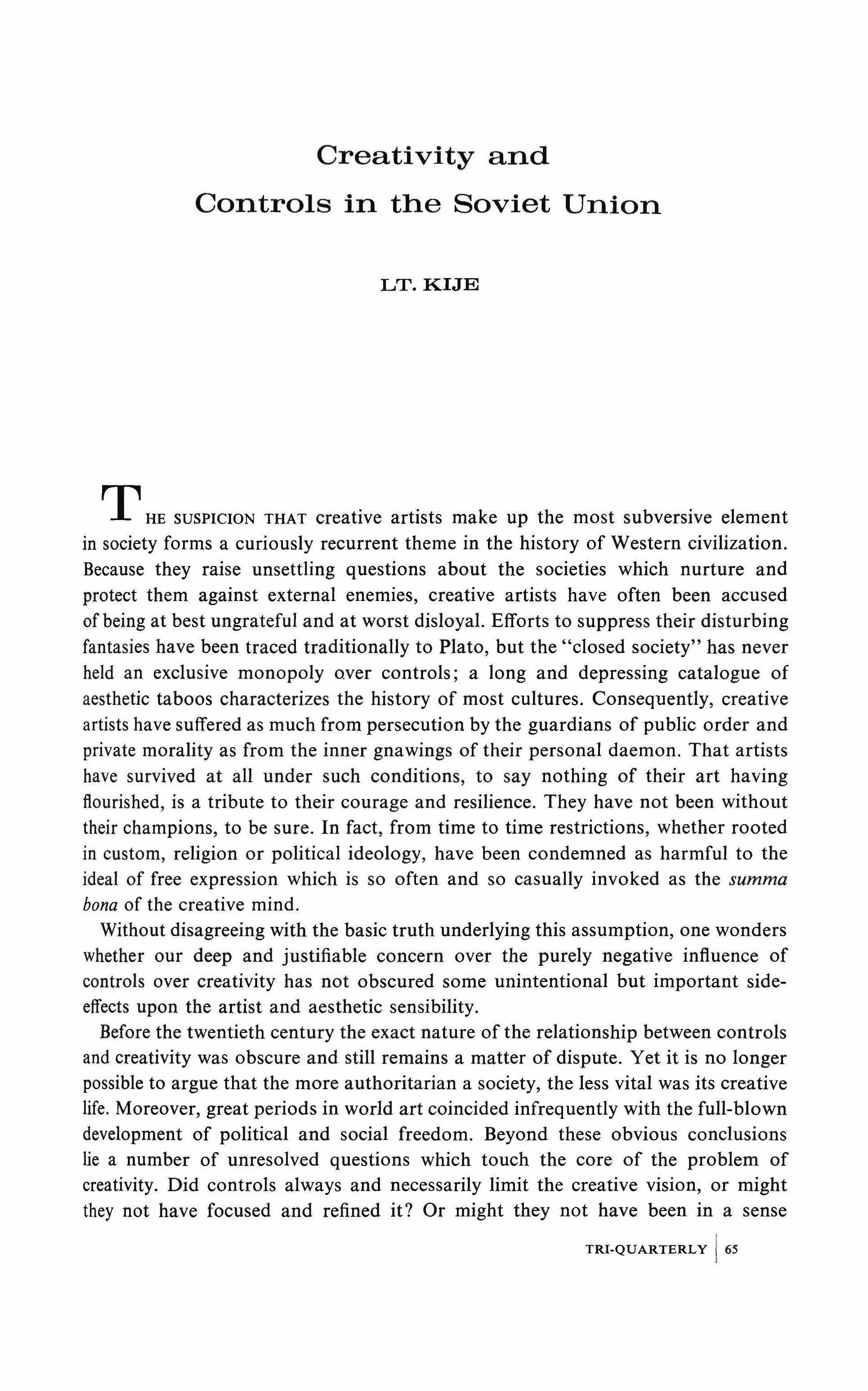
THE SUSPICION THAT creative artists make up the most subversive element in society forms a curiously recurrent theme in the history of Western civilization. Because they raise unsettling questions about the societies which nurture and protect them against external enemies, creative artists have often been accused of being at best ungrateful and at worst disloyal. Efforts to suppress their disturbing fantasies have been traced traditionally to Plato, but the "closed society" has never held an exclusive monopoly over controls; a long and depressing catalogue of aesthetic taboos characterizes the history of most cultures. Consequently, creative artists have suffered as much from persecution by the guardians of public order and private morality as from the inner gnawings of their personal daemon. That artists have survived at all under such conditions, to say nothing of their art having flourished, is a tribute to their courage and resilience. They have not been without their champions, to be sure. In fact, from time to time restrictions, whether rooted in custom, religion or political ideology, have been condemned as harmful to the ideal of free expression which is so often and so casually invoked as the summa bona of the creative mind.
Without disagreeing with the basic truth underlying this assumption, one wonders whether our deep and justifiable concern over the purely negative influence of controls over creativity has not obscured some unintentional but important sideeffects upon the artist and aesthetic sensibility.
Before the twentieth century the exact nature of the relationship between controls and creativity was obscure and still remains a matter of dispute. Yet it is no longer possible to argue that the more authoritarian a society, the less vital was its creative life. Moreover, great periods in world art coincided infrequently with the full-blown development of political and social freedom. Beyond these obvious conclusions lie a number of unresolved questions which touch the core of the problem of creativity. Did controls always and necessarily limit the creative vision, or might they not have focused and refined it? Or might they not have been in a sense
TRI-QUARTERLY

irrelevant, as in twelfth century France or sixteenth century Spain when the limits of expression set down by external authority corresponded to the artists' selfimposed aesthetic values? An argument can be made that censorship even offered a strong, if perverse, incentive to the creative mind as in nineteenth century Russia. Whatever may have been the responses to controls in the past, the rise of totalitarian governments in the twentieth century appeared to have resolved the question brutally. The Nazi and Communist parties made a systematic attempt to obliterate what they called "depraved" or "formalist" works of art, and left behind a hideous record of ruined talents and broken men. Aside from the obvious coersive instruments of censorship, indoctrination and outright terror, the Soviet Communist Party after 1932 displayed particular ingenuity in trying to wipe out even the historical memory of subversive creative work. Paintings, manuscripts, books, sculpture and musical compositions in the experimental styles of the first three decades of this century were hidden from the public in special funds of libraries, galleries and museums-closed to all but specialists with impeccable political credentials. Until quite recently many young Soviet intellectuals, ordinarily well-informed about their cultural life, did not know that these treasure troves even existed, nor had they seen the work of such important Russian painters as Chagall, Malevich, Kandinskii, nor heard many works by Stravinsky, Shostakovich and Prokofiev. Up to now, because of the overwhelmingly destructive impact of totalitarian controls upon the life and work of creative artists, there has been little opportunity or inclination in the West to speculate on any hidden effects of the system which were unconsciously quite the opposite of those intended.
There is no question here of raising the specious arguments that cultural stagnation was a historically necessary, if regrettable, sacrifice to the cause of building socialism, nor of arguing that artists must suffer in order to produce great art and the greater the suffering, the greater the art. Rather this is an attempt to shed some light on the complex relationship between the artist and society and upon recent developments in the cultural life of the Soviet Union.
It should be kept in mind from the outset that the creative artists in Russia who identified themselves most closely with the Bolshevik revolution of 1917 were the innovators who had nothing but contempt for the traditional bourgeois values of pre-revolutionary society. Ironically, these early converts were quickly disillusioned by the indifference and finally the hostility of the political leaders of the revolution who regarded their counterparts in the arts as disturbing and disruptive elements ill-suited to satisfy the party's definition of the socio-cultural needs of the masses. In a basically agrarian society with a narrow cultural base and widespread illiteracy, according to the party, highly sophisticated artistic styles would only bewilder the masses and widen the already formidable gap between them and the intellectualcultural elite. Just as important, Stalin's personal taste did not reach far beyond tunes which could be whistled and photographic effects in painting. Beyond this, however, Stalin saw, with almost diabolical insight, how the great emotional power of art could be enlisted in his drive to transform the socio-economic life of Russia. While the social engineers struggled against heavy odds to build the material base, the artist would reveal the final dazzling vision of "socialism in one country."
TRI-QUARTERLY
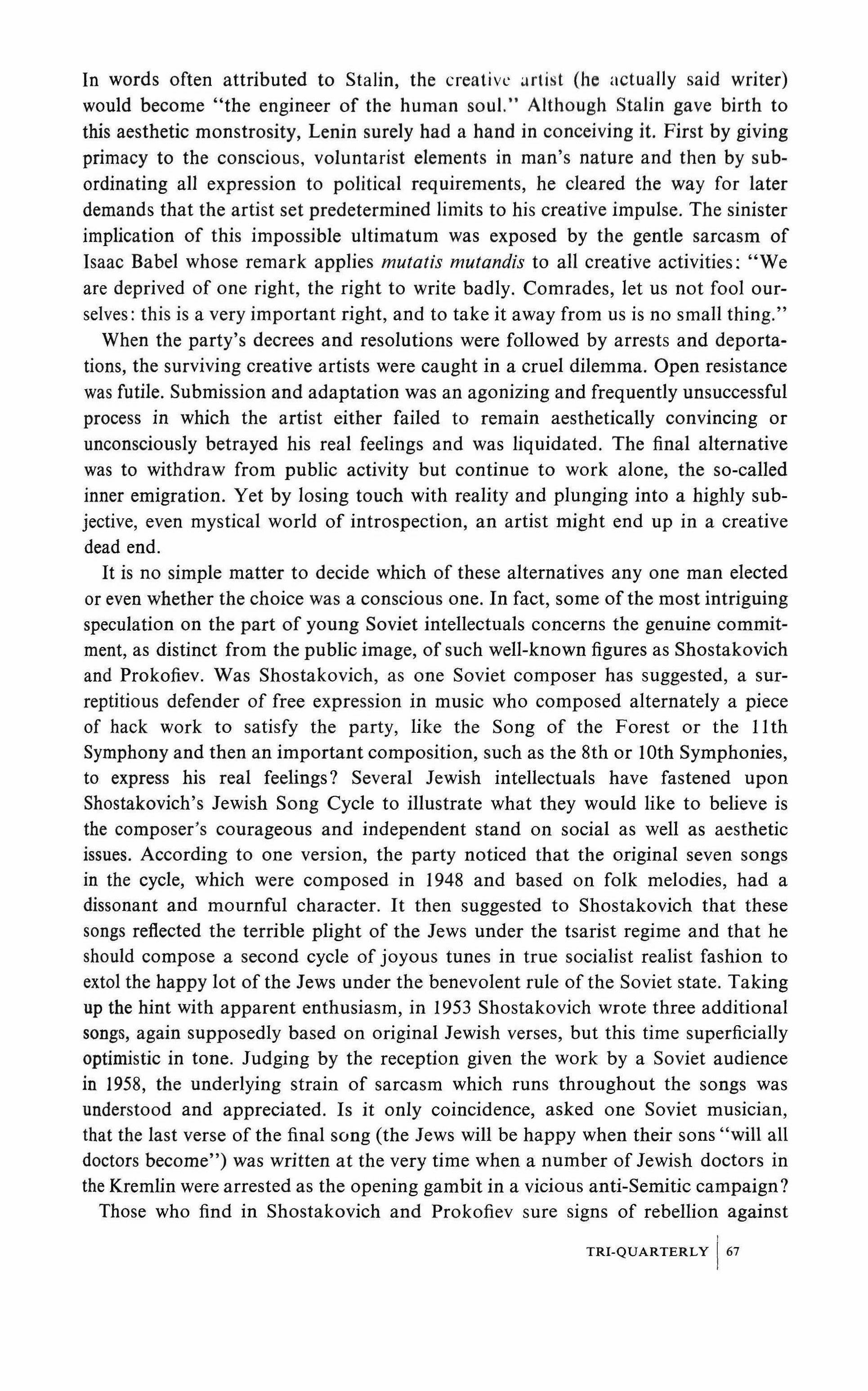
In words often attributed to Stalin, the creative artist (he actually said writer) would become "the engineer of the human soul." Although Stalin gave birth to this aesthetic monstrosity, Lenin surely had a hand in conceiving it. First by giving primacy to the conscious, voluntarist elements in man's nature and then by subordinating all expression to political requirements, he cleared the way for later demands that the artist set predetermined limits to his creative impulse. The sinister implication of this impossible ultimatum was exposed by the gentle sarcasm of Isaac Babel whose remark applies mutatis mutandis to all creative activities: "We are deprived of one right, the right to write badly. Comrades, let us not fool ourselves: this is a very important right, and to take it away from us is no small thing."
When the party's decrees and resolutions were followed by arrests and deportations, the surviving creative artists were caught in a cruel dilemma. Open resistance was futile. Submission and adaptation was an agonizing and frequently unsuccessful process in which the artist either failed to remain aesthetically convincing or unconsciously betrayed his real feelings and was liquidated. The final alternative was to withdraw from public activity but continue to work alone, the so-called inner emigration. Yet by losing touch with reality and plunging into a highly subjective, even mystical world of introspection, an artist might end up in a creative dead end.
It is no simple matter to decide which of these alternatives anyone man elected or even whether the choice was a conscious one. In fact, some of the most intriguing speculation on the part of young Soviet intellectuals concerns the genuine commitment, as distinct from the public image, of such well-known figures as Shostakovich and Prokofiev. Was Shostakovich, as one Soviet composer has suggested, a surreptitious defender of free expression in music who composed alternately a piece of hack work to satisfy the party, like the Song of the Forest or the 11 th Symphony and then an important composition, such as the 8th or lath Symphonies, to express his real feelings? Several Jewish intellectuals have fastened upon Shostakovich's Jewish Song Cycle to illustrate what they would like to believe is the composer's courageous and independent stand on social as well as aesthetic issues. According to one version, the party noticed that the original seven songs in the cycle, which were composed in 1948 and based on folk melodies, had a dissonant and mournful character. It then suggested to Shostakovich that these songs reflected the terrible plight of the Jews under the tsarist regime and that he should compose a second cycle of joyous tunes in true socialist realist fashion to extol the happy lot of the Jews under the benevolent rule of the Soviet state. Taking up the hint with apparent enthusiasm, in 1953 Shostakovich wrote three additional songs, again supposedly based on original Jewish verses, but this time superficially optimistic in tone. Judging by the reception given the work by a Soviet audience in 1958, the underlying strain of sarcasm which runs throughout the songs was understood and appreciated. Is it only coincidence, asked one Soviet musician, that the last verse of the final song (the Jews will be happy when their sons "will all doctors become") was written at the very time when a number of Jewish doctors in the Kremlin were arrested as the opening gambit in a vicious anti-Semitic campaign? Those who find in Shostakovich and Prokofiev sure signs of rebellion against I TRI-QUARTERLY 167
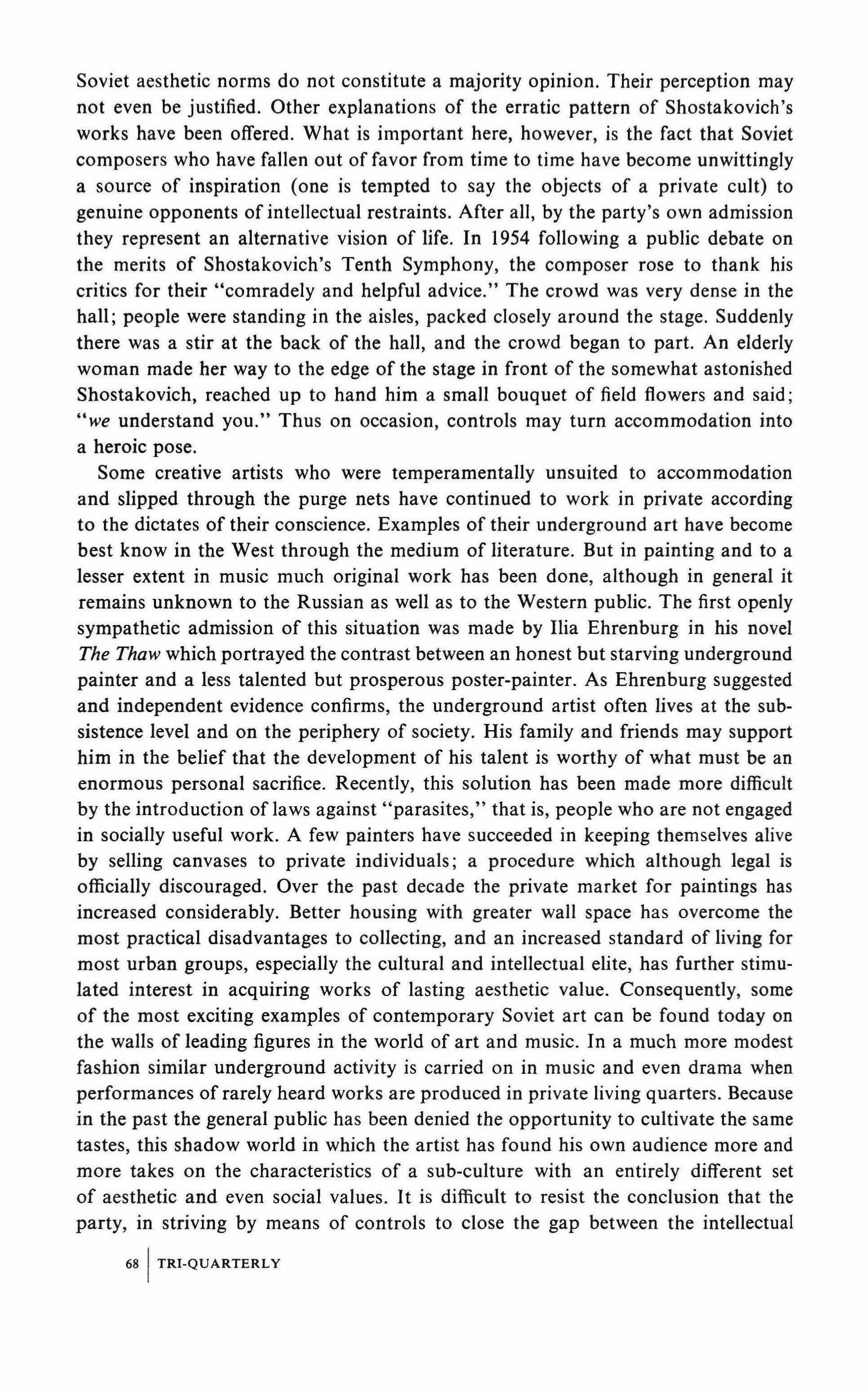
Soviet aesthetic norms do not constitute a majority opinion. Their perception may not even be justified. Other explanations of the erratic pattern of Shostakovich's works have been offered. What is important here, however, is the fact that Soviet composers who have fallen out of favor from time to time have become unwittingly a source of inspiration (one is tempted to say the objects of a private cult) to genuine opponents of intellectual restraints. After all, by the party's own admission they represent an alternative vision of life. In 1954 following a public debate on the merits of Shostakovich's Tenth Symphony, the composer rose to thank his critics for their "comradely and helpful advice." The crowd was very dense in the hall; people were standing in the aisles, packed closely around the stage. Suddenly there was a stir at the back of the hall, and the crowd began to part. An elderly woman made her way to the edge of the stage in front of the somewhat astonished Shostakovich, reached up to hand him a small bouquet of field flowers and said; "we understand you." Thus on occasion, controls may turn accommodation into a heroic pose.
Some creative artists who were temperamentally unsuited to accommodation and slipped through the purge nets have continued to work in private according to the dictates of their conscience. Examples of their underground art have become best know in the West through the medium of literature. But in painting and to a lesser extent in music much original work has been done, although in general it remains unknown to the Russian as well as to the Western public. The first openly sympathetic admission of this situation was made by Ilia Ehrenburg in his novel The Thaw which portrayed the contrast between an honest but starving underground painter and a less talented but prosperous poster-painter. As Ehrenburg suggested and independent evidence confirms, the underground artist often lives at the subsistence level and on the periphery of society. His family and friends may support him in the belief that the development of his talent is worthy of what must be an enormous personal sacrifice. Recently, this solution has been made more difficult by the introduction of laws against "parasites," that is, people who are not engaged in socially useful work. A few painters have succeeded in keeping themselves alive by selling canvases to private individuals; a procedure which although legal is officially discouraged. Over the past decade the private market for paintings has increased considerably. Better housing with greater wall space has overcome the most practical disadvantages to collecting, and an increased standard of living for most urban groups, especially the cultural and intellectual elite, has further stimulated interest in acquiring works of lasting aesthetic value. Consequently, some of the most exciting examples of contemporary Soviet art can be found today on the walls of leading figures in the world of art and music. In a much more modest fashion similar underground activity is carried on in music and even drama when performances of rarely heard works are produced in private living quarters. Because in the past the general public has been denied the opportunity to cultivate the same tastes, this shadow world in which the artist has found his own audience more and more takes on the characteristics of a sub-culture with an entirely different set of aesthetic and even social values. It is difficult to resist the conclusion that the party, in striving by means of controls to close the gap between the intellectual
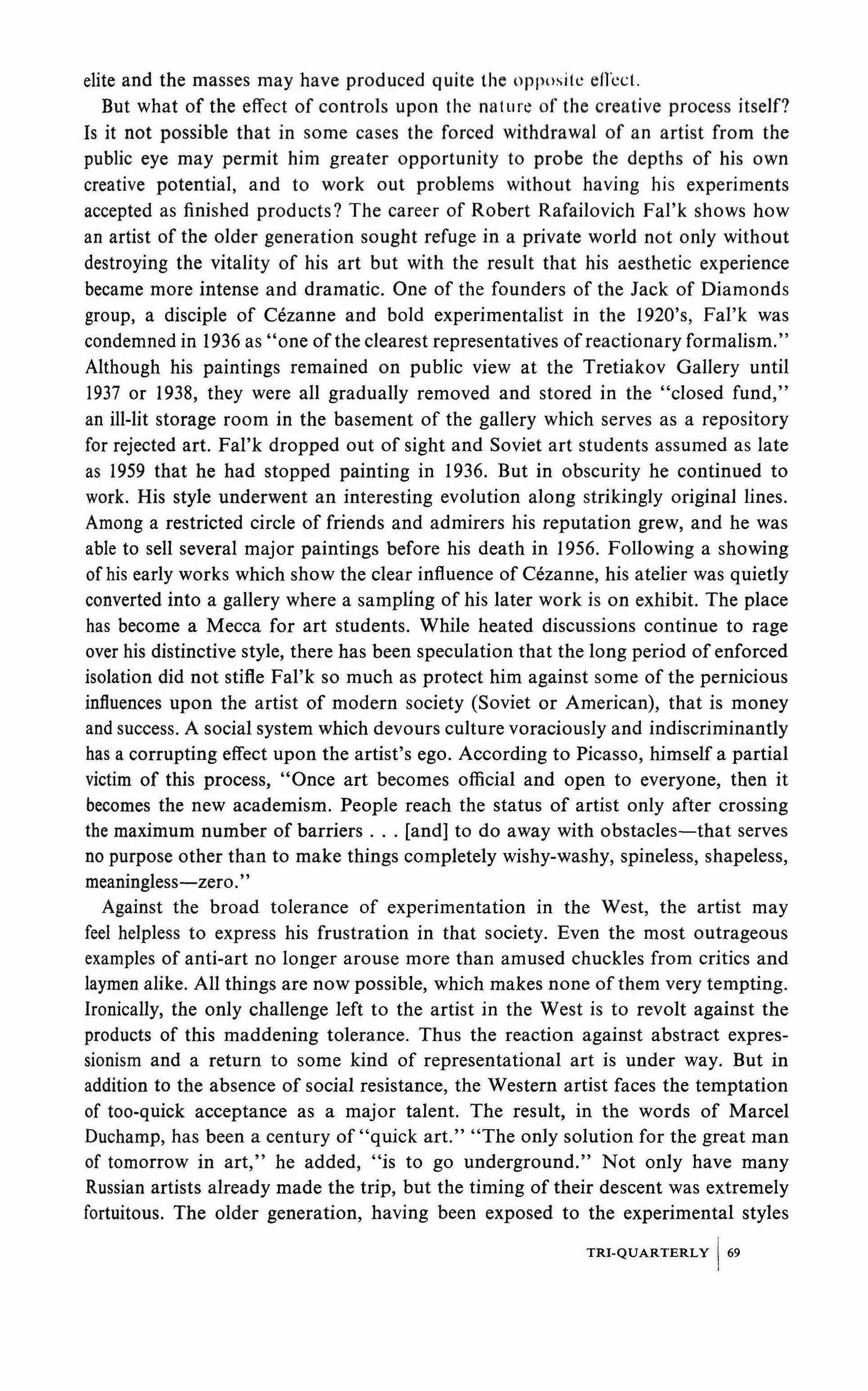
elite and the masses may have produced quite the opposite effect. But what of the effect of controls upon the nature of the creative process itself? Is it not possible that in some cases the forced withdrawal of an artist from the public eye may permit him greater opportunity to probe the depths of his own creative potential, and to work out problems without having his experiments accepted as finished products? The career of Robert Rafailovich Fal'k shows how an artist of the older generation sought refuge in a private world not only without destroying the vitality of his art but with the result that his aesthetic experience became more intense and dramatic. One of the founders of the Jack of Diamonds group, a disciple of Cezanne and bold experimentalist in the 1920's, Fal'k was condemned in 1936 as "one of the clearest representatives ofreactionary formalism." Although his paintings remained on public view at the Tretiakov Gallery until 1937 or 1938, they were all gradually removed and stored in the "closed fund," an ill-lit storage room in the basement of the gallery which serves as a repository for rejected art. Fal'k dropped out of sight and Soviet art students assumed as late as 1959 that he had stopped painting in 1936. But in obscurity he continued to work. His style underwent an interesting evolution along strikingly original lines. Among a restricted circle of friends and admirers his reputation grew, and he was able to sell several major paintings before his death in 1956. Following a showing of his early works which show the clear influence of Cezanne, his atelier was quietly converted into a gallery where a sampling of his later work is on exhibit. The place has become a Mecca for art students. While heated discussions continue to rage over his distinctive style, there has been speculation that the long period of enforced isolation did not stifle Fal'k so much as protect him against some of the pernicious influences upon the artist of modern society (Soviet or American), that is money and success. A social system which devours culture voraciously and indiscriminantly has a corrupting effect upon the artist's ego. According to Picasso, himself a partial victim of this process, "Once art becomes official and open to everyone, then it becomes the new academism. People reach the status of artist only after crossing the maximum number of barriers [and] to do away with obstacles-that serves no purpose other than to make things completely wishy-washy, spineless, shapeless, meaningless-zero. "
Against the broad tolerance of experimentation in the West, the artist may feel helpless to express his frustration in that society. Even the most outrageous examples of anti-art no longer arouse more than amused chuckles from critics and laymen alike. All things are now possible, which makes none of them very tempting. Ironically, the only challenge left to the artist in the West is to revolt against the products of this maddening tolerance. Thus the reaction against abstract expressionism and a return to some kind of representational art is under way. But in addition to the absence of social resistance, the Western artist faces the temptation of too-quick acceptance as a major talent. The result, in the words of Marcel Duchamp, has been a century of "quick art." "The only solution for the great man of tomorrow in art," he added, "is to go underground." Not only have many Russian artists already made the trip, but the timing of their descent was extremely fortuitous. The older generation, having been exposed to the experimental styles
TRI-QUARTERLY 169
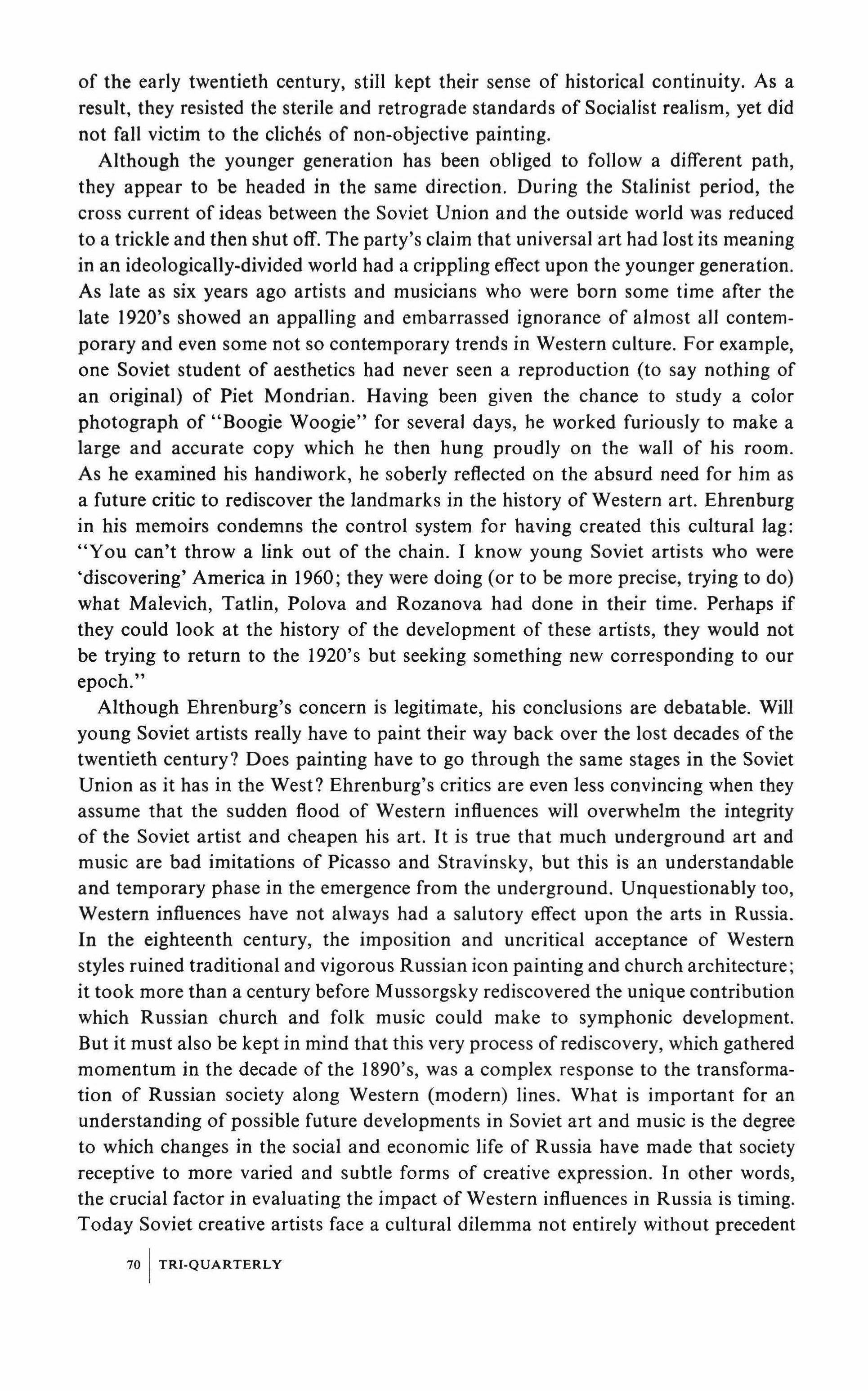
of the early twentieth century, still kept their sense of historical continuity. As a result, they resisted the sterile and retrograde standards of Socialist realism, yet did not fall victim to the cliches of non-objective painting.
Although the younger generation has been obliged to follow a different path, they appear to be headed in the same direction. During the Stalinist period, the cross current of ideas between the Soviet Union and the outside world was reduced to a trickle and then shut off. The party's claim that universal art had lost its meaning in an ideologically-divided world had a crippling effect upon the younger generation. As late as six years ago artists and musicians who were born some time after the late 1920's showed an appalling and embarrassed ignorance of almost al1 contemporary and even some not so contemporary trends in Western culture. For example, one Soviet student of aesthetics had never seen a reproduction (to say nothing of an original) of Piet Mondrian. Having been given the chance to study a color photograph of "Boogie Woogie" for several days, he worked furiously to make a large and accurate copy which he then hung proudly on the wal1 of his room. As he examined his handiwork, he soberly reflected on the absurd need for him as a future critic to rediscover the landmarks in the history of Western art. Ehrenburg in his memoirs condemns the control system for having created this cultural lag: "You can't throw a link out of the chain. I know young Soviet artists who were 'discovering' America in 1960; they were doing (or to be more precise, trying to do) what Malevich, Tatlin, Polova and Rozanova had done in their time. Perhaps if they could look at the history of the development of these artists, they would not be trying to return to the 1920's but seeking something new corresponding to our epoch."
Although Ehrenburg's concern is legitimate, his conclusions are debatable. Will young Soviet artists really have to paint their way back over the lost decades of the twentieth century? Does painting have to go through the same stages in the Soviet Union as it has in the West? Ehrenburg's critics are even less convincing when they assume that the sudden flood of Western influences will overwhelm the integrity of the Soviet artist and cheapen his art. It is true that much underground art and music are bad imitations of Picasso and Stravinsky, but this is an understandable and temporary phase in the emergence from the underground. Unquestionably too, Western influences have not always had a salutory effect upon the arts in Russia. In the eighteenth century, the imposition and uncritical acceptance of Western styles ruined traditional and vigorous Russian icon painting and church architecture; it took more than a century before Mussorgsky rediscovered the unique contribution which Russian church and folk music could make to symphonic development. But it must also be kept in mind that this very process of rediscovery, which gathered momentum in the decade of the 1890's, was a complex response to the transformation of Russian society along Western (modern) lines. What is important for an understanding of possible future developments in Soviet art and music is the degree to which changes in the social and economic life of Russia have made that society receptive to more varied and subtle forms of creative expression. In other words, the crucial factor in evaluating the impact of Western influences in Russia is timing. Today Soviet creative artists face a cultural dilemma not entirely without precedent

in Russian history; in their painful search for self-identity they are frustrated by academism at home, yet they have no intention of embracing uncritically the sophisticated influences which tempt them from abroad. They seek their own way by combining a deep-seated belief in an art which retains a universal human appeal with bold experimental techniques. If they are successful in surmounting the stale vocabulary of realism and abstraction, they may be on the verge of a unique contribution to world art.
Whatever the outcome may be, the relaxation of rigid controls has released a great current of pent-up energy and talent which is running strong against the last barriers to free expression. To the Western observer the amount of painting and drawing done by schoolboys and students is astonishing. While much of it is amateurish, the breadth and intensity of interest in creative work gives strong evidence of a large and sympathetic audience for new expressive styles. The ability of the artists and musicians to reach this audience depends largely upon willingness of the party to reduce restraints and penalties. As in all other aspects of postStalinist society, the party must measure carefully the necessity of maintaining ideological conformity against the heavy social cost of alienating an influential segment of the intellectual community. If the present Soviet leadership forfeited the widespread support of creative people by reimposing unacceptable controls, the attractions of the Soviet system to intellectuals everywhere would suffer another perhaps irreparable defeat, and the appeal of peaceful competition with differing social systems would be jeopardized with serious consequences for the stability of the regime. Thus we are witnessing an agonizing debate within the party and among artists concerning the nature and limits of controls. Yet since these problems have become a matter of public debate, one wonders whether the issue of controls themselves can long escape critical examination.
In seeking to enforce a revised definition of socialist realism, the party resorted to a self-regulating device; that is, making artists themselves responsible for holding the line. This decision fit in well with the general shift in the party's policies away from coercion in favor ofconviction, from terror to persuasion through psychological and social pressure initiated from above but calculated to inspire genuine popular support. While these techniques have scored some success in curbing drunkenness and hooliganism, they have yet to prove themselves in the realm of creative expression.
The old Stalinist taboos may have been ridiculously primitive, but they were clearly defined. Those "evil geniuses,"Cezanne and Debussy, were blamed for plotting the destruction of perspective and harmony. In the eyes of the party, what followed their mischief-making was, with the exception of socialist realists and a few progressive artists outside the USSR, a vicious and morbid assault upon the laws of nature. Since 1956, however, the party, often working in alliance with artist and musician has sought in a pitifully confused way for new and more flexible guide lines. The remarks made by V. M. Molotov at the All Union Congress of Artists in 1956 pointed up the dilemma which redefinition posed for the party; "We are against replacing guiding ideas in art with sheer administrative measure, but we do seek lofty, Bolshevik ideas in the creative work of our artists." Did the Soviet leaders
TRI-QUARTERLy 171
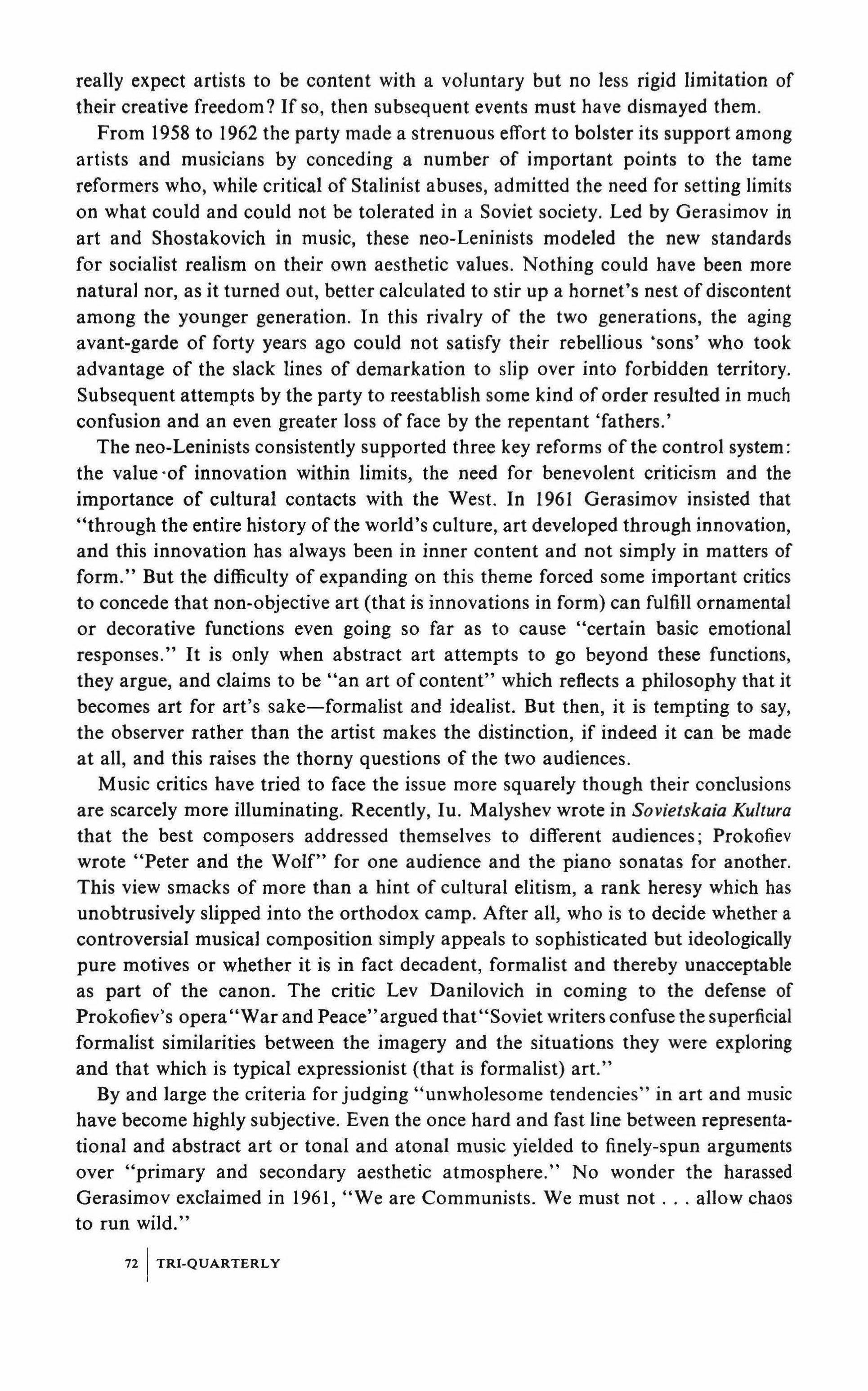
really expect artists to be content with a voluntary but no less rigid limitation of their creative freedom? If so, then subsequent events must have dismayed them.
From 1958 to 1962 the party made a strenuous effort to bolster its support among artists and musicians by conceding a number of important points to the tame reformers who, while critical of Stalinist abuses, admitted the need for setting limits on what could and could not be tolerated in a Soviet society. Led by Gerasimov in art and Shostakovich in music, these neo-Leninists modeled the new standards for socialist realism on their own aesthetic values. Nothing could have been more natural nor, as it turned out, better calculated to stir up a hornet's nest of discontent among the younger generation. In this rivalry of the two generations, the aging avant-garde of forty years ago could not satisfy their rebellious 'sons' who took advantage of the slack lines of demarkation to slip over into forbidden territory. Subsequent attempts by the party to reestablish some kind of order resulted in much confusion and an even greater loss of face by the repentant 'fathers.'
The neo-Leninists consistently supported three key reforms of the control system: the value 'of innovation within limits, the need for benevolent criticism and the importance of cultural contacts with the West. In 1961 Gerasimov insisted that "through the entire history of the world's culture, art developed through innovation, and this innovation has always been in inner content and not simply in matters of form." But the difficulty of expanding on this theme forced some important critics to concede that non-objective art (that is innovations in form) can fulfill ornamental or decorative functions even going so far as to cause "certain basic emotional responses." It is only when abstract art attempts to go beyond these functions, they argue, and claims to be "an art of content" which reflects a philosophy that it becomes art for art's sake-formalist and idealist. But then, it is tempting to say, the observer rather than the artist makes the distinction, if indeed it can be made at all, and this raises the thorny questions of the two audiences.
Music critics have tried to face the issue more squarely though their conclusions are scarcely more illuminating. Recently, Iu. Malyshev wrote in Sovietskaia Kultura that the best composers addressed themselves to different audiences; Prokofiev wrote "Peter and the Wolf" for one audience and the piano sonatas for another. This view smacks of more than a hint of cultural elitism, a rank heresy which has unobtrusively slipped into the orthodox camp. After all, who is to decide whether a controversial musical composition simply appeals to sophisticated but ideologically pure motives or whether it is in fact decadent, formalist and thereby unacceptable as part of the canon. The critic Lev Danilovich in coming to the defense of Prokofiev's opera"War and Peace" argued that"Soviet writers confuse the superficial formalist similarities between the imagery and the situations they were exploring and that which is typical expressionist (that is formalist) art."
By and large the criteria for judging "unwholesome tendencies" in art and music have become highly subjective. Even the once hard and fast line between representational and abstract art or tonal and atonal music yielded to finely-spun arguments over "primary and secondary aesthetic atmosphere." No wonder the harassed Gerasimov exclaimed in 1961, "We are Communists. We must not allow chaos to run wild."
721 TRI-QUARTERLY
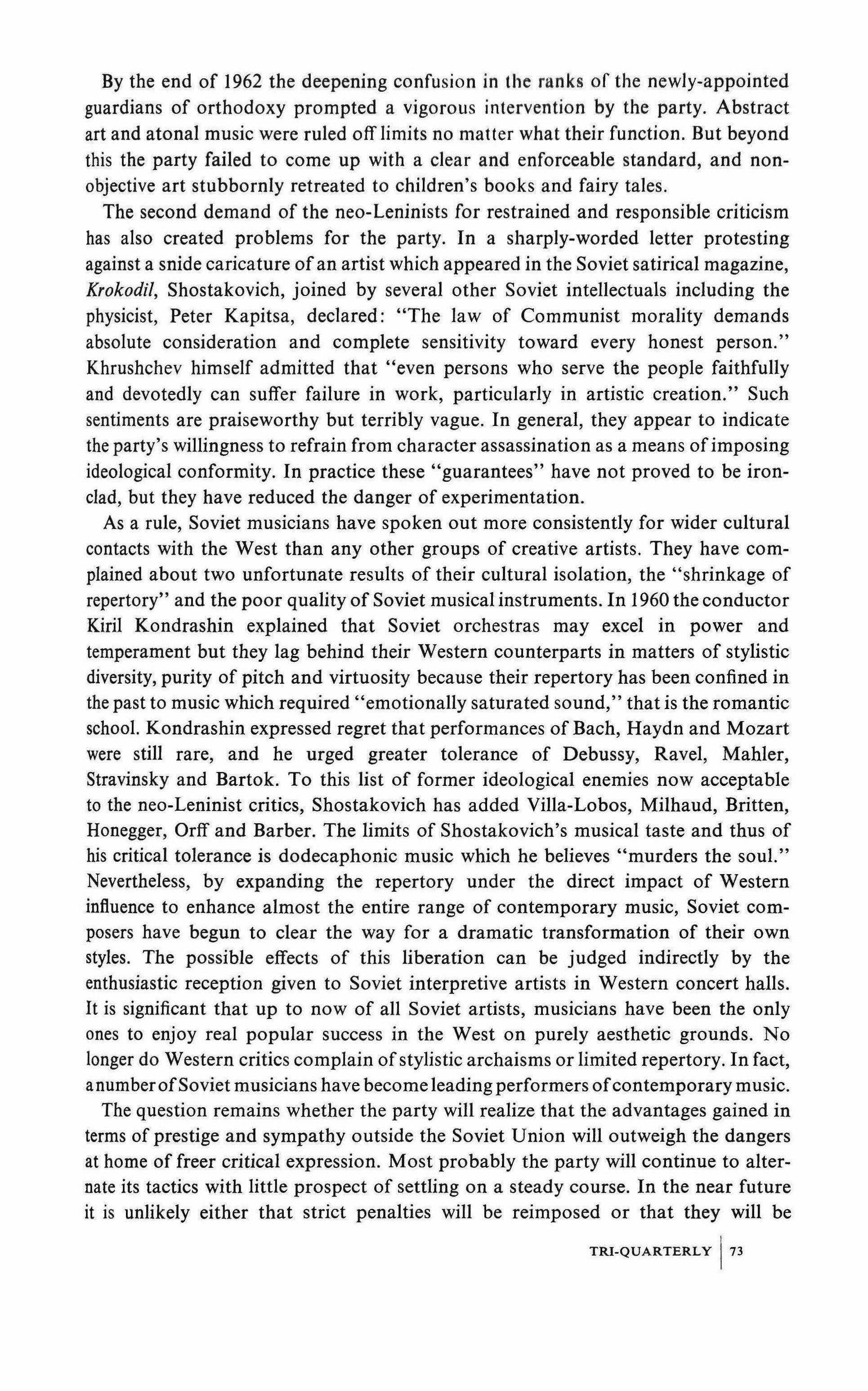
By the end of 1962 the deepening confusion in the ranks of the newly-appointed guardians of orthodoxy prompted a vigorous intervention by the party. Abstract art and atonal music were ruled off limits no matter what their function. But beyond this the party failed to come up with a clear and enforceable standard, and nonobjective art stubbornly retreated to children's books and fairy tales.
The second demand of the neo-Leninists for restrained and responsible criticism has also created problems for the party. In a sharply-worded letter protesting against a snide caricature of an artist which appeared in the Soviet satirical magazine, Krokodil, Shostakovich, joined by several other Soviet intellectuals including the physicist, Peter Kapitsa, declared: "The law of Communist morality demands absolute consideration and complete sensitivity toward every honest person." Khrushchev himself admitted that "even persons who serve the people faithfully and devotedly can suffer failure in work, particularly in artistic creation." Such sentiments are praiseworthy but terribly vague. In general, they appear to indicate the party's Willingness to refrain from character assassination as a means ofimposing ideological conformity. In practice these "guarantees" have not proved to be ironclad, but they have reduced the danger of experimentation.
As a rule, Soviet musicians have spoken out more consistently for wider cultural contacts with the West than any other groups of creative artists. They have complained about two unfortunate results of their cultural isolation, the "shrinkage of repertory" and the poor quality of Soviet musical instruments. In 1960 the conductor Kiril Kondrashin explained that Soviet orchestras may excel in power and temperament but they lag behind their Western counterparts in matters of stylistic diversity, purity of pitch and virtuosity because their repertory has been confined in the past to music which required "emotionally saturated sound," that is the romantic school. Kondrashin expressed regret that performances of Bach, Haydn and Mozart were still rare, and he urged greater tolerance of Debussy, Ravel, Mahler, Stravinsky and Bartok. To this list of former ideological enemies now acceptable to the neo-Leninist critics, Shostakovich has added Villa-Lobos, Milhaud, Britten, Honegger, Orff and Barber. The limits of Shostakovich's musical taste and thus of his critical tolerance is dodecaphonic music which he believes "murders the soul."
Nevertheless, by expanding the repertory under the direct impact of Western influence to enhance almost the entire range of contemporary music, Soviet composers have begun to clear the way for a dramatic transformation of their own styles. The possible effects of this liberation can be judged indirectly by the enthusiastic reception given to Soviet interpretive artists in Western concert halls. It is significant that up to now of all Soviet artists, musicians have been the only ones to enjoy real popular success in the West on purely aesthetic grounds. No longer do Western critics complain ofstylistic archaisms or limited repertory. In fact, anumberofSoviet musicians have become leadingperformers ofcontemporary music. The question remains whether the party will realize that the advantages gained in terms of prestige and sympathy outside the Soviet Union will outweigh the dangers at home of freer critical expression. Most probably the party will continue to alternate its tactics with little prospect of settling on a steady course. In the near future it is unlikely either that strict penalties will be reimposed or that they will be
TRI-QUARTERLY \73
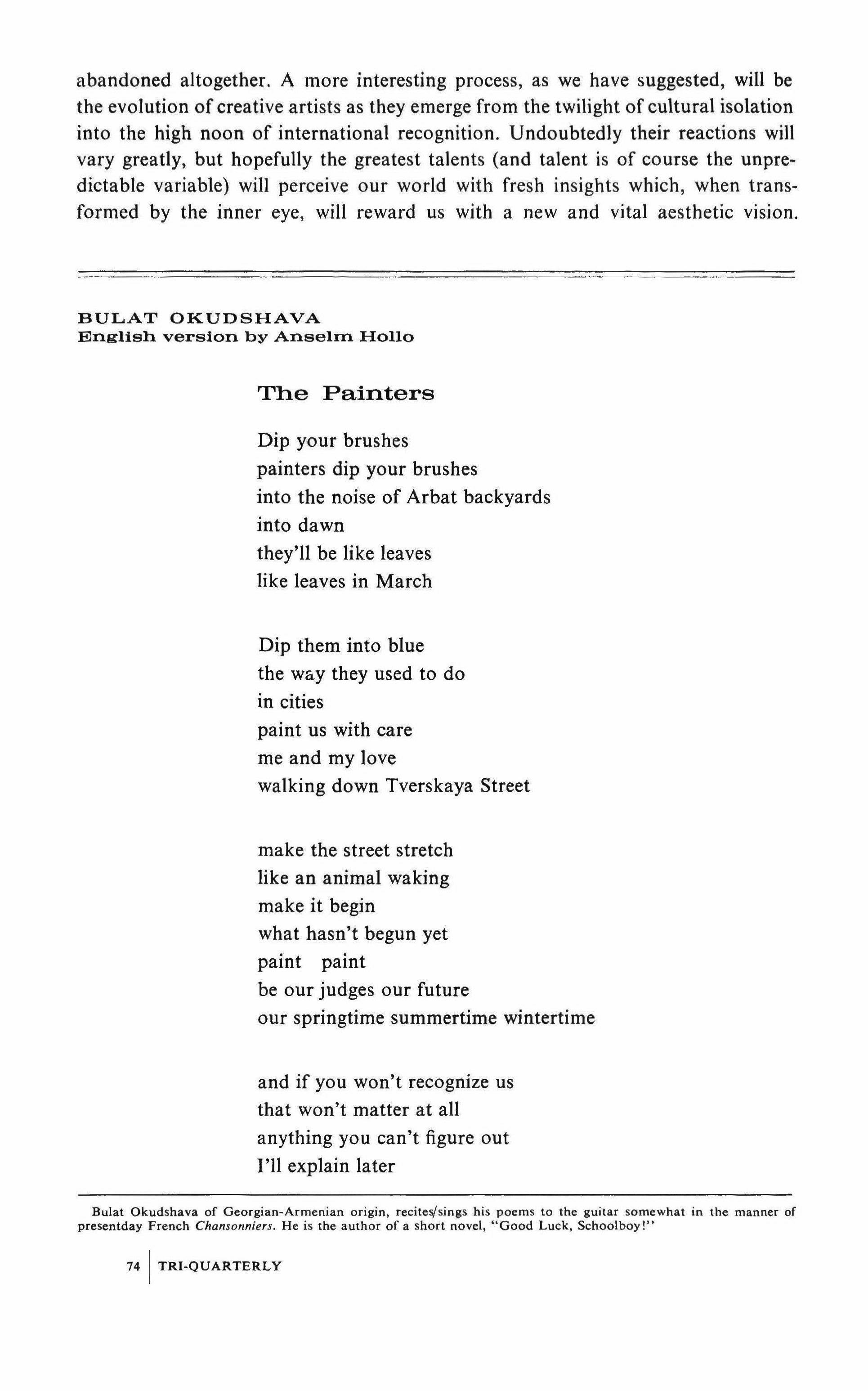
abandoned altogether. A more interesting process, as we have suggested, will be the evolution of creative artists as they emerge from the twilight of cultural isolation into the high noon of international recognition. Undoubtedly their reactions will vary greatly, but hopefully the greatest talents (and talent is of course the unpredictable variable) will perceive our world with fresh insights which, when transformed by the inner eye, will reward us with a new and vital aesthetic vision.
English version by Anselm
HolloDip your brushes painters dip your brushes into the noise of Arbat backyards into dawn they'll be like leaves like leaves in March
Dip them into blue the way they used to do in cities
paint us with care me and my love walking down Tverskaya Street
make the street stretch like an animal waking make it begin what hasn't begun yet paint paint be our judges our future our springtime summertime wintertime and if you won't recognize us that won't matter at all anything you can't figure out I'll explain later
TRI-QUARTERLY
Bulat Okudshava of Georgian-Armenian origin, recites/sings his poems to the guitar somewhat in the manner of presentday French Chansonniers. He is the author of a short novel, "Good Luck, Schoolboy!"
Kirpichenko, a roughneck tractor driver in the Soviet Far East, begins his vacation with a three-day binge, then boards a jet for Moscow. On the plane he is fatally dazzled by the beautiful stewardess Tanya. Tamed and bemused, he spends the rest of his vacation, and all his money, plying back and forth on the Moscow-Khabarovsk run, hoping for another glimpse of Tanya. When he finally sees her again in the airport, it is too late; the broken giant retains his fair vision, but he must go back to work.
Uncle Mitya, a taxi-driver in Yalta who is plagued by speeding tickets, tries to immunize himself by marrying off his daughter, a sister-in-law, and sundry other in-laws to the local traffic cops. The marriages succeed, but the project backfires: Uncle Mitya finds himself hemmed in by his new relatives-staunch enforcers of the law who are first of all anxious to demonstrate their impartiality by pinching him as often as possible.
Georgi Abramashvili is an eighteen-year-old lifeguard at Sukhumi who is awaiting his draft call. He spends his sunny days impressing the girls on the beach with spectacular handstands. At night he courts trouble with the Komsomol by evading service in the local druzhina. Onefine evening this Tarzan is introduced to sex (and cigarettes /) by the vacationing Alina. Next day Alina's husband arrives, there is a fight, and Abramashvili is publicly denounced for hooliganism. The army, he decides, will be fine. He might even get to be a cosmonaut /
KIRPICHENKO, UNCLE MITYA, AND GEORGI ABRAMASHVILI would seem to have little in common. In the context of contemporary Soviet literature, however, there is much that unites them. All three are ordinary, stumbling, bewildered guys, trying to get along in the world without too much discomfort, largely unconcerned with
TRI-QUARTERLY

the fate of society at large. They are only minimally aware, if at all, of participating in the building of communism. All three, in fact, would be vulnerable to the accusation that their horizons are narrow, that they lack any sense of the lofty purpose of life, and that they are ideologically too passive to playa conscious role in shaping the world about them. It is just as true, however, that these three fictional characters, conceived by their author in a spirit of irony, sympathy and humor, are interesting, colorful and believable. They are typical of the best characters in the Soviet literature of the nineteen sixties precisely because of their authenticity and lack of schematic adulteration.
The creator ofthese characters, from three separate short stories, is Vasili Aksenov, a 33-year-old Muscovite who five years ago abandoned his profession as a physician to take up a career in literature. Since his first appearance in print in 1959, Aksenov has published three novels, one novella and roughly a dozen short stories. He has also done scenarios of two of his novels and one or two independent scenarios. Together with Evgeny Evtushenko and a few other prominent writers, he is an editor of the outstandingly successful monthly magazine Yunost' (Youth). Aksenov is one of the half-dozen most promising young writers in the U.S.S.R. today, and he is certainly one of the busiest.
Aksenov is also controversial. His second novel, A Starry Ticket, which appeared in the summer of 1961, featured an engagingly irreverent and rebellious group of Soviet teenagers, rock-and-rolling runaways from the discipline of both parents and society, whose pungent, flip language was loaded with foreignisms (especially Americanisms) and whose sceptical, wry view of the Soviet middle-class success pattern earned their creator, for a time, the title of the Russian Salinger. Aksenov's "starry boys," as hostile critics have come to call them, met with bitter disapproval from the watchdogs of orthodoxy, who not only resented their hip lingo (a mixture of foreign borrowings, pure invention, Soviet underworld argot, and jargon from the concentration camps), but, even more seriously, were shocked by their open though adolescent mockery of Soviet sacred cows. Because of this novel and subsequent literary sins in the same vein, Aksenov got a parental scolding from Khrushchev in the spring of 1963 and was forced to make a public apology. Since then his published works appear to have been free of literary heresy, although they have retained in large measure the saucy flavor that has always irritated his critics. At the same time his writing continues to be experimental. It has its ups and downs. His most recent novel, It's Time, My Friend, It's Time, published last summer, was in many respects an artistic failure. On the other hand, his three most recently published short stories display the strength and charm of the best of Aksenov. Even more important, both the novel and the stories give evidence of a literary mind that has not lost its restlessness.
One ofAksenov's great strengths is his sense offun-a fascination for the grotesque that suggests a combination of Gogol and a somewhat milder Joseph Heller. He purposely lets things get out of hand. Kirpichenko, in his search for Tanya, covers the 4,000 air miles between Moscow and Khabarovsk not once, but ceaselessly, back and forth, back and forth, back and forth. The boys in A Starry Ticket, picking up odd jobs for eating money on their runaway to Estonia, are hired to
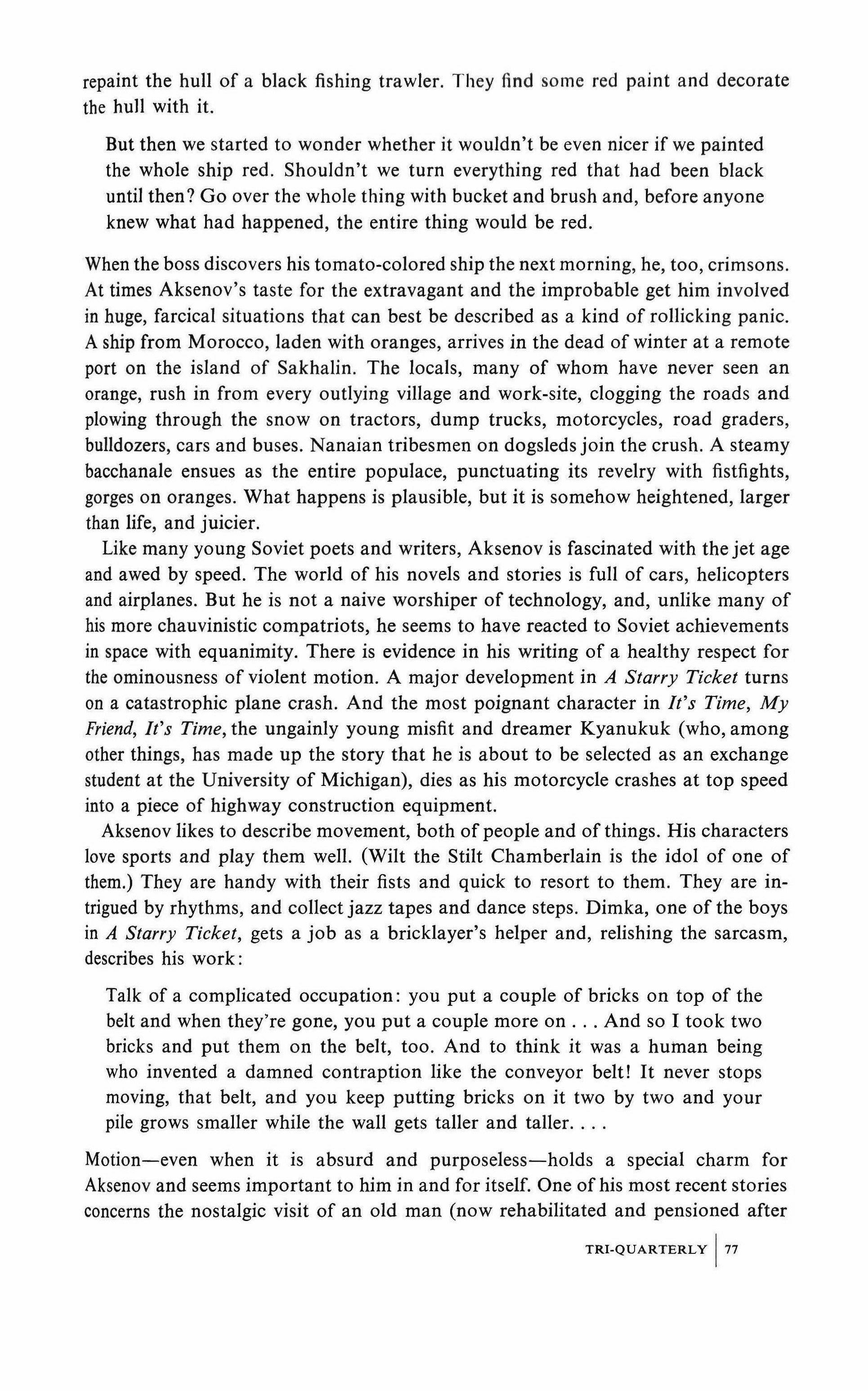
repaint the hull of a black fishing trawler. They find some red paint and decorate the hull with it.
But then we started to wonder whether it wouldn't be even nicer if we painted the whole ship red. Shouldn't we turn everything red that had been black until then? Go over the whole thing with bucket and brush and, before anyone knew what had happened, the entire thing would be red.
When the boss discovers his tomato-colored ship the next morning, he, too, crimsons. At times Aksenov's taste for the extravagant and the improbable get him involved in huge, farcical situations that can best be described as a kind of rollicking panic. A ship from Morocco, laden with oranges, arrives in the dead of winter at a remote port on the island of Sakhalin. The locals, many of whom have never seen an orange, rush in from every outlying village and work-site, clogging the roads and plowing through the snow on tractors, dump trucks, motorcycles, road graders, bulldozers, cars and buses. Nanaian tribesmen on dogsleds join the crush. A steamy bacchanale ensues as the entire populace, punctuating its revelry with fistfights, gorges on oranges. What happens is plausible, but it is somehow heightened, larger than life, and juicier.
Like many young Soviet poets and writers, Aksenov is fascinated with the jet age and awed by speed. The world of his novels and stories is full of cars, helicopters and airplanes. But he is not a naive worshiper of technology, and, unlike many of his more chauvinistic compatriots, he seems to have reacted to Soviet achievements in space with equanimity. There is evidence in his writing of a healthy respect for the ominousness of violent motion. A major development in A Starry Ticket turns on a catastrophic plane crash. And the most poignant character in It's Time, My Friend, It's Time, the ungainly young misfit and dreamer Kyanukuk (who, among other things, has made up the story that he is about to be selected as an exchange student at the University of Michigan), dies as his motorcycle crashes at top speed into a piece of highway construction equipment.
Aksenov likes to describe movement, both of people and of things. His characters love sports and play them well. (Wilt the Stilt Chamberlain is the idol of one of them.) They are handy with their fists and quick to resort to them. They are intrigued by rhythms, and collect jazz tapes and dance steps. Dimka, one of the boys in A Starry Ticket, gets a job as a bricklayer's helper and, relishing the sarcasm, describes his work:
Talk of a complicated occupation: you put a couple of bricks on top of the belt and when they're gone, you put a couple more on And so I took two bricks and put them on the belt, too. And to think it was a human being who invented a damned contraption like the conveyor belt! It never stops moving, that belt, and you keep putting bricks on it two by two and your pile grows smaller while the wall gets taller and taller.
Motion-even when it is absurd and purposeless-holds a special charm for Aksenov and seems important to him in and for itself. One of his most recent stories concerns the nostalgic visit of an old man (now rehabilitated and pensioned after TRI-QUARTERLY [77
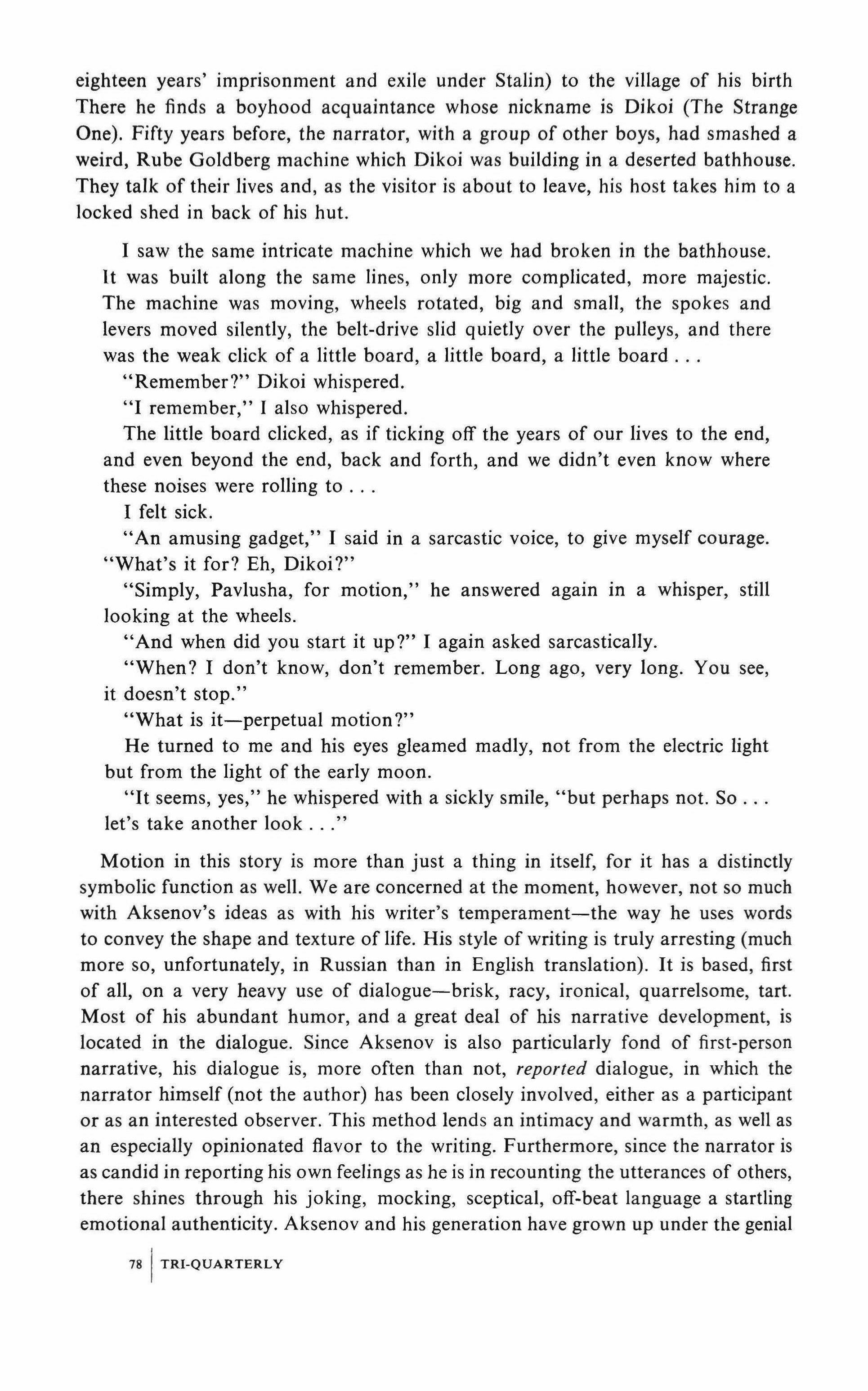
eighteen years' imprisonment and exile under Stalin) to the village of his birth There he finds a boyhood acquaintance whose nickname is Dikoi (The Strange One). Fifty years before, the narrator, with a group of other boys, had smashed a weird, Rube Goldberg machine which Dikoi was building in a deserted bathhouse. They talk of their lives and, as the visitor is about to leave, his host takes him to a locked shed in back of his hut.
I saw the same intricate machine which we had broken in the bathhouse. It was built along the same lines, only more complicated, more majestic. The machine was moving, wheels rotated, big and small, the spokes and levers moved silently, the belt-drive slid quietly over the pulleys, and there was the weak click of a little board, a little board, a little board "Remember?" Dikoi whispered.
"I remember," I also whispered.
The little board clicked, as if ticking off the years of our lives to the end, and even beyond the end, back and forth, and we didn't even know where these noises were rolling to I felt sick.
"An amusing gadget," I said in a sarcastic voice, to give myself courage. "What's it for? Eh, Dikoi?"
"Simply, Pavlusha, for motion," he answered again in a Whisper, still looking at the wheels.
"And when did you start it up?" I again asked sarcastically. "When? I don't know, don't remember. Long ago, very long. You see, it doesn't stop."
"What is it-perpetual motion?"
He turned to me and his eyes gleamed madly, not from the electric light but from the light of the early moon.
"It seems, yes," he whispered with a sickly smile, "but perhaps not. So let's take another look
Motion in this story is more than just a thing in itself, for it has a distinctly symbolic function as well. We are concerned at the moment, however, not so much with Aksenov's ideas as with his writer's temperament-the way he uses words to convey the shape and texture of life. His style of writing is truly arresting (much more so, unfortunately, in Russian than in English translation). It is based, first of all, on a very heavy use of dialogue-brisk, racy, ironical, quarrelsome, tart. Most of his abundant humor, and a great deal of his narrative development, is located in the dialogue. Since Aksenov is also particularly fond of first-person narrative, his dialogue is, more often than not, reported dialogue, in which the narrator himself (not the author) has been closely involved, either as a participant or as an interested observer. This method lends an intimacy and warmth, as well as an especially opinionated flavor to the writing. Furthermore, since the narrator is as candid in reporting his own feelings as he is in recounting the utterances of others, there shines through his joking, mocking, sceptical, off-beat language a startling emotional authenticity. Aksenov and his generation have grown up under the genial
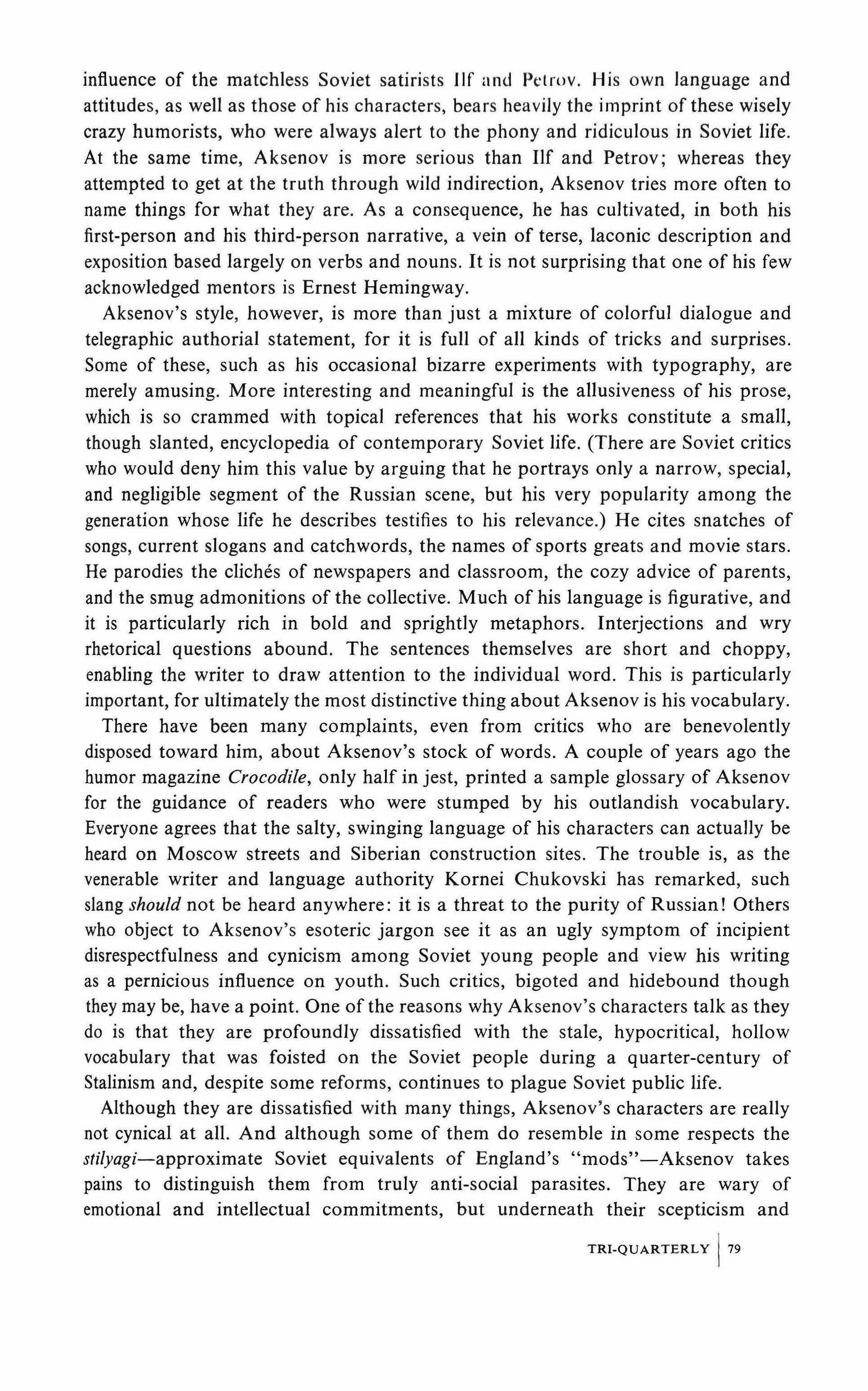
influence of the matchless Soviet satirists llf and Petrov, His own language and attitudes, as well as those of his characters, bears heavily the imprint of these wisely crazy humorists, who were always alert to the phony and ridiculous in Soviet life. At the same time, Aksenov is more serious than IIf and Petrov; whereas they attempted to get at the truth through wild indirection, Aksenov tries more often to name things for what they are. As a consequence, he has cultivated, in both his first-person and his third-person narrative, a vein of terse, laconic description and exposition based largely on verbs and nouns. It is not surprising that one of his few acknowledged mentors is Ernest Hemingway.
Aksenov's style, however, is more than just a mixture of colorful dialogue and telegraphic authorial statement, for it is full of all kinds of tricks and surprises. Some of these, such as his occasional bizarre experiments with typography, are merely amusing. More interesting and meaningful is the allusiveness of his prose, which is so crammed with topical references that his works constitute a small, though slanted, encyclopedia of contemporary Soviet life. (There are Soviet critics who would deny him this value by arguing that he portrays only a narrow, special, and negligible segment of the Russian scene, but his very popularity among the generation whose life he describes testifies to his relevance.) He cites snatches of songs, current slogans and catchwords, the names of sports greats and movie stars. He parodies the cliches of newspapers and classroom, the cozy advice of parents, and the smug admonitions of the collective. Much of his language is figurative, and it is particularly rich in bold and sprightly metaphors. Interjections and wry rhetorical questions abound. The sentences themselves are short and choppy, enabling the writer to draw attention to the individual word. This is particularly important, for ultimately the most distinctive thing about Aksenov is his vocabulary. There have been many complaints, even from critics who are benevolently disposed toward him, about Aksenov's stock of words. A couple of years ago the humor magazine Crocodile, only half in jest, printed a sample glossary of Aksenov for the guidance of readers who were stumped by his outlandish vocabulary. Everyone agrees that the salty, swinging language of his characters can actually be heard on Moscow streets and Siberian construction sites. The trouble is, as the venerable writer and language authority Kornei Chukovski has remarked, such slang should not be heard anywhere: it is a threat to the purity of Russian! Others who object to Aksenov's esoteric jargon see it as an ugly symptom of incipient disrespectfulness and cynicism among Soviet young people and view his writing as a pernicious influence on youth. Such critics, bigoted and hidebound though they may be, have a point. One of the reasons why Aksenov's characters talk as they do is that they are profoundly dissatisfied with the stale, hypocritical, hollow vocabulary that was foisted on the Soviet people during a quarter-century of Stalinism and, despite some reforms, continues to plague Soviet public life. Although they are dissatisfied with many things, Aksenov's characters are really not cynical at all. And although some of them do resemble in some respects the stilyagi-approximate Soviet equivalents of England's "mods"-Aksenov takes pains to distinguish them from truly anti-social parasites. They are wary of emotional and intellectual commitments, but underneath their scepticism and
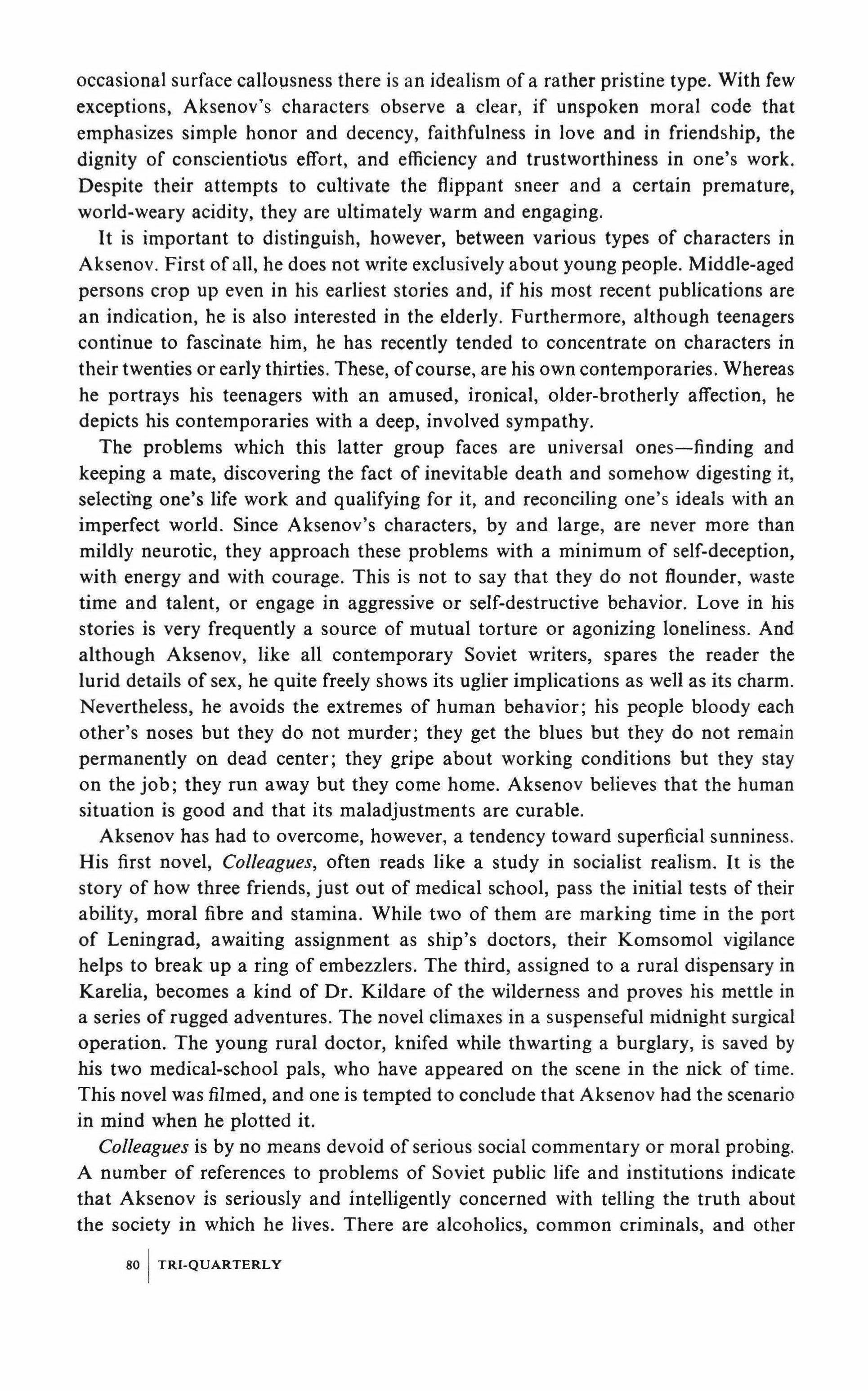
occasional surface callousness there is an idealism of a rather pristine type. With few exceptions, Aksenov's characters observe a clear, if unspoken moral code that emphasizes simple honor and decency, faithfulness in love and in friendship, the dignity of conscientious effort, and efficiency and trustworthiness in one's work. Despite their attempts to cultivate the flippant sneer and a certain premature, world-weary acidity, they are ultimately warm and engaging.
It is important to distinguish, however, between various types of characters in Aksenov. First of all, he does not write exclusively about young people. Middle-aged persons crop up even in his earliest stories and, if his most recent publications are an indication, he is also interested in the elderly. Furthermore, although teenagers continue to fascinate him, he has recently tended to concentrate on characters in their twenties or early thirties. These, ofcourse, are his own contemporaries. Whereas he portrays his teenagers with an amused, ironical, older-brotherly affection, he depicts his contemporaries with a deep, involved sympathy.
The problems which this latter group faces are universal ones-finding and keeping a mate, discovering the fact of inevitable death and somehow digesting it, selecting one's life work and qualifying for it, and reconciling one's ideals with an imperfect world. Since Aksenov's characters, by and large, are never more than mildly neurotic, they approach these problems with a minimum of self-deception, with energy and with courage. This is not to say that they do not flounder, waste time and talent, or engage in aggressive or self-destructive behavior. Love in his stories is very frequently a source of mutual torture or agonizing loneliness. And although Aksenov, like all contemporary Soviet writers, spares the reader the lurid details of sex, he quite freely shows its uglier implications as well as its charm. Nevertheless, he avoids the extremes of human behavior; his people bloody each other's noses but they do not murder; they get the blues but they do not remain permanently on dead center; they gripe about working conditions but they stay on the job; they run away but they come home. Aksenov believes that the human situation is good and that its maladjustments are curable.
Aksenov has had to overcome, however, a tendency toward superficial sunniness. His first novel, Colleagues, often reads like a study in socialist realism. It is the story of how three friends, just out of medical school, pass the initial tests of their ability, moral fibre and stamina. While two of them are marking time in the port of Leningrad, awaiting assignment as ship's doctors, their Komsomol vigilance helps to break up a ring of embezzlers. The third, assigned to a rural dispensary in Karelia, becomes a kind of Dr. Kildare of the wilderness and proves his mettle in a series of rugged adventures. The novel climaxes in a suspenseful midnight surgical operation. The young rural doctor, knifed while thwarting a burglary, is saved by his two medical-school pals, who have appeared on the scene in the nick of time. This novel was filmed, and one is tempted to conclude that Aksenov had the scenario in mind when he plotted it.
Colleagues is by no means devoid of serious social commentary or moral probing. A number of references to problems of Soviet public life and institutions indicate that Aksenov is seriously and intelligently concerned with telling the truth about the society in which he lives. There are alcoholics, common criminals, and other
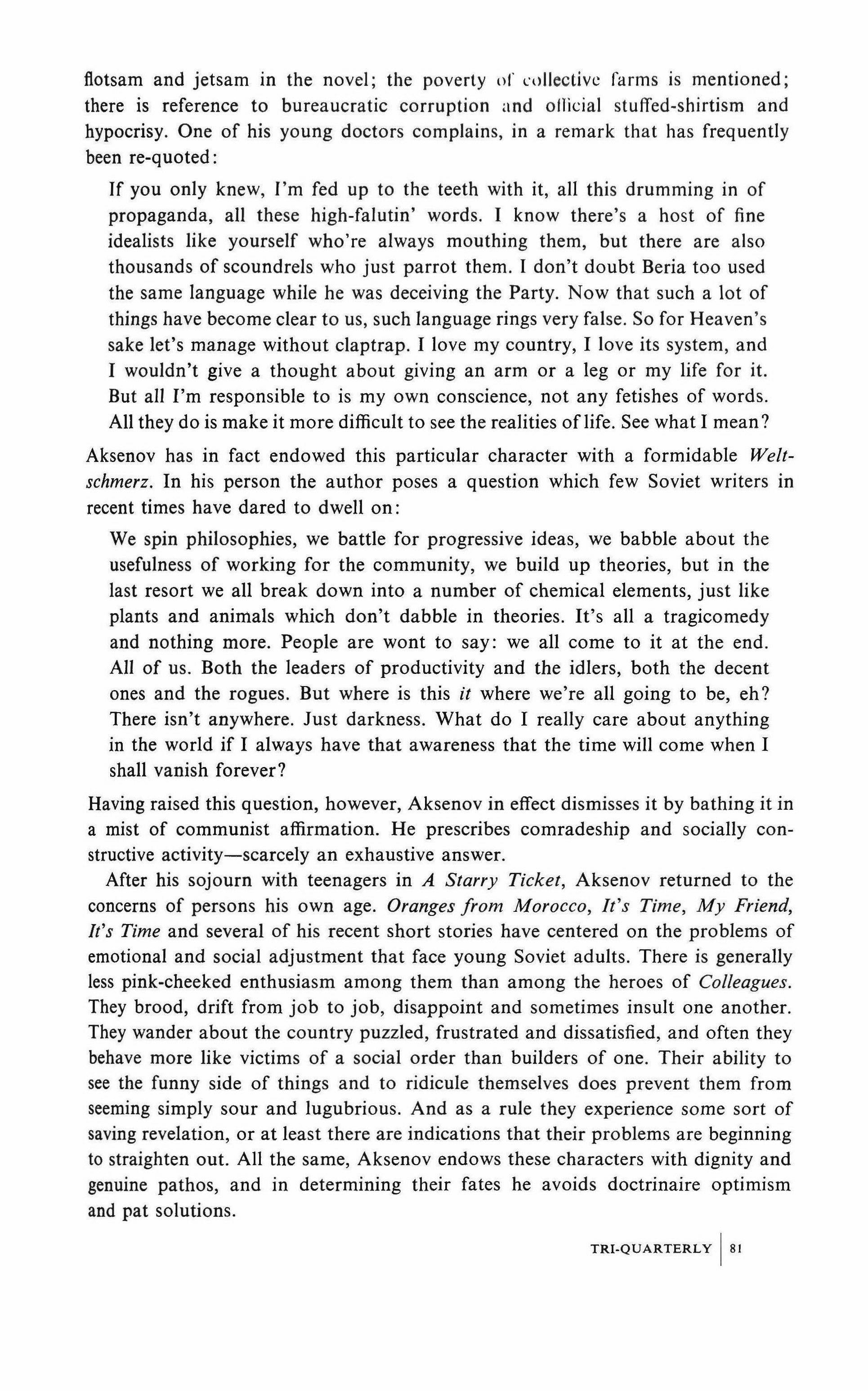
flotsam and jetsam in the novel; the poverty or collective farms is mentioned; there is reference to bureaucratic corruption and otlicial stuffed-shirtism and hypocrisy. One of his young doctors complains, in a remark that has frequently been re-quoted:
If you only knew, I'm fed up to the teeth with it, all this drumming in of propaganda, all these high-falutin' words. I know there's a host of fine idealists like yourself who're always mouthing them, but there are also thousands of scoundrels who just parrot them. I don't doubt Beria too used the same language while he was deceiving the Party. Now that such a lot of things have become clear to us, such language rings very false. So for Heaven's sake let's manage without claptrap. I love my country, I love its system, and I wouldn't give a thought about giving an arm or a leg or my life for it. But all I'm responsible to is my own conscience, not any fetishes of words. All they do is make it more difficult to see the realities oflife. See what I mean?
Aksenov has in fact endowed this particular character with a formidable Weltschmerz. In his person the author poses a question which few Soviet writers in recent times have dared to dwell on:
We spin philosophies, we battle for progressive ideas, we babble about the usefulness of working for the community, we build up theories, but in the last resort we all break down into a number of chemical elements, just like plants and animals which don't dabble in theories. It's all a tragicomedy and nothing more. People are wont to say: we all come to it at the end. All of us. Both the leaders of productivity and the idlers, both the decent ones and the rogues. But where is this it where we're all going to be, eh? There isn't anywhere. Just darkness. What do I really care about anything in the world if I always have that awareness that the time will come when I shall vanish forever?
Having raised this question, however, Aksenov in effect dismisses it by bathing it in a mist of communist affirmation. He prescribes comradeship and socially constructive activity-scarcely an exhaustive answer.
After his sojourn with teenagers in A Starry Ticket, Aksenov returned to the concerns of persons his own age. Oranges from Morocco, It's Time, My Friend, It's Time and several of his recent short stories have centered on the problems of emotional and social adjustment that face young Soviet adults. There is generally less pink-cheeked enthusiasm among them than among the heroes of Colleagues. They brood, drift from job to job, disappoint and sometimes insult one another. They wander about the country puzzled, frustrated and dissatisfied, and often they behave more like victims of a social order than builders of one. Their ability to see the funny side of things and to ridicule themselves does prevent them from seeming simply sour and lugubrious. And as a rule they experience some sort of saving revelation, or at least there are indications that their problems are beginning to straighten out. All the same, Aksenov endows these characters with dignity and genuine pathos, and in determining their fates he avoids doctrinaire optimism and pat solutions.
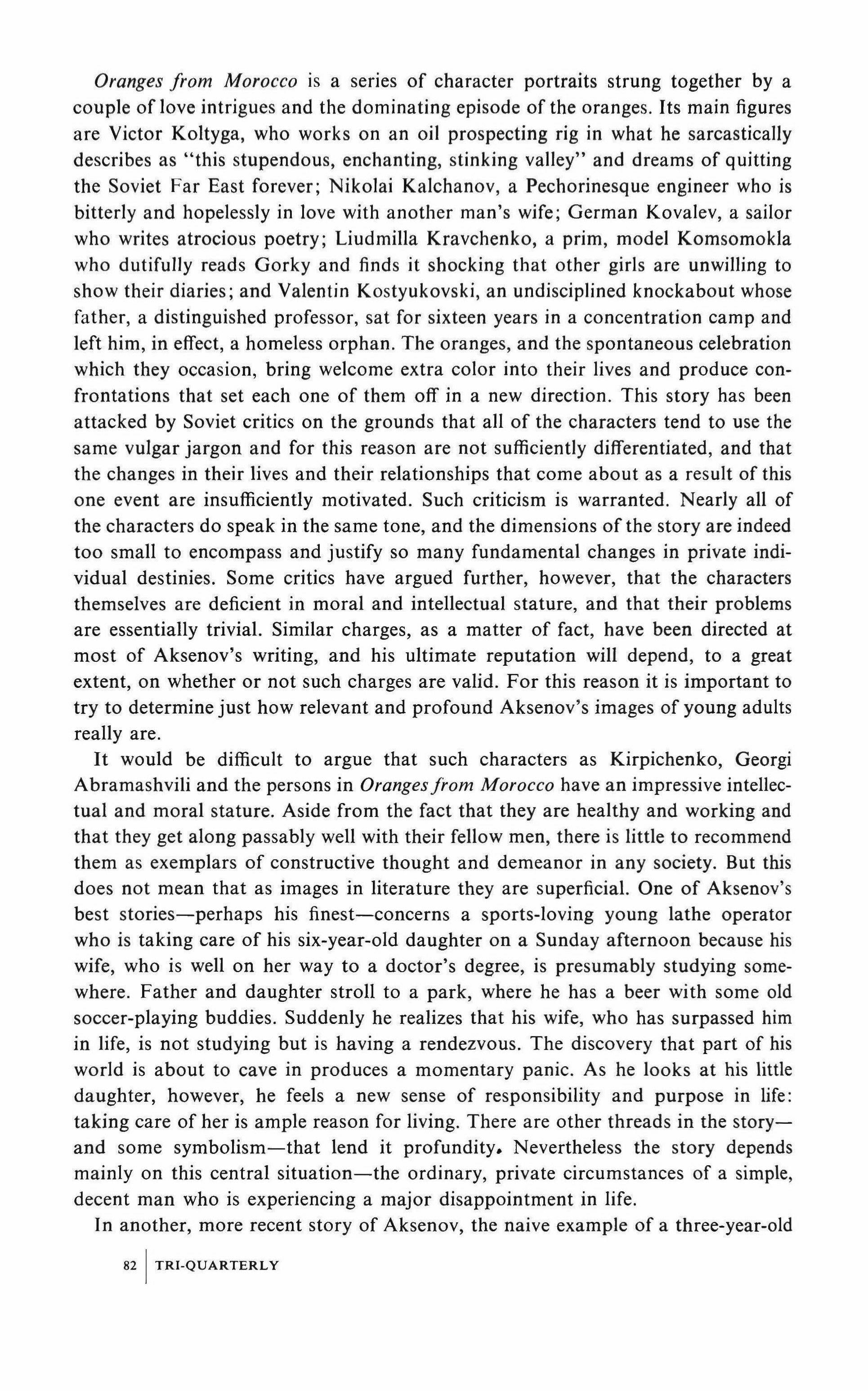
Oranges from Morocco is a series of character portraits strung together by a couple of love intrigues and the dominating episode of the oranges. Its main figures are Victor Koltyga, who works on an oil prospecting rig in what he sarcastically describes as "this stupendous, enchanting, stinking valley" and dreams of quitting the Soviet Far East forever; Nikolai Kalchanov, a Pechorinesque engineer who is bitterly and hopelessly in love with another man's wife; German Kovalev, a sailor who writes atrocious poetry; Liudmilla Kravchenko, a prim, model Komsomokla who dutifully reads Gorky and finds it shocking that other girls are unwilling to show their diaries; and Valentin Kostyukovski, an undisciplined knockabout whose father, a distinguished professor, sat for sixteen years in a concentration camp and left him, in effect, a homeless orphan. The oranges, and the spontaneous celebration which they occasion, bring welcome extra color into their lives and produce confrontations that set each one of them off in a new direction. This story has been attacked by Soviet critics on the grounds that all of the characters tend to use the same vulgar jargon and for this reason are not sufficiently differentiated, and that the changes in their lives and their relationships that come about as a result of this one event are insufficiently motivated. Such criticism is warranted. Nearly all of the characters do speak in the same tone, and the dimensions of the story are indeed too small to encompass and justify so many fundamental changes in private individual destinies. Some critics have argued further, however, that the characters themselves are deficient in moral and intellectual stature, and that their problems are essentially trivial. Similar charges, as a matter of fact, have been directed at most of Aksenov's writing, and his ultimate reputation will depend, to a great extent, on whether or not such charges are valid. For this reason it is important to try to determine just how relevant and profound Aksenov's images of young adults really are.
It would be difficult to argue that such characters as Kirpichenko, Georgi Abramashvili and the persons in Orangesfrom Morocco have an impressive intellectual and moral stature. Aside from the fact that they are healthy and working and that they get along passably well with their fellow men, there is little to recommend them as exemplars of constructive thought and demeanor in any society. But this does not mean that as images in literature they are superficial. One of Aksenov's best stories-perhaps his finest-concerns a sports-loving young lathe operator who is taking care of his six-year-old daughter on a Sunday afternoon because his wife, who is well on her way to a doctor's degree, is presumably studying somewhere. Father and daughter stroll to a park, where he has a beer with some old soccer-playing buddies. Suddenly he realizes that his wife, who has surpassed him in life, is not studying but is having a rendezvous. The discovery that part of his world is about to cave in produces a momentary panic. As he looks at his little daughter, however, he feels a new sense of responsibility and purpose in life: taking care of her is ample reason for living. There are other threads in the storyand some symbolism-that lend it profundity. Nevertheless the story depends mainly on this central situation-the ordinary, private circumstances of a simple, decent man who is experiencing a major disappointment in life.
In another, more recent story of Aksenov, the naive example of a three-year-old
821 TRI-QUARTERLY
boy gives his father courage to make an important (but unspecified) phone call over which he has been fearfully procrastinating for days. Ostensibly this episode, too, is a slight one; like the story just mentioned, it has practically nothing to do with society and absolutely nothing to do with the building of communism. On the other hand, both stories, in the tenderness and delicacy with which they report on mundane but vital human problems, have ultimately more to say about contemporary Soviet society than the most earnest socialist-realist tract. However, a number of Soviet critics (those of a conservative or crypto-Stalinist inclination-and there are still a great many of them) are infuriated at any displacement of the civic element in Soviet literature by the personal element. The notion that there are human problems that do not lend themselves to the therapy of the collective, or for which ideological solutions are irrelevant, is anathema to these critics. It is such persons, in the main, who accuse Aksenov of being superficial. If for this reason Aksenov is in fact superficial, so then are a vast number of other prominent young writers who are attempting to produce similarly modest, Chekhovian slices of Soviet life.
Another reason for the accusation that Aksenov's characters lack stature is their reticence-their preference for silence or at best a cryptic response to challenges that are supposed to produce ringing communist answers. One of their major traits is their passion for seeing things simply and clearly, without the encumbrance of ideological preconceptions. They abhor lofty words, not because they are incapable of understanding them, but because in a Soviet context these words have become the labels of planned lives in a planned society. Aksenov's young people are seeking independent answers to the questions they ask of life, since they are weary of prefabricated solutions. Hence the irony with which they refer to practically everything that is orthodox and established, the relish with which they pronounce new words, and the eagerness with which they embrace things that are foreign or off-beat. Aksenov's characters, I would submit, are not superficial. They are simply engaged in the serious, dangerous, and infinitely trying task of sloughing off the ideological excrescence of forty years of Party misrule. As the thaw continues, they will find more positive, committed ways of expressing that which is already in their hearts.
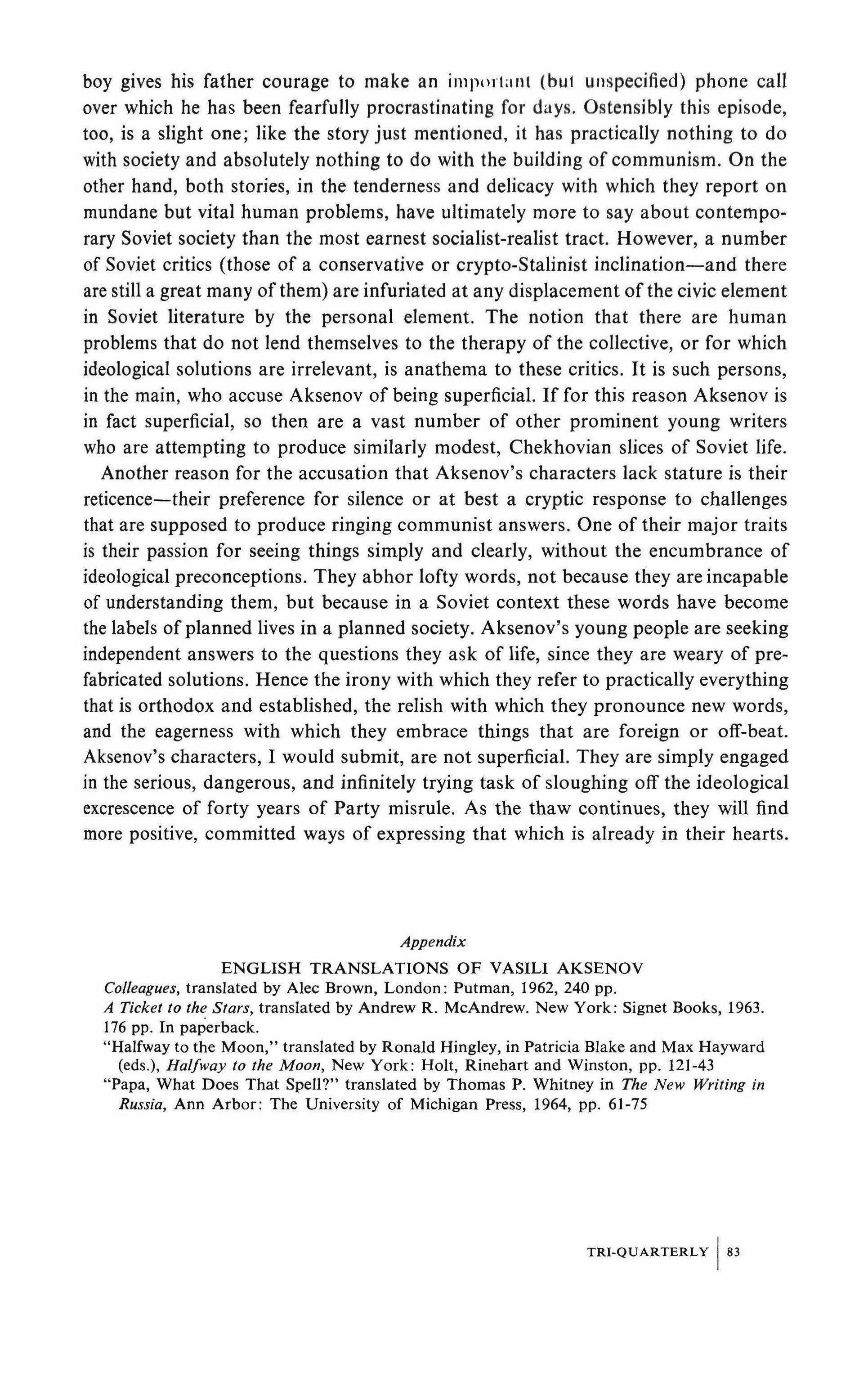
Appendix
ENGLISH TRANSLATIONS OF VASILI AKSENOV
Colleagues, translated by Alec Brown, London: Putman, 1962,240 pp.
A Ticket to the Stars, translated by Andrew R. McAndrew. New York: Signet Books, 1963. 176 pp, In paperback.
"Halfway to the Moon," translated by Ronald Hingley, in Patricia Blake and Max Hayward (eds.), Hal/way to the Moon, New York: Holt, Rinehart and Winston, pp. 121-43
"Papa, What Does That Spell?" translated by Thomas P. Whitney in The New Writing in Russia, Ann Arbor: The University of Michigan Press, 1964, pp. 61-75
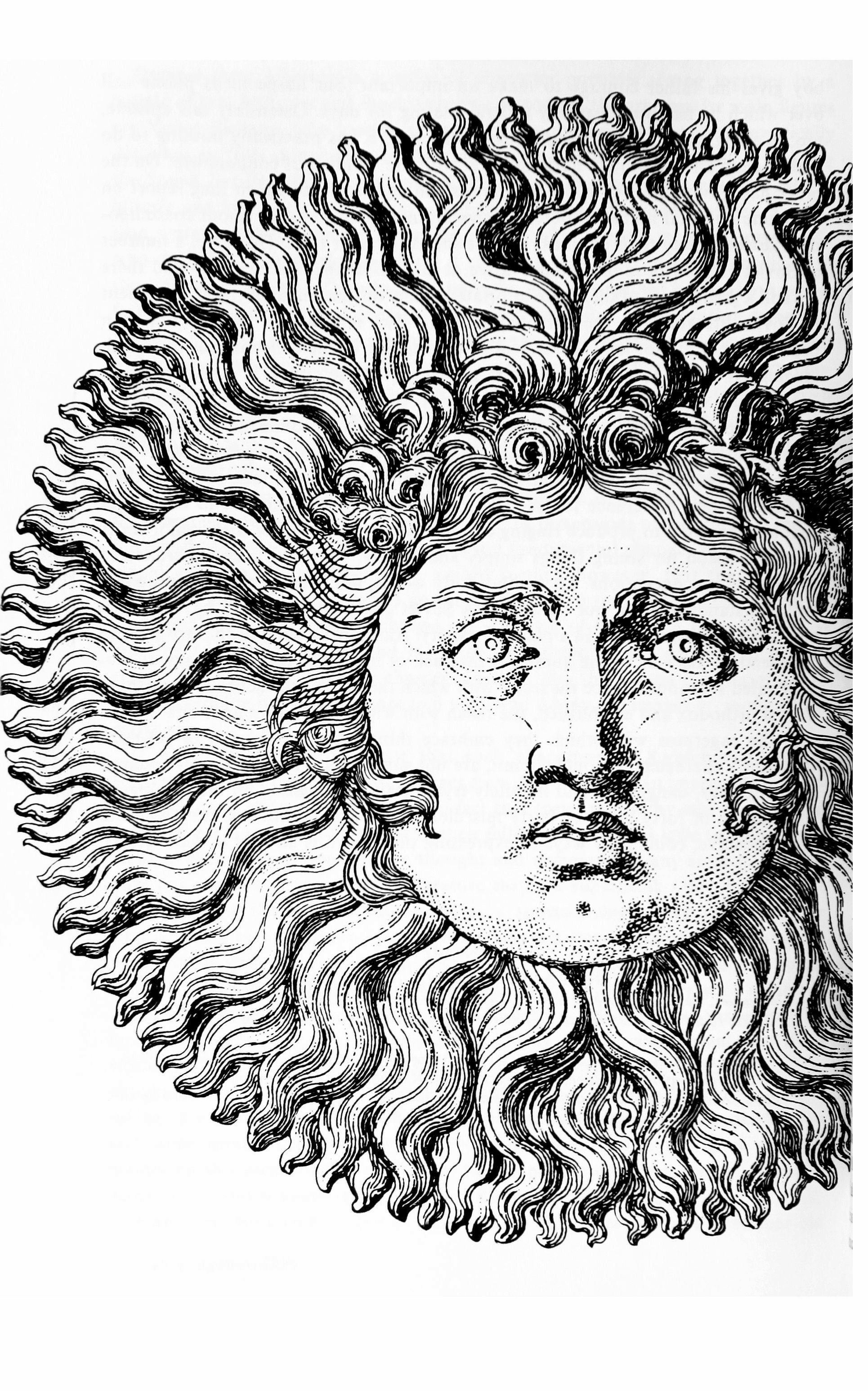 New Poems by Joseph Brodsky and Andrei \'oznesensky
New Poems by Joseph Brodsky and Andrei \'oznesensky
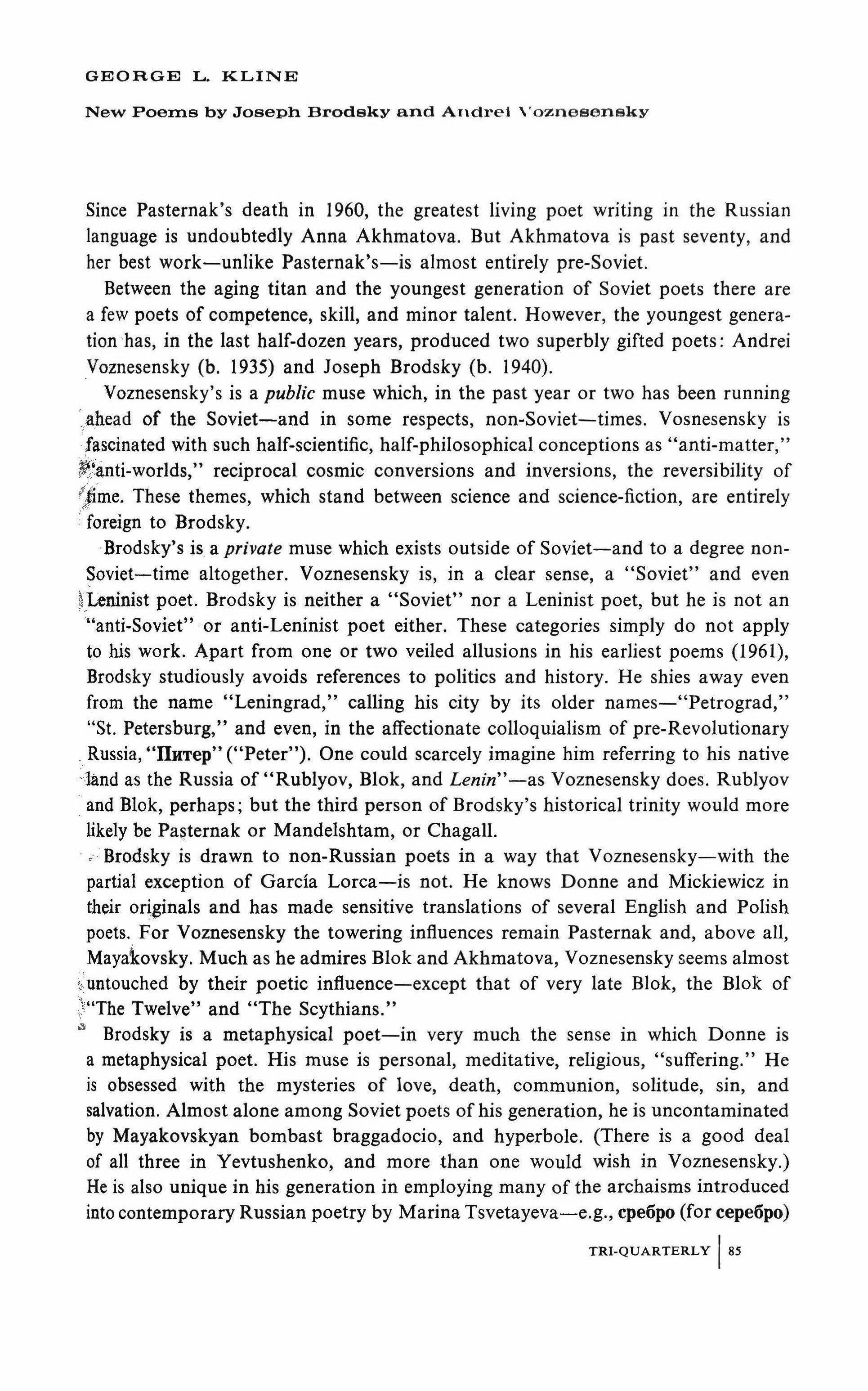
Since Pasternak's death in 1960, the greatest living poet writing in the Russian language is undoubtedly Anna Akhmatova. But Akhmatova is past seventy, and her best work-unlike Pasternak's-is almost entirely pre-Soviet.
Between the aging titan and the youngest generation of Soviet poets there are a few poets of competence, skill, and minor talent. However, the youngest generation 'has, in the last half-dozen years, produced two superbly gifted poets: Andrei Voznesensky (b. 1935) and Joseph Brodsky (b. 1940).
Voznesensky's is a public muse which, in the past year or two has been running ',ahead of the Soviet-and in some respects, non-Soviet-times. Vosnesensky is fascinated with such half-scientific, half-philosophical conceptions as "anti-matter," '(�nti-worlds," reciprocal cosmic conversions and inversions, the reversibility of ':�me. These themes, which stand between science and science-fiction, are entirely 'foreign to Brodsky.
Brodsky's is a private muse which exists outside of Soviet-and to a degree nonSoviet-time altogether. Voznesensky is, in a clear sense, a "Soviet" and even �L�ninist poet. Brodsky is neither a "Soviet" nor a Leninist poet, but he is not an "anti-Soviet" or anti-Leninist poet either. These categories simply do not apply to his work. Apart from one or two veiled allusions in his earliest poems (1961), Brodsky studiously avoids references to politics and history. He shies away even from the name "Leningrad," calling his city by its older names-"Petrograd," "St. Petersburg," and even, in the affectionate colloquialism of pre-Revolutionary Russia, "I1HTep" ("Peter"). One could scarcely imagine him referring to his native :land as the Russia of "Rublyov, Blok, and Lenin"-as Voznesensky does. Rublyov and Blok, perhaps; but the third person of Brodsky's historical trinity would more likely be Pasternak or Mandelshtam, or ChagaU.
; Brodsky is drawn to non-Russian poets in a way that Voznesensky-with the partial exception of Garcia Lorca-is not. He knows Donne and Mickiewicz in their originals and has made sensitive translations of several English and Polish poets. For Voznesensky the towering influences remain Pasternak and, above all, Mayakovsky. Much as he admires Blok and Akhmatova, Voznesensky seems almost �.untouched by their poetic influence-except that of very late Blok, the Blok of ;1"The Twelve" and "The Scythians."
Brodsky is a metaphysical poet-in very much the sense in which Donne is a metaphysical poet. His muse is personal, meditative, religious, "suffering." He is obsessed with the mysteries of love, death, communion, solitude, sin, and salvation. Almost alone among Soviet poets of his generation, he is uncontaminated by Mayakovskyan bombast braggadocio, and hyperbole. (There is a good deal of all three in Yevtushenko, and more than one would wish in Voznesensky.) He is also unique in his generation in employing many of the archaisms introduced into contemporary Russian poetry by Marina Tsvetayeva-e.g., cpe6po (for cepe6po)
TRI-QUARTERLY IS5
and JIl060BH (for J906BH). Of course, his prosody, like that of all contemporary Russian poets, is post-Mayakovskyan and post-Pasternakian. That is, he, like Voznesensky, though with greater discipline and subtlety, supplements classical Pushkinian exact rhymes with inexact "slant" or "off" rhymes, and with "compound" slant-rhymes. Following Mayakovsky and early Pasternak, Voznesensky uses compound rhymes (rhyming a phrase made up of two or more short words with a single longer word) much more extensively than Brodsky does-sometimes to excess. Brodsky and Voznesensky share a delight in the plastic possibilities of the Russian language-as in the Oaa-30H ("Oza"-"Zoya") permutations, and, Brodsky's long poem, "Isaac and Abraham," in which the KYCT (Burning Bush) becomes transformed, letter by living letter, into Isaac's KRECT (cross).
If Brodsky is a "metaphysical" and non-political poet, Voznesensky is not only a political but also a "philosophical" poet, that is, a poet who discerns and attempts to evoke possible, but non-actual, modes of cosmic reality and human existence. Some of these modes-especially in "Oza" and the new volume "Anti-worldsv+-; have a grotesque kind of unreal reality.
To Soviet critics such evocations smack of "formalism" and "abstractionism." But despite their disapproval, Voznesensky has managed to publish almost everything he has written, usually with a delay of not more than a year or two, sometimes with no delay at all. In contrast, from among Brodsky's collected poems, 1961-1964, recently published in New York in a volume of 236 pages.t only a handful have seen the light of Soviet print, and that only in periodicals.
Apparently the Soviet leadership can tolerate an "experimental" and even "philosophical" poet-so long as his political commitment is clear; but it will not tolerate a "metaphysical" poet. The fruits of this intolerance are a matter of public record. Just over a year ago Brodsky was subjected to a public trial truly Kafkaesque in its callousness; in March 1964 he was condemned to five years' exile in Arkhangelsk as a "social parasite."! Despite persistent rumors, there is no convincing evidence, as of April 1965, that he has yet been released. The poem entitled "C rpycrsso H C neacaoersso" ("Sadly and Tenderly") appears to have been written while he was in prison, or in "psychiatric confinement," between February and March 1964. It underlines the poignant parallel between Brodsky's own imprisonment and that of Mickiewicz, by Tsarist authorities, more than a century before.
All of the Brodsky and Voznesensky poems which follow are here published in English translation for the first time. My warm gratitude goes to Vera S. Dunham and Max Hayward for their very helpful criticisms of earlier versions of several of these translations. G.L.K.
1. AHTHMHPbl: Ha6paHHaJl JIHpHKa, Moscow: "Molodaya gvardiya," 1964.
2. HOCHq, BPOP;CKHH, CTHxoTBOpeHHJI H noanst, New York: Inter-Language Literary Associates, 1965. Except for the poem "Solitude," which is not included in this volume, all of my Brodsky translations are based on this scrupulously edited text. For "Solitude" I used a manuscript text.
3. The record of the trial, in the form of notes taken surreptitiously by a Soviet woman reporter, has been published in Russian in Boap;ywHble OyTH (New York), No.4, 1965, pp. 279-303, and in English translation in The New Leader (New York), 1964.

861 TRI-QUARTERLY
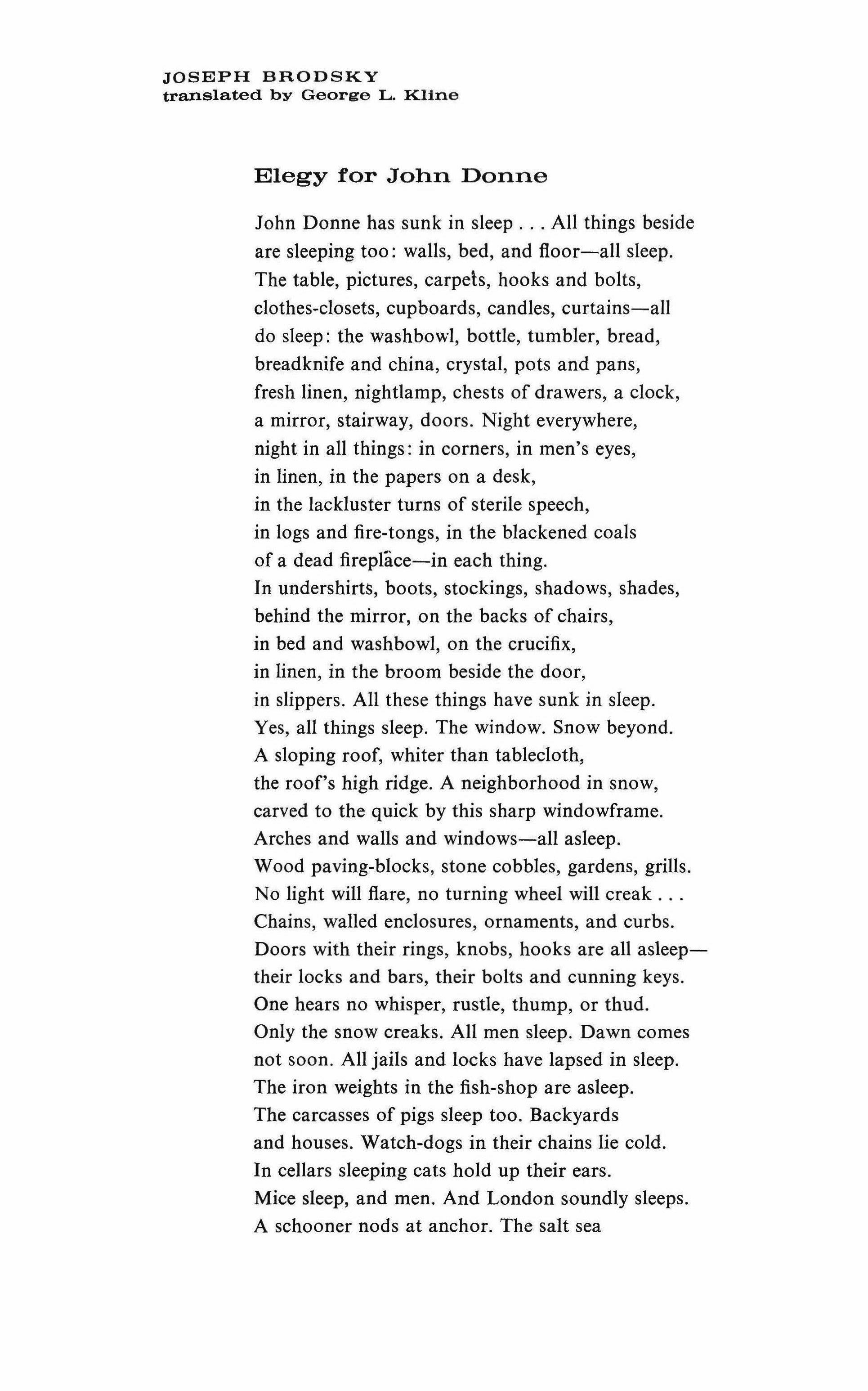
John Donne has sunk in sleep All things beside are sleeping too: walls, bed, and floor-all sleep. The table, pictures, carpels, hooks and bolts, clothes-closets, cupboards, candles, curtains-all do sleep: the washbowl, bottle, tumbler, bread, breadknife and china, crystal, pots and pans, fresh linen, nightlamp, chests of drawers, a clock, a mirror, stairway, doors. Night everywhere, night in all things: in corners, in men's eyes, in linen, in the papers on a desk, in the lackluster turns of sterile speech, in logs and fire-tongs, in the blackened coals of a dead fireplace-in each thing. In undershirts, boots, stockings, shadows, shades, behind the mirror, on the backs of chairs, in bed and washbowl, on the crucifix, in linen, in the broom beside the door, in slippers. All these things have sunk in sleep. Yes, all things sleep. The window. Snow beyond. A sloping roof, whiter than tablecloth, the roof's high ridge. A neighborhood in snow, carved to the quick by this sharp windowframe. Arches and walls and windows-all asleep. Wood paving-blocks, stone cobbles, gardens, grills. No light will flare, no turning wheel will creak Chains, walled enclosures, ornaments, and curbs. Doors with their rings, knobs, hooks are all asleeptheir locks and bars, their bolts and cunning keys. One hears no whisper, rustle, thump, or thud. Only the snow creaks. All men sleep. Dawn comes not soon. All jails and locks have lapsed in sleep. The iron weights in the fish-shop are asleep. The carcasses of pigs sleep too. Backyards and houses. Watch-dogs in their chains lie cold. In cellars sleeping cats hold up their ears. Mice sleep, and men. And London soundly sleeps. A schooner nods at anchor. The salt sea

talks in its sleep with snows beneath her hull, and melts into the distant sleeping sky. John Donne has sunk in sleep, with him the sea. Chalk cliffs that tower above it now do sleep. This Island sl�eps, embraced by lonely dreams, and every garden now is triple-barred. The maples, pines, spruce, silver firs-all sleep. On mountain slopes steep mountain-streams and paths do sleep. Foxes and wolves. Bears in their dens. The snows drift high in burrows on the hill. All the birds sleep. Their songs are heard no more.
Nor is the crow's hoarse caw. 'Tis night. The owl has quenched his hollow laugh in silent dreams. The English countryside is still. Stars flame. The mice are shriven. And all have fallen in sleep. The dead lie calmly in their graves and dream. The living, in the oceans of their gowns, sleep-each alone-within their beds. The woods, the hills, and rivers sleep. All birds and beasts, nature alive and nature dead, do sleep. But still the snow spins white from the black sky. There, high above men's heads, all things do sleep. The angels sleep. The sleeping saints-in shamehave quite forgotten this our anxious world.
The Hell-fires sleep, and glorious Paradise. No one goes forth from home at this dark hour. Even God has gone to sleep. Earth is estranged, Eyes do not see, and ears perceive no sound.
The Devil sleeps. Harsh enmity has fallen asleep with him on snowy English fields. All horsemen sleep. And the Archangel, with his trumpet. Horses, softly swaying, sleep. And all the cherubim, in one great host embracing, doze beneath St. Paul's high dome. John Donne has sunk in sleep. His verses sleep. His images, his rhymes, and his strong lines fade out of view. Anxiety and sin, alike grown slack, rest in his syllables. And each verse whispers to its next of kin, "Bestir thyself." But each stands so remote from Heaven's Gates, so poor, so pure and dense, that all seem one. And all do sleep. The vault
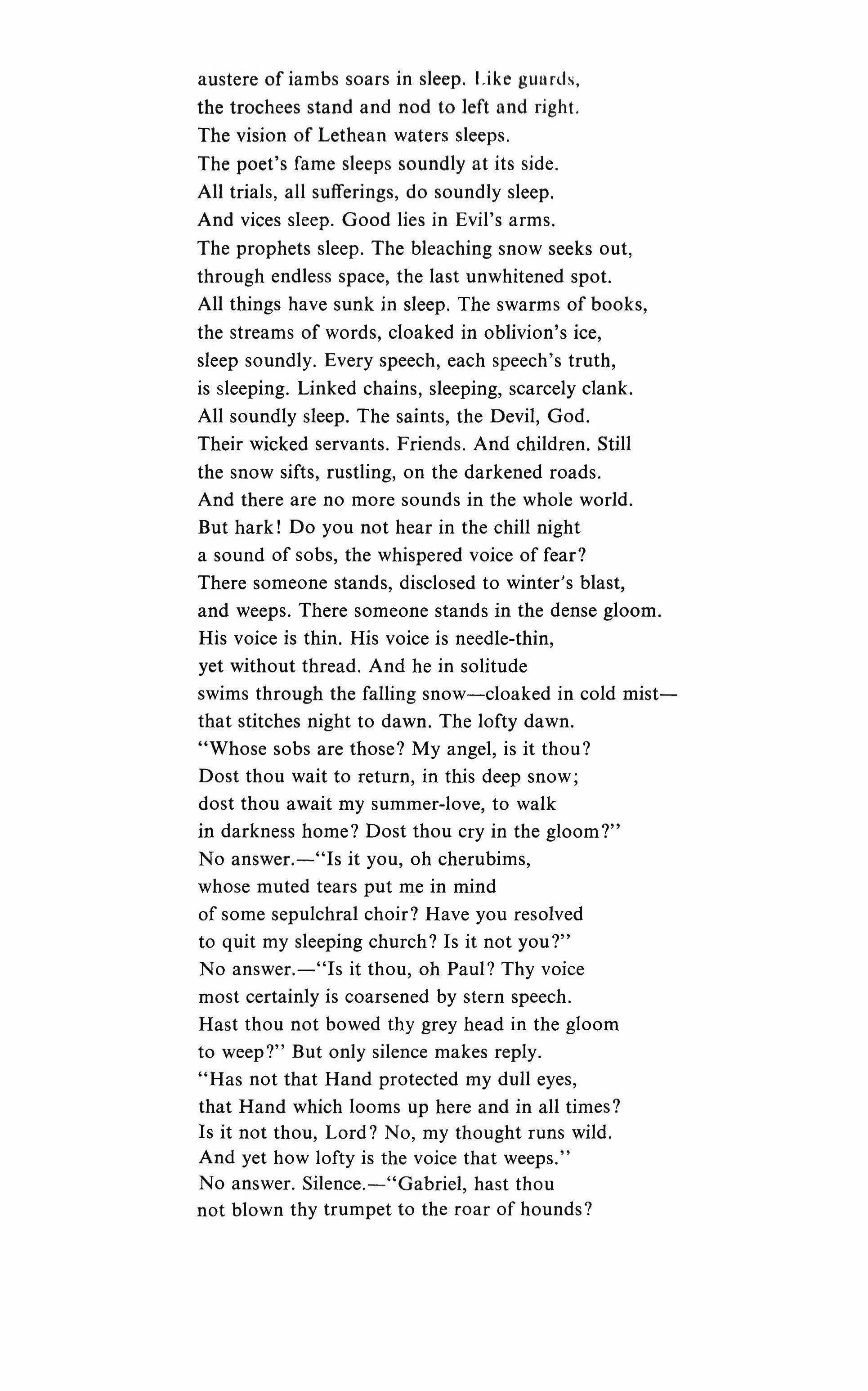
austere of iambs soars in sleep. Like guards, the trochees stand and nod to left and right. The vision of Lethean waters sleeps.
The poet's fame sleeps soundly at its side. All trials, all sufferings, do soundly sleep. And vices sleep. Good lies in Evil's arms. The prophets sleep. The bleaching snow seeks out, through endless space, the last unwhitened spot.
All things have sunk in sleep. The swarms of books, the streams of words, cloaked in oblivion's ice, sleep soundly. Every speech, each speech's truth, is sleeping. Linked chains, sleeping, scarcely clank. All soundly sleep. The saints, the Devil, God. Their wicked servants. Friends. And children. Still the snow sifts, rustling, on the darkened roads. And there are no more sounds in the whole world. But hark! Do you not hear in the chill night a sound of sobs, the whispered voice of fear? There someone stands, disclosed to winter's blast, and weeps. There someone stands in the dense gloom. His voice is thin. His voice is needle-thin, yet without thread. And he in solitude swims through the falling snow-cloaked in cold mistthat stitches night to dawn. The lofty dawn. "Whose sobs are those? My angel, is it thou?
Dost thou wait to return, in this deep snow; dost thou await my summer-love, to walk in darkness home? Dost thou cry in the gloom?" No answer.-"Is it you, oh cherubims, whose muted tears put me in mind of some sepulchral choir? Have you resolved to quit my sleeping church? Is it not you?" No answer.-"Is it thou, oh Paul? Thy voice most certainly is coarsened by stern speech. Hast thou not bowed thy grey head in the gloom to weep?" But only silence makes reply. "Has not that Hand protected my dull eyes, that Hand which looms up here and in all times? Is it not thou, Lord? No, my thought runs wild. And yet how lofty is the voice that weeps." No answer. Silence.-"Gabriel, hast thou not blown thy trumpet to the roar of hounds?
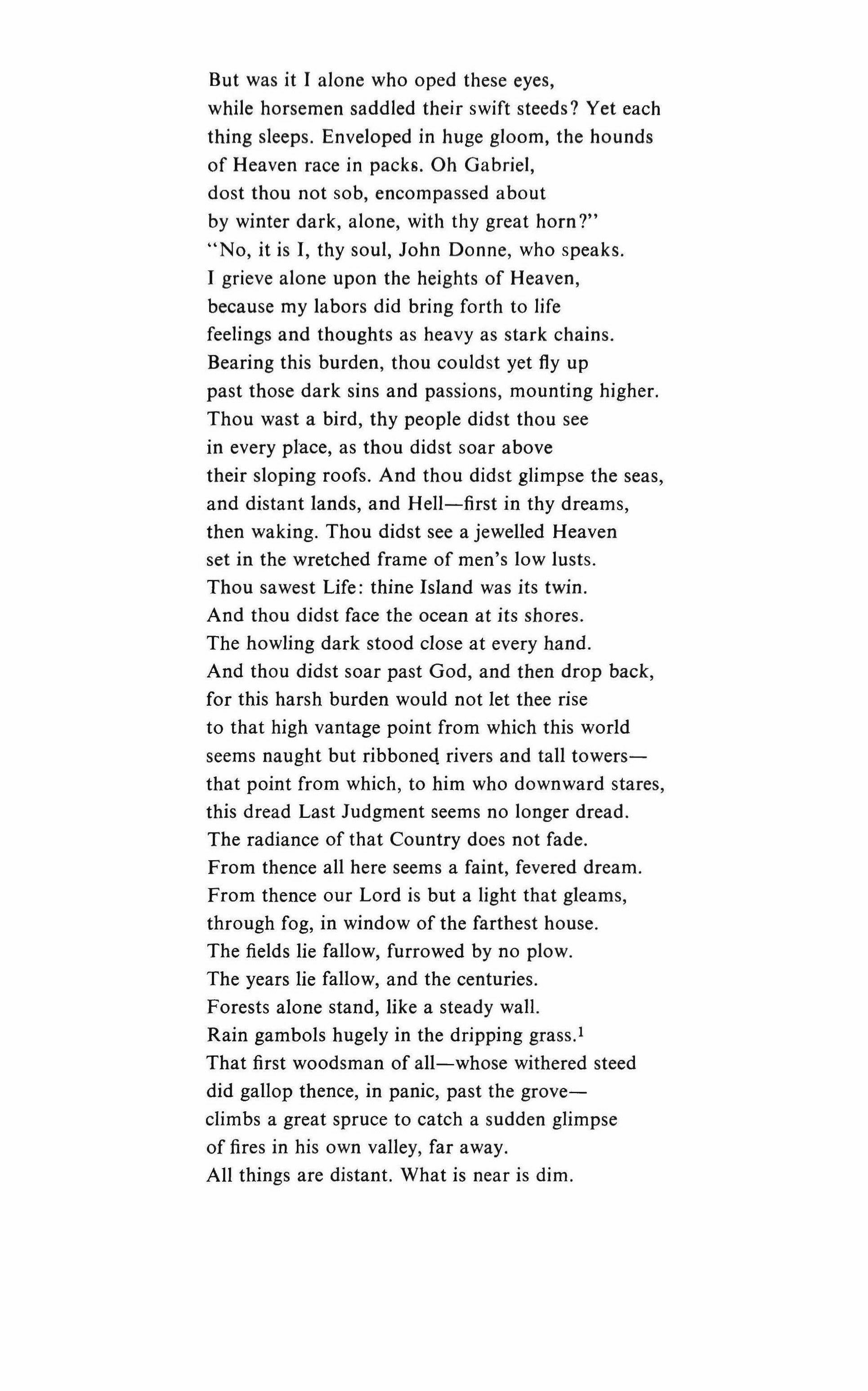
But was it I alone who oped these eyes, while horsemen saddled their swift steeds? Yet each thing sleeps. Enveloped in huge gloom, the hounds of Heaven race in packs. Oh Gabriel, dost thou not sob, encompassed about by winter dark, alone, with thy great horn?"
"No, it is I, thy soul, John Donne, who speaks. I grieve alone upon the heights of Heaven, because my labors did bring forth to life feelings and thoughts as heavy as stark chains. Bearing this burden, thou couldst yet fly up past those dark sins and passions, mounting higher. Thou wast a bird, thy people didst thou see in every place, as thou didst soar above their sloping roofs. And thou didst glimpse the seas, and distant lands, and Hell-first in thy dreams, then waking. Thou didst see a jewelled Heaven set in the wretched frame of men's low lusts. Thou sawest Life: thine Island was its twin. And thou didst face the ocean at its shores. The howling dark stood close at every hand. And thou didst soar past God, and then drop back, for this harsh burden would not let thee rise to that high vantage point from which this world seems naught but ribboned rivers and tall towersthat point from which, to him who downward stares, this dread Last Judgment seems no longer dread. The radiance of that Country does not fade. From thence all here seems a faint, fevered dream. From thence our Lord is but a light that gleams, through fog, in window of the farthest house. The fields lie fallow, furrowed by no plow. The years lie fallow, and the centuries. Forests alone stand, like a steady wall. Rain gambols hugely in the dripping grass.!
That first woodsman of all-whose withered steed did gallop thence, in panic, past the groveclimbs a great spruce to catch a sudden glimpse of fires in his own valley, far away. All things are distant. What is near is dim.
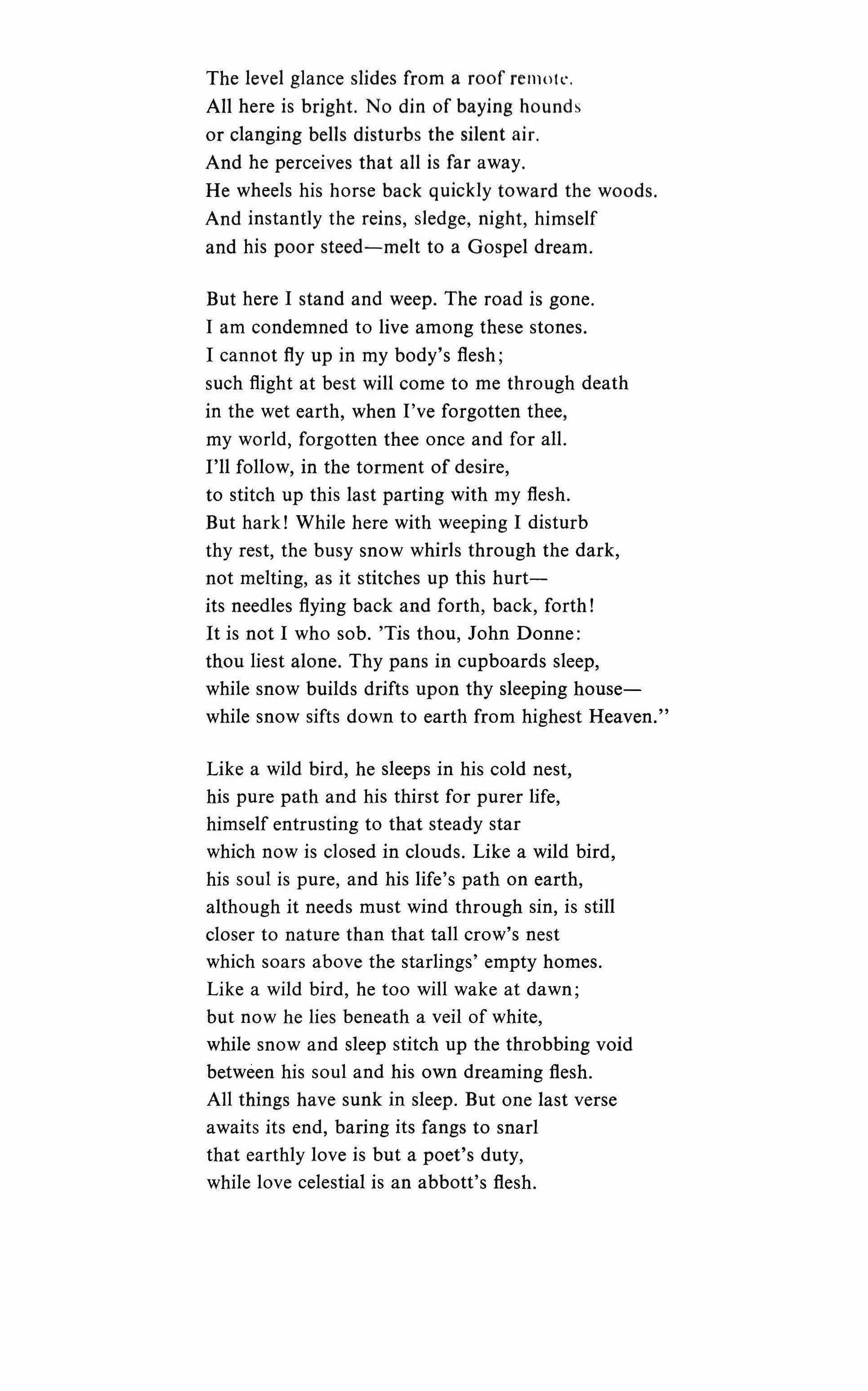
The level glance slides from a roof remote. All here is bright. No din of baying hounds or clanging bells disturbs the silent air. And he perceives that all is far away. He wheels his horse back quickly toward the woods. And instantly the reins, sledge, night, himself and his poor steed-melt to a Gospel dream.
But here I stand and weep. The road is gone. I am condemned to live among these stones. I cannot fly up in my body's flesh; such flight at best will come to me through death in the wet earth, when I've forgotten thee, my world, forgotten thee once and for all. I'll follow, in the torment of desire, to stitch up this last parting with my flesh. But hark! While here with weeping I disturb thy rest, the busy snow whirls through the dark, not melting, as it stitches up this hurtits needles flying back and forth, back, forth! It is not I who sob. 'Tis thou, John Donne: thou liest alone. Thy pans in cupboards sleep, while snow builds drifts upon thy sleeping housewhile snow sifts down to earth from highest Heaven."
Like a wild bird, he sleeps in his cold nest, his pure path and his thirst for purer life, himself entrusting to that steady star which now is closed in clouds. Like a wild bird, his soul is pure, and his life's path on earth, although it needs must wind through sin, is still closer to nature than that tall crow's nest which soars above the starlings' empty homes. Like a wild bird, he too will wake at dawn; but now he lies beneath a veil of white, while snow and sleep stitch up the throbbing void between his soul and his own dreaming flesh. All things have sunk in sleep. But one last verse awaits its end, baring its fangs to snarl that earthly love is but a poet's duty, while love celestial is an abbott's flesh.
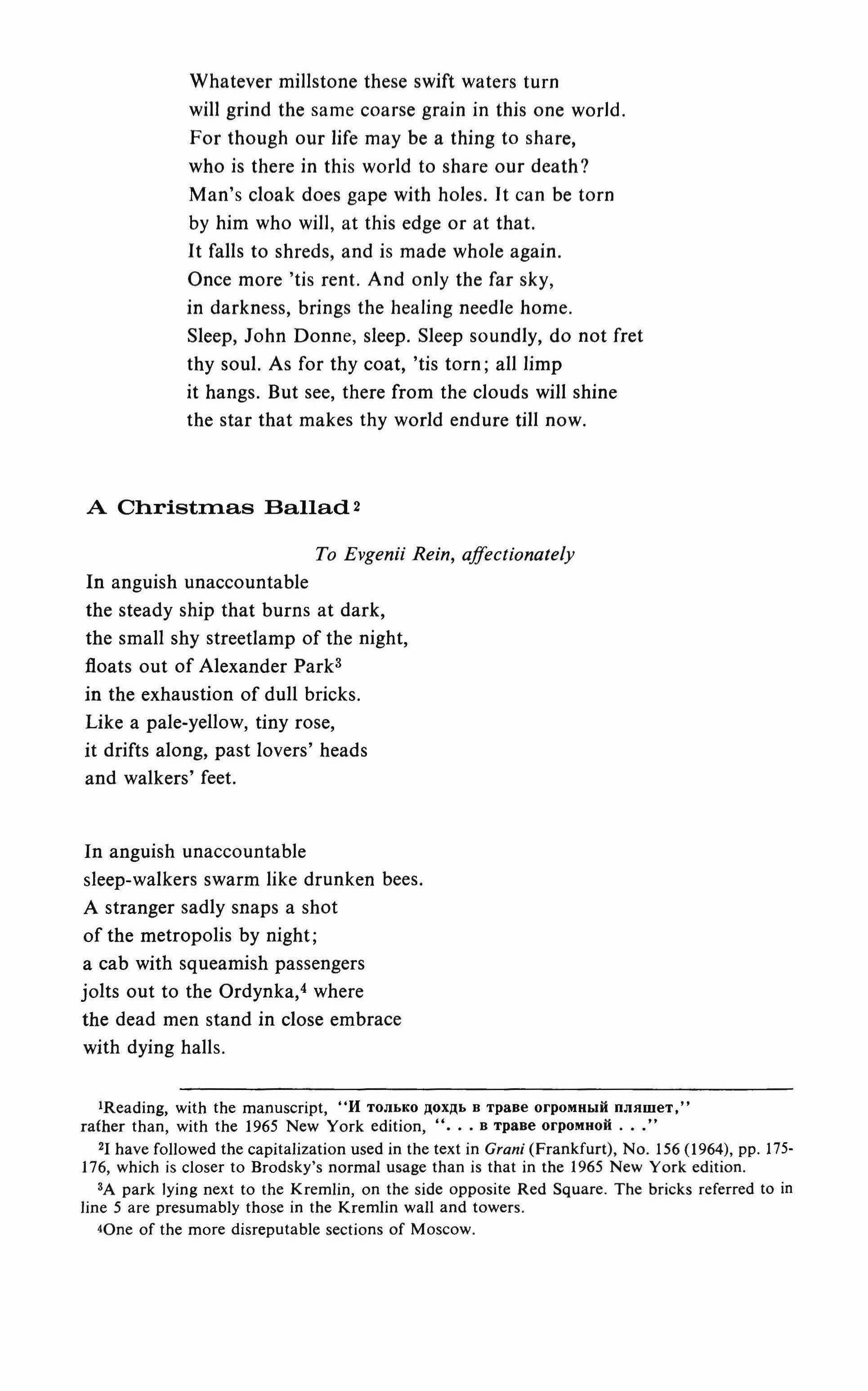
Whatever millstone these swift waters turn will grind the same coarse grain in this one world. For though our life may be a thing to share, who is there in this world to share our death? Man's cloak does gape with holes. It can be torn by him who will, at this edge or at that. It falls to shreds, and is made whole again. Once more 'tis rent. And only the far sky, in darkness, brings the healing needle home. Sleep, John Donne, sleep. Sleep soundly, do not fret thy soul. As for thy coat, 'tis torn; all limp it hangs. But see, there from the clouds will shine the star that makes thy world endure till now.
A Christmas Ballad 2
To Evgenii Rein, affectionately
In anguish unaccountable the steady ship that burns at dark, the small shy streetlamp of the night, floats out of Alexander Park" in the exhaustion of dull bricks. Like a pale-yellow, tiny rose, it drifts along, past lovers' heads and walkers' feet.
In anguish unaccountable sleep-walkers swarm like drunken bees. A stranger sadly snaps a shot of the metropolis by night; a cab with squeamish passengers jolts out to the Ordynka.! where the dead men stand in close embrace with dying halls.
lReading, with the manuscript, "II TOJlbKO AOXAb B TpaBe orpoMHhlH DJlHmeT," rather than, with the 1965 New York edition, B TpaBe orpoMHoH 21 have followed the capitalization used in the text in Grani (Frankfurt), No. 156 (1964), pp. 175· 176, which is closer to Brodsky's normal usage than is that in the 1965 New York edition. 3A park lying next to the Kremlin, on the side opposite Red Square. The bricks referred to in line 5 are presumably those in the Kremlin wall and towers. 40ne of the more disreputable sections of Moscow.
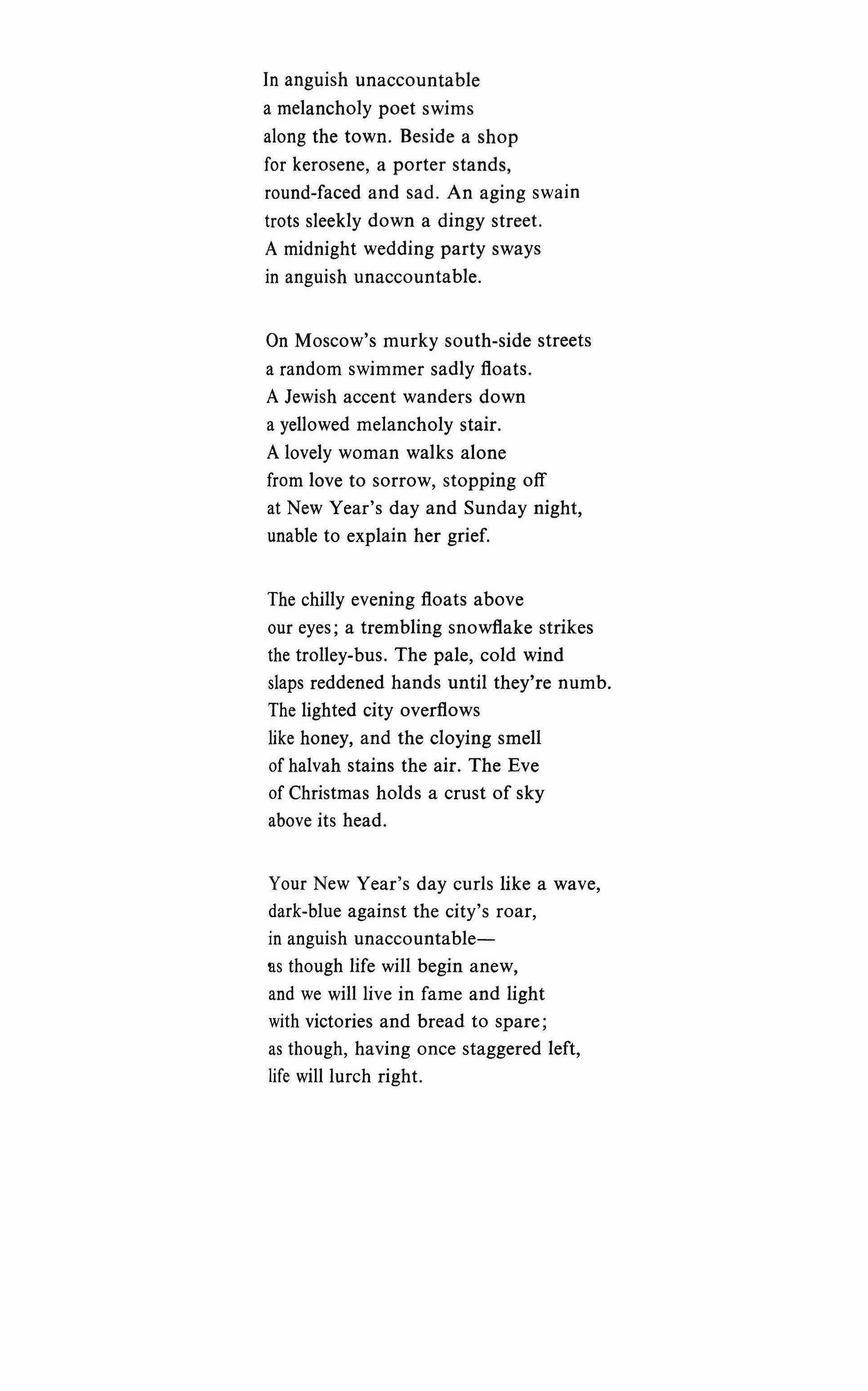
In anguish unaccountable a melancholy poet swims along the town. Beside a shop for kerosene, a porter stands, round-faced and sad. An aging swain trots sleekly down a dingy street. A midnight wedding party sways in anguish unaccountable.
On Moscow's murky south-side streets a random swimmer sadly floats. A Jewish accent wanders down a yellowed melancholy stair. A lovely woman walks alone from love to sorrow, stopping off at New Year's day and Sunday night, unable to explain her grief.
The chilly evening floats above our eyes; a trembling snowflake strikes the trolley-bus. The pale, cold wind slaps reddened hands until they're numb. The lighted city overflows like honey, and the cloying smell of halvah stains the air. The Eve of Christmas holds a crust of sky above its head.
Your New Year's day curls like a wave, dark-blue against the city's roar, in anguish unaccountableas though life will begin anew, and we will live in fame and light with victories and bread to spare; as though, having once staggered left, life will lurch right.
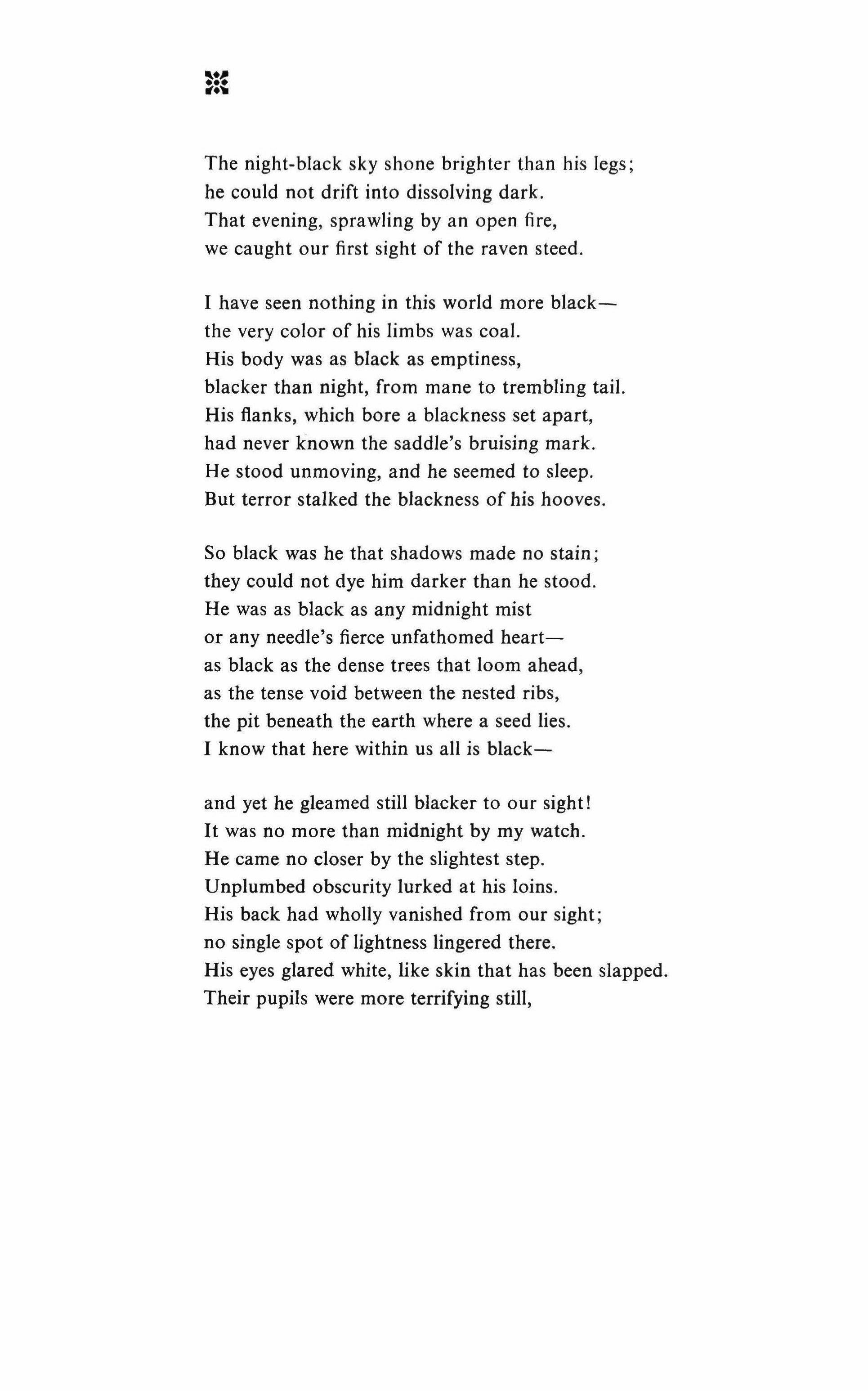
The night-black sky shone brighter than his legs; he could not drift into dissolving dark. That evening, sprawling by an open fire, we caught our first sight of the raven steed.
I have seen nothing in this world more blackthe very color of his limbs was coal. His body was as black as emptiness, blacker than night, from mane to trembling tail. His flanks, which bore a blackness set apart, had never known the saddle's bruising mark. He stood unmoving, and he seemed to sleep. But terror stalked the blackness of his hooves.
So black was he that shadows made no stain; they could not dye him darker than he stood. He was as black as any midnight mist or any needle's fierce unfathomed heartas black as the dense trees that loom ahead, as the tense void between the nested ribs, the pit beneath the earth where a seed lies. I know that here within us all is black-
and yet he gleamed still blacker to our sight! It was no more than midnight by my watch. He came no closer by the slightest step. Unplumbed obscurity lurked at his loins. His back had wholly vanished from our sight; no single spot of lightness lingered there. His eyes glared white, like skin that has been slapped. Their pupils were more terrifying still,
with the strange leer of eyes in negatives!
But why then did he interrupt his flight to watch beside us till the morning dawned?
Why did he stand so close against the fire?
And why then did he breathe that blackened air, and crush the brittle bones of fallen leaves? Why did he blaze black light from those great eyes?
-He sought to find a rider in our midst!
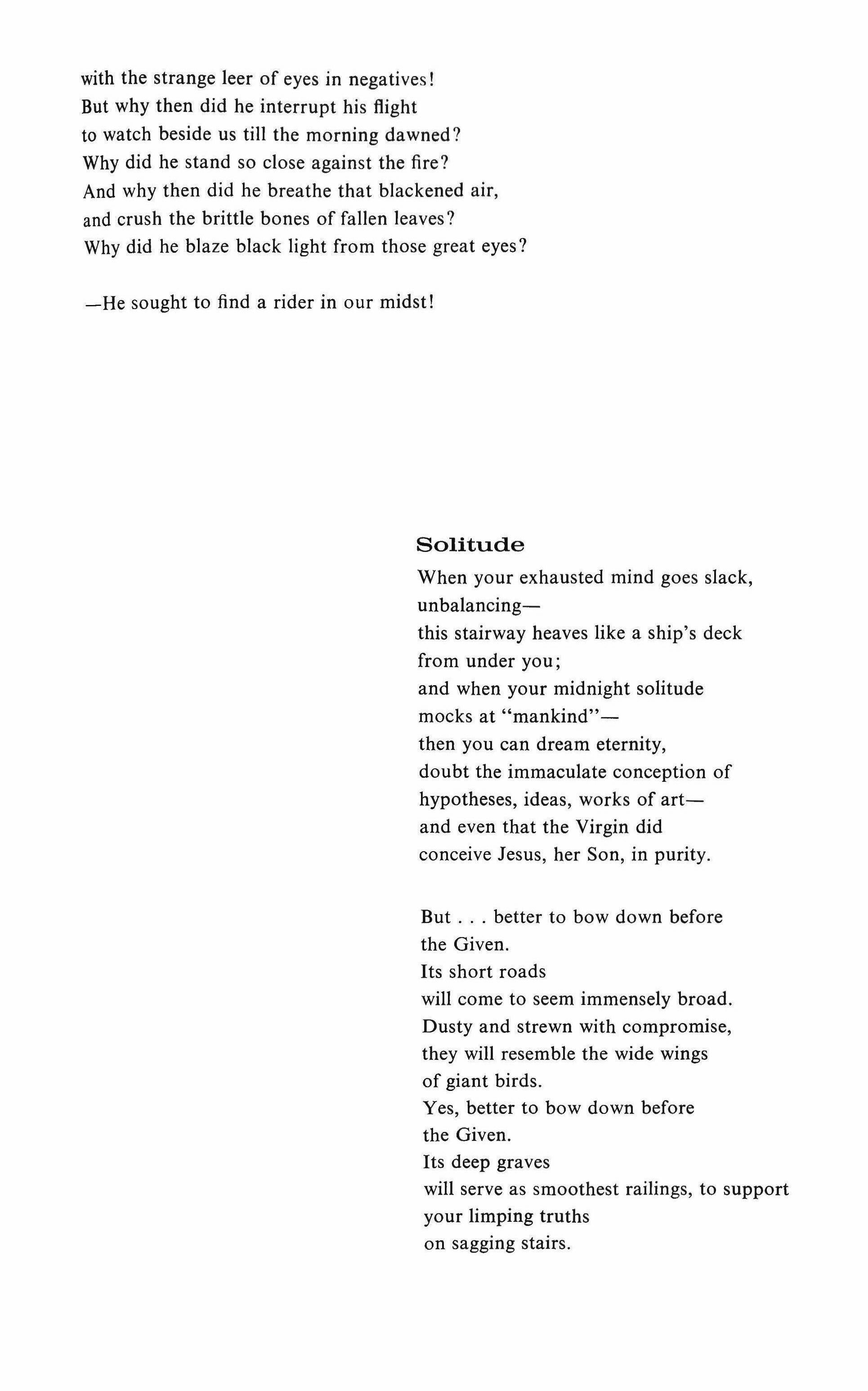
When your exhausted mind goes slack, unbalancingthis stairway heaves like a ship's deck from under you; and when your midnight solitude mocks at "mankind"then you can dream eternity, doubt the immaculate conception of hypotheses, ideas, works of artand even that the Virgin did conceive Jesus, her Son, in purity.
But better to bow down before the Given. Its short roads will come to seem immensely broad. Dusty and strewn with compromise, they will resemble the wide wings of giant birds. Yes, better to bow down before the Given. Its deep graves will serve as smoothest railings, to support your limping truths on sagging stairs.
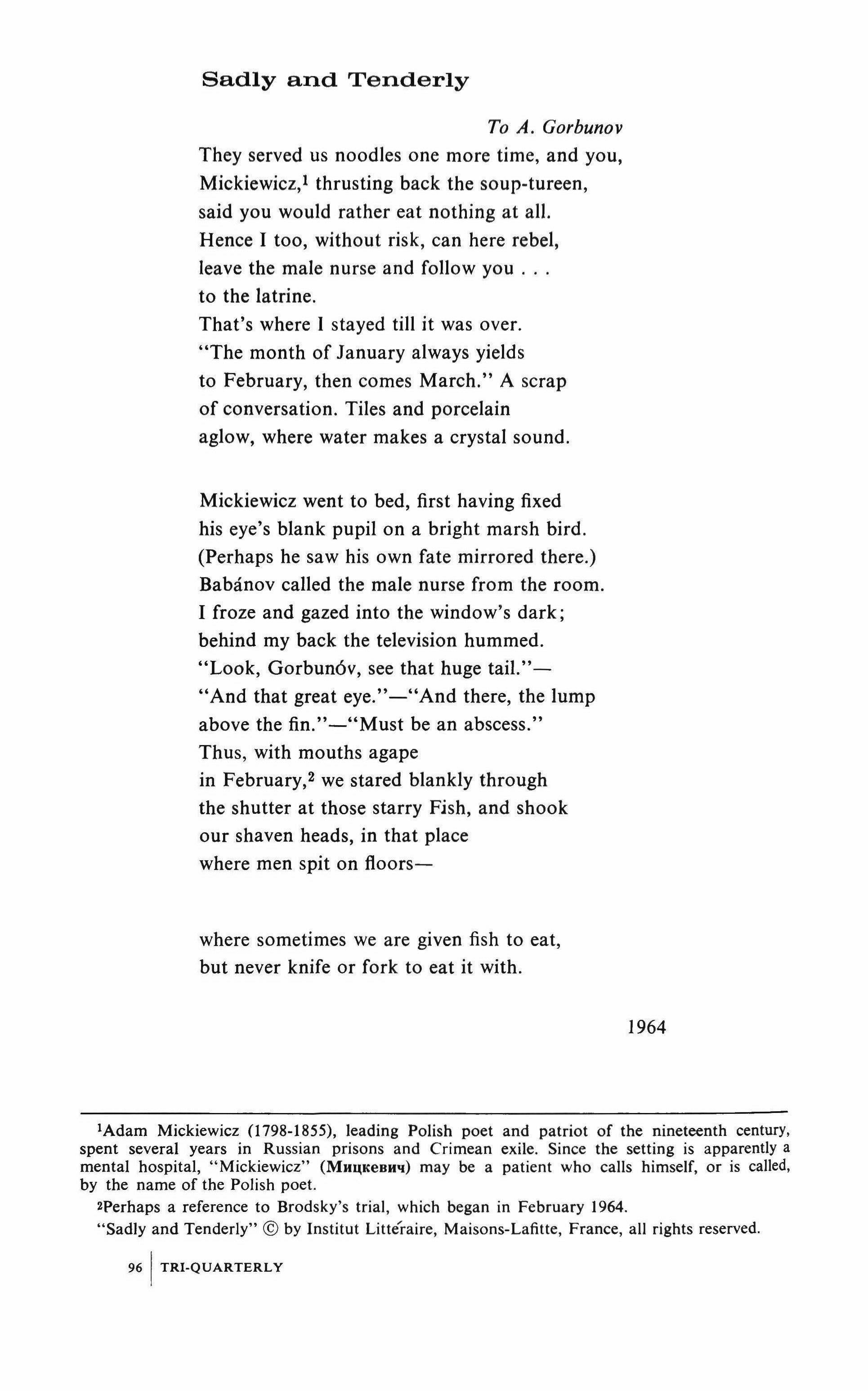
To A. Gorbunov
They served us noodles one more time, and you, Mickiewicz.l thrusting back the soup-tureen, said you would rather eat nothing at all. Hence I too, without risk, can here rebel, leave the male nurse and follow you to the latrine.
That's where I stayed till it was over. "The month of January always yields to February, then comes March." A scrap of conversation. Tiles and porcelain aglow, where water makes a crystal sound.
Mickiewicz went to bed, first having fixed his eye's blank pupil on a bright marsh bird. (Perhaps he saw his own fate mirrored there.) Babanov called the male nurse from the room. I froze and gazed into the window's dark; behind my back the television hummed. "Look, Gorbun6v, see that huge tail.""And that great eye."-"And there, the lump above the fin."-"Must be an abscess." Thus, with mouths agape in February.s we stared blankly through the shutter at those starry Fish, and shook our shaven heads, in that place where men spit on 600rs-
where sometimes we are given fish to eat, but never knife or fork to eat it with.
1964
lAdam Mickiewicz (1798-1855), leading Polish poet and patriot of the nineteenth century, spent several years in Russian prisons and Crimean exile. Since the setting is apparently a mental hospital, "Mickiewicz" (MH�KeBH'I) may be a patient who calls himself, or is called, by the name of the Polish poet.
zPerhaps a reference to Brodsky's trial, which began in February 1964. "Sadly and Tenderly" © by Institut Litteraire, Maisons-Lafitte, France, all rights reserved.
TRI-QUARTERLY

(Notebook found on the night-table in a Dubna hotel room.)
Ave, Oza. Night, or safe at home, fighting dogs are licking up their tearsI can hear the silence ofyour breath. Ave, Oza
I shrank back as though cold waves were near. How could I, "cold cynic and buffoon," know that love is fashioned out offear! Ave, Oza!
Horrible to picture you alone! Yet it's worse to picture someone there. Your bright beauty'sfrom some Evil One. Ave,Oza!
Microbes, people, locomotives too, treat her carefully, I beg ofyou. May she never see her world convulse. Ave, Oza
Life, I tell you, isn't cabbage heads. Why, then, chop and tear it into shreds? Ave,Oza.
Dreadful to be late. Still more dreadful now to be apart!
Opposites have blended into one. Let me love your bitterness away. On the magnet I'm the gloomy poleyou the bright one. May you stay that way.
May you never know how much I grieve. For I have no wish to weigh you down-
either with the burden of my life or the murky millstone of my death.
Ave, Oza. Keep your brightnessfresh. What is in the moment cannot fade.
I do not deplore your moving on. I am grateful that you came this way. Ave, Oza
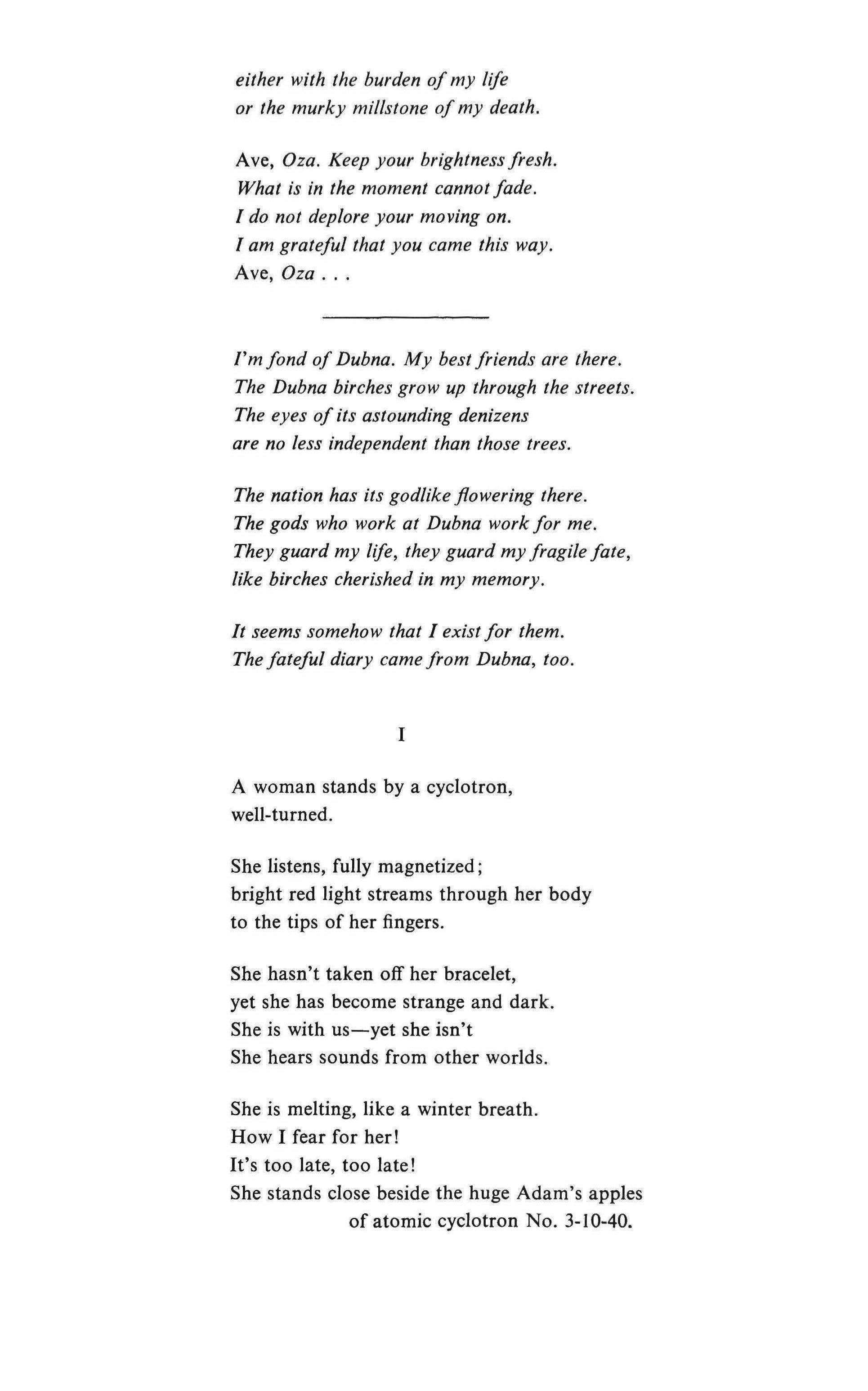
I'm fond of Dubna. My best friends are there. The Dubna birches grow up through the streets. The eyes of its astounding denizens are no less independent than those trees.
The nation has its godlikeflowering there. The gods who work at Dubna work for me. They guard my life, they guard my fragilefate, like birches cherished in my memory.
It seems somehow that I exist for them. Thefateful diary came from Dubna, too.
IA woman stands by a cyclotron, well-turned.
She listens, fully magnetized; bright red light streams through her body to the tips of her fingers.
She hasn't taken off her bracelet, yet she has become strange and dark. She is with us-yet she isn't She hears sounds from other worlds.
She is melting, like a winter breath. How I fear for her! It's too late, too late!
She stands close beside the huge Adam's apples of atomic cyclotron No. 3-10-40.
People, I know, are made up of atoms and elementary particles, just as rainbows are made up of gleaming specks of dust, and sentences of letters. You make the arrangement and the meaning changes. I told her not to enter that area!
But, dilating her fine nostrils, she grew holiday-fair. Is it a sacrifice?
Or is she making fun of us?
She hasn't taken off her bracelet, yet she has become strange and dark. She is with us-yet she isn't: She hears sounds from other worlds.
"Zoya," I scream, "Zoya!
She doesn't hear me.
She understands nothing.
Perhaps her name is Oza?

I don't recognize my surroundings.
Things are still the same, but their elementary particles, flashing on and off, have changed the shape of things, like the tiers of flashing lights at the Central Post Office.!
The connections of things are the same, but their direction has changed. Trees lie flat, like many-fingered lakes, while their shadows stand upright like black-paper cut-outs. The tree-shadows rattle faintly in the wind, like silver paper torn from a chocolate bar.
A well-hole juts upward like a black searchlight beam. A sunken bucket lies at the top of it, and bits of slime float in its shaft.
Rain falls from three clouds; they resemble plastic pocket-combs with rain teeth. (Two of them have teeth that point down; the teeth of the third point up.)
And what castling! The belltower of Ivan the Great- has been moved to the square where the rook of the leaning tower of Pisa- used to stand. Icicles, not yet melted, tinkle on its glistening surface.
The pages of history have been shuffled like a deck of cards. The invasion of Datu Khan+ comes after the industrial revolution.
People form a jostling line at the cyclotron. Each person receives his treatment. Each is taken apart and put back together again. They emerge renewed.
One man has an ear with a hole in the middle screwed into his forehead, like a surgeon's mirror. "Lucky fellow," they say. "Handy for keyholes! You can see and hear at the same time."
One woman asked for the complaint book: "They didn't give me any heart!" Using two fingers, someone pulled her breast open, as though it were the righthand drawer of a writing desk, popped something inside, and slammed it shut.
Experimenter ex sang and danced a jig.
"E9-D4," he muttered. "0 mystery of creation! The position of the items summed does not affect the total. The main thing is to preserve the system. Who needs poetry? There will be robots. The psyche is only a complex structure of amino acids.
How about slicing the earth in two at the equator and putting one hemisphere inside the other, like the two halves of an eggshell!
Of course, you'd have to file down the Eiffel Tower so it wouldn't stick through the Australian lowlands.
It's true that half of humanity would perish, but the other half would know the joy of having carried out a great experiment!
Only on the stage where the Presidium of the Quasi-Art Section was meeting was there a semblance of order. The members of the Presidium glowed like eggs in an egg-candling machine. Since they were spherical, they looked the same on all sides. One of them had legs sticking up above the table instead of a trunklike twin periscopes.
But no one paid any attention to them.
The speaker threw out his chest. The back of his head was turned forward, like the head of a celluloid doll. "Forward to the new art!" he cried. Everyone agreed. But which direction was forward?
The horizontal signboard (it said either "toilet" Or "forward to the new art"; you couldn't be sure which) pointed up, like the minute hand at ten minutes to three. A line of people moved rapidly in that direction; they seemed to be climbing the steps of an invisible stairway.
No one noticed anything.
Above all this, like an apocalyptic sign, glowed a neon light: "Beware of closing circuits accidentally."5 But the switches had been installed upside-down; their contacts pointed straight up.
Blue-black eyebrows are drawn not above but below the eyes, like the shadows under a cornice.
ANYTHING.
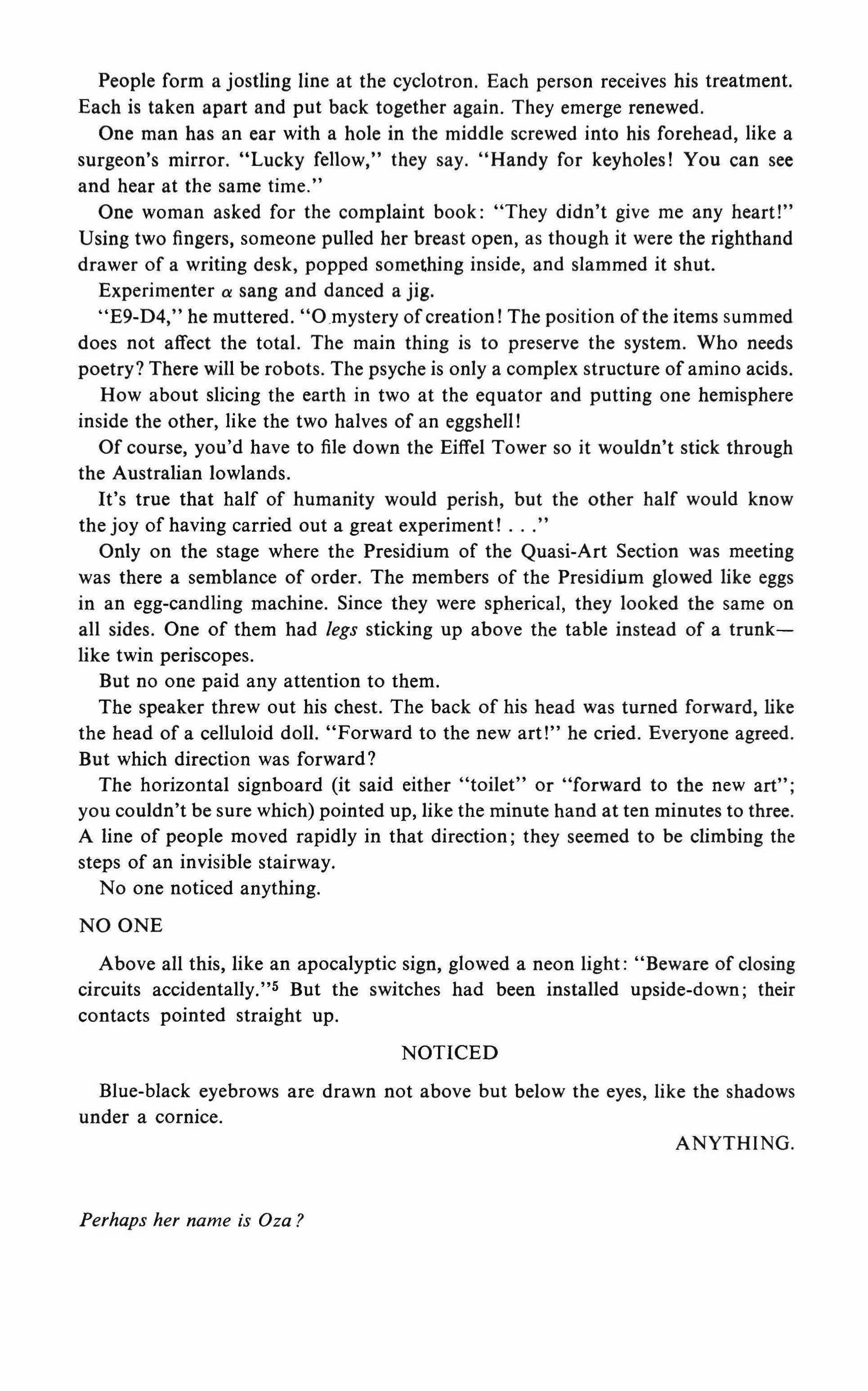
Perhaps her name is Oza ?
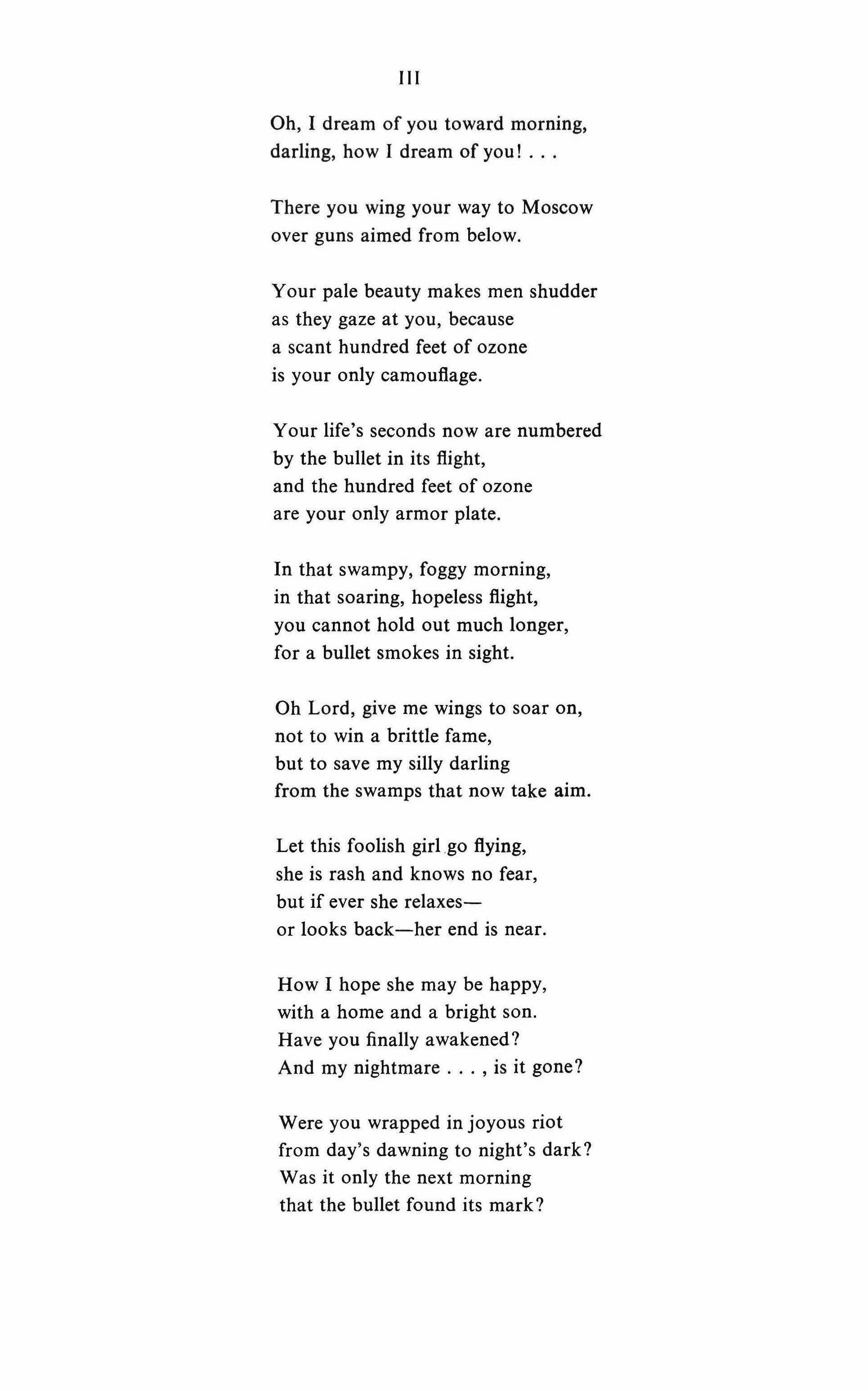
Oh, I dream of you toward morning, darling, how I dream of you!
There you wing your way to Moscow over guns aimed from below.
Your pale beauty makes men shudder as they gaze at you, because a scant hundred feet of ozone is your only camouflage.
Your life's seconds now are numbered by the bullet in its flight, and the hundred feet of ozone are your only armor plate.
In that swampy, foggy morning, in that soaring, hopeless flight, you cannot hold out much longer, for a bullet smokes in sight.
Oh Lord, give me wings to soar on, not to win a brittle fame, but to save my silly darling from the swamps that now take aim.
Let this foolish girl go flying, she is rash and knows no fear, but if ever she relaxesor looks back-her end is near.
How I hope she may be happy, with a home and a bright son. Have you finally awakened? And my nightmare is it gone?
Were you wrapped in joyous riot from day's dawning to night's dark? Was it only the next morning that the bullet found its mark?

Perhaps we seem, dear friend, a sentimental lotand souls will be tossed out, like almonds sapped by rot. Brave trochees in their pride, as pure as silver flutes, will all be left to die, like trout blocked by a sluice.
Could love be out of style, as obsolete as peat? So be it!
And why, when meadows flirt, and forests flaunt their firs, are men, like cats to nip, drawn to the poet's verse? Why do our souls puff up, in shy and joyous bloom
Robots, robots, robots, cut my line in two.
Clanking automata shove tokens into slots; gears grind and vomit a pre-packaged product out.
No time to think at desks equipped with metal hands. There's only gross and netno time to be a man.
My friend the lyricist chats with the chambermaid. She frowns and makes a fist; he frowns and shakes his head.
"Now, child, what can you mean? You are fresh from the sticks! You want sweet sentiment? You haven't heard?-It stinks!"

What beats against your ribs like a trapped partisan? Our hearts are unemployed; the world is robot-run.
It's ghastly! Mother, bear me backward into your womb!
Rivers run backward toward their sources.
Motorcyclists race in reverse from finish tape to starting line.
Huge baobab trees shrink before our eyes, growing backward into seedlings. A bullet flies out of Mayakovski's heart, flashes through the tiny burnt hole in his shirt, and quickly vanishes into the muzzle of mauser No. 4-03986 which, shrivelling up like a snail, dives into a desk-drawer 6
Your father is a historian. He says that mankind is growing backward, from old age to youth.
Take the Middle Ages. Senility. The wrinkled walls of the Inquisition. Then the Renaissance. The Indian summer of mankind. A beautiful woman, who has experienced everything, feasts among ripe bodies and firm fruits.
". the electron is considered to be scattered backward in time from t2 to t1. Then the conventional position becomes an electron going backward in time."
-R. P. Feynman,Theory ofFundamental Processes, New York, 1961 [po 26]
We shall not dwell on the hopes, betrayals, adventures of the eighteenth century, or the pregnant thoughtfulness of the nineteenth.
The beginning of the twentieth century: furious rhythm of revolution! The 1918-year plan of army commanders. "We are the earth's first love." "Now socialism arises, alive, human, full of truth-justice." That's the way it was
Does the wind make your head start spinning? Or untangle memory's yarn ? Is the record-playerplaying a harsh and repulsive march?

Black record, don't sing of Stalin. His isn't a simple air. The gray ofhis great mustaches is dark, and yet terribly clear.
Remarkable builder, he strokes them, as they curtain his glowing pipe. He appraises each bolt and washer, not noticing human life.
Who believed in those gray mustaches? And who needled down in their hay? They were combedfor the National Anthem, stained wine-redfor a holiday.
In those years Stalin's State Mustaches hovered solemnly over our land, like a bird ofprey that circles, and is fringed with a blood-red band!
Black record, don't sing of Stalin. A man's not a bolt or gear. That's gone. We're no longer demented by the smothering smoke ofhis hair.
"I think of the future," the historian continues, "of a time when all dreams will have become reality. Technology is good when good men use it. Do you fear technology? If so, then back to the caves!
He is gray-haired and ruddy-faced. Dogs and children smile at him.
I wasn't the first to find the notebook. Several people on special assignment had leafed through it, jotting worn witticisms in the margins, falling asleep over it, trying to fathom its meaning.
Here's a scribbled note: "The author's (11/ ubstrartlonist:"
Beneath it in red: "You're another."
"But machines can think "And whose thoughts do they think? People's?"
"Perhaps this is an author who likes to titillate the public with a hidden message ?" "Forget the hidden message: it's all Greek to me." Diary, let's put aside these witty marginalia. There are commentaries enough in this world without them.
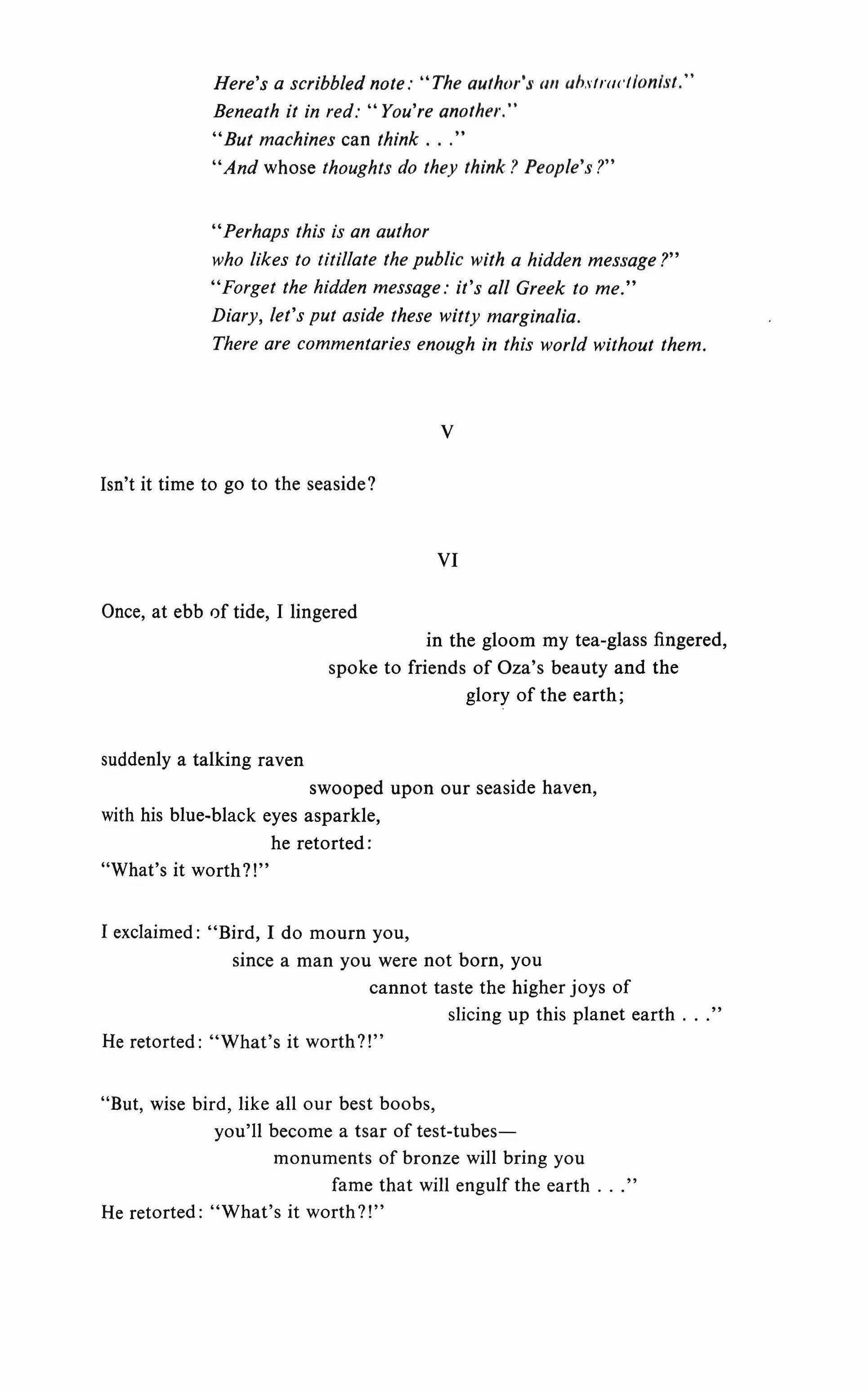
Isn't it time to go to the seaside? VI
Once, at ebb of tide, I lingered in the gloom my tea-glass fingered, spoke to friends of Oza's beauty and the glory of the earth;
suddenly a talking raven
swooped upon our seaside haven, with his blue-black eyes asparkle, he retorted: "What's it worth?!"
I exclaimed: "Bird, I do mourn you, since a man you were not born, you cannot taste the higher joys of slicing up this planet earth ." He retorted: "What's it worth?!"
"But, wise bird, like all our best boobs, you'll become a tsar of test-tubesmonuments of bronze will bring you fame that will engulf the earth He retorted: "What's it worth?!"
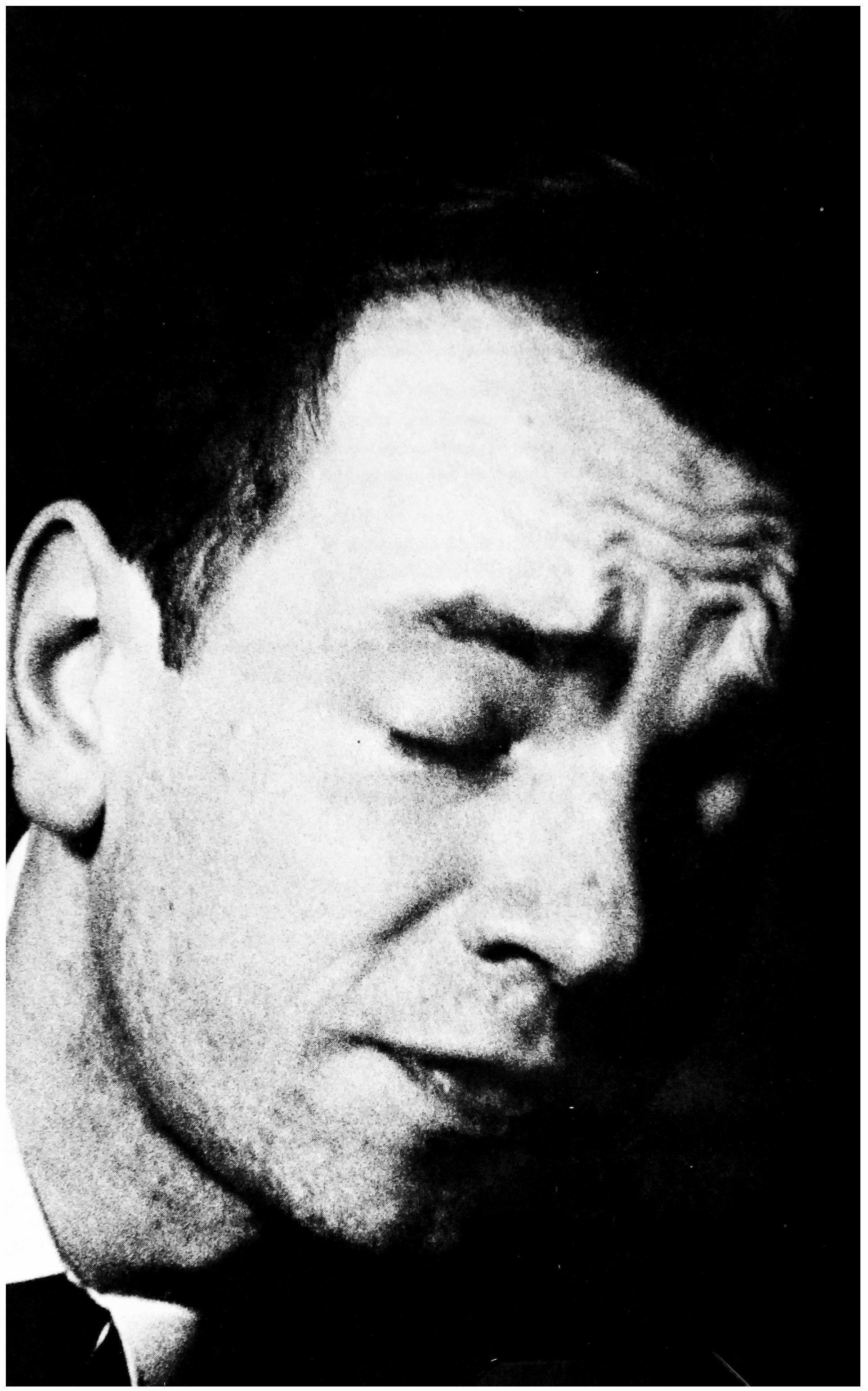
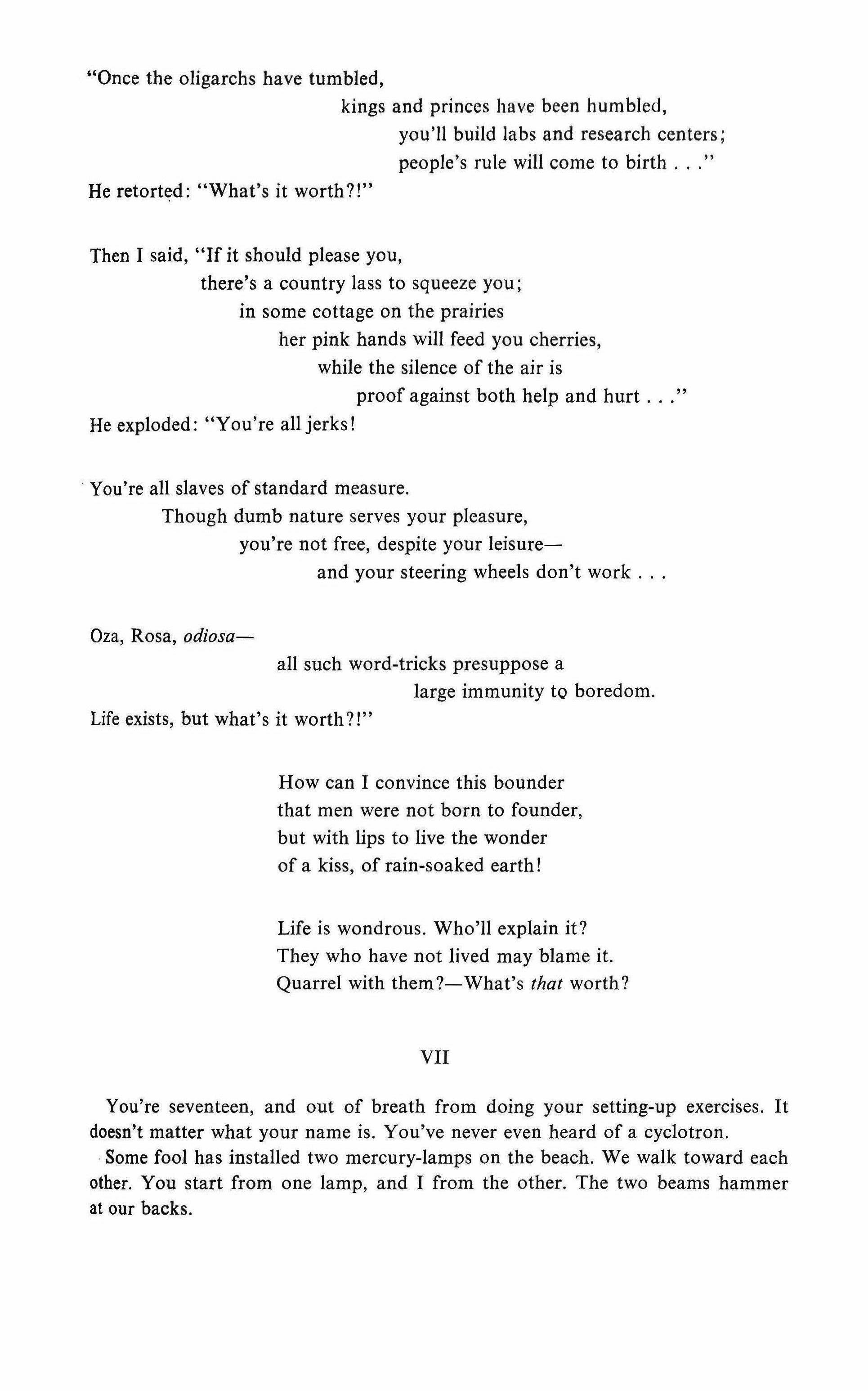
"Once the oligarchs have tumbled, kings and princes have been humbled, you'll build labs and research centers; people's rule will come to birth
He retorted: "What's it worth?!"
Then I said, "If it should please you, there's a country lass to squeeze you; in some cottage on the prairies her pink hands will feed you cherries, while the silence of the air is proof against both help and hurt He exploded: "You're all jerks!
You're all slaves of standard measure.
Though dumb nature serves your pleasure, you're not free, despite your leisureand your steering wheels don't work
Oza, Rosa, odiosaall such word-tricks presuppose a large immunity to boredom. Life exists, but what's it worth?!"
How can I convince this bounder that men were not born to founder, but with lips to live the wonder of a kiss, of rain-soaked earth!
Life is wondrous. Who'll explain it? They who have not lived may blame it. Quarrel with them?-What's that worth?
You're seventeen, and out of breath from doing your setting-up exercises. It doesn't matter what your name is. You've never even heard of a cyclotron. Some fool has installed two mercury-lamps on the beach. We walk toward each other. You start from one lamp, and I from the other. The two beams hammer at our backs.
Before our hands can touch, our shadows have merged; they are warm and alive, surrounded by a dead whitness.
You seem to be forever walking toward me!
The backs of people's heads always look into the past. Time stands behind us, like the queue at a trolly-bus stop. I carry the past on my back like a knapsack, but you carry the future. It rustles behind you like an open parachute. When we are together the future seems to flow from you into me, and the past from me into you, as though we were hourglasses.
For you the past can still be changed, can still happen. "Napoleon," I remark, "won the battle of Austerlitz." You reply: "We shall see!"
On the other hand, for you the future is something firm and absolute. "Tomorrow," you say, "we went walking in the woods. How the wind did roar in the trees tomorrow." And you still have that dead pine-needle sticking out of your left sneaker.
Your sneakers have squarish toes; people don't wear that kind any more. "Don't wear that kind yet," you laugh.
1 try to screen the past from your eyes so you will never have to look at Maydeneck and the Inquisition.
Your teeth are smeared with lipstick. Sometimes you try to humor me. I notice that something is troubling you. "Dear, what is it?"
Freeing yourself, contented now, you blurt out, as though speaking a foreign language, "I have experienced a great aesthetic satisfaction!" "And 1 used to be afraid of you," 1 say, "but what are you thinking of now?
Yes, what, what, what Where is she now?
Perhaps her name is Oza?
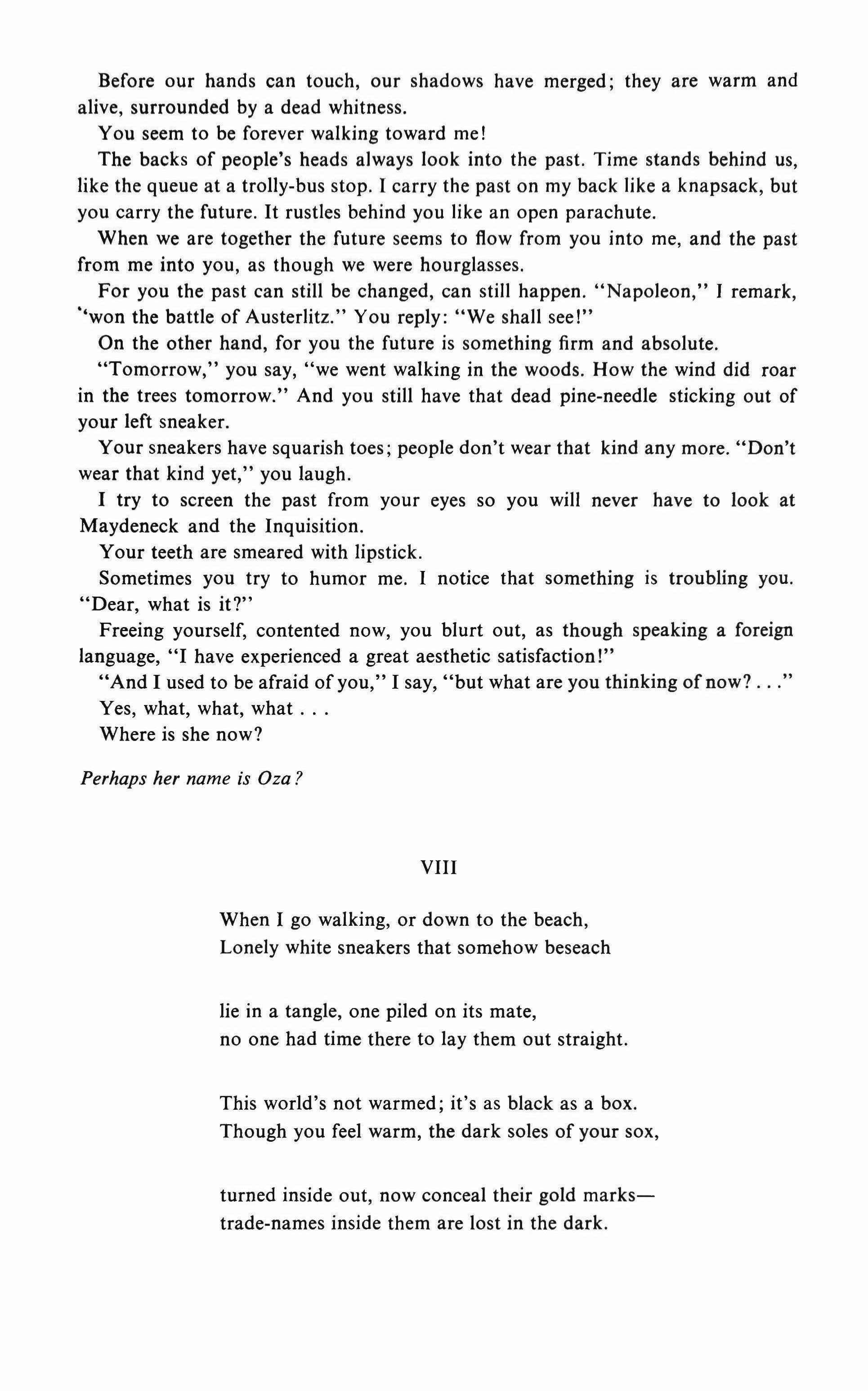
When I go walking, or down to the beach, Lonely white sneakers that somehow beseach
lie in a tangle, one piled on its mate, no one had time there to lay them out straight.
This world's not warmed; it's as black as a box. Though you feel warm, the dark soles of your sox, turned inside out, now conceal their gold markstrade-names inside them are lost in the dark.
VInPink-breasted pigeons peck strewn millet seed; blood crowds my brain-I no longer can sleep.
On the flat sand two small shoes stand alone: Has some girl swimmer been lost and undone?
Swimmer, where are you? The beach gleams like snow. Can you tread water? Who'll dance with you now?
World of black metal and planet of stonesilly white sneakers stand lost and alone,
shrinking like doves in the path of huge tanks. Eggshell-thin sneakers, I bring you my thanks!
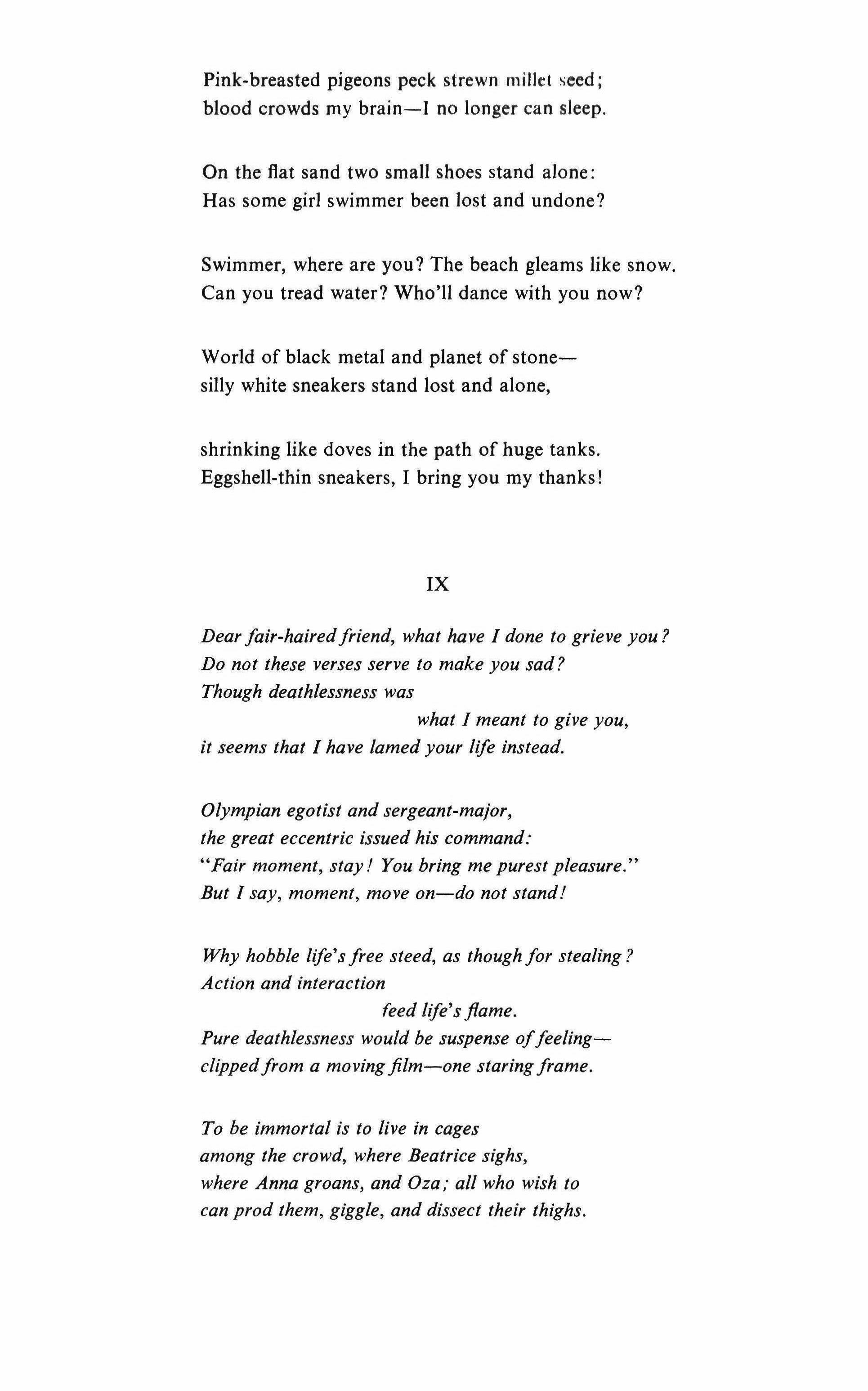
Dear fair-hairedfriend, what have I done to grieve you?
Do not these verses serve to make you sad? Though deathlessness was what I meant to give you, it seems that I have lamed your life instead.
Olympian egotist and sergeant-major, the great eccentric issued his command: "Fair moment, stay! You bring me purest pleasure." But I say, moment, move on-do not stand!
Why hobble life'sfree steed, as thoughfor stealing? Action and interaction feed life'sflame. Pure deathlessness would be suspense offeelingclippedfrom a movingfilm-one staringframe.
To be immortal is to live in cages among the crowd, where Beatrice sighs, where Anna groans, and Oza; all who wish to can prod them, giggle, and dissect their thighs.
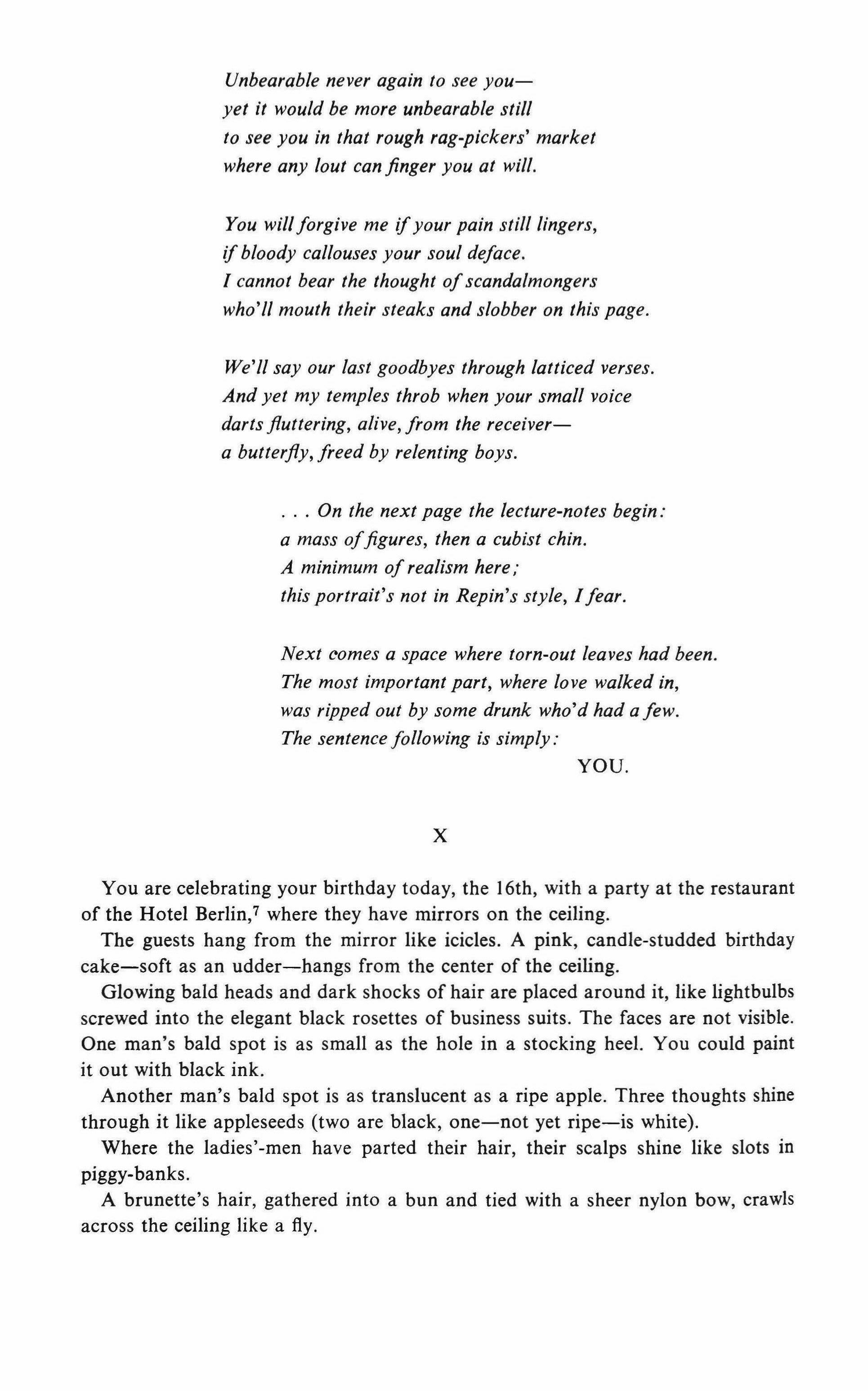
Unbearable never again to see youyet it would be more unbearable still to see you in that rough rag-pickers' market where any lout can finger you at will.
You willforgive me ifyour pain still lingers, ifbloody callouses your soul deface. I cannot bear the thought ofscandalmongers who'll mouth their steaks and slobber on this page.
We'll say our last goodbyes through latticed verses. And yet my temples throb when your small voice darts fluttering, alive, from the receivera butterfly, freed by relenting boys
On the next page the lecture-notes begin,' a mass offigures, then a cubist chin.
A minimum of realism here; this portrait's not in Repin's style, Ifear.
Next comes a space where torn-out leaves had been. The most important part, where love walked in, was ripped out by some drunk who'd had a few. The sentence following is simply,' YOU. x
You are celebrating your birthday today, the 16th, with a party at the restaurant of the Hotel Berlin," where they have mirrors on the ceiling. The guests hang from the mirror like icicles. A pink, candle-studded birthday cake-soft as an udder-hangs from the center of the ceiling.
Glowing bald heads and dark shocks of hair are placed around it, like lightbulbs screwed into the elegant black rosettes of business suits. The faces are not visible. One man's bald spot is as small as the hole in a stocking heel. You could paint it out with black ink.
Another man's bald spot is as translucent as a ripe apple. Three thoughts shine through it like appleseeds (two are black, one-not yet ripe-is white).
Where the ladies'-men have parted their hair, their scalps shine like slots in piggy-banks.
A brunette's hair, gathered into a bun and tied with a sheer nylon bow, crawls across the ceiling like a fly.
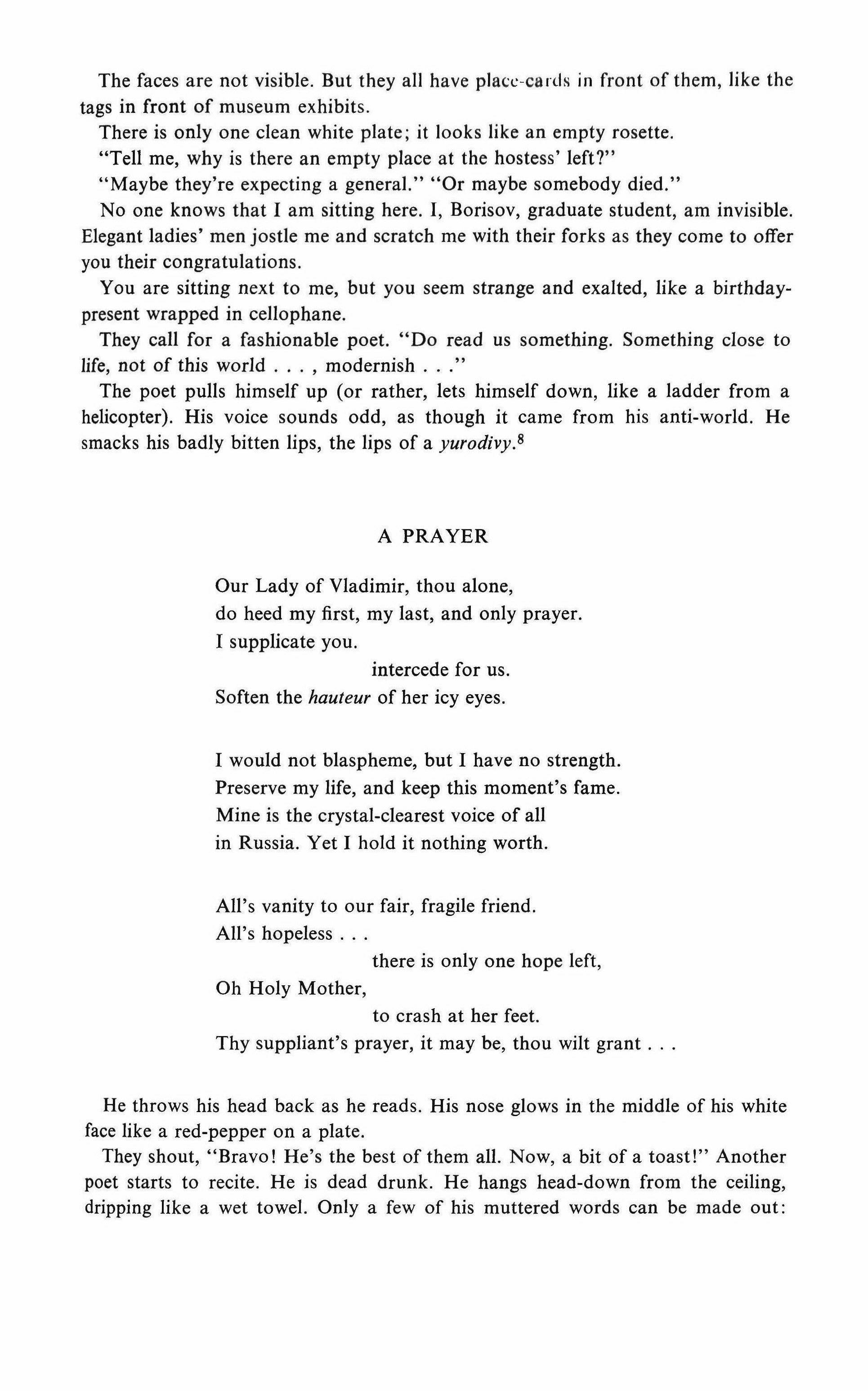
The faces are not visible. But they all have place-cards in front of them, like the tags in front of museum exhibits.
There is only one clean white plate; it looks like an empty rosette.
"Tell me, why is there an empty place at the hostess' left?"
"Maybe they're expecting a general." "Or maybe somebody died."
No one knows that I am sitting here. I, Borisov, graduate student, am invisible. Elegant ladies' men jostle me and scratch me with their forks as they come to offer you their congratulations.
You are sitting next to me, but you seem strange and exalted, like a birthdaypresent wrapped in cellophane.
They call for a fashionable poet. "Do read us something. Something close to life, not of this world modernish
The poet pulls himself up (or rather, lets himself down, like a ladder from a helicopter). His voice sounds odd, as though it came from his anti-world. He smacks his badly bitten lips, the lips of a yurodivy.i
Our Lady of Vladimir, thou alone, do heed my first, my last, and only prayer. I supplicate you. intercede for us.
Soften the hauteur of her icy eyes.
I would not blaspheme, but I have no strength. Preserve my life, and keep this moment's fame. Mine is the crystal-clearest voice of all in Russia. Yet I hold it nothing worth.
All's vanity to our fair, fragile friend. All's hopeless
there is only one hope left, Oh Holy Mother, to crash at her feet.
Thy suppliant's prayer, it may be, thou wilt grant
He throws his head back as he reads. His nose glows in the middle of his white face like a red-pepper on a plate.
They shout, "Bravo! He's the best of them all. Now, a bit of a toast!" Another poet starts to recite. He is dead drunk. He hangs head-down from the ceiling, dripping like a wet towel. Only a few of his muttered words can be made out:
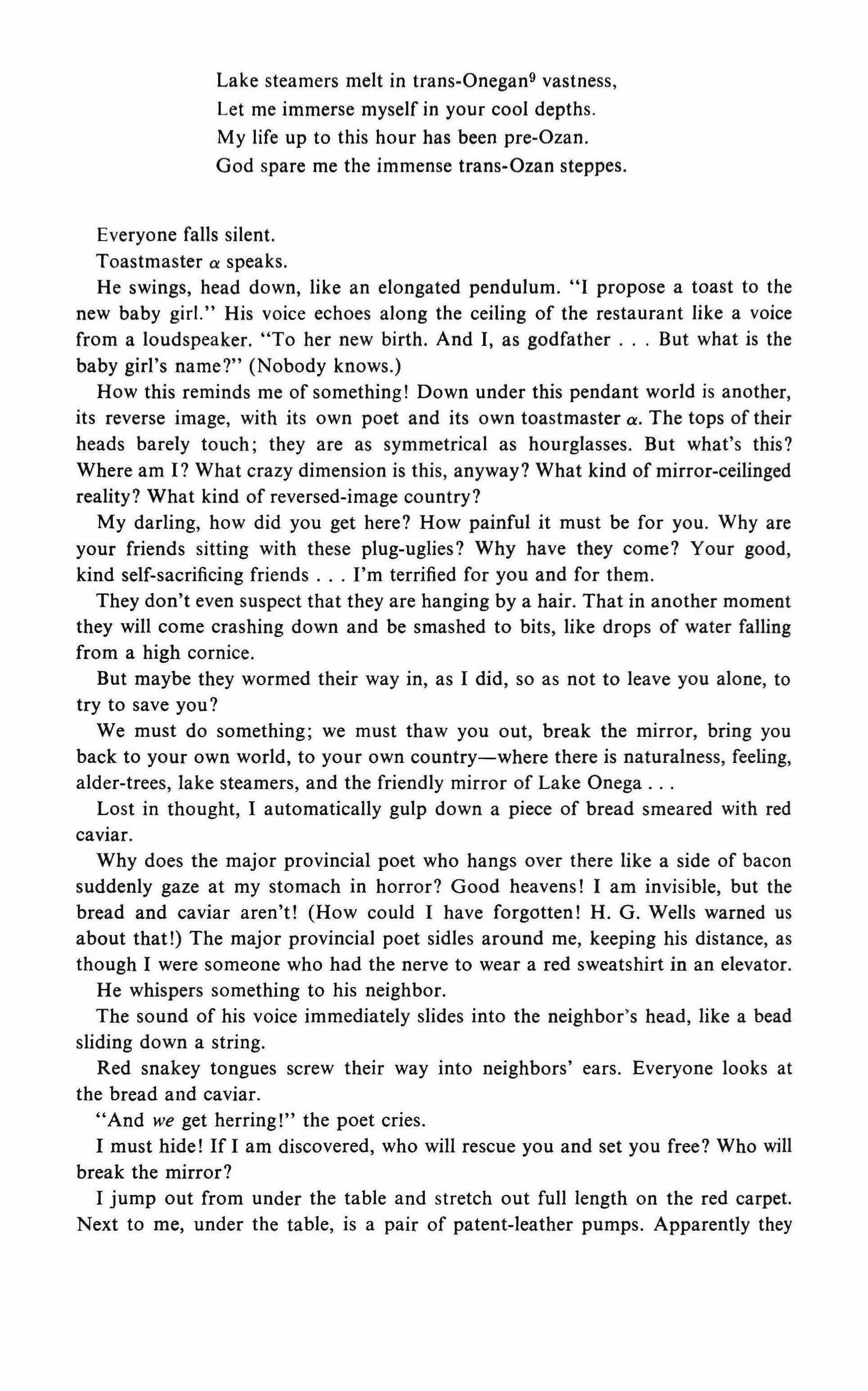
Lake steamers melt in trans-Onegan'' vastness, Let me immerse myself in your cool depths. My life up to this hour has been pre-Ozan. God spare me the immense trans-Ozan steppes.
Everyone falls silent.
Toastmaster a speaks.
He swings, head down, like an elongated pendulum. "I propose a toast to the new baby girl." His voice echoes along the ceiling of the restaurant like a voice from a loudspeaker. "To her new birth. And I, as godfather But what is the baby girl's name?" (Nobody knows.)
How this reminds me of something! Down under this pendant world is another, its reverse image, with its own poet and its own toastmaster a. The tops of their heads barely touch; they are as symmetrical as hourglasses. But what's this? Where am I? What crazy dimension is this, anyway? What kind of mirror-ceilinged reality? What kind of reversed-image country?
My darling, how did you get here? How painful it must be for you. Why are your friends sitting with these plug-uglies? Why have they come? Your good, kind self-sacrificing friends I'm terrified for you and for them.
They don't even suspect that they are hanging by a hair. That in another moment they will come crashing down and be smashed to bits, like drops of water falling from a high cornice.
But maybe they wormed their way in, as I did, so as not to leave you alone, to try to save you?
We must do something; we must thaw you out, break the mirror, bring you back to your own world, to your own country-where there is naturalness, feeling, alder-trees, lake steamers, and the friendly mirror of Lake Onega
Lost in thought, I automatically gulp down a piece of bread smeared with red caviar.
Why does the major provincial poet who hangs over there like a side of bacon suddenly gaze at my stomach in horror? Good heavens! I am invisible, but the bread and caviar aren't! (How could I have forgotten! H. G. Wells warned us about that!) The major provincial poet sidles around me, keeping his distance, as though I were someone who had the nerve to wear a red sweatshirt in an elevator. He whispers something to his neighbor.
The sound of his voice immediately slides into the neighbor's head, like a bead sliding down a string.
Red snakey tongues screw their way into neighbors' ears. Everyone looks at the bread and caviar.
"And we get herring!" the poet cries.
I must hide! If I am discovered, who will rescue you and set you free? Who will break the mirror?
I jump out from under the table and stretch out full length on the red carpet. Next to me, under the table, is a pair of patent-leather pumps. Apparently they
were hurting someone's feet. The left shoe is lying on its side close to its mate.
(How this reminds me of something!) They ask you to sing
The dancing begins. Shoe-soles! More shoe-soles! The first pair makes a crunching noise as it scrapes over me. Why are all the men shod in iron? Next to me someone stamps on those empty patent-leather pumps. A woman's heels, like a sewingmachine, stitch the skin across my face. But please! Not my eyes!
I remember everything. Robots! Robots! Robots!
Darling, are you only a dream?
"But what is the new baby girl's name?" the toastmaster shouts. "Zoya," I roar, "Zoya!"
But perhaps her name is Oza?
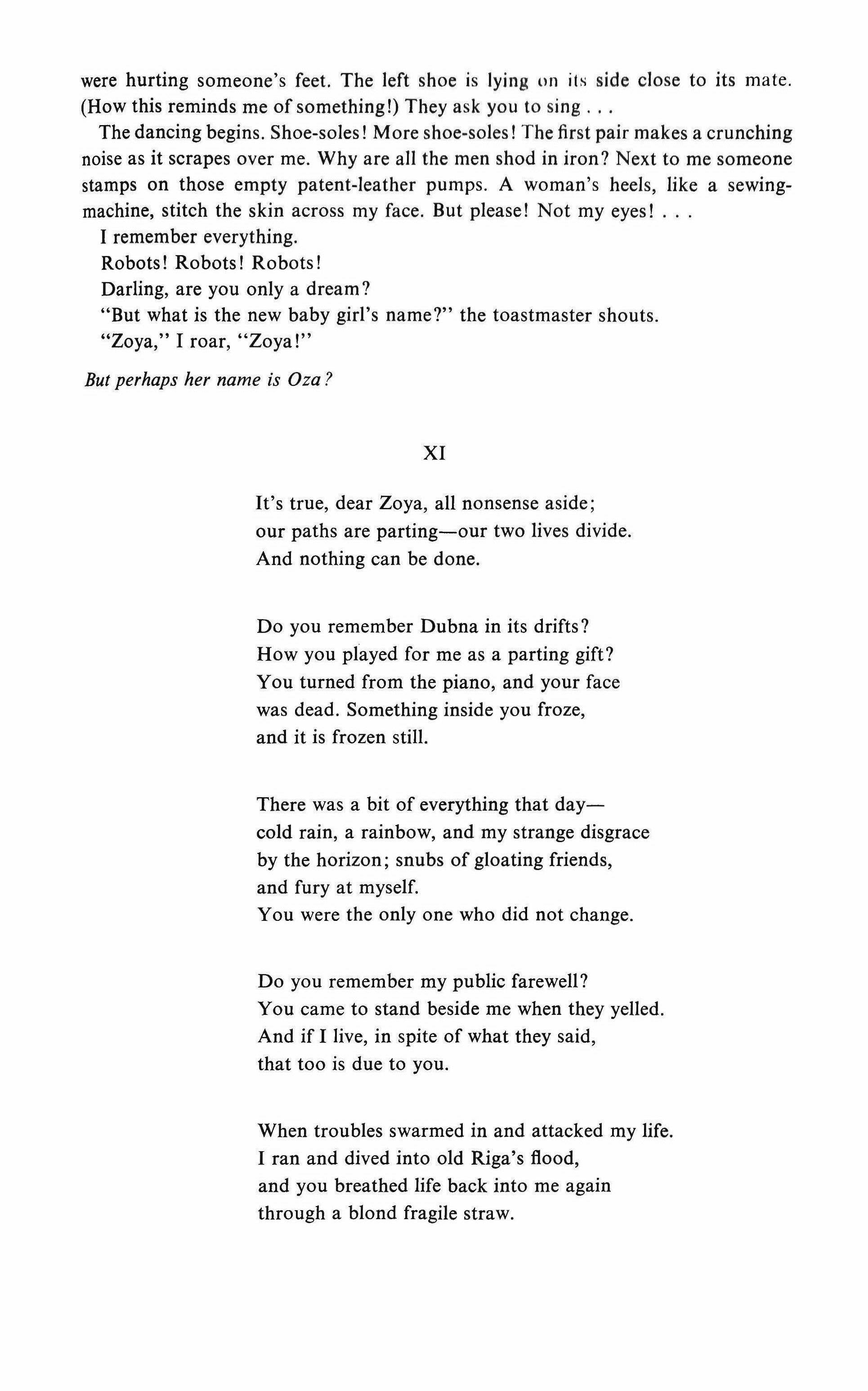
It's true, dear Zoya, all nonsense aside; our paths are parting-our two lives divide. And nothing can be done.
Do you remember Dubna in its drifts? How you played for me as a parting gift? You turned from the piano, and your face was dead. Something inside you froze, and it is frozen still.
There was a bit of everything that daycold rain, a rainbow, and my strange disgrace by the horizon; snubs of gloating friends, and fury at myself.
You were the only one who did not change.
Do you remember my public farewell? You came to stand beside me when they yelled. And if I live, in spite of what they said, that too is due to you.
When troubles swarmed in and attacked my life. I ran and dived into old Riga's flood, and you breathed life back into me again through a blond fragile straw.
Kilometers cannot divide our lives; they bring us closer, like high-tension wireswhich makes it all the more absurd when millimeters lever us apart.
If misery brings people into touch, then 1 will make a friend of misery. Perhaps my woes will break away from me to canter after you.
They who would save us are themselves unsaved. However full our cup of suffering, the quintessential question still remains: how can I bring you through?
Is it you, Zoya, who have changed-or I? The shape of what we were in those bright years flaps sadly after us. Bitter but true: our time has come But we must now return to where we left the poem.
Some experimental physicist has poured this nuclear installation out of a devil's pepper-pot. I can't stand the competition. To hell with the cyclotrons!
"Technology is good when good men use itbut what if the men who use it are not good?

I curse you, megalopolis of the programmed beast.
I curse myself, because I took pride in celebrating your downfall.
The world isn't rubbish under an auctioneer's hammer. I am Andrei, not the name of some river. All progress is reactionary ifpeople collapse under it.
You can't buy us with brittle toys and wind-up nightingales / The main thing in life is to be humanto know joy, beauty, sorrow.
Oh my country, beauty's motherland, homeland ofRublyov, ofBlok, and Leninwhere snow is stupefying in its whiteness. No destiny is higher than to bring salvation to the world!
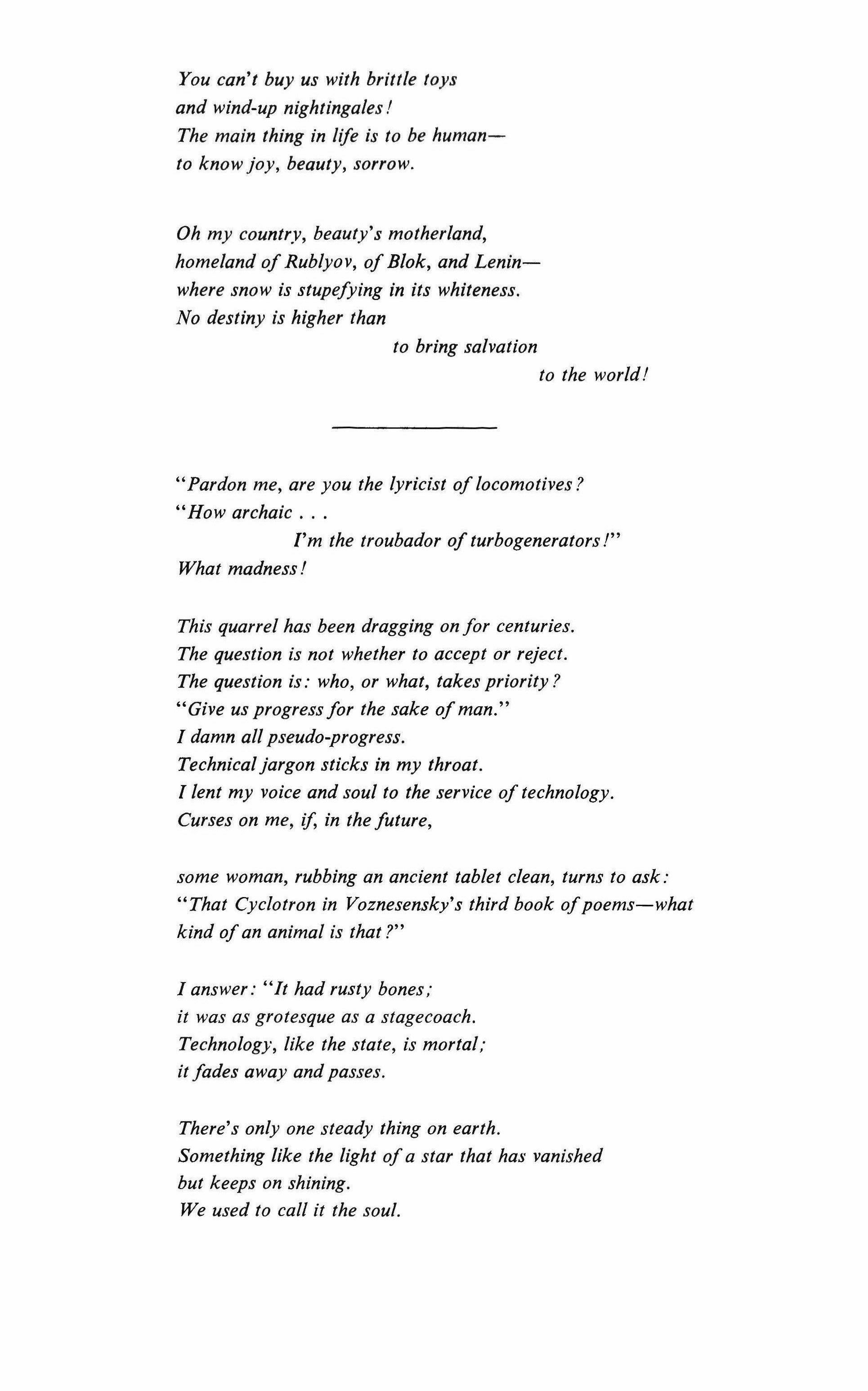
"Pardon me, are you the lyricist of locomotives?
"How archaic
I'm the troubador ofturbogenerators I"
What madness /
This quarrel has been dragging on for centuries. The question is not whether to accept or reject. The question is: who, or what, takes priority?
"Give us progressfor the sake ofman."
I damn all pseudo-progress.
Technicaljargon sticks in my throat. llent my voice and soul to the service oftechnology. Curses on me, if, in the future,
some woman, rubbing an ancient tablet clean, turns to ask: "That Cyclotron in Voznesensky's third book ofpoems-what kind of an animal is that ?"
I answer: "It had rusty bones; it was as grotesque as a stagecoach. Technology, like the state, is mortal; it fades away and passes.
There's only one steady thing on earth. Something like the light of a star that has vanished but keeps on shining. We used to call it the soul.
Though we melt away, we shall stand again in some pineforest-it doesn't matter where.
What's important is to live a life as crystal-clear as the forest after morningfrost. Bushes ring their frozen berries. I shall not die while that sound lasts."
A woman thinks: "That's strange! I remember the Dubna of snow and bonfiresfingers redfrom skiing. Cold piano-keys.
What has happened to Zoya?"That physicist oflong ago? Until we meet again! Again!
You seem strange, as though refracted through glass, yetfresh and radiant. The world is alive with sun andfrost.
Goodbye, Zoya.
Hello,Oza!

Goodbye, dark double ofanother's soul, diary abandoned in a hotel room. But why do I think ofyou late at night, toward morning, when my head throbs in my hands.
Your naivete, though strange and comical, has stirred the furthest layers of my soul.
Forgive these scratchings of a poet's pen. To touch another's life is no light thingto live his nightmares and anxieties. But let that be. They want the galley proofs.
Perhaps the diary's owner, full ofpain and incoherent, will now claim his whelp. Diary, I have changed nothing in your text-« just changed her name to Zoya. XIV
I STOOD ON THE PORCH BRUSHING THE SNOW FROM MY SKIS. I LOOKED UP.
A JET WAS PASSING OVERHEAD. AND BEHIND IT
FLEW ITS LAGGING SOUND, HUGE AND SQUARE, LIKE A BARGE TOWED BEHIND A TUGBOAT.
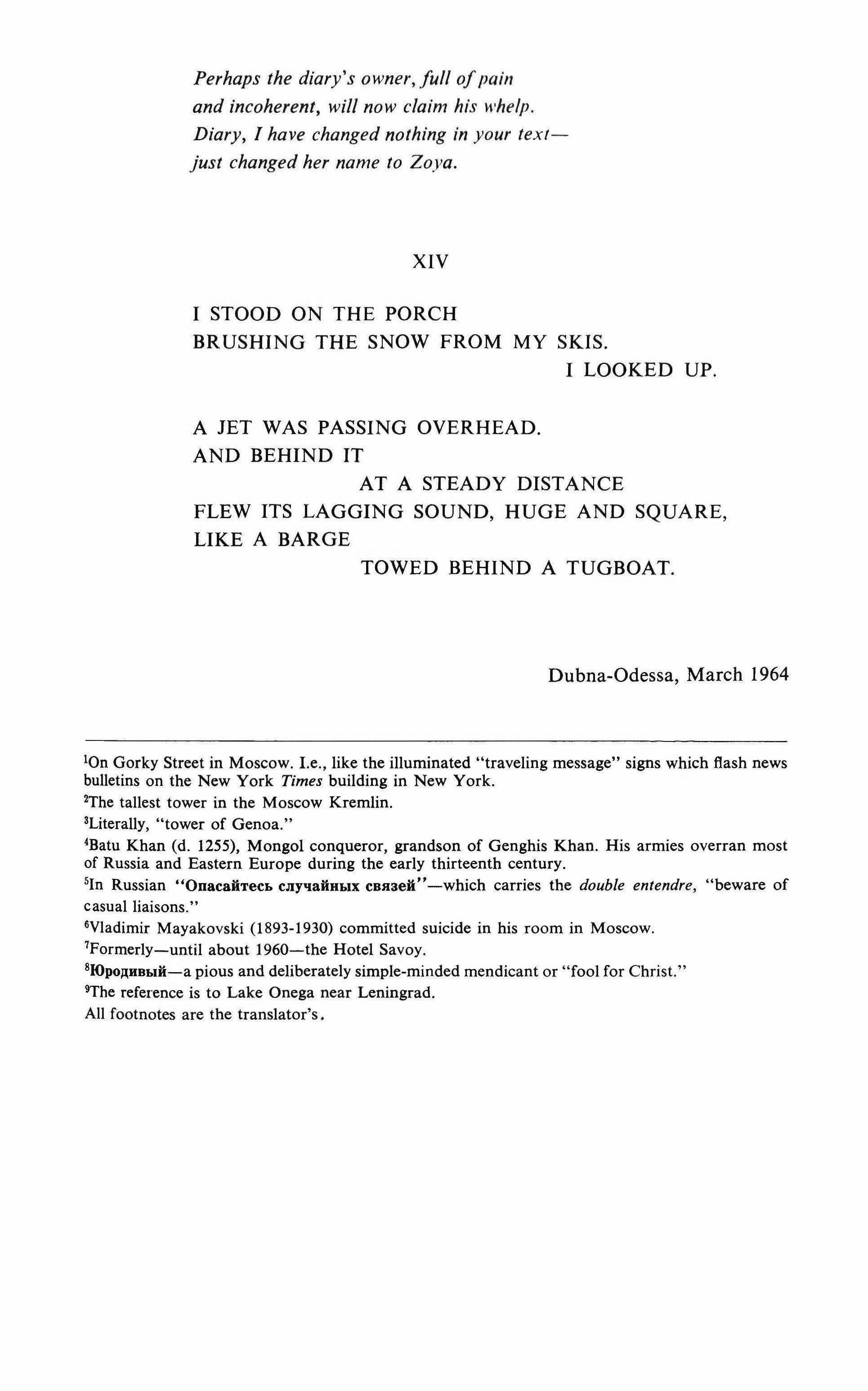
Dubna-Odessa, March 1964
IOn Gorky Street in Moscow. I.e., like the illuminated "traveling message" signs which flash news bulletins on the New York Times building in New York.
2The tallest tower in the Moscow Kremlin.
3Literally, "tower of Genoa."
4Batu Khan (d. 1255), Mongol conqueror, grandson of Genghis Khan. His armies overran most of Russia and Eastern Europe during the early thirteenth century.
SIn Russian "Onaeaarees CJIY'IaiiHbIX cBH3eii"-which carries the double entendre, "beware of casual liaisons."
6Yladimir Mayakovski (1893-1930) committed suicide in his room in Moscow.
7Pormerly-until about 1960-the Hotel Savoy.
8IOpo�HBblii-a pious and deliberately simple-minded mendicant or "fool for Christ."
9'fhe reference is to Lake Onega near Leningrad. All footnotes are the translator's.
It almost cannot be, for you were always there: Beneath the blessed limes; in hospital; in prison; In the blockade; where luscious grass had risen; With wicked birds, and water, spreading fear. How it all changed! But you were always there. And now it seems that half my soul is lost,The one that had been you,-in it I knew the reason For something main, essential: it has gone, I've suddenly forgotten what it was But your clear voice is calling me from yonder, Bidding me not to grieve, to wait for death, for wonder. Well, I shall try
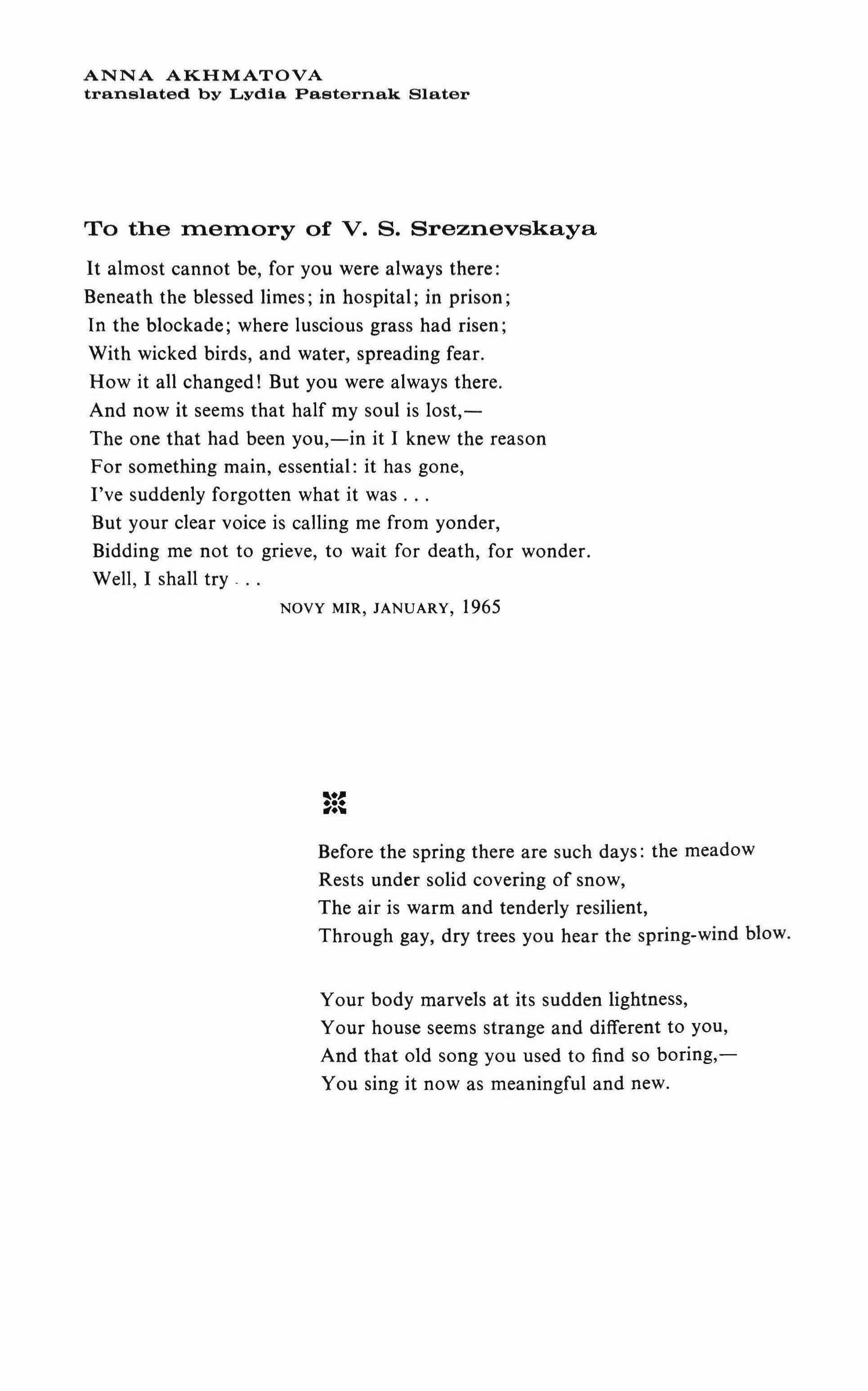
Before the spring there are such days: the meadow Rests under solid covering of snow, The air is warm and tenderly resilient, Through gay, dry trees you hear the spring-wind blow.
Your body marvels at its sudden lightness, Your house seems strange and different to you, And that old song you used to find so boring,You sing it now as meaningful and new.

IN NATURAL SCIENCE the barbaric structures of Stalinism have been crumbling more rapidly and completely than in any other area of Soviet life, and understandably so. Nowhere else has the essential contradiction of Stalinism-tyrannizing passion parading as liberating rationality-been more obvious and intolerable. One might therefore expect that Soviet liberals would favor this area for analysis and denunciation of Stalinism, but here as elsewhere public discussion is severely limited. Since every scientist over forty was involved in Stalinism, free public discussion of the past would be a storm of recrimination, possibly cleansing but certainly destructive. So a mannered silence prevails, as battered people of the crumbling past combine with new men to build post-Stalinist science.
The outside observer, picking through the massive public record of Soviet science, can discover much about the rise and fall of institutions and patterns of thought, but he is initially frustrated in his search for individual feelings. Through twenty-five years of unexampled tyranny (1929-53) scientists and technicians labored to transform Russia from one of the more backward states-something like contemporary Brazil in its relative level of industrialization-into the second industrial power of the world. One would like to know what was in their hearts, what portions of selfcentered philistinism, fearful obedience, tormented hope (and hope for what?) kept them at their work. But where can one find reliable evidence?
Literary artists and journalists provide some evidence. They have portrayed many scientists; as cartoons, to be sure, rather than fully realized, credible individuals, but this should not put us off. Literary cartoons-Max Weber might call them ideal types-express the wishes and fears of the audience for which they are created, in this case the Party bosses' wishes and fears with respect to their scientific specialists. Since Stalin died cartoon portraits of scientists occasionally express the wishes and fears of liberals. For the liberals as for Stalinists the central preoccupation has been the problem ofloyal service. In the characteristic Stalinist tale the stubborn old scientist is gradually brought to realize that the Party bosses have a better understanding of his problems than he does, for they see "the larger picture." In
TRI-QUARTERLY 1119
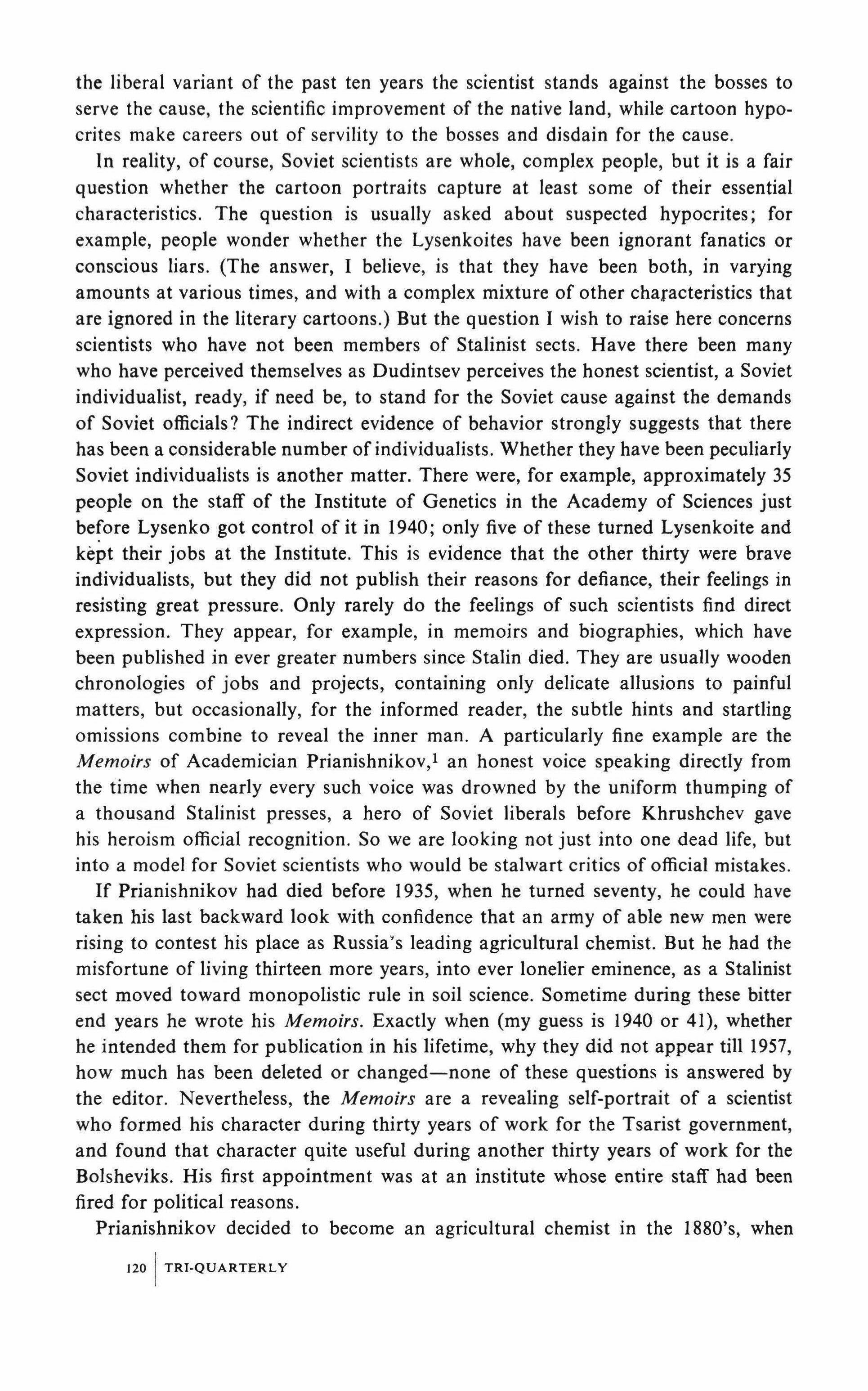
the liberal variant of the past ten years the scientist stands against the bosses to serve the cause, the scientific improvement of the native land, while cartoon hypocrites make careers out of servility to the bosses and disdain for the cause.
In reality, of course, Soviet scientists are whole, complex people, but it is a fair question whether the cartoon portraits capture at least some of their essential characteristics. The question is usually asked about suspected hypocrites; for example, people wonder whether the Lysenkoites have been ignorant fanatics or conscious liars. (The answer, I believe, is that they have been both, in varying amounts at various times, and with a complex mixture of other characteristics that are ignored in the literary cartoons.) But the question I wish to raise here concerns scientists who have not been members of Stalinist sects. Have there been many who have perceived themselves as Dudintsev perceives the honest scientist, a Soviet individualist, ready, if need be, to stand for the Soviet cause against the demands of Soviet officials? The indirect evidence of behavior strongly suggests that there has been a considerable number of individualists. Whether they have been peculiarly Soviet individualists is another matter. There were, for example, approximately 35 people on the staff of the Institute of Genetics in the Academy of Sciences just be�ore Lysenko got control of it in 1940; only five of these turned Lysenkoite and kept their jobs at the Institute. This is evidence that the other thirty were brave individualists, but they did not publish their reasons for defiance, their feelings in resisting great pressure. Only rarely do the feelings of such scientists find direct expression. They appear, for example, in memoirs and biographies, which have been published in ever greater numbers since Stalin died. They are usually wooden chronologies of jobs and projects, containing only delicate allusions to painful matters, but occasionally, for the informed reader, the subtle hints and startling omissions combine to reveal the inner man. A particularly fine example are the Memoirs of Academician Prianishnikov.! an honest voice speaking directly from the time when nearly every such voice was drowned by the uniform thumping of a thousand Stalinist presses, a hero of Soviet liberals before Khrushchev gave his heroism official recognition. So we are looking not just into one dead life, but into a model for Soviet scientists who would be stalwart critics of official mistakes. If Prianishnikov had died before 1935, when he turned seventy, he could have taken his last backward look with confidence that an army of able new men were rising to contest his place as Russia's leading agricultural chemist. But he had the misfortune of living thirteen more years, into ever lonelier eminence, as a Stalinist sect moved toward monopolistic rule in soil science. Sometime during these bitter end years he wrote his Memoirs. Exactly when (my guess is 1940 or 41), whether he intended them for publication in his lifetime, why they did not appear till 1957, how much has been deleted or changed-none of these questions is answered by the editor. Nevertheless, the Memoirs are a revealing self-portrait of a scientist who formed his character during thirty years of work for the Tsarist government, and found that character quite useful during another thirty years of work for the Bolsheviks. His first appointment was at an institute whose entire staff had been fired for political reasons.
Prianishnikov decided to become an agricultural chemist in the 1880's, when

the tsarist government was avenging the assassination of Alexander II by attempting to undo his reforms. The Petrovskaia Agricultural Academy, which had been established along with the zemstvos to train the specialists they would need for the modernization of Russian agriculture, was closed, just as Prianishnikov completed his graduate work there and set off for two years of study in Western Europe. Like the zemstvos the Academy had annoyed the government by becoming a center of liberal and populist agitation. But in 1892, when Prianishnikov returned to Russia, a great crop failure and famine had taught even the most retrograde officials the necessity of pressing ahead with modernization. They decided to revive a center of higher education in the agricultural sciences, but in such a manner as to prevent it from becoming again a hotbed of radicalism. The Moscow Agricultural Institute, as the new school in the old buildings was to be called, would admit no Jews, no women, and no men except landowners' sons who could pay their fees six months in advance. And none of the former staff of the defunct Petrovskaia Academy was to be hired by the new Institute. Their jobs were offered to new men, including Prianishnikov, age 29.
He remembers this as a moment of painful choice, whether to take a post vacated by political repression, or to renounce work at the center of agricultural education and research. He asked the advice of the old man of Russian agronomy, I. A. Stebut, who answered with a proverb: Peremeietsia, muka budet; When it's all ground up there'll be flour. (Or, to paraphrase the English grunt of acquiescence in superior force: When the eggs are broken there'll be an omelet.) Prianishnikov does not try to analyze the rule of conduct implicit in this proverb, which is ambiguous. It implies either the fatalistic view that we should acquiesce in forcefuljustice because it is unavoidable and may produce some good, or the pragmatic view that we should acquisece only so long as forceful injustice does produce good-until ground glass appears in the flour, never mind a little blood or ground bones. Either way the proverb rejects the rebellious view that injustice should always be actively opposed. Prianishnikov was not given to philosophical flights. He notes simply that he accepted Stebut's advice, accepted the job as teacher and research scientist, and time and again refused to accept administrative posts that would place him between the repressive government and the academic community. When the Revolution of 1905 gave professors the right to elect their academic officials, he is proud to say that he was the Institute's first choice as Director, but he turned down the corrupting honor. Without saying so directly, by a number of such anecdotes he reveals that he wanted to be neither an agent of authority nor a rebel against it; he wanted to be a chemist, helping to modernize Russian agriculture by research and teaching. Obviously these are the memoirs of a scientist with moral sensitivity, though not given to much reflection on moral problems. We read forward eagerly to see how he reacted to the shocks and trials of the Bolshevik Revolution. And just there the memoirs peter out in reticent fragments. He was elected Director in 1916, and this time accepted, in order to save the Institute from a proposal to submerge it in a polytechnical school. He describes repeated trips to the Department of Agriculture in Petrograd, where he saw great public joy at the fall of the Tsar in February, 1917, but none in the months that followed. His tiny vignettes recall
TRI-QUARTERLy 1121
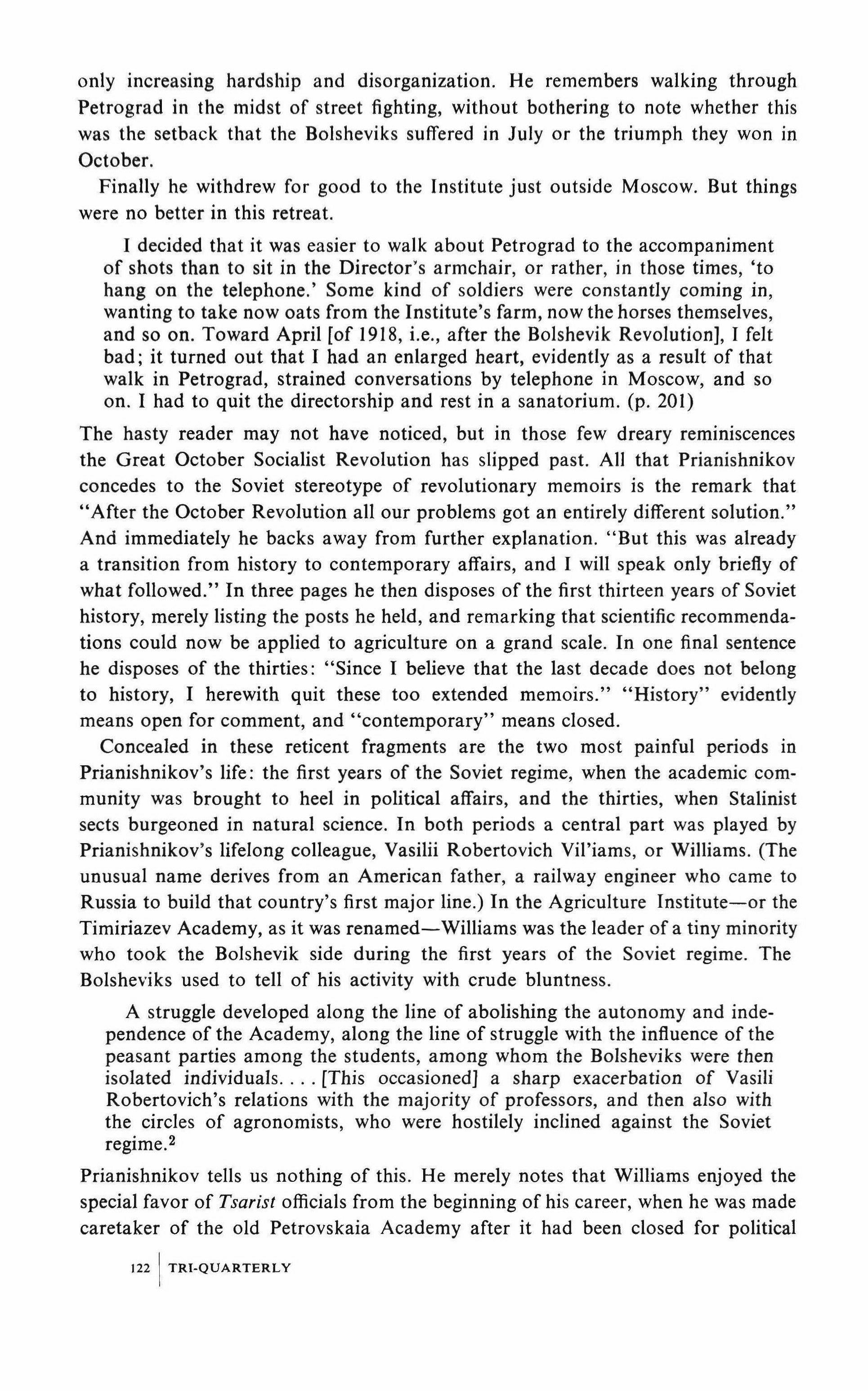
only increasing hardship and disorganization. He remembers walking through Petrograd in the midst of street fighting, without bothering to note whether this was the setback that the Bolsheviks suffered in July or the triumph they won in October.
Finally he withdrew for good to the Institute just outside Moscow. But things were no better in this retreat.
I decided that it was easier to walk about Petrograd to the accompaniment of shots than to sit in the Director's armchair, or rather, in those times, 'to hang on the telephone.' Some kind of soldiers were constantly coming in, wanting to take now oats from the Institute's farm, now the horses themselves, and so on. Toward April [of 1918, i.e., after the Bolshevik Revolution], I felt bad; it turned out that I had an enlarged heart, evidently as a result of that walk in Petrograd, strained conversations by telephone in Moscow, and so on. I had to quit the directorship and rest in a sanatorium. (p. 201)
The hasty reader may not have noticed, but in those few dreary reminiscences the Great October Socialist Revolution has slipped past. All that Prianishnikov concedes to the Soviet stereotype of revolutionary memoirs is the remark that "After the October Revolution all our problems got an entirely different solution." And immediately he backs away from further explanation. "But this was already a transition from history to contemporary affairs, and I will speak only briefly of what followed." In three pages he then disposes of the first thirteen years of Soviet history, merely listing the posts he held, and remarking that scientific recommendations could now be applied to agriculture on a grand scale. In one final sentence he disposes of the thirties: "Since I believe that the last decade does not belong to history, I herewith quit these too extended memoirs." "History" evidently means open for comment, and "contemporary" means closed.
Concealed in these reticent fragments are the two most painful periods in Prianishnikov's life: the first years of the Soviet regime, when the academic community was brought to heel in political affairs, and the thirties, when Stalinist sects burgeoned in natural science. In both periods a central part was played by Prianishnikov's lifelong colleague, Vasilii Robertovich ViI'iams, or Williams. (The unusual name derives from an American father, a railway engineer who came to Russia to build that country's first major line.) In the Agriculture Institute-or the Timiriazev Academy, as it was renamed-Williams was the leader of a tiny minority who took the Bolshevik side during the first years of the Soviet regime. The Bolsheviks used to tell of his activity with crude bluntness.
A struggle developed along the line of abolishing the autonomy and independence of the Academy, along the line of struggle with the influence of the peasant parties among the students, among whom the Bolsheviks were then isolated individuals [This occasioned] a sharp exacerbation of Vasili Robertovich's relations with the majority of professors, and then also with the circles of agronomists, who were hostilely inclined against the Soviet regime.!
Prianishnikov tells us nothing of this. He merely notes that Williams enjoyed the special favor of Tsarist officials from the beginning of his career, when he was made caretaker of the old Petrovskaia Academy after it had been closed for political 122 [ TRI-QUARTERLY

reasons. To the knowledgeable Soviet reader the suggestion of unprincipled careerism is clear enough.
Williams became the Bolsheviks' favorite agricultural scientist; he even joined the Party. a rare, loudly celebrated action for an elderly scientist in the twenties. But while he was their darling for political reasons from the earliest period of the Revolution, his eccentric views on soil science and crop rotation did not win strong Bolshevik support until the mid-thirties, when Williams was already in his seventies and close to death. At that time his obsession with soil structure and grasses was made official doctrine, and Prianishnikov, who had learned to live under Williams' political domination in the first years of the Soviet regime, was required to acquiesce in the domination of Williams' science. This he refused to do.
Only the briefest sketch of the scientific and agricultural issues is possible here. Williams was a relic of a bygone age in scientific agriculture, when so many basic questions were not answered, or not even clearly formulated, that men vacillated between speculative system-building and a narrow reliance on the experience of farmers. Williams was a system-builder, who made crumbly soil structure the essential determinant of fertility and grass the essential agent of that structure. To sustain these views he fashioned a grandiose evolutionary theory, "a single system of soil formation," which pictured tundra inevitably turning into forested podzol soils, and then into grassy chernozem, and then into desert solenetz. Except for a handful of students, who were charmed by his oratorical gifts, the scientific community refused to take him seriously, until the Bolshevik authorities gave his system their stamp of approval in the mid-thirties. Then a large number of soil scientists became Williams' admirers.
The new age in scientific agriculture, of which Prianishnikov was an outstanding pioneer, opened at the end of the nineteenth century, when a number of discoveries in plant physiology and soil science cohered into a commonly accepted, continuously developing body of knowledge with immensely beneficial applications in agriculture. The essential features of the new age were, on the level of science, sophisticated methods of chemical analysis, and on the level of agricultural application, rigorous statistical methods in the use of trial plots and careful marginal analysis of the costs and returns involved in the farmer's choices. The rising application of mineral fertilizers and the concomitant rise in yields are the most well-known measure of the new age. Between the 1880's and the 1930's average grain yields in the advanced countries of Western Europe trebled. During this period Russia was fairly advanced in agricultural science-her soil scientists were indeed regarded as the world leaders -and quite backward in agriculture itself. Officials and specialists kept arguing over the question how the farmers could be brought to apply modern methods. until Stalin attempted the final solution: forced collectivization, 1929-34.
In the course of this convulsive revolution from above, a number of modern cropping systems were hastily tried and hastily abandoned, until it became evident that the collective farm system fostered mechanization and a great increase in area of cultivation, but inhibited advanced agronomic techniques and a rise in yields per acre. The Bolshevik authorities could not see the matter that way. They had respectfully followed the advice of specialists like Prianishnikov, only to see average yields
TRI-QUARTERLY 1123
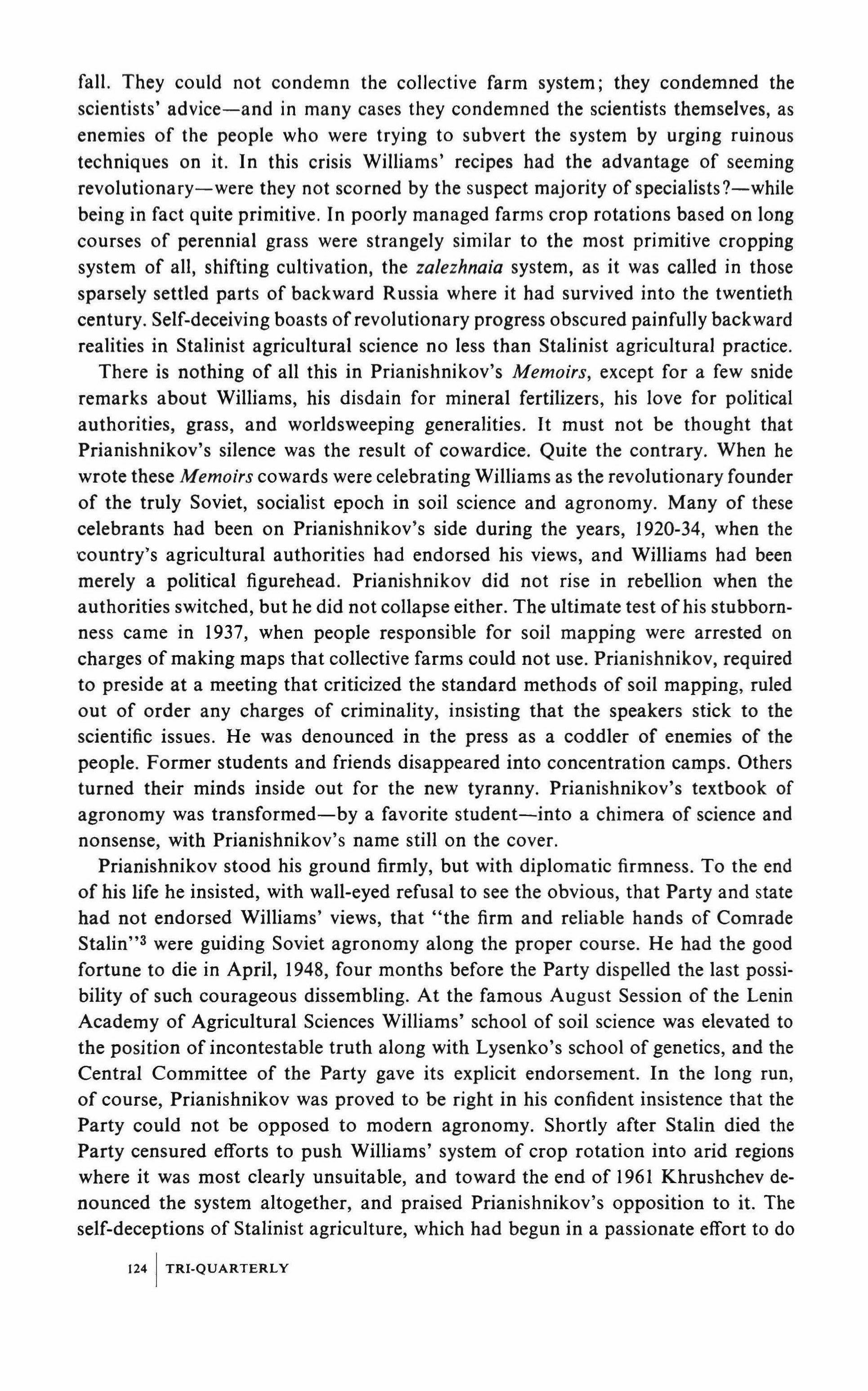
fall. They could not condemn the collective farm system; they condemned the scientists' advice-and in many cases they condemned the scientists themselves, as enemies of the people who were trying to subvert the system by urging ruinous techniques on it. In this crisis Williams' recipes had the advantage of seeming revolutionary-were they not scorned by the suspect majority of specialists ?-while being in fact quite primitive. In poorly managed farms crop rotations based on long courses of perennial grass were strangely similar to the most primitive cropping system of all, shifting cultivation, the zalezhnaia system, as it was called in those sparsely settled parts of backward Russia where it had survived into the twentieth century. Self-deceiving boasts of revolutionary progress obscured painfully backward realities in Stalinist agricultural science no less than Stalinist agricultural practice.
There is nothing of all this in Prianishnikov's Memoirs, except for a few snide remarks about Williams, his disdain for mineral fertilizers, his love for political authorities, grass, and worldsweeping generalities. It must not be thought that Prianishnikov's silence was the result of cowardice. Quite the contrary. When he wrote these Memoirs cowards were celebrating Williams as the revolutionary founder of the truly Soviet, socialist epoch in soil science and agronomy. Many of these celebrants had been on Prianishnikov's side during the years, 1920-34, when the 'Country's agricultural authorities had endorsed his views, and Williams had been merely a political figurehead. Prianishnikov did not rise in rebellion when the authorities switched, but he did not collapse either. The ultimate test ofhis stubbornness came in 1937, when people responsible for soil mapping were arrested on charges of making maps that collective farms could not use. Prianishnikov, required to preside at a meeting that criticized the standard methods of soil mapping, ruled out of order any charges of criminality, insisting that the speakers stick to the scientific issues. He was denounced in the press as a coddler of enemies of the people. Former students and friends disappeared into concentration camps. Others turned their minds inside out for the new tyranny. Prianishnikov's textbook of agronomy was transformed-by a favorite student-into a chimera of science and nonsense, with Prianishnikov's name still on the cover.
Prianishnikov stood his ground firmly, but with diplomatic firmness. To the end of his life he insisted, with wall-eyed refusal to see the obvious, that Party and state had not endorsed Williams' views, that "the firm and reliable hands of Comrade Stalin"3 were guiding Soviet agronomy along the proper course. He had the good fortune to die in April, 1948, four months before the Party dispelled the last possibility of such courageous dissembling. At the famous August Session of the Lenin Academy of Agricultural Sciences Williams' school of soil science was elevated to the position of incontestable truth along with Lysenko's school of genetics, and the Central Committee of the Party gave its explicit endorsement. In the long run, of course, Prianishnikov was proved to be right in his confident insistence that the Party could not be opposed to modern agronomy. Shortly after Stalin died the Party censured efforts to push Williams' system of crop rotation into arid regions where it was most clearly unsuitable, and toward the end of 1961 Khrushchev denounced the system altogether, and praised Prianishnikov's opposition to it. The self-deceptions of Stalinist agriculture, which had begun in a passionate effort to do 1241 TRI-QUARTERLY
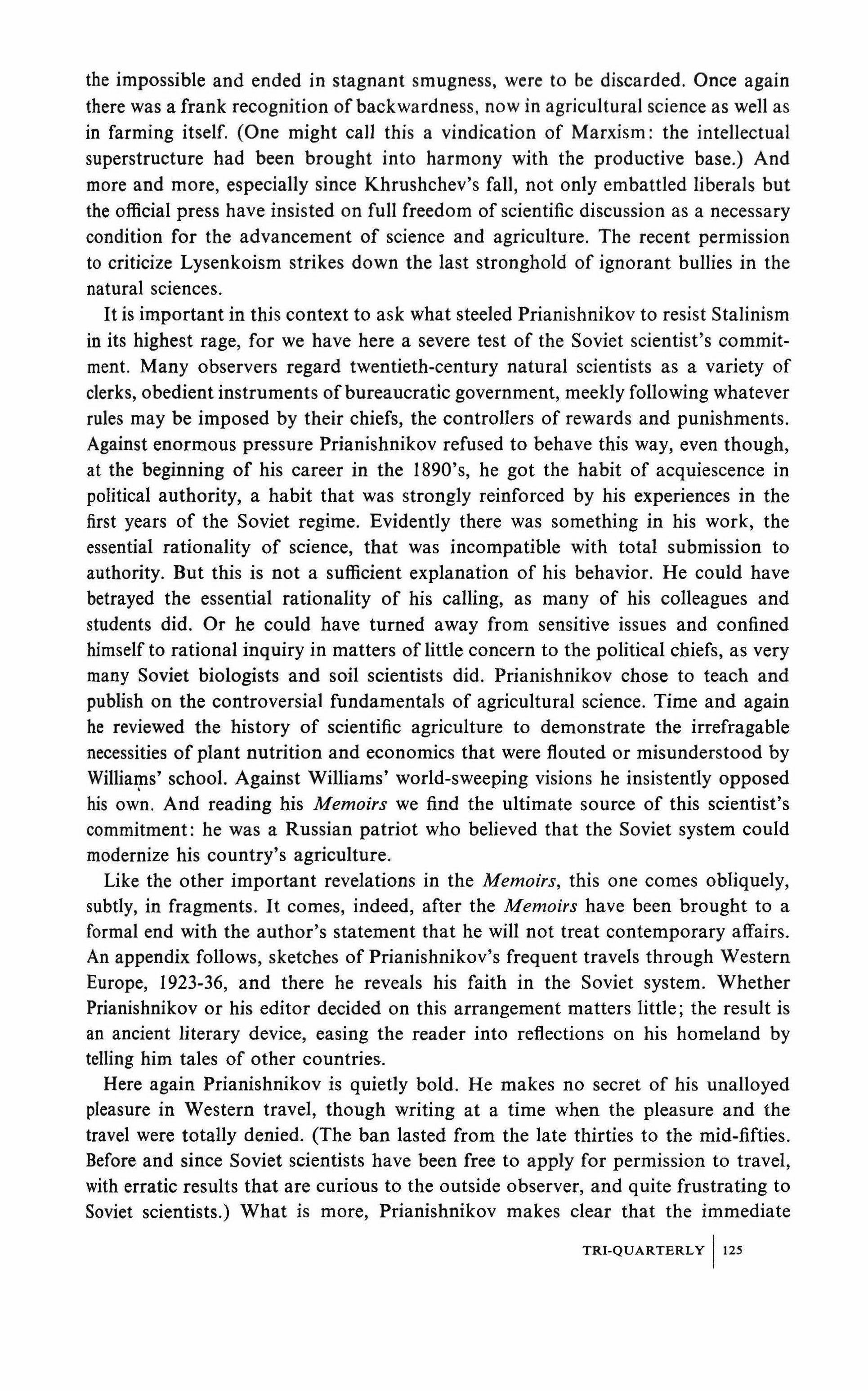
the impossible and ended in stagnant smugness, were to be discarded. Once again there was a frank recognition of backwardness, now in agricultural science as well as in farming itself. (One might call this a vindication of Marxism: the intellectual superstructure had been brought into harmony with the productive base.) And more and more, especially since Khrushchev's fall, not only embattled liberals but the official press have insisted on full freedom of scientific discussion as a necessary condition for the advancement of science and agriculture. The recent permission to criticize Lysenkoism strikes down the last stronghold of ignorant bullies in the natural sciences.
It is important in this context to ask what steeled Prianishnikov to resist Stalinism in its highest rage, for we have here a severe test of the Soviet scientist's commitment. Many observers regard twentieth-century natural scientists as a variety of clerks, obedient instruments ofbureaucratic government, meekly following whatever rules may be imposed by their chiefs, the controllers of rewards and punishments. Against enormous pressure Prianishnikov refused to behave this way, even though, at the beginning of his career in the 1890's, he got the habit of acquiescence in political authority, a habit that was strongly reinforced by his experiences in the first years of the Soviet regime. Evidently there was something in his work, the essential rationality of science, that was incompatible with total submission to authority. But this is not a sufficient explanation of his behavior. He could have betrayed the essential rationality of his calling, as many of his colleagues and students did. Or he could have turned away from sensitive issues and confined himself to rational inquiry in matters of little concern to the political chiefs, as very many Soviet biologists and soil scientists did. Prianishnikov chose to teach and publish on the controversial fundamentals of agricultural science. Time and again he reviewed the history of scientific agriculture to demonstrate the irrefragable necessities of plant nutrition and economics that were flouted or misunderstood by Williams' school. Against Williams' world-sweeping visions he insistently opposed his own. And reading his Memoirs we find the ultimate source of this scientist's commitment: he was a Russian patriot who believed that the Soviet system could modernize his country's agriculture.
Like the other important revelations in the Memoirs, this one comes obliquely, subtly, in fragments. It comes, indeed, after the Memoirs have been brought to a formal end with the author's statement that he will not treat contemporary affairs. An appendix follows, sketches of Prianishnikov's frequent travels through Western Europe, 1923-36, and there he reveals his faith in the Soviet system. Whether Prianishnikov or his editor decided on this arrangement matters little; the result is an ancient literary device, easing the reader into reflections on his homeland by telling him tales of other countries.
Here again Prianishnikov is quietly bold. He makes no secret of his unalloyed pleasure in Western travel, though writing at a time when the pleasure and the travel were totally denied. (The ban lasted from the late thirties to the mid-fifties. Before and since Soviet scientists have been free to apply for permission to travel, with erratic results that are curious to the outside observer, and quite frustrating to Soviet scientists.) What is more, Prianishnikov makes clear that the immediate TRI-QUARTERLY 1125

cause of pleasure in Western travel is the great abundance there of consumer goods, services, and lighthearted amusements
The life of Paris proves that a significant portion of its inhabitants have an enormous quantity of funds: how much meat and wine are required by the population of Paris for two consumptions a day (lunch and dinner) as an ordinary practice, not to mention the restaurants of various degrees, open till late at night; how many theaters with all the types transitional to variety shows, cabarets, and music halls, cinemas, often inundated with cascades of light, and an infinite quantity of cafes-just about at every step (pp. 250-51)
In context this is part of an argument that the niggardly French bourgeois adorn their private lives and starve the public cause, with the result that science is very poorly supported in France. Our lives, Prianishnikov suggests, are Spartan because we are engaged in basic investment for the future, and for the defense of our country right away. (The military usefulness of a great chemical industry, which can produce either nitrogenous fertilizers or explosives, is a recurrent theme in his works.) He refrains from direct justification of the Spartan regime at home, whether because it was officially disapproved or because he felt it could be communicated better by indirection. In either case, the message comes through convincingly, without cloying: heavy investment in science and the upbuilding of the homeland are worth the sacrifice in consumer goods and services.
One wonders how Prianishnikov could have been confident of the great upbuilding, for he saw how science was being repressed in favor of self-deceiving panaceas. The answer is probably that the panaceas never entirely destroyed his lifework or reversed the great upbuilding. Prianishnikov constantlypointed to the rise in application of mineral fertilizers as an index of the modernization of Russian agriculture, from near zero in prerevolutionary times to about five million tons at the end of his life. To be sure, they were inefficiently used, but he was free to point this out and argue for their effective use. As for modern crop rotations, however haltingly, they did make their way in the collectivized countryside. Indeed, the spread of grass cultivation is one index of this progress. Prerevolutionary Russia had only 2.5% of its cropland sown to grass, while the advanced countries of the West had between 10% and 50%, depending on the climate and the emphasis on stockbreeding. Williams was a crackpot not because he urged farmers to grow grass for fodder and soil improvement, but because he rejected the most sensible use of grass courses in crop rotations. (He insisted on long courses of true grasses instead of short courses of leguminous "grasses.") To the end of his life Prianishnikov kept reminding farmers of the sensible uses of grass, as he kept reminding scientists of basic truths in their field.
But if Prianishnikov could reassure himself that technical progress was being made, however inefficiently, and that natural science must ultimately win in the contest with pseudo-science because nature and economic necessity were on its side, what could he tell himself about the prospects for freedom, for elementary security of the person, for moral decency? His Memoirs of the prerevolutionary period show that he had moral sensitivity; he was not one of those smug philistines who see and hear no evil as long as it does not touch their own skins. Was he not disturbed by 1261 TRI-QUARTERLY
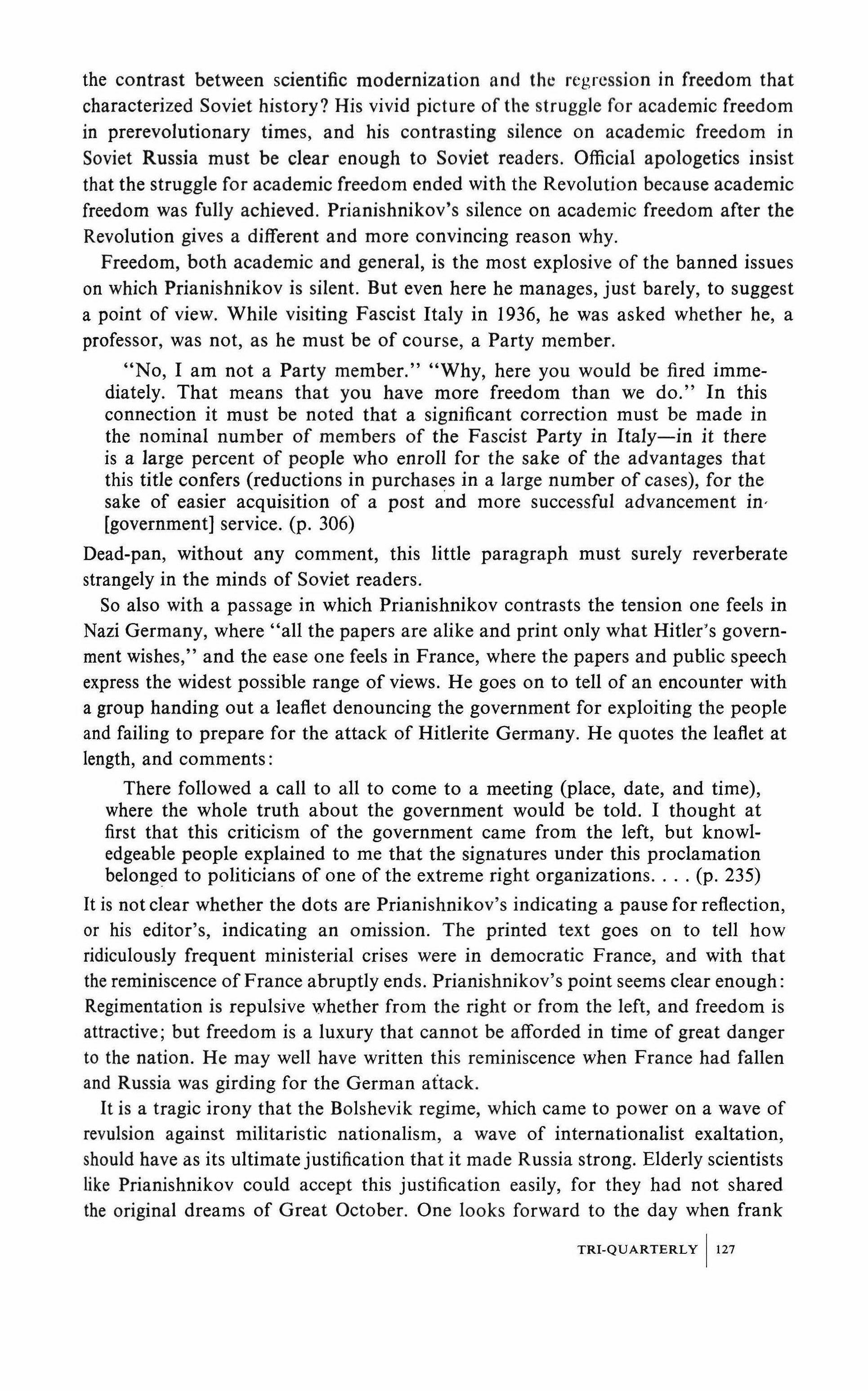
the contrast between scientific modernization and the regression in freedom that characterized Soviet history? His vivid picture of the struggle for academic freedom in prerevolutionary times, and his contrasting silence on academic freedom in Soviet Russia must be clear enough to Soviet readers. Official apologetics insist that the struggle for academic freedom ended with the Revolution because academic freedom was fully achieved. Prianishnikov's silence on academic freedom after the Revolution gives a different and more convincing reason why.
Freedom, both academic and general, is the most explosive of the banned issues on which Prianishnikov is silent. But even here he manages, just barely, to suggest a point of view. While visiting Fascist Italy in 1936, he was asked whether he, a professor, was not, as he must be of course, a Party member.
"No, I am not a Party member." "Why, here you would be fired immediately. That means that you have more freedom than we do." In this connection it must be noted that a significant correction must be made in the nominal number of members of the Fascist Party in Italy-in it there is a large percent of people who enroll for the sake of the advantages that this title confers (reductions in purchases in a large number of cases), for the sake of easier acquisition of a post and more successful advancement in' [government] service. (p. 306)
Dead-pan, without any comment, this little paragraph must surely reverberate strangely in the minds of Soviet readers.
So also with a passage in which Prianishnikov contrasts the tension one feels in Nazi Germany, where "all the papers are alike and print only what Hitler's government wishes," and the ease one feels in France, where the papers and public speech express the widest possible range of views. He goes on to tell of an encounter with a group handing out a leaflet denouncing the government for exploiting the people and failing to prepare for the attack of Hitlerite Germany. He quotes the leaflet at length, and comments:
There followed a call to all to come to a meeting (place, date, and time), where the whole truth about the government would be told. I thought at first that this criticism of the government came from the left, but knowledgeable people explained to me that the signatures under this proclamation belonged to politicians of one of the extreme right organizations (p. 235) It is not clear whether the dots are Prianishnikov's indicating a pause for reflection, or his editor's, indicating an omission. The printed text goes on to tell how ridiculously frequent ministerial crises were in democratic France, and with that the reminiscence of France abruptly ends. Prianishnikov's point seems clear enough: Regimentation is repulsive whether from the right or from the left, and freedom is attractive; but freedom is a luxury that cannot be afforded in time of great danger to the nation. He may well have written this reminiscence when France had fallen and Russia was girding for the German attack.
It is a tragic irony that the Bolshevik regime, which came to power on a wave of revulsion against militaristic nationalism, a wave of internationalist exaltation, should have as its ultimate justification that it made Russia strong. Elderly scientists like Prianishnikov could accept this justification easily, for they had not shared the original dreams of Great October. One looks forward to the day when frank
TRI-QUARTERLy 1127
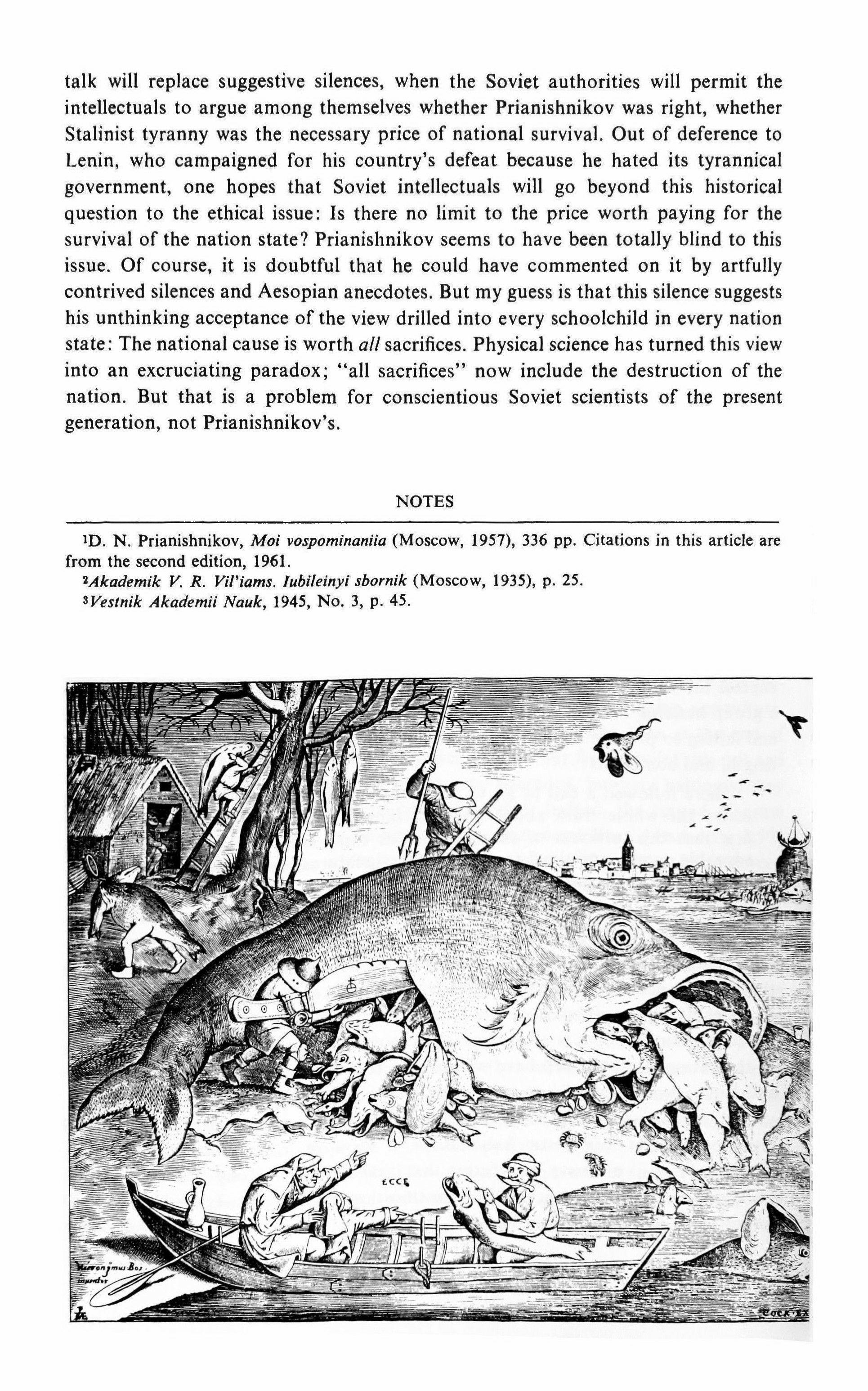
talk will replace suggestive silences, when the Soviet authorities will permit the intellectuals to argue among themselves whether Prianishnikov was right, whether Stalinist tyranny was the necessary price of national survival. Out of deference to Lenin, who campaigned for his country's defeat because he hated its tyrannical government, one hopes that Soviet intellectuals will go beyond this historical question to the ethical issue: Is there no limit to the price worth paying for the survival of the nation state? Prianishnikov seems to have been totally blind to this issue. Of course, it is doubtful that he could have commented on it by artfully contrived silences and Aesopian anecdotes. But my guess is that this silence suggests his unthinking acceptance of the view drilled into every schoolchild in every nation state: The national cause is worth all sacrifices. Physical science has turned this view into an excruciating paradox; "all sacrifices" now include the destruction of the nation. But that is a problem for conscientious Soviet scientists of the present generation, not Prianishnikov's.
ID. N. Prianishnikov, Moi vospominaniia (Moscow, 1957), 336 pp. Citations in this article are from the second edition, 1961.
2Akademik V. R. Vil'iams. Iubileinyi sbornik (Moscow, 1935), p. 25.
3Vestnik Akademii Nauk, 1945, No.3, p. 45.

ON, LET'S GO, Nikita!" said Ilyusha, looking out the window at the village and putting his hand on Nikita's shoulder; as he did so, he saw that his friend was also looking out the window. "Let's go, huh, Nikita?"
Just an hour before, Ilyusha had been all worn out; they had walked through ten miles of swamp and toward the end, Ilyusha had kept stopping to look back into the shadows of the long spring evening, a long, thin, head-bent figure in a thin shroud of mist, with the only sound the loud clunk of their boots, and Nikita couldn't do anything but sigh with pity.
But after they got to the village and had arranged to spend the night in a hut where an old man and an old woman were living, Ilyusha dumped his rucksack in the corner, sat at the window, lit a cigarette, worked off his boots with his feet, stretched, looked out the window, and his eyes brightened.
There was no sign of the old man, but the old woman was setting the table, talking all the while. Ilyusha wasn't really listening to her, but he was asking questions about farming that were sort ofdisconnected, and he kept repeating "thank-ee" for some reason. But he came alive and gave Nikita a special look when he found out there was to be a dance in the club that night.
It was in the very earliest days of spring in the north, a time when the nights are breaking up, light spreads across the horizon, when the birches are still naked, the monotonously shrill sound of the grouse can be heard for miles, the snow is just gone, the fields are covered with water, and the sun is already high and warm at four in the morning.
On such a morning Ilyusha and Nikita started out on their return trek. They were freshmen geology students, hobos and poets, as they called themselves and sang of themselves in their songs. For three months that winter they had worked with a team deep in the swamp; then the time was up, they gathered up their things, had a farewell drink by the fire, sang songs, wrote up their reports, and in the morning they woke up, shook hands goodbye, looked at their derrick, wooden sheds, vans, tents, tractors for the last time, and left.
They'd had to spend the night in this village on the shore of an immense lake, TRI-QUARTERLY 1129
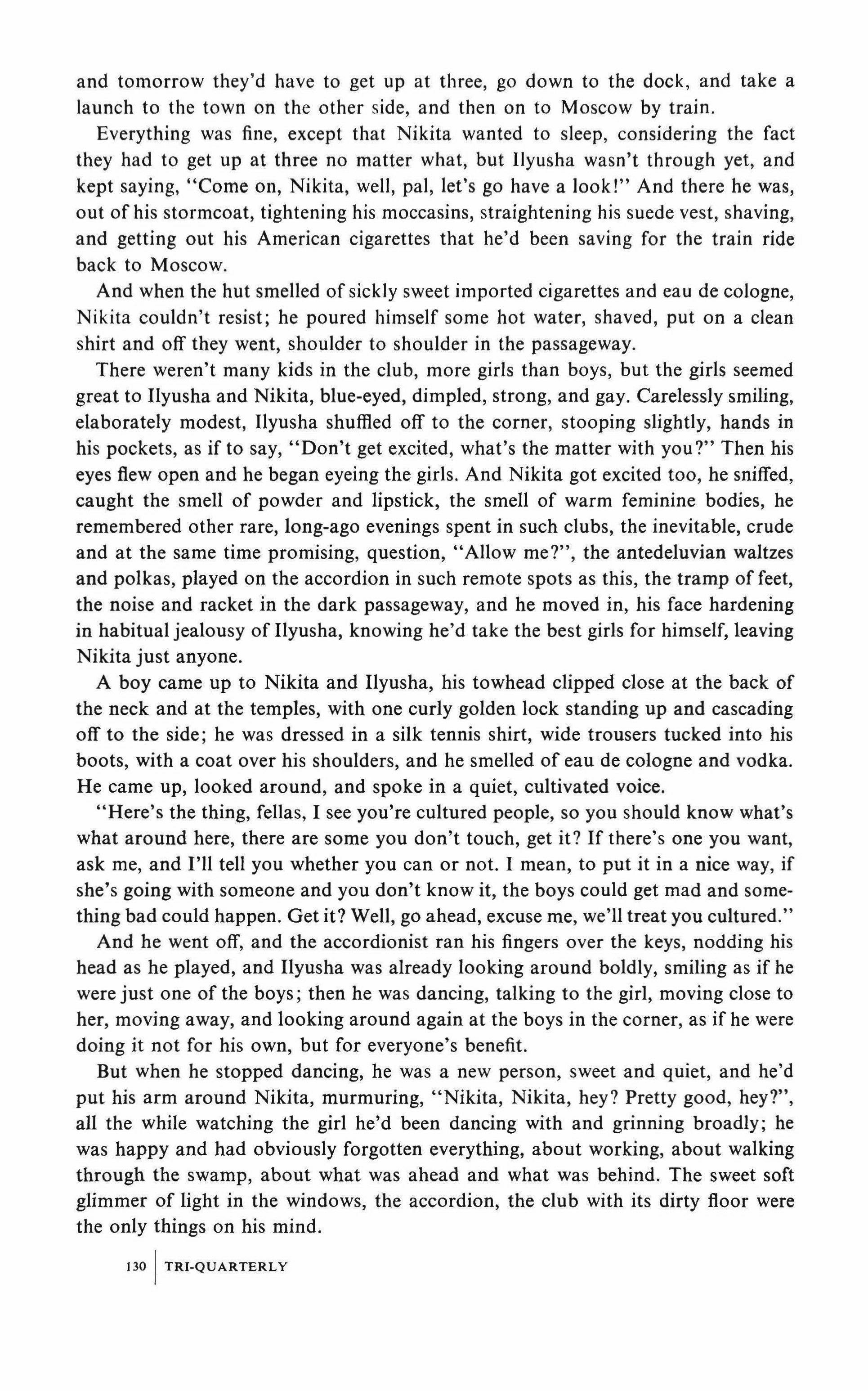
and tomorrow they'd have to get up at three, go down to the dock, and take a launch to the town on the other side, and then on to Moscow by train.
Everything was fine, except that Nikita wanted to sleep, considering the fact they had to get up at three no matter what, but lIyusha wasn't through yet, and kept saying, "Come on, Nikita, well, pal, let's go have a look!" And there he was, out of his stormcoat, tightening his moccasins, straightening his suede vest, shaving, and getting out his American cigarettes that he'd been saving for the train ride back to Moscow.
And when the hut smelled of sickly sweet imported cigarettes and eau de cologne, Nikita couldn't resist; he poured himself some hot water, shaved, put on a clean shirt and off they went, shoulder to shoulder in the passageway.
There weren't many kids in the club, more girls than boys, but the girls seemed great to Ilyusha and Nikita, blue-eyed, dimpled, strong, and gay. Carelessly smiling, elaborately modest, Ilyusha shuffled off to the corner, stooping slightly, hands in his pockets, as if to say, "Don't get excited, what's the matter with you?" Then his eyes flew open and he began eyeing the girls. And Nikita got excited too, he sniffed, caught the smell of powder and lipstick, the smell of warm feminine bodies, he remembered other rare, long-ago evenings spent in such clubs, the inevitable, crude and at the same time promising, question, "Allow me?", the antedeluvian waltzes and polkas, played on the accordion in such remote spots as this, the tramp of feet, the noise and racket in the dark passageway, and he moved in, his face hardening in habitual jealousy of Ilyusha, knowing he'd take the best girls for himself, leaving Nikita just anyone.
A boy came up to Nikita and Ilyusha, his towhead clipped close at the back of the neck and at the temples, with one curly golden lock standing up and cascading off to the side; he was dressed in a silk tennis shirt, wide trousers tucked into his boots, with a coat over his shoulders, and he smelled of eau de cologne and vodka. He came up, looked around, and spoke in a quiet, cultivated voice.
"Here's the thing, fellas, I see you're cultured people, so you should know what's what around here, there are some you don't touch, get it? If there's one you want, ask me, and I'll tell you whether you can or not. I mean, to put it in a nice way, if she's going with someone and you don't know it, the boys could get mad and something bad could happen. Get it? Well, go ahead, excuse me, we'll treat you cultured."
And he went off, and the accordionist ran his fingers over the keys, nodding his head as he played, and Ilyusha was already looking around boldly, smiling as if he were just one of the boys; then he was dancing, talking to the girl, moving close to her, moving away, and looking around again at the boys in the corner, as if he were doing it not for his own, but for everyone's benefit.
But when he stopped dancing, he was a new person, sweet and quiet, and he'd put his arm around Nikita, murmuring, "Nikita, Nikita, hey? Pretty good, hey?", all the while watching the girl he'd been dancing with and grinning broadly; he was happy and had obviously forgotten everything, about working, about walking through the swamp, about what was ahead and what was behind. The sweet soft glimmer of light in the windows, the accordion, the club with its dirty floor were the only things on his mind.
130 TRI-QUARTERLY
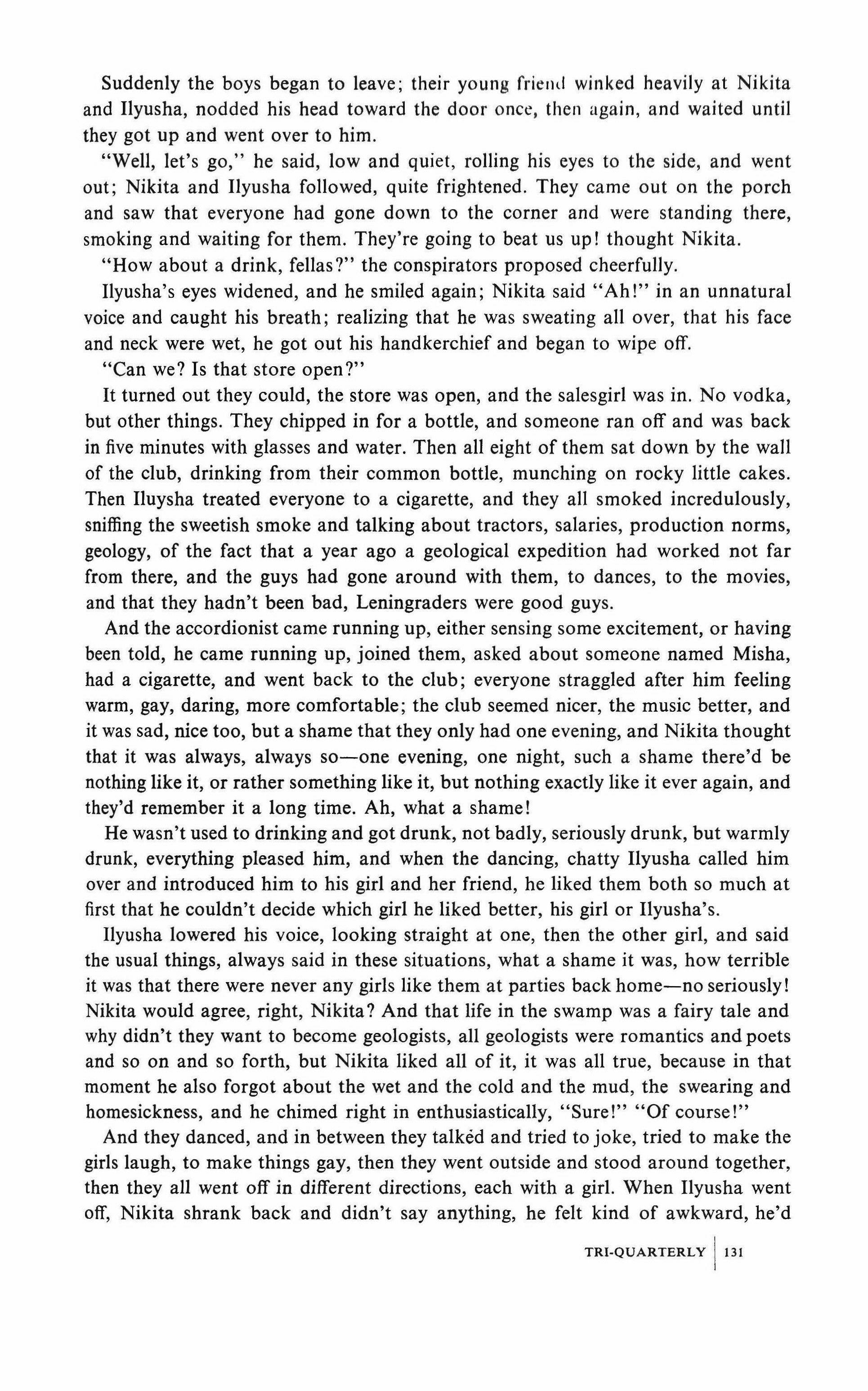
Suddenly the boys began to leave; their young friend winked heavily at Nikita and Ilyusha, nodded his head toward the door once, then again, and waited until they got up and went over to him.
"Well, let's go," he said, low and quiet, rolling his eyes to the side, and went out; Nikita and Ilyusha followed, quite frightened. They came out on the porch and saw that everyone had gone down to the corner and were standing there, smoking and waiting for them. They're going to beat us up! thought Nikita.
"How about a drink, fellas?" the conspirators proposed cheerfully.
Ilyusha's eyes widened, and he smiled again; Nikita said"Ah!" in an unnatural voice and caught his breath; realizing that he was sweating all over, that his face and neck were wet, he got out his handkerchief and began to wipe off.
"Can we? Is that store open?"
It turned out they could, the store was open, and the salesgirl was in. No vodka, but other things. They chipped in for a bottle, and someone ran off and was back in five minutes with glasses and water. Then all eight of them sat down by the wall of the club, drinking from their common bottle, munching on rocky little cakes. Then Iluysha treated everyone to a cigarette, and they all smoked incredulously, sniffing the sweetish smoke and talking about tractors, salaries, production norms, geology, of the fact that a year ago a geological expedition had worked not far from there, and the guys had gone around with them, to dances, to the movies, and that they hadn't been bad, Leningraders were good guys.
And the accordionist came running up, either sensing some excitement, or having been told, he came running up, joined them, asked about someone named Misha, had a cigarette, and went back to the club; everyone straggled after him feeling warm, gay, daring, more comfortable; the club seemed nicer, the music better, and it was sad, nice too, but a shame that they only had one evening, and Nikita thought that it was always, always so-one evening, one night, such a shame there'd be nothing like it, or rather something like it, but nothing exactly like it ever again, and they'd remember it a long time. Ah, what a shame!
He wasn't used to drinking and got drunk, not badly, seriously drunk, but warmly drunk, everything pleased him, and when the dancing, chatty Ilyusha called him over and introduced him to his girl and her friend, he liked them both so much at first that he couldn't decide which girl he liked better, his girl or Ilyusha's.
llyusha lowered his voice, looking straight at one, then the other girl, and said the usual things, always said in these situations, what a shame it was, how terrible it was that there were never any girls like them at parties back home-no seriously! Nikita would agree, right, Nikita? And that life in the swamp was a fairy tale and why didn't they want to become geologists, all geologists were romantics and poets and so on and so forth, but Nikita liked all of it, it was all true, because in that moment he also forgot about the wet and the cold and the mud, the swearing and homesickness, and he chimed right in enthusiastically, "Sure!" "Of course!"
And they danced, and in between they talked and tried to joke, tried to make the girls laugh, to make things gay, then they went outside and stood around together, then they all went off in different directions, each with a girl. When Ilyusha went off, Nikita shrank back and didn't say anything, he felt kind of awkward, he'd
TRI-QUARTERLY 1131
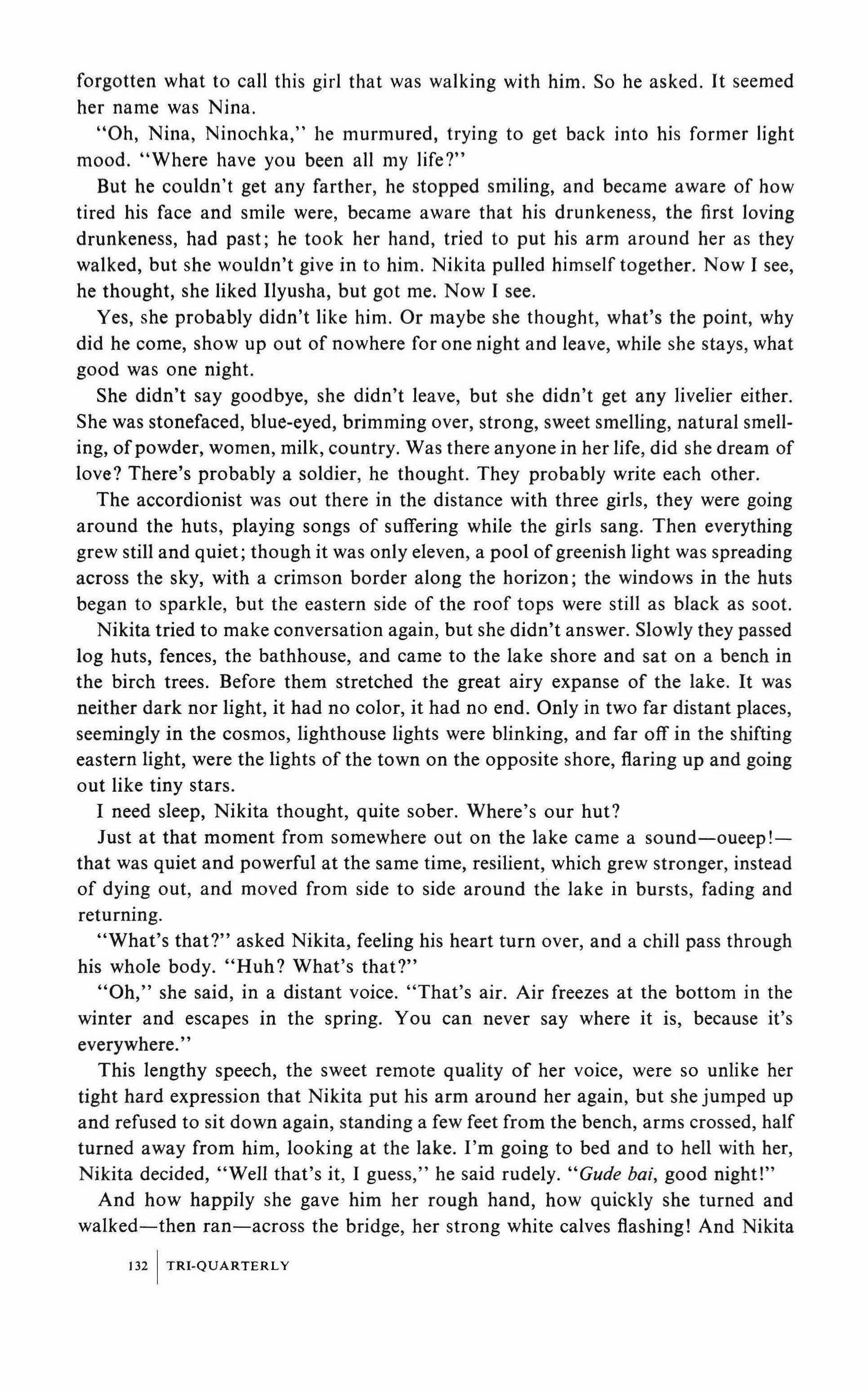
forgotten what to call this girl that was walking with him. So he asked. It seemed her name was Nina.
"Oh, Nina, Ninochka," he murmured, trying to get back into his former light mood. "Where have you been all my life?"
But he couldn't get any farther, he stopped smiling, and became aware of how tired his face and smile were, became aware that his drunkeness, the first loving drunkeness, had past; he took her hand, tried to put his arm around her as they walked, but she wouldn't give in to him. Nikita pulled himself together. Now I see, he thought, she liked Ilyusha, but got me. Now I see.
Yes, she probably didn't like him. Or maybe she thought, what's the point, why did he come, show up out of nowhere for one night and leave, while she stays, what good was one night.
She didn't say goodbye, she didn't leave, but she didn't get any livelier either. She was stonefaced, blue-eyed, brimming over, strong, sweet smelling, natural smelling, ofpowder, women, milk, country. Was there anyone in her life, did she dream of love? There's probably a soldier, he thought. They probably write each other.
The accordionist was out there in the distance with three girls, they were going around the huts, playing songs of suffering while the girls sang. Then everything grew still and quiet; though it was only eleven, a pool of greenish light was spreading across the sky, with a crimson border along the horizon; the windows in the huts began to sparkle, but the eastern side of the roof tops were still as black as soot.
Nikita tried to make conversation again, but she didn't answer. Slowly they passed log huts, fences, the bathhouse, and came to the lake shore and sat on a bench in the birch trees. Before them stretched the great airy expanse of the lake. It was neither dark nor light, it had no color, it had no end. Only in two far distant places, seemingly in the cosmos, lighthouse lights were blinking, and far off in the shifting eastern light, were the lights of the town on the opposite shore, flaring up and going out like tiny stars.
I need sleep, Nikita thought, quite sober. Where's our hut?
Just at that moment from somewhere out on the lake came a sound-oueep!that was quiet and powerful at the same time, resilient, which grew stronger, instead of dying out, and moved from side to side around the lake in bursts, fading and returning.
"What's that?" asked Nikita, feeling his heart turn over, and a chill pass through his whole body. "Huh? What's that?"
"Oh," she said, in a distant voice. "That's air. Air freezes at the bottom in the winter and escapes in the spring. You can never say where it is, because it's everywhere.'
This lengthy speech, the sweet remote quality of her voice, were so unlike her tight hard expression that Nikita put his arm around her again, but she jumped up and refused to sit down again, standing a few feet from the bench, arms crossed, half turned away from him, looking at the lake. I'm going to bed and to hell with her, Nikita decided, "Well that's it, I guess," he said rudely. "Gude bai, good night!"
And how happily she gave him her rough hand, how quickly she turned and walked-then ran-across the bridge, her strong white calves flashing! And Nikita 1321 TRI-QUARTERLY

sat on for a while, groaning and choking with shit me; he lit a cigarette, feeling terrible but already beginning to forget; calmly he watched the lake, right and left, and he started noticing the thinnest pearly cloud high overhead and three flapping sails on three unmoving sailboats; when a fisherman began rowing out of the cove, about two miles away, he distinctly heard the squeak of the oarlocks. "Oueeeeep!" came the sound again, a watery moan, and the echo rolled like a copper wheel across the stilI water.
When he found the hut, after much wandering around in the wrong yards, I1yusha was already home, sitting with his back to the open window, talking with the old woman. Seeing Nikita, I1yusha smiled, overjoyed, as if they hadn't seen each other in God knows how long, and covering his mouth with his hand in an habitual gesture, he asked, "Well, how was it, Nikita? All right?" His eyes were round, but he asked in a manner that was both encouraging and censorious, like a father with a son.
Nikita didn't answer; he shrugged, sat on the bench next to Ilyusha, and began to follow the old woman through half closed eyes, listening to the sound of the samovar in the kitchen and thinking that soon there'd be tea and then he could go to bed. Ilyusha, who had understood immediately that Nikita had had no luck, ran his hand over his lips and thoughtfully lowered his eyes.
"Well, well, sorry, Nikita, sorry," and a long arm tenderly squeezed his shoulder, asking his pardon. When confused, IIyusha would begin to mumble and repeat himself. "But don't you agree, agree Listen, don't you agree it was a grandiose evening? Huh, Nikita? And the booze, the booze, did you like it, did you?"
"Not bad, not bad," Nikita said shortly, and yawned. "Let's go to
"Let's not, let's not. Nikita, you ah, want the bed? I know, I know, you like a soft bed. You're tired, tired. Take the bed, ok?" He turned, and bending his long neck, he leaned out the window and looked around.
From the darkness near the stove, where Nikita was supposed to sleep, suddenly a groan was heard behind a partition, behind a curtain, then a hand began grabbing for the curtain and pulling it aside, and an old man appeared. He didn't look at any of them, just straight ahead, walking and shuffling along, one hand stretched out in front of him, one hand holding the doorjamb. He was terrible looking, black, with purple eyelids, covered all over with gray grimy bristle, even his knobby shaved head. His eyes were bad, his face flushed with every step he took, and it was obvious he wasn't going to be able to cross open space without hanging on to something. Nikita started to help him, but the old man said crossly and firmly, "Sit down, I can myself," and with a moan and a groan he continued on his way.
At last he settled himself at the table, and for a long time he was quiet, looking at the lamp and rubbing his cheek; then he asked, "On expedition?"
"Expedition," Nikita answered hurriedly. "Geologists."
"Give me wa-er," the old man commanded sharply.
"What?" Nikita didn't understand.
"Wa-er, wa-er, I say! Give it to me!" the old man repeated angrily. "In the cupboard, wa-er, J say!"
"What cupboard?" asked Nikita, growing red in his effort to understand. TRI-QUARTERLY 1133
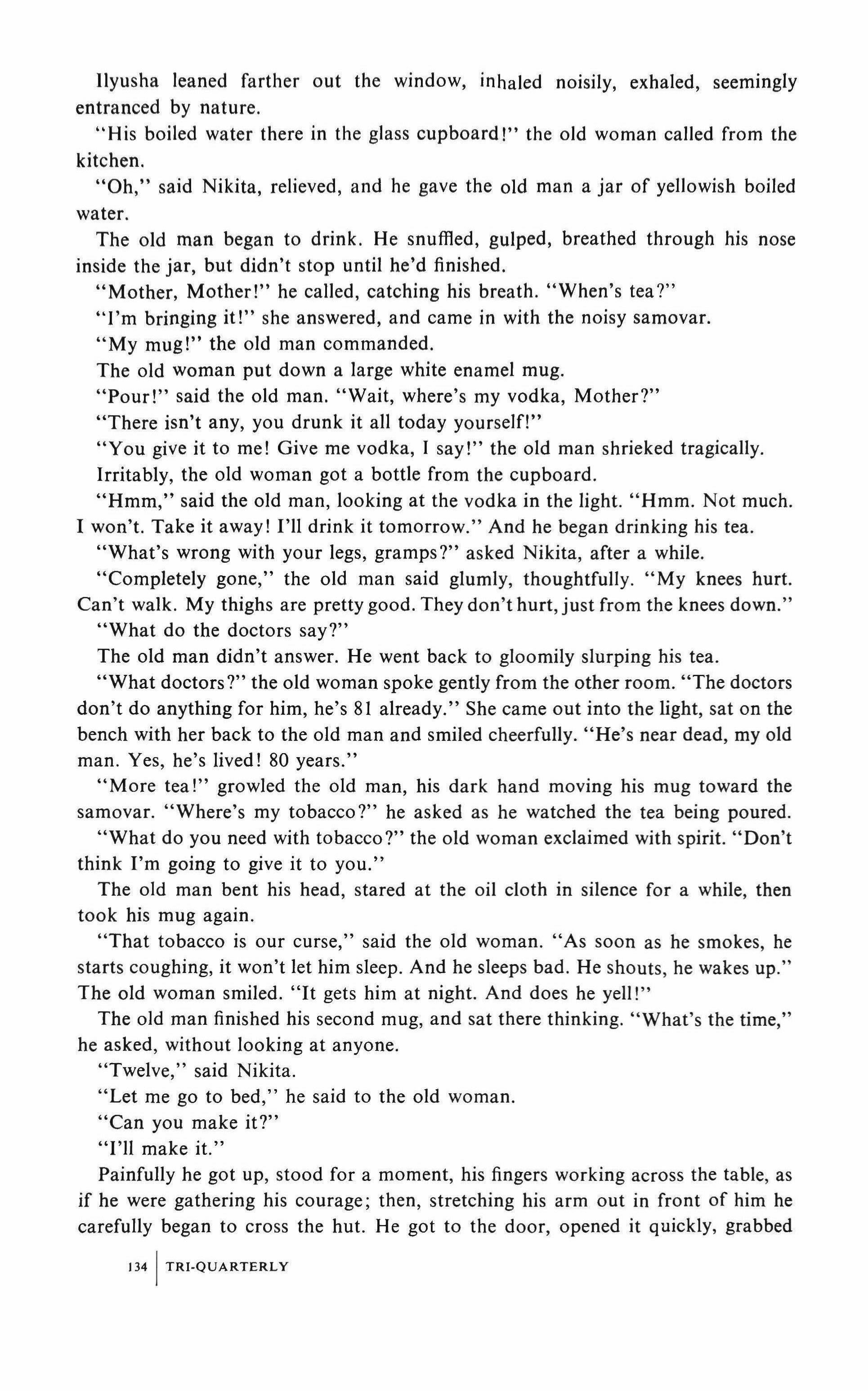
Ilyusha leaned farther out the window, inhaled noisily, exhaled, seemingly entranced by nature.
"H is boiled water there in the glass cupboard!" the old woman called from the kitchen.
"Oh," said Nikita, relieved, and he gave the old man a jar of yellowish boiled water.
The old man began to drink. He snuffled, gulped, breathed through his nose inside the jar, but didn't stop until he'd finished.
"Mother, Mother!" he called, catching his breath. "When's tea?"
"I'm bringing it!" she answered, and came in with the noisy samovar.
"My mug!" the old man commanded.
The old woman put down a large white enamel mug.
"Pour!" said the old man. "Wait, where's my vodka, Mother?"
"There isn't any, you drunk it all today yourself!"
"You give it to me! Give me vodka, I say!" the old man shrieked tragically.
Irritably, the old woman got a bottle from the cupboard.
"Hmm," said the old man, looking at the vodka in the light. "Hmm. Not much. I won't. Take it away! I'll drink it tomorrow." And he began drinking his tea.
"What's wrong with your legs, gramps?" asked Nikita, after a while.
"Completely gone," the old man said glumly, thoughtfully. "My knees hurt. Can't walk. My thighs are pretty good. They don't hurt, just from the knees down."
"What do the doctors say?"
The old man didn't answer. He went back to gloomily slurping his tea.
"What doctors?" the old woman spoke gently from the other room. "The doctors don't do anything for him, he's 8 I already." She came out into the light, sat on the bench with her back to the old man and smiled cheerfully. "He's near dead, myoid man. Yes, he's lived! 80 years."
"More tea!" growled the old man, his dark hand moving his mug toward the samovar. "Where's my tobacco?" he asked as he watched the tea being poured.
"What do you need with tobacco?" the old woman exclaimed with spirit. "Don't think I'm going to give it to you."
The old man bent his head, stared at the oil cloth in silence for a while, then took his mug again.
"That tobacco is our curse," said the old woman. "As soon as he smokes, he starts coughing, it won't let him sleep. And he sleeps bad. He shouts, he wakes up." The old woman smiled. "It gets him at night. And does he yell!"
The old man finished his second mug, and sat there thinking. "What's the time," he asked, without looking at anyone.
"Twelve," said Nikita.
"Let me go to bed," he said to the old woman.
"Can you make it?"
"I'll make it."
Painfully he got up, stood for a moment, his fingers working across the table, as if he were gathering his courage; then, stretching his arm out in front of him he carefully began to cross the hut. He got to the door, opened it quickly, grabbed
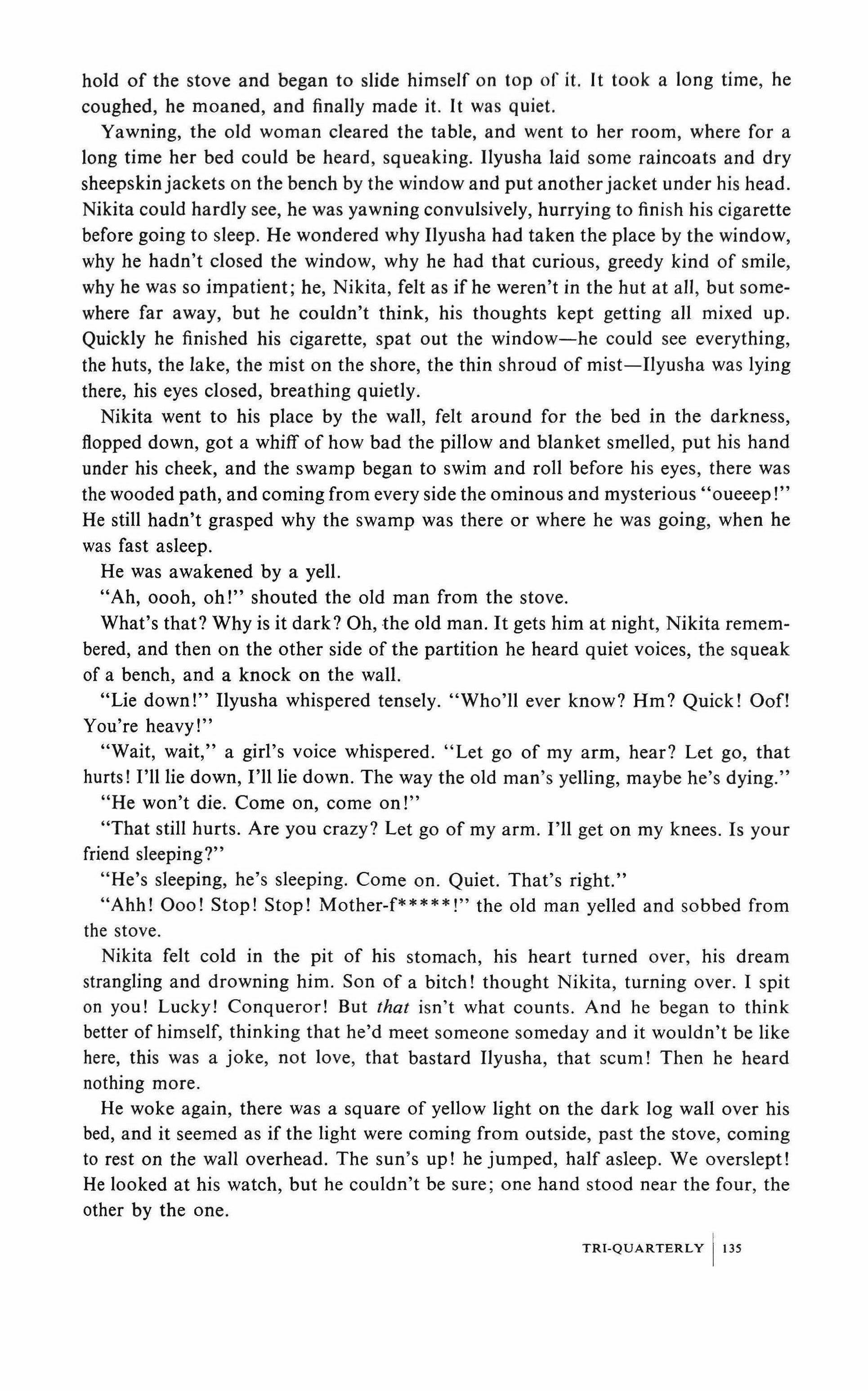
hold of the stove and began to slide himself on top of it. It took a long time, he coughed, he moaned, and finally made it. It was quiet.
Yawning, the old woman cleared the table, and went to her room, where for a long time her bed could be heard, squeaking. IIyusha laid some raincoats and dry sheepskinjackets on the bench by the window and put anotherjacket under his head. Nikita could hardly see, he was yawning convulsively, hurrying to finish his cigarette before going to sleep. He wondered why Ilyusha had taken the place by the window, why he hadn't closed the window, why he had that curious, greedy kind of smile, why he was so impatient; he, Nikita, felt as if he weren't in the hut at all, but somewhere far away, but he couldn't think, his thoughts kept getting all mixed up. Quickly he finished his cigarette, spat out the window-he could see everything, the huts, the lake, the mist on the shore, the thin shroud of mist-llyusha was lying there, his eyes closed, breathing quietly.
Nikita went to his place by the wall, felt around for the bed in the darkness, flopped down, got a whiff of how bad the pillow and blanket smelled, put his hand under his cheek, and the swamp began to swim and roll before his eyes, there was the wooded path, and coming from every side the ominous and mysterious "oueeep!" He still hadn't grasped why the swamp was there or where he was going, when he was fast asleep.
He was awakened by a yell.
"Ah, oooh, oh!" shouted the old man from the stove.
What's that? Why is it dark? Oh, the old man. It gets him at night, Nikita remembered, and then on the other side of the partition he heard quiet voices, the squeak of a bench, and a knock on the wall.
"Lie down!" Ilyusha whispered tensely. "Who'll ever know? Hm? Quick! Oaf! You're heavy!"
"Wait, wait," a girl's voice whispered. "Let go of my arm, hear? Let go, that hurts! I'll lie down, I'll lie down. The way the old man's yelling, maybe he's dying."
"He won't die. Come on, come on!"
"That still hurts. Are you crazy? Let go of my arm. I'll get on my knees. Is your friend sleeping?"
"He's sleeping, he's sleeping. Come on. Quiet. That's right."
"Ahh! Ooo! Stop! Stop! Mother-f*****!" the old man yelled and sobbed from the stove.
Nikita felt cold in the pit of his stomach, his heart turned over, his dream strangling and drowning him. Son of a bitch! thought Nikita, turning over. I spit on you! Lucky! Conqueror! But that isn't what counts. And he began to think better of himself, thinking that he'd meet someone someday and it wouldn't be like here, this was a joke, not love, that bastard IIyusha, that scum! Then he heard nothing more.
He woke again, there was a square of yellow light on the dark log wall over his bed, and it seemed as if the light were coming from outside, past the stove, coming to rest on the wall overhead. The sun's up! he jumped, half asleep. We overslept! He looked at his watch, but he couldn't be sure; one hand stood near the four, the other by the one.

He raised his head, squinted; the old man had lit the lamp on the kitchen table, and the old man was wandering around, hand stretched out before him, coughing. Nikita got up, padded barefoot to the lamp and looked at his watch, it was I :20. Sleep, sleep, he thought, and hanging onto the stove and swaying drunkenly, he made it back to bed. He flopped down, only to be awakened again, immediately it seemed, with a crash.
After the crash, there was darkness, and a hoarse moan, and then the voice of the old man. "Mother! Mother! Come quickly! Mother!" he roared desperately.
"What you want? Where are you? What's going on?" the old woman mumbled from her bed.
"Come quickly! Mother-f* ** * *!" the old man cried sharply and shrilly. "Come, I've fallen in the box, can't get up."
What box? What box? Hell, what a place to spend the night! thought Nikita, definitely awake at last.
The old woman was feeling her way toward the stove, all the while asking, "Where are you T", the old man coming back in answer each time. Then there was snuffling, and one of those loud, old people's conversations began, in which it doesn't really matter to them whether the other one is sleeping or not, why should it, it only used to matter way way back, back in their time.
"You're wandering, old man!" the old woman shouted in the darkness. "You're a nighttime wonder, what made you get down?"
"Three mugs," the old man retorted, "three mugs of tea I drank. I drank them and they mixed me up."
He coughed, moaned, sighed, and the old woman, obviously helping him up, shouted, "Your foot, where've you got your foot? Put it up on the step. Hold on, hold on, up you go! Are you up?"
"I'm up."
And the night dragged on, but Nikita couldn't sleep; it wasn't the old man and woman that were bothering him but what had been going on behind the partition, the laughter, the giggling, and he knew they had listened to the old people and thought it was funny that the old man had fallen in the box, not because it really was funny, but simply because they were there, unlike Nikita, in the hot darkness, lying together in the soft night light. That was it. They were happy. What did Pushkin say? What was it? Oh, yes. All of life comes to one night or two. She'd come to him. He'd known what he was about when he went to the club. He'd gone to the club, simple as that! He went, and everything came out right; then he'd waited, drank tea and waited, smoking, saying "thank-ee", saying "Nikita," and "sweet" and "grandiose" and various other things, waiting and knowing that she was waiting out there-oh, I don't know-in the garden, behind the bathhouse, waiting for the light to go out, for everyone to go to sleep, so she could come in. Oh shameless! And someday in a group he'd be stretching out his long legs and saying, "I just don't know how to make out," he'd say. "I'm just out of it. I'm too shy. Now Nikita's the lucky one!" The bastard. Poor old woman, poor old man. God, don't let me live so long, don't let me. They're saying goodbye! Are they going to write? Horseradish is what he'll write you, you little fool. Somebody 1361 TRI-QUARTERLY
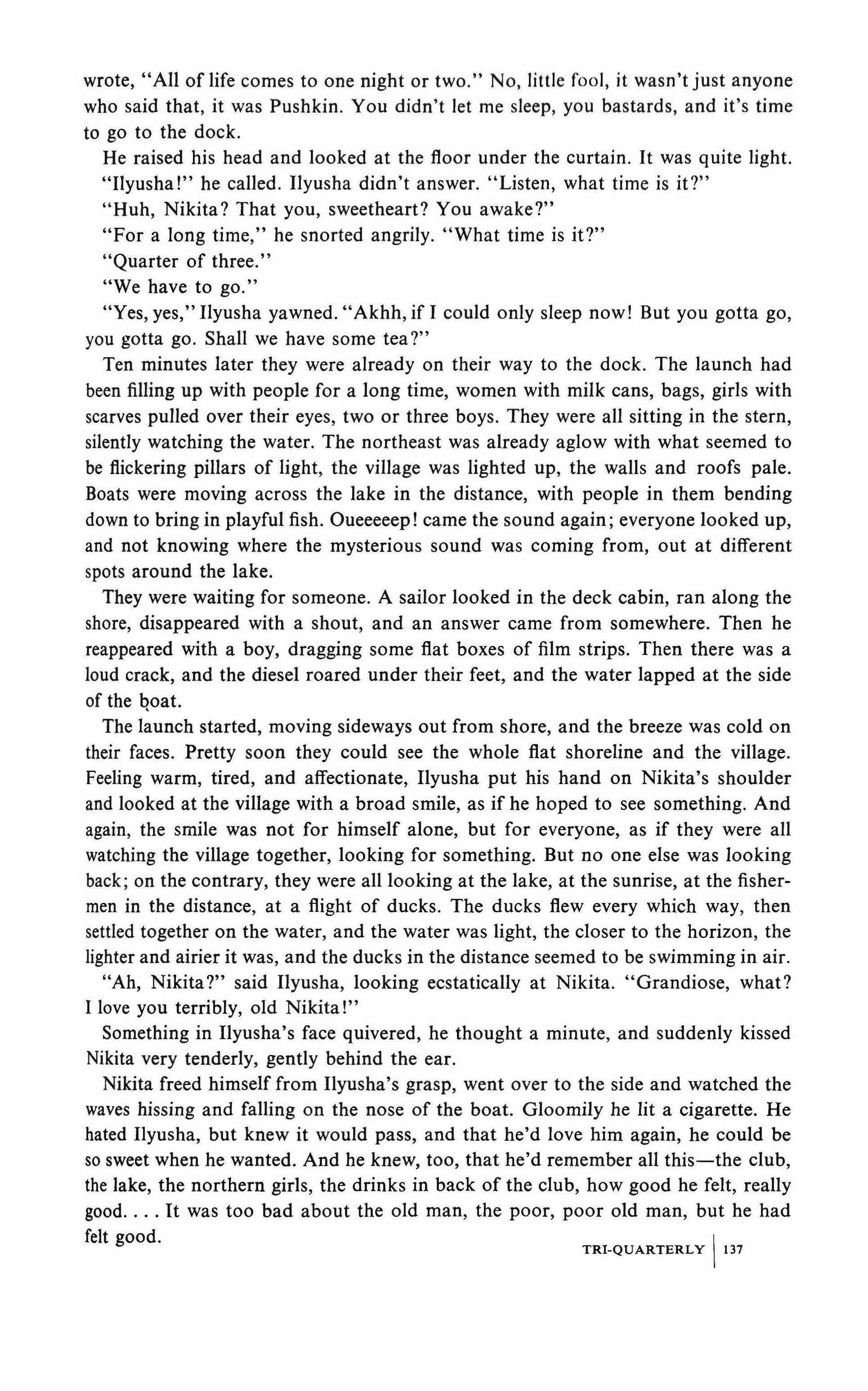
wrote, "All of life comes to one night or two." No, little fool, it wasn't just anyone who said that, it was Pushkin. You didn't let me sleep, you bastards, and it's time to go to the dock.
He raised his head and looked at the floor under the curtain. It was quite light. "Ilyusha!" he called. Ilyusha didn't answer. "Listen, what time is it?"
"Huh, Nikita? That you, sweetheart? You awake?"
"For a long time," he snorted angrily. "What time is it?"
"Quarter of three."
"We have to go."
"Yes, yes," Ilyusha yawned. "Akhh, if I could only sleep now! But you gotta go, you gotta go. Shall we have some tea?"
Ten minutes later they were already on their way to the dock. The launch had been filling up with people for a long time, women with milk cans, bags, girls with scarves pulled over their eyes, two or three boys. They were all sitting in the stern, silently watching the water. The northeast was already aglow with what seemed to be flickering pillars of light, the village was lighted up, the walls and roofs pale. Boats were moving across the lake in the distance, with people in them bending down to bring in playful fish. Oueeeeep! came the sound again; everyone looked up, and not knowing where the mysterious sound was coming from, out at different spots around the lake.
They were waiting for someone. A sailor looked in the deck cabin, ran along the shore, disappeared with a shout, and an answer came from somewhere. Then he reappeared with a boy, dragging some flat boxes of film strips. Then there was a loud crack, and the diesel roared under their feet, and the water lapped at the side of the boat.
The launch started, moving sideways out from shore, and the breeze was cold on their faces. Pretty soon they could see the whole flat shoreline and the village. Feeling warm, tired, and affectionate, Ilyusha put his hand on Nikita's shoulder and looked at the village with a broad smile, as if he hoped to see something. And again, the smile was not for himself alone, but for everyone, as if they were all watching the village together, looking for something. But no one else was looking back; on the contrary, they were all looking at the lake, at the sunrise, at the fishermen in the distance, at a flight of ducks. The ducks flew every which way, then settled together on the water, and the water was light, the closer to the horizon, the lighter and airier it was, and the ducks in the distance seemed to be swimming in air.
"Ah, Nikita?" said Ilyusha, looking ecstatically at Nikita. "Grandiose, what? I love you terribly, old Nikita!"
Something in Ilyusha's face quivered, he thought a minute, and suddenly kissed Nikita very tenderly, gently behind the ear.
Nikita freed himself from Ilyusha's grasp, went over to the side and watched the waves hissing and falling on the nose of the boat. Gloomily he lit a cigarette. He hated Ilyusha, but knew it would pass, and that he'd love him again, he could be so sweet when he wanted. And he knew, too, that he'd remember all this-the club, the lake, the northern girls, the drinks in back of the club, how good he felt, really good It was too bad about the old man, the poor, poor old man, but he had felt good. TRI-QUARTERLY \ 137


THE PERFORMING ARTS in the Soviet Union have been highly regarded throughout the twentieth century both before and since the Revolution of 1918. The Imperial Russian Ballet of St. Petersburg, the Diaghilev Ballet, the electrifying talents of Nijinski, Pavlova, Karsavina; instrumentalists and vocalists like Rubenstein, Rachmaninov, Chaliapin; the Moscow Art Theatre-all had achieved world renown under the tsars and laid the cornerstone upon which the Soviets have erected the structure in which they presently take such pride. True, many of these older artists expatriated themselves, but their very existence bore testimony to the extraordinary richness of the Russian people's capacity for artistic expression.
All of these artists, however, were principally interpretive rather than creative. The distinction, I think, is widely understood. The composer, the poet and playwright, the painter and sculptor make the statement; it is their vision of life and of man which they offer, transmuted into artistic form. The singer, the dancer, the actor are artists of another-though no lower-order. Theirs is the task of taking the work of art that has been created and giving it expression.
One reason for the conflicting judgments concerning the freedom of the arts and of artists in the Soviet Union arises from the looseness with which we use the word: of what art are we speaking? of which kind of artists? By and large, it can be said that the creative artist, especially the writer, has always had a difficult time in Russia; the interpretive artist, on the other hand, has been hailed and cherished. Again, this is no post-Revolutionary phenomenon. Pushkin never saw his Boris Godunov permitted a performance, Griboyedov's Woe from Wit was banned throughout his lifetime, Dostoevski escaped a firing squad only by an eleventh-hour reprieve, Gorki was imprisoned, then forced into political exile.
Authoritarianism historically reacts against creative ideas. Galileo's confrontation by the Inquisition is only one incident in a long line ofsuch confrontations, stretching down the centuries from ancient Babylon to Nazi Germany. And Russia has
TRJ-QUARTERLY [139
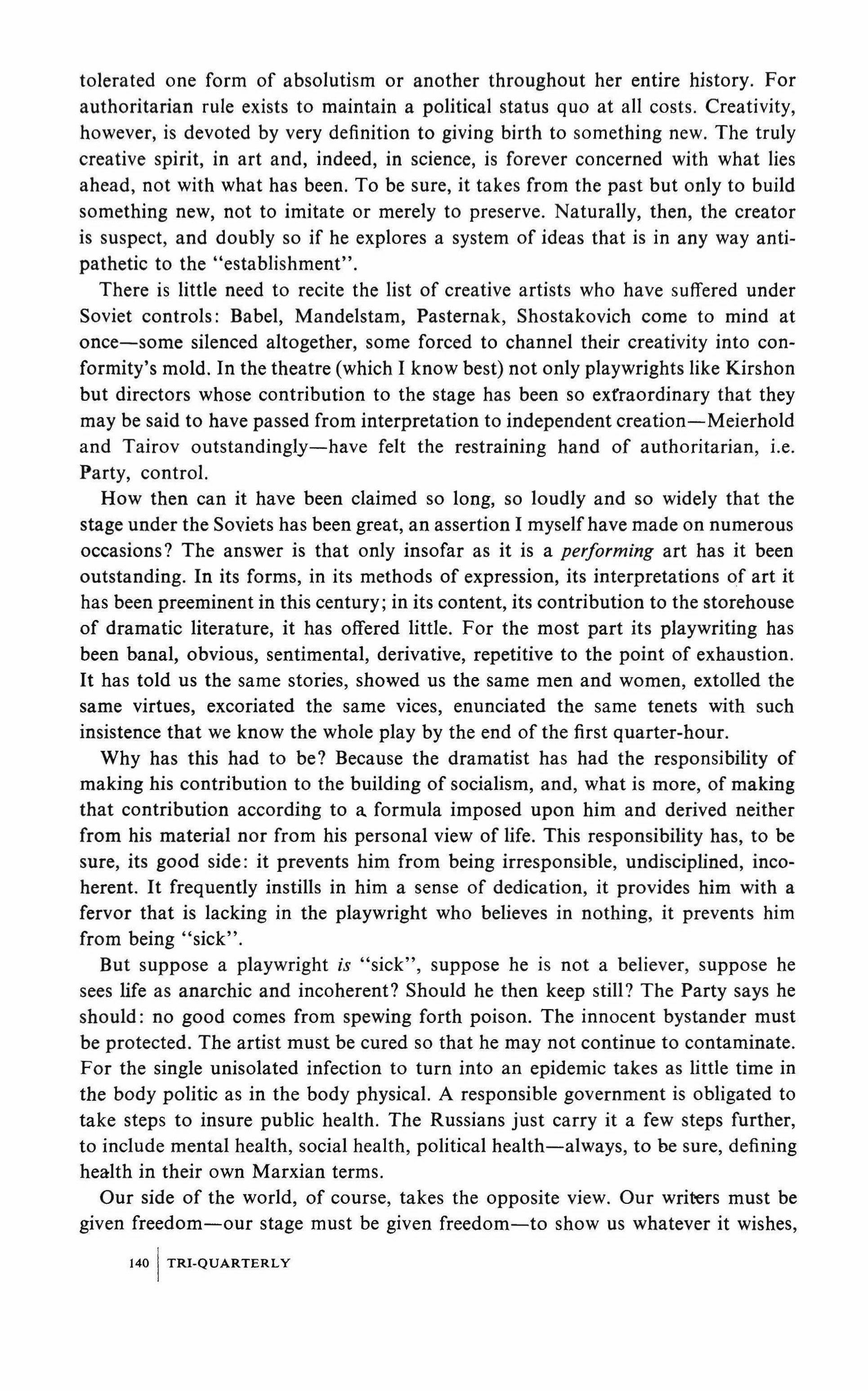
tolerated one form of absolutism or another throughout her entire history. For authoritarian rule exists to maintain a political status quo at all costs. Creativity, however, is devoted by very definition to giving birth to something new. The truly creative spirit, in art and, indeed, in science, is forever concerned with what lies ahead, not with what has been. To be sure, it takes from the past but only to build something new, not to imitate or merely to preserve. Naturally, then, the creator is suspect, and doubly so if he explores a system of ideas that is in any way antipathetic to the "establishment".
There is little need to recite the list of creative artists who have suffered under Soviet controls: Babel, Mandelstam, Pasternak, Shostakovich come to mind at once-some silenced altogether, some forced to channel their creativity into conformity's mold. In the theatre (which I know best) not only playwrights like Kirshon but directors whose contribution to the stage has been so extraordinary that they may be said to have passed from interpretation to independent creation-Meierhold and Tairov outstandingly-have felt the restraining hand of authoritarian, i.e. Party, control.
How then can it have been claimed so long, so loudly and so widely that the stage under the Soviets has been great, an assertion I myself have made on numerous occasions? The answer is that only insofar as it is a performing art has it been outstanding. In its forms, in its methods of expression, its interpretations of art it has been preeminent in this century; in its content, its contribution to the storehouse of dramatic literature, it has offered little. For the most part its playwriting has been banal, obvious, sentimental, derivative, repetitive to the point of exhaustion. It has told us the same stories, showed us the same men and women, extolled the same virtues, excoriated the same vices, enunciated the same tenets with such insistence that we know the whole play by the end of the first quarter-hour.
Why has this had to be? Because the dramatist has had the responsibility of making his contribution to the building of socialism, and, what is more, of making that contribution according to a formula imposed upon him and derived neither from his material nor from his personal view of life. This responsibility has, to be sure, its good side: it prevents him from being irresponsible, undisciplined, incoherent. It frequently instills in him a sense of dedication, it provides him with a fervor that is lacking in the playwright who believes in nothing, it prevents him from being "sick".
But suppose a playwright is "sick", suppose he is not a believer, suppose he sees life as anarchic and incoherent? Should he then keep still? The Party says he should: no good comes from spewing forth poison. The innocent bystander must be protected. The artist must be cured so that he may not continue to contaminate. For the single unisolated infection to turn into an epidemic takes as little time in the body politic as in the body physical. A responsible government is obligated to take steps to insure public health. The Russians just carry it a few steps further, to include mental health, social health, political health-always, to be sure, defining health in their own Marxian terms.
Our side of the world, of course, takes the opposite view. Our writers must be given freedom-our stage must be given freedom-to show us whatever it wishes,
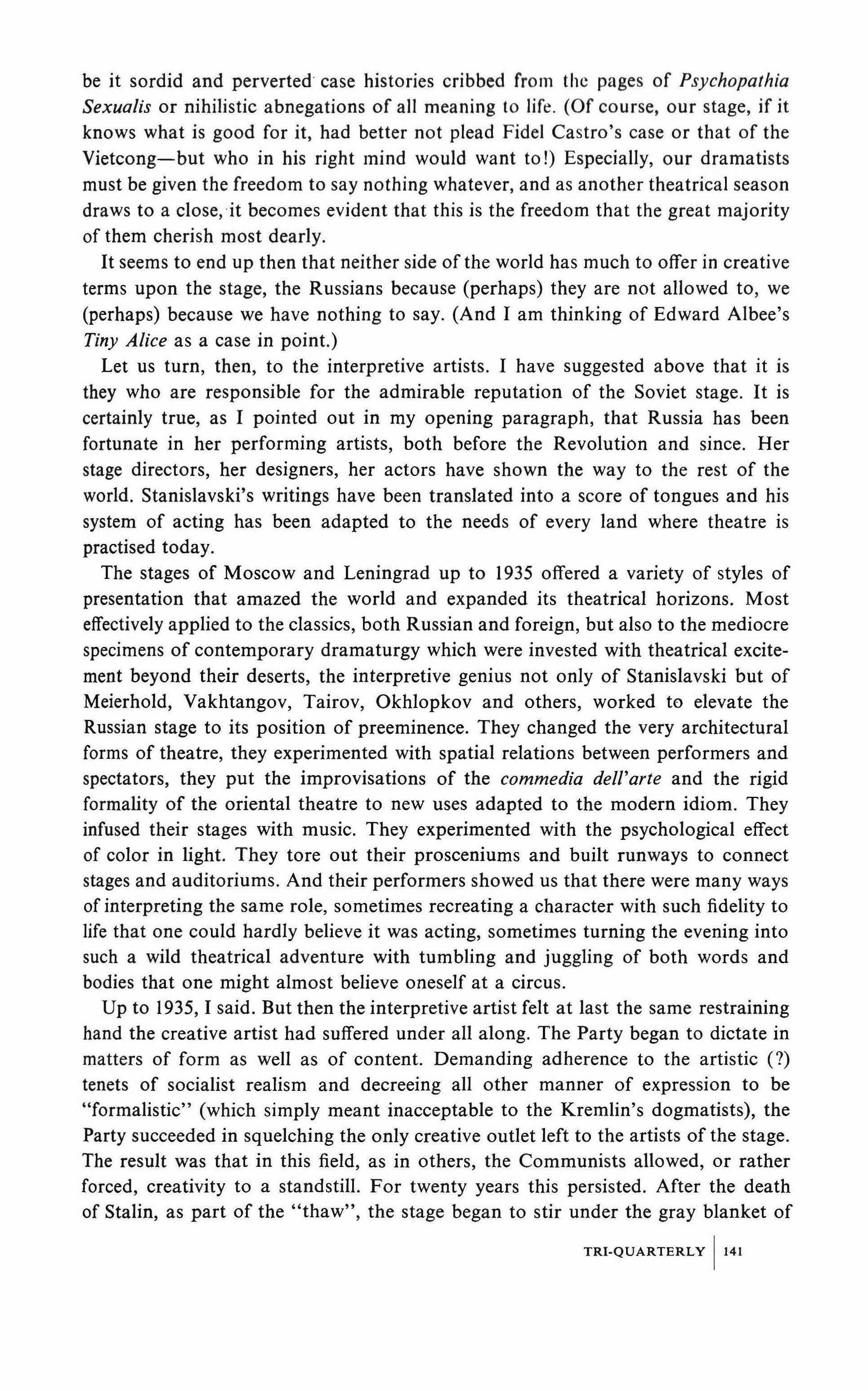
be it sordid and perverted case histories cribbed from the pages of Psychopathia Sexualis or nihilistic abnegations of all meaning to life. (Of course, our stage, if it knows what is good for it, had better not plead Fidel Castro's case or that of the Vietcong-but who in his right mind would want to!) Especially, our dramatists must be given the freedom to say nothing whatever, and as another theatrical season draws to a close, it becomes evident that this is the freedom that the great majority of them cherish most dearly.
It seems to end up then that neither side of the world has much to offer in creative terms upon the stage, the Russians because (perhaps) they are not allowed to, we (perhaps) because we have nothing to say. (And I am thinking of Edward Albee's Tiny Alice as a case in point.)
Let us turn, then, to the interpretive artists. I have suggested above that it is they who are responsible for the admirable reputation of the Soviet stage. It is certainly true, as I pointed out in my opening paragraph, that Russia has been fortunate in her performing artists, both before the Revolution and since. Her stage directors, her designers, her actors have shown the way to the rest of the world. Stanislavski's writings have been translated into a score of tongues and his system of acting has been adapted to the needs of every land where theatre is practised today.
The stages of Moscow and Leningrad up to 1935 offered a variety of styles of presentation that amazed the world and expanded its theatrical horizons. Most effectively applied to the classics, both Russian and foreign, but also to the mediocre specimens of contemporary dramaturgy which were invested with theatrical excitement beyond their deserts, the interpretive genius not only of Stanislavski but of Meierhold, Vakhtangov, Tairov, Okhlopkov and others, worked to elevate the Russian stage to its position of preeminence. They changed the very architectural forms of theatre, they experimented with spatial relations between performers and spectators, they put the improvisations of the commedia dell'arte and the rigid formality of the oriental theatre to new uses adapted to the modern idiom. They infused their stages with music. They experimented with the psychological effect of color in light. They tore out their prosceniums and built runways to connect stages and auditoriums. And their performers showed us that there were many ways of interpreting the same role, sometimes recreating a character with such fidelity to life that one could hardly believe it was acting, sometimes turning the evening into such a wild theatrical adventure with tumbling and juggling of both words and bodies that one might almost believe oneself at a circus.
Up to 1935, I said. But then the interpretive artist felt at last the same restraining hand the creative artist had suffered under all along. The Party began to dictate in matters of form as well as of content. Demanding adherence to the artistic (?) tenets of socialist realism and decreeing all other manner of expression to be "formalistic" (which simply meant inacceptable to the Kremlin's dogmatists), the Party succeeded in squelching the only creative outlet left to the artists of the stage. The result was that in this field, as in others, the Communists allowed, or rather forced, creativity to a standstill. For twenty years this persisted. After the death of Stalin, as part of the "thaw", the stage began to stir under the gray blanket of
TRI-QUARTERLY 1141
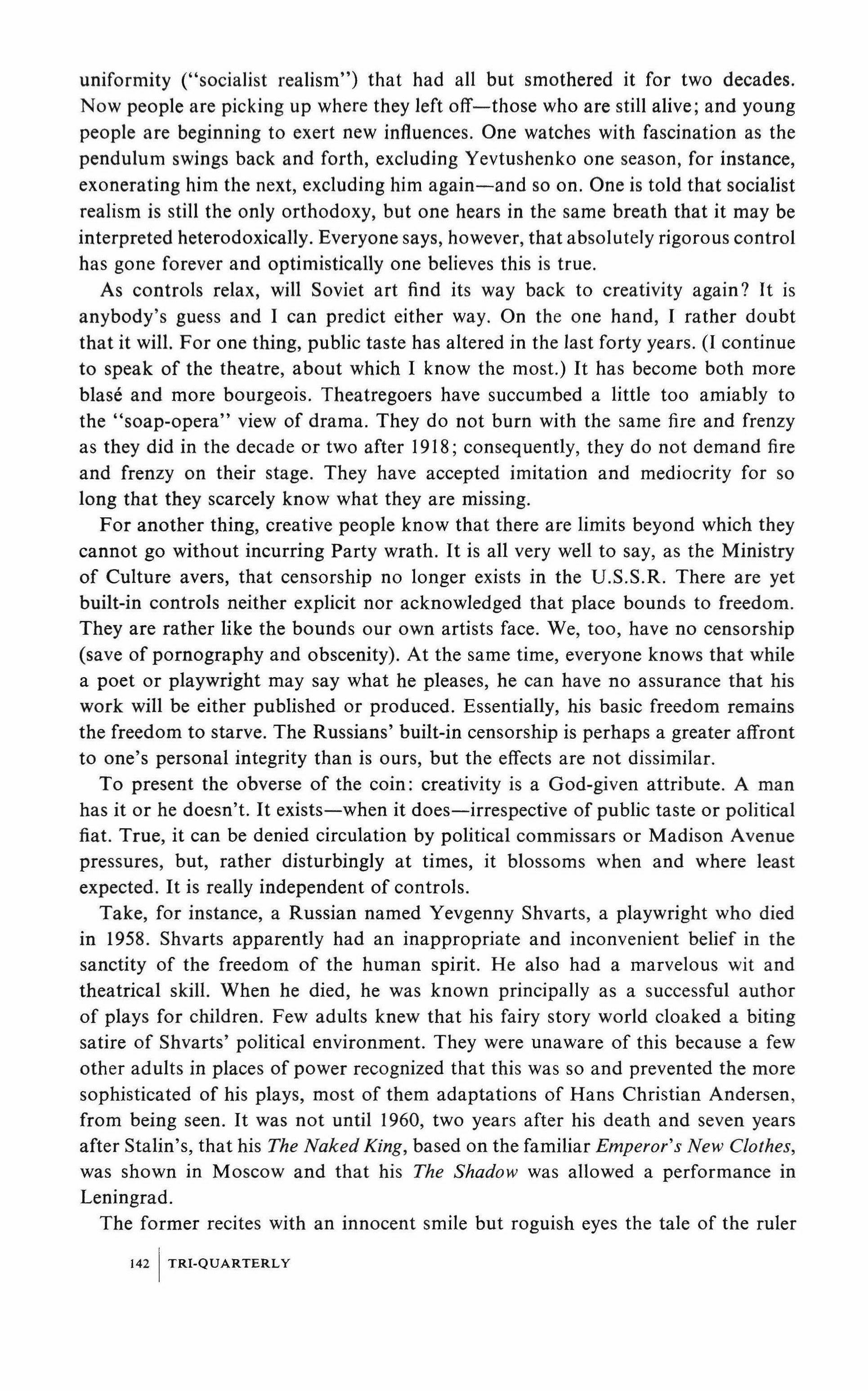
uniformity ("socialist realism") that had all but smothered it for two decades. Now people are picking up where they left off-those who are still alive; and young people are beginning to exert new influences. One watches with fascination as the pendulum swings back and forth, excluding Yevtushenko one season, for instance, exonerating him the next, excluding him again-and so on. One is told that socialist realism is still the only orthodoxy, but one hears in the same breath that it may be interpreted heterodoxically. Everyone says, however, that absolutely rigorous control has gone forever and optimistically one believes this is true.
As controls relax, will Soviet art find its way back to creativity again? It is anybody's guess and I can predict either way. On the one hand, 1 rather doubt that it will. For one thing, public taste has altered in the last forty years. (I continue to speak of the theatre, about which 1 know the most.) It has become both more blase and more bourgeois. Theatregoers have succumbed a little too amiably to the "soap-opera" view of drama. They do not burn with the same fire and frenzy as they did in the decade or two after 1918; consequently, they do not demand fire and frenzy on their stage. They have accepted imitation and mediocrity for so long that they scarcely know what they are missing.
For another thing, creative people know that there are limits beyond which they cannot go without incurring Party wrath. It is all very well to say, as the Ministry of Culture avers, that censorship no longer exists in the U.S.S.R. There are yet built-in controls neither explicit nor acknowledged that place bounds to freedom. They are rather like the bounds our own artists face. We, too, have no censorship (save of pornography and obscenity). At the same time, everyone knows that while a poet or playwright may say what he pleases, he can have no assurance that his work will be either published or produced. Essentially, his basic freedom remains the freedom to starve. The Russians' built-in censorship is perhaps a greater affront to one's personal integrity than is ours, but the effects are not dissimilar.
To present the obverse of the coin: creativity is a God-given attribute. A man has it or he doesn't. It exists-when it does-irrespective of public taste or political fiat. True, it can be denied circulation by political commissars or Madison Avenue pressures, but, rather disturbingly at times, it blossoms when and where least expected. It is really independent of controls.
Take, for instance, a Russian named Yevgenny Shvarts, a playwright who died in 1958. Shvarts apparently had an inappropriate and inconvenient belief in the sanctity of the freedom of the human spirit. He also had a marvelous wit and theatrical skill. When he died, he was known principally as a successful author of plays for children. Few adults knew that his fairy story world cloaked a biting satire of Shvarts' political environment. They were unaware of this because a few other adults in places of power recognized that this was so and prevented the more sophisticated of his plays, most of them adaptations of Hans Christian Andersen, from being seen. It was not until 1960, two years after his death and seven years after Stalin's, that his The Naked King, based on the familiar Emperor's New Clothes, was shown in Moscow and that his The Shadow was allowed a performance in Leningrad.
The former recites with an innocent smile but roguish eyes the tale of the ruler 1421 TRI-QUARTERLY
who ordered a new suit of clothes from a couple Ill' charlatan tailors. Unable to produce the garment, they nevertheless persuaded the emperor that their invisible product was superb, and the sycophantic court hailed the suit as becoming and beautiful. Encouraged by his courtiers' enthusiasm, the ruler walked through the streets to show off his new raiment and the populace, like the court, shouted its praises. But at last one little child piped up and said, "But, papa, the king hasn't anything on!" There was, as we all remember, a gasp from the crowd and then everyone began to laugh for, indeed, the emperor had nothing on.
The moral of this story was not lost on people who had grown up learning to cheer what wasn't there and to hail a ruler, whatever he proclaimed. And to anyone suspicious enough to assert that the author had created a devastating attack on a cowed and gullible citizenry, intent on hailing an empty leadership cloaked in quackery, the answer could always be made, "This is only an old Danish fairy tale the author is retelling. How can you say he's talking about our life here today?"
Two years later, as the thaw grew warmer, The Dragon was produced in Leningrad. Then, as the wind changed again, although scheduled for presentation the following season in Moscow, it was withdrawn from rehearsal and the Leningrad production was taken off the boards. Why? Surely because the eloquence of Shvarts' plea that a people must not allow themselves to become habituated to servitude struck too close to home for comfort.
Nevertheless, the creative spirit had asserted itself. The young intelligentsia had discovered Shvarts. His words had reached their ears; by his wit and gay humanity they had been delighted and warmed. His name was on every tongue. And when these plays were removed, their impact continued. Creativity can be controlled, it cannot be prevented.
What I love best are the houses city climbing heavenwards without feeling pious about it I love you cautiously, simply looking across eyes shaded with my hand from our street by the river not built-up as yet
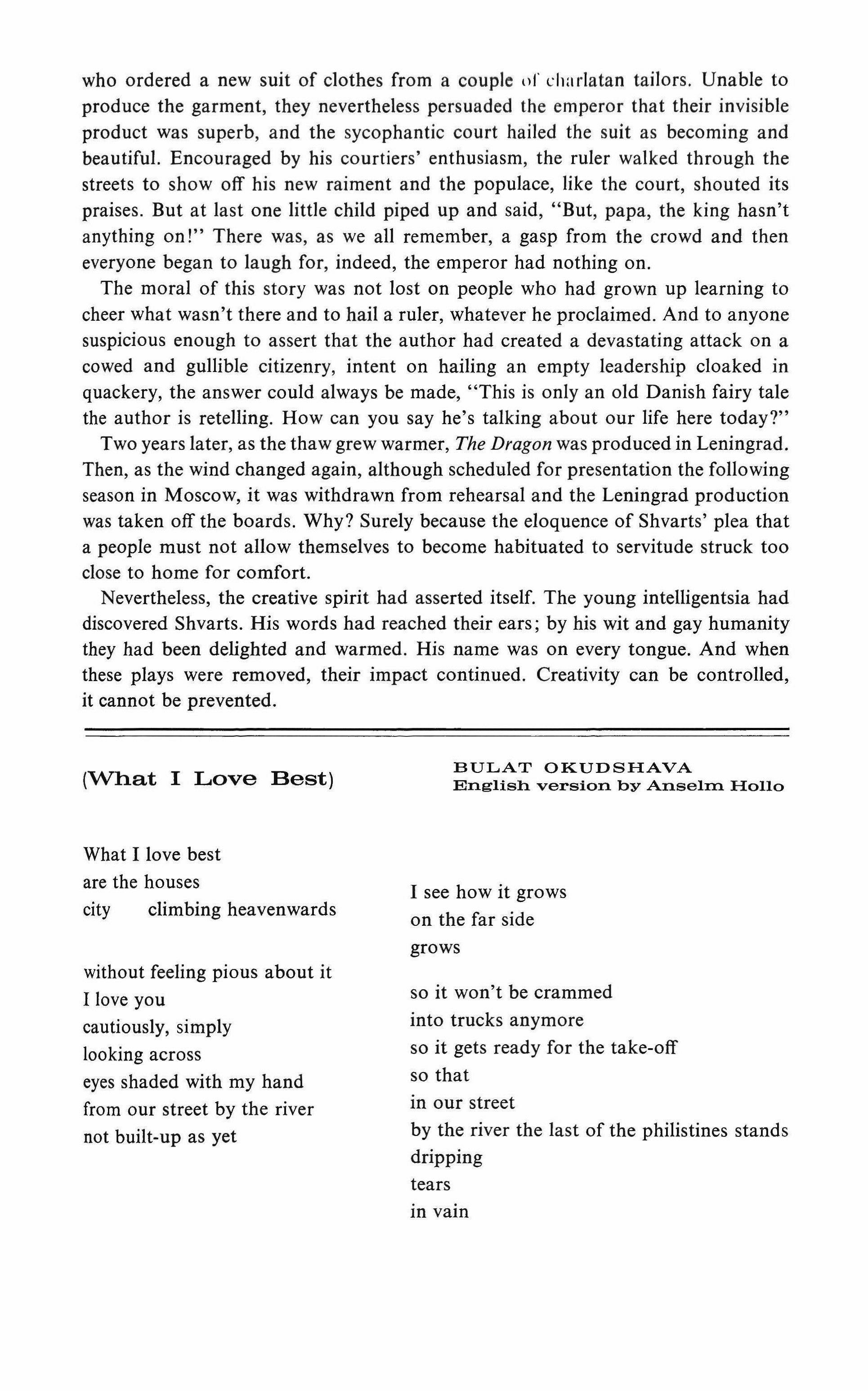
BULAT OKUDSHAVA
English version by Anselm Hollo
I see how it grows on the far side grows so it won't be crammed into trucks anymore so it gets ready for the take-off so that in our street by the river the last of the philistines stands dripping tears in vain
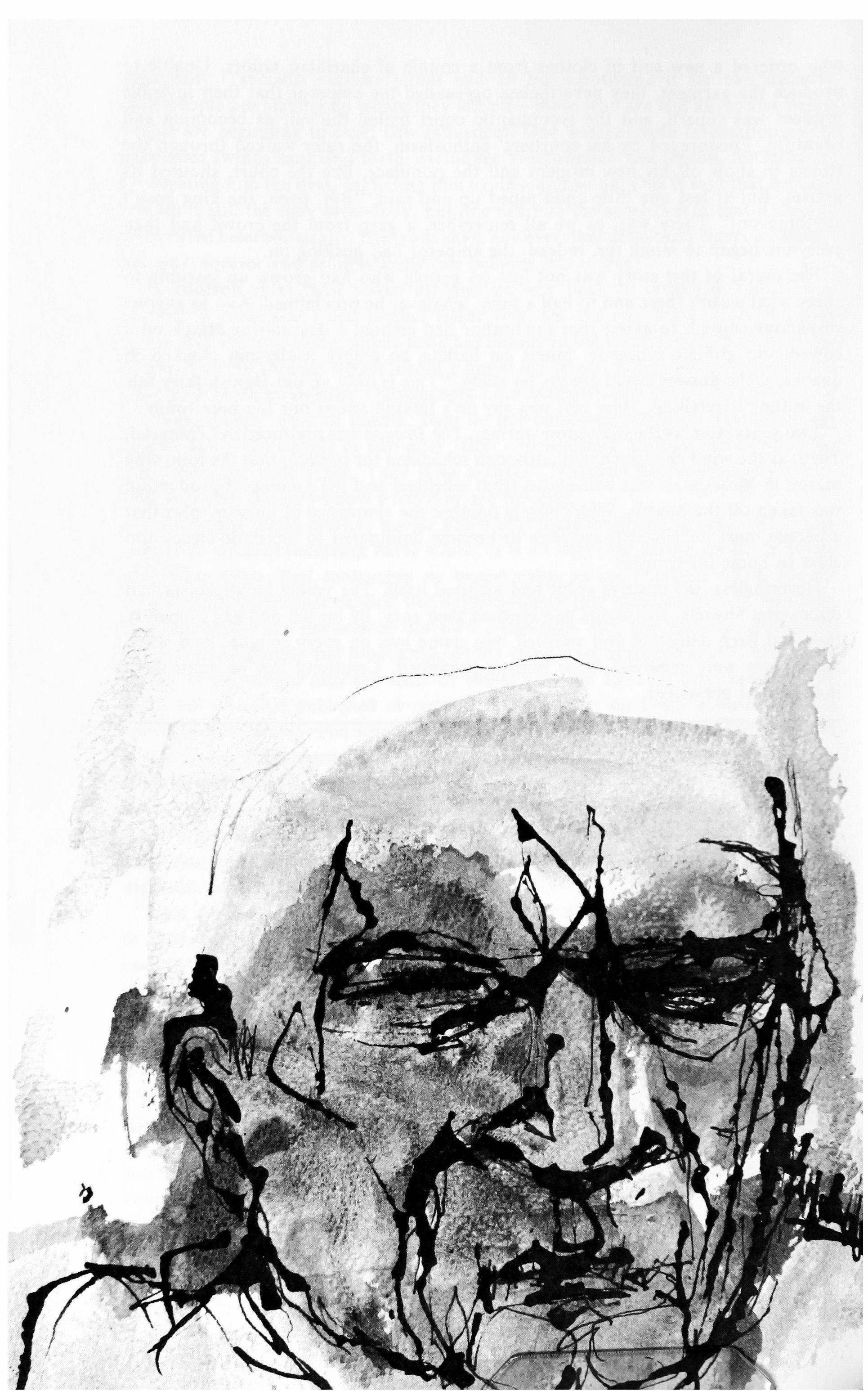

AMI THE MAN to interpret the Elegies correctly?" wrote Rilke to his Polish translator who had asked him for help in his difficult task, hoping that a few comments from the poet himself might ease his business of rendering The Duino Elegies in another language. But Rilke claimed the right to be as perplexed by them as the translator was. "They are infinitely beyond me," Rilke said. And having thus assumed, once again, the attitude of solemn innocence and genteel mysticism which had become the Orphic letter-writer's second nature, Rilke proceeded amply to supply the translator's demand. Had Rilke known Hegel's Aesthetics (which he did not know, if it is at all possible to be sure about such a negative assertion), he might have left the office of interpretation to the philosopher who, even in his own time, would have been amazingly competent to fill it. For at the climax of The Duino Elegies, the poet, with unparalleled energy and determination, does indeed drive poetry out of its Classical mind, insofar as the Classical mind of poetry (as of all other arts) has always sought, in the words of Hegel, its "objectivity" "in the sensuous externals of existence." But Romantic art, obedient to the prompting of the Hegelian Spirit's historical hour, has progressively abandoned such worldly ambition and, knowing that "there is something higher than the beautiful radiance of the Spirit in its immediate sensuous shape", in the end (and not least through Rilke) essays the seemingly impossible: namely, the demonstration, in its own sensuous medium, that the ultimate realization of the Spirit can be achieved only, as Hegel puts it, "in that form of existence which is truly appropriate to it: in the feeling and in the inward soul of man, indeed, in human inwardness," in a sphere inaccessible to the senses-for instance, in Rilke's Duino domain of the Invisible. "In this last epoch of art," Hegel writes, "the beauty of the Classical ideal can no longer be the alpha and omega of art." And Rilke in the First of the Duino Elegies:
TRI-QUARTERLY 1145
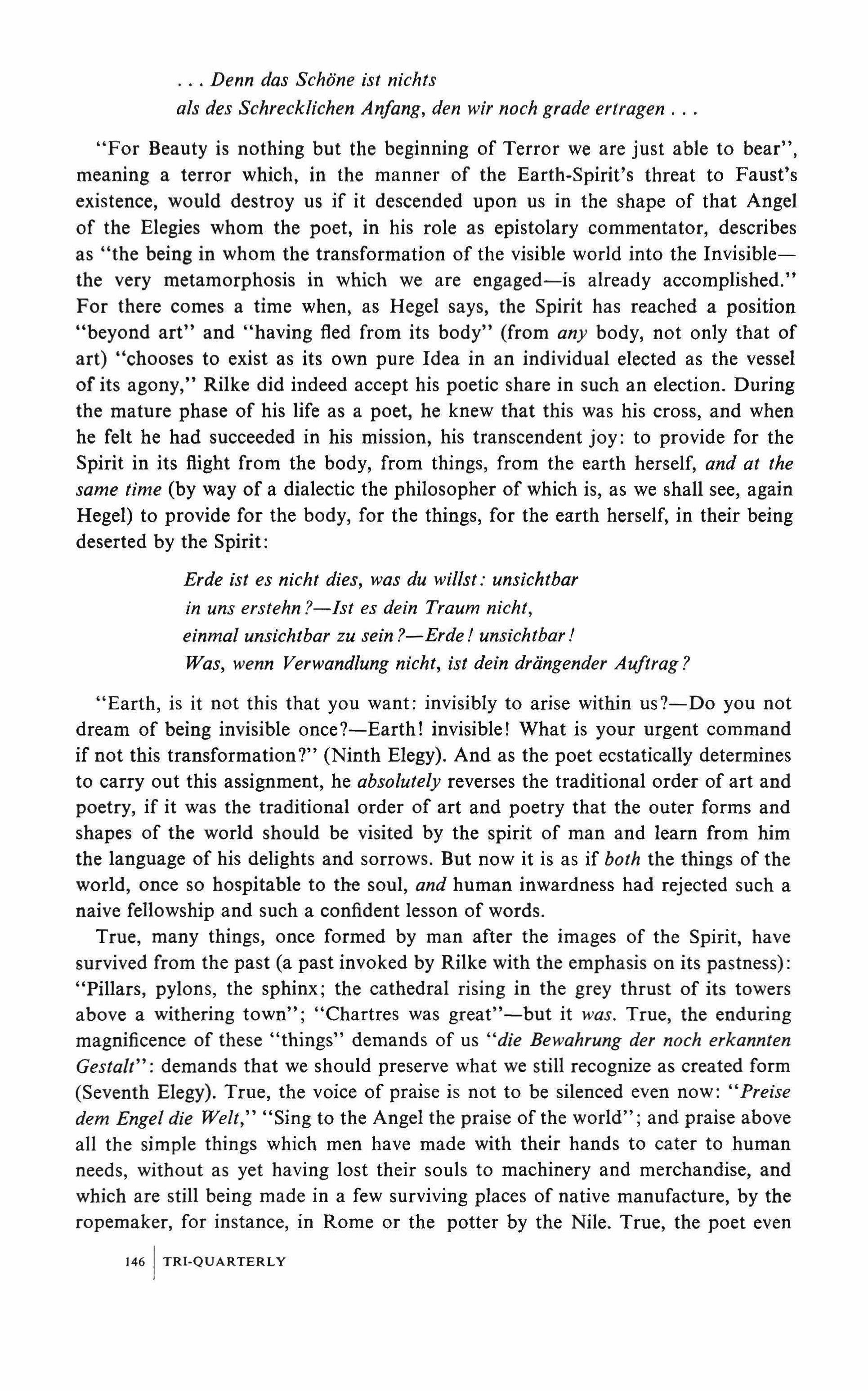
Denn das Schone ist nichts
als des Schrecklichen Anfang; den wir noch grade ertragen
"For Beauty is nothing but the beginning of Terror we are just able to bear", meaning a terror which, in the manner of the Earth-Spirit's threat to Faust's existence, would destroy us if it descended upon us in the shape of that Angel of the Elegies whom the poet, in his role as epistolary commentator, describes as "the being in whom the transformation of the visible world into the Invisiblethe very metamorphosis in which we are engaged-is already accomplished." For there comes a time when, as Hegel says, the Spirit has reached a position "beyond art" and "having fled from its body" (from any body, not only that of art) "chooses to exist as its own pure Idea in an individual elected as the vessel of its agony," Rilke did indeed accept his poetic share in such an election. During the mature phase of his life as a poet, he knew that this was his cross, and when he felt he had succeeded in his mission, his transcendent joy: to provide for the Spirit in its flight from the body, from things, from the earth herself, and at the same time (by way of a dialectic the philosopher of which is, as we shall see, again Hegel) to provide for the body, for the things, for the earth herself, in their being deserted by the Spirit:
Erde ist es nicht dies, was du willst: unsichtbar in uns erstehn ?-Ist es dein Traum nicht, einmal unsichtbar zu sein ?-Erde! unsichtbar ! Was, wenn Verwandlung nicht, ist dein drdngender Au/trag?
"Earth, is it not this that you want: invisibly to arise within us?-Do you not dream of being invisible once?-Earth! invisible! What is your urgent command if not this transformation?" (Ninth Elegy). And as the poet ecstatically determines to carry out this assignment, he absolutely reverses the traditional order of art and poetry, if it was the traditional order of art and poetry that the outer forms and shapes of the world should be visited by the spirit of man and learn from him the language of his delights and sorrows. But now it is as if both the things of the world, once so hospitable to the soul, and human inwardness had rejected such a naive fellowship and such a confident lesson of words.
True, many things, once formed by man after the images of the Spirit, have survived from the past (a past invoked by Rilke with the emphasis on its pastness): "Pillars, pylons, the sphinx; the cathedral rising in the grey thrust of its towers above a withering town"; "Chartres was great"-but it was. True, the enduring magnificence of these "things" demands of us "die Bewahrung der noch erkannten Gestalt": demands that we should preserve what we still recognize as created form (Seventh Elegy). True, the voice of praise is not to be silenced even now: "Preise dem Engel die Welt," "Sing to the Angel the praise of the world"; and praise above all the simple things which men have made with their hands to cater to human needs, without as yet having lost their souls to machinery and merchandise, and which are still being made in a few surviving places of native manufacture, by the ropemaker, for instance, in Rome or the potter by the Nile. True, the poet even
TRI-QUARTERLY
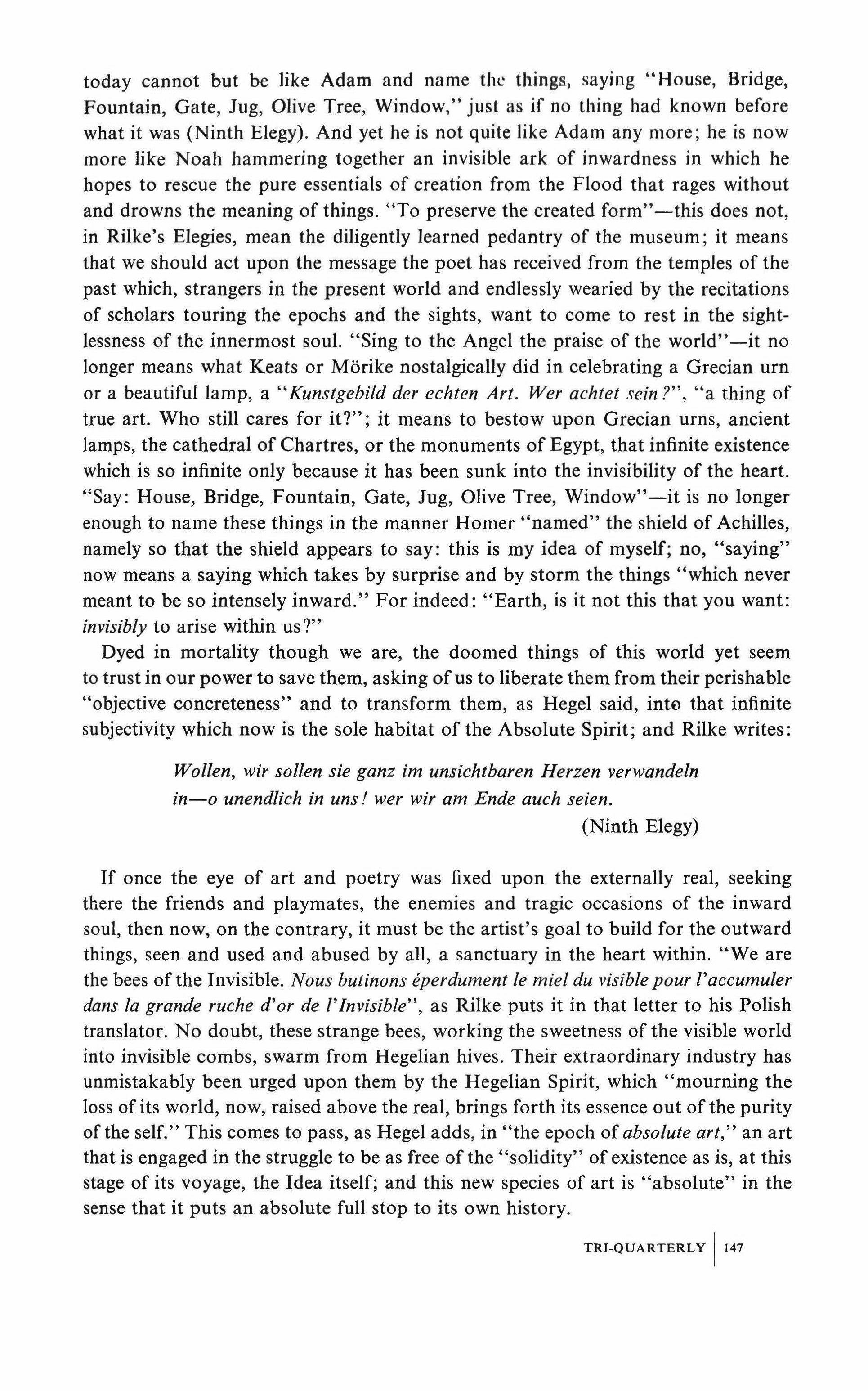
today cannot but be like Adam and name the things, saying House, Bridge, Fountain, Gate, Jug, Olive Tree, Window," just as if no thing had known before what it was (Ninth Elegy). And yet he is not quite like Adam any more; he is now more like Noah hammering together an invisible ark of inwardness in which he hopes to rescue the pure essentials of creation from the Flood that rages without and drowns the meaning of things. "To preserve the created form"-this does not, in Rilke's Elegies, mean the diligently learned pedantry of the museum; it means that we should act upon the message the poet has received from the temples of the past which, strangers in the present world and endlessly wearied by the recitations of scholars touring the epochs and the sights, want to come to rest in the sightlessness of the innermost soul. "Sing to the Angel the praise of the world"-it no longer means what Keats or Morike nostalgically did in celebrating a Grecian urn or a beautiful lamp, a "Kunstgebild del' echten Art. Wer achtet sein ?", "a thing of true art. Who still cares for it?"; it means to bestow upon Grecian urns, ancient lamps, the cathedral of Chartres, or the monuments of Egypt, that infinite existence which is so infinite only because it has been sunk into the invisibility of the heart. "Say: House, Bridge, Fountain, Gate, Jug, Olive Tree, Window"-it is no longer enough to name these things in the manner Homer "named" the shield of Achilles, namely so that the shield appears to say: this is my idea of myself; no, "saying" now means a saying which takes by surprise and by storm the things "which never meant to be so intensely inward." For indeed: "Earth, is it not this that you want: invisibly to arise within us?"
Dyed in mortality though we are, the doomed things of this world yet seem to trust in our power to save them, asking of us to liberate them from their perishable "objective concreteness" and to transform them, as Hegel said, into that infinite subjectivity which now is the sole habitat of the Absolute Spirit; and Rilke writes:
Wollen, wir sollen sie ganz im unsichtbaren Herzen verwandeln in-o unendlich in uns! wer wir am Ende auch seien.
(Ninth Elegy)
If once the eye of art and poetry was fixed upon the externally real, seeking there the friends and playmates, the enemies and tragic occasions of the inward soul, then now, on the contrary, it must be the artist's goal to build for the outward things, seen and used and abused by all, a sanctuary in the heart within. "We are the bees of the Invisible. Nous butinons eperdument Ie miel du visible pour l'accumuler dans la grande ruche d' or de l'Invisible" as Rilke puts it in that letter to his Polish translator. No doubt, these strange bees, working the sweetness of the visible world into invisible combs, swarm from Hegelian hives. Their extraordinary industry has unmistakably been urged upon them by the Hegelian Spirit, which "mourning the loss of its world, now, raised above the real, brings forth its essence out of the purity of the self." This comes to pass, as Hegel adds, in "the epoch of absolute art," an art that is engaged in the struggle to be as free of the "solidity" of existence as is, at this stage of its voyage, the Idea itself; and this new species of art is "absolute" in the sense that it puts an absolute full stop to its own history.
TRI-QUARTERLY 1147
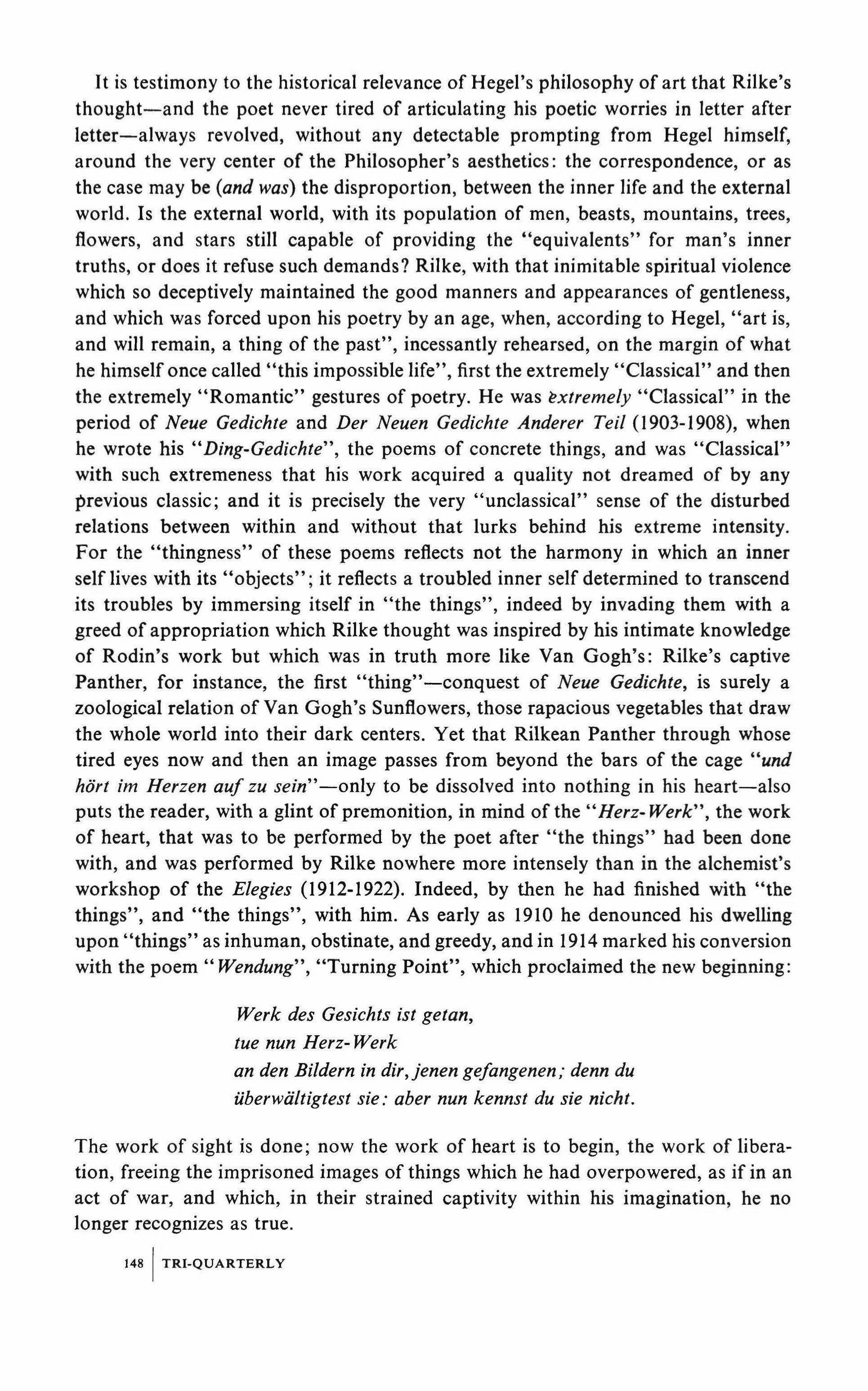
It is testimony to the historical relevance of Hegel's philosophy of art that Rilke's thought-and the poet never tired of articulating his poetic worries in letter after letter-always revolved, without any detectable prompting from Hegel himself, around the very center of the Philosopher's aesthetics: the correspondence, or as the case may be (and was) the disproportion, between the inner life and the external world. Is the external world, with its population of men, beasts, mountains, trees, flowers, and stars still capable of providing the "equivalents" for man's inner truths, or does it refuse such demands? Rilke, with that inimitable spiritual violence which so deceptively maintained the good manners and appearances of gentleness, and which was forced upon his poetry by an age, when, according to Hegel, "art is, and will remain, a thing of the past", incessantly rehearsed, on the margin of what he himself once called "this impossible life", first the extremely "Classical" and then the extremely "Romantic" gestures of poetry. He was extremely "Classical" in the period of Neue Gedichte and Der Neuen Gedichte Anderer Teil (I903-1908), when he wrote his "Ding-Gedichte", the poems of concrete things, and was "Classical" with such extremeness that his work acquired a quality not dreamed of by any previous classic; and it is precisely the very "unclassical" sense of the disturbed relations between within and without that lurks behind his extreme intensity. For the "thingness" of these poems reflects not the harmony in which an inner self lives with its "objects"; it reflects a troubled inner self determined to transcend its troubles by immersing itself in "the things", indeed by invading them with a greed of appropriation which Rilke thought was inspired by his intimate knowledge of Rodin's work but which was in truth more like Van Gogh's: Rilke's captive Panther, for instance, the first "thing"-conquest of Neue Gedichte, is surely a zoological relation of Van Gogh's Sunflowers, those rapacious vegetables that draw the whole world into their dark centers. Yet that Rilkean Panther through whose tired eyes now and then an image passes from beyond the bars of the cage "und hort im Herzen auf zu sein"-only to be dissolved into nothing in his heart-also puts the reader, with a glint of premonition, in mind of the"Herz- Werk", the work of heart, that was to be performed by the poet after "the things" had been done with, and was performed by Rilke nowhere more intensely than in the alchemist's workshop of the Elegies (1912-1922). Indeed, by then he had finished with "the things", and "the things", with him. As early as 1910 he denounced his dwelling upon "things" as inhuman, obstinate, and greedy, and in 1914 marked his conversion with the poem" Wendung", "Turning Point", which proclaimed the new beginning:
Werk des Gesichts ist getan, tue nun Herz- Werk an den Bildern in dir.jenen gefangenen; denn du iiberwiiltigtest sie: aber nun kennst du sie nicht,
The work of sight is done; now the work of heart is to begin, the work of liberation, freeing the imprisoned images of things which he had overpowered, as if in an act of war, and which, in their strained captivity within his imagination, he no longer recognizes as true.
TRI-QUARTERLY
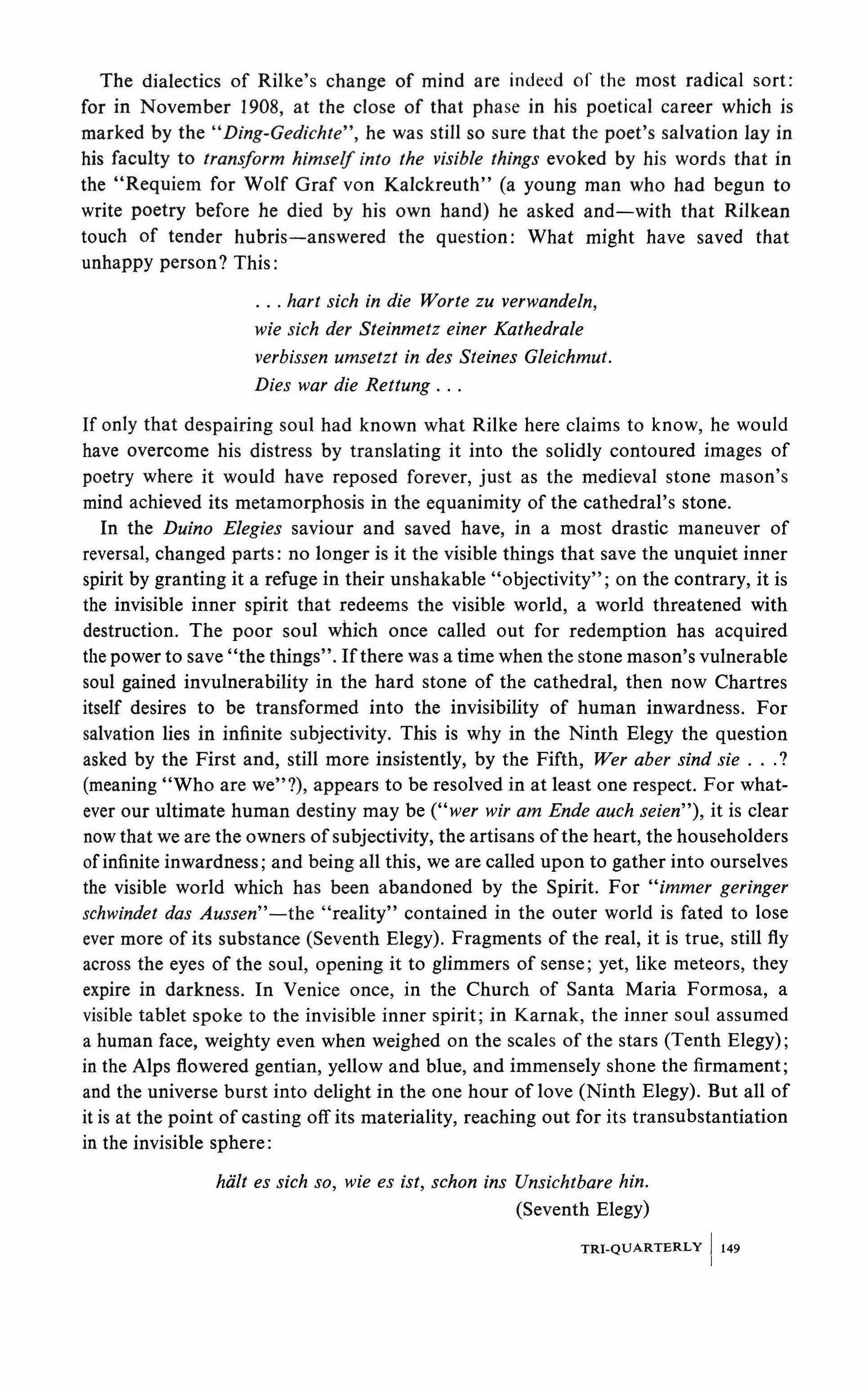
The dialectics of Rilke's change of mind are indeed of the most radical sort: for in November 1908, at the close of that phase in his poetical career which is marked by the"Ding-Gedichte", he was still so sure that the poet's salvation lay in his faculty to transform himself into the visible things evoked by his words that in the "Requiem for Wolf Graf von Kalckreuth" (a young man who had begun to write poetry before he died by his own hand) he asked and-with that Rilkean touch of tender hubris-answered the question: What might have saved that unhappy person? This:
hart sich in die Worte zu verwandeln, wie sich der Steinmetz einer Kathedrale verbissen umsetzt in des Steines Gleichmut. Dies war die Rettung
If only that despairing soul had known what Rilke here claims to know, he would have overcome his distress by translating it into the solidly contoured images of poetry where it would have reposed forever, just as the medieval stone mason's mind achieved its metamorphosis in the equanimity of the cathedral's stone.
In the Duino Elegies saviour and saved have, in a most drastic maneuver of reversal, changed parts: no longer is it the visible things that save the unquiet inner spirit by granting it a refuge in their unshakable "objectivity"; on the contrary, it is the invisible inner spirit that redeems the visible world, a world threatened with destruction. The poor soul which once called out for redemption has acquired the power to save "the things". Ifthere was a time when the stone mason's vulnerable soul gained invulnerability in the hard stone of the cathedral, then now Chartres itself desires to be transformed into the invisibility of human inwardness. For salvation lies in infinite subjectivity. This is why in the Ninth Elegy the question asked by the First and, still more insistently, by the Fifth, Wer aber sind sie ? (meaning "Who are we"?), appears to be resolved in at least one respect. For whatever our ultimate human destiny may be ("wer wir am Ende auch seien"), it is clear now that we are the owners of subjectivity, the artisans of the heart, the householders ofinfinite inwardness; and being all this, we are called upon to gather into ourselves the visible world which has been abandoned by the Spirit. For "immer geringer schwindet das Aussen -the "reality" contained in the outer world is fated to lose ever more of its substance (Seventh Elegy). Fragments of the real, it is true, still fly across the eyes of the soul, opening it to glimmers of sense; yet, like meteors, they expire in darkness. In Venice once, in the Church of Santa Maria Formosa, a visible tablet spoke to the invisible inner spirit; in Karnak, the inner soul assumed a human face, weighty even when weighed on the scales of the stars (Tenth Elegy); in the Alps flowered gentian, yellow and blue, and immensely shone the firmament; and the universe burst into delight in the one hour of love (Ninth Elegy). But all of it is at the point of casting off its materiality, reaching out for its transubstantiation in the invisible sphere:
halt es siclt so, wie es ist, schon ins Unsichtbare hin.
(Seventh Elegy)
TRI-QUARTERLY 1149
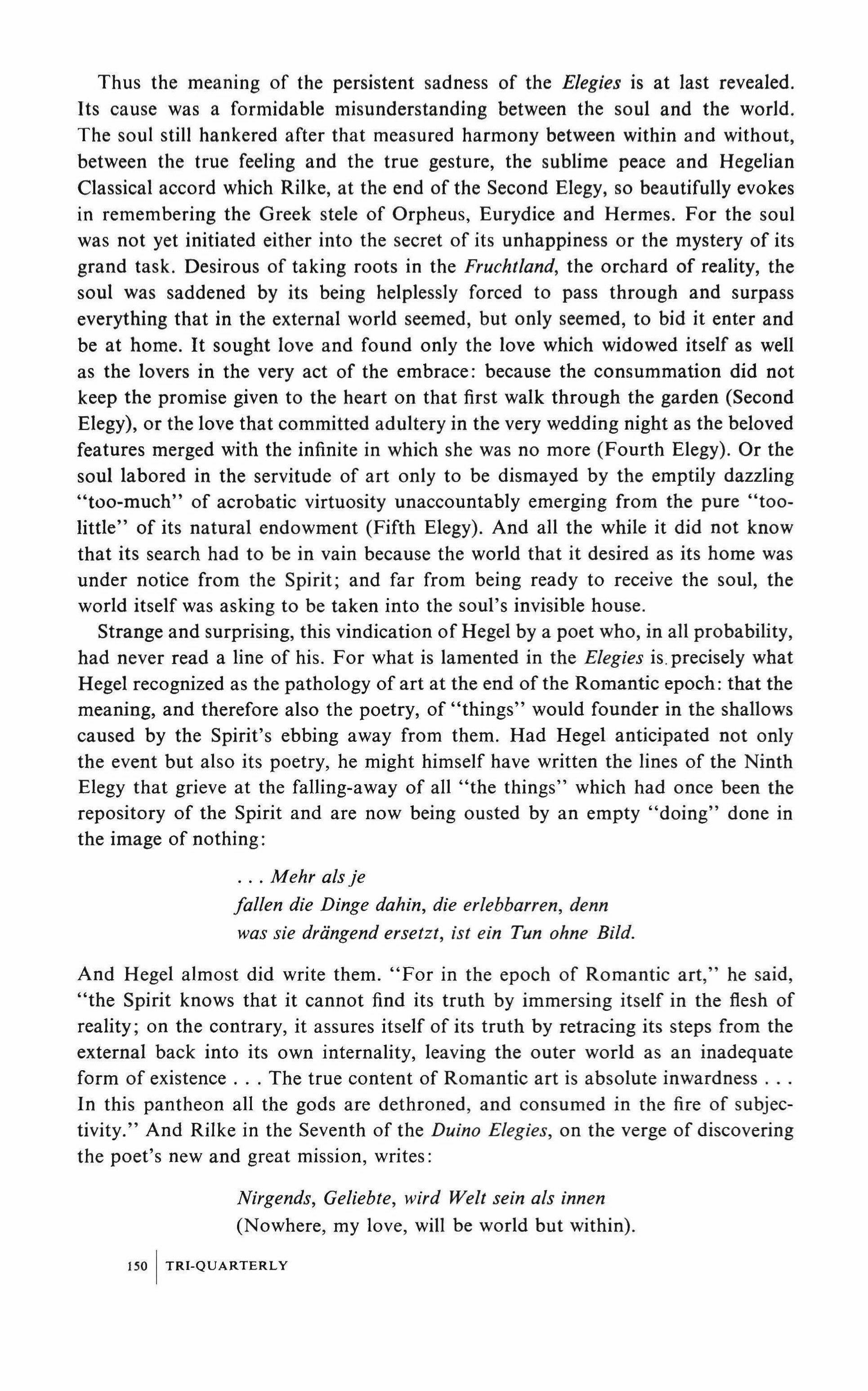
Thus the meaning of the persistent sadness of the Elegies is at last revealed. Its cause was a formidable misunderstanding between the soul and the world. The soul still hankered after that measured harmony between within and without, between the true feeling and the true gesture, the sublime peace and Hegelian Classical accord which Rilke, at the end of the Second Elegy, so beautifully evokes in remembering the Greek stele of Orpheus, Eurydice and Hermes. For the soul was not yet initiated either into the secret of its unhappiness or the mystery of its grand task. Desirous of taking roots in the Fruchtland, the orchard of reality, the soul was saddened by its being helplessly forced to pass through and surpass everything that in the external world seemed, but only seemed, to bid it enter and be at home. It sought love and found only the love which widowed itself as well as the lovers in the very act of the embrace: because the consummation did not keep the promise given to the heart on that first walk through the garden (Second Elegy), or the love that committed adultery in the very wedding night as the beloved features merged with the infinite in which she was no more (Fourth Elegy). Or the soul labored in the servitude of art only to be dismayed by the emptily dazzling "too-much" of acrobatic virtuosity unaccountably emerging from the pure "toolittle" of its natural endowment (Fifth Elegy). And all the while it did not know that its search had to be in vain because the world that it desired as its home was under notice from the Spirit; and far from being ready to receive the soul, the world itself was asking to be taken into the soul's invisible house.
Strange and surprising, this vindication of Hegel by a poet who, in all probability, had never read a line of his. For what is lamented in the Elegies is. precisely what Hegel recognized as the pathology of art at the end of the Romantic epoch: that the meaning, and therefore also the poetry, of "things" would founder in the shallows caused by the Spirit's ebbing away from them. Had Hegel anticipated not only the event but also its poetry, he might himself have written the lines of the Ninth Elegy that grieve at the falling-away of all "the things" which had once been the repository of the Spirit and are now being ousted by an empty "doing" done in the image of nothing:
Mehr alsje fallen die Dinge dahin, die erlebbarren, denn was sie drdngend ersetzt, ist ein Tun ohne BUd.
And Hegel almost did write them. "For in the epoch of Romantic art," he said, "the Spirit knows that it cannot find its truth by immersing itself in the flesh of reality; on the contrary, it assures itself of its truth by retracing its steps from the external back into its own internality, leaving the outer world as an inadequate form of existence The true content of Romantic art is absolute inwardness In this pantheon all the gods are dethroned, and consumed in the fire of subjectivity." And Rilke in the Seventh of the Duino Elegies, on the verge of discovering the poet's new and great mission, writes:
Nirgends, Geliebte, wird Welt sein als innen (Nowhere, my love, will be world but within). 150 TRI-QUARTERLY
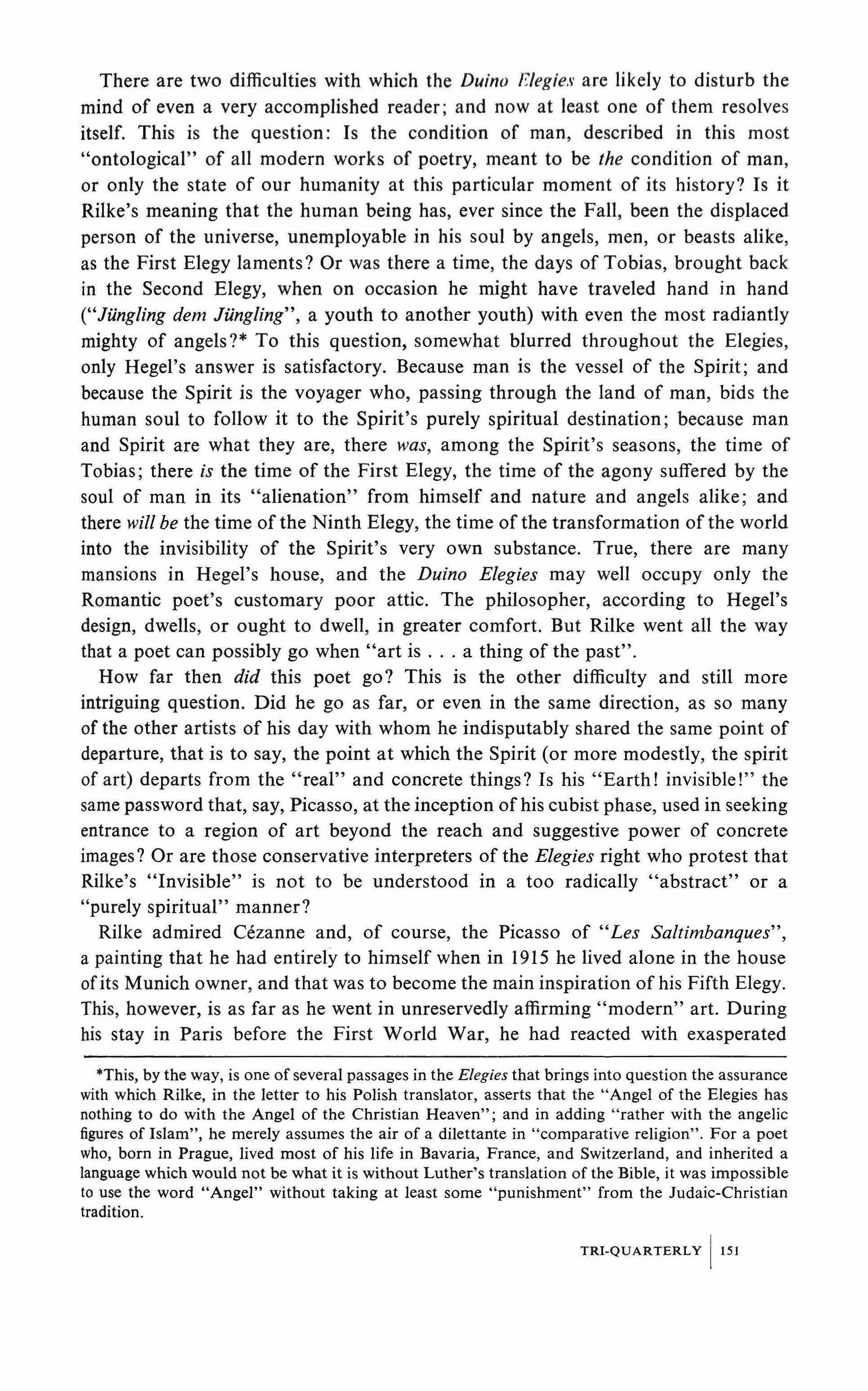
There are two difficulties with which the Duino Elegies are likely to disturb the mind of even a very accomplished reader; and now at least one of them resolves itself. This is the question: Is the condition of man, described in this most "ontological" of all modern works of poetry, meant to be the condition of man, or only the state of our humanity at this particular moment of its history? Is it Rilke's meaning that the human being has, ever since the Fall, been the displaced person of the universe, unemployable in his soul by angels, men, or beasts alike, as the First Elegy laments? Or was there a time, the days of Tobias, brought back in the Second Elegy, when on occasion he might have traveled hand in hand ("Jiingling dem Jiingling", a youth to another youth) with even the most radiantly mighty of angels?* To this question, somewhat blurred throughout the Elegies, only Hegel's answer is satisfactory. Because man is the vessel of the Spirit; and because the Spirit is the voyager who, passing through the land of man, bids the human soul to follow it to the Spirit's purely spiritual destination; because man and Spirit are what they are, there was, among the Spirit's seasons, the time of Tobias; there is the time of the First Elegy, the time of the agony suffered by the soul of man in its "alienation" from himself and nature and angels alike; and there will be the time of the Ninth Elegy, the time of the transformation of the world into the invisibility of the Spirit's very own substance. True, there are many mansions in Hegel's house, and the Duino Elegies may well occupy only the Romantic poet's customary poor attic. The philosopher, according to Hegel's design, dwells, or ought to dwell, in greater comfort. But Rilke went all the way that a poet can possibly go when "art is a thing of the past".
How far then did this poet go? This is the other difficulty and still more intriguing question. Did he go as far, or even in the same direction, as so many of the other artists of his day with whom he indisputably shared the same point of departure, that is to say, the point at which the Spirit (or more modestly, the spirit of art) departs from the "real" and concrete things? Is his "Earth! invisible!" the same password that, say, Picasso, at the inception of his cubist phase, used in seeking entrance to a region of art beyond the reach and suggestive power of concrete images? Or are those conservative interpreters of the Elegies right who protest that RiIke's "Invisible" is not to be understood in a too radically "abstract" or a "purely spiritual" manner?
Rilke admired Cezanne and, of course, the Picasso of "Les Saltimbanques", a painting that he had entirely to himself when in 1915 he lived alone in the house ofits Munich owner, and that was to become the main inspiration of his Fifth Elegy. This, however, is as far as he went in unreservedly affirming "modern" art. During his stay in Paris before the First World War, he had reacted with exasperated
*This, by the way, is one of several passages in the Elegies that brings into question the assurance with which Rilke, in the letter to his Polish translator, asserts that the "Angel of the Elegies has nothing to do with the Angel of the Christian Heaven"; and in adding "rather with the angelic figures of Islam", he merely assumes the air of a dilettante in "comparative religion". For a poet who, born in Prague, lived most of his life in Bavaria, France, and Switzerland, and inherited a language which would not be what it is without Luther's translation of the Bible, it was impossible to use the word "Angel" without taking at least some "punishment" from the Judaic-Christian tradition.
TRI-QUARTERLY 151
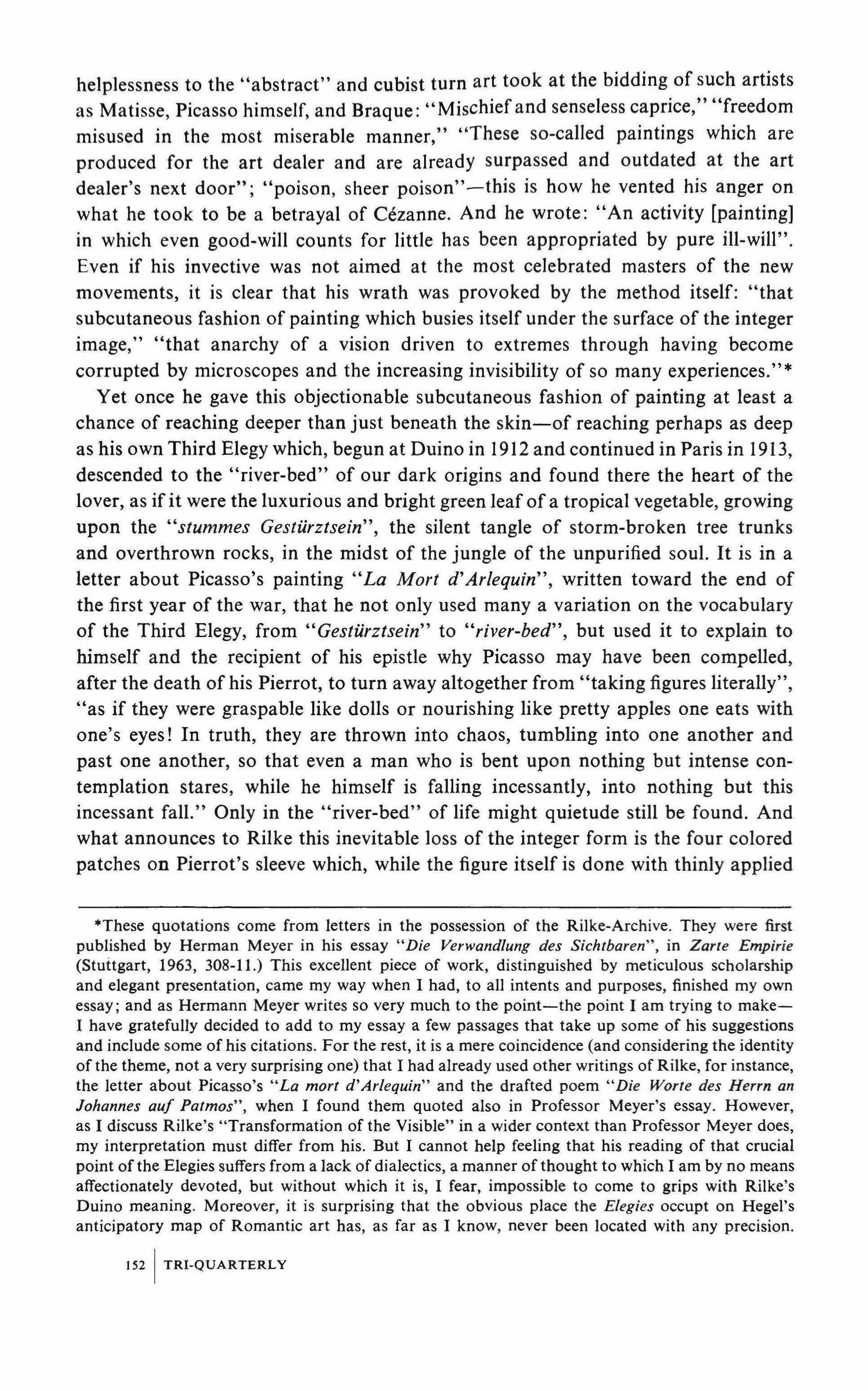
helplessness to the "abstract" and cubist turn art took at the bidding of such artists as Matisse, Picasso himself, and Braque: "Mischief and senseless caprice," "freedom misused in the most miserable manner," "These so-called paintings which are produced for the art dealer and are already surpassed and outdated at the art dealer's next door"; "poison, sheer poison"-this is how he vented his anger on what he took to be a betrayal of Cezanne. And he wrote: "An activity [painting] in which even good-will counts for little has been appropriated by pure ill-will". Even if his invective was not aimed at the most celebrated masters of the new movements, it is clear that his wrath was provoked by the method itself: "that subcutaneous fashion of painting which busies itself under the surface of the integer image," "that anarchy of a vision driven to extremes through having become corrupted by microscopes and the increasing invisibility of so many experiences." *
Yet once he gave this objectionable subcutaneous fashion of painting at least a chance of reaching deeper than just beneath the skin-of reaching perhaps as deep as his own Third Elegy which, begun at Duino in 1912 and continued in Paris in 1913, descended to the "river-bed" of our dark origins and found there the heart of the lover, as if it were the luxurious and bright green leaf of a tropical vegetable, growing upon the "stummes Gestiirztsein", the silent tangle of storm-broken tree trunks and overthrown rocks, in the midst of the jungle of the unpurified soul. It is in a letter about Picasso's painting "La Mort d'Arlequin", written toward the end of the first year of the war, that he not only used many a variation on the vocabulary of the Third Elegy, from "Gestiirztsein" to "river-bed", but used it to explain to himself and the recipient of his epistle why Picasso may have been compelled, after the death of his Pierrot, to turn away altogether from "taking figures literally", "as if they were graspable like dolls or nourishing like pretty apples one eats with one's eyes! In truth, they are thrown into chaos, tumbling into one another and past one another, so that even a man who is bent upon nothing but intense contemplation stares, while he himself is falling incessantly, into nothing but this incessant fall." Only in the "river-bed" of life might quietude still be found. And what announces to Rilke this inevitable loss of the integer form is the four colored patches on Pierrot's sleeve which, while the figure itself is done with thinly applied
"These quotations come from letters in the possession of the Rilke-Archive. They were first published by Herman Meyer in his essay "Die Verwandlung des Sichtbaren"; in Zarte Empirie (Stuttgart, 1963, 308-11.) This excellent piece of work, distinguished by meticulous scholarship and elegant presentation, came my way when I had, to all intents and purposes, finished my own essay; and as Hermann Meyer writes so very much to the point-the point I am trying to makeI have gratefully decided to add to my essay a few passages that take up some of his suggestions and include some of his citations. For the rest, it is a mere coincidence (and considering the identity of the theme, not a very surprising one) that I had already used other writings of Rilke, for instance, the letter about Picasso's "La mort d'Arlequin" and the drafted poem "Die Worte des Herrn an Johannes auf Patmos"; when I found them quoted also in Professor Meyer's essay. However, as I discuss Rilke's "Transformation of the Visible" in a wider context than Professor Meyer does, my interpretation must differ from his. But I cannot help feeling that his reading of that crucial point of the Elegies suffers from a lack of dialectics, a manner of thought to which I am by no means affectionately devoted, but without which it is, I fear, impossible to come to grips with Rilke's Duino meaning. Moreover, it is surprising that the obvious place the Elegies occupt on Hegel's anticipatory map of Romantic art has, as far as I know, never been located with any precision.
1521 TRI-QUARTERLY
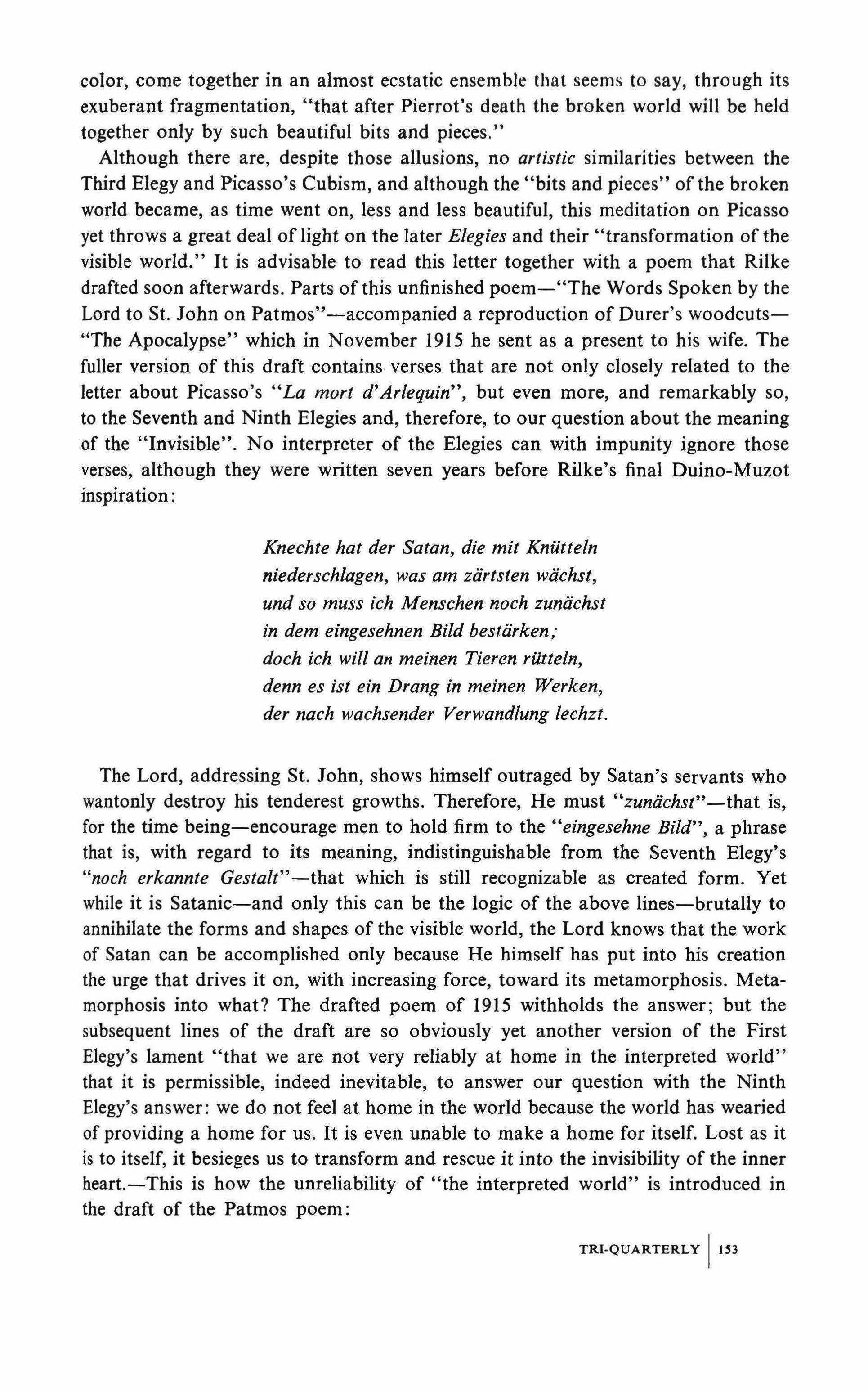
color, come together in an almost ecstatic ensemble that seems to say, through its exuberant fragmentation, "that after Pierrot's death the broken world will be held together only by such beautiful bits and pieces."
Although there are, despite those allusions, no artistic similarities between the Third Elegy and Picasso's Cubism, and although the "bits and pieces" of the broken world became, as time went on, less and less beautiful, this meditation on Picasso yet throws a great deal of light on the later Elegies and their "transformation of the visible world." It is advisable to read this letter together with a poem that Rilke drafted soon afterwards. Parts of this unfinished poem=-t'The Words Spoken by the Lord to St. John on Patmos"-accompanied a reproduction of Durer's woodcuts"The Apocalypse" which in November 1915 he sent as a present to his wife. The fuller version of this draft contains verses that are not only closely related to the letter about Picasso's "La mort d'Arlequin", but even more, and remarkably so, to the Seventh and Ninth Elegies and, therefore, to our question about the meaning of the "Invisible". No interpreter of the Elegies can with impunity ignore those verses, although they were written seven years before Rilke's final Duino-Muzot inspiration:
Knechte hat der Satan, die mit Kniitteln niederschlagen, was am zdrtsten wdchst, und so muss ich Menschen noch zundchst in dem eingesehnen BUd bestiirken; doch ich will an meinen Tieren riitteln, denn es ist ein Drang in meinen Werken, der nach wachsender Verwandlung lechzt.
The Lord, addressing St. John, shows himself outraged by Satan's servants who wantonly destroy his tenderest growths. Therefore, He must "zuniichst"-that is, for the time being-encourage men to hold firm to the "eingesehne BUd", a phrase that is, with regard to its meaning, indistinguishable from the Seventh Elegy's "noch erkannte Gestalt"-that which is still recognizable as created form. Yet while it is Satanic-and only this can be the logic of the above lines-brutally to annihilate the forms and shapes of the visible world, the Lord knows that the work of Satan can be accomplished only because He himself has put into his creation the urge that drives it on, with increasing force, toward its metamorphosis. Metamorphosis into what? The drafted poem of 1915 withholds the answer; but the subsequent lines of the draft are so obviously yet another version of the First Elegy's lament "that we are not very reliably at home in the interpreted world" that it is permissible, indeed inevitable, to answer our question with the Ninth Elegy's answer: we do not feel at home in the world because the world has wearied of providing a home for us. It is even unable to make a home for itself. Lost as it is to itself, it besieges us to transform and rescue it into the invisibility of the inner heart.-This is how the unreliability of "the interpreted world" is introduced in the draft of the Patmos poem:
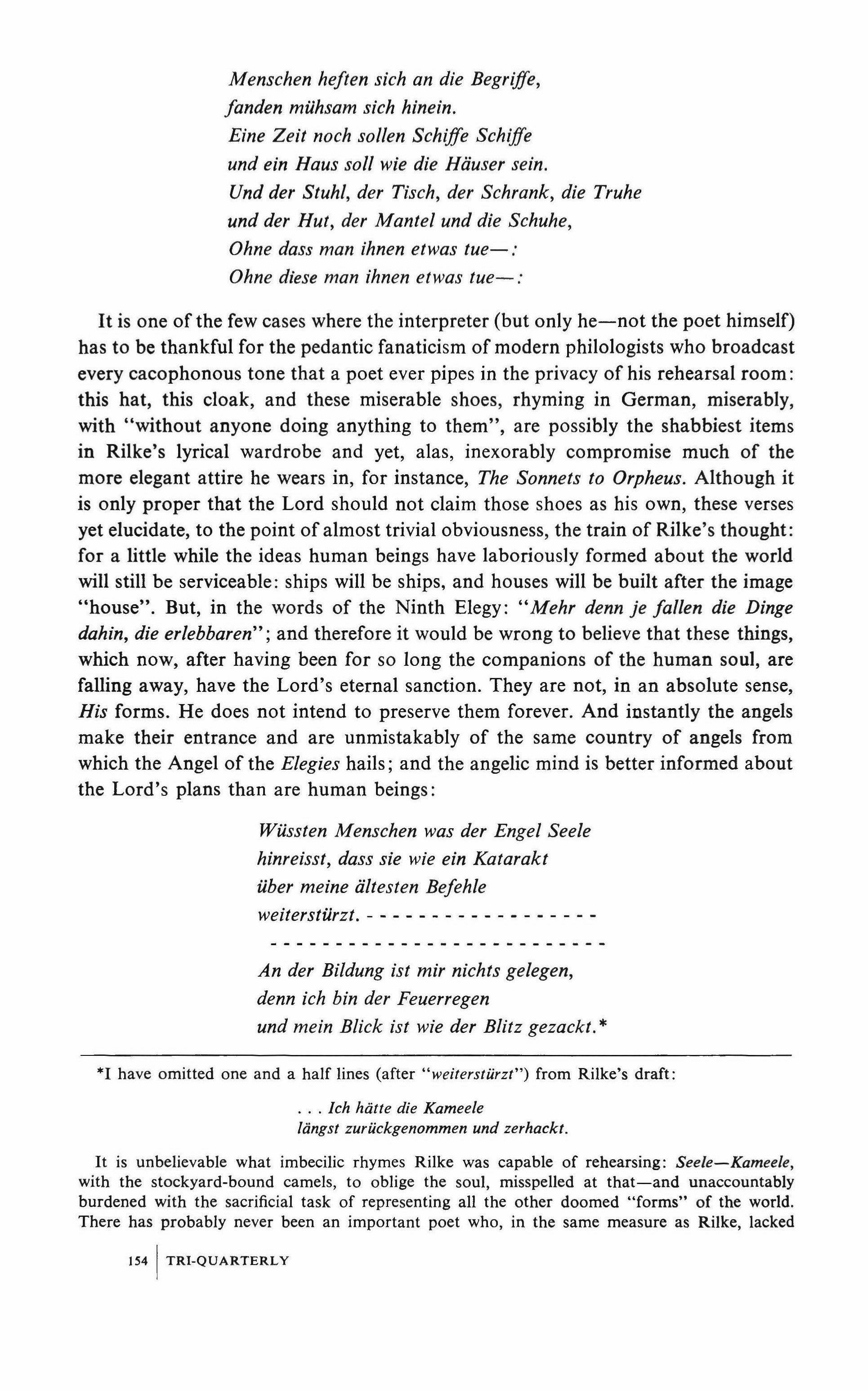
Menschen heften sich an die Begriffe, fanden miihsam sich hinein.
Eine Zeit noch sollen Schiffe Schiffe und ein Haus soil wie die Hauser sein. Und der Stuhl, der Tisch, der Schrank, die Truhe und der Hut, der Mantel und die Schuhe, Ohne dass man ihnen etwas tue-: Ohne diese man ihnen etwas tue-:
It is one of the few cases where the interpreter (but only he-not the poet himself) has to be thankful for the pedantic fanaticism of modern philologists who broadcast every cacophonous tone that a poet ever pipes in the privacy of his rehearsal room: this hat, this cloak, and these miserable shoes, rhyming in German, miserably, with "without anyone doing anything to them", are possibly the shabbiest items in Rilke's lyrical wardrobe and yet, alas, inexorably compromise much of the more elegant attire he wears in, for instance, The Sonnets to Orpheus. Although it is only proper that the Lord should not claim those shoes as his own, these verses yet elucidate, to the point of almost trivial obviousness, the train of Rilke's thought: for a little while the ideas human beings have laboriously formed about the world will still be serviceable: ships will be ships, and houses will be built after the image "house". But, in the words of the Ninth Elegy: "Mehr denn je fallen die Dinge dahin, die erlebbaren"; and therefore it would be wrong to believe that these things, which now, after having been for so long the companions of the human soul, are falling away, have the Lord's eternal sanction. They are not, in an absolute sense, His forms. He does not intend to preserve them forever. And instantly the angels make their entrance and are unmistakably of the same country of angels from which the Angel of the Elegies hails; and the angelic mind is better informed about the Lord's plans than are human beings:
Wiissten Menschen was der Engel Seele hinreisst, dass sie wie ein Katarakt iiber meine dltesten Befehle weiterstiirzt,
An der Bildung ist mir nichts gelegen, denn ich bin der Feuerregen und mein Blick ist wie der Blitz gezackt. *
*1 have omitted one and a half lines (after "weiterstiirzt") from Rilke's draft:
Ich hiitte die Kameefe ldngst zuriickgenommen und zerhackt.
It is unbelievable what imbecilic rhymes Rilke was capable of rehearsing: Seele=Kameele, with the stockyard-bound camels, to oblige the soul, misspelled at that-and unaccountably burdened with the sacrificial task of representing all the other doomed "forms" of the world. There has probably never been an important poet who, in the same measure as Rilke, lacked
TRI-QUARTERLY
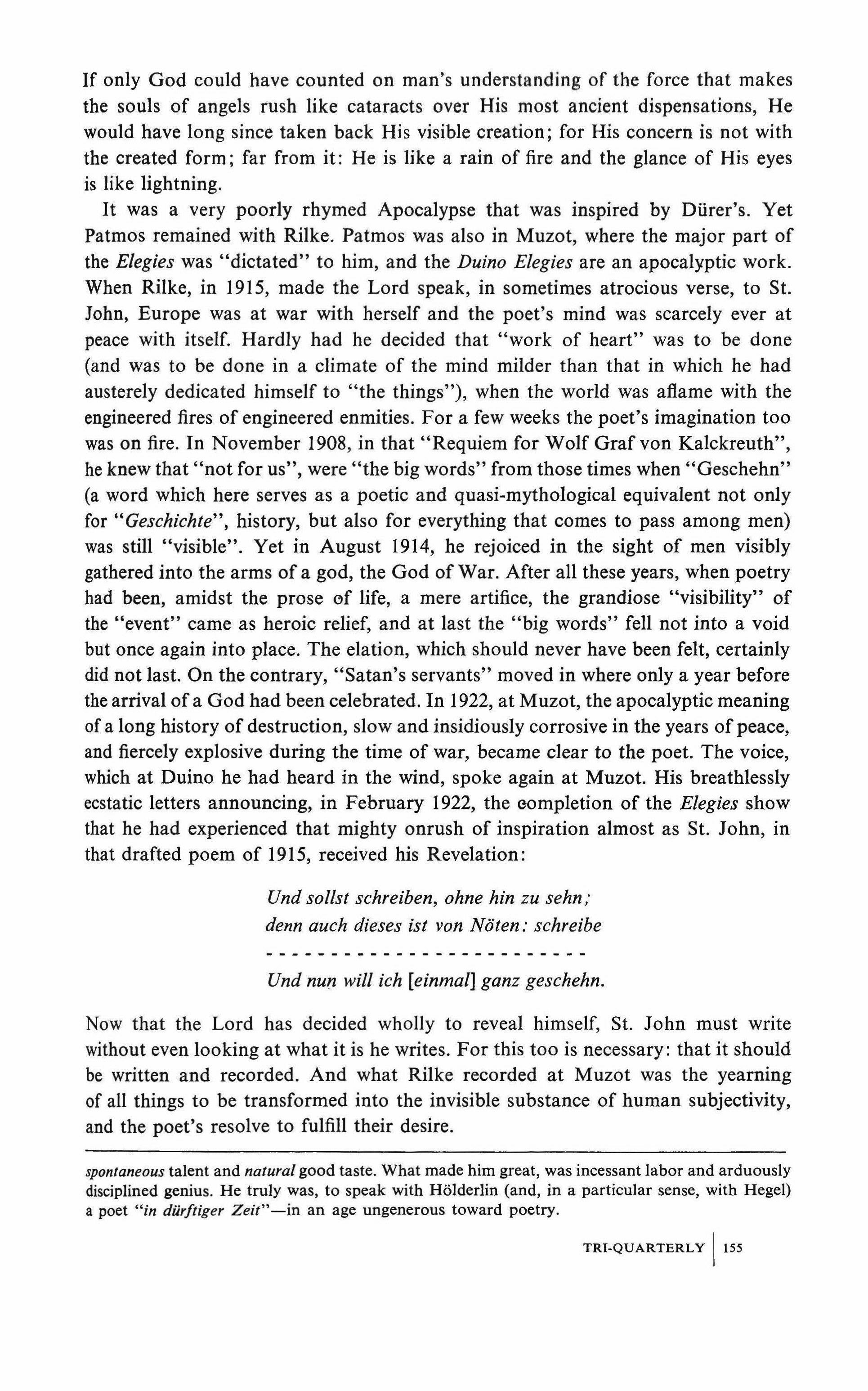
If only God could have counted on man's understanding of the force that makes the souls of angels rush like cataracts over His most ancient dispensations, He would have long since taken back His visible creation; for His concern is not with the created form; far from it: He is like a rain of fire and the glance of His eyes is like lightning.
It was a very poorly rhymed Apocalypse that was inspired by DUrer's. Yet Patmos remained with Rilke. Patmos was also in Muzot, where the major part of the Elegies was "dictated" to him, and the Duino Elegies are an apocalyptic work. When Rilke, in 1915, made the Lord speak, in sometimes atrocious verse, to St. John, Europe was at war with herself and the poet's mind was scarcely ever at peace with itself. Hardly had he decided that "work of heart" was to be done (and was to be done in a climate of the mind milder than that in which he had austerely dedicated himself to "the things"), when the world was aflame with the engineered fires of engineered enmities. For a few weeks the poet's imagination too was on fire. In November 1908, in that "Requiem for Wolf Graf von Kalckreuth", he knew that "not for us", were "the big words" from those times when "Geschehn" (a word which here serves as a poetic and quasi-mythological equivalent not only for "Geschichte", history, but also for everything that comes to pass among men) was still "visible". Yet in August 1914, he rejoiced in the sight of men visibly gathered into the arms of a god, the God of War. After all these years, when poetry had been, amidst the prose of life, a mere artifice, the grandiose "visibility" of the "event" came as heroic relief, and at last the "big words" fell not into a void but once again into place. The elation, which should never have been felt, certainly did not last. On the contrary, "Satan's servants" moved in where only a year before the arrival of a God had been celebrated. In 1922, at Muzot, the apocalyptic meaning of a long history of destruction, slow and insidiously corrosive in the years of peace, and fiercely explosive during the time of war, became clear to the poet. The voice, which at Duino he had heard in the wind, spoke again at Muzot. His breathlessly ecstatic letters announcing, in February 1922, the eompletion of the Elegies show that he had experienced that mighty onrush of inspiration almost as St. John, in that drafted poem of 1915, received his Revelation:
Und sollst schreiben, ohne hin zu sehn; denn auch dieses ist von Noten: schreibe
Und nun will ich [einmal] ganz geschehn.
Now that the Lord has decided wholly to reveal himself, St. John must write without even looking at what it is he writes. For this too is necessary: that it should be written and recorded. And what Rilke recorded at Muzot was the yearning of all things to be transformed into the invisible substance of human SUbjectivity, and the poet's resolve to fulfill their desire.
spontaneous talent and natural good taste. What made him great, was incessant labor and arduously disciplined genius. He truly was, to speak with Holderlin (and, in a particular sense, with Hegel) a poet "in dilrftiger Zeit"-in an age ungenerous toward poetry.
TRI-QUARTERLY 1155
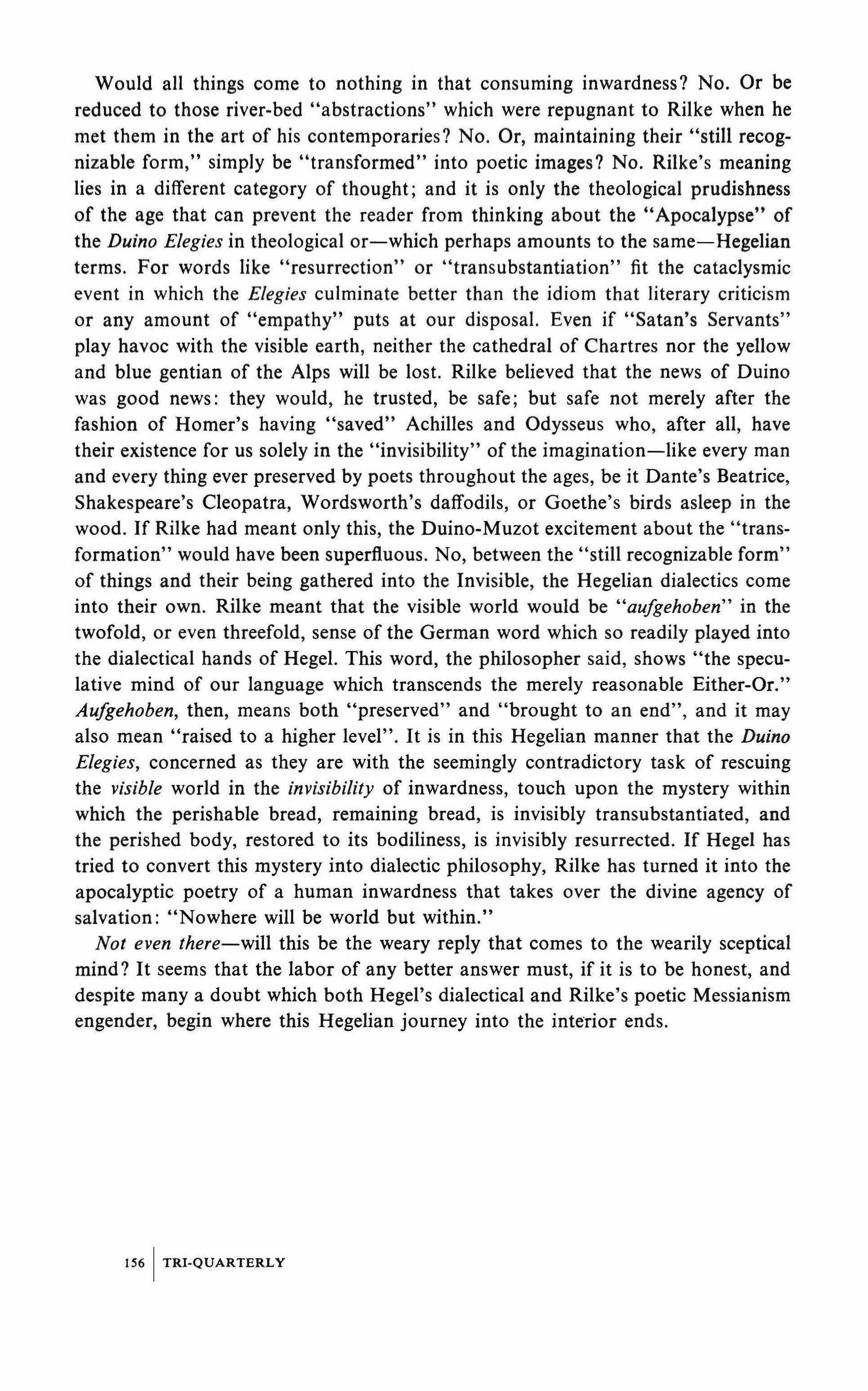
Would all things come to nothing in that consuming inwardness? No. Or be reduced to those river-bed "abstractions" which were repugnant to Rilke when he met them in the art of his contemporaries? No. Or, maintaining their "still recognizable form," simply be "transformed" into poetic images? No. Rilke's meaning lies in a different category of thought; and it is only the theological prudishness of the age that can prevent the reader from thinking about the "Apocalypse" of the Duino Elegies in theological or-which perhaps amounts to the same-Hegelian terms. For words like "resurrection" or "transubstantiation" fit the cataclysmic event in which the Elegies culminate better than the idiom that literary criticism or any amount of "empathy" puts at our disposal. Even if "Satan's Servants" play havoc with the visible earth, neither the cathedral of Chartres nor the yellow and blue gentian of the Alps will be lost. Rilke believed that the news of Duino was good news: they would, he trusted, be safe; but safe not merely after the fashion of Homer's having "saved" Achilles and Odysseus who, after all, have their existence for us solely in the "invisibility" of the imagination-like every man and every thing ever preserved by poets throughout the ages, be it Dante's Beatrice, Shakespeare's Cleopatra, Wordsworth's daffodils, or Goethe's birds asleep in the wood. If Rilke had meant only this, the Duino-Muzot excitement about the "transformation" would have been superfluous. No, between the "still recognizable form" of things and their being gathered into the Invisible, the Hegelian dialectics come into their own. Rilke meant that the visible world would be "aufgehoben" in the twofold, or even threefold, sense of the German word which so readily played into the dialectical hands of Hegel. This word, the philosopher said, shows "the speculative mind of our language which transcends the merely reasonable Either-Or."
Aufgehoben, then, means both "preserved" and "brought to an end", and it may also mean "raised to a higher level". It is in this Hegelian manner that the Duino Elegies, concerned as they are with the seemingly contradictory task of rescuing the visible world in the invisibility of inwardness, touch upon the mystery within which the perishable bread, remaining bread, is invisibly transubstantiated, and the perished body, restored to its bodiliness, is invisibly resurrected. If Hegel has tried to convert this mystery into dialectic philosophy, Rilke has turned it into the apocalyptic poetry of a human inwardness that takes over the divine agency of salvation: "Nowhere will be world but within."
Not even there-will this be the weary reply that comes to the wearily sceptical mind? It seems that the labor of any better answer must, if it is to be honest, and despite many a doubt which both Hegel's dialectical and Rilke's poetic Messianism engender, begin where this Hegelian journey into the interior ends.

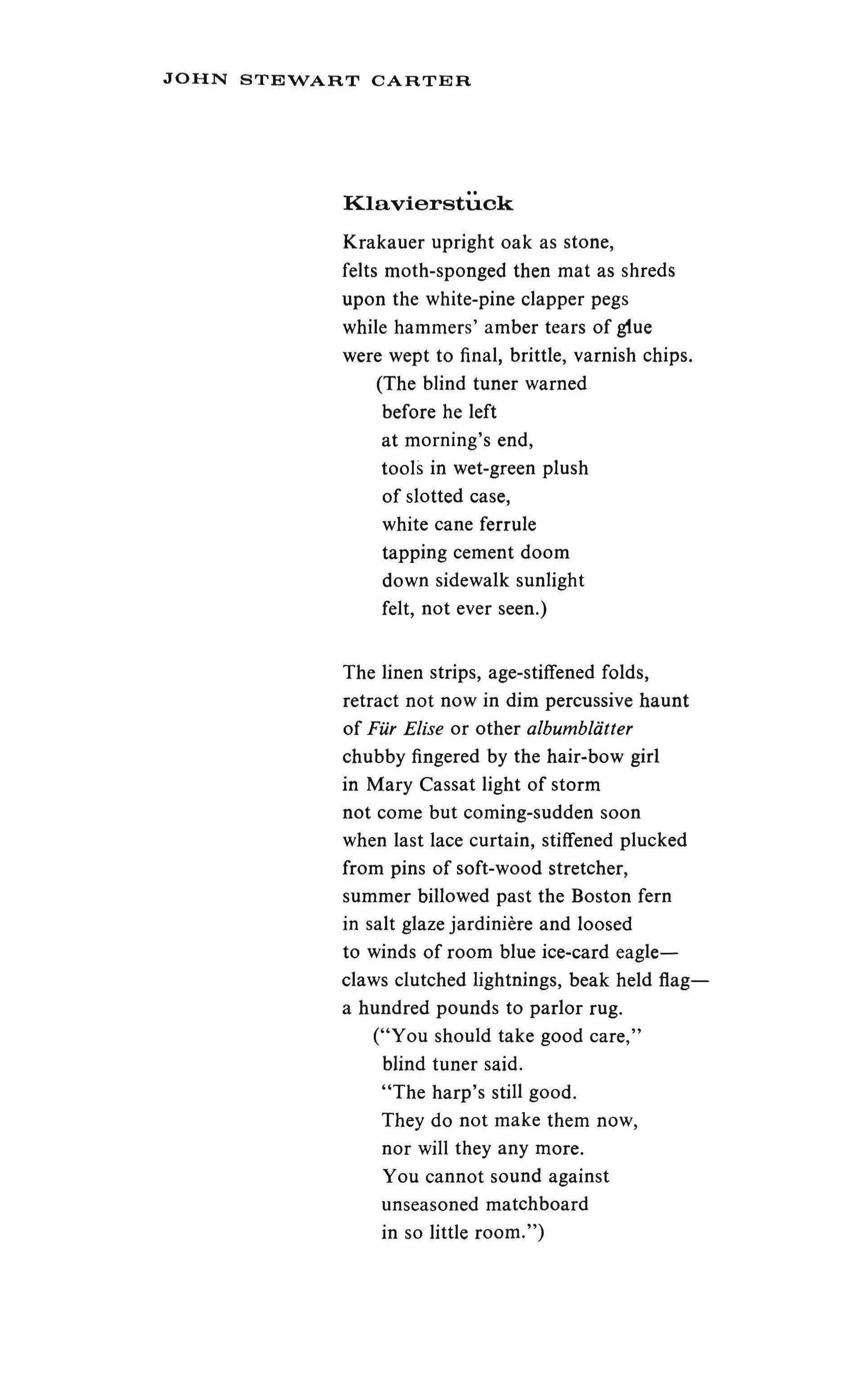
Krakauer upright oak as stone, felts moth-sponged then mat as shreds upon the white-pine clapper pegs while hammers' amber tears of glue were wept to final, brittle, varnish chips. (The blind tuner warned before he left at morning's end, tools in wet-green plush of slotted case, white cane ferrule tapping cement doom down sidewalk sunlight felt, not ever seen.)
The linen strips, age-stiffened folds, retract not now in dim percussive haunt of Fur Elise or other albumbliitter chubby fingered by the hair-bow girl in Mary Cassat light of storm not come but coming-sudden soon when last lace curtain, stiffened plucked from pins of soft-wood stretcher, summer billowed past the Boston fern in salt glaze jardiniere and loosed to winds of room blue ice-card eagleclaws clutched lightnings, beak held ftaga hundred pounds to parlor rug. ("You should take good care," blind tuner said. "The harp's still good. They do not make them now, nor will they any more. You cannot sound against unseasoned matchboard in so little room.")
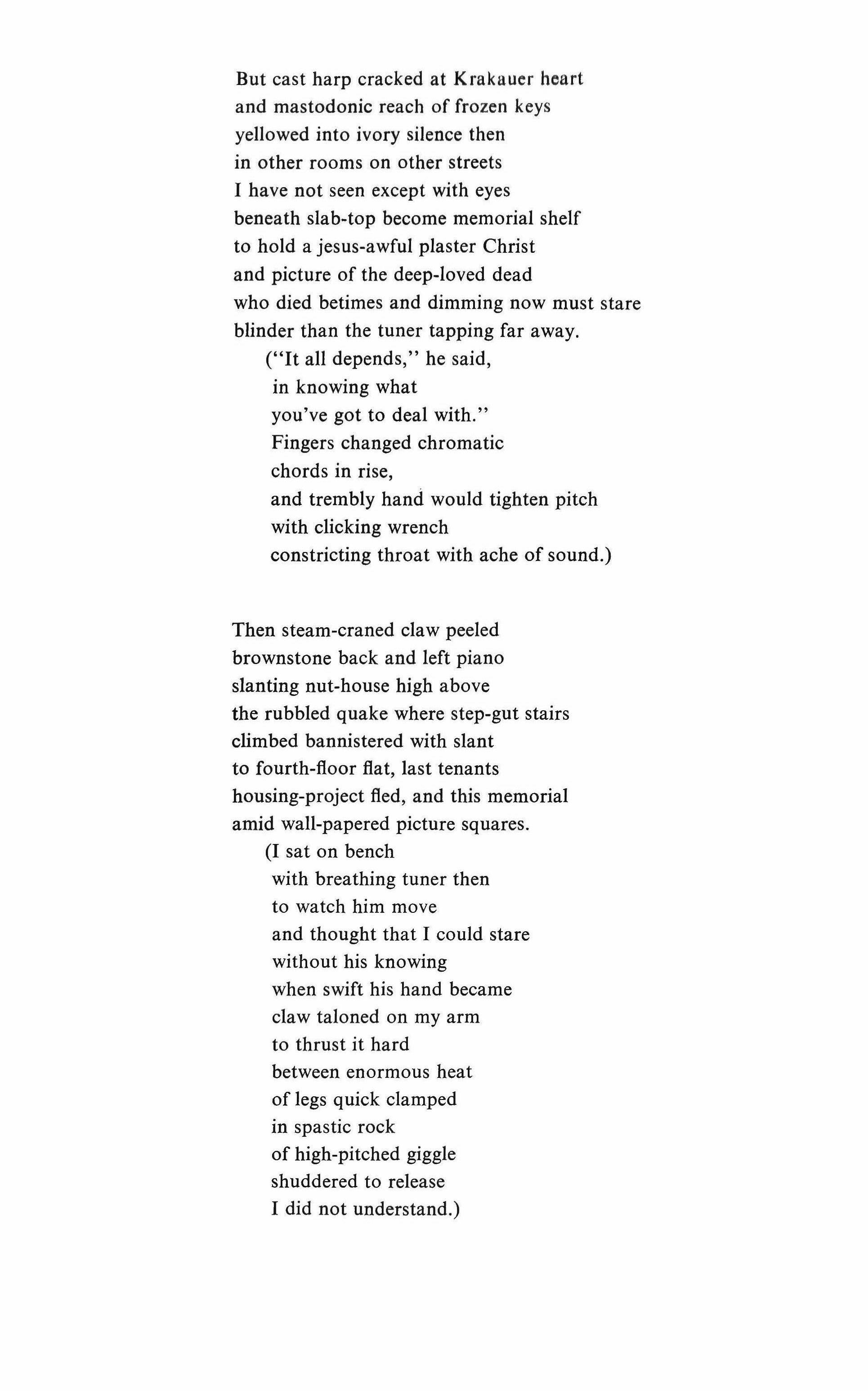
But cast harp cracked at Krakauer heart and mastodonic reach of frozen keys yellowed into ivory silence then in other rooms on other streets I have not seen except with eyes beneath slab-top become memorial shelf to hold a jesus-awful plaster Christ and picture of the deep-loved dead who died betimes and dimming now must stare blinder than the tuner tapping far away. ("It all depends," he said, in knowing what you've got to deal with." Fingers changed chromatic chords in rise, and trembly hand would tighten pitch with clicking wrench constricting throat with ache of sound.)
Then steam-craned claw peeled brownstone back and left piano slanting nut-house high above the rubbled quake where step-gut stairs climbed bannistered with slant to fourth-floor flat, last tenants housing-project fled, and this memorial amid wall-papered picture squares. (I sat on bench with breathing tuner then to watch him move and thought that I could stare without his knowing when swift his hand became claw taloned on my arm to thrust it hard between enormous heat of legs quick clamped in spastic rock of high-pitched giggle shuddered to release I did not understand.)
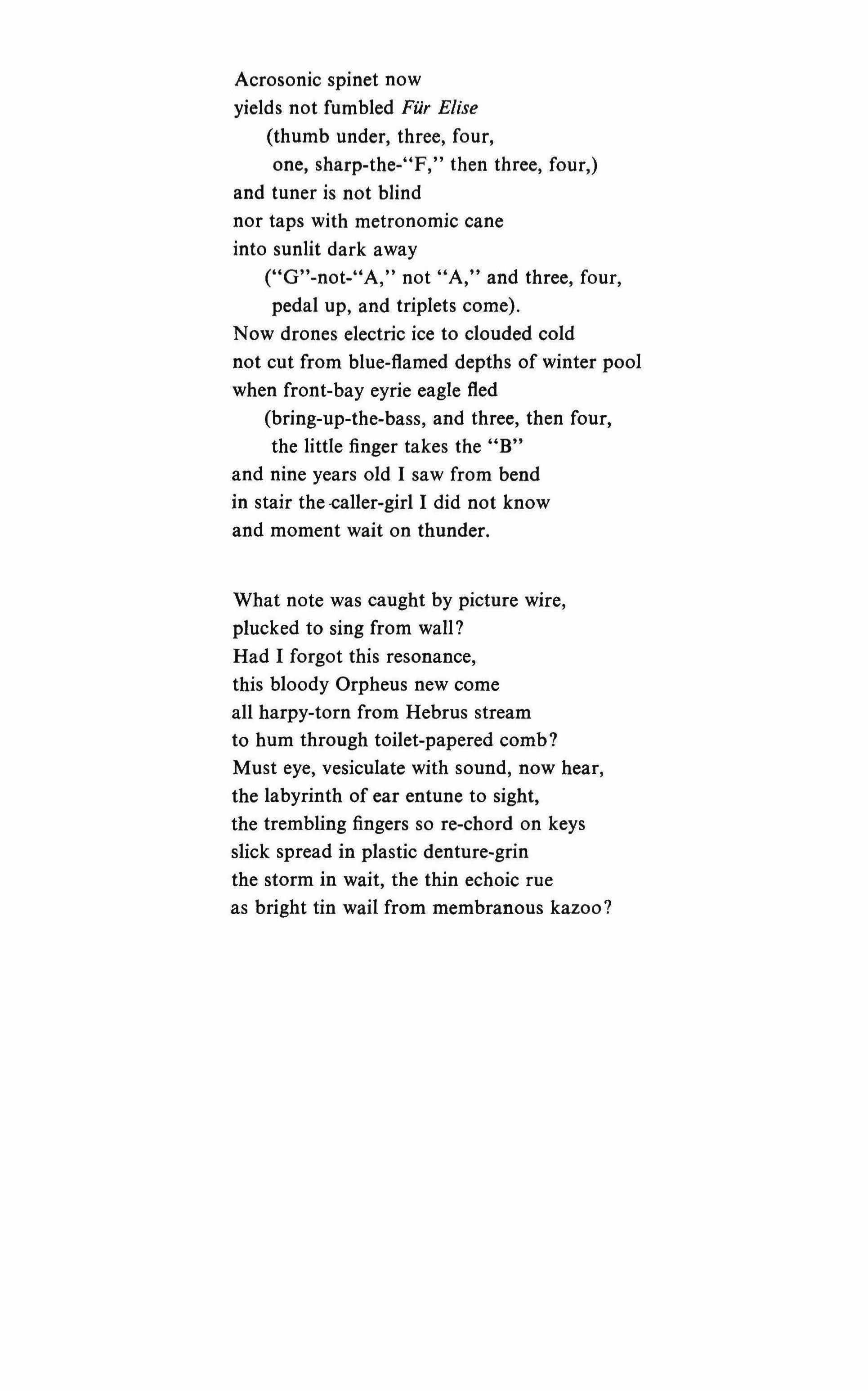
Acrosonic spinet now yields not fumbled Fur Elise (thumb under, three, four, one, sharp-the-"F," then three, four,) and tuner is not blind nor taps with metronomic cane into sunlit dark away ("G"-not-"A not "A and three four pedal up, and triplets come). Now drones electric ice to clouded cold not cut from blue-flamed depths of winter pool when front-bay eyrie eagle fled (bring-up-the-bass, and three, then four, the little finger takes the "B" and nine years old I saw from bend in stair the -ealler-girl I did not know and moment wait on thunder.
What note was caught by picture wire, plucked to sing from wall?
Had I forgot this resonance, this bloody Orpheus new come all harpy-torn from Hebrus stream to hum through toilet-papered comb? Must eye, vesiculate with sound, now hear, the labyrinth of ear entune to sight, the trembling fingers so re-chord on keys slick spread in plastic denture-grin the storm in wait, the thin echoic rue as bright tin wail from membranous kazoo?
'A double killing, involving the murder of a young woman known as Maybelle Revere, by a jazz pianist named Danny Marcus, was reported today by Chicago Lawn police. No motive was attributed, but other occupants of the place, known locally as the House ofMirrors, said Marcus complained ofbeing spied on by unidentifiedpersons.'
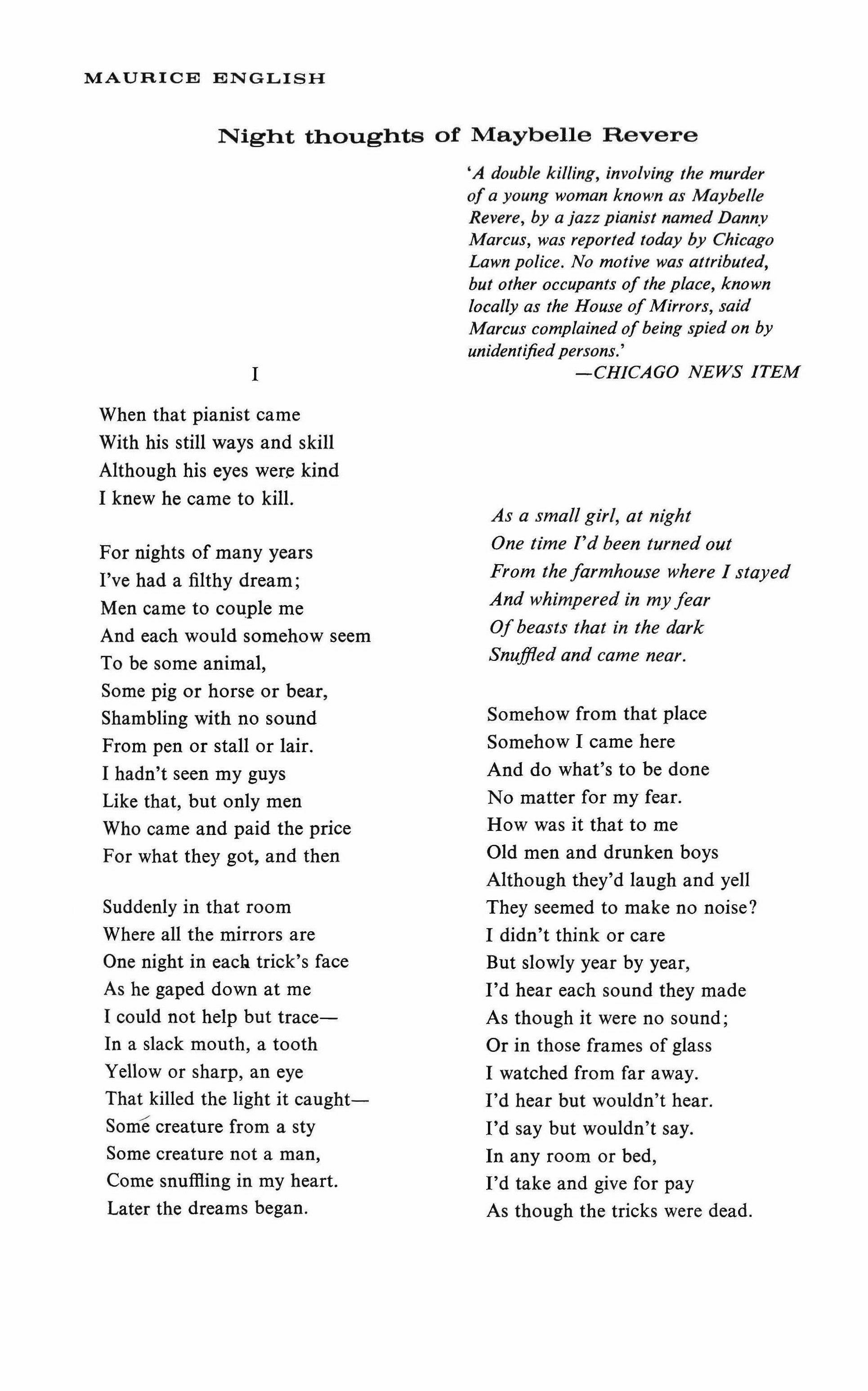
When that pianist came
With his still ways and skill
Although his eyes were kind
I knew he came to kill.
For nights of many years
I've had a filthy dream;
Men came to couple me
And each would somehow seem
To be some animal,
Some pig or horse or bear,
Shambling with no sound
From pen or stall or lair.
I hadn't seen my guys
Like that, but only men
Who came and paid the price
For what they got, and then
Suddenly in that room
Where all the mirrors are
One night in each trick's face
As he gaped down at me
I could not help but trace
In a slack mouth, a tooth
Yellow or sharp, an eye
That killed the light it caught
Some creature from a sty
Some creature not a man, Come snuffling in my heart.
Later the dreams began.
As a small girl, at night
One time I'd been turned out
From the farmhouse where I stayed
And whimpered in my fear
Of beasts that in the dark
Snuffied and came near.
Somehow from that place
Somehow I came here
And do what's to be done
No matter for my fear.
How was it that to me
Old men and drunken boys
Although they'd laugh and yell
They seemed to make no noise?
I didn't think or care
But slowly year by year, I'd hear each sound they made
As though it were no sound; Or in those frames of glass
I watched from far away.
I'd hear but wouldn't hear.
I'd say but wouldn't say.
In any room or bed, I'd take and give for pay
As though the tricks were dead.
When I woke up at dawn
There wasn't one I'd want
Beside me, once he'd paid, But I didn't want them gone. Alone, I was afraid
Afraid to go to sleep
Where I would meet the beasts
That sullenly would creep And slow, across the floor
To snuffle at my bed
And rub against my flesh, Hog snout, belly of snake, Jesus, to strain and thrash
Trying to scream awake, And not be able to scream
And not be able to wake, But watch them as they pad
From corners of my room
To mount into my bed.
When as a girl of nine
My belly quailed to hear
The throatings of the swine, And whimpering I told That old man at the door
That yes, 1 would be good, Not hate him like before, He let me back inside, To do the things he said, With candy when I cried.
o not to see again
Those beasts that prowl and creep
Against my flesh at night I try to hide from sleep
With whisky, rope and snow, With men who needn't pay. At last all go away And I sob into my dream,
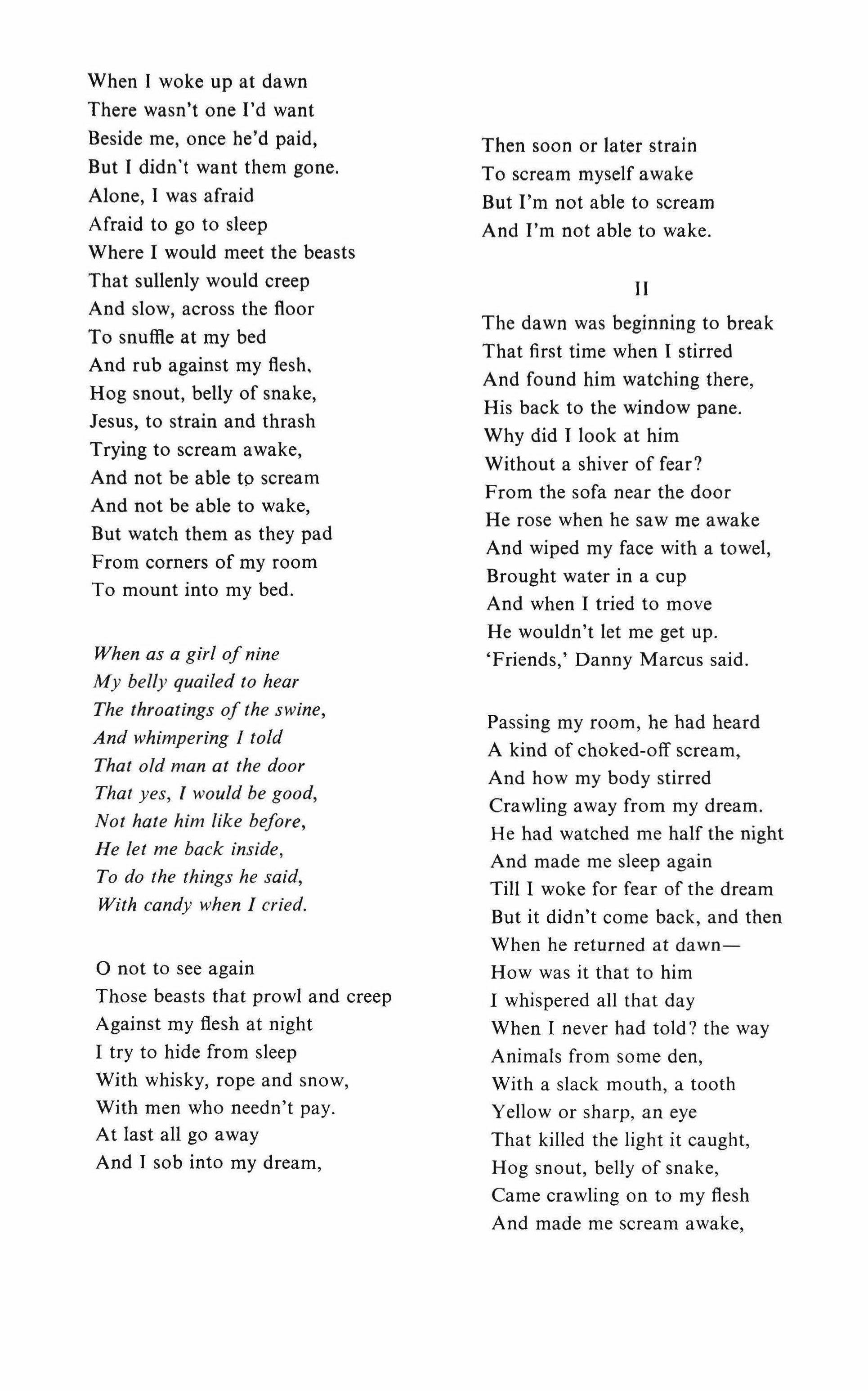
Then soon or later strain
To scream myself awake
But I'm not able to scream And I'm not able to wake.
The dawn was beginning to break That first time when I stirred And found him watching there, His back to the window pane.
Why did I look at him
Without a shiver of fear?
From the sofa near the door
He rose when he saw me awake
And wiped my face with a towel, Brought water in a cup
And when I tried to move He wouldn't let me get up. 'Friends,' Danny Marcus said.
Passing my room, he had heard A kind of choked-off scream, And how my body stirred Crawling away from my dream. He had watched me half the night And made me sleep again
Till I woke for fear of the dream
But it didn't come back, and then When he returned at dawn
How was it that to him
I whispered all that day
When I never had told? the way
Animals from some den, With a slack mouth, a tooth
Yellow or sharp, an eye
That killed the light it caught, Hog snout, belly of snake, Came crawling on to my flesh
And made me scream awake,
But left me a worse dread.
Some night I dream that dream
A spider will come. I want To vomit my dream and be dead.
He brought me coffee to drink And smoothed the sheets and said I'd be all right. I thought What strong hands he had I thought then how his look Was far away and sad. His body tensed and shook. 'You've got a right to sleep Without bad dreams,' he said, 'And I've a right to be
With no one following me.
Rest now, don't dream, don't weep, And I'll come back again
When the johns have gone away And the girls have gone to sleep.'
He left me then, and soon
Made music for them all. The house was full of tricks, I heard them shout and call And couldn't follow the tune. In a while the voices died And Danny went into a blues. I lay in the dark and cried. But the guys were after kicks And pretty soon the girls Went with them two by two
In the room where the mirrors are.
Danny played on by himself. He knew I was listening too.

The mirror bedroom. That Was where I was the night I first began to feel A million miles away, Like I didn't hear what I'd hear And didn't say what I'd say.
And another night, when a john Looked down, I saw a beast.
Later the dreams began.
When the pigs that lunged in the night
Made my belly quail with dread
That old man let me in
To be with him in his bed.
After he left me alone
I lay there till it was dawn. I didn't cry or moan.
I only knew he was gone And the house was very still.
Was I only nine years old?
Everything seems far away. How is it that for years I hadn't thought of him
Or that night or that day?
It's dawn and they're all gone, Old men and drunken boys
Who though they yell and laugh
All seem to make no noise.
Now I am left alone.
To keep those dreams away
That wring my guts with fear I crouch in the dark and pray That Danny will soon be here.
And when I hear his step Catfooted in the hall
I'll think it's now it's now I will not stir or scream
I will not move at all.
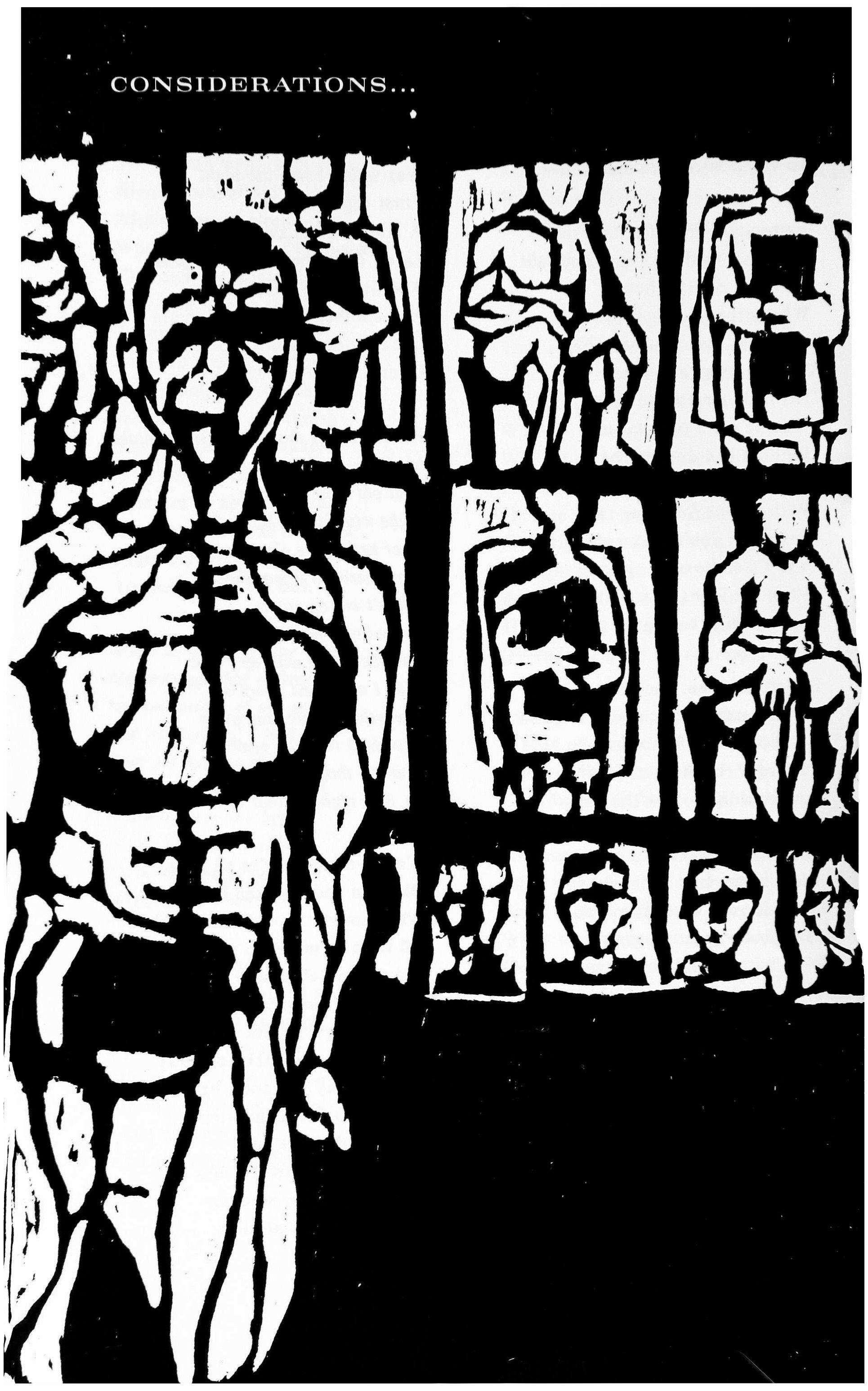
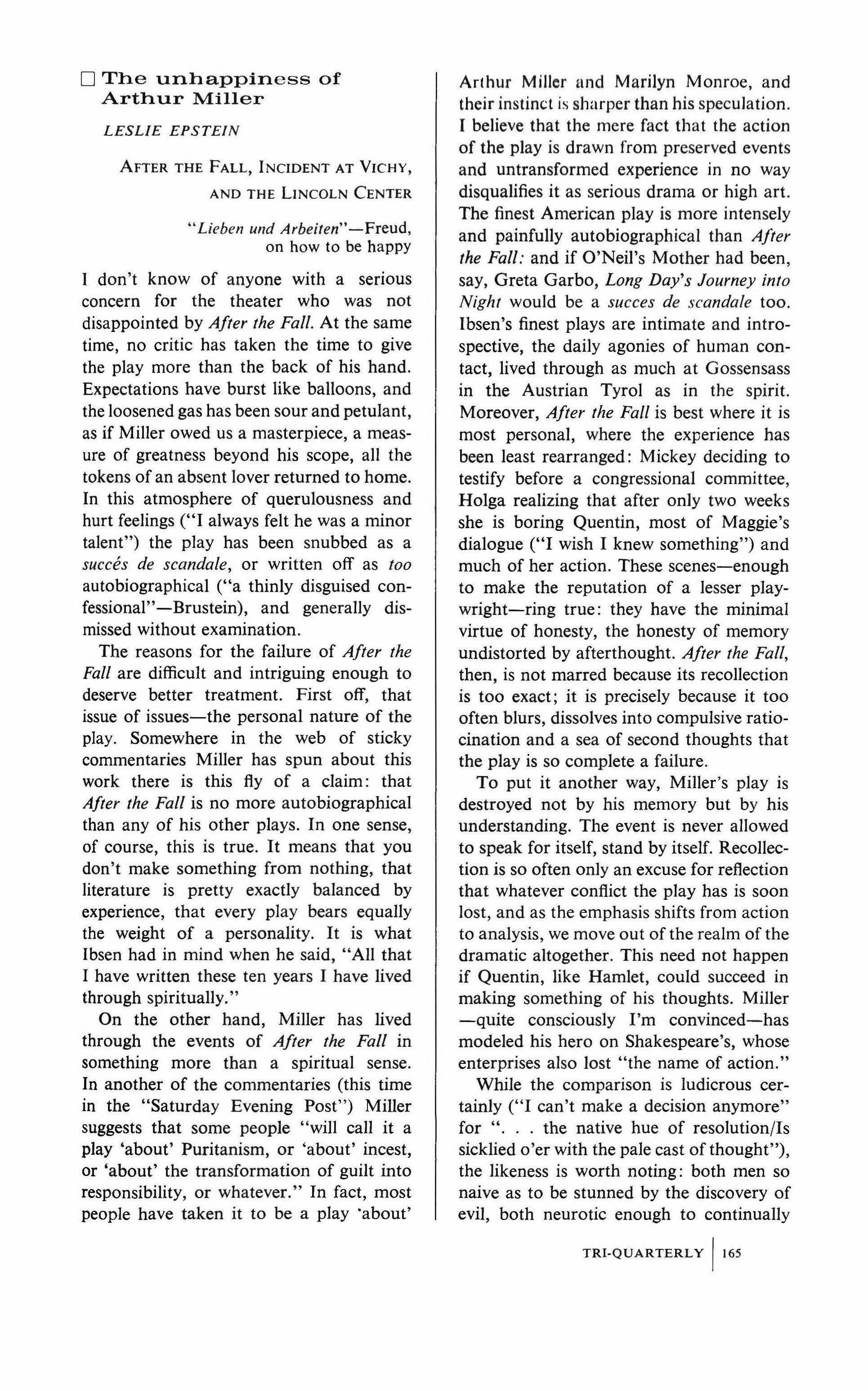
o The unhappiness of Arthur Miller
LESLIE EPSTEIN"Lieben und Arbeiten"-Freud, on how to be happy
I don't know of anyone with a serious concern for the theater who was not disappointed by After the Fall. At the same time, no critic has taken the time to give the play more than the back of his hand. Expectations have burst like balloons, and the loosened gas has been sour and petulant, as if Miller owed us a masterpiece, a measure of greatness beyond his scope, all the tokens of an absent lover returned to home. In this atmosphere of querulousness and hurt feelings ("I always felt he was a minor talent") the play has been snubbed as a succes de scandale, or written off as too autobiographical ("a thinly disguised confessional"-Brustein), and generally dismissed without examination.
The reasons for the failure of After the Fall are difficult and intriguing enough to deserve better treatment. First off, that issue of issues-the personal nature of the play. Somewhere in the web of sticky commentaries Miller has spun about this work there is this fly of a claim: that After the Fall is no more autobiographical than any of his other plays. In one sense, of course, this is true. It means that you don't make something from nothing, that literature is pretty exactly balanced by experience, that every play bears equally the weight of a personality. It is what Ibsen had in mind when he said, "All that I have written these ten years I have lived through spiritually."
On the other hand, Miller has lived through the events of After the Fall in something more than a spiritual sense. In another of the commentaries (this time in the "Saturday Evening Post") Miller suggests that some people "will call it a play 'about' Puritanism, or 'about' incest, or 'about' the transformation of guilt into responsibility, or whatever." In fact, most people have taken it to be a play 'about'
Arthur Miller and Marilyn Monroe, and their instinct is sharper than his speculation. I believe that the mere fact that the action of the play is drawn from preserved events and untransformed experience in no way disqualifies it as serious drama or high art. The finest American play is more intensely and painfully autobiographical than After the Fall: and if O'Neil's Mother had been, say, Greta Garbo, Long Day's Journey into Night would be a succes de scandale too. Ibsen's finest plays are intimate and introspective, the daily agonies of human contact, lived through as much at Gossensass in the Austrian Tyrol as in the spirit. Moreover, After the Fall is best where it is most personal, where the experience has been least rearranged: Mickey deciding to testify before a congressional committee, Holga realizing that after only two weeks she is boring Quentin, most of Maggie's dialogue ("I wish I knew something") and much of her action. These scenes-enough to make the reputation of a lesser playwright-ring true: they have the minimal virtue of honesty, the honesty of memory undistorted by afterthought. After the Fall, then, is not marred because its recollection is too exact; it is precisely because it too often blurs, dissolves into compulsive ratiocination and a sea of second thoughts that the play is so complete a failure.
To put it another way, Miller's play is destroyed not by his memory but by his understanding. The event is never allowed to speak for itself, stand by itself. Recollection is so often only an excuse for reflection that whatever conflict the play has is soon lost, and as the emphasis shifts from action to analysis, we move out of the realm of the dramatic altogether. This need not happen if Quentin, like Hamlet, could succeed in making something of his thoughts. Miller -quite consciously I'm convinced-has modeled his hero on Shakespeare's, whose enterprises also lost "the name of action."
While the comparison is ludicrous certainly ("I can't make a decision anymore" for ". the native hue of resolution/Is sicklied o'er with the pale cast of thought"), the likeness is worth noting: both men so naive as to be stunned by the discovery of evil, both neurotic enough to continually
TRI·QUARTERLY 1165
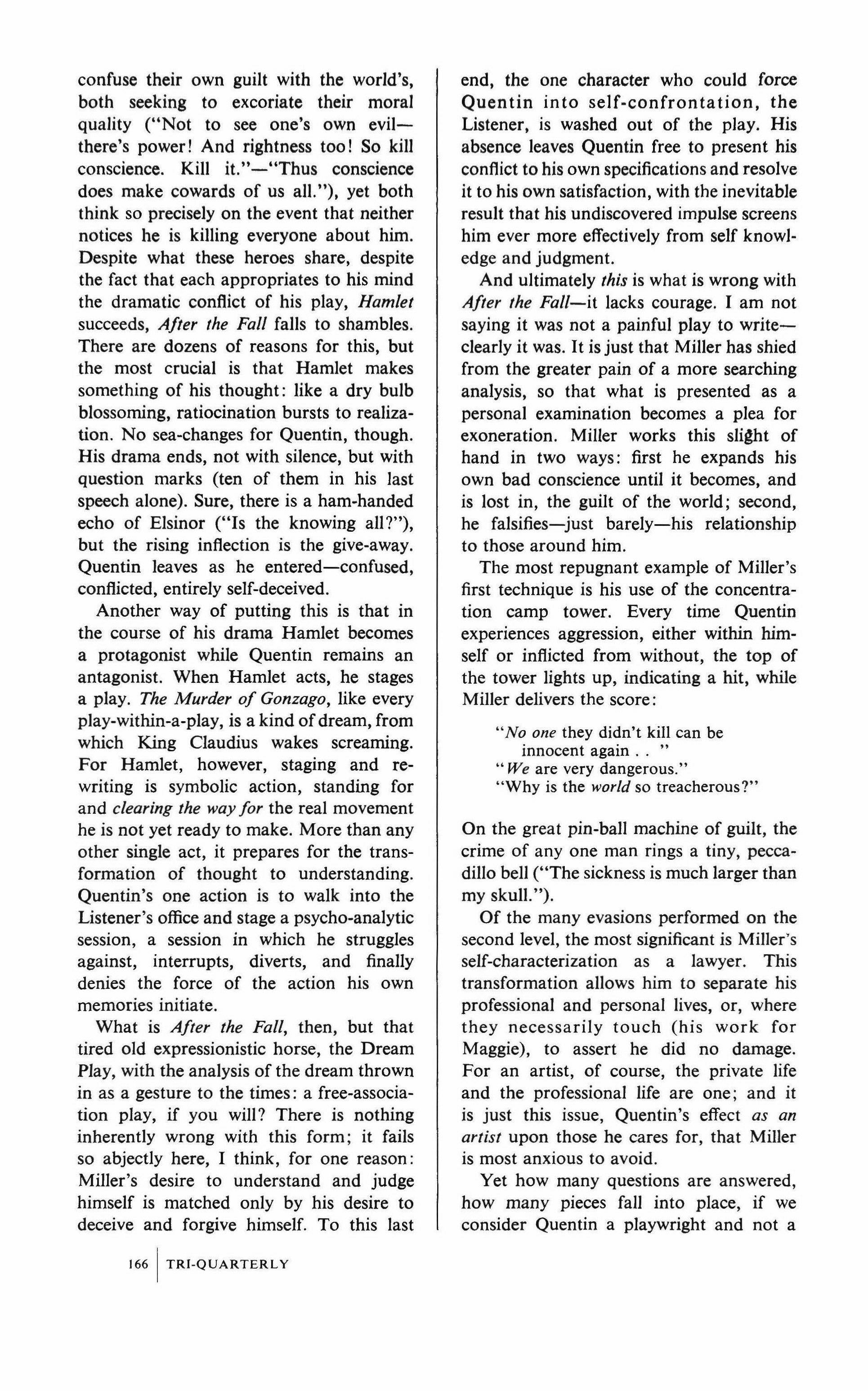
confuse their own guilt with the world's, both seeking to excoriate their moral quality ("Not to see one's own evilthere's power! And rightness too! So kill conscience. Kill it." - "Thus conscience does make cowards of us ali."), yet both think so precisely on the event that neither notices he is killing everyone about him. Despite what these heroes share, despite the fact that each appropriates to his mind the dramatic conflict of his play, Hamlet succeeds, After the Fall falls to shambles. There are dozens of reasons for this, but the most crucial is that Hamlet makes something of his thought: like a dry bulb blossoming, ratiocination bursts to realization. No sea-changes for Quentin, though. His drama ends, not with silence, but with question marks (ten of them in his last speech alone). Sure, there is a ham-handed echo of Elsinor ("Is the knowing all?"), but the rising inflection is the give-away. Quentin leaves as he entered-confused, conflicted, entirely self-deceived.
Another way of putting this is that in the course of his drama Hamlet becomes a protagonist while Quentin remains an antagonist. When Hamlet acts, he stages a play. The Murder of Gonzago, like every play-within-a-play, is a kind of dream, from which King Claudius wakes screaming. For Hamlet, however, staging and rewriting is symbolic action, standing for and clearing the way for the real movement he is not yet ready to make. More than any other single act, it prepares for the transformation of thought to understanding. Quentin's one action is to walk into the Listener's office and stage a psycho-analytic session, a session in which he struggles against, interrupts, diverts, and finally denies the force of the action his own memories initiate.
What is After the Fall, then, but that tired old expressionistic horse, the Dream Play, with the analysis of the dream thrown in as a gesture to the times: a free-association play, if you will? There is nothing inherently wrong with this form; it fails so abjectly here, I think, for one reason: Miller's desire to understand and judge himself is matched only by his desire to deceive and forgive himself. To this last 1661 TRI-QUARTERLY
end, the one character who could force Quentin in to self-confrontation, the Listener, is washed out of the play. His absence leaves Quentin free to present his conflict to his own specifications and resolve it to his own satisfaction, with the inevitable result that his undiscovered impulse screens him ever more effectively from self knowledge and judgment.
And ultimately this is what is wrong with After the Fall-it lacks courage. I am not saying it was not a painful play to writeclearly it was. It is just that Miller has shied from the greater pain of a more searching analysis, so that what is presented as a personal examination becomes a plea for exoneration. Miller works this slight of hand in two ways: first he expands his own bad conscience until it becomes, and is lost in, the guilt of the world; second, he falsifies-just barely-his relationship to those around him.
The most repugnant example of Miller's first technique is his use of the concentration camp tower. Every time Quentin experiences aggression, either within himself or inflicted from without, the top of the tower lights up, indicating a hit, while Miller delivers the score:
"No one they didn't kill can be innocent again
"We are very dangerous."
"Why is the world so treacherous?"
On the great pin-ball machine of guilt, the crime of anyone man rings a tiny, peccadillo bell ("The sickness is much larger than my skull.").
Of the many evasions performed on the second level, the most significant is Miller's self-characterization as a lawyer. This transformation allows him to separate his professional and personal lives, or, where they necessarily touch (his work for Maggie), to assert he did no damage. For an artist, of course, the private life and the professional life are one; and it is just this issue, Quentin's effect as an artist upon those he cares for, that Miller is most anxious to avoid.
Yet how many questions are answered, how many pieces fall into place, if we consider Quentin a playwright and not a
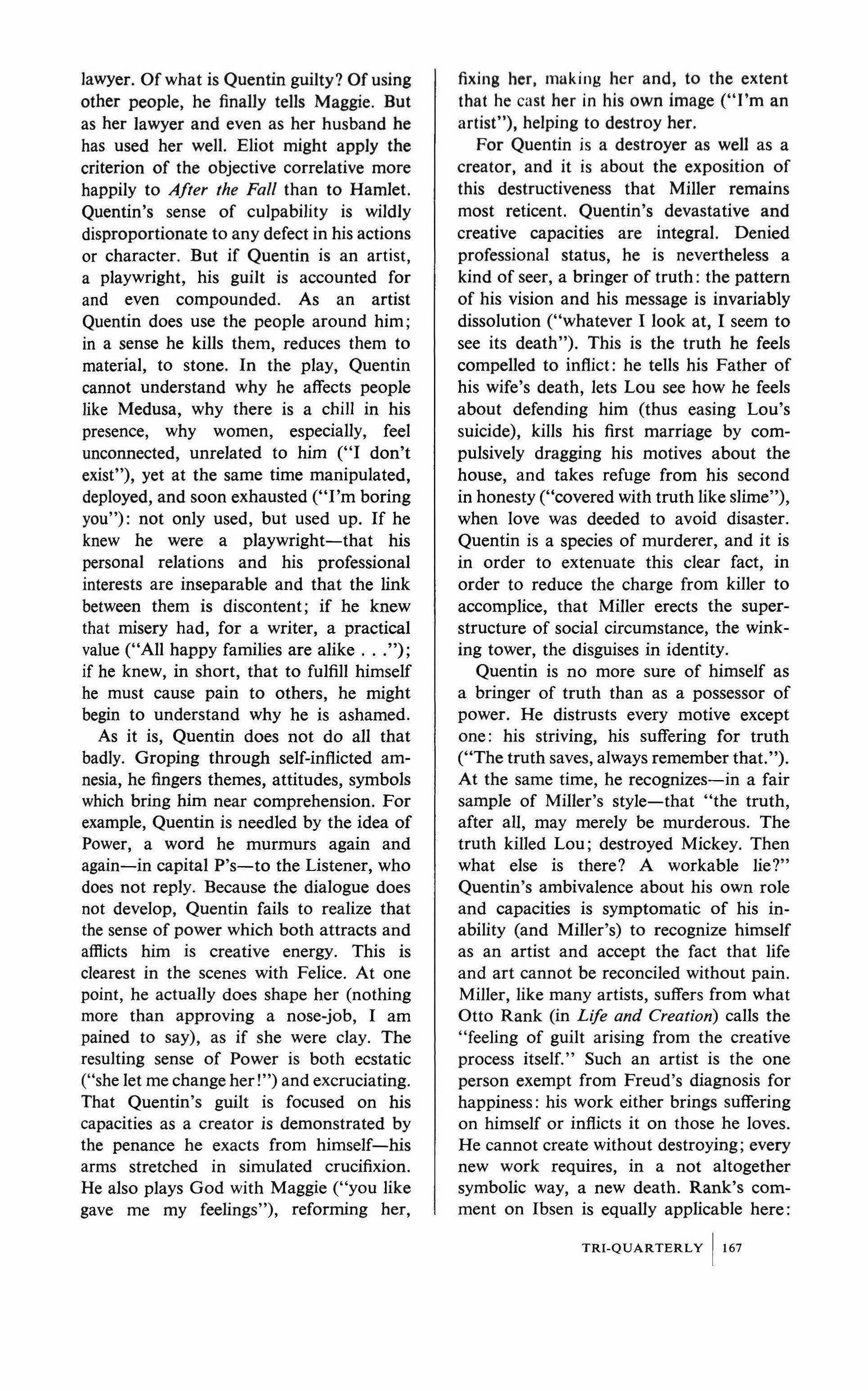
lawyer. Of what is Quentin guilty? Of using other people, he finally tells Maggie. But as her lawyer and even as her husband he has used her well. Eliot might apply the criterion of the objective correlative more happily to After the Fall than to Hamlet. Quentin's sense of culpability is wildly disproportionate to any defect in his actions or character. But if Quentin is an artist, a playwright, his guilt is accounted for and even compounded. As an artist Quentin does use the people around him; in a sense he kills them, reduces them to material, to stone. In the play, Quentin cannot understand why he affects people like Medusa, why there is a chill in his presence, why women, especially, feel unconnected, unrelated to him ("I don't exist"), yet at the same time manipulated, deployed, and soon exhausted ("I'm boring you"): not only used, but used up. If he knew he were a playwright-that his personal relations and his professional interests are inseparable and that the link between them is discontent; if he knew that misery had, for a writer, a practical value ("All happy families are alike "); if he knew, in short, that to fulfill himself he must cause pain to others, he might begin to understand why he is ashamed. As it is, Quentin does not do all that badly. Groping through self-inflicted amnesia, he fingers themes, attitudes, symbols which bring him near comprehension. For example, Quentin is needled by the idea of Power, a word he murmurs again and again-in capital P's-to the Listener, who does not reply. Because the dialogue does not develop, Quentin fails to realize that the sense of power which both attracts and afflicts him is creative energy. This is clearest in the scenes with Felice. At one point, he actually does shape her (nothing more than approving a nose-job, I am pained to say), as if she were clay. The resulting sense of Power is both ecstatic ("she let me change her !") and excruciating. That Quentin's guilt is focused on his capacities as a creator is demonstrated by the penance he exacts from himself-his arms stretched in simulated crucifixion. He also plays God with Maggie ("you like gave me my feelings"), reforming her,
fixing her, making her and, to the extent that he cast her in his own image ("I'm an artist"), helping to destroy her.
For Quentin is a destroyer as well as a creator, and it is about the exposition of this destructiveness that Miller remains most reticent. Quentin's devastative and creative capacities are integral. Denied professional status, he is nevertheless a kind of seer, a bringer of truth: the pattern of his vision and his message is invariably dissolution ("whatever I look at, I seem to see its death"). This is the truth he feels compelled to inflict: he tells his Father of his wife's death, lets Lou see how he feels about defending him (thus easing Lou's suicide), kills his first marriage by compulsively dragging his motives about the house, and takes refuge from his second in honesty ("covered with truth like slime"), when love was deeded to avoid disaster. Quentin is a species of murderer, and it is in order to extenuate this clear fact, in order to reduce the charge from killer to accomplice, that Miller erects the superstructure of social circumstance, the winking tower, the disguises in identity.
Quentin is no more sure of himself as a bringer of truth than as a possessor of power. He distrusts every motive except one: his striving, his suffering for truth ("The truth saves, always remember that."). At the same time, he recognizes-in a fair sample of Miller's style-that "the truth, after all, may merely be murderous. The truth killed Lou; destroyed Mickey. Then what else is there? A workable lie?" Quentin's ambivalence about his own role and capacities is symptomatic of his inability (and Miller's) to recognize himself as an artist and accept the fact that life and art cannot be reconciled without pain. Miller, like many artists, suffers from what Otto Rank (in Life and Creation) calls the "feeling of guilt arising from the creative process itself." Such an artist is the one person exempt from Freud's diagnosis for happiness: his work either brings suffering on himself or inflicts it on those he loves. He cannot create without destroying; every new work requires, in a not altogether symbolic way, a new death. Rank's comment on Ibsen is equally applicable here:
TRI-QUARTERLY 1167
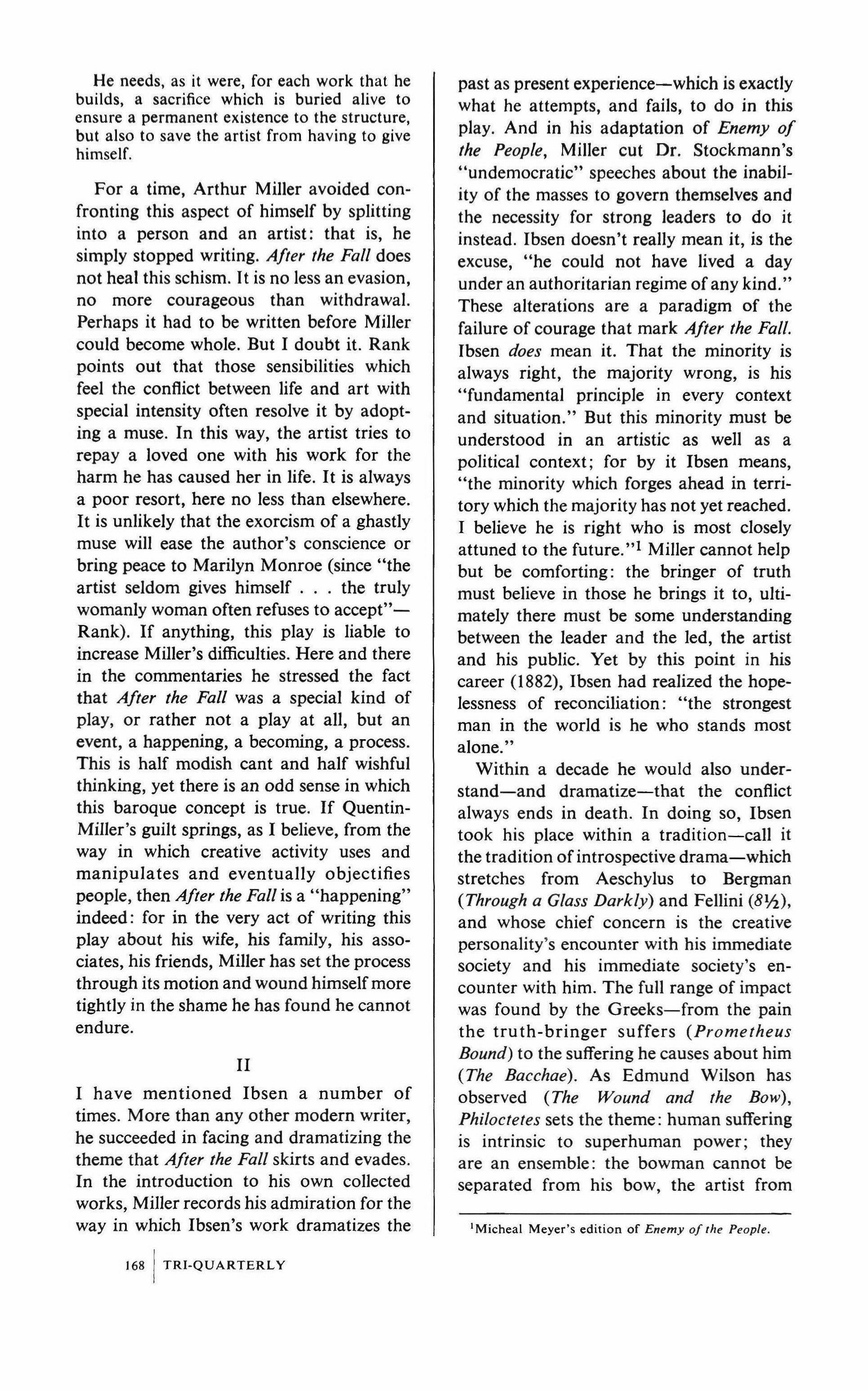
He needs, as it were, for each work that he builds, a sacrifice which is buried alive to ensure a permanent existence to the structure, but also to save the artist from having to give himself.
For a time, Arthur Miller avoided confronting this aspect of himself by splitting into a person and an artist: that is, he simply stopped writing. After the Fall does not heal this schism. It is no less an evasion, no more courageous than withdrawal. Perhaps it had to be written before Miller could become whole. But I doubt it. Rank points out that those sensibilities which feel the conflict between life and art with special intensity often resolve it by adopting a muse. In this way, the artist tries to repay a loved one with his work for the harm he has caused her in life. It is always a poor resort, here no less than elsewhere. It is unlikely that the exorcism of a ghastly muse will ease the author's conscience or bring peace to Marilyn Monroe (since "the artist seldom gives himself the truly womanly woman often refuses to accept"Rank). If anything, this play is liable to increase Miller's difficulties. Here and there in the commentaries he stressed the fact that After the Fall was a special kind of play, or rather not a play at all, but an event, a happening, a becoming, a process. This is half modish cant and half wishful thinking, yet there is an odd sense in which this baroque concept is true. If QuentinMiller's guilt springs, as I believe, from the way in which creative activity uses and manipulates and eventually objectifies people, then After the Fall is a "happening" indeed: for in the very act of writing this play about his wife, his family, his associates, his friends, Miller has set the process through its motion and wound himself more tightly in the shame he has found he cannot endure.
I have mentioned Ibsen a number of times. More than any other modern writer, he succeeded in facing and dramatizing the theme that After the Fall skirts and evades. In the introduction to his own collected works, Miller records his admiration for the way in which Ibsen's work dramatizes the
168/ TRI-QUARTERLY
past as present experience-which is exactly what he attempts, and fails, to do in this play. And in his adaptation of Enemy of the People, Miller cut Dr. Stockmann's "undemocratic" speeches about the inability of the masses to govern themselves and the necessity for strong leaders to do it instead. Ibsen doesn't really mean it, is the excuse, "he could not have lived a day under an authoritarian regime of any kind." These alterations are a paradigm of the failure of courage that mark After the Fall. Ibsen does mean it. That the minority is always right, the majority wrong, is his "fundamental principle in every context and situation." But this minority must be understood in an artistic as well as a political context; for by it Ibsen means, "the minority which forges ahead in territory which the majority has not yet reached. I believe he is right who is most closely attuned to the future. "1 Miller cannot help but be comforting: the bringer of truth must believe in those he brings it to, ultimately there must be some understanding between the leader and the led, the artist and his public. Yet by this point in his career (1882), Ibsen had realized the hopelessness of reconciliation: "the strongest man in the world is he who stands most alone."
Within a decade he would also understand-and dramatize-that the conflict always ends in death. In doing so, Ibsen took his place within a tradition-call it the tradition of introspective drama-which stretches from Aeschylus to Bergman (Through a Glass Darkly) and Fellini (8�), and whose chief concern is the creative personality's encounter with his immediate society and his immediate society's encounter with him. The full range of impact was found by the Greeks-from the pain the truth-bringer suffers (Prometheus Bound) to the suffering he causes about him (The Bacchae). As Edmund Wilson has observed (The Wound and the Bow), Philoctetes sets the theme: human suffering is intrinsic to superhuman power; they are an ensemble: the bowman cannot be separated from his bow, the artist from
1 Micheal Meyer's edition of Enemy of the People.
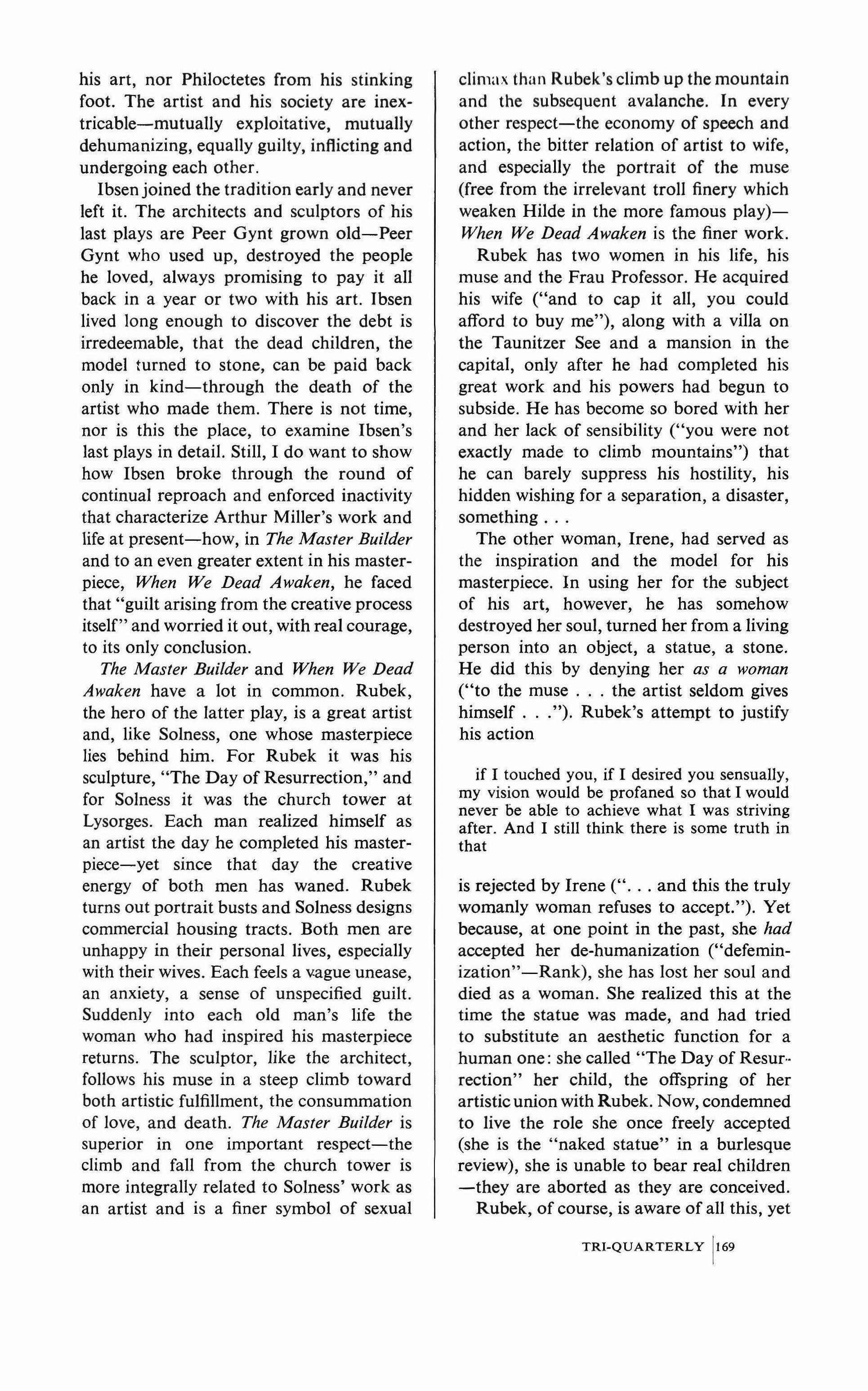
his art, nor Philoctetes from his stinking foot. The artist and his society are inextricable-mutually exploitative, mutually dehumanizing, equally guilty, inflicting and undergoing each other.
Ibsenjoined the tradition early and never left it. The architects and sculptors of his last plays are Peer Gynt grown old-Peer Gynt who used up, destroyed the people he loved, always promising to pay it all back in a year or two with his art. Ibsen lived long enough to discover the debt is irredeemable, that the dead children, the model turned to stone, can be paid back only in kind-through the death of the artist who made them. There is not time, nor is this the place, to examine Ibsen's last plays in detail. Still, I do want to show how Ibsen broke through the round of continual reproach and enforced inactivity that characterize Arthur Miller's work and life at present-how, in The Master Builder and to an even greater extent in his masterpiece, When We Dead Awaken, he faced that "guilt arising from the creative process itself" and worried it out, with real courage, to its only conclusion.
The Master Builder and When We Dead Awaken have a lot in common. Rubek, the hero of the latter play, is a great artist and, like Solness, one whose masterpiece lies behind him. For Rubek it was his sculpture, "The Day of Resurrection," and for Solness it was the church tower at Lysorges. Each man realized himself as an artist the day he completed his masterpiece-yet since that day the creative energy of both men has waned. Rubek turns out portrait busts and Solness designs commercial housing tracts. Both men are unhappy in their personal lives, especially with their wives. Each feels a vague unease, an anxiety, a sense of unspecified guilt. Suddenly into each old man's life the woman who had inspired his masterpiece returns. The sculptor, like the architect, follows his muse in a steep climb toward both artistic fulfillment, the consummation of love, and death. The Master Builder is superior in one important respect-the climb and fall from the church tower is more integrally related to Solness' work as an artist and is a finer symbol of sexual
climax than Rubek's climb up the mountain and the subsequent avalanche. In every other respect-the economy of speech and action, the bitter relation of artist to wife, and especially the portrait of the muse (free from the irrelevant troll finery which weaken Hilde in the more famous play)When We Dead Awaken is the finer work.
Rubek has two women in his life, his muse and the Frau Professor. He acquired his wife ("and to cap it all, you could afford to buy me"), along with a villa on the Taunitzer See and a mansion in the capital, only after he had completed his great work and his powers had begun to subside. He has become so bored with her and her lack of sensibility ("you were not exactly made to climb mountains") that he can barely suppress his hostility, his hidden wishing for a separation, a disaster, something
The other woman, Irene, had served as the inspiration and the model for his masterpiece. In using her for the subject of his art, however, he has somehow destroyed her soul, turned her from a living person into an object, a statue, a stone. He did this by denying her as a woman ("to the muse the artist seldom gives himself "). Rubek's attempt to justify his action
if I touched you, if I desired you sensually, my vision would be profaned so that I would never be able to achieve what I was striving after. And I still think there is some truth in that
is rejected by Irene (" and this the truly womanly woman refuses to accept."). Yet because, at one point in the past, she had accepted her de-humanization ("defeminization"-Rank), she has lost her soul and died as a woman. She realized this at the time the statue was made, and had tried to substitute an aesthetic function for a human one: she called "The Day of Resurrection" her child, the offspring of her artistic union with Rubek. Now, condemned to live the role she once freely accepted (she is the "naked statue" in a burlesque review), she is unable to bear real children -they are aborted as they are conceived. Rubek, of course, is aware of all this, yet
TRI-QUARTERLY [169

remains so much the artist, so little the man, that his remorse and guilt can be expressed only in terms of rearrangements in his work:
I have portrayed myself in this group. In the foreground, beside a spring, as it might be here, there sits a man weighed down by guilt; he cannot free himself from the earth's crust. I call him remorse-remorse for a forfeited life He must stay for ever in his Hell.
His situation is precisely that of Solness in The Master Builder. Solness' wife, Aline, like Irene, was a woman who could bear children:
Aline had a talent for building, too The souls of children. So that they might grow into something noble, harmonious, and beautiful.
These children, like those which Irene regularly miscarries, were sacrified in fire:
So that I should have nothing to bind me. No love or happiness or anything, you see. I was to be a Master Builder.
And once again, this sacrifice of life to art leads to guilt, unease, remorse:
I must sit here and expiate! Pay for it. Not with money. But with human happiness And not only with my happiness, but with the happiness of others, too. You see, Hilde! That's the price that my success as an artist has cost me-and others. And every day of my life I have to sit here and see that price being paid for me-day after day after day!
It was this price that Miller found himself unwilling to pay. The portrait of Rubek is all the more compelling because for a moment he falters and looks for a way out. Perhaps the muse, the Frau Professor, and the artist can live together in the villa (as Solness hoped to live with his wife and Hilde, as Miller is determined to live with his memories and Holga at the end of After the Fall). But the end of the play, in which Rubek's wife goes down the mountain (to life, to a man who uses his knife more sensually than her husband) as he ascends it, symbolizes the incompatibility of love and work, except in death.
No playwright since Euripides has examined so closely as Ibsen the relation of sexual energy to creativity .The draining away of the artistic impulse after marriage
and its re-awakening by the muse is part of a delicate study of the dynamics of sublimation. What is most interesting is Ibsen's statement that the consummation of one's work necessarily means the consummation of one's life, and that a man is allowed this experience only once. From the context of Rubek's and Irene's conversations about climbing the mountain there can be no doubt that it represents for each of them a sexual union-his delayed acceptance of her as a woman. But it also represents a vision, an action of the spirit. His last act is, then, his last work, since the avalanche, like Solness' fall from the tower, is fatal. Behind the destruction of family life and the dehumanization that lie in the wake ofartistic activity, there is a grander tragedy, the final union of art and life, their fulfillment in death.
Lieben und Arbeiten in Tod-anyone unwilling to accept the adjustment of the formula must disconnect his personal and his professional life, must disengage his experience from his activity-must cease writing altogether (Rimbaud), or write badly. Miller-his experience so painful, his talents so considerable-seems to have combined both alternatives. Perhaps in America, where the pressures on privacy are immense, he had no other course. He is still a young man, though-and so many of the plays of the most intricate introspection (The Bacchae, The Tempest, When We Dead Awaken) are last works, artifacts of old age. Arthur Miller has the time, still, to join the tradition.
He does not do so, however, in his next demi-play, Incident at Vichy, which I have just seen in a heavy-handed production at the Washington Square ANTA Theater. The weight of what has been said about this play (most pointedly, Philip Rahv in The New York Review of Books) falls most heavily on Miller's Profundity. The failure of Vichy is seen primarily as one of intelligence. I think this kind of judgment, at best, beside the point. It is not Miller's job-or any other playwright's-to masticate ideas. Will it make any difference to the success of a drama if Hanna Arendt's

thoughts are served half-baked or toasted through? (Aristophanes misrepresented Scholasticism and Socrates in a wonderful play, The Clouds; Seneca knew and dramatized Stoic thinking perfectly in a series of unproducable and now unreadable dramas.) It is of course unfortunate that MiIler wants to Think Big-in both After the Fall and Incident at Vichy he does tend to stumble over ideas. But this happens because in both plays Miller's dramatic intelligence is overwhelmed, not by thought, but by a sense of guilt he is unable to approach or represent through an action. The real point to make about Miller is not that he has abrogated the functions of philosophers, but that he has become so paralzyed that the philosophers have had to take over dramatic activity for him.
I said that After the Fall was destroyed by a failure of understanding and a lack of courage. I meant self-understanding, and the courage to face fully whatever pain the action implies. Incident at Vichy suffers the same disease. More precisely, Miller is again unable to locate and assign guilt, so that he is disqualified from rendering a judgment. We find ourselves on familiar and soggy ground: a play of prosecution ends in extenuation, accusation becomes amelioration, and we end in a mass of sweet and sticky evasion.
Who is guilty in this play? A number of Jews are forced to sit in a room, waiting to be identified and transported to Auschwitz.
A Sophist of Aristophanes could see that the responsibility for this monstrous situation lies with its contrivors-the Nazis and their willing mechanics. Miller does not avoid what is so evident, and Incident at Vichy is best where it examines, occasionally, the sources of the German Atavism:
That is their power. To do the inconceivable.. they are nothing. It is the hallmark of the age-the less you exist the more important it is to make a clear impression.
Thus the playwright, with the gaze of Seneca, blames the Germans, just as Quentin-Miller had blamed himself. But he does not judge. In the same way that Quentin's crimes were dissolved into the sins of the world, so the guilt of the Nazis fades away in the general culpability of
mankind. Morality-the assignment of good and evil-is lost in ballooning collaboration. Judgment stretches, disappears like a dark spot on the surface ofexpanding rubber.
Guilt is c1assless-
The aristocracy nods while its servants "adore Hitler" and the workers vote him into power.
It is nationless-
Strange; if I did not know that some of them in there were French, I'd have said they laugh like Germans. or
The Russians condemn the middle class, the English have condemned the Indians, Africans, and anybody else they could lay their hands on, The French, The Italiansevery nation has condemned somebody because of his race
It is without race-
I have never analyzed a gentile who did not have, somewhere hidden in his mind, a dislike if not a hatred for the jews. and
The Jews have their Jews.
Which is to say, it is without meaning. We end with this kind of exchange:
- Are you telling me all those people are dead? Is that really conceivable to you? War is war, but you still keep a certain sense of proportion. I mean Germans are still people.
-I don't speak this way because they're German.
( ) Excuse me, no. It's exactly because they are people that I speak this way.
So everyone, the French policemen, the frightened waiters, the vulgar masses, the refined patrons of art, everyone from the SS thug who cracks the heads to the Jews who are half convinced of their inferiority anyway-they are all collaborators, all the willing mechanics of the machine. It is not suprising that the sounding-board for guilt in After the Fall and Vichy should be a psychiatrist. What you have to do, you see, is get beneath the surface, beneath consciousness, penetrate the defenses; then you Understand All. Which leads to Forgiving All. Or Condemning All. It doesn't really matter which. Like The Deputy,
TRI-QUARTERLY [171
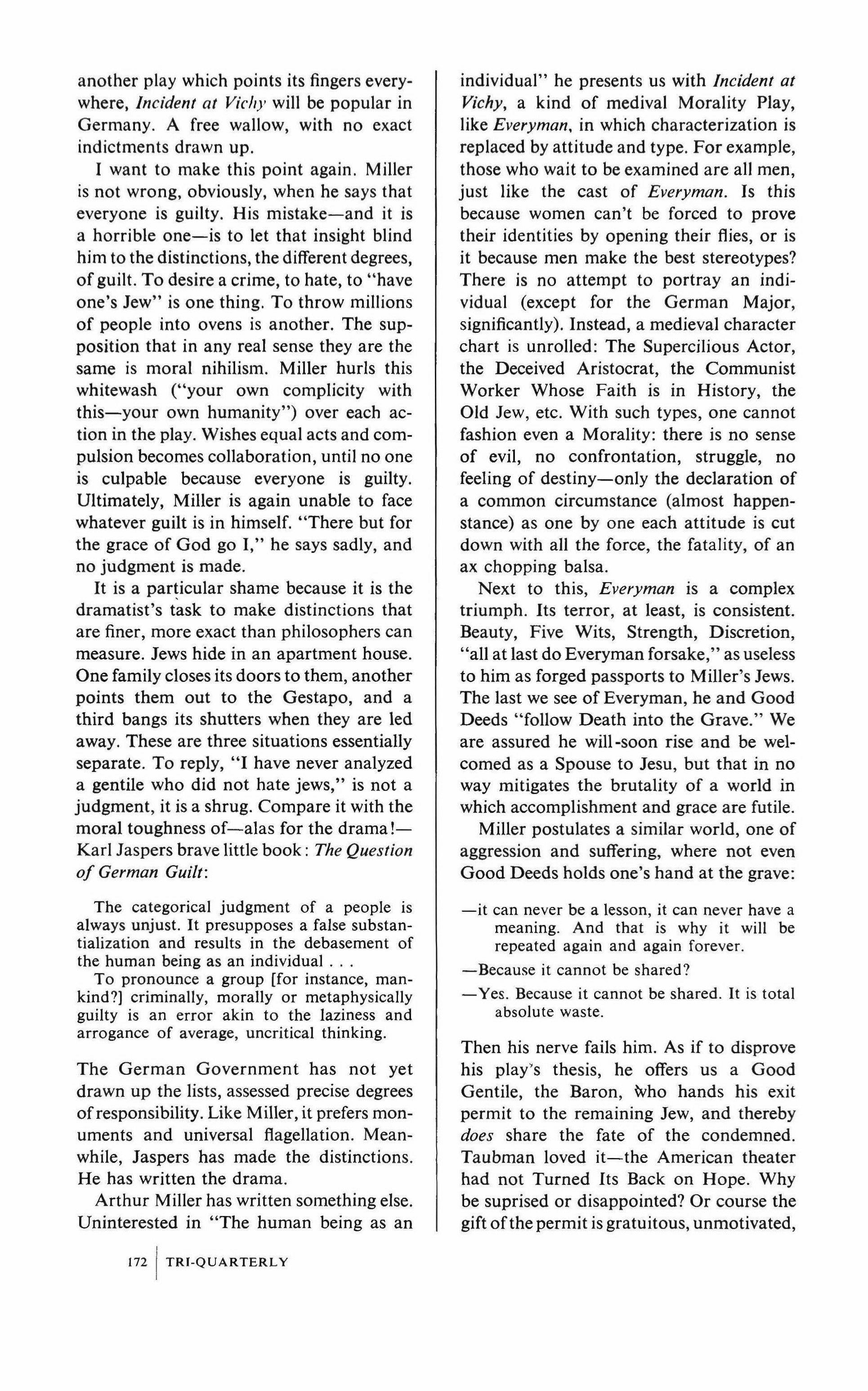
another play which points its fingers everywhere, Incident at Vichy will be popular in Germany. A free wallow, with no exact indictments drawn up.
I want to make this point again. Miller is not wrong, obviously, when he says that everyone is guilty. His mistake-and it is a horrible one-is to let that insight blind him to the distinctions, the different degrees, of guilt. To desire a crime, to hate, to "have one's Jew" is one thing. To throw millions of people into ovens is another. The supposition that in any real sense they are the same is moral nihilism. Miller hurls this whitewash ("your own complicity with this-your own humanity") over each action in the play. Wishes equal acts and compulsion becomes collaboration, until no one is culpable because everyone is guilty. Ultimately, Miller is again unable to face whatever guilt is in himself. "There but for the grace of God go I," he says sadly, and no judgment is made.
It is a particular shame because it is the dramatist's task to make distinctions that are finer, more exact than philosophers can measure. Jews hide in an apartment house. One family closes its doors to them, another points them out to the Gestapo, and a third bangs its shutters when they are led away. These are three situations essentially separate. To reply, "I have never analyzed a gentile who did not hate jews," is not a judgment, it is a shrug. Compare it with the moral toughness of-alas for the drama!Karl Jaspers brave little book: The Question of German Guilt:
The categorical judgment of a people is always unjust. It presupposes a false substantialization and results in the debasement of the human being as an individual
To pronounce a group [for instance, mankind?) criminally, morally or metaphysically guilty is an error akin to the laziness and arrogance of average, uncritical thinking.
The German Government has not yet drawn up the lists, assessed precise degrees ofresponsibility. Like Miller, it prefers monuments and universal flagellation. Meanwhile, Jaspers has made the distinctions. He has written the drama.
Arthur Miller has written something else. Uninterested in "The human being as an 1721 TRI-QUARTERLY
individual" he presents us with Incident at Vichy, a kind of medival Morality Play, like Everyman, in which characterization is replaced by attitude and type. For example, those who wait to be examined are all men, just like the cast of Everyman. Is this because women can't be forced to prove their identities by opening their flies, or is it because men make the best stereotypes? There is no attempt to portray an individual (except for the German Major, significantly). Instead, a medieval character chart is unrolled: The Supercilious Actor, the Deceived Aristocrat, the Communist Worker Whose Faith is in History, the Old Jew, etc. With such types, one cannot fashion even a Morality: there is no sense of evil, no confrontation, struggle, no feeling of destiny-only the declaration of a common circumstance (almost happenstance) as one by one each attitude is cut down with all the force, the fatality, of an ax chopping balsa.
Next to this, Everyman is a complex triumph. Its terror, at least, is consistent. Beauty, Five Wits, Strength, Discretion, "all at last do Everyman forsake," as useless to him as forged passports to Miller's Jews. The last we see of Everyman, he and Good Deeds "follow Death into the Grave." We are assured he will-soon rise and be welcomed as a Spouse to Jesu, but that in no way mitigates the brutality of a world in which accomplishment and grace are futile.
Miller postulates a similar world, one of aggression and suffering, where not even Good Deeds holds one's hand at the grave:
-it can never be a lesson, it can never have a meaning. And that is why it will be repeated again and again forever.
-Because it cannot be shared?
- Yes. Because it cannot be shared. It is total absolute waste.
Then his nerve fails him. As if to disprove his play's thesis, he offers us a Good Gentile, the Baron, Who hands his exit permit to the remaining Jew, and thereby does share the fate of the condemned. Taubman loved it-the American theater had not Turned Its Back on Hope. Why be suprised or disappointed? Or course the gift ofthe permit is gratuitous, unmotivated,
phoney-a high-school gesture, not an act. But this is what one should expect. Weteyed sentimentality is the other side of the coin of total accusation, Understanding All, the grace of God. Unable to judge men, Miller offers his handerchief. It is the Enemy of the People adaptation all over again. Heal the differences among us; every man a member of the majority. Compassion is a moral emotion; that is such a simple thing to say. It seems to have eluded Miller's grasp.
It is decades since the Jews were murdered. It is an event that only begins to be speakable. We, the world, have been in a stage of shock for twenty years. No one has forgotten-there is no danger, really, of that. It is just that it has been impossible to remember. With few exceptions, such as Jaspers, it is now, only now, here and there, in fragments, uncontrollably, that the counter-attack begins. Incident at Vichy, though it has some decent things to say about other matters (and though it contains one genuinely dramatic moment: when the Old Jew's bundle to which he clung tenaciously throughout the play is finally ripped from him, it splits-and the air is filled with feathers, only feathers) it has no part to play in the revulsion, the recoil, the understanding or the judgment which must come.
Only a word about Lincoln Center. Both of Miller's plays have been produced in temporary headquarters while the uptown theater is being finished. The Washington Square setting is grand-essentially a giant hole swiped out of the ground with seats strewn round three sides of the crater and a
corrugated shack slapped up above. No seat is isolated from the action by space, a curtain, a proscenium or even excessive comfort. Too bad that when Clurman directed Vichy he did not notice that the balconies no longer exist.
The permanent theater is almost finished and, though Eero Saarinen's design is far and away superior to anything else in the Lincoln Center complex, I am afraid it too will further confirm a favorite axiom: to whatever degree the theater becomes elaborate and the scenery important, to an equal and inverse degree the drama dwindles and dies. In 58 B.C. Aemilius Scaurus built "the greatest work ever achieved by the hands of man," a three-story theater supported by 360 columns. The first level was marble; the second, glass, and the third was of gilded wood. Three thousand bronze statues were scattered about its surface. In it the elephants undoubtedly danced, homosexuals enacted pantomimes, and Plautus was often revived. And here is Lincoln Center: Philharmonic Hall for all the world looking (and sounding) like a most elegant private bathroom; the State Theater camped out as a Mississippi Showboat with diamond paddlewheels (they tried King Lear there last year, but the words died on the air of their own accord); and in the midsts of it all the Revlon Fountain, Aemilius Scaurus' marble dream, gleaming like thousands of statues, shooting upward streams of glass and gilt, higher and higher, the Greatest Work Yet Achieved by Man. About 400 years, the timing is right: we play Rome to Elizabeth's Greece.
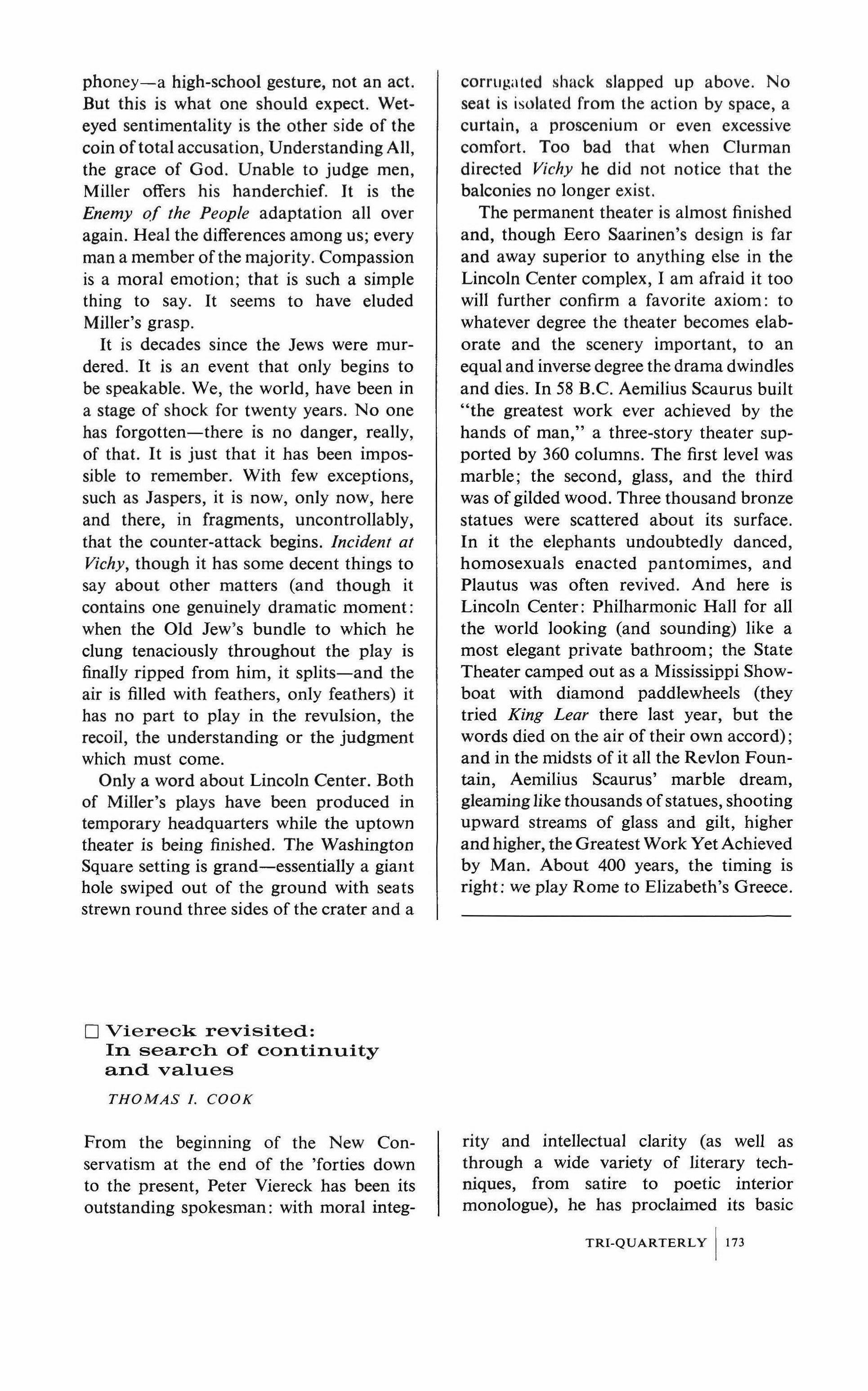
o Viereck revisited: In search of continuity and values
THOMAS I. COOK
From the beginning of the New Conservatism at the end of the 'forties down to the present, Peter Viereck has been its outstanding spokesman: with moral integ-
rity and intellectual clarity (as well as through a wide variety of literary techniques, from satire to poetic interior monologue), he has proclaimed its basic
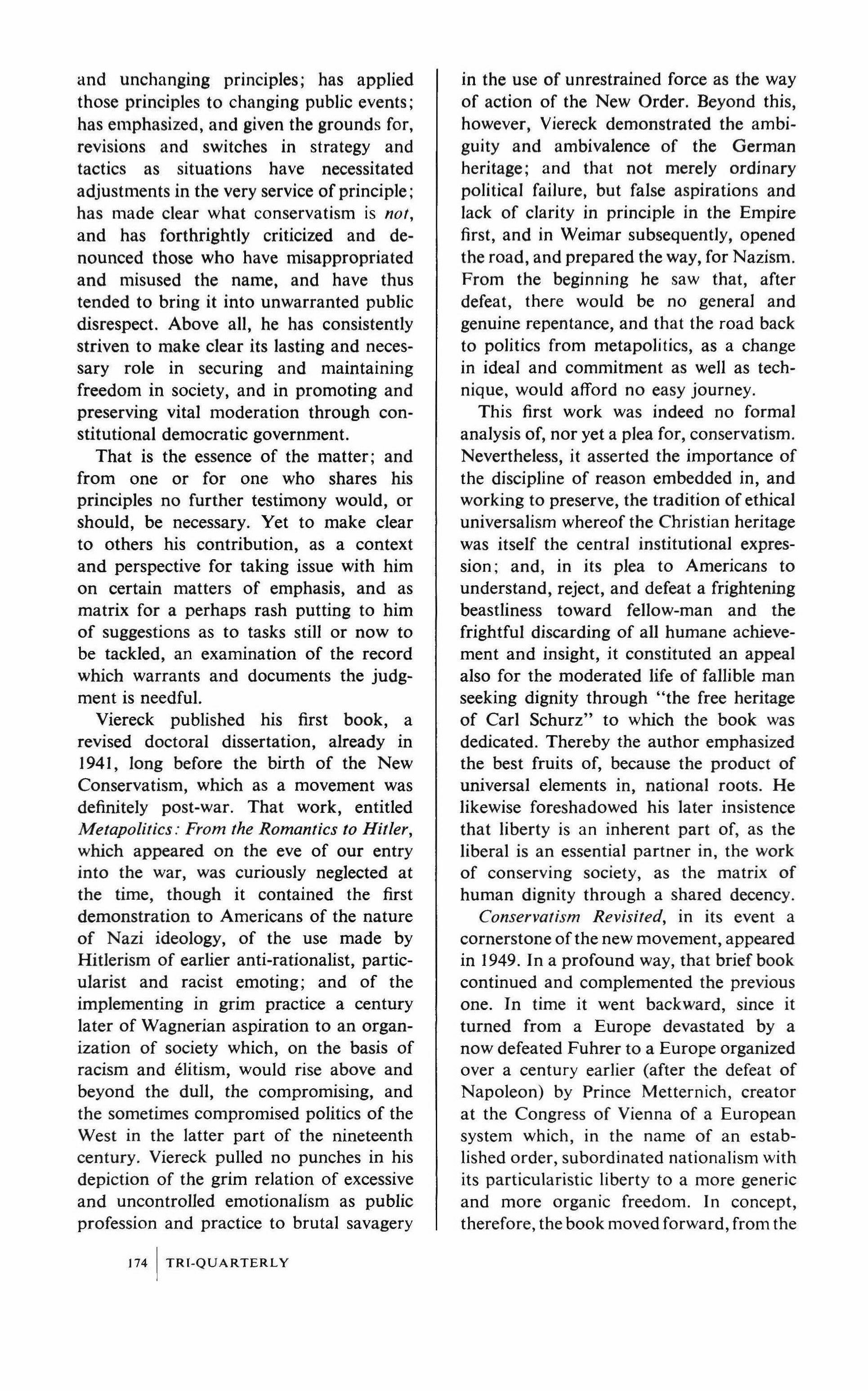
and unchanging principles; has applied those principles to changing public events; has emphasized, and given the grounds for, revisions and switches in strategy and tactics as situations have necessitated adjustments in the very service of principle; has made clear what conservatism is not, and has forthrightly criticized and denounced those who have misappropriated and misused the name, and have thus tended to bring it into unwarranted public disrespect. Above all, he has consistently striven to make clear its lasting and necessary role in securing and maintaining freedom in society, and in promoting and preserving vital moderation through constitutional democratic government.
That is the essence of the matter; and from one or for one who shares his principles no further testimony would, or should, be necessary. Yet to make clear to others his contribution, as a context and perspective for taking issue with him on certain matters of emphasis, and as matrix for a perhaps rash putting to him of suggestions as to tasks still or now to be tackled, an examination of the record which warrants and documents the judgment is needful.
Viereck published his first book, a revised doctoral dissertation, already in 1941, long before the birth of the New Conservatism, which as a movement was definitely post-war. That work, entitled Metapolitics : From the Romantics to Hitler, which appeared on the eve of our entry into the war, was curiously neglected at the time, though it contained the first demonstration to Americans of the nature of Nazi ideology, of the use made by Hitlerism of earlier anti-rationalist, particularist and racist emoting; and of the implementing in grim practice a century later of Wagnerian aspiration to an organization of society which, on the basis of racism and elitism, would rise above and beyond the dull, the compromising, and the sometimes compromised politics of the West in the latter part of the nineteenth century. Viereck pulled no punches in his depiction of the grim relation of excessive and uncontrolled emotionalism as public profession and practice to brutal savagery
1741 TRI-QUARTERLY
in the use of unrestrained force as the way of action of the New Order. Beyond this, however, Viereck demonstrated the ambiguity and ambivalence of the German heritage; and that not merely ordinary political failure, but false aspirations and lack of clarity in principle in the Empire first, and in Weimar subsequently, opened the road, and prepared the way, for Nazism. From the beginning he saw that, after defeat, there would be no general and genuine repentance, and that the road back to politics from metapolitics, as a change in ideal and commitment as well as technique, would afford no easy journey.
This first work was indeed no formal analysis of, nor yet a plea for, conservatism. Nevertheless, it asserted the importance of the discipline of reason embedded in, and working to preserve, the tradition of ethical universalism whereof the Christian heritage was itself the central institutional expression; and, in its plea to Americans to understand, reject, and defeat a frightening beastliness toward fellow-man and the frightful discarding of all humane achievement and insight, it constituted an appeal also for the moderated life of fallible man seeking dignity through "the free heritage of Carl Schurz" to which the book was dedicated. Thereby the author emphasized the best fruits of, because the product of universal elements in, national roots. He likewise foreshadowed his later insistence that liberty is an inherent part of, as the liberal is an essential partner in, the work of conserving society, as the matrix of human dignity through a shared decency.
Conservatism Revisited, in its event a cornerstone ofthe new movement, appeared in 1949. In a profound way, that brief book continued and complemented the previous one. In time it went backward, since it turned from a Europe devastated by a now defeated Fuhrer to a Europe organized over a century earlier (after the defeat of Napoleon) by Prince Metternich, creator at the Congress of Vienna of a European system which, in the name of an established order, subordinated nationalism with its particularistic liberty to a more generic and more organic freedom. In concept, therefore, the book moved forward, from the
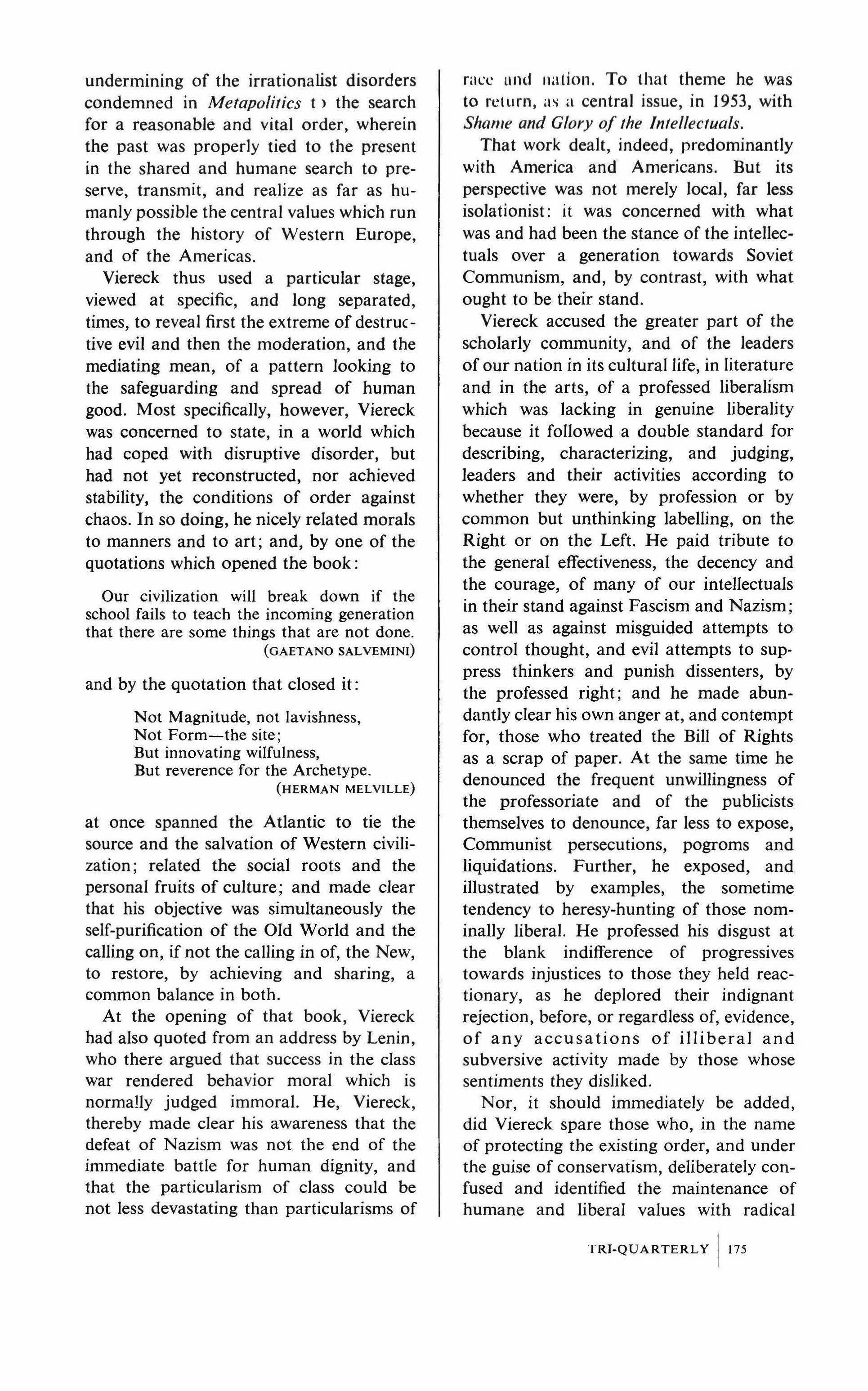
undermining of the irrationalist disorders condemned in Metapolitics t i the search for a reasonable and vital order, wherein the past was properly tied to the present in the shared and humane search to preserve, transmit, and realize as far as humanly possible the central values which run through the history of Western Europe, and of the Americas.
Viereck thus used a particular stage, viewed at specific, and long separated, times, to reveal first the extreme of destructive evil and then the moderation, and the mediating mean, of a pattern looking to the safeguarding and spread of human good. Most specifically, however, Viereck was concerned to state, in a world which had coped with disruptive disorder, but had not yet reconstructed, nor achieved stability, the conditions of order against chaos. In so doing, he nicely related morals to manners and to art; and, by one of the quotations which opened the book:
Our civilization will break down if the school fails to teach the incoming generation that there are some things that are not done.
(GAETANO SALVEMINI)
and by the quotation that closed it:
Not Magnitude, not lavishness, Not Form-the site; But innovating wilfulness, But reverence for the Archetype.
(HERMAN MELVILLE)
at once spanned the Atlantic to tie the source and the salvation of Western civilization; related the social roots and the personal fruits of culture; and made clear that his objective was simultaneously the self-purification of the Old World and the calling on, if not the calling in of, the New, to restore, by achieving and sharing, a common balance in both.
At the opening of that book, Viereck had also quoted from an address by Lenin, who there argued that success in the class war rendered behavior moral which is norma!iy judged immoral. He, Viereck, thereby made clear his awareness that the defeat of Nazism was not the end of the immediate battle for human dignity, and that the particularism of class could be not less devastating than particularisms of
race und nation. To that theme he was to return, as a central issue, in 1953, with Shame and Glory 0/ the Intellectuals.
That work dealt, indeed, predominantly with America and Americans. But its perspective was not merely local, far less isolationist: it was concerned with what was and had been the stance of the intellectuals over a generation towards Soviet Communism, and, by contrast, with what ought to be their stand.
Viereck accused the greater part of the scholarly community, and of the leaders of our nation in its cultural life, in literature and in the arts, of a professed liberalism which was lacking in genuine liberality because it followed a double standard for describing, characterizing, and judging, leaders and their activities according to whether they were, by profession or by common but unthinking labelling, on the Right or on the Left. He paid tribute to the general effectiveness, the decency and the courage, of many of our intellectuals in their stand against Fascism and Nazism; as well as against misguided attempts to control thought, and evil attempts to suppress thinkers and punish dissenters, by the professed right; and he made abundantly clear his own anger at, and contempt for, those who treated the Bill of Rights as a scrap of paper. At the same time he denounced the frequent unwillingness of the professoriate and of the publicists themselves to denounce, far less to expose, Communist persecutions, pogroms and liquidations. Further, he exposed, and illustrated by examples, the sometime tendency to heresy-hunting of those nominally liberal. He professed his disgust at the blank indifference of progressives towards injustices to those they held reactionary, as he deplored their indignant rejection, before, or regardless of, evidence, of any accusations of illiberal and subversive activity made by those whose sentiments they disliked.
Nor, it should immediately be added, did Viereck spare those who, in the name of protecting the existing order, and under the guise of conservatism, deliberately confused and identified the maintenance of humane and liberal values with radical
TRI-QUARTERLY 1175
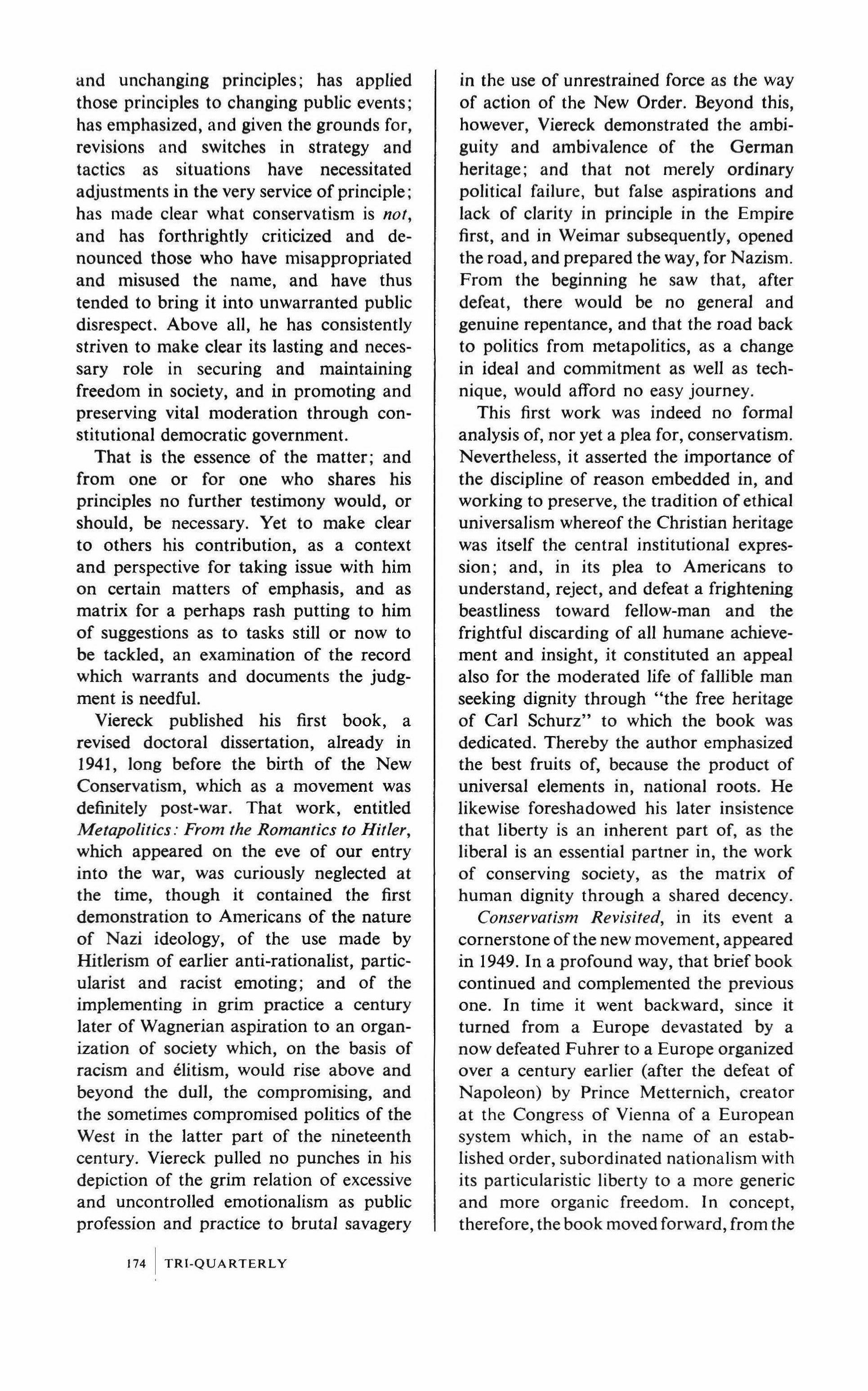
and unchanging principles; has applied those principles to changing public events; has emphasized, and given the grounds for, revisions and switches in strategy and tactics as situations have necessitated adjustments in the very service of principle; has made clear what conservatism is not, and has forthrightly criticized and denounced those who have misappropriated and misused the name, and have thus tended to bring it into unwarranted public disrespect. Above all, he has consistently striven to make clear its lasting and necessary role in securing and maintaining freedom in society, and in promoting and preserving vital moderation through constitutional democratic government.
That is the essence of the matter; and from one or for one who shares his principles no further testimony would, or should, be necessary. Yet to make clear to others his contribution, as a context and perspective for taking issue with him on certain matters of emphasis, and as matrix for a perhaps rash putting to him of suggestions as to tasks still or now to be tackled, an examination of the record which warrants and documents the judgment is needful.
Viereck published his first book, a revised doctoral dissertation, already in 1941, long before the birth of the New Conservatism, which as a movement was definitely post-war. That work, entitled Metapolitics: From the Romantics to Hitler, which appeared on the eve of our entry into the war, was curiously neglected at the time, though it contained the first demonstration to Americans of the nature of Nazi ideology, of the use made by Hitlerism of earlier anti-rationalist, particularist and racist emoting; and of the implementing in grim practice a century later of Wagnerian aspiration to an organization of society which, on the basis of racism and elitism, would rise above and beyond the dull, the compromising, and the sometimes compromised politics of the West in the latter part of the nineteenth century. Viereck pulled no punches in his depiction of the grim relation of excessive and uncontrolled emotionalism as public profession and practice to brutal savagery
174 TRI-QUARTERLY
in the use of unrestrained force as the way of action of the New Order. Beyond this, however, Viereck demonstrated the ambiguity and ambivalence of the German heritage; and that not merely ordinary political failure, but false aspirations and lack of clarity in principle in the Empire first, and in Weimar subsequently, opened the road, and prepared the way, for Nazism. From the beginning he saw that, after defeat, there would be no general and genuine repentance, and that the road back to politics from metapolitics, as a change in ideal and commitment as well as technique, would afford no easy journey.
This first work was indeed no formal analysis of, nor yet a plea for, conservatism. Nevertheless, it asserted the importance of the discipline of reason embedded in, and working to preserve, the tradition of ethical universalism whereof the Christian heritage was itself the central institutional expression; and, in its plea to Americans to understand, reject, and defeat a frightening beastliness toward fellow-man and the frightful discarding of all humane achievement and insight, it constituted an appeal also for the moderated life of fallible man seeking dignity through "the free heritage of Carl Schurz" to which the book was dedicated. Thereby the author emphasized the best fruits of, because the product of universal elements in, national roots. He likewise foreshadowed his later insistence that liberty is an inherent part of, as the liberal is an essential partner in, the work of conserving society, as the matrix of human dignity through a shared decency.
Conservatism Revisited, in its event a cornerstone of the new movement, appeared in 1949. In a profound way, that brief book continued and complemented the previous one. In time it went backward, since it turned from a Europe devastated by a now defeated Fuhrer to a Europe organized over a century earlier (after the defeat of Napoleon) by Prince Metternich, creator at the Congress of Vienna of a European system which, in the name of an established order, subordinated nationalism with its particularistic liberty to a more generic and more organic freedom. In concept, therefore, the book moved forward, from the
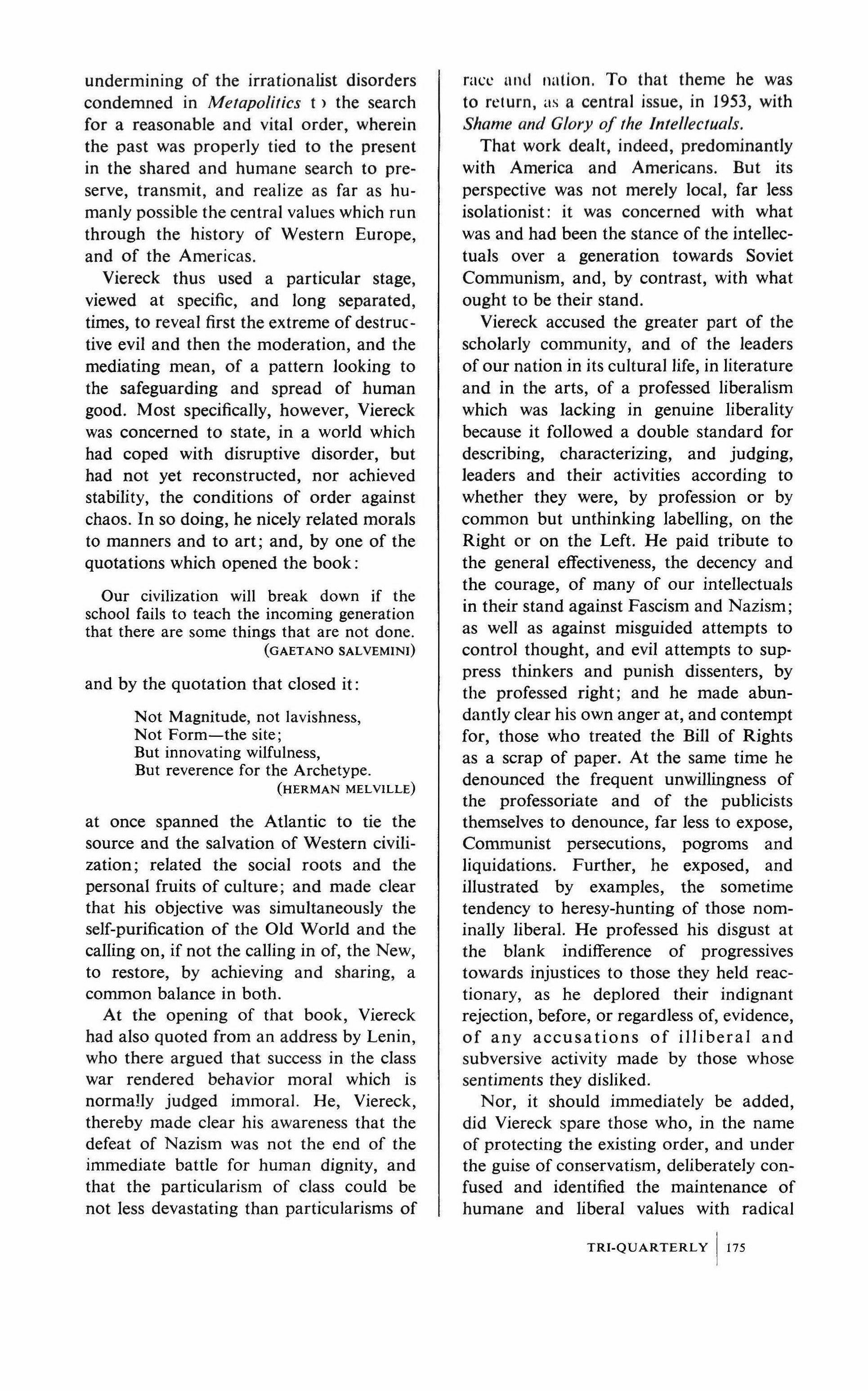
undermining of the irrationalist disorders condemned in Metapolitics t i the search for a reasonable and vital order, wherein the past was properly tied to the present in the shared and humane search to preserve, transmit, and realize as far as humanly possible the central values which run through the history of Western Europe, and of the Americas.
Viereck thus used a particular stage, viewed at specific, and long separated, times, to reveal first the extreme of destructive evil and then the moderation, and the mediating mean, of a pattern looking to the safeguarding and spread of human good. Most specifically, however, Viereck was concerned to state, in a world which had coped with disruptive disorder, but had not yet reconstructed, nor achieved stability, the conditions of order against chaos. In so doing, he nicely related morals to manners and to art; and, by one of the quotations which opened the book:
Our civilization will break down if the school fails to teach the incoming generation that there are some things that are not done.
(GAETANO SALVEMINI)
and by the quotation that closed it:
Not Magnitude, not lavishness, Not Form-the site; But innovating wilfulness, But reverence for the Archetype.
(HERMAN MELVILLE)
at once spanned the Atlantic to tie the source and the salvation of Western civilization; related the social roots and the personal fruits of culture; and made clear that his objective was simultaneously the self-purification of the Old World and the calling on, if not the calling in of, the New, to restore, by achieving and sharing, a common balance in both.
At the opening of that book, Viereck had also quoted from an address by Lenin, who there argued that success in the class war rendered behavior moral which is normally judged immoral. He, Viereck, thereby made clear his awareness that the defeat of Nazism was not the end of the immediate battle for human dignity, and that the particularism of class could be not less devastating than particularisms of
race lind nation. To that theme he was to return, as a central issue, in 1953, with Shame and Glory of the Intellectuals.
That work dealt, indeed, predominantly with America and Americans. But its perspective was not merely local, far less isolationist: it was concerned with what was and had been the stance of the intellectuals over a generation towards Soviet Communism, and, by contrast, with what ought to be their stand.
Viereck accused the greater part of the scholarly community, and of the leaders of our nation in its cultural life, in literature and in the arts, of a professed liberalism which was lacking in genuine liberality because it followed a double standard for describing, characterizing, and judging, leaders and their activities according to whether they were, by profession or by common but unthinking labelling, on the Right or on the Left. He paid tribute to the general effectiveness, the decency and the courage, of many of our intellectuals in their stand against Fascism and Nazism; as well as against misguided attempts to control thought, and evil attempts to suppress thinkers and punish dissenters, by the professed right; and he made abundantly clear his own anger at, and contempt for, those who treated the Bill of Rights as a scrap of paper. At the same time he denounced the frequent unwillingness of the professoriate and of the publicists themselves to denounce, far less to expose, Communist persecutions, pogroms and liquidations. Further, he exposed, and illustrated by examples, the sometime tendency to heresy-hunting of those nominally liberal. He professed his disgust at the blank indifference of progressives towards injustices to those they held reactionary, as he deplored their indignant rejection, before, or regardless of, evidence, of any accusations of illiberal and subversive activity made by those whose sentiments they disliked.
Nor, it should immediately be added, did Viereck spare those who, in the name of protecting the existing order, and under the guise of conservatism, deliberately confused and identified the maintenance of humane and liberal values with radical
TRI-QUARTERLY 1175
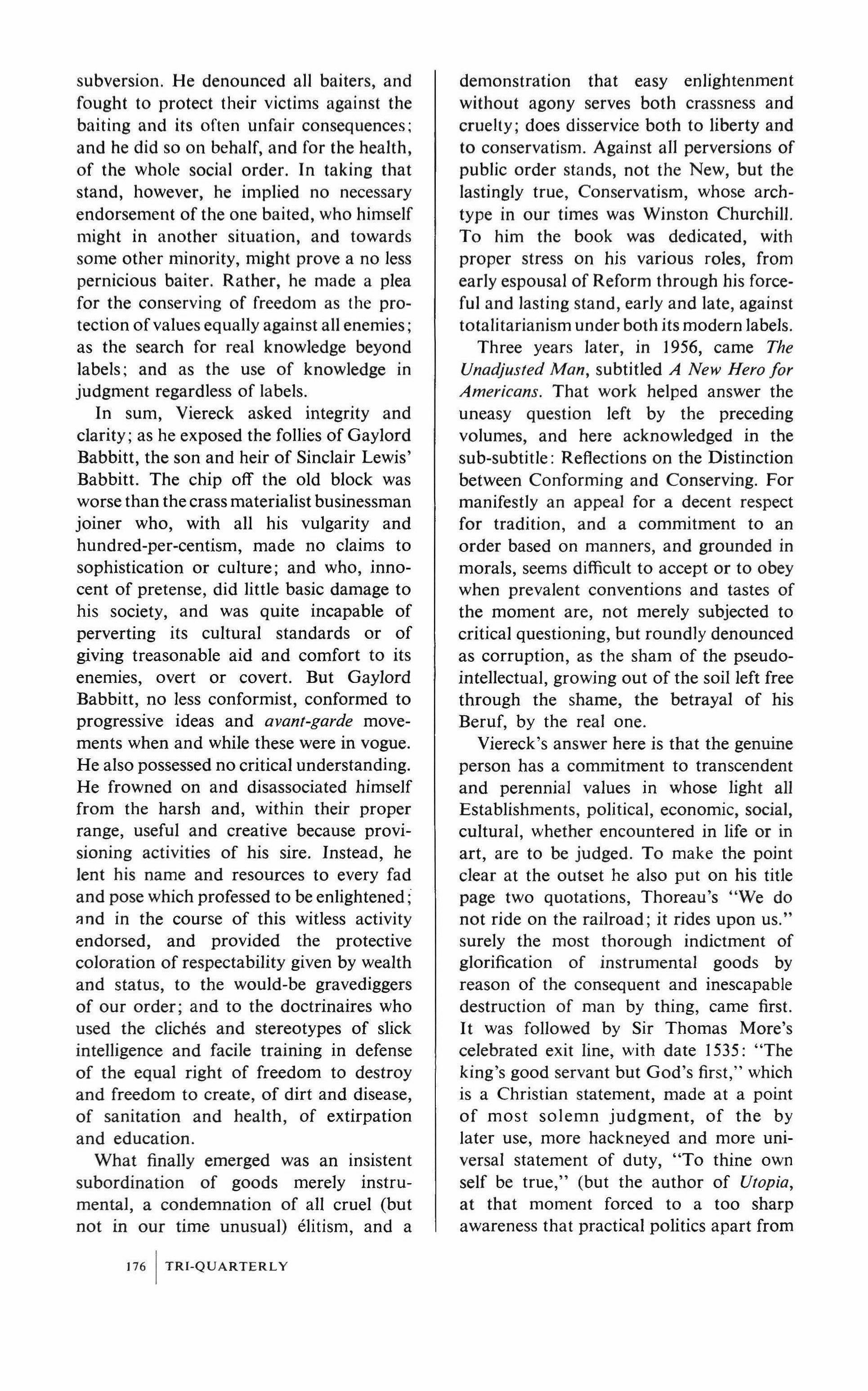
subversion. He denounced all baiters, and fought to protect their victims against the baiting and its often unfair consequences; and he did so on behalf, and for the health, of the whole social order. In taking that stand, however, he implied no necessary endorsement of the one baited, who himself might in another situation, and towards some other minority, might prove a no less pernicious baiter. Rather, he made a plea for the conserving of freedom as the protection of values equally against all enemies; as the search for real knowledge beyond labels; and as the use of knowledge in judgment regardless of labels.
In sum, Viereck asked integrity and clarity; as he exposed the follies of Gaylord Babbitt, the son and heir of Sinclair Lewis' Babbitt. The chip off the old block was worse than the crass materialist businessman joiner who, with all his vulgarity and hundred-per-centism, made no claims to sophistication or culture; and who, innocent of pretense, did little basic damage to his society, and was quite incapable of perverting its cultural standards or of giving treasonable aid and comfort to its enemies, overt or covert. But Gaylord Babbitt, no less conformist, conformed to progressive ideas and avant-garde movements when and while these were in vogue. He also possessed no critical understanding. He frowned on and disassociated himself from the harsh and, within their proper range, useful and creative because provisioning activities of his sire. Instead, he lent his name and resources to every fad and pose which professed to be enlightened; lind in the course of this witless activity endorsed, and provided the protective coloration of respectability given by wealth and status, to the would-be gravediggers of our order; and to the doctrinaires who used the cliches and stereotypes of slick intelligence and facile training in defense of the equal right of freedom to destroy and freedom to create, of dirt and disease, of sanitation and health, of extirpation and education.
What finally emerged was an insistent subordination of goods merely instrumental, a condemnation of all cruel (but not in our time unusual) elitism, and a
1761 TRI-QUARTERLY
demonstration that easy enlightenment without agony serves both crassness and cruelty; does disservice both to liberty and to conservatism. Against all perversions of public order stands, not the New, but the lastingly true, Conservatism, whose archtype in our times was Winston Churchill. To him the book was dedicated, with proper stress on his various roles, from early espousal of Reform through his forceful and lasting stand, early and late, against totalitarianism under both its modern labels.
Three years later, in 1956, came The Unadjusted Man, subtitled A New Hero for Americans. That work helped answer the uneasy question left by the preceding volumes, and here acknowledged in the sub-subtitle: Reflections on the Distinction between Conforming and Conserving. For manifestly an appeal for a decent respect for tradition, and a commitment to an order based on manners, and grounded in morals, seems difficult to accept or to obey when prevalent conventions and tastes of the moment are, not merely subjected to critical questioning, but roundly denounced as corruption, as the sham of the pseudointellectual, growing out of the soil left free through the shame, the betrayal of his Beruf, by the real one.
Viereck's answer here is that the genuine person has a commitment to transcendent and perennial values in whose light all Establishments, political, economic, social, cultural, whether encountered in life or in art, are to be judged. To make the point clear at the outset he also put on his title page two quotations, Thoreau's "We do not ride on the railroad; it rides upon us." surely the most thorough indictment of glorification of instrumental goods by reason of the consequent and inescapable destruction of man by thing, came first. It was followed by Sir Thomas More's celebrated exit line, with date 1535: "The king's good servant but God's first," which is a Christian statement, made at a point of most solemn judgment, of the by later use, more hackneyed and more universal statement of duty, "To thine own self be true," (but the author of Utopia, at that moment forced to a too sharp awareness that practical politics apart from
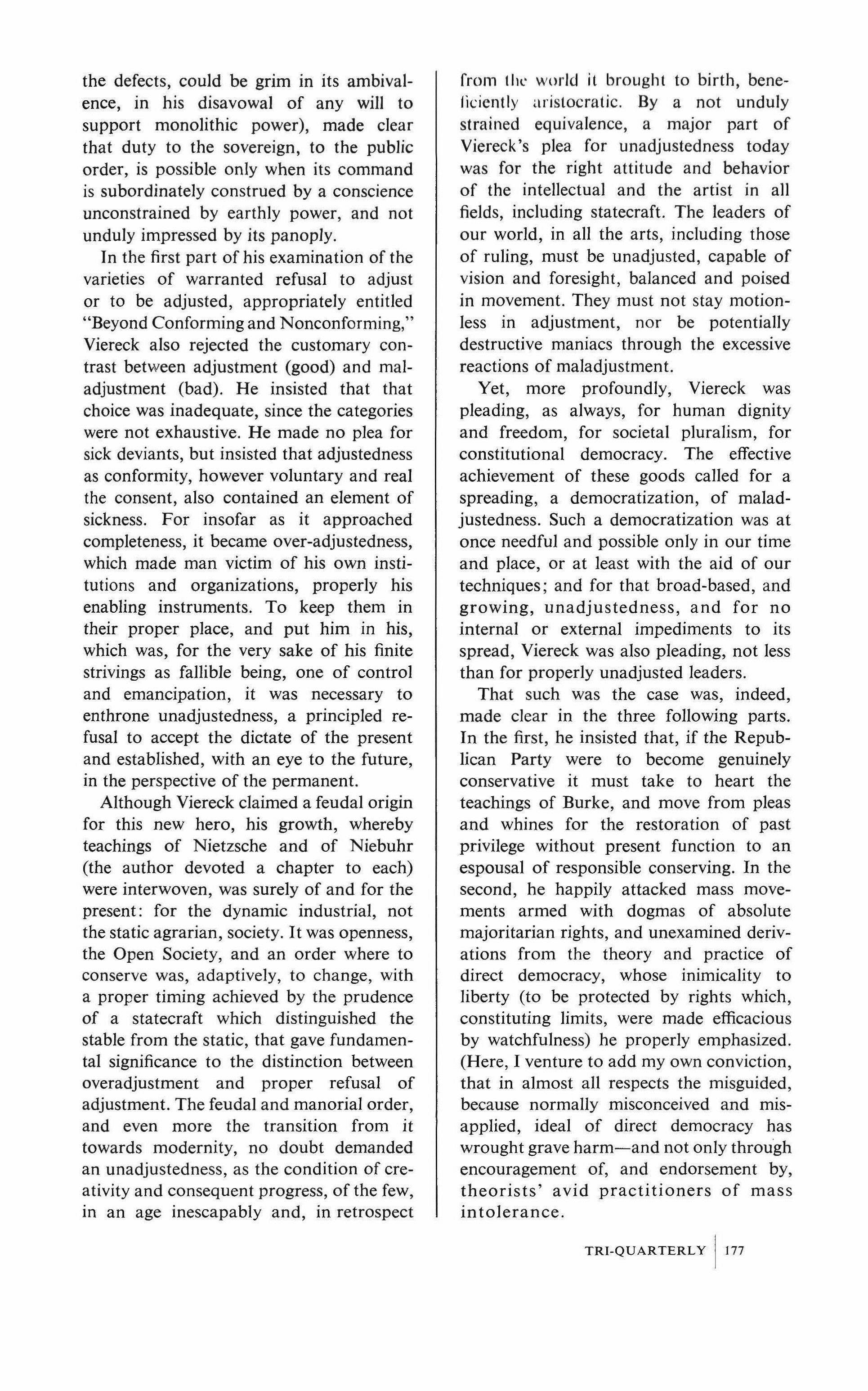
the defects, could be grim in its ambivalence, in his disavowal of any will to support monolithic power), made clear that duty to the sovereign, to the public order, is possible only when its command is subordinately construed by a conscience unconstrained by earthly power, and not unduly impressed by its panoply.
In the first part of his examination of the varieties of warranted refusal to adjust or to be adjusted, appropriately entitled "Beyond Conforming and Nonconforming," Viereck also rejected the customary contrast between adjustment (good) and maladjustment (bad). He insisted that that choice was inadequate, since the categories were not exhaustive. He made no plea for sick deviants, but insisted that adjustedness as conformity, however voluntary and real the consent, also contained an element of sickness. For insofar as it approached completeness, it became over-adjustedness, which made man victim of his own institutions and organizations, properly his enabling instruments. To keep them in their proper place, and put him in his, which was, for the very sake of his finite strivings as fallible being, one of control and emancipation, it was necessary to enthrone unadjustedness, a principled refusal to accept the dictate of the present and established, with an eye to the future, in the perspective of the permanent.
Although Viereck claimed a feudal origin for this new hero, his growth, whereby teachings of Nietzsche and of Niebuhr (the author devoted a chapter to each) were interwoven, was surely of and for the present: for the dynamic industrial, not the static agrarian, society. It was openness, the Open Society, and an order where to conserve was, adaptively, to change, with a proper timing achieved by the prudence of a statecraft which distinguished the stable from the static, that gave fundamental significance to the distinction between overadjustment and proper refusal of adjustment. The feudal and manorial order, and even more the transition from it towards modernity, no doubt demanded an unadjustedness, as the condition of creativity and consequent progress, of the few, in an age inescapably and, in retrospect
from the world it brought to birth, beneIiciently aristocratic. By a not unduly strained equivalence, a major part of Viereck's plea for unadjustedness today was for the right attitude and behavior of the intellectual and the artist in all fields, including statecraft. The leaders of our world, in all the arts, including those of ruling, must be unadjusted, capable of vision and foresight, balanced and poised in movement. They must not stay motionless in adjustment, nor be potentially destructive maniacs through the excessive reactions of maladjustment.
Yet, more profoundly, Viereck was pleading, as always, for human dignity and freedom, for societal pluralism, for constitutional democracy. The effective achievement of these goods called for a spreading, a democratization, of maladjustedness. Such a democratization was at once needful and possible only in our time and place, or at least with the aid of our techniques; and for that broad-based, and growing, unadjustedness, and for no internal or external impediments to its spread, Viereck was also pleading, not less than for properly unadjusted leaders.
That such was the case was, indeed, made clear in the three following parts. In the first, he insisted that, if the Republican Party were to become genuinely conservative it must take to heart the teachings of Burke, and move from pleas and whines for the restoration of past privilege without present function to an espousal of responsible conserving. In the second, he happily attacked mass movements armed with dogmas of absolute majoritarian rights, and unexamined derivations from the theory and practice of direct democracy, whose inimicality to liberty (to be protected by rights which, constituting limits, were made efficacious by watchfulness) he properly emphasized. (Here, I venture to add my own conviction, that in almost all respects the misguided, because normally misconceived and misapplied, ideal of direct democracy has wrought grave harm-and not only through encouragement of, and endorsement by, theorists' avid practitioners of mass intolerance.
TRI-QUARTERLY 1177
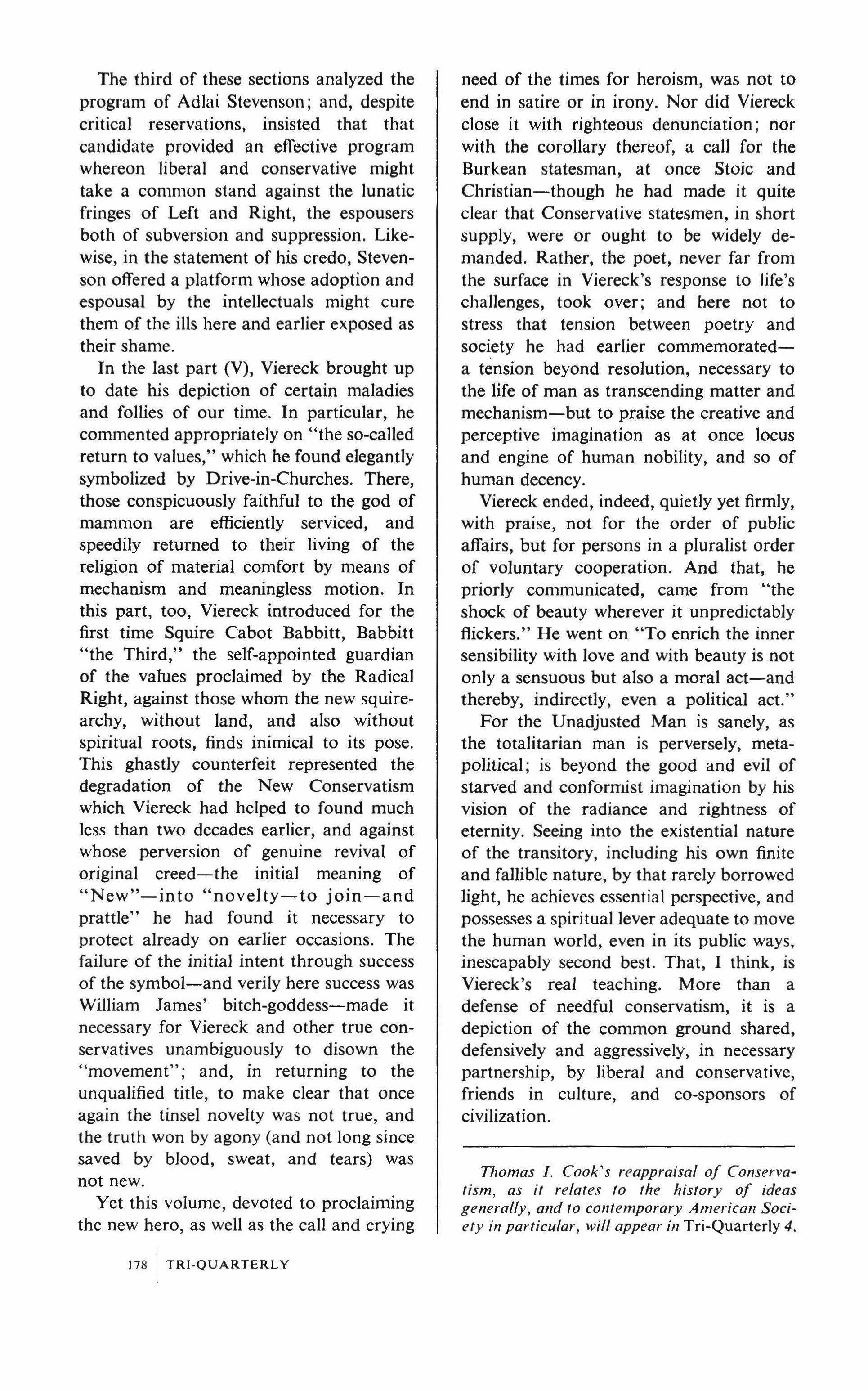
The third of these sections analyzed the program of Adlai Stevenson; and, despite critical reservations, insisted that that candidate provided an effective program whereon liberal and conservative might take a common stand against the lunatic fringes of Left and Right, the espousers both of subversion and suppression. Likewise, in the statement of his credo, Stevenson offered a platform whose adoption and espousal by the intellectuals might cure them of the ills here and earlier exposed as their shame.
In the last part (V), Viereck brought up to date his depiction of certain maladies and follies of our time. In particular, he commented appropriately on "the so-called return to values," which he found elegantly symbolized by Drive-in-Churches. There, those conspicuously faithful to the god of mammon are efficiently serviced, and speedily returned to their living of the religion of material comfort by means of mechanism and meaningless motion. In this part, too, Viereck introduced for the first time Squire Cabot Babbitt, Babbitt "the Third," the self-appointed guardian of the values proclaimed by the Radical Right, against those whom the new squirearchy, without land, and also without spiritual roots, finds inimical to its pose. This ghastly counterfeit represented the degradation of the New Conservatism which Viereck had helped to found much less than two decades earlier, and against whose perversion of genuine revival of original creed-the initial meaning of "New"-into "novelty-to join-and prattle" he had found it necessary to protect already on earlier occasions. The failure of the initial intent through success of the symbol-and verily here success was William James' bitch-goddess-made it necessary for Viereck and other true conservatives unambiguously to disown the "movement"; and, in returning to the unqualified title, to make clear that once again the tinsel novelty was not true, and the truth won by agony (and not long since saved by blood, sweat, and tears) was not new.
Yet this volume, devoted to proclaiming the new hero, as well as the call and crying
178[ TRI-QUARTERLY
need of the times for heroism, was not to end in satire or in irony. Nor did Viereck close it with righteous denunciation; nor with the corollary thereof, a call for the Burkean statesman, at once Stoic and Christian-though he had made it quite clear that Conservative statesmen, in short supply, were or ought to be widely demanded. Rather, the poet, never far from the surface in Viereck's response to life's challenges, took over; and here not to stress that tension between poetry and society he had earlier commemorateda tension beyond resolution, necessary to the life of man as transcending matter and mechanism-but to praise the creative and perceptive imagination as at once locus and engine of human nobility, and so of human decency.
Viereck ended, indeed, quietly yet firmly, with praise, not for the order of public affairs, but for persons in a pluralist order of voluntary cooperation. And that, he priorly communicated, came from "the shock of beauty wherever it unpredictably flickers." He went on "To enrich the inner sensibility with love and with beauty is not only a sensuous but also a moral act-and thereby, indirectly, even a political act."
For the Unadjusted Man is sanely, as the totalitarian man is perversely, metapolitical; is beyond the good and evil of starved and conformist imagination by his vision of the radiance and rightness of eternity. Seeing into the existential nature of the transitory, including his own finite and fallible nature, by that rarely borrowed light, he achieves essential perspective, and possesses a spiritual lever adequate to move the human world, even in its public ways, inescapably second best. That, I think, is Viereck's real teaching. More than a defense of needful conservatism, it is a depiction of the common ground shared, defensively and aggressively, in necessary partnership, by liberal and conservative, friends in culture, and co-sponsors of civilization.
Thomas l. Cook's reappraisal of Conservatism, as it relates to the history of ideas generally, and to contemporary American Society in particular, will appear in Tri-Quarterly 4.
Ever since the executions of such men as Socrates and Jesus Christ, men have questioned the wisdom of the death penalty. Capital punishment has fewer advocates than ever today. It has repeatedly been shown that the death penalty is not a deterrent to homicide. Ten states have abolished the death penalty. With your help, Illinois can become an abolition state in 1965.
1. Write to the state senators and representatives in the Illinois General Assembly, Springfield, asking them to vote for abolition of the death penalty. Ask your friends to write.
2. Write letters to your local newspapers.
3. Persuade organizations of which you are a member to pass resolutions and sponsor petitions in favor of abolition of the death penalty.
4. Learn the facts about the death penalty-facts which prove it is useless, costly, inequitable, and the ultimate injustice when inflicted upon the innocent.
5. Join the Illinois Committee to Abolish Capital Punishment.
We need your financial support and your aid in reaching the public, the legislature, and the Governor of Illinois.
THE ILLINOIS COMMITTEE TO ABOLISH CAPITAL PUNISHMENT 28 East Jackson Boulevard, Room 1500, Chicago, III. 60604 Phone: 939-4454
Chairman
The Rev. James G. Jones
Honorary Chairmen
The Most Rev. Bernard J. Sheil
Rabbi Robert J. Marx
The Rev. Dr. Edgar H. S. Chandler
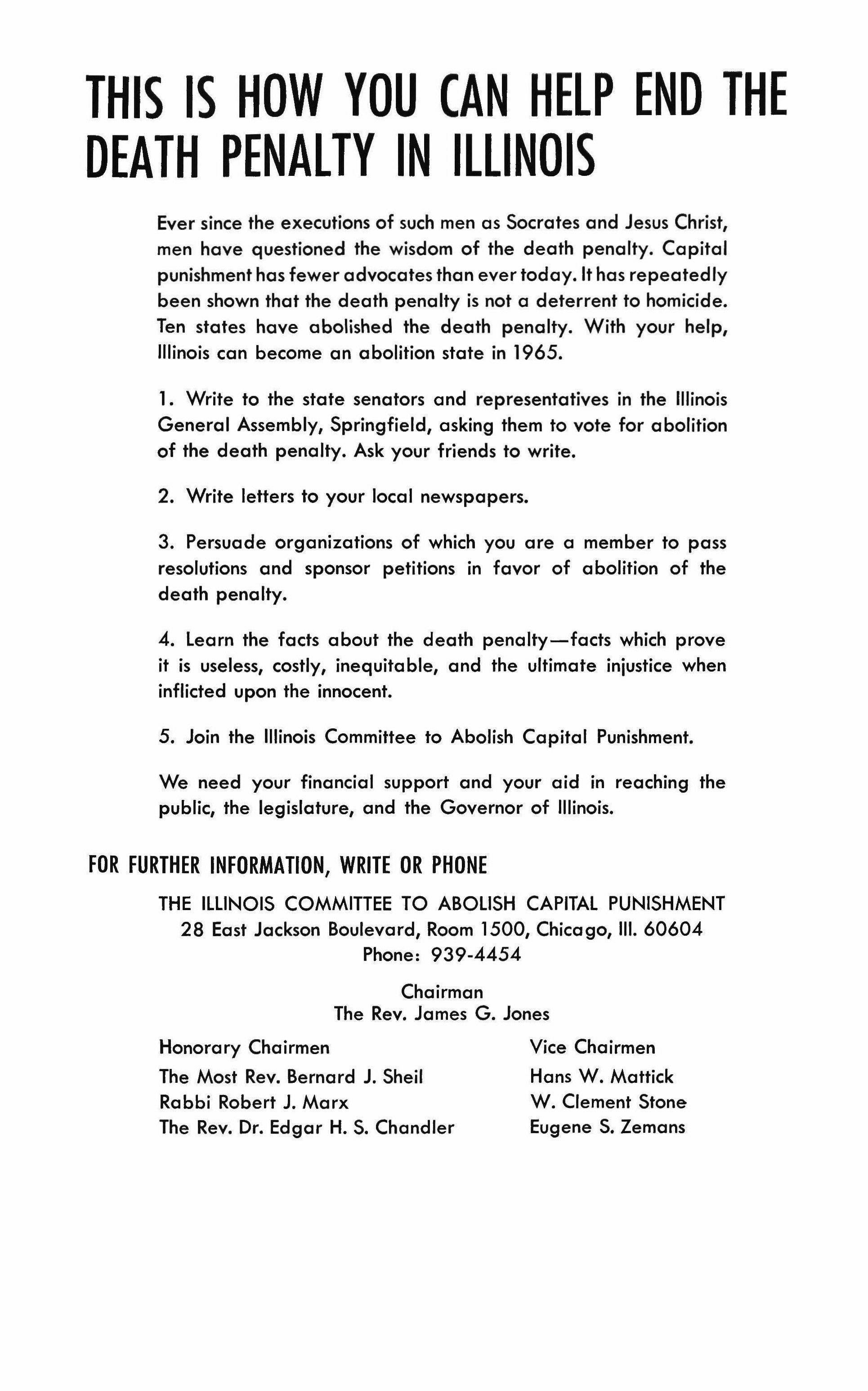
Vice Chairmen
Hans W. Mattick
W. Clement Stone Eugene S. Zemans
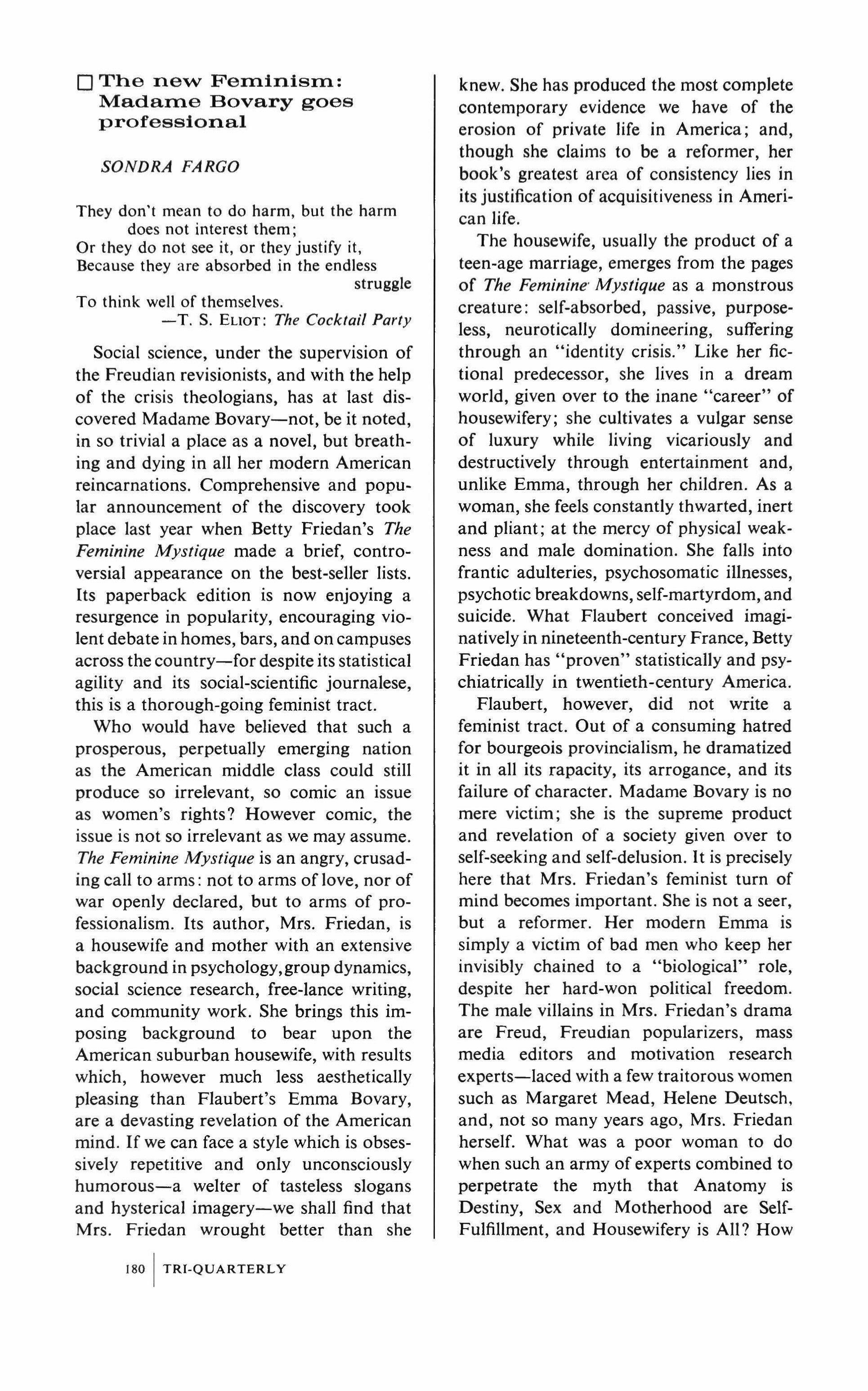
o The new Feminism: Madame Bovary goes professional
They don't mean to do harm, but the harm does not interest them; Or they do not see it, or they justify it, Because they are absorbed in the endless struggle
To think well of themselves.
- T. S. ELIOT: The Cocktail Party
Social science, under the supervision of the Freudian revisionists, and with the help of the crisis theologians, has at last discovered Madame Bovary-not, be it noted, in so trivial a place as a novel, but breathing and dying in all her modern American reincarnations. Comprehensive and popular announcement of the discovery took place last year when Betty Friedan's The Feminine Mystique made a brief, controversial appearance on the best-seller lists. Its paperback edition is now enjoying a resurgence in popularity, encouraging violent debate in homes, bars, and on campuses across the country-for despite its statistical agility and its social-scientific journalese, this is a thorough-going feminist tract. Who would have believed that such a prosperous, perpetually emerging nation as the American middle class could still produce so irrelevant, so comic an issue as women's rights? However comic, the issue is not so irrelevant as we may assume.
The Feminine Mystique is an angry, crusading call to arms: not to arms of love, nor of war openly declared, but to arms of professionalism. Its author, Mrs. Friedan, is a housewife and mother with an extensive background in psychology.group dynamics, social science research, free-lance writing, and community work. She brings this imposing background to bear upon the American suburban housewife, with results which, however much less aesthetically pleasing than Flaubert's Emma Bovary, are a devasting revelation of the American mind. If we can face a style which is obsessively repetitive and only unconsciously humorous-a welter of tasteless slogans and hysterical imagery-we shall find that Mrs. Friedan wrought better than she
180 I TRI-QUARTERLY
knew. She has produced the most complete contemporary evidence we have of the erosion of private life in America; and, though she claims to be a reformer, her book's greatest area of consistency lies in its justification of acquisitiveness in American life.
The housewife, usually the product of a teen-age marriage, emerges from the pages of The Feminine' Mystique as a monstrous creature: self-absorbed, passive, purposeless, neurotically domineering, suffering through an "identity crisis." Like her fictional predecessor, she lives in a dream world, given over to the inane "career" of housewifery; she cultivates a vulgar sense of luxury while living vicariously and destructively through entertainment and, unlike Emma, through her children. As a woman, she feels constantly thwarted, inert and pliant; at the mercy of physical weakness and male domination. She falls into frantic adulteries, psychosomatic illnesses, psychotic breakdowns, self-martyrdom, and suicide. What Flaubert conceived imaginatively in nineteenth-century France, Betty Friedan has "proven" statistically and psychiatrically in twentieth-century America.
Flaubert, however, did not write a feminist tract. Out of a consuming hatred for bourgeois provincialism, he dramatized it in all its rapacity, its arrogance, and its failure of character. Madame Bovary is no mere victim; she is the supreme product and revelation of a society given over to self-seeking and self-delusion. It is precisely here that Mrs. Friedan's feminist turn of mind becomes important. She is not a seer, but a reformer. Her modern Emma is simply a victim of bad men who keep her invisibly chained to a "biological" role, despite her hard-won political freedom. The male villains in Mrs. Friedan's drama are Freud, Freudian popularizers, mass media editors and motivation research experts-laced with a few traitorous women such as Margaret Mead, Helene Deutsch, and, not so many years ago, Mrs. Friedan herself. What was a poor woman to do when such an army of experts combined to perpetrate the myth that Anatomy is Destiny, Sex and Motherhood are SelfFulfillment, and Housewifery is All? How
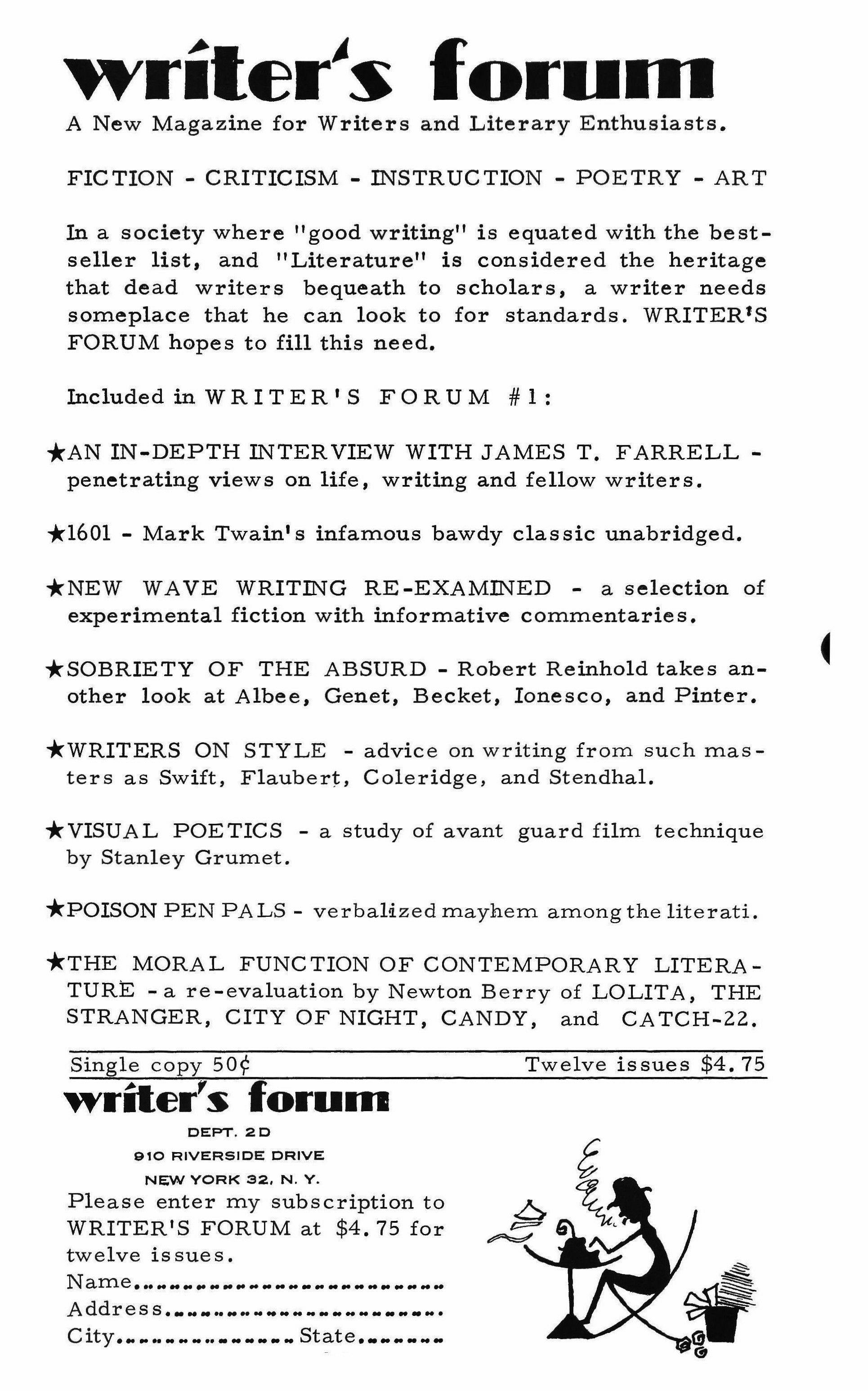
A New Magazine for Writers and Literary Enthusiasts.
In a society where "good writing" is equated with the bestseller list, and "Literature" is considered the heritage that dead writers bequeath to scholars, a writer needs someplace that he can look to for standards. WRITER'S FORUM hopes to fill this need.
Included in W R I T E R 's FOR U M # 1 :
*AN IN-DEPTH INTERVIEW WITH JAMES T. FARRELLpenetrating views on life, writing and fellow writers.
*1601 - Mark Twain's infamous bawdy classic unabridged.
*NEW WAVE WRITING RE-EXAMINED - a selection of experimental fiction with informative commentaries.
*SOBRIETY OF THE ABSURD - Robert Reinhold takes another look at Albee, Genet, Becket, Ionesco, and Pinter.
*WRITERS ON STYLE - advice on writing from such masters as Swift, F'Iaub e r t Coleridge, and Stendhal.
*VISUAL POETICS - a study of avant guard film technique by Stanley Grumet.
*POISON PEN PALS - ve r ba.Hz e d mayhem among the literati.
*THE MORAL FUNCTION OF CONTEMPORARY LITERATURE - a re-evaluation by Newton Berry of LOLITA, THE STRANGER, CITY OF NIGHT, CANDY, and CA TCH-22.
Single copy 50f Twelve issues $4.75 DEPT. 20
Please enter my subscription to WRITER'S FORUM at $4. 75 for twelve issues.
Name Address.
City State
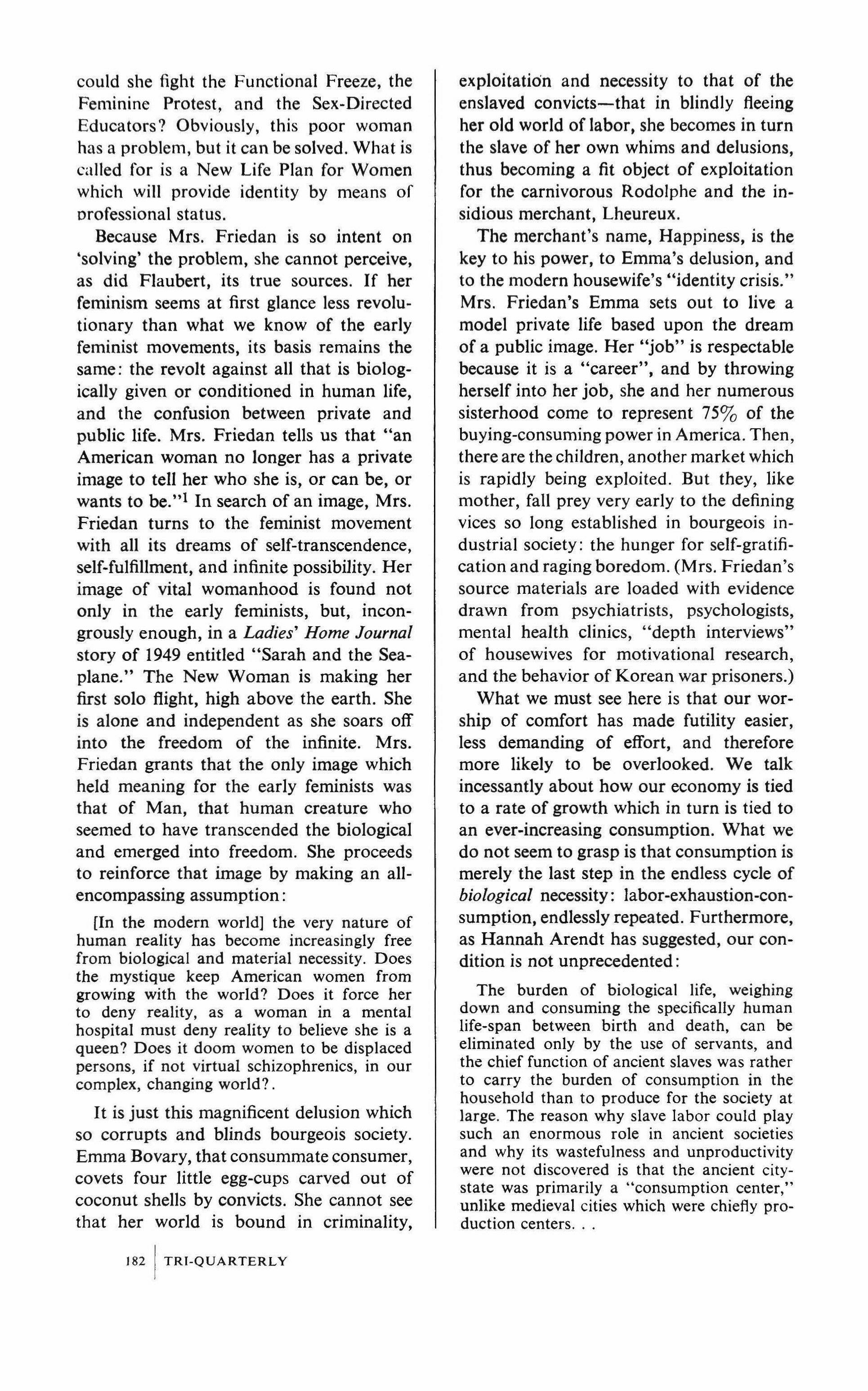
could she fight the Functional Freeze, the Feminine Protest, and the Sex-Directed Educators? Obviously, this poor woman has a problem, but it can be solved. What is called for is a New Life Plan for Women which will provide identity by means of orofessional status.
Because Mrs. Friedan is so intent on 'solving' the problem, she cannot perceive, as did Flaubert, its true sources. If her feminism seems at first glance less revolutionary than what we know of the early feminist movements, its basis remains the same: the revolt against all that is biologically given or conditioned in human life, and the confusion between private and public life. Mrs. Friedan tells us that "an American woman no longer has a private image to tell her who she is, or can be, or wants to be."l In search of an image, Mrs. Friedan turns to the feminist movement with all its dreams of self-transcendence, self-fulfillment, and infinite possibility. Her image of vital womanhood is found not only in the early feminists, but, incongrously enough, in a Ladies' Home Journal story of 1949 entitled "Sarah and the Seaplane." The New Woman is making her first solo flight, high above the earth. She is alone and independent as she soars off into the freedom of the infinite. Mrs. Friedan grants that the only image which held meaning for the early feminists was that of Man, that human creature who seemed to have transcended the biological and emerged into freedom. She proceeds to reinforce that image by making an allencompassing assumption:
[In the modern world] the very nature of human reality has become increasingly free from biological and material necessity. Does the mystique keep American women from growing with the world? Does it force her to deny reality, as a woman in a mental hospital must deny reality to believe she is a queen? Does it doom women to be displaced persons, if not virtual schizophrenics, in our complex, changing world?
It is just this magnificent delusion which so corrupts and blinds bourgeois society. Emma Bovary, that consummate consumer, covets four little egg-cups carved out of coconut shells by convicts. She cannot see that her world is bound in criminality,
1821 TRI-QUARTERLY
exploitation and necessity to that of the enslaved convicts-that in blindly fleeing her old world of labor, she becomes in turn the slave of her own whims and delusions, thus becoming a fit object of exploitation for the carnivorous Rodolphe and the insidious merchant, Lheureux.
The merchant's name, Happiness, is the key to his power, to Emma's delusion, and to the modern housewife's "identity crisis." Mrs. Friedan's Emma sets out to live a model private life based upon the dream of a public image. Her "job" is respectable because it is a "career", and by throwing herself into her job, she and her numerous sisterhood come to represent 75% of the buying-consuming power in America. Then, there are the children, another market which is rapidly being exploited. But they, like mother, fall prey very early to the defining vices so long established in bourgeois industrial society: the hunger for self-gratification and raging boredom. (Mrs. Friedan's source materials are loaded with evidence drawn from psychiatrists, psychologists, mental health clinics, "depth interviews" of housewives for motivational research, and the behavior of Korean war prisoners.)
What we must see here is that our worship of comfort has made futility easier, less demanding of effort, and therefore more likely to be overlooked. We talk incessantly about how our economy is tied to a rate of growth which in turn is tied to an ever-increasing consumption. What we do not seem to grasp is that consumption is merely the last step in the endless cycle of biological necessity: labor-exhaustion-consumption, endlessly repeated. Furthermore, as Hannah Arendt has suggested, our condition is not unprecedented:
The burden of biological life, weighing down and consuming the specifically human life-span between birth and death, can be eliminated only by the use of servants, and the chief function of ancient slaves was rather to carry the burden of consumption in the household than to produce for the society at large. The reason why slave labor could play such an enormous role in ancient societies and why its wastefulness and unproductivity were not discovered is that the ancient citystate was primarily a "consumption center," unlike medieval cities which were chiefly production centers
Contributors to forthcoming issues: Marius Bewley, Kay Boyle, Cleanth Brooks, Glauco Cambon, Malcolm Cowley, James Dickey, Mavis Gallant, John Gardner, Jean Garrigue, T. R. Henn, Frederick J. Hoffman, R. W. B. Lewis, Mary McCarthy, Samuel French Morse, William Van O'Connor, Katherine Anne Porter, Reynolds Price, Kathleen Raine, John Crowe Ransom, Larry Rubin, Louis Simpson, William Stafford, May Swenson, Allen Tate, Eliseo Vivas, John Wain, Austin Warren, Robert Penn Warren, T. Harry Williams, and many others.
Essays, Fiction, Poetry, Reviews
Editors: Lewis P. Simpson, Donald E. Stanford
Assistant Editor: Rima Drell Reck
Business Manager: Patt Foster Roberson
Founders: Cleanth Brooks, Albert Erskine, Charles W. Pipkin, Robert Penn Warren
Vol. 1 No.1 (new series), January, 1965
Subscription: $4.00 per year
Subscribe Early Limited Edition

THE Southern Review
DRAWER D, UNIVERSITY STATION, BATON ROUGE, LA. 70803
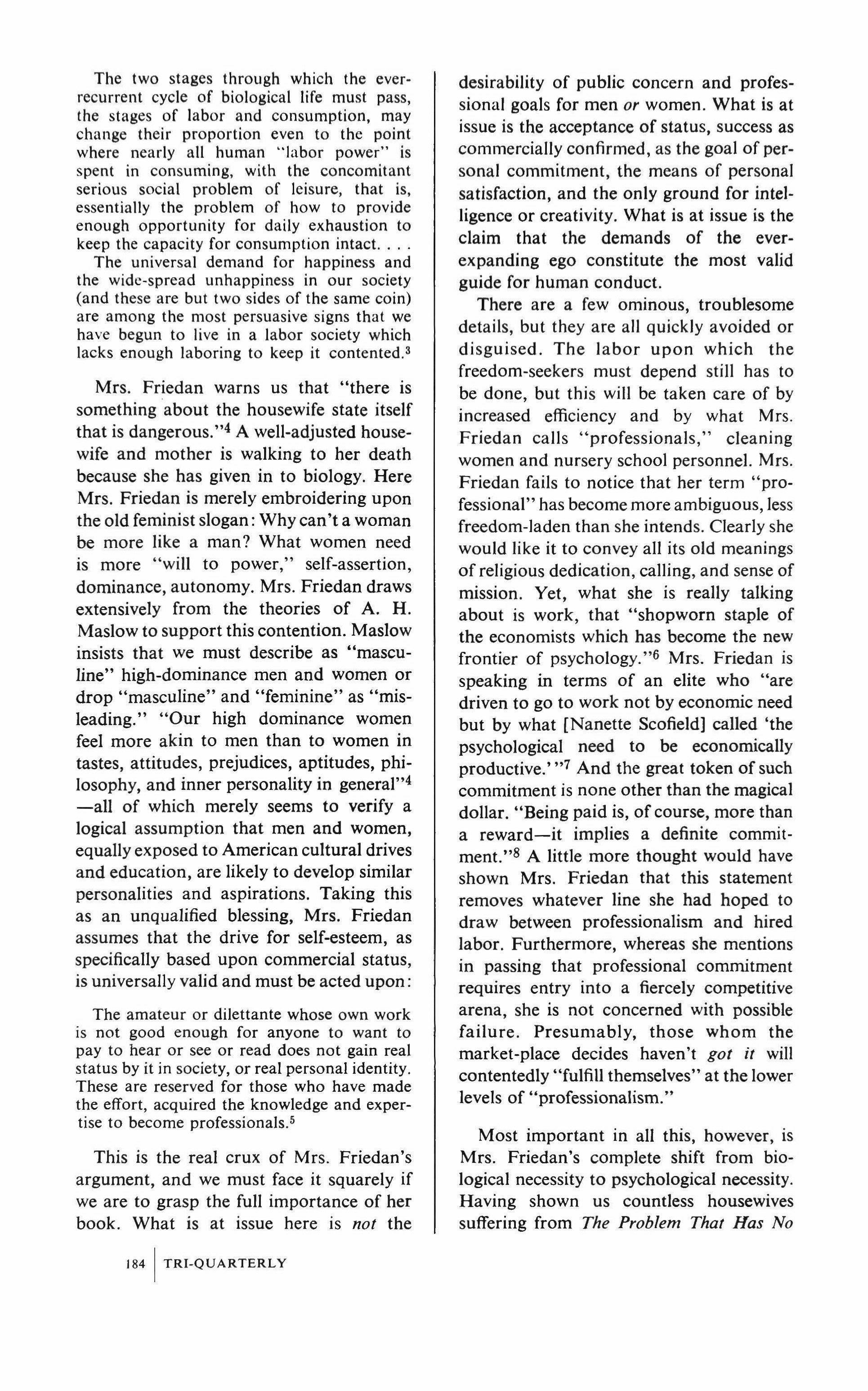
The two stages through which the everrecurrent cycle of biological life must pass, the stages of labor and consumption, may change their proportion even to the point where nearly all human "labor power" is spent in consuming, with the concomitant serious social problem of leisure, that is, essentially the problem of how to provide enough opportunity for daily exhaustion to keep the capacity for consumption intact.
The universal demand for happiness and the wide-spread unhappiness in our society (and these are but two sides of the same coin) are among the most persuasive signs that we have begun to live in a labor society which lacks enough laboring to keep it contented.!
Mrs. Friedan warns us that "there is something about the housewife state itself that is dangerous."! A well-adjusted housewife and mother is walking to her death because she has given in to biology. Here Mrs. Friedan is merely embroidering upon the old feminist slogan: Why can't a woman be more like a man? What women need is more "will to power," self-assertion, dominance, autonomy. Mrs. Friedan draws extensively from the theories of A. H. Maslow to support this contention. Maslow insists that we must describe as "masculine" high-dominance men and women or drop "masculine" and "feminine" as "misleading." "Our high dominance women feel more akin to men than to women in tastes, attitudes, prejudices, aptitudes, philosophy, and inner personality in general"!
-all of which merely seems to verify a logical assumption that men and women, equally exposed to American cultural drives and education, are likely to develop similar personalities and aspirations. Taking this as an unqualified blessing, Mrs. Friedan assumes that the drive for self-esteem, as specifically based upon commercial status, is universally valid and must be acted upon:
The amateur or dilettante whose own work is not good enough for anyone to want to pay to hear or see or read does not gain real status by it in society, or real personal identity. These are reserved for those who have made the effort, acquired the knowledge and expertise to become professionals.!
This is the real crux of Mrs. Friedan's argument, and we must face it squarely if we are to grasp the full importance of her book. What is at issue here is not the
desirability of public concern and professional goals for men or women. What is at issue is the acceptance of status, success as commercially confirmed, as the goal of personal commitment, the means of personal satisfaction, and the only ground for intelligence or creativity. What is at issue is the claim that the demands of the everexpanding ego constitute the most valid guide for human conduct.
There are a few ominous, troublesome details, but they are all quickly avoided or disguised. The labor upon which the freedom-seekers must depend still has to be done, but this will be taken care of by increased efficiency and by what Mrs. Friedan calls "professionals," cleaning women and nursery school personnel. Mrs. Friedan fails to notice that her term "professional" has become more ambiguous, less freedom-laden than she intends. Clearly she would like it to convey all its old meanings of religious dedication, calling, and sense of mission. Yet, what she is really talking about is work, that "shopworn staple of the economists which has become the new frontier of psychology.t'f Mrs. Friedan is speaking in terms of an elite who "are driven to go to work not by economic need but by what [Nanette Scofield] called 'the psychological need to be economically productive.Y'? And the great token of such commitment is none other than the magical dollar. "Being paid is, of course, more than a reward-it implies a definite commitment."8 A little more thought would have shown Mrs. Friedan that this statement removes whatever line she had hoped to draw between professionalism and hired labor. Furthermore, whereas she mentions in passing that professional commitment requires entry into a fiercely competitive arena, she is not concerned with possible failure. Presumably, those whom the market-place decides haven't got it will contentedly "fulfill themselves" at the lower levels of "professionalism."
Most important in all this, however, is Mrs. Friedan's complete shift from biological necessity to psychological necessity. Having shown us countless housewives suffering from The Problem That Has No

$1.00 a copy
$3.50 a year published by The Antioch Press Yellow Springs, Ohio 45387
• Spring '65: GREECE AND THE CLASSICAL HERITAGE, a special issue devoted to the Greek experience which shaped and continues to influence Western culture-examined from the viewpoints of literature, art, philosophy, and the new archaeology. One of our occasional special issues examining a particular topic in depth and in relation to our own time.
• Winter '65_'66: TWENTYFIFTH ANNIVERSARY ISSUE, featuring a multi-level look at the quarter-century past and the century or so ahead by some of the writers who have contributed most to our first two-and-a-half decades, ranging broadly across the humanities and social sciences.
• And in every quarterly issue: Outstanding articles, analyses, insights, proposals, summations written not as from one scholar to another but from the frontiers of scholarship to the literate and concerned general re ader; stories and poetry to give emotional expression to contemporary thoughts and feelings; reviews in depth of important books; and commentary.
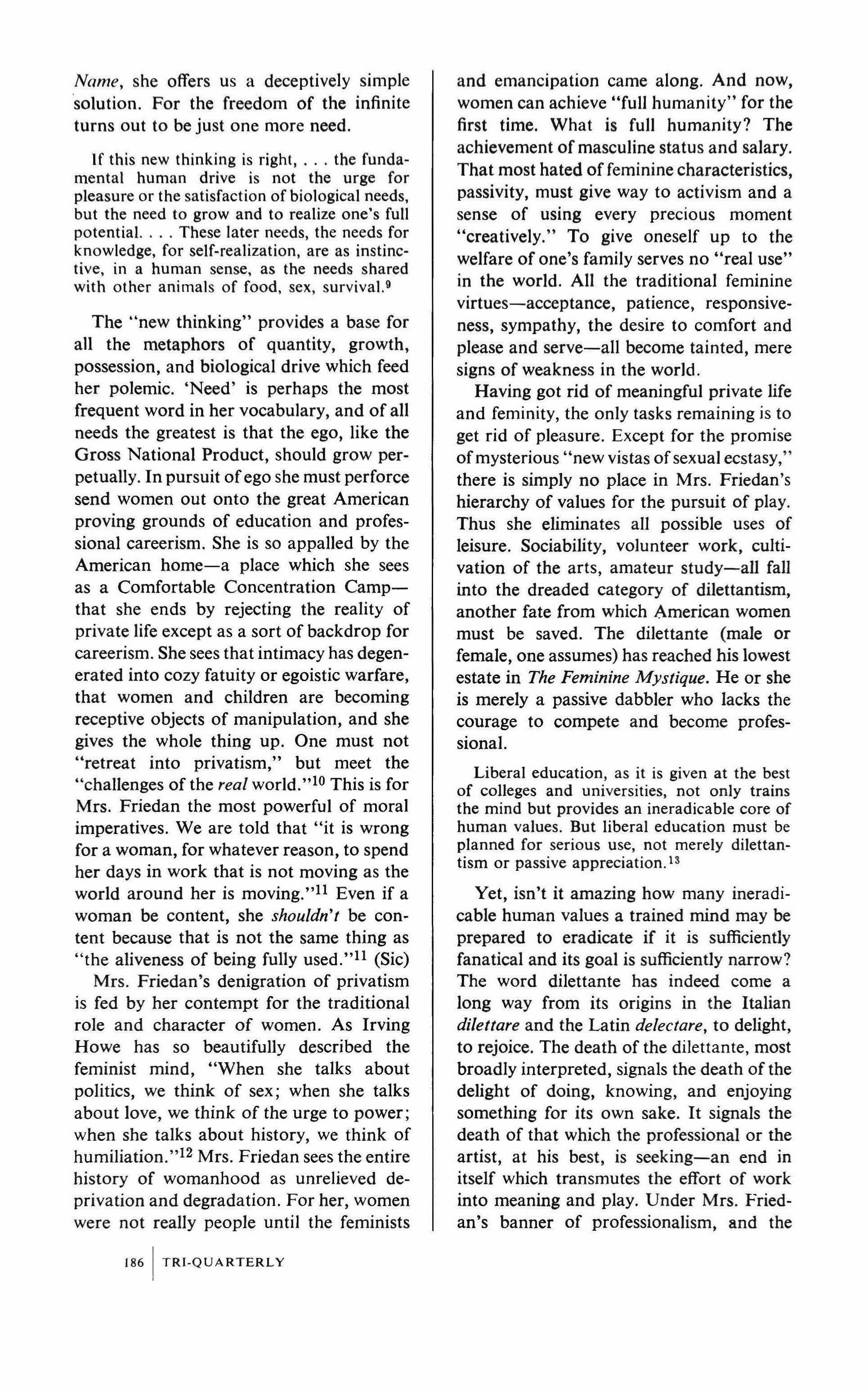
Name, she offers us a deceptively simple solution. For the freedom of the infinite turns out to be just one more need.
If this new thinking is right, the fundamental human drive is not the urge for pleasure or the satisfaction of biological needs, but the need to grow and to realize one's full potential. These later needs, the needs for knowledge, for self-realization, are as instinctive, in a human sense, as the needs shared with other animals of food, sex, survival."
The "new thinking" provides a base for all the metaphors of quantity, growth, possession, and biological drive which feed her polemic. 'Need' is perhaps the most frequent word in her vocabulary, and of all needs the greatest is that the ego, like the Gross National Product, should grow perpetually. In pursuit ofego she must perforce send women out onto the great American proving grounds of education and professional careerism. She is so appalled by the American home-a place which she sees as a Comfortable Concentration Campthat she ends by rejecting the reality of private life except as a sort of backdrop for careerism. She sees that intimacy has degenerated into cozy fatuity or egoistic warfare, that women and children are becoming receptive objects of manipulation, and she gives the whole thing up. One must not "retreat into privatism," but meet the "challenges of the real world.l'J'' This is for Mrs. Friedan the most powerful of moral imperatives. We are told that "it is wrong for a woman, for whatever reason, to spend her days in work that is not moving as the world around her is rnoving.t'U Even if a woman be content, she shouldn't be content because that is not the same thing as "the aliveness of being fully used."ll (Sic)
Mrs. Friedan's denigration of privatism is fed by her contempt for the traditional role and character of women. As Irving Howe has so beautifully described the feminist mind, "When she talks about politics, we think of sex; when she talks about love, we think of the urge to power; when she talks about history, we think of humiliation. "12 Mrs. Friedan sees the entire history of womanhood as unrelieved deprivation and degradation. For her, women were not really people until the feminists
1861 TRI-QUARTERLY
and emancipation came along. And now, women can achieve "full humanity" for the first time. What is full humanity? The achievement of masculine status and salary. That most hated of feminine characteristics, passivity, must give way to activism and a sense of using every precious moment "creatively." To give oneself up to the welfare of one's family serves no "real use" in the world. All the traditional feminine virtues-acceptance, patience, responsiveness, sympathy, the desire to comfort and please and serve-all become tainted, mere signs of weakness in the world.
Having got rid of meaningful private life and feminity, the only tasks remaining is to get rid of pleasure. Except for the promise ofmysterious "new vistas ofsexual ecstasy," there is simply no place in Mrs. Friedan's hierarchy of values for the pursuit of play. Thus she eliminates all possible uses of leisure. Sociability, volunteer work, cultivation of the arts, amateur study-all fall into the dreaded category of dilettantism, another fate from which American women must be saved. The dilettante (male or female, one assumes) has reached his lowest estate in The Feminine Mystique. He or she is merely a passive dabbler who lacks the courage to compete and become professional.
Liberal education, as it is given at the best of colleges and universities, not only trains the mind but provides an ineradicable core of human values. But liberal education must be planned for serious use, not merely dilettantism or passive appreciation. 13
Yet, isn't it amazing how many ineradicable human values a trained mind may be prepared to eradicate if it is sufficiently fanatical and its goal is sufficiently narrow? The word dilettante has indeed come a long way from its origins in the Italian dilettare and the Latin delectare, to delight, to rejoice. The death of the dilettante, most broadly interpreted, signals the death of the delight of doing, knowing, and enjoying something for its own sake. It signals the death of that which the professional or the artist, at his best, is seeking-an end in itself which transmutes the effort of work into meaning and play. Under Mrs. Friedan's banner of professionalism, and the
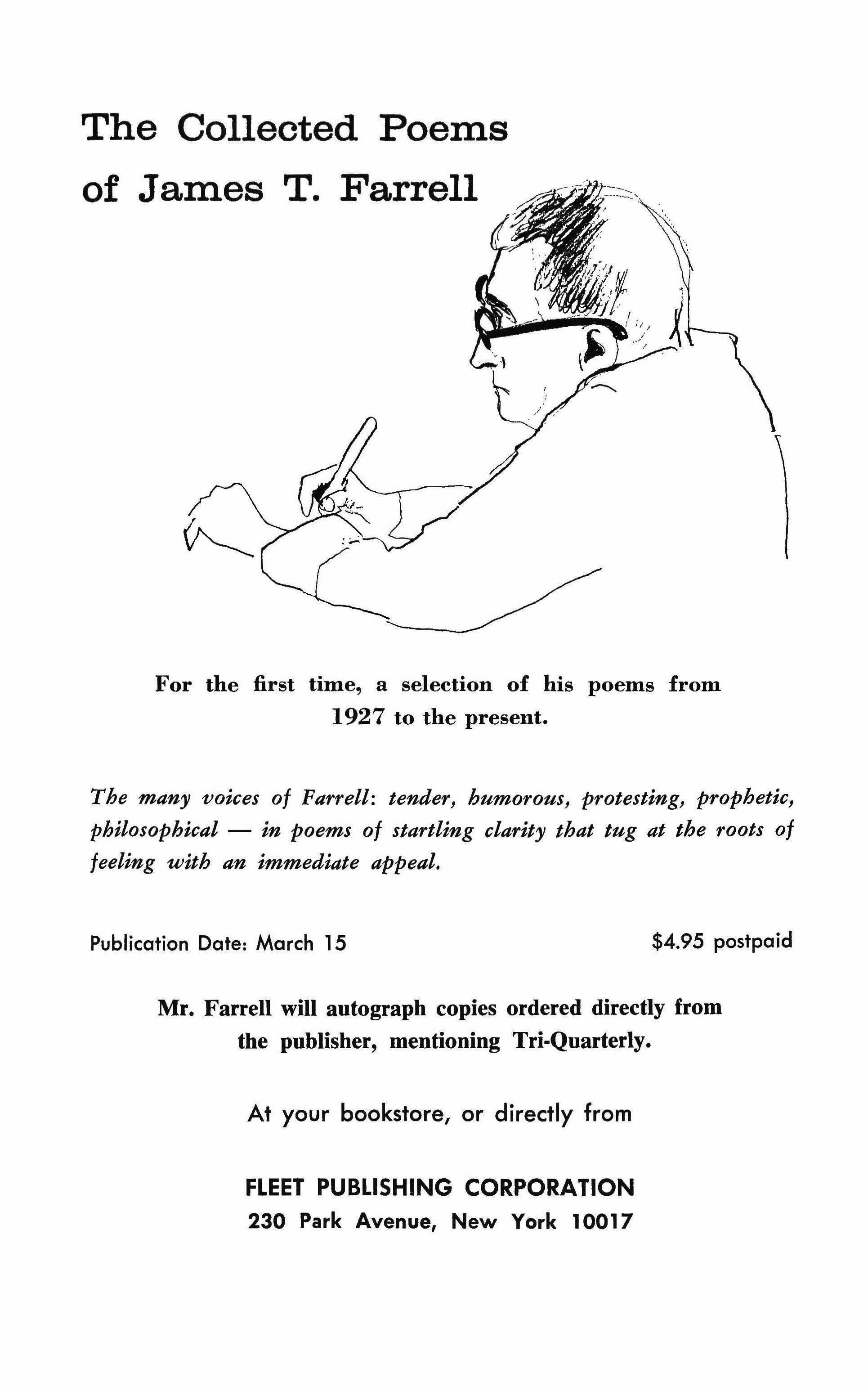
For the first time, a selection of his poems from 1927 to the present.
The many voices of Farrell: tender, humorous, protesting, prophetic, philosophical - in poems of startling clarity that tug at the roots of feeling with an immediate appeal.
Publication Date: March 15
$4.95 postpaid
Mr. Farrell will autograph copies ordered directly from the publisher, mentioning Ttl-Quarterly.
At your bookstore, or directly from
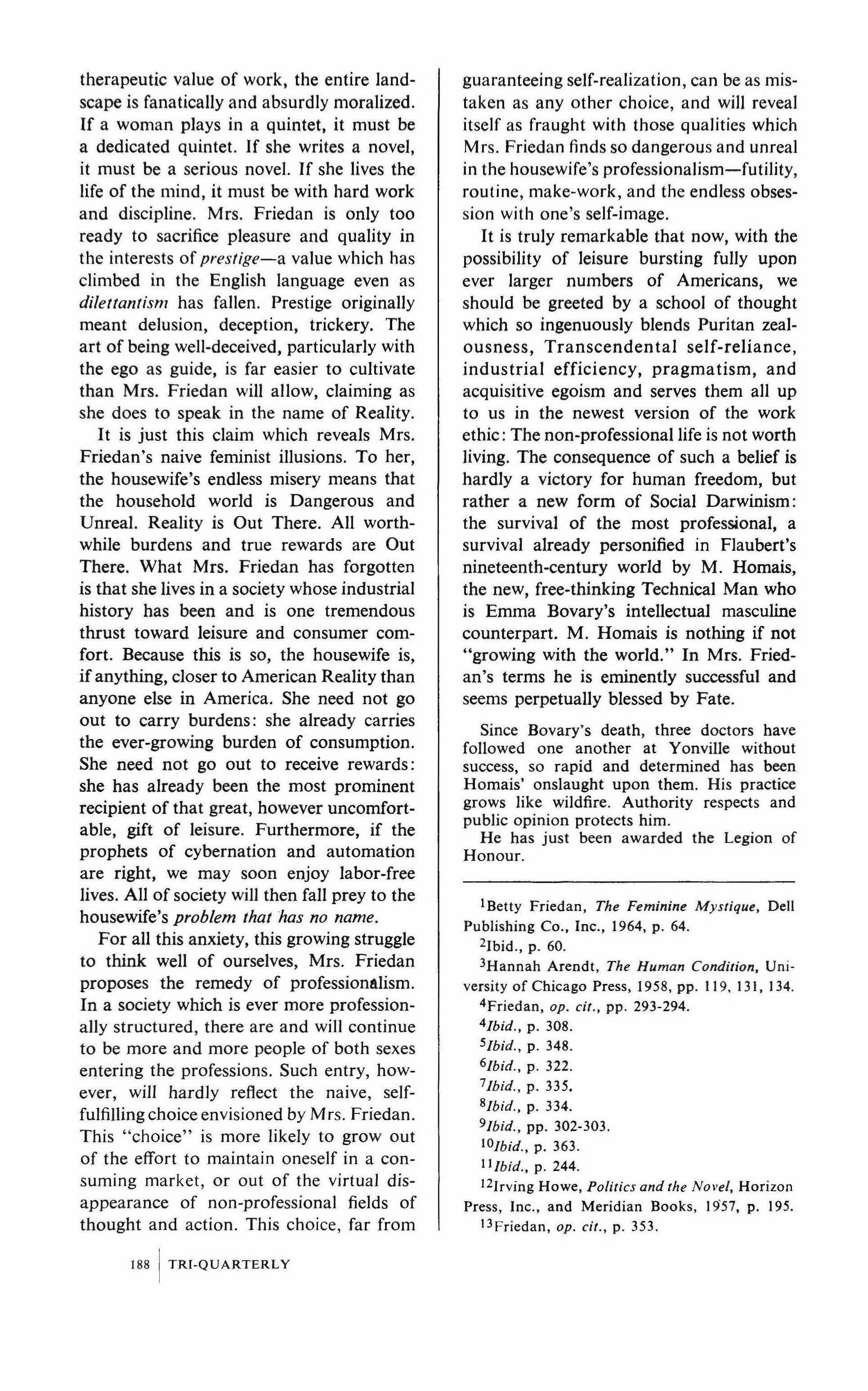
therapeutic value of work, the entire landscape is fanatically and absurdly moralized. If a woman plays in a quintet, it must be a dedicated quintet. If she writes a novel, it must be a serious novel. If she lives the life of the mind, it must be with hard work and discipline. Mrs. Friedan is only too ready to sacrifice pleasure and quality in the interests of prestige-a value which has climbed in the English language even as dilettantism has fallen. Prestige originally meant delusion, deception, trickery. The art of being well-deceived, particularly with the ego as guide, is far easier to cultivate than Mrs. Friedan will allow, claiming as she does to speak in the name of Reality.
It is just this claim which reveals Mrs. Friedan's naive feminist illusions. To her, the housewife's endless misery means that the household world is Dangerous and Unreal. Reality is Out There. All worthwhile burdens and true rewards are Out There. What Mrs. Friedan has forgotten is that she lives in a society whose industrial history has been and is one tremendous thrust toward leisure and consumer comfort. Because this is so, the housewife is, if anything, closer to American Reality than anyone else in America. She need not go out to carry burdens: she already carries the ever-growing burden of consumption. She need not go out to receive rewards: she has already been the most prominent recipient of that great, however uncomfortable, gift of leisure. Furthermore, if the prophets of cybernation and automation are right, we may soon enjoy labor-free lives. All of society will then fall prey to the housewife's problem that has no name.
For all this anxiety, this growing struggle to think well of ourselves, Mrs. Friedan proposes the remedy of professionalism. In a society which is ever more professionally structured, there are and will continue to be more and more people of both sexes entering the professions. Such entry, however, will hardly reflect the naive, selffulfilling choice envisioned by Mrs. Friedan. This "choice" is more likely to grow out of the effort to maintain oneself in a consuming market, or out of the virtual disappearance of non-professional fields of thought and action. This choice, far from
1881 TRI-QUARTERLY
guaranteeing self-realization, can be as mistaken as any other choice, and will reveal itself as fraught with those qualities which Mrs. Friedan finds so dangerous and unreal in the housewife's professionalism-futility, routine, make-work, and the endless obsession with one's self-image.
It is truly remarkable that now, with the possibility of leisure bursting fully upon ever larger numbers of Americans, we should be greeted by a school of thought which so ingenuously blends Puritan zealousness, Transcendental self-reliance, industrial efficiency, pragmatism, and acquisitive egoism and serves them all up to us in the newest version of the work ethic: The non-professional life is not worth living. The consequence of such a belief is hardly a victory for human freedom, but rather a new form of Social Darwinism: the survival of the most professional, a survival already personified in Flaubert's nineteenth-century world by M. Homais, the new, free-thinking Technical Man who is Emma Bovary's intellectual masculine counterpart. M. Homais is nothing if not "growing with the world." In Mrs. Friedan's terms he is eminently successful and seems perpetually blessed by Fate.
Since Bovary's death, three doctors have followed one another at Yonville without success, so rapid and determined has been Homais' onslaught upon them. His practice grows like wildfire. Authority respects and public opinion protects him.
He has just been awarded the Legion of Honour.
lBetty Friedan, The Feminine Mystique, Dell Publishing Co., Inc., 1964, p. 64.
2Ibid., p. 60.
3Hannah Arendt, The Human Condition, University of Chicago Press, 1958, pp. 119. 131, 134.
4Friedan, op. cit., pp. 293-294.
+tua., p. 308.
stu«, p. 348.
6Ibid., p. 322.
7Ibid., p. 335.
8Ibid., p. 334.
»iu«, pp. 302-303.
lOlbid., p. 363.
11 Ibid., p. 244.
12Irving Howe, Politics and the Novel, Horizon Press, Inc., and Meridian Books, 19'57, p. 195.
l3Friedan, op. cit., p. 353.

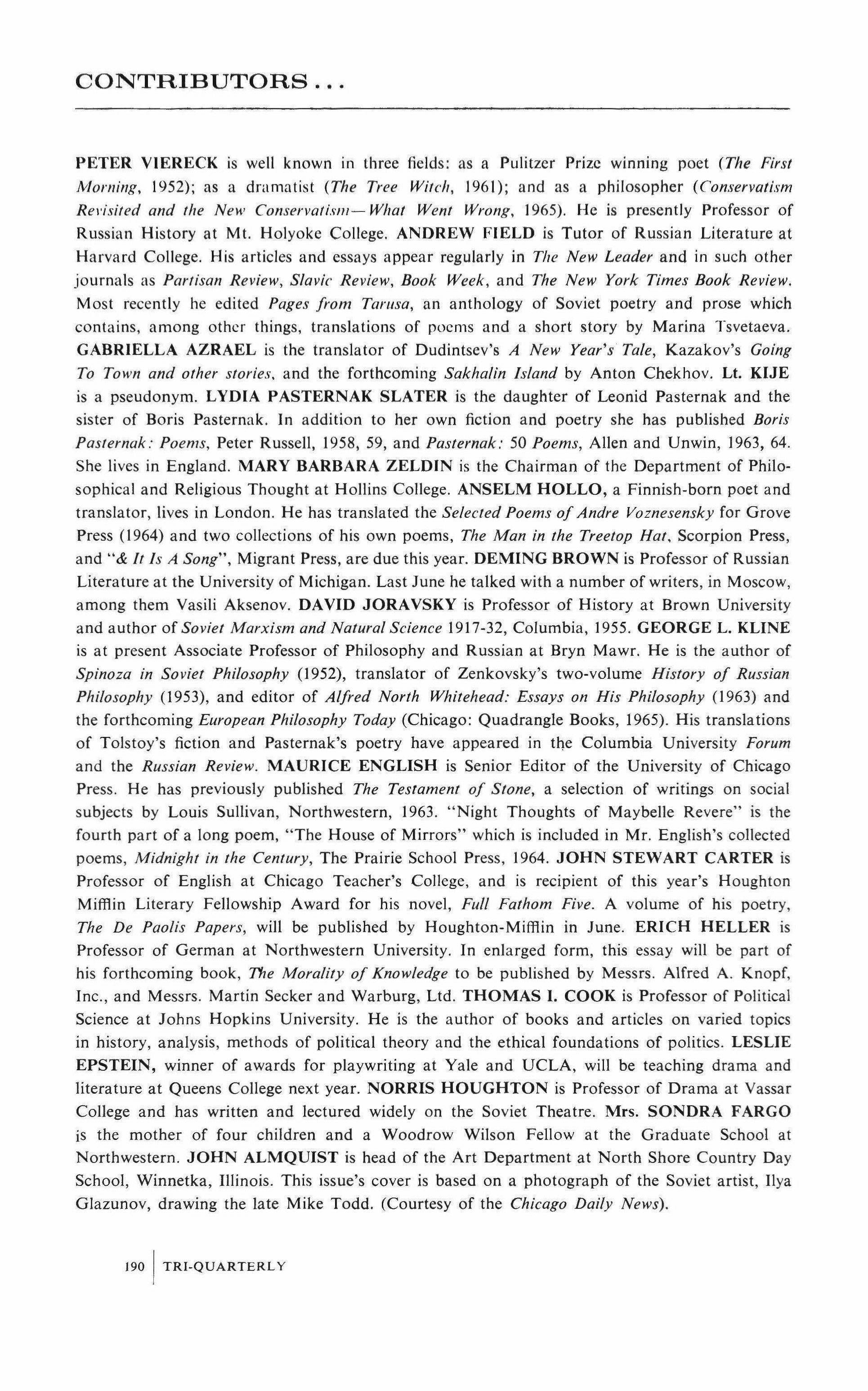
PETER VIERECK is well known in three fields: as a Pulitzer Prize winning poet (The First Morning, 1952); as a dramatist (The Tree Witch, 1961); and as a philosopher (Conservatism Revisited and the New Conservatisni= What Went Wrong, 1965). He is presently Professor of Russian History at Mt. Holyoke College. ANDREW FIELD is Tutor of Russian Literature at Harvard College. His articles and essays appear regularly in The New Leader and in such other journals as Partisan Review, Slavic Review, Book Week, and The New York Times Book Review. Most recently he edited Pages from Tart/sa, an anthology of Soviet poetry and prose which contains, among other things, translations of poems and a short story by Marina Tsvetaeva. GABRIELLA AZRAEL is the translator of Dudintsev's A New Year's Tale, Kazakov's Going To Town and other stories. and the forthcoming Sakhalin Island by Anton Chekhov, Lt. KIJE is a pseudonym. LYDIA PASTERNAK SLATER is the daughter of Leonid Pasternak and the sister of Boris Pasternak. In addition to her own fiction and poetry she has published Boris Pasternak: Poems, Peter Russell, 1958, 59, and Pasternak: 50 Poems, Allen and Unwin, 1963, 64. She lives in England. MARY BARBARA ZELDIN is the Chairman of the Department of Philosophical and Religious Thought at Hollins College. ANSELM HOLLO, a Finnish-born poet and translator, lives in London. He has translated the Selected Poems of Andre Voznesensky for Grove Press (I964) and two collections of his own poems, The Man in the Treetop Hat, Scorpion Press, and "& It Is A Song", Migrant Press, are due this year. DEMING BROWN is Professor of Russian Literature at the University of Michigan. Last June he talked with a number of writers, in Moscow, among them Vasili Aksenov. DAVID JORAVSKY is Professor of History at Brown University and author of Soviet Marxism and Natural Science 1917-32, Columbia, 1955. GEORGE L. KLINE is at present Associate Professor of Philosophy and Russian at Bryn Mawr. He is the author of Spinoza in Soviet Philosophy (1952), translator of Zenkovsky's two-volume History of Russian Philosophy (1953), and editor of Alfred North Whitehead: Essays on His Philosophy (1963) and the forthcoming European Philosophy Today (Chicago: Quadrangle Books, 1965). His translations of Tolstoy's fiction and Pasternak's poetry have appeared in the Columbia University Forum and the Russian Review. MAURICE ENGLISH is Senior Editor of the University of Chicago Press. He has previously published The Testament of Stone, a selection of writings on social subjects by Louis Sullivan, Northwestern, 1963. "Night Thoughts of Maybelle Revere" is the fourth part of a long poem, "The House of Mirrors" which is included in Mr. English's collected poems, Midnight in the Century, The Prairie School Press, 1964. JOHN STEWART CARTER is Professor of English at Chicago Teacher's College, and is recipient of this year's Houghton Mifflin Literary Fellowship Award for his novel, Full Fathom Five. A volume of his poetry, The De Paolis Papers, will be published by Houghton-Mifflin in June. ERICH HELLER is Professor of German at Northwestern University. In enlarged form, this essay will be part of his forthcoming book, The Morality 0/ Knowledge to be published by Messrs. Alfred A. Knopf, Inc., and Messrs. Martin Seeker and Warburg, Ltd. THOMAS l. COOK is Professor of Political Science at Johns Hopkins University. He is the author of books and articles on varied topics in history, analysis, methods of political theory and the ethical foundations of politics. LESLIE EPSTEIN, winner of awards for playwriting at Yale and UCLA, will be teaching drama and literature at Queens College next year. NORRIS HOUGHTON is Professor of Drama at Vassar College and has written and lectured widely on the Soviet Theatre. Mrs. SONDRA FARGO is the mother of four children and a Woodrow Wilson Fellow at the Graduate School at Northwestern. JOHN ALMQUIST is head of the Art Department at North Shore Country Day School, Winnetka, Illinois. This issue's cover is based on a photograph of the Soviet artist, Ilya Glazunov, drawing the late Mike Todd. (Courtesy of the Chicago Daily News).